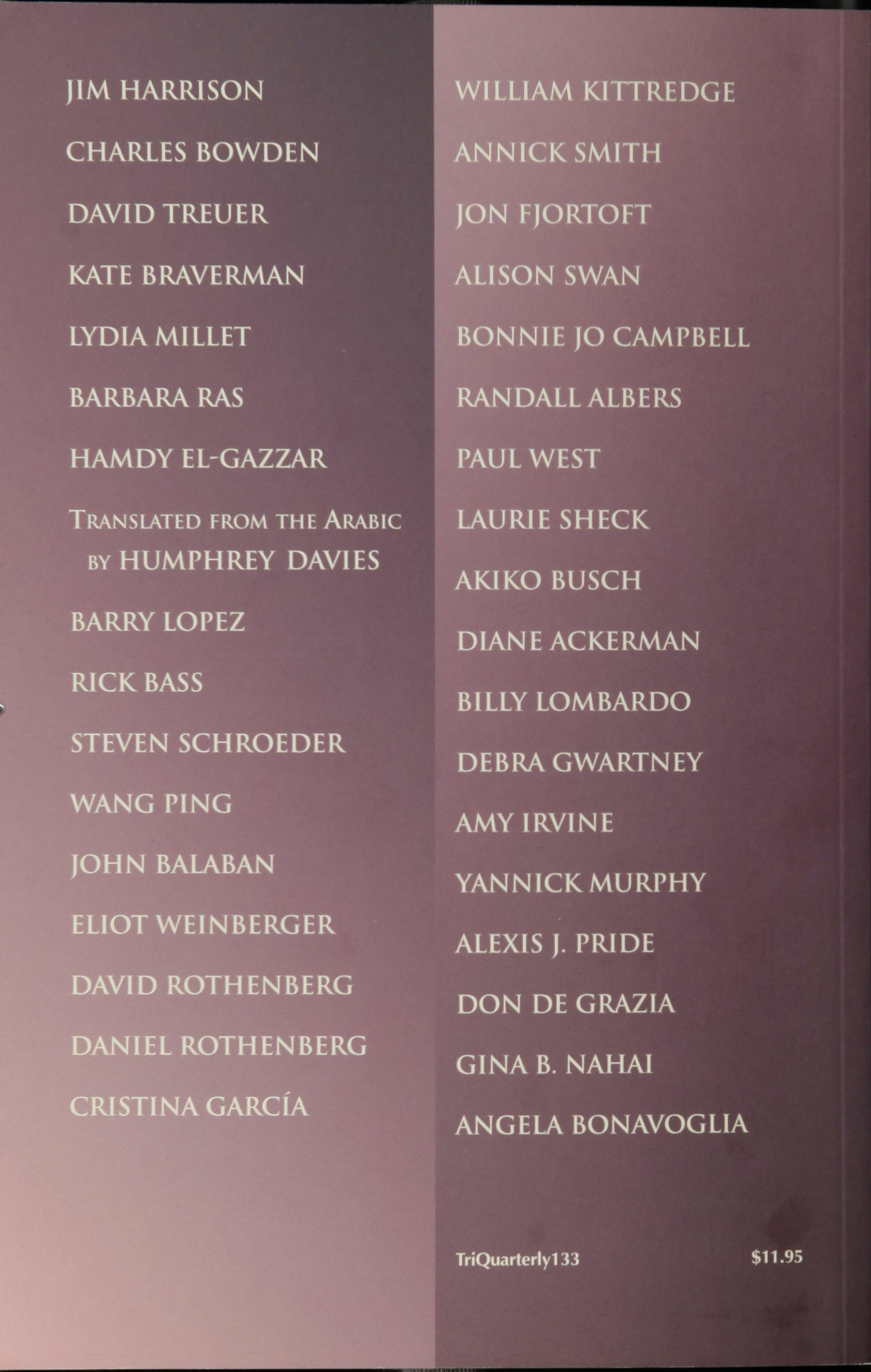








Editor of this issue: Donna Seaman
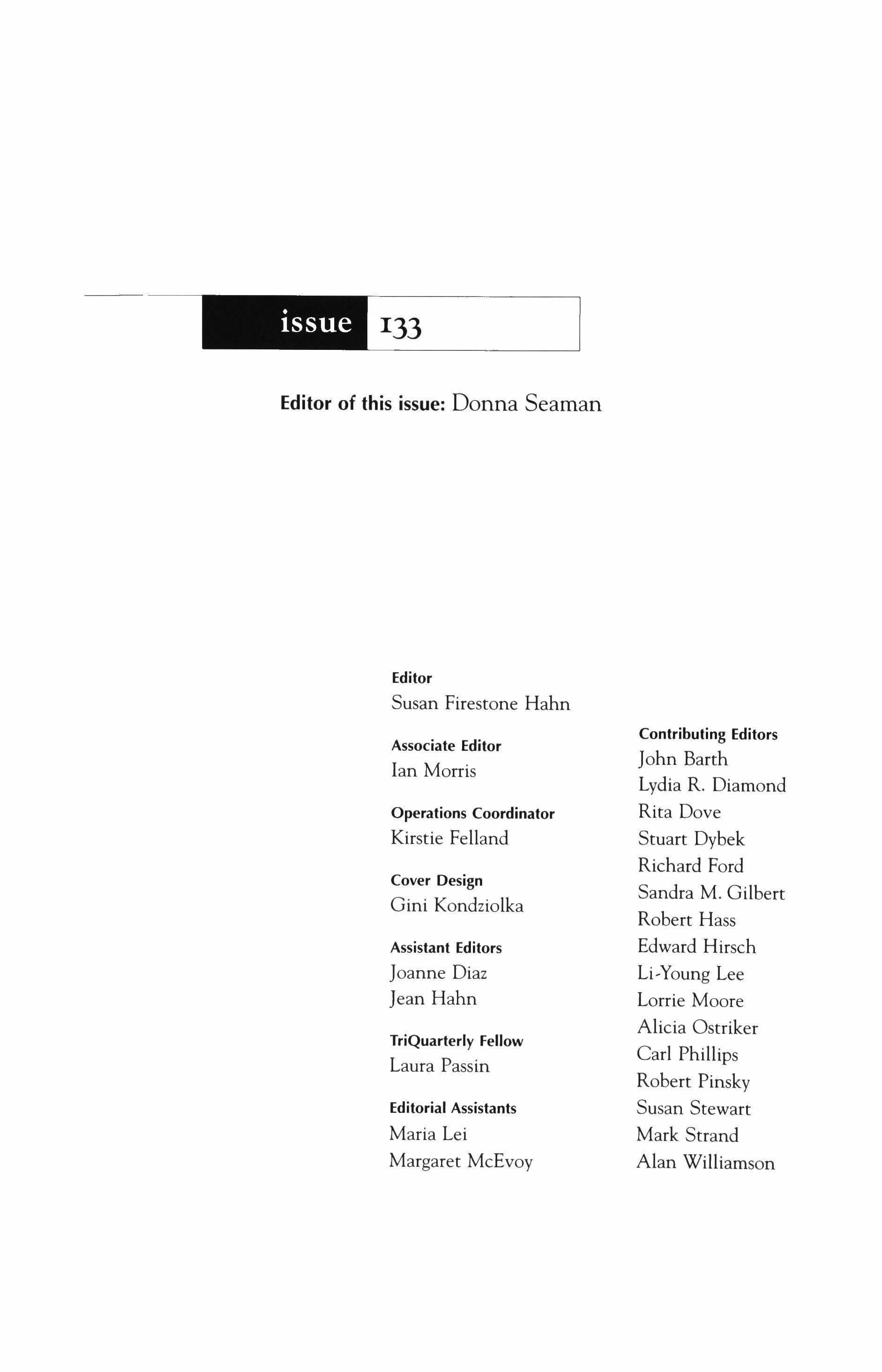
Editor
Susan Firestone Hahn
Associate Editor
Ian Morris
Operations Coordinator
Kirstie Felland
Cover Design
Gini Kondziolka
Assistant Editors
Joanne Diaz
Jean Hahn
TriQuarterly Fellow
Laura Passin
Editorial Assistants
Maria Lei
Margaret McEvoy
Contributing Editors
John Barth
Lydia R. Diamond
Rita Dove
Stuart Dvbek
Richard Ford
Sandra M. Gilbert
Robert Hass
Edward Hirsch
Li-Young Lee
Lorrie Moore
Alicia Ostriker
Carl Phillips
Robert Pinsky
Susan Stewart
Mark Strand
Alan Williamson

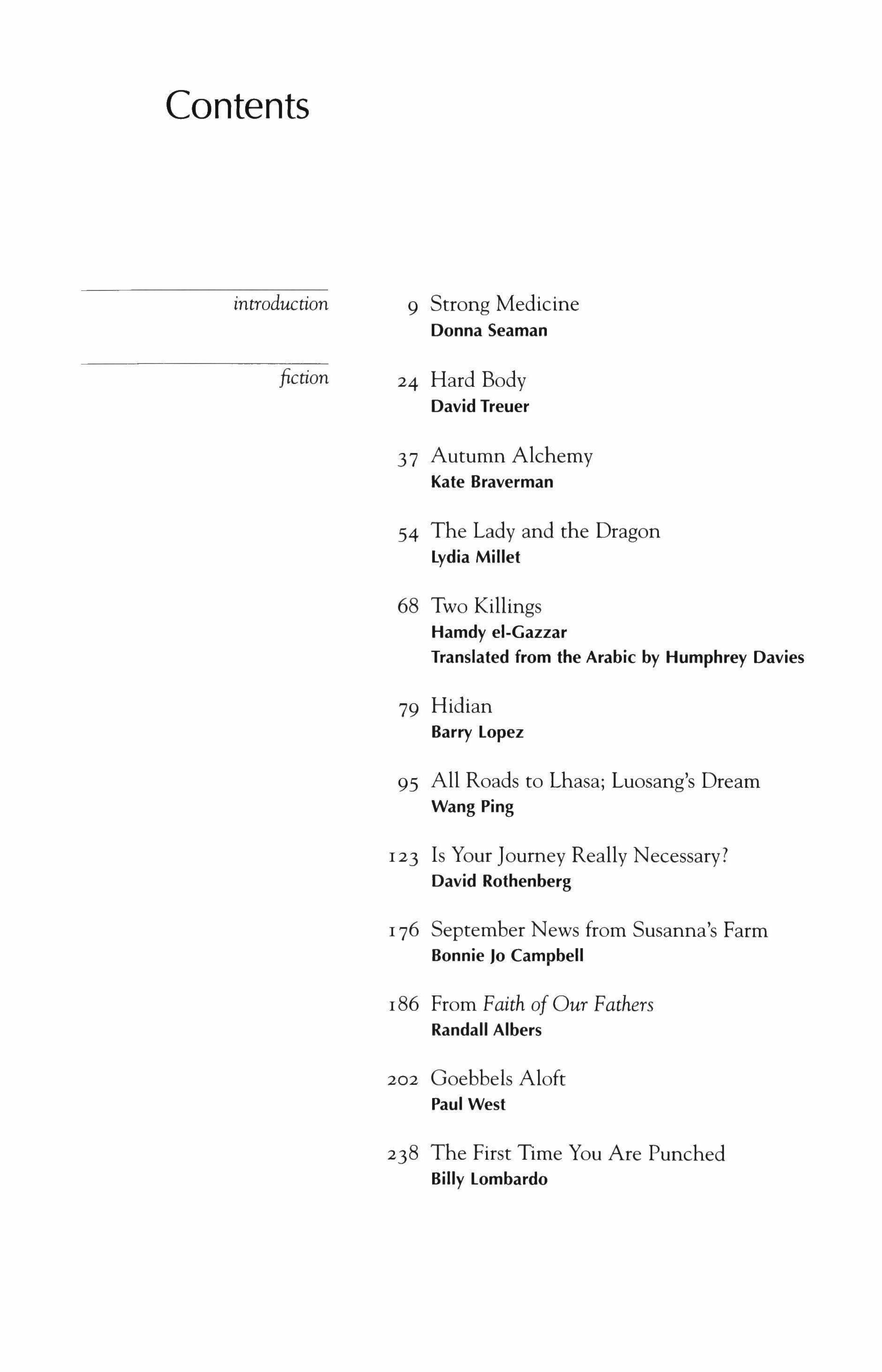
David
essays
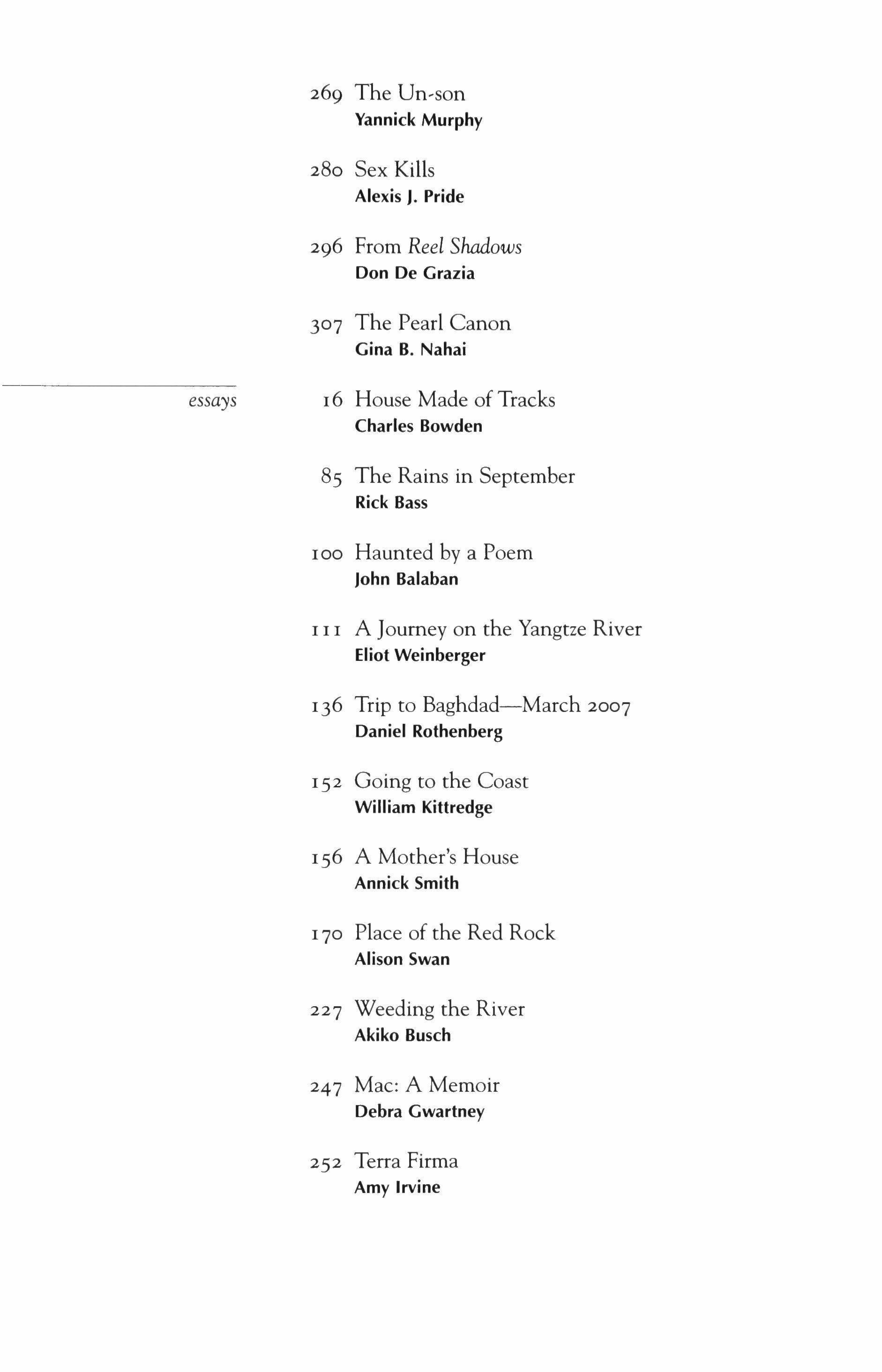
269 The Un-son
Yannick Murphy
280 Sex Kills
Alexis J. Pride
296 From Reel Shadows
Don De Grazia
307 The Pearl Canon
Gina B. Nahai
16 House Made of Tracks
Charles Bowden
85 The Rains in September
Rick Bass
100 Haunted by a Poem
John Balaban
III A Journey on the Yangtze River
Eliot Weinberger
136 Trip to Baghdad-March 2007
Daniel Rothenberg
152 Going to the Coast
William Kittredge
156 A Mother's House
Annick Smith
170 Place of the Red Rock
Alison Swan
227 Weeding the River
Akiko Busch
247 Mac: A Memoir
Debra Gwartney
252 Terra Firma
Amy Irvine
318 Bed Times
Angela Bonavogliapoetry 15 I Believe
Jim Harrison
66 Nothing Was Ever Better Than Before
Barbara Ras
92 after an apocalypse, China 2008; Qi
Steven Schroeder
150 Twenty-nine Palms
CristinaGarda
220 From A Monster's Notes
Laurie Sheck235 Goldenrod; In Palm Beach
Diane Ackerman
photography 163 Neighborhood Industry
Jon Fjortoft
323 Contributors
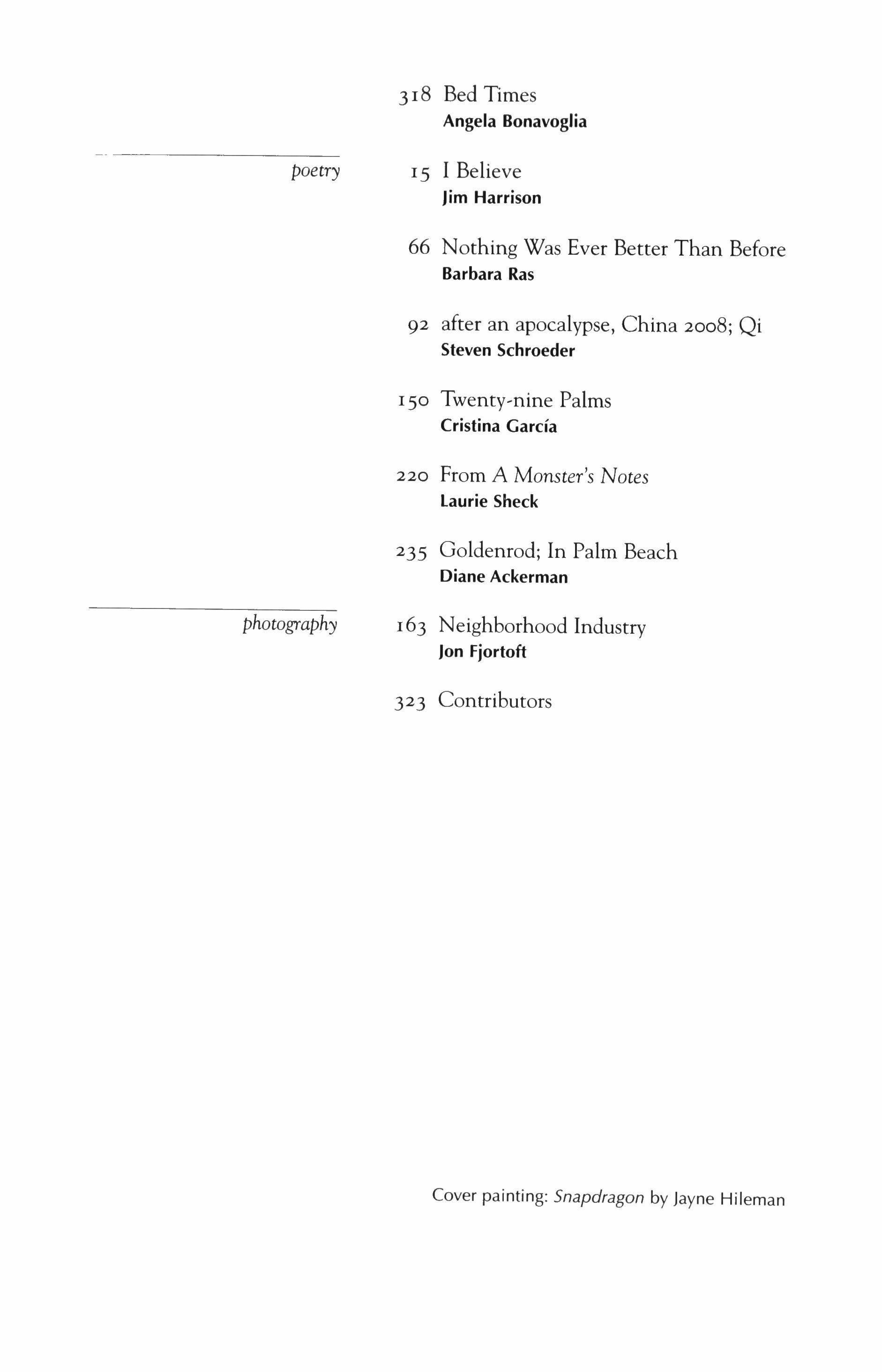
Cover painting: Snapdragon by Jayne Hileman

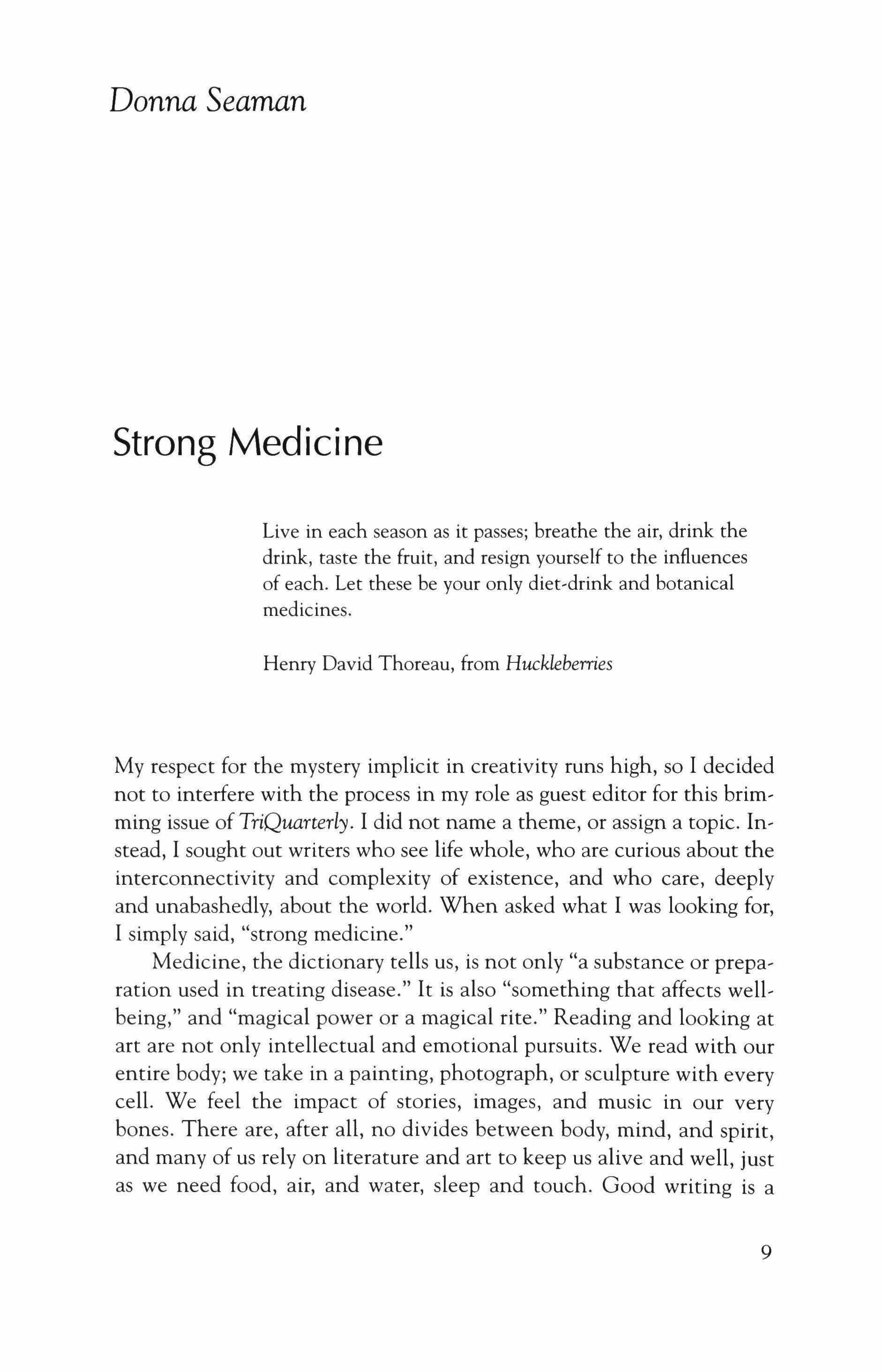
Live in each season as it passes; breathe the air, drink the drink, taste the fruit, and resign yourself to the influences of each. Let these be your only diet-drink and botanical medicines.
Henry David Thoreau, from Huckleberries
My respect for the mystery implicit in creativity runs high, so I decided not to interfere with the process in my role as guest editor for this brimming issue of TriQuarterly. I did not name a theme, or assign a topic. Instead, I sought out writers who see life whole, who are curious about the interconnectivity and complexity of existence, and who care, deeply and unabashedly, about the world. When asked what I was looking for, I simply said, "strong medicine."
Medicine, the dictionary tells us, is not only "a substance or preparation used in treating disease." It is also "something that affects wellbeing," and "magical power or a magical rite." Reading and looking at art are not only intellectual and emotional pursuits. We read with our entire body; we take in a painting, photograph, or sculpture with every cell. We feel the impact of stories, images, and music in our very bones. There are, after all, no divides between body, mind, and spirit, and many of us rely on literature and art to keep us alive and well, just as we need food, air, and water, sleep and touch. Good writing is a
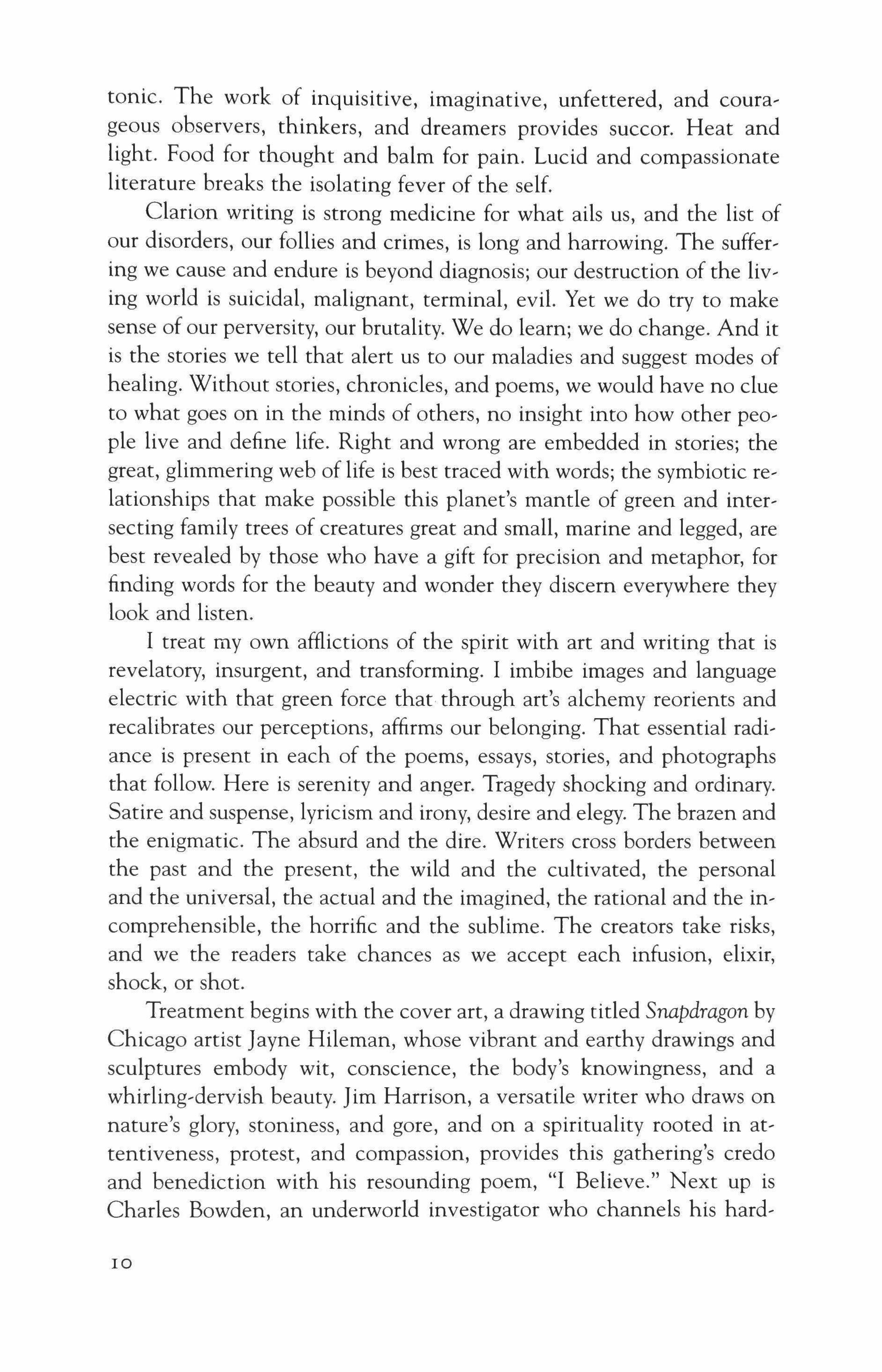
tonic. The work of inquisitive, imaginative, unfettered, and courageous observers, thinkers, and dreamers provides succor. Heat and light. Food for thought and balm for pain. Lucid and compassionate literature breaks the isolating fever of the self.
Clarion writing is strong medicine for what ails us, and the list of our disorders, our follies and crimes, is long and harrowing. The suffering we cause and endure is beyond diagnosis; our destruction of the living world is suicidal, malignant, terminal, evil. Yet we do try to make sense of our perversity, our brutality. We do learn; we do change. And it is the stories we tell that alert us to our maladies and suggest modes of healing. Without stories, chronicles, and poems, we would have no clue to what goes on in the minds of others, no insight into how other people live and define life. Right and wrong are embedded in stories; the great, glimmering web of life is best traced with words; the symbiotic relationships that make possible this planet's mantle of green and intersecting family trees of creatures great and small, marine and legged, are best revealed by those who have a gift for precision and metaphor, for finding words for the beauty and wonder they discern everywhere they look and listen.
I treat my own afflictions of the spirit with art and writing that is revelatory, insurgent, and transforming. I imbibe images and language electric with that green force that through art's alchemy reorients and recalibrates our perceptions, affirms our belonging. That essential radiance is present in each of the poems, essays, stories, and photographs that follow. Here is serenity and anger. Tragedy shocking and ordinary. Satire and suspense, lyricism and irony, desire and elegy. The brazen and the enigmatic. The absurd and the dire. Writers cross borders between the past and the present, the wild and the cultivated, the personal and the universal, the actual and the imagined, the rational and the incomprehensible, the horrific and the sublime. The creators take risks, and we the readers take chances as we accept each infusion, elixir, shock, or shot.
Treatment begins with the cover art, a drawing titled Snapdragon by Chicago artist Jayne Hileman, whose vibrant and earthy drawings and sculptures embody wit, conscience, the body's knowingness, and a whirling-dervish beauty. Jim Harrison, a versatile writer who draws on nature's glory, stoniness, and gore, and on a spirituality rooted in attentiveness, protest, and compassion, provides this gathering's credo and benediction with his resounding poem, "I Believe." Next up is Charles Bowden, an underworld investigator who channels his hard-

won knowledge, stoked fury, and cloaked concern into high-voltage reports from the edge. His blazing essay, "House Made of Tracks," set on our nation's desert borderland, marks out the terrain for all that follows, a place of struggle, blood, and buried memories where the dead are always with us.
This is a landscape and mindscape David Treuer knows well, and he takes us there in "Hard Body," a wrenching short story about a soldier back from Iraq working as an ambulance driver on an Indian reservation. Kate Braverman is also attuned to the shadow side of human endeavors, and fuses a radioactive lyricism with a cauterizing view of societal ills in "Autumn Alchemy," a short story about a mercenary molecular biologist who undergoes a radical metamorphosis. A Komodo dragon, Sharon Stone, and an Indonesian billionaire convene in "The Lady and the Dragon," a shattering story by Lydia Millet, a writer who conducts eviscerating moral and spiritual inquiries in fiction that melds sorrow and wit, sensuous realism and precise satire. In Egyptian writer Hamdy el-Gazzar's riveting tale, "Two Killings," one man's need to make a living, and his longing to make something of himself, turn treacherous in a land poisoned by violence and corruption. Set a world away in Chicago, Barry Lopez's stabbing story, "Hidian," is also an intense first-person tale about a man in trouble, albeit in a more subtly bankrupt society.
Poems punctuate the flow of stories and essays with injections of beauty and to-the-pointness. Barbara Ras, fluent in our species's contrariness and earth's resplendence, takes aim at our delusions in "Nothing Was Ever Better Than Before." Cristina Garda, revered for her inventive, culturally rich fiction, performs a stunning feat of distillation in her poem, "Twenty-nine Palms." Diane Ackerman brings overlooked aspects of nature to the fore in unexpected and striking ways in "Goldenrod" and "In Palm Beach." Laurie Sheck writes from the point of view of the "monster" in Mary Shelley's Frankenstein, imagining that the monster is alive and busy studying humankind. While poet Sheck humanizes an imaginary, misunderstood monster who has become part of our collective consciousness, the incomparable and irrepressible storyteller and exuberant etymologist Paul West revisits a true-life monster in his audacious and devilish story, "Goebbels Aloft."
What we call nature, that is, everything on Earth that isn't human, has been the subject of our art and stories since the earliest cave paintings to today's most expressive environmental writing. The art of nature

writing-ofdelving deeply into the life and history of a certain valley or desert, mountain, coast, river or pond-has been a key and increasingly urgent aspect of American letters as generation by generation we have heedlessly exploited, looted, and abused the living world. Rick Bass is an essential voice in praise and defense of the wild. His essay, "The Rains in September," is from a journal covering a year watching a cherished Montana marsh. Alison Swan writes in a similar vein about a small bedrock island in Lake Superior, and Akiko Busch chronicles the impact of an invasive species in the Hudson River. Each of these attentive and knowledgeable writers reveals dimensions of life most of us never detect.
Photographers also capture facets of life that are hiding in plain sight. The Midwest can seem uniform and dull, but look more closely and you'll discern its muted beauty, its prairie luster. Jon Fjortoft focuses on the meeting of the organic and the human-made in his Illinois architectural series, "Neighborhood Industry." Low-key in their elegance, wit, and appreciation, Fjortoft's portraits of small industrial buildings invite close reading.
Place and work give shape and velocity to fiction, and no setting combines the two with more resonance than a family farm. Two heartland writers take very different approaches to farm life, blasting assumptions and tracking an immensity of change. Bonnie [o Campbell portrays an independent woman and a mother of five who finds herself welcoming unforeseen variations on life and love on her loosely tended Michigan farm. In "Faith of Our Fathers," Randall Albers digs deeply into the loam of pride and misery tilled by several generations of a stoic Minnesota farming family.
While many writers concentrate on home, others write of journeys. China is both destination and catalyst for Steven Schroeder's gracefully unnerving poems, two devastating short stories by Wang Ping, and Eliot Weinberger's poetic and sly travel essay. Poet, memoirist, and translator John Balaban takes us to Vietnam in his deeply affecting meditation on war, poetry, and healing. Philosopher and musician David Rothenberg, whose nonfiction books offer new insights into the songs of birds and whales, presents a work of fiction about a quest for wisdom in Norway wryly tided, "Is Your Journey Really Necessary?" Writing with stinging matter-of-factness, Daniel Rothenberg, of DePaul University's International Human Rights Law Institute, chronicles his quest for justice in real-life dispatches from Iraq.
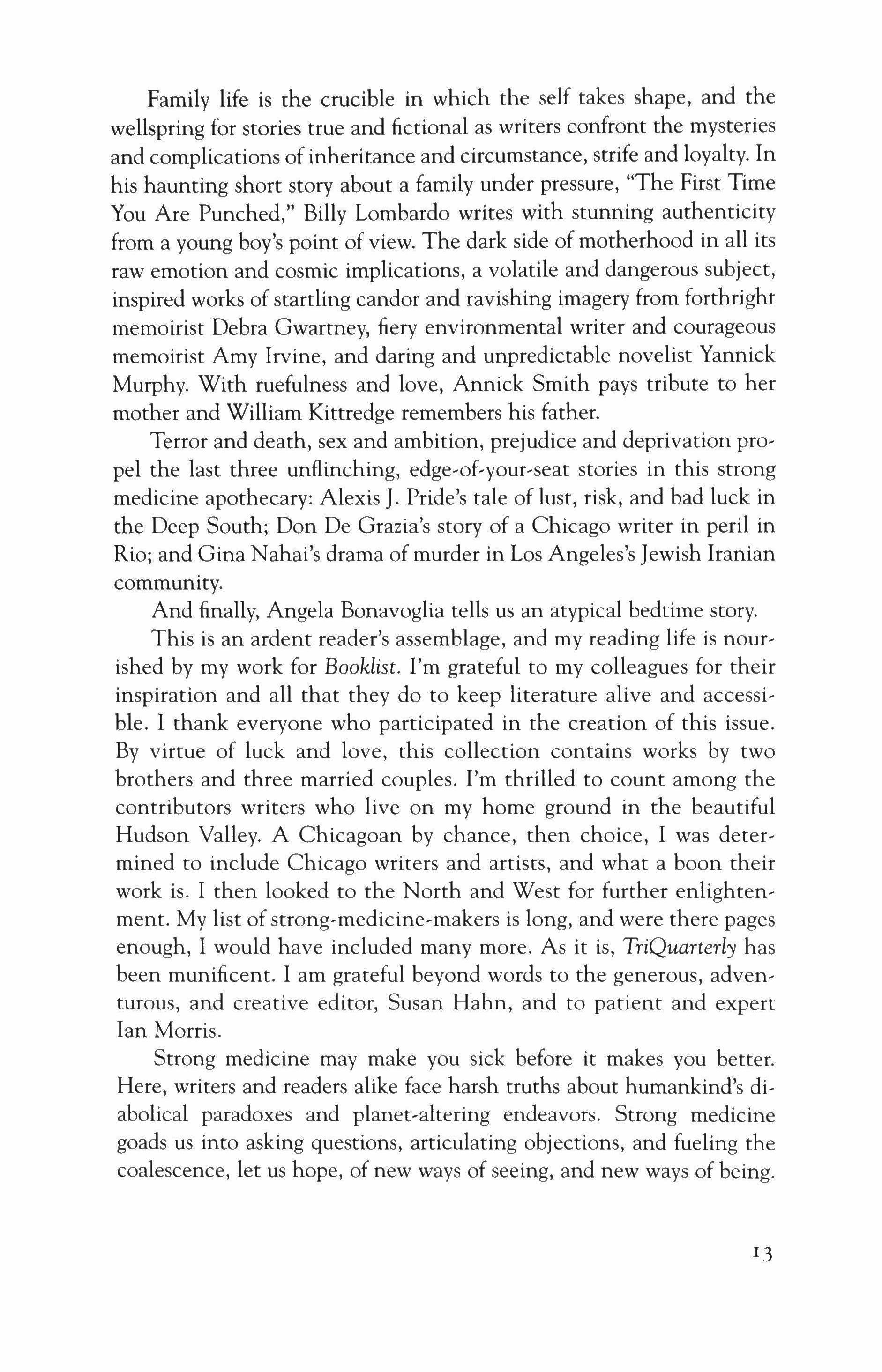
Family life is the crucible in which the self takes shape, and the wellspring for stories true and fictional as writers confront the mysteries and complications of inheritance and circumstance, strife and loyalty. In his haunting short story about a family under pressure, "The First Time You Are Punched," Billy Lombardo writes with stunning authenticity from a young boy's point of view. The dark side of motherhood in all its raw emotion and cosmic implications, a volatile and dangerous subject, inspired works of startling candor and ravishing imagery from forthright memoirist Debra Gwartney, fiery environmental writer and courageous memoirist Amy Irvine, and daring and unpredictable novelist Yannick Murphy. With ruefulness and love, Annick Smith pays tribute to her mother and William Kittredge remembers his father.
Terror and death, sex and ambition, prejudice and deprivation propel the last three unflinching, edge-of-your-seat stories in this strong medicine apothecary: Alexis J. Pride's tale of lust, risk, and bad luck in the Deep South; Don De Grazia's story of a Chicago writer in peril in Rio; and Gina Nahai's drama of murder in Los Angeles's Jewish Iranian community.
And finally, Angela Bonavoglia tells us an atypical bedtime story. This is an ardent reader's assemblage, and my reading life is nourished by my work for Booklist. I'm grateful to my colleagues for their inspiration and all that they do to keep literature alive and accessible. I thank everyone who participated in the creation of this issue. By virtue of luck and love, this collection contains works by two brothers and three married couples. I'm thrilled to count among the contributors writers who live on my home ground in the beautiful Hudson Valley. A Chicagoan by chance, then choice, I was determined to include Chicago writers and artists, and what a boon their work is. I then looked to the North and West for further enlightenment. My list of strong-medicine-makers is long, and were there pages enough, I would have included many more. As it is, TriQuarterly has been munificent. I am grateful beyond words to the generous, adventurous, and creative editor, Susan Hahn, and to patient and expert Ian Morris.
Strong medicine may make you sick before it makes you better. Here, writers and readers alike face harsh truths about humankind's diabolical paradoxes and planet-altering endeavors. Strong medicine goads us into asking questions, articulating objections, and fueling the coalescence, let us hope, of new ways of seeing, and new ways of being.

Bitter and sweet, caustic and cleansing, chilling and warming, these works of art deliver insight, catharsis, and communion, and heighten our appreciation for life's insistence and splendor, pattern and randomness, vulnerability and resilience.
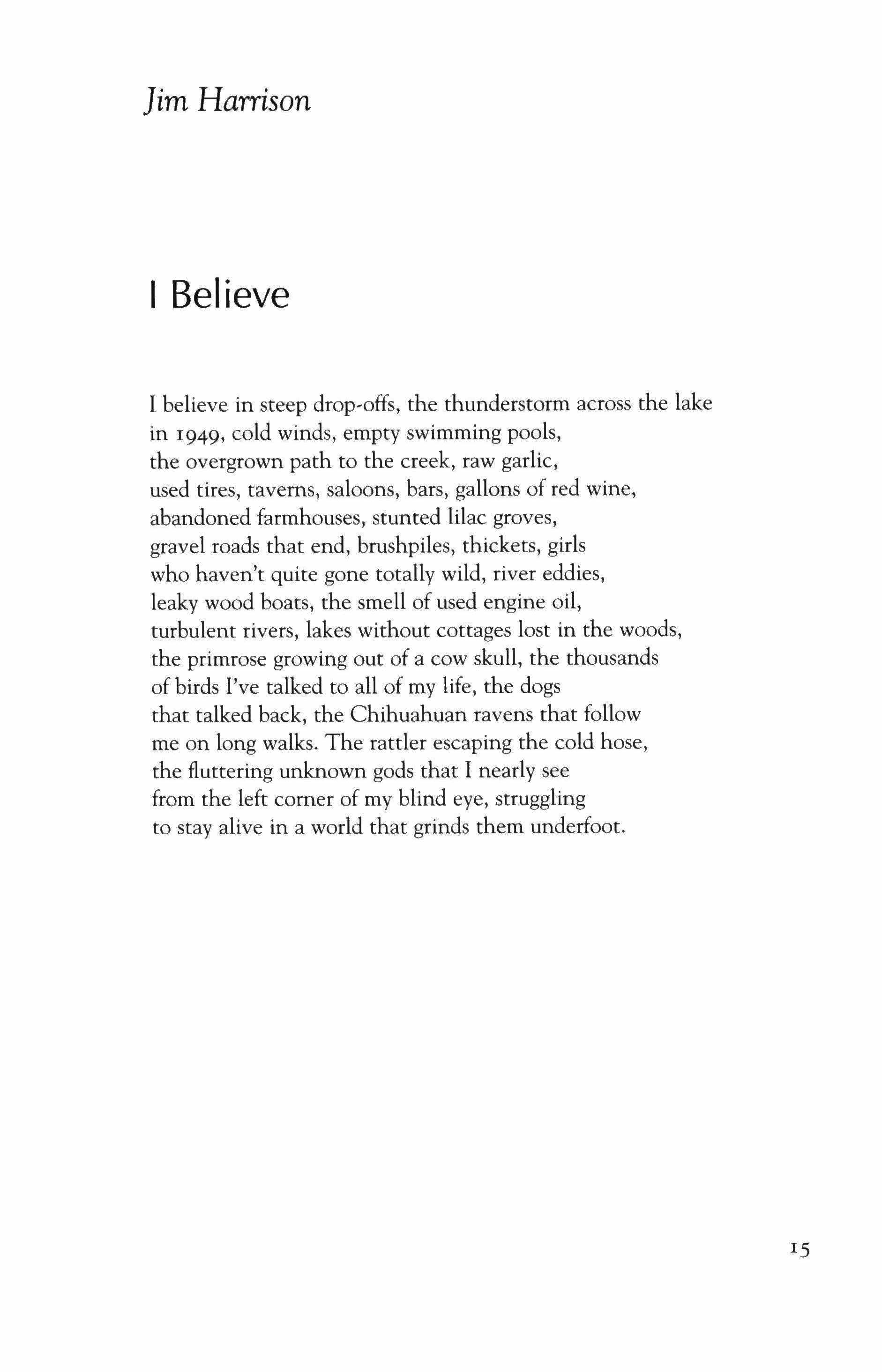
I believe in steep drop-offs, the thunderstorm across the lake in 1949, cold winds, empty swimming pools, the overgrown path to the creek, raw garlic, used tires, taverns, saloons, bars, gallons of red wine, abandoned farmhouses, stunted lilac groves, gravel roads that end, brushpiles, thickets, girls who haven't quite gone totally wild, river eddies, leaky wood boats, the smell of used engine oil, turbulent rivers, lakes without cottages lost in the woods, the primrose growing out of a cow skull, the thousands of birds I've talked to all of my life, the dogs that talked back, the Chihuahuan ravens that follow me on long walks. The rattler escaping the cold hose, the fluttering unknown gods that I nearly see from the left comer of my blind eye, struggling to stay alive in a world that grinds them underfoot.

Everybody knows this is nowhere.
To the west, the ground is largely a mystery to whites, an enormous grassland where the great southern herd feeds. Deserts brood and men dream of mines. Jagged mountains slice through the ground. The fangs of canyons assault any notion of easy passage.
The weather is not faithful. The rains come or do not come, the storms rage or there is nothing in the sky for months. The beasts thrive, or vanish without warning. Some years the rivers rise. Other years, the rivers die. People steal other people. And then the stolen people sometimes become new people. There are many tongues, and many kinds of faces and colors.
Old ways of knowing meet even older ways of knowing and this collision of beliefs draws blood.
We are body and souls the result of unsteady weather. The last million years were kind of crazy after sixty-five million years of slow change, a long drag we call the Tertiary. And then in a moment we've dubbed the Pleistocene, the very time when we belched forth as a species from the cauldron of life, the skies mutinied and no one could trust the weather. The ice left twelve to eight thousand years ago, and things got pretty calm and dependable and we set about this gambit called civilization.' Except here, in this place to which we now come.
I. For a concise overview of the recent arrival of the grasslands of the West see Stephen R. Jones and Ruth Carol Cushman, The North American Prairie, Houghton Mifflin Company, Boston, 2004, pp. 7-2I.

Here, the weather never settled down, not really, and the very forces that raked out lives earlier persisted, the uncertainties that made us such inventive, conniving and opportunistic creatures. Here, both the better and darker angels of our nature could endure in a state of high barbarism. Here, the wellsprings of our genius and violence remained as sharp as the crack of dawn on the deserts of our life.2 And now, the wild swings of weather are back everywhere and the lash of the sky is felt here more than other places.
Here, our ultimate dreams of power erupt and here these dreams tum to nightmares that still haunt our lives. The ground remains, un� caring, unconcerned, and beyond our destruction and redemption. The ground in this zone is both our touchstone and our terror and it owns me and has brought me to this book and journey.
They meet in 1870 in Fort Worth, an outpost staring into a void. Texas is part of a nation, but the real force of that nation lies to the east where the rains come and the world seems normal. To the south is Mexico, but it too only really exists more than a thousand miles to the south where the great central plateau has been the floor under civilizations for more than a thousand years. Between these wet centers is a zone without a name, a place where rains often fail, where men and women and children live beyond the control of the official nations.
So Edmund Jackson Davis comes with his young boy, Britton, to meet with the chiefs of two peoples, the Comanche and the Kiowa. Davis is governor of Texas. The chiefs have brought him a present to seal a peace between his people and their people, a big robe made from the skins of six lobos, the wolves of the plains. The robe runs eight to nine feet long and four to five feet wide. The chiefs apologize that the peace conference has been called so suddenly that the robe is, alas, unfinished. They point out to the governor that both sides and one end are festooned with human scalps, one dangling from each running foot. Three of the scalps are ripped from the heads of women.
But the fourth side is as yet unfinished.
The chiefs also tell the governor that they have taken care to make sure that none of the scalps are from white people-simply the hair taken from other Indians or from Mexicans. This selection, they note, is deliberate, so that the governor will feel no discomfort from the gift.
Davis speaks with great diplomacy. He tells the chiefs that he knows
2. R. Dale Gutherie, The Nature of Paleolithic Art, University of Chicago, 2005, p. 22.

the scalps are proof of valor for the warriors, and because of that fact, he cannot accept them since they belong with the men who took them in combat. So they are removed and the unadorned robe is given to the governor.
Now all four sides are naked. The great robe will never be finished. And in time will vanish into the dust of history and be lost to memory.
A kind of peace will eventually come, just as claims of power will be made by the nations. The boy Britton, for example, will become a soldier and fight in the Apache wars against Geronimo, then start up a cattle operation in Mexico, become worth at least $750,000, and then lose everything in a whirlwind called the Mexican Revolution. The tribes will be crushed and penned in a place called Oklahoma. The great herds will die and other beasts will enter the country. The wolves will disappear and howl no more.
The great grasslands that ride high benches in the hot desert will persist. The tumult of the zone claimed by two nations, and controlled by no one, will persist also. The lines on the map will be etched with more and more force and yet remain frail on the ground itself.
The great robe never gets its rightful complement of scalps. There is that naked side at the treaty signing. And then, because of decorum on the governor's part, there is the mutilation of the gift that cleanses it of the real life of the place.
My life is as broken as the ground that made me. I have spent a lifetime now on this line watching the murder of the earth all around me. We are heavy feeders and rough estimates now indicate we consume through our throats and hungers and those of our beasts somewhere between thirty and fifty percent of the photosynthesis of the planet.' The grasses vanish, the forests go, the fish disappear from the sea, the howls end in the night, and we sleep with a lullaby of sirens in our ears. I am not here to lament, or complain. I simply wish to stop denying this obvious past and present.
This place strikes a history of tumult, one lost to view in the fantasy of power buried in the word "settlement." The borders are seen as sacred, the populations as part of an almost divine plan, the Indians as something that grew out of the ground and communed with deep spirits, the stability of title and law as inevitable and irrevocable. All this
3. Marc L. Imhoff, Lahoauri Bounoua, Taylor Ricketts, Colby Loucks, Robert Harriss, William T. Lawrence, "Global Patterns In Human Consumption of Net Primary Production," Science, 429, (June 2004).

is a fantasy, a false reading of little more than a century of calm on this ground."
It is fall in 1660 and Diego Romero and five other men ride from Santa Fe into the grasslands to the east. The governor has sent them to buy the hides of buffalo and antelope. They find an Apache village, and Romero announces to the tribesmen he would like to haggle awhile. And he would also like to leave a son behind. There is a dance, Romero is placed on a hide and tossed in time to the movements. Then he is thrown into a tent, and a young girl is given him. In the morning, the tribesmen check to see if he has had sex with her. He has. They place blood on his chest, a feather in his hair, announce he is now a captain of their nation. And also, they give him the promised hides.i
The moment hangs there and is a mystery to us just as the Apaches and other Indians were baffled by the large bones left by the vanished, giant creatures from the ice age that had receded from memory. A Spanish governor wants hides. He sends a small party east into the grass. The leader of the party wants to impregnate a woman. He does. And is brought into the tribe.
It is a whisper from a past characterized by instability, slavery, and murder. And carelessness about the land. Now my ears are full of talk of security and homeland and invasion by other bloods. I live in a place driven by greed and fear, a place fed by ignorance.
What happened in North America was not an isolated instance. From around 1500 forward, Europe exploded onto the surface of the earth for reasons still debated over sherry and port by scholars. For example, the Russian empire from the mid-fourteenth century onward grew at a rate of 55 square miles a day, or about 20,000 square miles a year and did this day after day and year after year for four centuries.? The Spanish and Portuguese over the same centuries swallowed South and Central America plus chunks of Africa and Asia. And then, of course, there is Great Britain, France and Germany and their creative appetites
4. For a graphic representation of the tumult of the continent over time see Helen Hornbeck Tanner, ed., The Settling of North America: the atlas of the great migrations into North America from the ice age to the present, Macmillan, New York, 1995. Note especially the computerized map of Arkansas on p. 14 with the 21,700 known pre-European occupation sites. And the Clovis kill sites on p. 21 with a mammoth kill in the state of Puebla in Mexico. This landscape has always been in play.
5. James F. Brooks, Captains & Cousins: slavery, kinship and community in the Southwest borderlands, University of North Carolina Press, Chapel Hill, 2002, pp. 28-29.
6. Peter Hopkirk, The Great Game: the struggle for empire in Central Asia, Kodansha International, New York, 1994, p. 5·
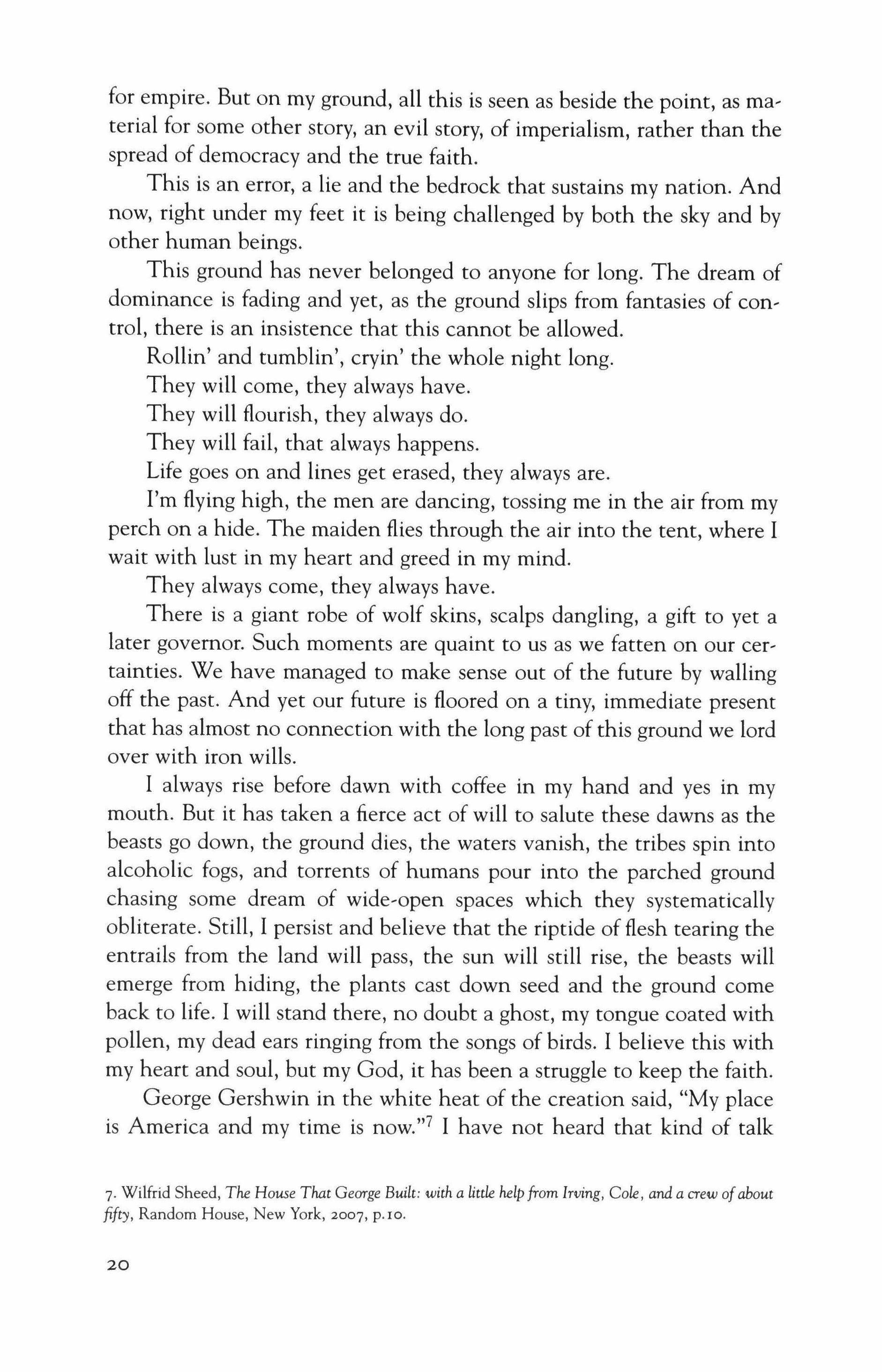
for empire. But on my ground, all this is seen as beside the point, as material for some other story, an evil story, of imperialism, rather than the spread of democracy and the true faith.
This is an error, a lie and the bedrock that sustains my nation. And now, right under my feet it is being challenged by both the sky and by other human beings.
This ground has never belonged to anyone for long. The dream of dominance is fading and yet, as the ground slips from fantasies of control, there is an insistence that this cannot be allowed.
Rollin' and tumblin', cryin' the whole night long.
They will come, they always have.
They will flourish, they always do.
They will fail, that always happens.
Life goes on and lines get erased, they always are.
I'm flying high, the men are dancing, tossing me in the air from my perch on a hide. The maiden flies through the air into the tent, where I wait with lust in my heart and greed in my mind.
They always come, they always have.
There is a giant robe of wolf skins, scalps dangling, a gift to yet a later governor. Such moments are quaint to us as we fatten on our certainties. We have managed to make sense out of the future by walling off the past. And yet our future is floored on a tiny, immediate present that has almost no connection with the long past of this ground we lord over with iron wills.
I always rise before dawn with coffee in my hand and yes in my mouth. But it has taken a fierce act of will to salute these dawns as the beasts go down, the ground dies, the waters vanish, the tribes spin into alcoholic fogs, and torrents of humans pour into the parched ground chasing some dream of wide-open spaces which they systematically obliterate. Still, I persist and believe that the riptide of flesh tearing the entrails from the land will pass, the sun will still rise, the beasts will emerge from hiding, the plants cast down seed and the ground come back to life. I will stand there, no doubt a ghost, my tongue coated with pollen, my dead ears ringing from the songs of birds. I believe this with my heart and soul, but my God, it has been a struggle to keep the faith.
George Gershwin in the white heat of the creation said, "My place is America and my time is now.?" I have not heard that kind of talk
7. Wilfrid Sheed, The House That George Built: with a little helpfrom Irving, Cole, and a crew ofabout fifty, Random House, New York, 2007, p.IO.
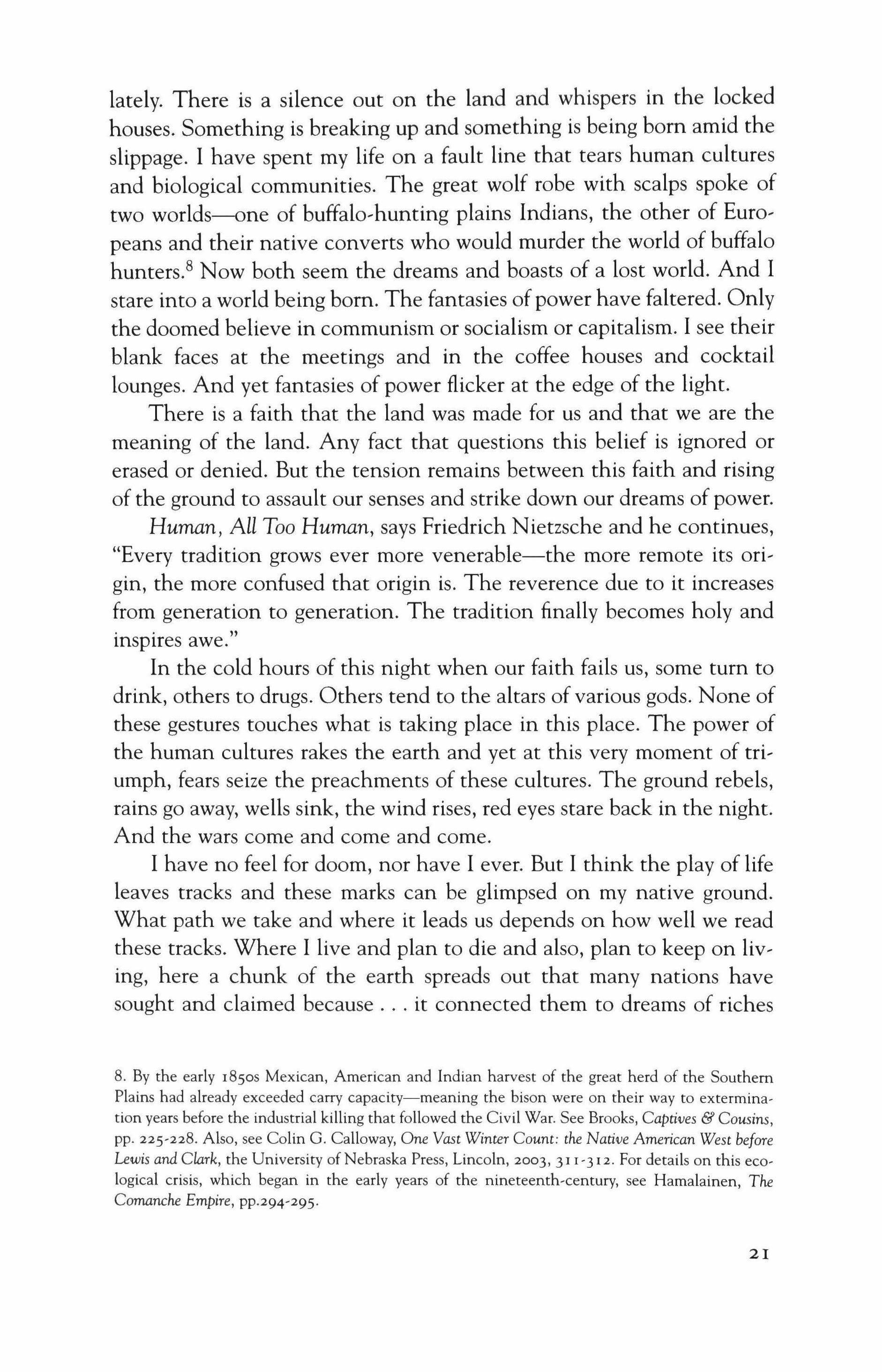
lately. There is a silence out on the land and whispers in the locked houses. Something is breaking up and something is being born amid the slippage. I have spent my life on a fault line that tears human cultures and biological communities. The great wolf robe with scalps spoke of two worlds--one of buffalo-hunting plains Indians, the other of Europeans and their native converts who would murder the world of buffalo hunters.f Now both seem the dreams and boasts of a lost world. And I stare into a world being born. The fantasies of power have faltered. Only the doomed believe in communism or socialism or capitalism. I see their blank faces at the meetings and in the coffee houses and cocktail lounges. And yet fantasies of power flicker at the edge of the light.
There is a faith that the land was made for us and that we are the meaning of the land. Any fact that questions this belief is ignored or erased or denied. But the tension remains between this faith and rising of the ground to assault our senses and strike down our dreams of power.
Human, All Too Human, says Friedrich Nietzsche and he continues, "Every tradition grows ever more venerable-the more remote its origin, the more confused that origin is. The reverence due to it increases from generation to generation. The tradition finally becomes holy and inspires awe."
In the cold hours of this night when our faith fails us, some tum to drink, others to drugs. Others tend to the altars of various gods. None of these gestures touches what is taking place in this place. The power of the human cultures rakes the earth and yet at this very moment of triumph, fears seize the preachments of these cultures. The ground rebels, rains go away, wells sink, the wind rises, red eyes stare back in the night. And the wars come and come and come.
I have no feel for doom, nor have I ever. But I think the play of life leaves tracks and these marks can be glimpsed on my native ground. What path we take and where it leads us depends on how well we read these tracks. Where I live and plan to die and also, plan to keep on living, here a chunk of the earth spreads out that many nations have sought and claimed because it connected them to dreams of riches
8. By the early 1850S Mexican, American and Indian harvest of the great herd of the Southern Plains had already exceeded carry capacity-meaning the bison were on their way to extermination years before the industrial killing that followed the Civil War. See Brooks, Captives & Cousins, pp. 225-228. Also, see Colin O. Calloway, One Vast Winter Count: the Native American West before Lewis and Clark, the University of Nebraska Press, Lincoln, 2003, 31I-JI2. For details on this ecological crisis, which began in the early years of the nineteenth-century, see Hamalainen, The Comanche Empire, PP.294-295.
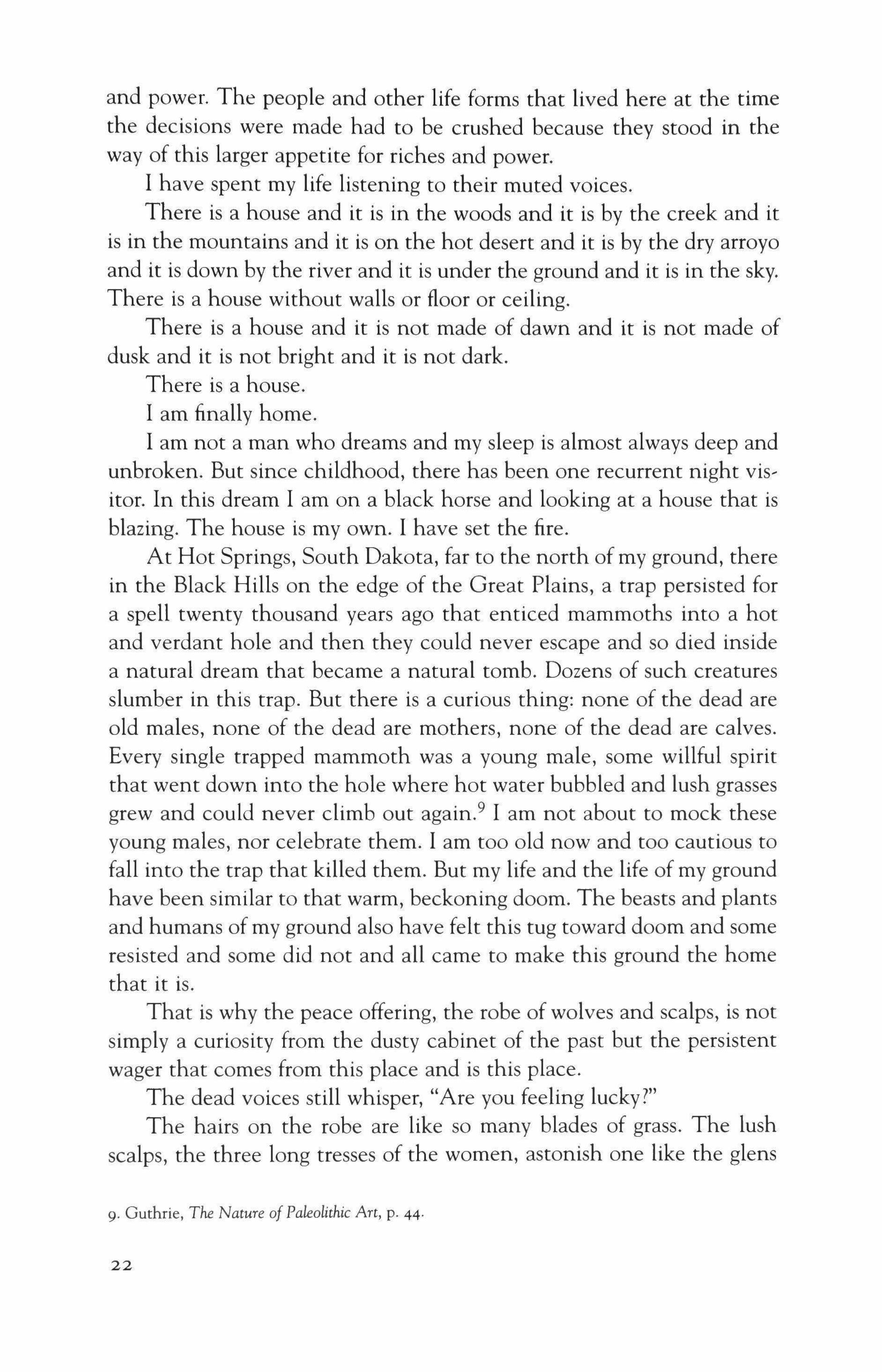
and power. The people and other life forms that lived here at the time the decisions were made had to be crushed because they stood in the way of this larger appetite for riches and power.
I have spent my life listening to their muted voices.
There is a house and it is in the woods and it is by the creek and it is in the mountains and it is on the hot desert and it is by the dry arroyo and it is down by the river and it is under the ground and it is in the sky. There is a house without walls or floor or ceiling.
There is a house and it is not made of dawn and it is not made of dusk and it is not bright and it is not dark.
There is a house.
I am finally home.
I am not a man who dreams and my sleep is almost always deep and unbroken. But since childhood, there has been one recurrent night visitor. In this dream I am on a black horse and looking at a house that is blazing. The house is my own. I have set the fire.
At Hot Springs, South Dakota, far to the north of my ground, there in the Black Hills on the edge of the Great Plains, a trap persisted for a spell twenty thousand years ago that enticed mammoths into a hot and verdant hole and then they could never escape and so died inside a natural dream that became a natural tomb. Dozens of such creatures slumber in this trap. But there is a curious thing: none of the dead are old males, none of the dead are mothers, none of the dead are calves. Every single trapped mammoth was a young male, some willful spirit that went down into the hole where hot water bubbled and lush grasses grew and could never climb out again." I am not about to mock these young males, nor celebrate them. I am too old now and too cautious to fall into the trap that killed them. But my life and the life of my ground have been similar to that warm, beckoning doom. The beasts and plants and humans of my ground also have felt this tug toward doom and some resisted and some did not and all came to make this ground the home that it is.
That is why the peace offering, the robe of wolves and scalps, is not simply a curiosity from the dusty cabinet of the past but the persistent wager that comes from this place and is this place.
The dead voices still whisper, "Are you feeling lucky?"
The hairs on the robe are like so many blades of grass. The lush scalps, the three long tresses of the women, astonish one like the glens
9. Guthrie, The Nature of Paleolithic Art, p. 44·
and canyons and springs of the region. The peace treaty fails, the wars go on for a spell. The governor loses the next election and is sent pack, ing. The dreams of power and dominance never really go away. Nor are the lessons ever really understood. The robe requires more scalps. That is clear. 10

10. Britton Davis, "Recollections of the Kiowas and Comanches," in Peter Cozzens, Eyewitnesses to the Indian Wars, r865-r890, Volume Three: Conquering the Southern Plains, Stackpole Books, Mechanicsburg, PA, 2003, PP-419-420.
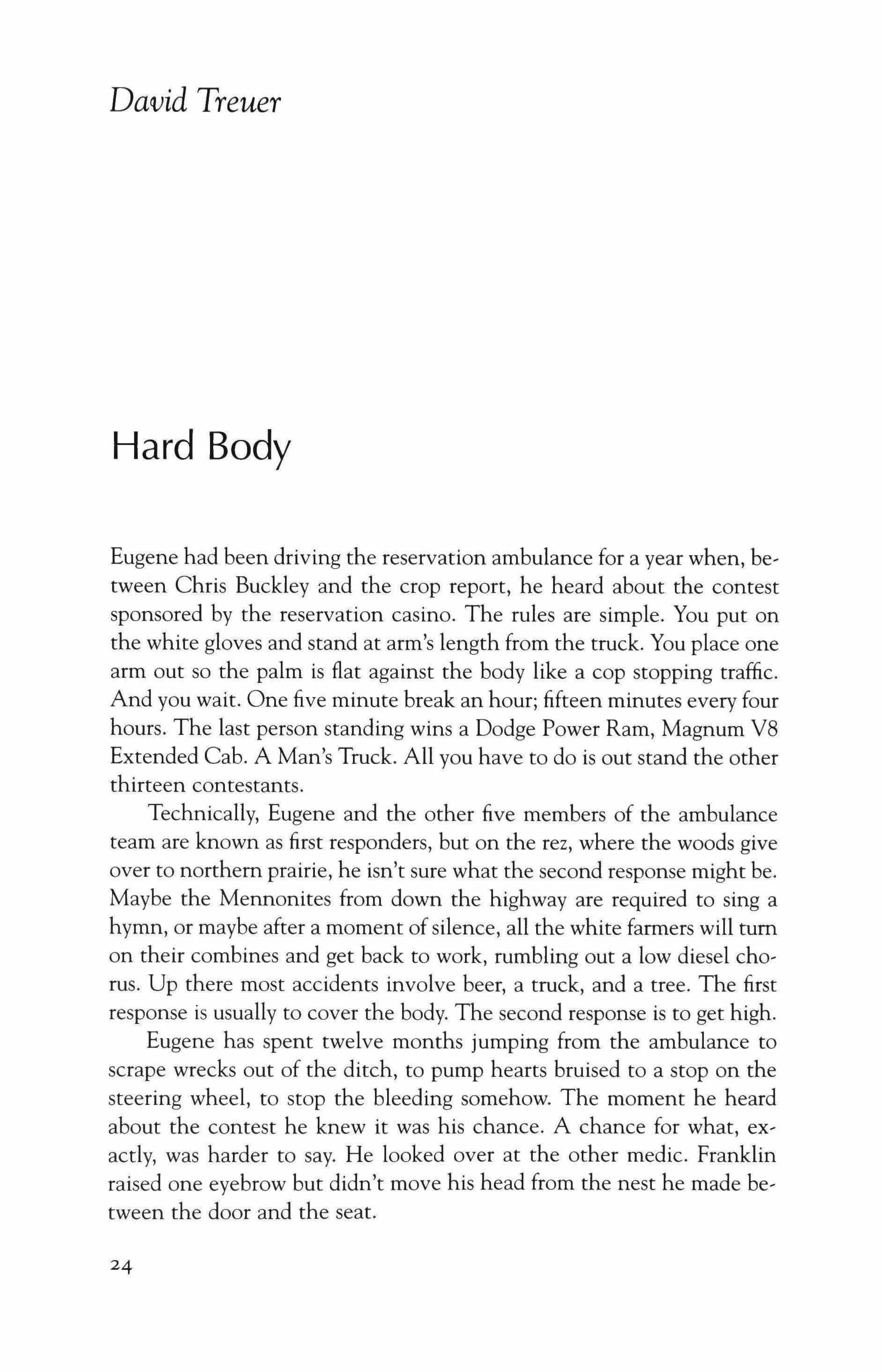
Eugene had been driving the reservation ambulance for a year when, between Chris Buckley and the crop report, he heard about the contest sponsored by the reservation casino. The rules are simple. You put on the white gloves and stand at arm's length from the truck. You place one arm out so the palm is flat against the body like a cop stopping traffic. And you wait. One five minute break an hour; fifteen minutes every four hours. The last person standing wins a Dodge Power Ram, Magnum V8 Extended Cab. A Man's Truck. All you have to do is out stand the other thirteen contestants.
Technically, Eugene and the other five members of the ambulance team are known as first responders, but on the rez, where the woods give over to northern prairie, he isn't sure what the second response might be. Maybe the Mennonites from down the highway are required to sing a hymn, or maybe after a moment of silence, all the white farmers will tum on their combines and get back to work, rumbling out a low diesel chorus. Up there most accidents involve beer, a truck, and a tree. The first response is usually to cover the body. The second response is to get high.
Eugene has spent twelve months jumping from the ambulance to scrape wrecks out of the ditch, to pump hearts bruised to a stop on the steering wheel, to stop the bleeding somehow. The moment he heard about the contest he knew it was his chance. A chance for what, exactly, was harder to say. He looked over at the other medic. Franklin raised one eyebrow but didn't move his head from the nest he made between the door and the seat.
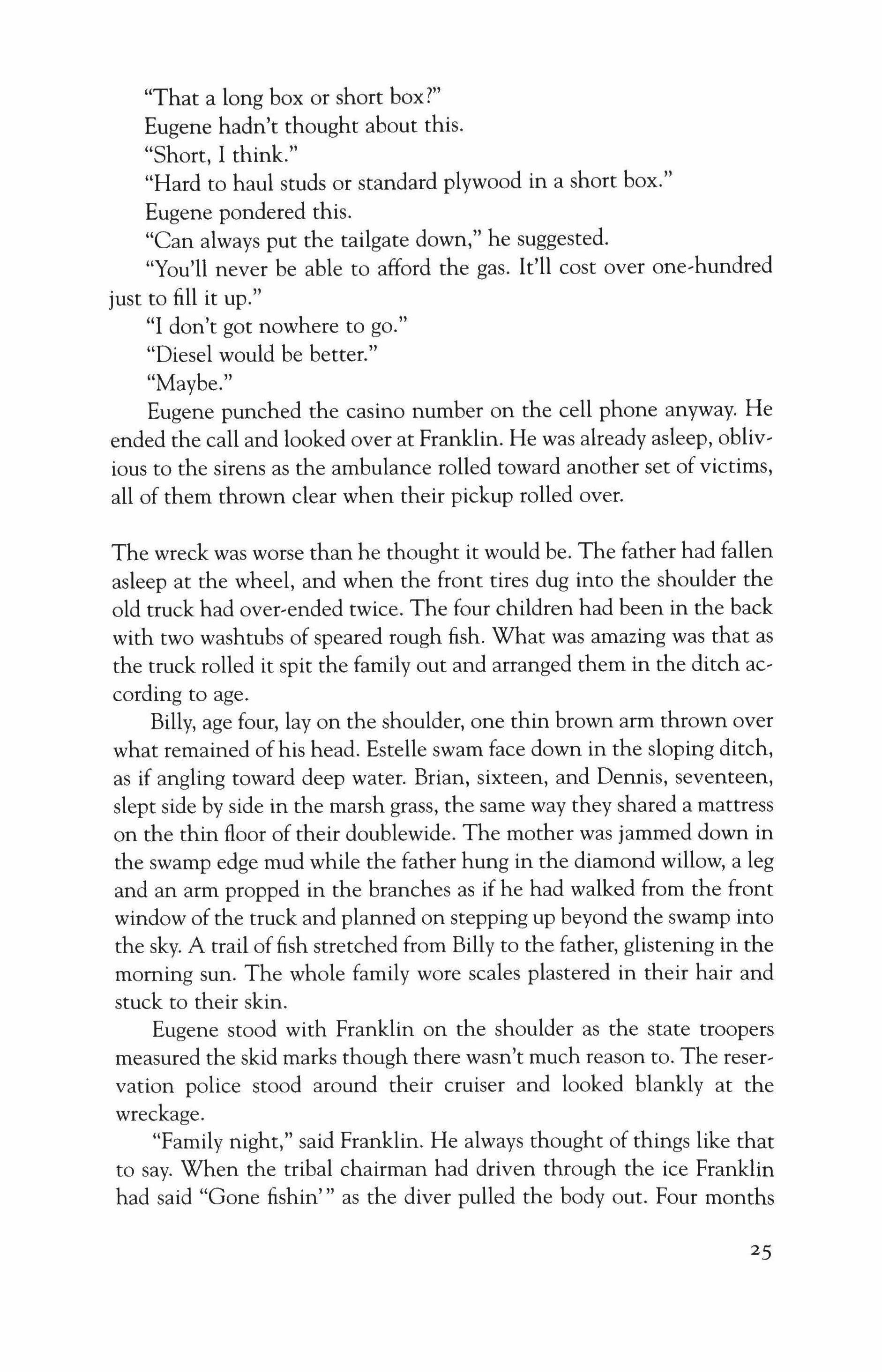
"That a long box or short box?"
Eugene hadn't thought about this.
"Short, I think."
"Hard to haul studs or standard plywood in a short box."
Eugene pondered this.
"Can always put the tailgate down," he suggested.
"You'll never be able to afford the gas. It'll cost over one-hundred just to fill it up."
"I don't got nowhere to go."
"Diesel would be better."
Eugene punched the casino number on the cell phone anyway. He ended the call and looked over at Franklin. He was already asleep, oblivious to the sirens as the ambulance rolled toward another set of victims, all of them thrown clear when their pickup rolled over.
The wreck was worse than he thought it would be. The father had fallen asleep at the wheel, and when the front tires dug into the shoulder the old truck had over-ended twice. The four children had been in the back with two washtubs of speared rough fish. What was amazing was that as the truck rolled it spit the family out and arranged them in the ditch according to age.
Billy, age four, lay on the shoulder, one thin brown arm thrown over what remained ofhis head. Estelle swam face down in the sloping ditch, as if angling toward deep water. Brian, sixteen, and Dennis, seventeen, slept side by side in the marsh grass, the same way they shared a mattress on the thin floor of their doublewide. The mother was jammed down in the swamp edge mud while the father hung in the diamond willow, a leg and an arm propped in the branches as if he had walked from the front window of the truck and planned on stepping up beyond the swamp into the sky. A trail offish stretched from Billy to the father, glistening in the morning sun. The whole family wore scales plastered in their hair and stuck to their skin.
Eugene stood with Franklin on the shoulder as the state troopers measured the skid marks though there wasn't much reason to. The reservation police stood around their cruiser and looked blankly at the wreckage.
"Family night," said Franklin. He always thought of things like that to say. When the tribal chairman had driven through the ice Franklin had said "Gone fishin'" as the diver pulled the body out. Four months
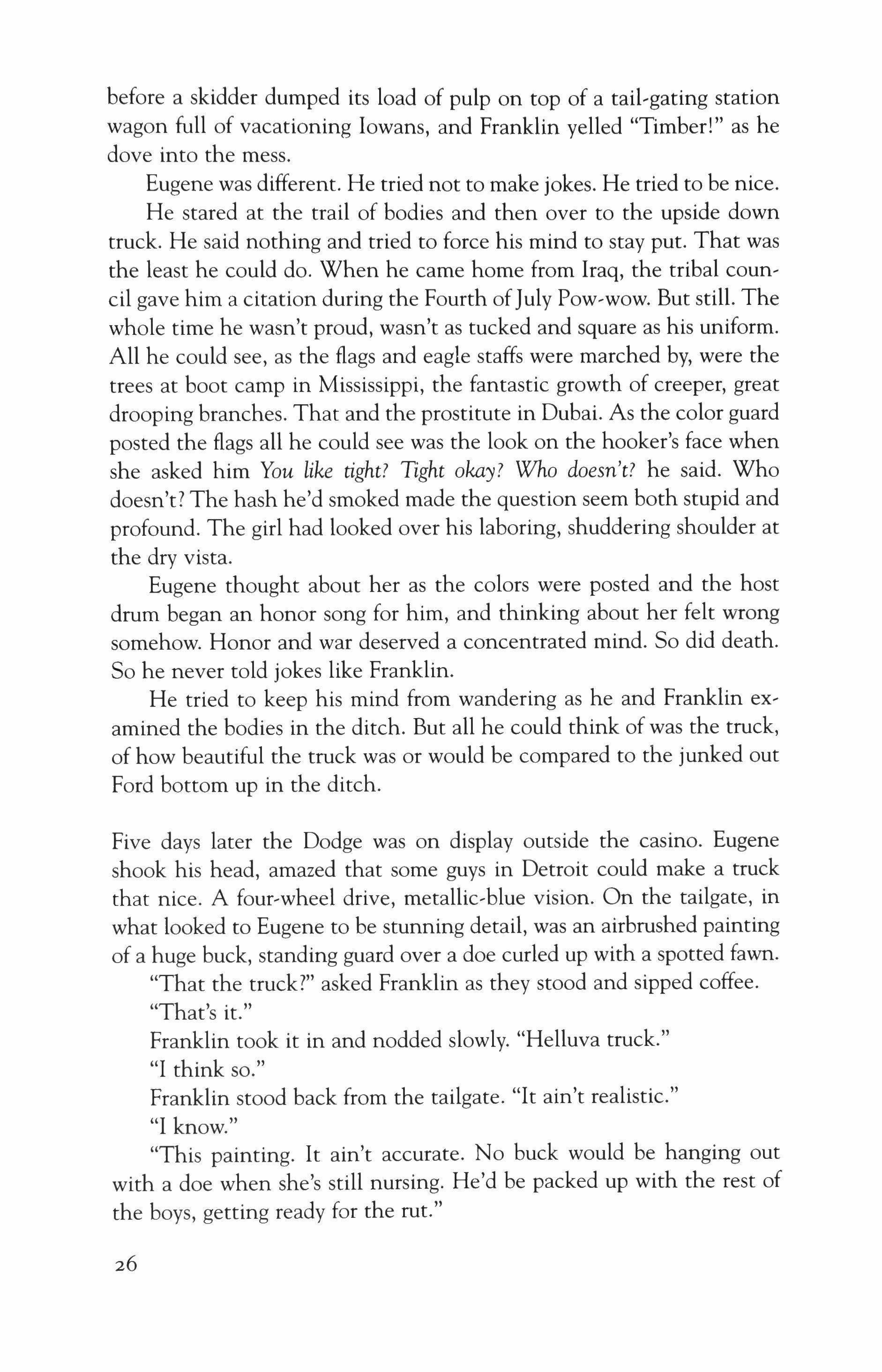
before a skidder dumped its load of pulp on top of a tail-gating station wagon full of vacationing Iowans, and Franklin yelled "Timber!" as he dove into the mess.
Eugene was different. He tried not to make jokes. He tried to be nice. He stared at the trail of bodies and then over to the upside down truck. He said nothing and tried to force his mind to stay put. That was the least he could do. When he came home from Iraq, the tribal council gave him a citation during the Fourth ofjuly Pow-wow, But still. The whole time he wasn't proud, wasn't as tucked and square as his uniform. All he could see, as the flags and eagle staffs were marched by, were the trees at boot camp in Mississippi, the fantastic growth of creeper, great drooping branches. That and the prostitute in Dubai. As the color guard posted the flags all he could see was the look on the hooker's face when she asked him You like tight? Tight okay? Who doesn't? he said. Who doesn't? The hash he'd smoked made the question seem both stupid and profound. The girl had looked over his laboring, shuddering shoulder at the dry vista.
Eugene thought about her as the colors were posted and the host drum began an honor song for him, and thinking about her felt wrong somehow. Honor and war deserved a concentrated mind. So did death. So he never told jokes like Franklin.
He tried to keep his mind from wandering as he and Franklin examined the bodies in the ditch. But all he could think of was the truck, of how beautiful the truck was or would be compared to the junked out Ford bottom up in the ditch.
Five days later the Dodge was on display outside the casino. Eugene shook his head, amazed that some guys in Detroit could make a truck that nice. A four-wheel drive, metallic-blue vision. On the tailgate, in what looked to Eugene to be stunning detail, was an airbrushed painting of a huge buck, standing guard over a doe curled up with a spotted fawn.
"That the truck?" asked Franklin as they stood and sipped coffee.
"That's it."
Franklin took it in and nodded slowly. "Helluva truck."
"I think so."
Franklin stood back from the tailgate. "It ain't realistic."
"I know."
"This painting. It ain't accurate. No buck would be hanging out with a doe when she's still nursing. He'd be packed up with the rest of the boys, getting ready for the rut."

"Maybe? You ever see a family of deer? A nuclear family? Shit. It don't exist. My brother shot so many fuckin' deer before he got sent to Nam, and he never saw nothin' like it. Makes you wonder. They must not hunt over in Michigan." He shook his head. "A truck should be accurate."
The day before Labor Day the casino manager drew fourteen names. Eugene was among them.
By nine a few media people had gathered to take pictures and interview the contestants. Most of the fourteen had families who came to support them. They brought quilts and fry-bread they had cooked the night before. They planned to eat in the shade of the pavilion set up in the parking lot. Eugene's mother had refused to go with him. "Come downtown to watch you stand around? I been watchin' you stand around since 1984." She scoffed. "If I want to see a bunch of people leaning on a truck I'll go and look at construction on the interstate."
Franklin, at least, promised to come down every four hours and bring food.
The organizers arrange the fourteen contestants at three-foot intervals around the truck. A farmer Eugene went to high school with is placed at the center of the grill. A heavy machine mechanic gets the driver side door. Eugene is placed between a young Indian girl, probably eighteen or even younger, whose too-large IHS glasses look as if they hail from the mid-seventies, and an Indian fishing guide he knows, but barely. The girl's thin hair is pulled away from her face making her head seem too small to deal with life to her advantage. There are others around the truck, most of whom he knows. He looks at the section of truck that will be his: the window of the passenger side of the club cab. He thinks it is a good spot.
The emcee blows a whistle and they all pull on white cotton gloves. A judge inspects their hands and arms. The judge nods at the emcee who counts down from ten to one and fires a starter pistol. The basketball shot clock borrowed from the reservation high school bangs out one second, two seconds, three. The contest begins.
At first they don't talk to each other. They stamp their feet on the plywood and glare at each other like sumo wrestlers. Even the fishing guide behind Eugene does this. The girl in front of him holds his eyes. She refuses to look away, as if to say: Damn you, this truck is mine. With her
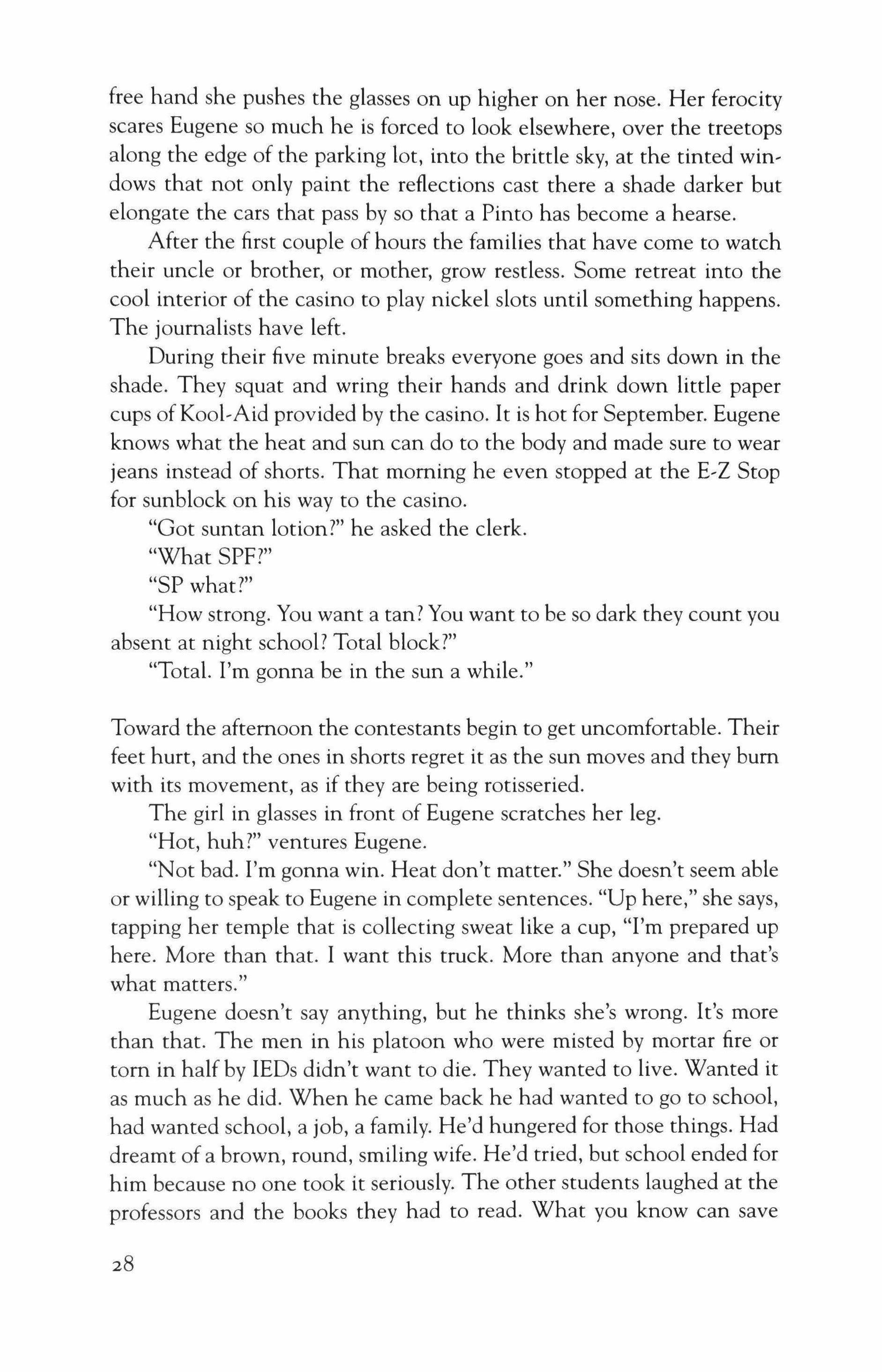
free hand she pushes the glasses on up higher on her nose. Her ferocity scares Eugene so much he is forced to look elsewhere, over the treetops along the edge of the parking lot, into the brittle sky, at the tinted windows that not only paint the reflections cast there a shade darker but elongate the cars that pass by so that a Pinto has become a hearse.
After the first couple of hours the families that have come to watch their uncle or brother, or mother, grow restless. Some retreat into the cool interior of the casino to play nickel slots until something happens. The journalists have left.
During their five minute breaks everyone goes and sits down in the shade. They squat and wring their hands and drink down little paper cups of Kool-Aid provided by the casino. It is hot for September. Eugene knows what the heat and sun can do to the body and made sure to wear jeans instead of shorts. That morning he even stopped at the E-Z Stop for sunblock on his way to the casino.
"Got suntan lotion?" he asked the clerk.
"What SPF?"
"SP what?"
"How strong. You want a tan? You want to be so dark they count you absent at night school? Total block?"
"Total. I'm gonna be in the sun a while."
Toward the afternoon the contestants begin to get uncomfortable. Their feet hurt, and the ones in shorts regret it as the sun moves and they bum with its movement, as if they are being rotisseried.
The girl in glasses in front of Eugene scratches her leg.
"Hot, huh?" ventures Eugene.
"Not bad. I'm gonna win. Heat don't matter." She doesn't seem able or willing to speak to Eugene in complete sentences. "Up here," she says, tapping her temple that is collecting sweat like a cup, "I'm prepared up here. More than that. I want this truck. More than anyone and that's what matters."
Eugene doesn't say anything, but he thinks she's wrong. It's more than that. The men in his platoon who were misted by mortar fire or tom in half by IEDs didn't want to die. They wanted to live. Wanted it as much as he did. When he came back he had wanted to go to school, had wanted school, a job, a family. He'd hungered for those things. Had dreamt of a brown, round, smiling wife. He'd tried, but school ended for him because no one took it seriously. The other students laughed at the professors and the books they had to read. What you know can save

you, he thought. But the laughs and smiles, the ease with which they set out to fail made him want to punch them square in the nose, to crush the soft bone so the blood pouring over their tanned legs would teach them life was real, that what they said mattered. Finally, he gave a laughing football player a shot in the jaw that tipped him over in his seat, packed his backpack, and took the next bus back to the rez. The rest of it never happened. Some things don't happen even if you want them to. Wanting something is one thing. Getting it is another. Instead of a job he took pleasure in, he ended up driving an old Continental to the Cities and back every couple of weeks with the trunk packed with weed. His cousin paid him thirty dollars a trip plus expenses, which sometimes including stopping off at Sugar Daddy's, near St. Cloud for a lap dance or two.
The ambulance job had been the first real job in the four years since he got back from the war. After living for twenty-five years and just coasting, just accepting what life gave him he found something larger than himself he could dive into. He kept all his notes from training and held on to the trauma manual they used in class. He returned again and again to the pictures. Full color pages of what can happen to you if you're not carefuL Scalp lacerations, contused eyes, the eyeball hanging down your cheek. Whole flaps of skin lifted from your scalp with one swipe of a bear's paw. Legs that doubled in size and turned black from snake bite. Arms that were caught in drill presses and spun like dishrags. He never felt faint or got queasy looking at the pictures. Amazed more than disturbed, he is surprised at how many ways you can pull apart the human body without actually killing it.
It wasn't until the second four hour break that Franklin showed up with food. Two Deli Express Chicken & Swiss sandwiches and a Coke.
"Couldn't make it earlier," he explains, "some farm kid stuck his finger in the tractor hitch and got it sheared off." Eugene nods thoughtfully, chewing his sandwich. The farmer he went to high school with on the other side of the truck had done the same thing before shipping out to Vietnam. Everyone knew it then and they hadn't forgotten. Right before he was supposed to ship out he went and did that. No one said much, even the old timers could understand wanting to. Franklin's brother hadn't dodged and had gotten himself killed. Franklin never talked about it, though he brought his dead brother's opinion to bear on almost all topics of conversation.
"Blood?" Eugene asks finally.

"That farmer the one who cut off his own finger?"
"Yep. You put your finger on it." He smiles, proud of his joke. "Yeah."
"Shoulda gone out in the field to find it."
"Why?"
"So someone at the hospital could shove it up his ass and sew it there."
Eugene said nothing.
They eat in silence and then the fifteen minutes are up.
It is almost four o'clock and the contestants are beginning to feel the strain. Gradually they lose their fierce demeanors and Eugene hears conversation on the far side of the truck.
An hour later the first of the contestants gives up. "Shit," says the four-fingered farmer on the grill, "I got better things to do than this shit." He stands straight and wipes off his hands, crumples the gloves and tosses them down on the gleaming hood.
Everyone looks away. They are ashamed for him, but glad they aren't the first to cave in. The woman in front of Eugene sighs and looks up at the sun, at five-thirty just scratching the tops of the trees.
"Thank god it ain't June."
Eugene nods. He is grateful, too, that the sun will go down soon, at seven instead of nine.
At dusk two more contestants drop off.
It is dark now and he lights a cigarette, the flame bright in the paint of the truck. He puts the lighter back in his pocket and exhales. He holds it out toward the girl.
"Want one?"
"Naw," she says, "got to think about the bun in the oven." He hears her pat the taut skin of her belly.
Eugene withdraws the cigarette, surprised that he never thought of pregnant women, and whether or not they smoke, or if they should. As a healthcare provider he feels guilty about this. He has seen them, in over-sized Chicago Bulls 'Tshirrs puffing away at bingo, ashing with one hand and daubing with the other.
"Who's the dad?"
"That's personal. I don't even know your name."
"Eugene."
She laughs and it rings out clear. "This one's daddy is named Eugene, but he's off in jail."
"That a good thing or a bad thing?"
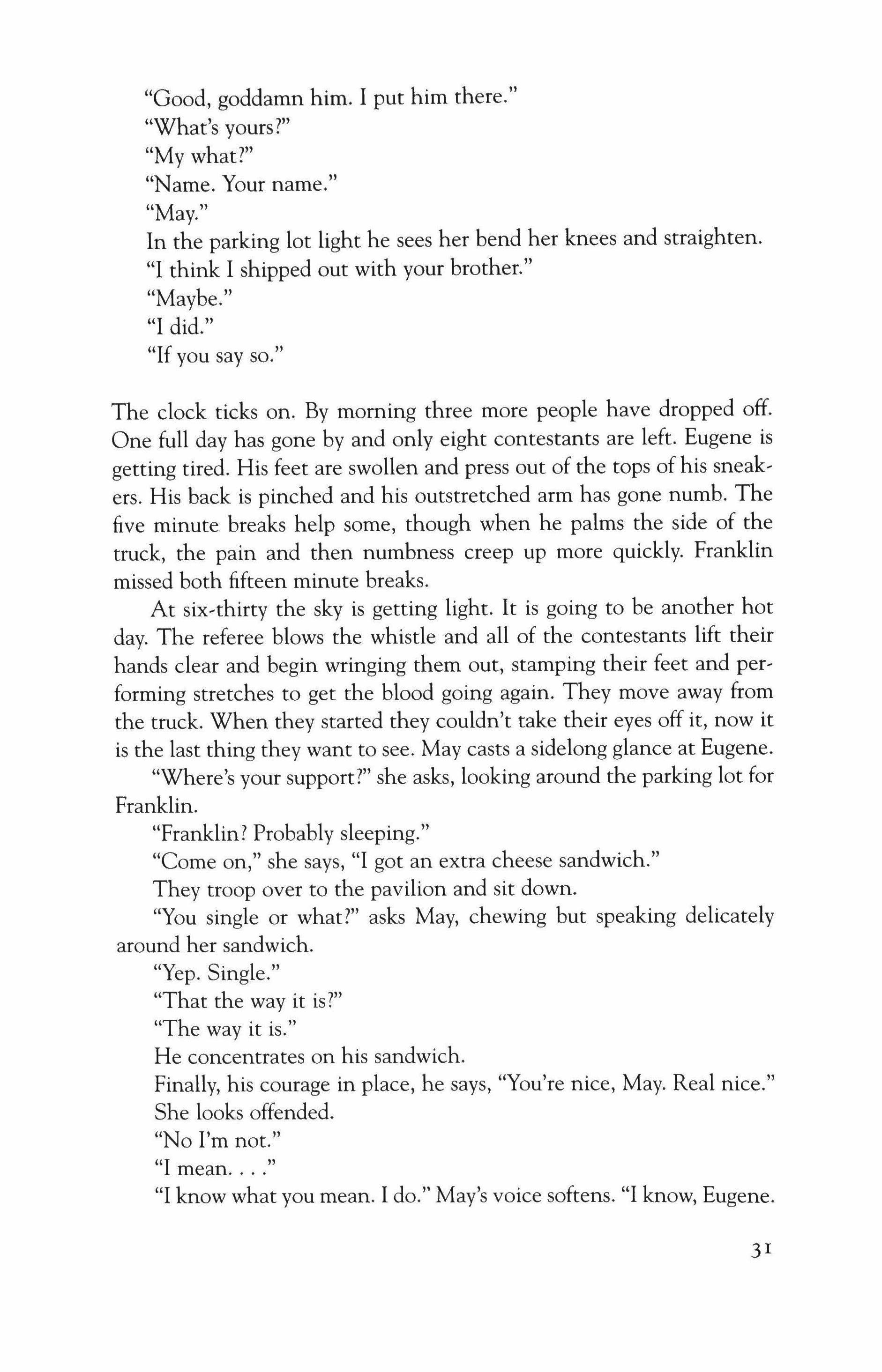
"Good, goddamn him. I put him there."
"What's yours?"
"My what?"
"Name. Your name."
"May."
In the parking lot light he sees her bend her knees and straighten.
"I think I shipped out with your brother."
"Maybe."
"I did."
"If you say so."
The clock ticks on. By morning three more people have dropped off. One full day has gone by and only eight contestants are left. Eugene is getting tired. His feet are swollen and press out of the tops of his sneakers. His back is pinched and his outstretched arm has gone numb. The five minute breaks help some, though when he palms the side of the truck, the pain and then numbness creep up more quickly. Franklin missed both fifteen minute breaks.
At six-thirty the sky is getting light. It is going to be another hot day. The referee blows the whistle and all of the contestants lift their hands clear and begin wringing them out, stamping their feet and performing stretches to get the blood going again. They move away from the truck. When they started they couldn't take their eyes off it, now it is the last thing they want to see. May casts a sidelong glance at Eugene.
"Where's your support?" she asks, looking around the parking lot for Franklin.
"Franklin? Probably sleeping."
"Come on," she says, "I got an extra cheese sandwich."
They troop over to the pavilion and sit down.
"You single or what?" asks May, chewing but speaking delicately around her sandwich.
"Yep. Single."
"That the way it is?"
"The way it is."
He concentrates on his sandwich.
Finally, his courage in place, he says, "You're nice, May. Real nice." She looks offended.
"No I'm not."
"I mean
"I know what you mean. I do." May's voice softens. "I know, Eugene.

I know. But wanna be straight with you. You know? And the thing is, I'm not nice. I don't know shit."
"Oh."
"And neither do you. You don't know shit either."
Eugene looks first toward the truck and then at the front doors of the casino.
Soon the fifteen minutes are up and they all groan and complain to one another as they head back to the truck.
The day is a blur. The heat comes off the asphalt and the truck in waves, tamping out any sparks of conversation that might have sprung up. There is only so much conversation they can sustain. The light, the unending heat, the nakedness of their hardship; all of it makes it difficult to speak. Across the parking lot the casino-cool and communallooks a lot like what paradise must look like. They only talk at night. Though nighttime begins to prove difficult as well. Without sight, not being able to move, everything else crowds in: memories, regrets, what has remained for each of them unmentionable, all of it is given new life, room to breath in the cloister of their confinement.
Franklin is still a no show and Eugene begins to feel faint, wobbly on his legs. Soon they begin to tingle then he loses all feeling from the waist down.
"Oh shit," he murmurs.
May strains forward when she hears him, trying to see what's the matter.
"What's wrong?"
"Can't feel my legs."
She leans back. It is hard to see, but her face is oily enough to pick up the ambient light from the casino. Her glasses hover on the tip of her nose.
"Not so bad," she says. "It's just like being pregnant."
He knows she is trying to comfort him, though it doesn't help. He'd thought he'd experienced most of what life had to offer: pain, injury, the loss of loved ones, moments of calm, even ofjoy. He'd traveled overseas. But, he realizes, as May retreats into the darkness, there is a host of unknowns, crowding around the edges of his life, just out of rifle range. Pregnancy for starters, fatherhood, even the notion of standing with his hand on a truck for two days. He's never done that before either. There

is a point in your life when you stop thinking in terms of the unknown; when everything that happens gets compared to some previous experience. There has to be a moment when this happens. Instead of youth and old age, there are two more important stages, one when everything seems new, and a paler, quieter, that's-just-like phase which stretches out indefinitely into the future. We reach a certain point and what is not known makes life too precarious. It is the terror of what the future holds that makes us want to believe this.
The night draws on. Eugene is beyond hunger. He doesn't flinch or complain when Franklin fails to show up again. May makes her sandwich offer. He looks at her and her meager provisions.
"I ain't even hungry."
"You need energy."
"No," he answers, "I'm okay."
"Where's Franklin?"
"He'll come around."
"You think?"
"No. Not really. He ain't coming back. He's not good for some things."
She shrugs and munches away while he strolls around the pavilion.
The breaks feel shorter. Five minutes has dwindled into nothing, fifteen minutes barely feels like enough time to take a full breath, while the four hours of standing take an eternity. Eugene feels pathetic, what he has set out to do so inconsequential that the sun is loathe to rise. No one watches the contest anymore. Occasionally a car honks its horn while driving by in either derision or solidarity. No one along the truck can tell. There are only five of them left.
Then. At four in the morning Eugene feels the truck begin to move. At first he is not certain. It has become part of the landscape, a great blue rock he and May are anchored to. But then, just a little, it shifts. He can feel the V8 humming quietly under the hood and it begins to roll. He keeps his hand on the panel as it gathers speed. Just an easy jog to keep up. Eugene feels like a Secret Service agent running alongside a presidentiallimousine. He turns his toes in and affects the wolf-like lope he has seen on TV and in the movies. It is a relief to be in motion.
He is content to do this, to run along the truck, feeling the chill air, getting the circulation back in his legs. Then he hears laughter. He looks in the windows and he sees a man and a woman sitting in the front, laughing, the man bending to turn the radio up. Eugene glances

in the back of the truck and there are four children and two tubs of fish. The children are playing hand games and eating ice-cream sandwiches.
"Get out," he tells them. "This here's mine."
They look at him lightly, the flow of their game only barely interrupted.
"Get out!" he says more loudly.
The youngest one, Billy, gets up from where he has been sitting on the edge of the tub and walks to the back of the truck. With some effort he manages to lift the catch to the tailgate and drops it down. They are going faster now.
Eugene looks behind the truck. In the darkness he can barely make out the shape of people running behind. They are getting closer. When the first one enters the faint red circle of the running lights he sees that it is Franklin. With the agility of a cat he jumps into the bed of the truck and turns to lend the next person a hand. Eugene's mother. They sit down side by side on the wheel well and Franklin takes a brown paper bag from under his arm and starts handing out whole fried chickens.
"You come for them but not for me?" asks Eugene. "For them?" His mother and Franklin look up calmly, as ifseeing Eugene for the first time.
"Well, well," says his mother, chewing on a drumstick, "didn't think you'd make it this far." She resumes eating, taking leisurely pauses to chat with Franklin and to make cute faces at the children. Eugene hasn't seen his mother exhibit this kind of calm and goodwill since before he left for Iraq. Her face is smooth, not tied up in a grimace. The rancor he has come to associate with her has been erased.
"Eugene. Eugene, you're talking to yourself."
He looks ahead, trying not to stumble. May is still attached to her part of the truck.
He looks back at the truck, at his mother. At Franklin who is talking up a storm, amiable for once instead of sarcastic. He puts down the bag of endless chicken and dusts the grease off his hands and walks to the tailgate. He extends his arm and begins to pull people into the bed. Eugene cranes his neck and sees most of his squad from Iraq jumping in. The ones who made it and the one who died. They are whole again, their arms reattached, their eyes focused. They settle in and make room for others: Eugene's first girlfriend, shy and beautiful at thirteen. Now she is an adult, confident, even more beautiful. Womanly. "It's not fair," he says. "It's not fair."
They get to change. They get a second chance. It is all Eugene can do to keep the past where it belongs, while worrying about the reasons;
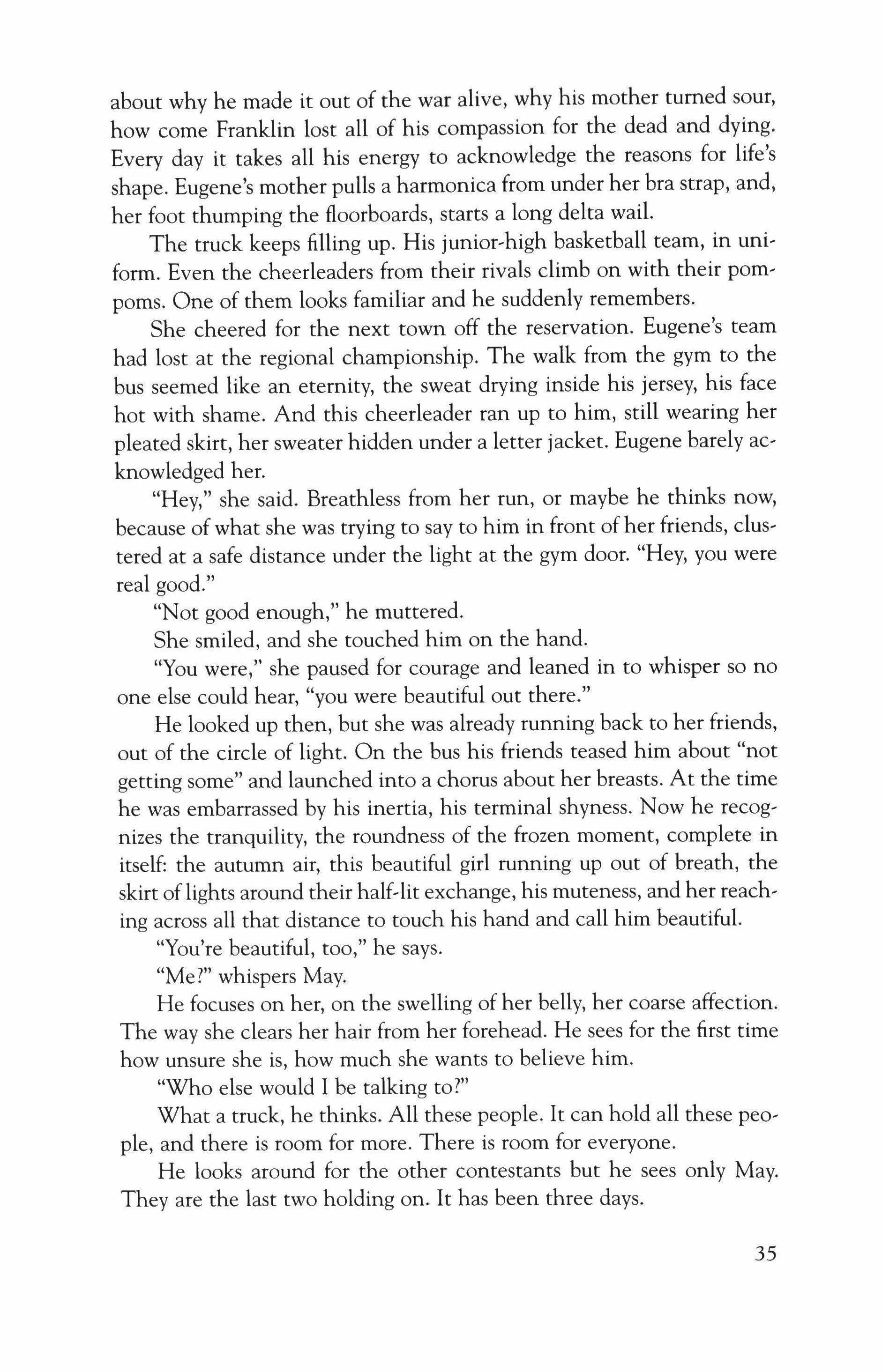
about why he made it out of the war alive, why his mother turned sour, how come Franklin lost all of his compassion for the dead and dying. Every day it takes all his energy to acknowledge the reasons for life's shape. Eugene's mother pulls a harmonica from under her bra strap, and, her foot thumping the floorboards, starts a long delta wail.
The truck keeps filling up. His junior-high basketball team, in uniform. Even the cheerleaders from their rivals climb on with their pompoms. One of them looks familiar and he suddenly remembers.
She cheered for the next town off the reservation. Eugene's team had lost at the regional championship. The walk from the gym to the bus seemed like an eternity, the sweat drying inside his jersey, his face hot with shame. And this cheerleader ran up to him, still wearing her pleated skirt, her sweater hidden under a letter jacket. Eugene barely acknowledged her.
"Hey," she said. Breathless from her run, or maybe he thinks now, because ofwhat she was trying to say to him in front ofher friends, clustered at a safe distance under the light at the gym door. "Hey, you were real good."
"Not good enough," he muttered.
She smiled, and she touched him on the hand.
"You were," she paused for courage and leaned in to whisper so no one else could hear, "you were beautiful out there."
He looked up then, but she was already running back to her friends, out of the circle of light. On the bus his friends teased him about "not getting some" and launched into a chorus about her breasts. At the time he was embarrassed by his inertia, his terminal shyness. Now he recognizes the tranquility, the roundness of the frozen moment, complete in itself: the autumn air, this beautiful girl running up out of breath, the skirt oflights around their half-lit exchange, his muteness, and her reaching across all that distance to touch his hand and call him beautiful.
"You're beautiful, too," he says.
"Me?" whispers May.
He focuses on her, on the swelling of her belly, her coarse affection. The way she clears her hair from her forehead. He sees for the first time how unsure she is, how much she wants to believe him.
"Who else would I be talking to?"
What a truck, he thinks. All these people. It can hold all these people, and there is room for more. There is room for everyone.
He looks around for the other contestants but he sees only May. They are the last two holding on. It has been three days.

He is still running along side.
"How can you keep up?" he asks May.
"We're standing, Gene. We're still in the same place."
He isn't winded from the constant jogging. His legs feel good.
"If I win I'm gonna give the truck to you," he tells her.
"If I win I'm gonna keep it. Just so you know."
It's either you or me. He realizes that standing still takes as much courage as running. That she is trembling. So is he.
"Let go," she says. "Let go, we can share it."
"I'm holding on, May. I'm holding on."
He is laughing, euphoric. For once he knows he can do it. He can hold on. The truck picks up speed but running is effortless.
"I can do this. For real. I can do this."
"No you can't Eugene. You can't."
"You're wrong."
He can do this. Forever. He sees now how nobody considered how hollow each day is for Franklin without his brother, how Eugene's mother wanted another try with her husband but never got it. He sees it now, in the back of the truck, how our losses always keep us company. As the truck gathers speed it attracts more people. They cling to the running boards, sit on the hood, the ones in the very back help them jump on. There is room for everyone. Eugene runs alongside, his hand still touching. He can hold on, no matter how fast, he can hold on. He was made to do this, has been waiting for the chance to hold on.

When the grant at Scripps in San Diego ended Bobby Stein wasn't surprised. He simply poured another drink. He was a mercenary in the DNA wars, a molecular biologist with good hands, impressive ingenuity, and intuitive capacities. Directors of competitive research institutions considered him interesting, despite his lack of pedigree and inability to remain attached to any organization longer than two years. Bobby Stein worked eighteen hours a day, seven days a week and slept in the lab. He was thirty-eight, with ten years more experience than the ordinary postdoc and he worked for the same substandard wage and with the brutal intensity of a researcher a decade younger.
After years as a professional lab rat he had grown into a lab monster, immensely talented and wildly unstable. Lab monsters created the newest protocols and were objects of terror and awe to lab rats. Bobby Stein had a questionable resume, a substantial list of scientific publications and biographical gaps that reinforced his reputation as a gifted scientist with antisocial tendencies. He didn't play tennis or golf. He didn't attend dinner parties or the obligatory Christmas gala. His conversations were confined to the details of the research, analysis of results and strategies for the next experiments. He moved through the white-tiled corridors between laboratories and computer facilities in his white lab coat with a rapidity that made him seem always on the periphery and already vanishing into a bleached distance that both camouflaged and justified him.
Before San Diego, he had spent a year cloning Hepatitis B coat proteins in Taiwan. He mapped the genome of a virulently pathogenic
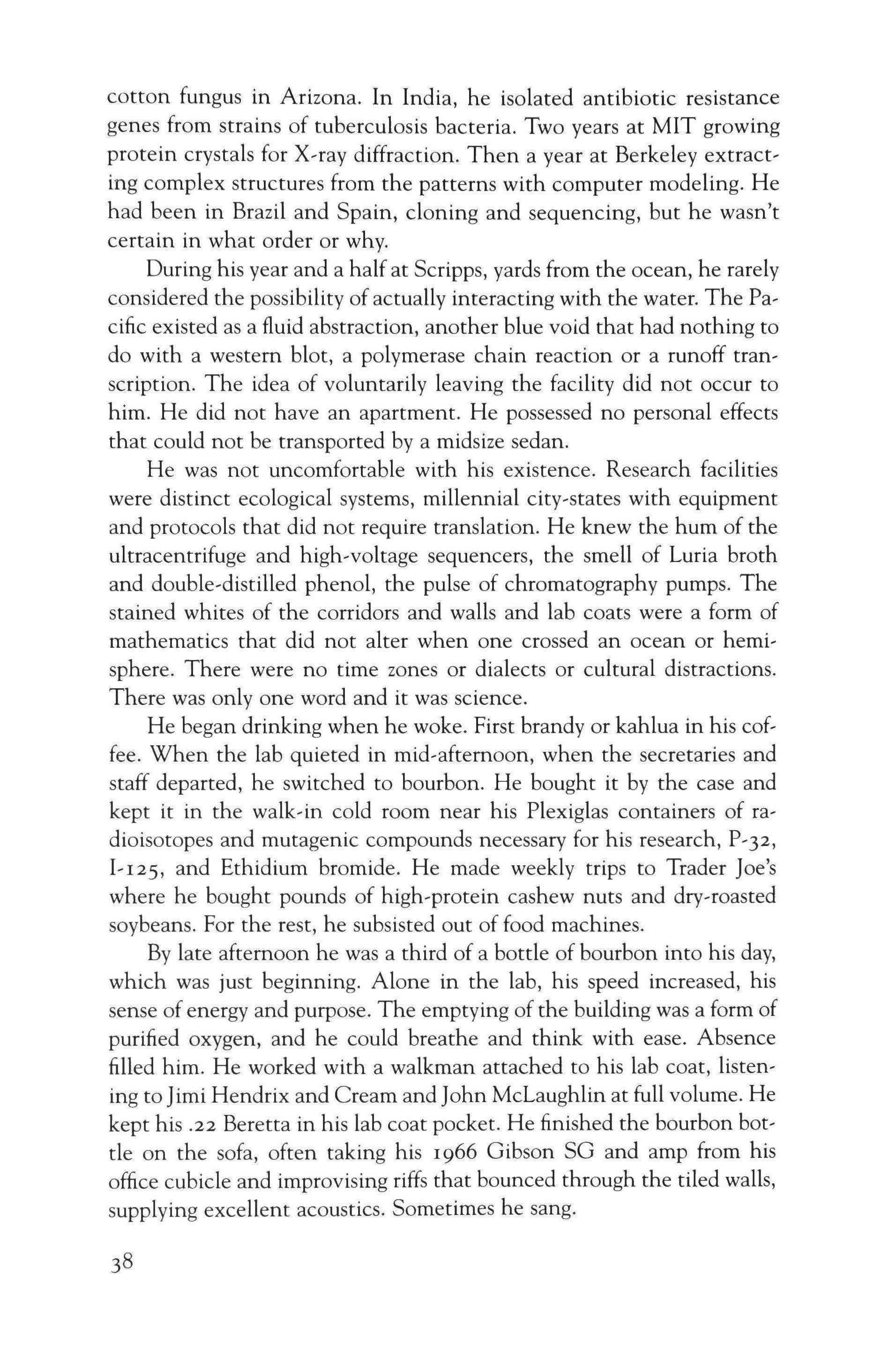
cotton fungus in Arizona. In India, he isolated antibiotic resistance genes from strains of tuberculosis bacteria. Two years at MIT growing protein crystals for Xvray diffraction. Then a year at Berkeley extracting complex structures from the patterns with computer modeling. He had been in Brazil and Spain, cloning and sequencing, but he wasn't certain in what order or why.
During his year and a half at Scripps, yards from the ocean, he rarely considered the possibility of actually interacting with the water. The Pacific existed as a fluid abstraction, another blue void that had nothing to do with a western blot, a polymerase chain reaction or a runoff transcription. The idea of voluntarily leaving the facility did not occur to him. He did not have an apartment. He possessed no personal effects that could not be transported by a midsize sedan.
He was not uncomfortable with his existence. Research facilities were distinct ecological systems, millennial city-states with equipment and protocols that did not require translation. He knew the hum of the ultracentrifuge and high-voltage sequencers, the smell of Luria broth and double-distilled phenol, the pulse of chromatography pumps. The stained whites of the corridors and walls and lab coats were a form of mathematics that did not alter when one crossed an ocean or hemisphere. There were no time zones or dialects or cultural distractions. There was only one word and it was science.
He began drinking when he woke. First brandy or kahlua in his coffee. When the lab quieted in mid-afternoon, when the secretaries and staff departed, he switched to bourbon. He bought it by the case and kept it in the walk-in cold room near his Plexiglas containers of radioisotopes and mutagenic compounds necessary for his research, P�32, I�I25, and Ethidium bromide. He made weekly trips to Trader Joe's where he bought pounds of high-protein cashew nuts and dry-roasted soybeans. For the rest, he subsisted out of food machines.
By late afternoon he was a third of a bottle of bourbon into his day, which was just beginning. Alone in the lab, his speed increased, his sense of energy and purpose. The emptying of the building was a form of purified oxygen, and he could breathe and think with ease. Absence filled him. He worked with a walkman attached to his lab coat, listening to [imi Hendrix and Cream and John McLaughlin at full volume. He kept his .22 Beretta in his lab coat pocket. He finished the bourbon bottle on the sofa, often taking his 1966 Gibson SG and amp from his office cubicle and improvising riffs that bounced through the tiled walls, supplying excellent acoustics. Sometimes he sang.

Several nights a week he spent an hour practicing the distilled essence of his martial arts training. Just the moves sure to kill or disable, the fingertips to the eye, the knee to the genitals, the elbow to the throat. Periodically, he took out his nine-millimeter Glock from his locked cabinet, and moved through the lab as he would a hostile environment, a dark unknown warehouse in Oakland or Baltimore, perhaps, crouching, taking aim, moving low along walls, crawling beneath windows, remembering the weight of the gun in his palm. The janitors never saw his night exercises and ignored him. That was part of maintaining his Zen awareness. When the bottle was finished, he threw it in the radioactive trash container to torment the safety officer. Beretta under the sofa cushion, he wrapped a Mexican serape around his shoulders and fell into a kind of sleep.
When the Scripps grant funding ended Bobby Stein was the first person terminated. He responded to this information by spending the next three days drunk. He found himself holding the lab phone having what he gathered was his second or third conference call with the Dean of the Science Department at something called College of Northern Pennsylvania, Allegheny Hills.
"We're excited about your background," Dean Nevins said. "Your range of capabilities. We're building up our science skills here."
"What do you have now?" Bobby asked. He had a splitting headache, double vision, and a cough he considered disturbing.
"We're installing a computer lab next year. Two biologists. One is retiring. We're down to one math guy. He's on sabbatical. Computer gal took a job elsewhere at the last minute. So there's opportunity," Dean Nevins said. Even through his hangover and the distorted speakerphone, Bobby detected desperation.
"I've never taught before," he admitted. "Not since graduate school."
"We're just undergraduate liberal arts here," Dean Nevins reassured him. "After MIT and Berkeley, you'll do fine. Can you be here in a week? Classes begin August 20. We're in a bit of bind time-wise," the Dean said. "I'll fax you a contract."
Bobby Stein didn't actually see the ocean until the day he left California. He bought a used pickup truck north of San Diego. It was hot, his guitar and amp and assorted possessions were on the car lot pavement. The Beretta was in his pocket, the Glock in the belt of his faded black jeans against his spine. The heightened awareness necessary to carry these weapons without discovery was a spiritual exercise. Then he

saw the ocean just across the highway and it occurred to him that he wanted to touch the water, just once. He let the thought pass.
Bobby purchased two tweed sports jackets, dress shirts, and a black tie at a Salvation Army store in Cleveland. He arrived in Allegheny Hills six days later. Math 102. Introduction to Biology. Introduction to Computer Science with hours to be arranged. Of course, there was no computer lab yet. The biology department was an alcove with thirtyyear-old microscopes, several Bunsen burners, amphibians in jars and frog-dissecting kits. The liberal arts students could barely do high school algebra. No one had taken a biology course before. He didn't know how to teach, and they didn't know how to learn.
He lived in his truck, off the highway on a back road behind a farm for the first two weeks. He took showers in the school gym. He was planning to move into the empty computer lab where he could plug in his guitar and amp when Dean Nevins called him in.
"You're doing a great job. Our art students have science anxiety. They say they're enjoying their science experience. It's a relief to me," Dean Nevins admitted. Then, brightly, "We arranged housing for our computer gal who decided, in undeniable violation of her commitment, not to join our Allegheny Hills family. So there's a house available."
Bobby Stein didn't say anything. He had never really lived in a house before. Not his own house. With an address, a kitchen, a bedroom, a bathroom.
It was an old farmhouse in town about two miles from the college. Seventy-five years old, Bobby concluded, noting the two by four windows, a stone chimney, and three lightning rods. A kitchen with stove and refrigerator. Windows facing an apple orchard and miles of maple forest. Deer hunting country. Probably bear, fox, and raccoons. Electrical outlets in every room. The closest house was a quarter of mile down the road. It was painted yellow and surrounded by a white picket fence. Red, pink, purple, and white roses were planted behind the wood.
"Who lives there?" Bobby Stein asked.
"Jessica Blum," Dean Nevins said. He seemed to pause. "Professor of Creative Writing. Jesse, she's one of our prizes."
Bobby Stein unloaded his truck that night and slept in his sleeping bag in the living room with his Glock next to his side. He still had half a case of bourbon. By habit, he woke whenever he heard an unknown sound and moved cautiously from room to room, Glock in his hand, feeling the walls behind his back, memorizing the spectrum of creaks in

the wood planks beneath his bare feet. He studied the trees by moon' light out the windows, calculating their shadows and wind sway.
Jessica Blum believed she possessed a unique form of telepathy that allowed her to sense impending emotional events. Not global catastrophies like earthquakes in Turkey or monsoons in the Philippines. It had nothing to do with politics or the stock market. It was strictly confined to the intimate components of her life. She felt there was a forest fire in her forehead ignited by the flow of loss and desire appearing in random stray spasms. She wanted to chart these conflagrations. There were psychological equations in a partial gesture or a lamp-lit pause that implied entire personal histories she could decipher.
This unusual sensitivity was a natural element of the terrain of her profession. She was a romantic modernist, a creature adorned with rare proclivities, wearing her wounds like lesions that glowed. Her skin was a lattice of luminescent etchings, tattoos in reverse; they burned out, ward, a compendium of secret torches and flames.
It was the end of August and Jesse sensed a vast ineluctable current moving in her direction. Her private El Nino. It knew the elaborate sub, terfuges that defined her strategies of survival. And it was coming. It was not a bullet. It was a heat-seeking missile. It was airborne, and it wouldn't miss her.
The cusp between seasons was always a problem. There was an absence of definition and too much sketchy shadow. The world turned strange and ragged. She was walking a trapeze in a tent illuminated by miniature bonfires and tiny votives. Outside, the maples were not merely a leafy chorus but an intimation of an inland ocean assembling itself for autumn, slowly finding its collective red mouth. Then it would start howling. In a month, there could be blizzards. She needed to fill the basement with twenty-five cords of ash, hickory, and oak.
In the transitions between seasons, she experienced a clarity, yellow and solid. It felt ancient, like the end of summer in Syracuse or Thebes. A distilled yellow of augury, rumor, and dream. It was the time to engage in acts of private arithmetic, wins and losses. The physical isolation of the Allegheny Mountains. Her personal exile within it. The great zero of solitude in which the senses were starved and con' fined. The late afternoon light rendered the sky too naked. Soon the leaves would be crushed by winds that ate them like rabid dogs, all growl and teeth. Then the squalor of fall, an anatomy of abandoned nests finches left, pebbles and gravel mouth thunder storms. More
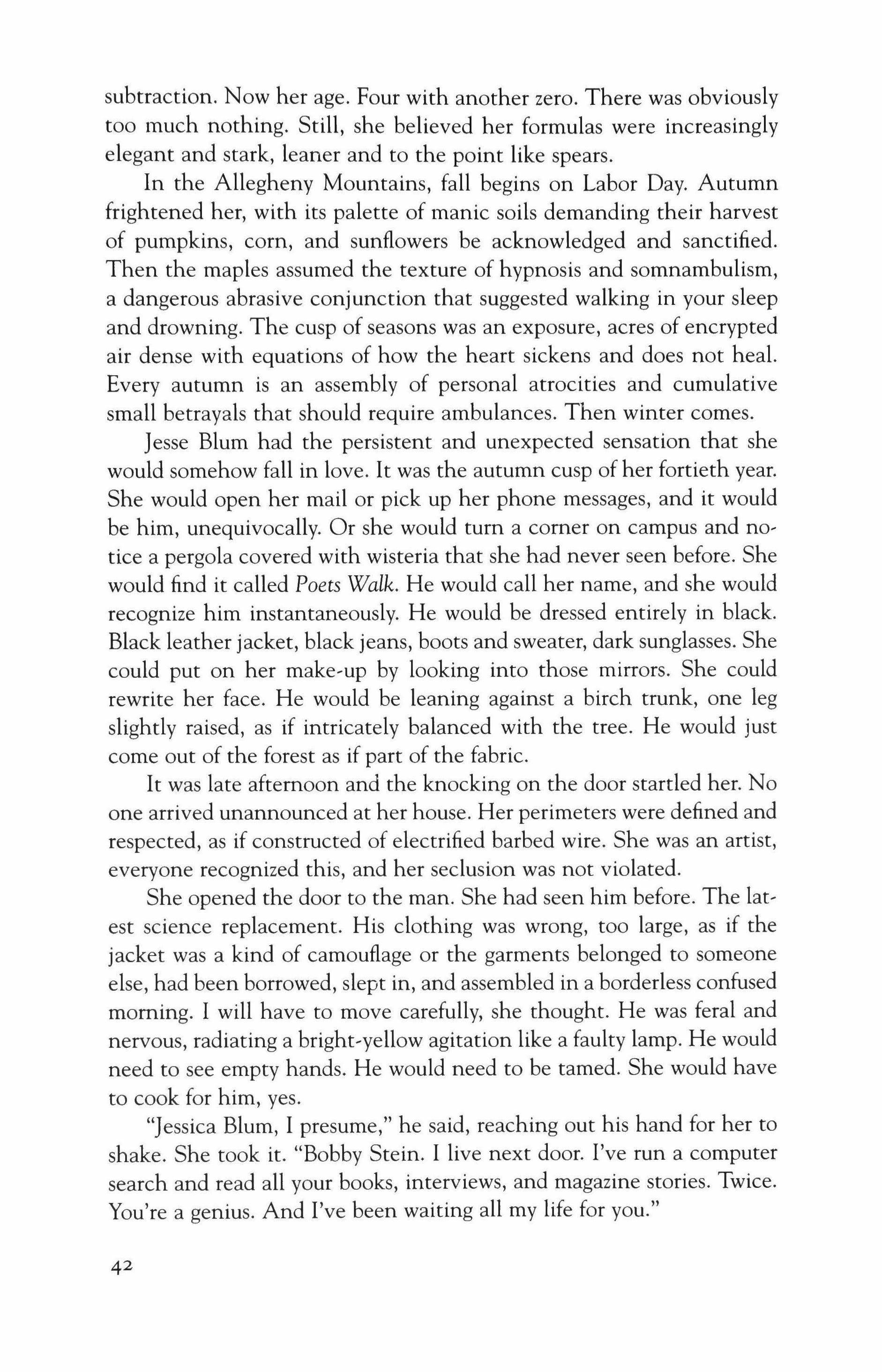
subtraction. Now her age. Four with another zero. There was obviously too much nothing. Still, she believed her formulas were increasingly elegant and stark, leaner and to the point like spears.
In the Allegheny Mountains, fall begins on Labor Day. Autumn frightened her, with its palette of manic soils demanding their harvest of pumpkins, corn, and sunflowers be acknowledged and sanctified. Then the maples assumed the texture of hypnosis and somnambulism, a dangerous abrasive conjunction that suggested walking in your sleep and drowning. The cusp of seasons was an exposure, acres of encrypted air dense with equations of how the heart sickens and does not heal. Every autumn is an assembly of personal atrocities and cumulative small betrayals that should require ambulances. Then winter comes.
Jesse Blum had the persistent and unexpected sensation that she would somehow fall in love. It was the autumn cusp of her fortieth year. She would open her mail or pick up her phone messages, and it would be him, unequivocally. Or she would turn a corner on campus and notice a pergola covered with wisteria that she had never seen before. She would find it called Poets Walk. He would call her name, and she would recognize him instantaneously. He would be dressed entirely in black. Black leather jacket, black jeans, boots and sweater, dark sunglasses. She could put on her make-up by looking into those mirrors. She could rewrite her face. He would be leaning against a birch trunk, one leg slightly raised, as if intricately balanced with the tree. He would just come out of the forest as if part of the fabric.
It was late afternoon and the knocking on the door startled her. No one arrived unannounced at her house. Her perimeters were defined and respected, as if constructed of electrified barbed wire. She was an artist, everyone recognized this, and her seclusion was not violated.
She opened the door to the man. She had seen him before. The latest science replacement. His clothing was wrong, too large, as if the jacket was a kind of camouflage or the garments belonged to someone else, had been borrowed, slept in, and assembled in a borderless confused morning. I will have to move carefully, she thought. He was feral and nervous, radiating a bright-yellow agitation like a faulty lamp. He would need to see empty hands. He would need to be tamed. She would have to cook for him, yes.
"Jessica Blum, I presume," he said, reaching out his hand for her to shake. She took it. "Bobby Stein. I live next door. I've run a computer search and read all your books, interviews, and magazine stories. Twice. You're a genius. And I've been waiting all my life for you."

"For what?" she asked, gentle but cool. She was not entirely surprised. "For what? For my lessons. Monday is Neruda. I bring you white orchids. You read me Neruda in Spanish. Your interviews stated that his poetry is your favorite. I learn the language through our lips, when you kiss me." Bobby Stein began. "I trust that is not inappropriately forward?"
Jesse Blum considered this professionally, the quality of his word choices, the cadence of their composition, the precision and music they produced, their sophistication. This was a dialect in which she was flu, ent. "Would you like a cup of coffee?" she indicated the interior of her house with her fingers.
"I would indeed," Bobby Stein entered her house. Jesse poured coffee into china cups. They were standing in her kitchen. He held his cup with surprising authority. She thought he might be a juggler.
He stared at his coffee. "Do you have any whiskey to put in this?"
"No," Jesse said. "I'm a perpetually recovering drug addict. So I don't drink."
"That's an excellent decision. I'll stop drinking as of this moment." Bobby Stein studied the kitchen chairs. "Might I sit down?" He adjusted the chair so that his back was against the wall.
Jesse carried her cup to the kitchen table. She found two napkins and spoons and placed them side-by-side. "Why have you done such ex, tensive reading?"
"I'm a molecular biologist. A research scientist. It's a kind ofpoetry." He said, "I create new life forms."
"What parts of my literary explorations most interest you?" Jesse inquired.
"The drug descriptions are indelible. But I was most taken by your picture. Then I saw you at school. Photographs fail to transmit your beauty and depth. Is that politically incorrect?" he asked.
"Political correctness bores me," Jesse admitted.
"It's like painting by the numbers for the morally bankrupt," Bobby agreed. "Is this a good moment for a fair and frank exchange of views?"
"Actually, you caught me between suicide attempts. I was engaging in small acts of unnatural alchemy. Fueled by deviant ambitions, I'm presently devising methods for night flying. That has a month of com, plete silence requirement. Then I'm wallpapering the bedroom with my collection of murdered women obituaries." Jesse smiled. "What happens Tuesday? Have you prepared that dialogue?"
"I have. Tuesday you wear a white, silk slip. I watch you stand in

your garden watering geraniums in terra-cotta pots. You employ this metaphor as a recurrent leitmotif. While you bend in the garden, you tell me that, at this precise instant, women with the names of flowers and film stars and saints are watering flowers on balconies and roof gardens above alleys and city parks with bougainvillea and statues ofbutchers who became generals. You discuss the etiology ofheartbreak with the precision of a master engineer." Bobby Stein finished his coffee.
"And Wednesday?" Jesse stared at his face. She was thinking all Wednesdays are ashes. He was extremely pale, as if he inhabited a subterranean region of caves and tunnels. She remembered a performance she had given at Attica prison, where inmates had skin so bereft of color, their faces appeared translucent blue. But this man was fierce with energy, anger, and intelligence. His vocabulary was exciting. From his mouth came flares and she thought of stars and their orbits and conjunctions. Such celestial manifestations were called brilliant.
"On Wednesday, I divulge my history. I've never revealed myselfbefore. I'm not used to this." Bobby Stein took a breath. "I grew up in a town of seven thousand in New England. I played guitar and read existentialist philosophy and novels. I followed deer paths and lay in the grass where they slept and read Rimbaud, Beckett, and Burroughs. I refused my student deferment. Then I refused induction, which made me a felon. I figured I'd just go all the way. I was a full-time revolutionary at eighteen. I was a saboteur and criminal. I was underground and wanted for draft evasion, weapons and drug smuggling. I was in Los Angeles then, at UCLA, in the labs at night. I manufactured amphetamines and LSD and sold them. Not for profit, of course, but for the cause."
"Where did you live?" Jesse asked.
"On warehouse crates. On floors. I moved constantly. I procured components and built devices used in the bombing of buildings. I robbed armories and sold weapons to the Black Panthers and Weather� men. I would do anything because they were doing anything. They were burning children alive in Vietnam. But all people remember now is the music and demonstrations. I was a babysitter on drug deals in New York and Chicago."
"What is a babysitter?" Jesse asked.
"It means I carried the sawed-off shotgun. I used weapons if there was a problem. There was often a problem. No long-term relationships in that business. I was wanted by the FBI and half a dozen state and federal agencies. Am I politically incorrect yet?" Bobby seemed simultaneously assured and resigned.
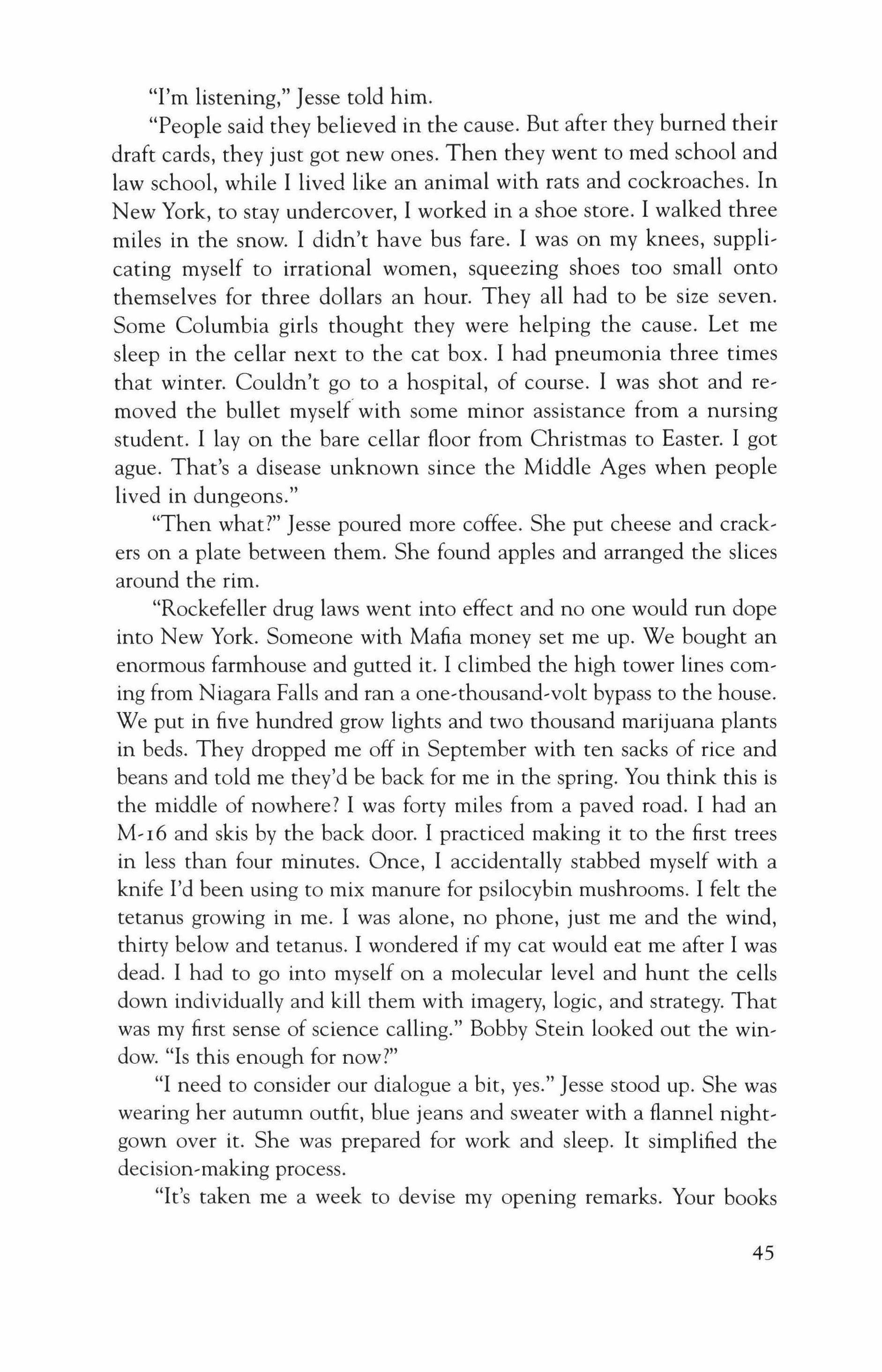
"I'm listening," Jesse told him.
"People said they believed in the cause. But after they burned their draft cards, they just got new ones. Then they went to med school and law school, while I lived like an animal with rats and cockroaches. In New York, to stay undercover, I worked in a shoe store. I walked three miles in the snow. I didn't have bus fare. I was on my knees, supplieating myself to irrational women, squeezing shoes too small onto themselves for three dollars an hour. They all had to be size seven. Some Columbia girls thought they were helping the cause. Let me sleep in the cellar next to the cat box. I had pneumonia three times that winter. Couldn't go to a hospital, of course. I was shot and removed the bullet myself with some minor assistance from a nursing student. I lay on the bare cellar floor from Christmas to Easter. I got ague. That's a disease unknown since the Middle Ages when people lived in dungeons."
"Then what?" Jesse poured more coffee. She put cheese and crackers on a plate between them. She found apples and arranged the slices around the rim.
"Rockefeller drug laws went into effect and no one would run dope into New York. Someone with Mafia money set me up. We bought an enormous farmhouse and gutted it. I climbed the high tower lines coming from Niagara Falls and ran a one-thousand-volt bypass to the house. We put in five hundred grow lights and two thousand marijuana plants in beds. They dropped me off in September with ten sacks of rice and beans and told me they'd be back for me in the spring. You think this is the middle of nowhere? I was forty miles from a paved road. I had an M�I6 and skis by the back door. I practiced making it to the first trees in less than four minutes. Once, I accidentally stabbed myself with a knife I'd been using to mix manure for psilocybin mushrooms. I felt the tetanus growing in me. I was alone, no phone, just me and the wind, thirty below and tetanus. I wondered if my cat would eat me after I was dead. I had to go into myself on a molecular level and hunt the cells down individually and kill them with imagery, logic, and strategy. That was my first sense of science calling." Bobby Stein looked out the window. "Is this enough for now?"
"I need to consider our dialogue a bit, yes." Jesse stood up. She was wearing her autumn outfit, blue jeans and sweater with a flannel nightgown over it. She was prepared for work and sleep. It simplified the decision-making process.
"It's taken me a week to devise my opening remarks. Your books
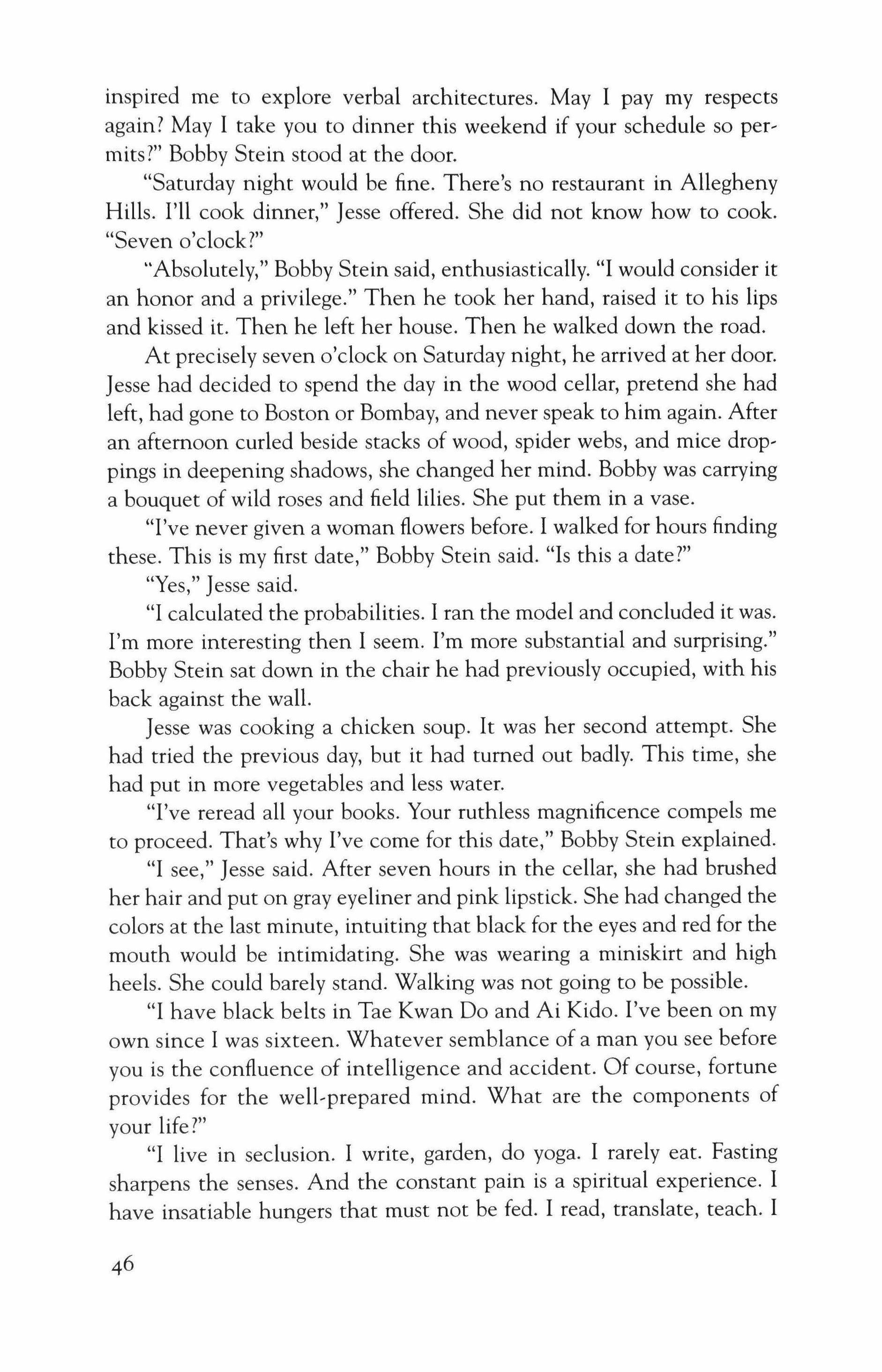
inspired me to explore verbal architectures. May 1 pay my respects again? May 1 take you to dinner this weekend if your schedule so permits?" Bobby Stein stood at the door.
"Saturday night would be fine. There's no restaurant in Allegheny Hills. I'll cook dinner," Jesse offered. She did not know how to cook. "Seven o'clock?"
"Absolutely," Bobby Stein said, enthusiastically. "I would consider it an honor and a privilege." Then he took her hand, raised it to his lips and kissed it. Then he left her house. Then he walked down the road.
At precisely seven o'clock on Saturday night, he arrived at her door. Jesse had decided to spend the day in the wood cellar, pretend she had left, had gone to Boston or Bombay, and never speak to him again. After an afternoon curled beside stacks of wood, spider webs, and mice droppings in deepening shadows, she changed her mind. Bobby was carrying a bouquet of wild roses and field lilies. She put them in a vase.
"I've never given a woman flowers before. I walked for hours finding these. This is my first date," Bobby Stein said. "Is this a date?"
"Yes," Jesse said.
"I calculated the probabilities. I ran the model and concluded it was. I'm more interesting then I seem. I'm more substantial and surprising." Bobby Stein sat down in the chair he had previously occupied, with his back against the wall.
Jesse was cooking a chicken soup. It was her second attempt. She had tried the previous day, but it had turned out badly. This time, she had put in more vegetables and less water.
"I've reread all your books. Your ruthless magnificence compels me to proceed. That's why I've come for this date," Bobby Stein explained.
"I see," Jesse said. After seven hours in the cellar, she had brushed her hair and put on gray eyeliner and pink lipstick. She had changed the colors at the last minute, intuiting that black for the eyes and red for the mouth would be intimidating. She was wearing a miniskirt and high heels. She could barely stand. Walking was not going to be possible.
"I have black belts in Tae Kwan Do and Ai Kido. I've been on my own since I was sixteen. Whatever semblance of a man you see before you is the confluence of intelligence and accident. Of course, fortune provides for the well-prepared mind. What are the components of your life!"
"I live in seclusion. I write, garden, do yoga. I rarely eat. Fasting sharpens the senses. And the constant pain is a spiritual experience. I have insatiable hungers that must not be fed. 1 read, translate, teach. I

perform my poems at universities around the country. Now I'm prepar, ing for another shabby Allegheny autumn. I go underground, under, water, speak in fluid syllables, in sentences of rain and thunder and ochre chimes. It's a local dialect of tinny trinkets gathered from obscene corridors and attics where light bulbs sting. There's never enough light here. Just baby coffin holes stained like nicotine they call one hundred watts. That's not my idea of illumination. And I try not to take heroin. It's a full,time discipline. Also, I've been waiting for perfect love," Jesse Blum smiled.
"Specific human love is a radical new concept for me. I'm a gypsy. I find labs anywhere the work is interesting. I play guitar. And I always carry a gun," Bobby Stein said.
"Let me see," Jesse did not believe him. They were sitting at the kitchen table. Jesse had ironed a pink tablecloth and two fuchsia nap, kins and set out her few china plates. She had placed two candles in the center.
"OK. Look down. Feel where I guide your hand." Bobby Stein pushed her hand to the side of the tweed jacket that did not fit. He opened the jacket. She could see the handle.
"What's that called?" She was interested.
"It's a .22 caliber semi-automatic Beretta. Very small. It's a good concealed weapon. Hard to shoot. I have something bigger in the truck. Are you afraid?" Bobby Stein seemed concerned.
"No," Jesse realized.
"Last time I showed a weapon to a woman, she ran away. It was sup' posed to be a date. She was very bright. A genetic engineer at MIT. She had red hair. When I showed her my guns, she called a taxi and disappeared." Bobby looked at her for clarification. "Was that a date?"
"It's difficult to say," Jesse decided. She adjusted the flowers in the vase. "You never gave a woman flowers before?"
"It seemed contrived and sentimental. Now I'm reevaluating my position." He paused. "I haven't reevaluated my position since I was fifteen."
"As the catalyst, I'm flattered," Jesse Blum said. "But I'm a total fail, ure. I refused to assemble a viable lunching persona. I repeatedly told the truth in interviews. When I met someone who could be helpful to my career, I ran in the opposite direction, often insulting them first. I also missed meetings because I spent most of my time shooting up in bathrooms. It's awkward in toilet stalls. Getting out the paraphernalia, balancing the spoon and lighter, filling syringes, mopping up the blood.

I left business meetings every fifteen minutes to inject myself. I thought being an artist meant you didn't have to be nice to horrible people. I as' sume your problems with authority led you to similar catastrophic career choices?"
"I was asked to lunch at MIT once. I said I only ate with people from my own species. Perhaps that was ill-considered," Bobby Stein conceded. "But my criminal activities ended absolutely and completely the day I discovered science." He was staring at her kitchen. Then the living room. He seemed to be making calculations based on shadows and distance. He kept his hand near the side of his jacket that con, tained his gun.
"When was that?" Jesse needed to know.
"After President Carter offered amnesty, I went to college then. I was six years behind everyone else. It was ironic. They assumed I was a Vietnam vet with post'traumatic stress. I won a National Science Foundation fellowship. I was afraid to attend an institution I might have bombed in a previous blackout. So I ended up in a second,rate situation in the Midwest." Bobby Stein sounded disappointed.
"Not a single vestige remains?" Jesse asked.
"Nothing. Karate helped my anger. It was competitive meets with the elements of a street fight. Many bones were broken. But I was reassembled on a subatomic level once I began research. Am I less inter' esting? Am I disappointing you?" Bobby asked.
"No," Jesse said.
"Then I read your books. Then I met you. This is the second of my life'changing experiences. But I must tell you something." Bobby paused. This is it, Jesse Blum thought. I could engage in an authentic ex, change with you, but. This is the pause in which the but comes. Then you are lost again and must navigate by the shapes of your welts in the miserable shadows of another post-harvest, anemic moon. Your body is a Braille, your bruises a map. Your scars are a blueprint, a highway. You'll be able to hitchhike home. This is what you think in the stasis before the door closes.
"You are not the woman of my wildest dreams. I did not have the imagination or life experience to conceive of you. You are beyond my most delirious expectations," Bobby Stein said.
"Do you want to spend the night?" Jesse asked. She hadn't served the soup yet.
Bobby Stein's eyes were twin aquamarines. His thoughts were fish swimming just below the glass surface. Fish with fins like ruffled wings

and markings like painted canvases, symmetrical geometries in primary colors. A tropical sun set in radiation oranges and flagrant magenta. Then he said, "Yes."
Jesse served the soup. She had cut bread and arranged it in a basket covered with a red napkin.
"This is like a real house," Bobby Stein observed. "The flowers on the plates match the napkins. The silverware patterns are identical. Your books are arranged by size in shelves. You have paintings on the walls, rugs and curtains. You have artifacts. You have a toaster. I'm as, tonished by the elegance of your environment, by your aesthetics. For twenty years, I didn't even know where I was. Arizona. India. California. It was just a white monolith of distance between experiments."
"Did you want fame?" They were eating the soup.
Bobby was surprised. "No."
"I did. I thought fame was my ticket across the Styx. I grew up in the projects. Southwestern equivalent of tenements. A vast trailer park coated in stucco. My father was a heathen with bad grammar and a sixth grade education. They thought saying Jewish was a criminal offense. Were you bar mitzvahed?"
Bobby Stein tried to remember. Then he said, "Yes."
"You had more socialization then I did. I believed consciousness was my personal manifesto. Drugs were tools to excavate and assemble the revelatory into stanzas and paragraphs. I was a junky by eighteen. I had to invent a self to escape. Then I used myself as a laboratory and spent twenty years autopsying myself." Jesse put the dishes in the sink.
"You sent out a frenzied transmission. I received it. I heard. I under, stand." He assured her.
Then they climbed the stairs to her bedroom. She lit candles and incense. She took a bath. Bobby took a shower. They sat on the bed holding hands. She felt the room rocking like a vessel at sea.
"What is this called?" Bobby Stein asked.
"A duvet. It encases a quilt. That's a bed skirt. And those are called shams." Jesse felt dizzy.
"I don't know if I can do this," Bobby said, his voice suddenly small. "I haven't done this in maybe ten years."
"Me too," Jesse said. "Who could I have sex with? A professor mar' ried to mediocrity at work and at home? A sub,literate with a Harley who takes football and deer hunting seriously?"
"I considered having sex in Taipei," Bobby Stein revealed. He had put his gun on the night table. He glowed in the candlelight, yellowed.

She thought of peaches. With his eyeglasses off, his eyes were hazel. By certain light, they might become green.
"Sex? With a prostitute?" Jesse was interested.
"I'm a biologist. Of course not. But the graduate students were devoted. Scientists are revered there. I considered Miss Lu as a mistress. She took me to meet her family. A Taipei tenement. An abandoned warehouse without windows. Four generations in two rooms. I calculated the probabilities. I ran the model and rejected the concept." Bobby Stein closed his hazel eyes.
"I'm afraid," Jesse realized. Her arms were rigid and clamped across her chest. "Are you?"
"Fear is not in my repertoire, Jesse. But I am profoundly disoriented. May I see your arms?" Bobby inquired. "I want to examine the residues of your consciousness explorations."
She released her arms. He traced the scars needles had engraved on the undersides of her elbows with his fingertips. There were areas that looked glazed and cluttered, somehow like laminated bird's nests. He kissed her veins.
"This is how I took the pulse of thunder. And memorized the secret varieties of gray. Antique pewter, tin, pebbles lost beneath a rot of fog. I can recite the incarnations of erasure as a litany in eleven languages," J esse explained. Then she blew the candles out.
They made love that autumn. Their lovemaking became more vigorous, fluid, and inflamed as the trees changed. Leaves turned auburn as oiled cellos and bits of canvas stained russet like a loved dead mother's hair. She walked under the ring of apple trees surrounding the house in repetitive circles. The apples were renegade red, branches festooned with deserted robin's nests. She stood by her pond. Once she thought the water wanted to drown her. Idiot. Water thinks only of bridges, barges, fish. Why would the water even know her name?
Jesse baked meat loaf with potatoes and carrots. He was gaining weight. His clothing was beginning to approximate the dimensions of his body. She liked to observe him as he crossed rooms, sat on her sofa, climbed stairs. He moved with an astounding balance, as if he knew the intricacies of the air on an atomic level, and the conjunction ofhis flesh with the oxygen molecules was a dance. He might have been a choreographer in another set of circumstances.
Bobby Stein was in her bed. She considered it their bed. She ironed their sheets. She selected pillowcases that matched. He had moved his guitar and amp into the house. They lived together.

"It would be dishonorable for me to withhold information from you." Bobby Stein sat up. "This has been on my agenda. I've meant to address this issue. The college description of my activities is a distortion of hallucinatory proportions. In truth, I have absolutely no professional opportunities pending. No grants. No funding. And no chance of getting any. You must recognize the abysmal state of my research life before proceeding. You could do considerably better than me."
Outside was mid-autumn. It was raining relentlessly. The moon is never in remission, Jesse thought. I don't have clothes or concepts to express my anguish. I don't even have charts or numbers. I deliberately shed the expendable, calendars, dinner parties, rituals, and chronology. I vowed to live more naked than ruins, not breathing but gasping in electric spasms. Jesse recognized the moment as definitive.
"Let me run a model on you. That's what you call it? Running a model?" Jesse began. "OK. How many men within four hundred miles in all directions have your IQ?"
"Twenty thousand," Bobby Stein calculated.
"Of these, how many are available? Are between forty and fifty-five? Heterosexual and unmarried?" J esse asked.
"That would eliminate two-thirds," Bobby decided.
"Of the remainder, how many want a relationship? A woman with her own career? A woman with a disturbed personal history? The sordid childhood? The drug addiction? In fact, a conventionally unacceptable woman on every level? If you run your own model on this, on your own terms, you'll see that you are the only man I will even meet who I could marry." Jesse felt inspired. "How many honorable bank-robbing PhOs am I going to encounter? Who but you could love me?" Thunder. Rain. Outside was an ocean of teeth. You could kneel on such waters and pray but your knees would bleed and dissolve into useless hollows.
"That's a plausible demonstration of synthesizing new data," Bobby Stein said, appreciatively. "Objectively, I must accept the validity of your conclusion."
Jessica Blum cooked a turkey for Thanksgiving. It was just a giant chicken, really. She was becoming more confident. She considered the intricacies of piecrusts. It was snowing lightly.
"What are your plans?" Jesse asked during dinner. An enormous platter of turkey, potatoes, and cranberries sat between them.
"I'll find an interesting lab in Europe. I've identified something in Milan and another in Amsterdam," Bobby Stein said. "Which do you prefer?"
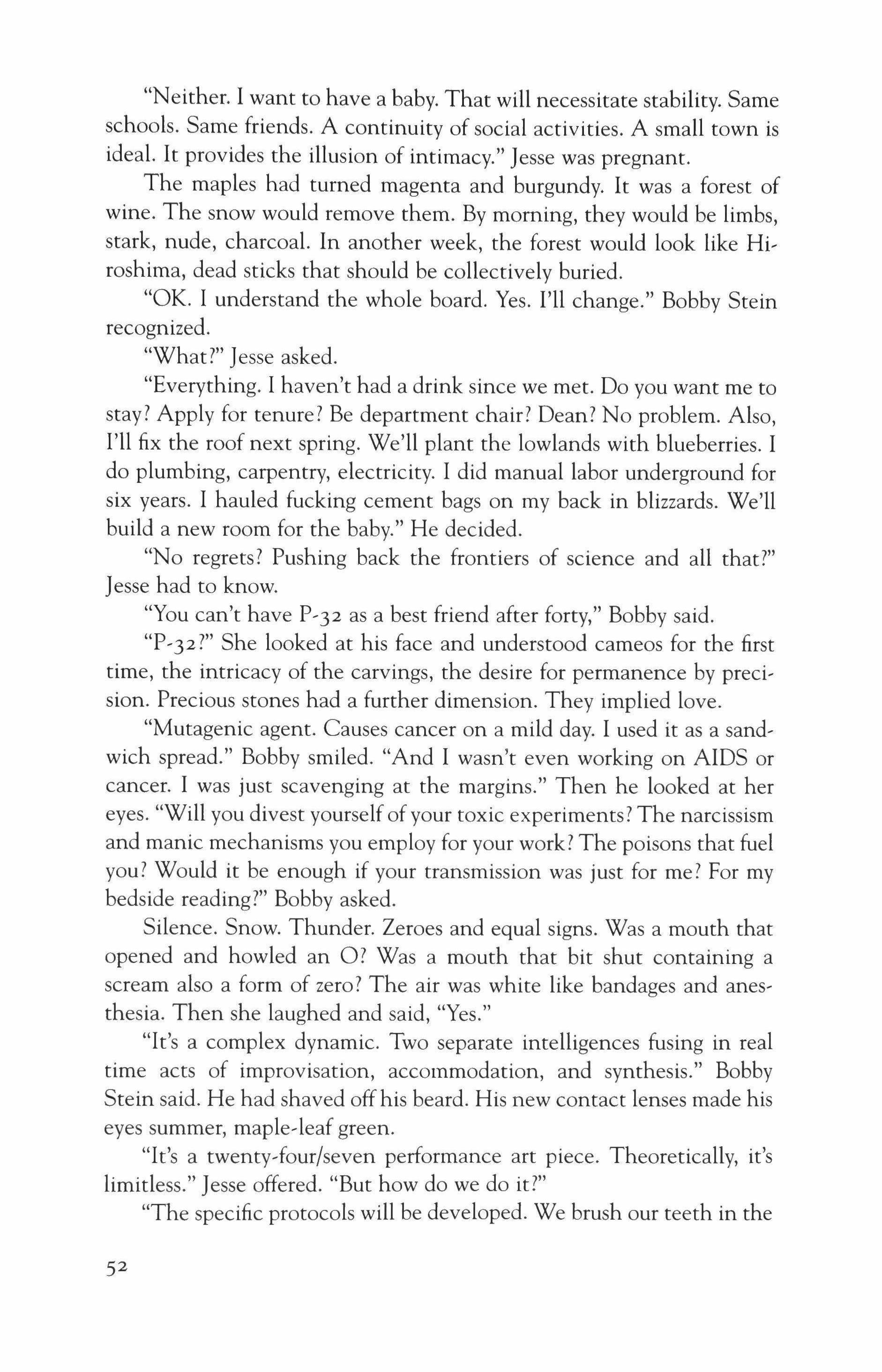
"Neither. I want to have a baby. That will necessitate stability. Same schools. Same friends. A continuity of social activities. A small town is ideal. It provides the illusion of intimacy." Jesse was pregnant.
The maples had turned magenta and burgundy. It was a forest of wine. The snow would remove them. By morning, they would be limbs, stark, nude, charcoal. In another week, the forest would look like Hiroshima, dead sticks that should be collectively buried.
"OK. I understand the whole board. Yes. I'll change." Bobby Stein recognized.
"What?" Jesse asked.
"Everything. I haven't had a drink since we met. Do you want me to stay? Apply for tenure? Be department chair? Dean? No problem. Also, I'll fix the roof next spring. We'll plant the lowlands with blueberries. I do plumbing, carpentry, electricity. I did manual labor underground for six years. I hauled fucking cement bags on my back in blizzards. We'll build a new room for the baby." He decided.
"No regrets? Pushing back the frontiers of science and all that?" J esse had to know.
"You can't have P�32 as a best friend after forty," Bobby said. "P�32?" She looked at his face and understood cameos for the first time, the intricacy of the carvings, the desire for permanence by precision. Precious stones had a further dimension. They implied love.
"Mutagenic agent. Causes cancer on a mild day. I used it as a sandwich spread." Bobby smiled. "And I wasn't even working on AIDS or cancer. I was just scavenging at the margins." Then he looked at her eyes. "Will you divest yourself of your toxic experiments? The narcissism and manic mechanisms you employ for your work? The poisons that fuel you? Would it be enough if your transmission was just for me? For my bedside reading?" Bobby asked.
Silence. Snow. Thunder. Zeroes and equal signs. Was a mouth that opened and howled an O? Was a mouth that bit shut containing a scream also a form of zero? The air was white like bandages and anesthesia. Then she laughed and said, "Yes."
"It's a complex dynamic. Two separate intelligences fusing in real time acts of improvisation, accommodation, and synthesis." Bobby Stein said. He had shaved off his beard. His new contact lenses made his eyes summer, maple-leaf green.
"It's a twenty-four/seven performance art piece. Theoretically, it's limitless." Jesse offered. "But how do we do it?"
"The specific protocols will be developed. We brush our teeth in the

same sink. We breathe the same air. Our neural nets expand and entwine. We continue reading each other to sleep. We'll be children again. We'll grow up together. We'll become a symbiotic entity. Also, we need to pick out a suit for me. I must dress better to become Dean," Bobby Stein said.
"We're a bombed city. A capital after an earthquake," Jesse began. "We have no infrastructure. No roads. No buildings. The airport is destroyed. Gone the city parks with their rose gardens and ponds where lovers row red and yellow wooden boats. It's all gone. We have no bridges. No libraries. No hospitals or museums. Our history is dust. And we're under the debris, under bricks and rocks, broken and bleeding."
"Traditional urban centers are obsolete," Bobby replied. He tried not to think about the Bunsen burners and frog dissecting equipment that now defined his professional life. Recently, he had developed the strategy of pretending he had invented a time machine and was working in Louis Pasteur's lab.
"Bobby, my love. I hallucinate. I think about heroin, seriously, at least twice a week. Razors sing to me. My diagnosis is bipolar eleven, with numerous borderline features. If I wasn't camouflaged as writer-inresidence at this hole in the Allegheny Mountains, I'd be in an institution."
"Half the country could be behind bars. Listen, I'll cure you. I'll adjust your biochemistry, hunt down dysfunctional cells and destroy them, individually. You'll be my ultimate science project." He wrapped his arms around her.
Jessica Blum and Robert Stein married on a promontory overlooking the Pacific Ocean in French Polynesia on Christmas at sunset. They opted for the traditional vows. Two passing tourists served as witnesses. Then they went snorkeling. Their baby was born in summer and named Dylan. After reading the Iliad and Odyssey out loud, they bought a television and video player. They painted their house yellow and added a sunroom and porches.
Jesse did not become adept with stews and pastry. When Dylan entered first grade, she refused to carpool to any child-related event under any circumstances, citing an unspecified peripheral vision driving impairment. Jesse continued to read poetry out loud at night in their bed, particularly in the autumn and winter. Eventually, Bobby Stein became Dean and then Provost. He continued to carry his Beretta.
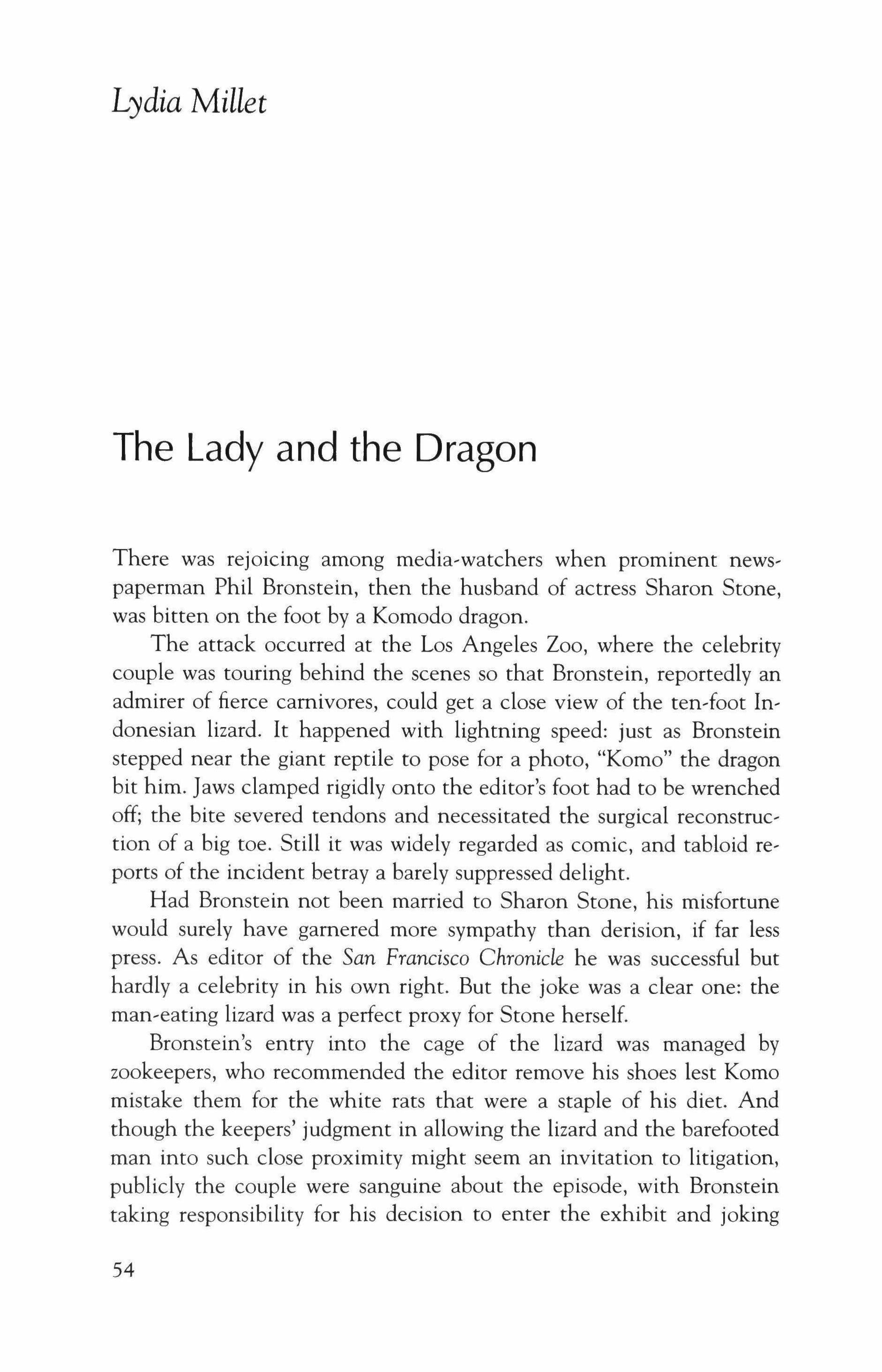
There was rejoicmg among media-watchers when prominent newspaperman Phil Bronstein, then the husband of actress Sharon Stone, was bitten on the foot by a Komodo dragon.
The attack occurred at the Los Angeles Zoo, where the celebrity couple was touring behind the scenes so that Bronstein, reportedly an admirer of fierce carnivores, could get a close view of the ten-foot Indonesian lizard. It happened with lightning speed: just as Bronstein stepped near the giant reptile to pose for a photo, "Komo" the dragon bit him. Jaws clamped rigidly onto the editor's foot had to be wrenched off; the bite severed tendons and necessitated the surgical reconstruction of a big toe. Still it was widely regarded as comic, and tabloid reports of the incident betray a barely suppressed delight.
Had Bronstein not been married to Sharon Stone, his misfortune would surely have garnered more sympathy than derision, if far less press. As editor of the San Francisco Chronicle he was successful but hardly a celebrity in his own right. But the joke was a clear one: the man-eating lizard was a perfect proxy for Stone herself.
Bronstein's entry into the cage of the lizard was managed by zookeepers, who recommended the editor remove his shoes lest Komo mistake them for the white rats that were a staple of his diet. And though the keepers' judgment in allowing the lizard and the barefooted man into such close proximity might seem an invitation to litigation, publicly the couple were sanguine about the episode, with Bronstein taking responsibility for his decision to enter the exhibit and joking

about the encounter. In television interviews Stone blamed neither the zoo nor the reptile.
In the wake of the media frenzy Komo became a highly popular attraction for zoo visitors. His noble brown head with its dignified throat wattle, his homely yet graceful body and sleepy eyes endeared him to zoo-goers, who fondly recalled his spirited nipping of the rich, assumedly virile Bronstein. In their native islands Komodos are top predators, fastmoving and heavy with a mouthful of deadly bacteria for killing prey. But as an individual, Komo was described by his keepers as "tractable" and "good with people," in an internal zoo memo. He had been seized as evidence in a U.S. Customs case against an endangered species smuggler named Wong and was residing at the zoo while Wong awaited trial.
Komo seems to have basked in the light of his newfound popularity. Keepers say he had previously lurked in the shadows of a fake log in his cage but now took up a position on a prominent rock, where he remained for hours a day in full view of the crowds, flicking his forked yellow tongue and posing.
There were no further incidents of aggression.
When after several months Komo's popularity finally subsided, he was sent on short-term breeding loan to a zoo in Singapore. There for a while he fell ill and was moved to the zoo infirmary. Once he recovered and his stud duties were done-females with whom he mated produced more than one hundred and twenty eggs-he was again moved, this time to a facility in Kuala Lumpur where he was purchased for a private zoo by a flamboyant Indonesian billionaire named Tunku Rajaputra. This is where I entered the story, since I was fresh from Texas A&M and employed, at the time, as a large-animal veterinarian for Rajaputra, whose inherited fortune was based on clove cigarettes and natural rubber. He knew of the lizard's checkered past and was, not incidentally, a diehard fan of Sharon Stone.
By this time Stone and Bronstein were divorced; the forty-something movie star had suffered a brain hemorrhage and was appearing in the box-office and critical bomb Catwoman. Rajaputra, a short but handsome bisexual who exhibited many of the diagnostic characteristics of narcissistic personality disorder, apparently believed he stood a good chance with the actress-if only he could arrange for a meeting. He brought the lizard to a luxury habitat in his vacation home near Sekongkang, on the island of Sumbawa. Other denizens of the private bestiary included two orangutans, a land tortoise, and a tiger shark in a
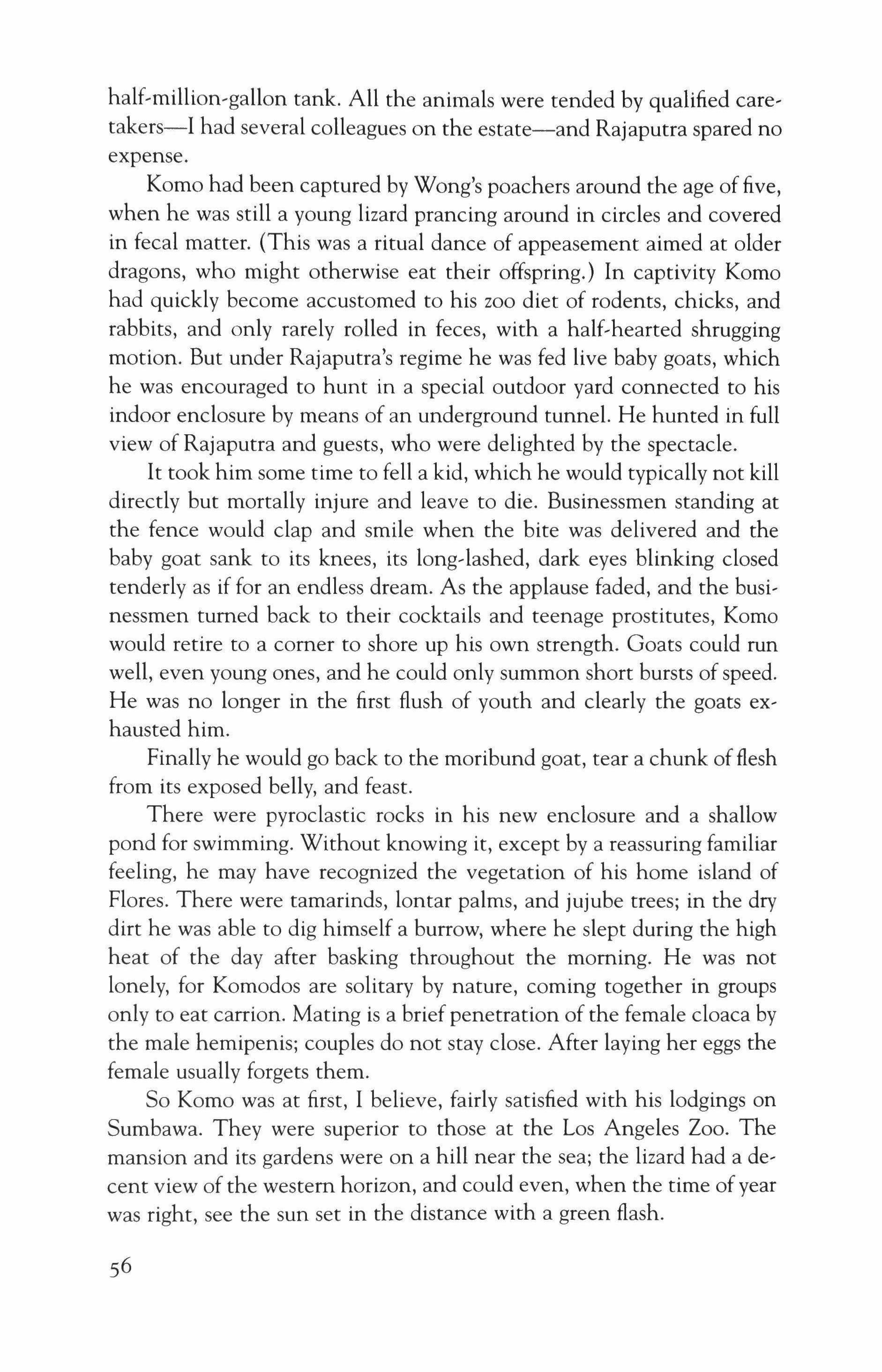
half-million-gallon tank. All the animals were tended by qualified caretakers-I had several colleagues on the estate-and Rajaputra spared no expense.
Komo had been captured by Wong's poachers around the age of five, when he was still a young lizard prancing around in circles and covered in fecal matter. (This was a ritual dance of appeasement aimed at older dragons, who might otherwise eat their offspring.) In captivity Komo had quickly become accustomed to his zoo diet of rodents, chicks, and rabbits, and only rarely rolled in feces, with a half-hearted shrugging motion. But under Rajaputra's regime he was fed live baby goats, which he was encouraged to hunt in a special outdoor yard connected to his indoor enclosure by means of an underground tunnel. He hunted in full view of Rajaputra and guests, who were delighted by the spectacle.
It took him some time to fell a kid, which he would typically not kill directly but mortally injure and leave to die. Businessmen standing at the fence would clap and smile when the bite was delivered and the baby goat sank to its knees, its long-lashed, dark eyes blinking closed tenderly as if for an endless dream. As the applause faded, and the businessmen turned back to their cocktails and teenage prostitutes, Komo would retire to a comer to shore up his own strength. Goats could run well, even young ones, and he could only summon short bursts of speed. He was no longer in the first flush of youth and clearly the goats exhausted him.
Finally he would go back to the moribund goat, tear a chunk offlesh from its exposed belly, and feast.
There were pyroclastic rocks in his new enclosure and a shallow pond for swimming. Without knowing it, except by a reassuring familiar feeling, he may have recognized the vegetation of his home island of Flores. There were tamarinds, lontar palms, and jujube trees; in the dry dirt he was able to dig himself a burrow, where he slept during the high heat of the day after basking throughout the morning. He was not lonely, for Komodos are solitary by nature, coming together in groups only to eat carrion. Mating is a brief penetration of the female cloaca by the male hemipenis; couples do not stay close. After laying her eggs the female usually forgets them.
So Komo was at first, I believe, fairly satisfied with his lodgings on Sumbawa. They were superior to those at the Los Angeles Zoo. The mansion and its gardens were on a hill near the sea; the lizard had a decent view of the western horizon, and could even, when the time of year was right, see the sun set in the distance with a green flash.

The situation changed with the arrival of Sharon Stone.
In a fit of drug,enhanced megalomania following cosmetic surgery for the removal of a small wart on his back, Rajaputra had become con' vinced that the procurement of Stone for a concubine was the merest of formalities. Confident that the movie star would be pleased to become his chattel, he charged one ofhis junior secretaries with her summoning and transportation to the compound. This secretary, Suandi, spoke only rudimentary English and was terrified by the prospect of trying to talk to important Hollywood persons over the transpacific telephone lines. Thus instead of calling he sent various awkwardly worded e-rnails to Stone's agent, manager, and accountant, whose contact details were several weeks in the finding.
As the senior secretary Yang later learned, the agent's assistant deleted Suandi's messages immediately, mistaking them for spam. The manager's assistant moved the messages to a folder marked "Potential Stalkers." The accountant's assistant was admitted to rehab before read, ing the e-mail. Suandi checked his in-box faithfully each morning in eager hopes of a response from Stone's handlers, but was invariably dis, appointed; and under constant pressure from Rajaputra, who kept ex, pecting the actress to show up for dinner, he finally broke down and asked for Yang's help.
The "Sharon Stone" who arrived by small plane shortly before the onset of the monsoon season was admittedly a few pounds heavier than Rajaputra would have guessed from her movie appearances. On the other hand, her hair was even blonder; she looked refreshingly young and smooth, as though her very skin were made of freshly molded latex; and she responded with a white, toothy smile to his overtures from the first night onward, joining him in his curiously outdated waterbed after minimal cajoling. She admired his mahogany headboard carved with in, tertwined pythons.
And she assured him that the discrepancy between her real-life and film physiques was entirely normal and a matter of clever special effects, for no actress, she said-speaking upside-down through her outstretched legs in a downward-facing-dog pose--could actually be as thin as the tricks of cinematography made her seem.
She practiced yoga every morning. Rajaputra admired her thigh muscles.
The billionaire's English, learned at a British school in Hong Kong, had an Oxbridge flavor. Despite this he was far from fluent and there were many words he did not know; much American slang went right

over his head, and to compound the problem Sharon Stone often spoke far too fast. But it was pleasant to immerse himself in the cascade of words, and what he did not understand in her utterances he glossed over, unwilling to admit there were gaping holes in his vocabulary. For this reason he and Sharon Stone did not always comprehend each other perfectly, but acted as though they did.
And while his assumption was that Sharon Stone had come to stay-and a date for their sumptuous wedding should be set sooner rather than later-the lookalike had in fact been hired by Yang for a period of not more than three weeks while the Las Vegas show she danced in was on hiatus. She was always glad to moonlight as Stone, for to play the part entertained her and the money was often good; in this instance the money had been excellent, the seats first-class, the location exotic, and-an unexpected perk-the guy for once halfway good-looking.
He took her to meet Komo on the second morning but offered no introduction as they walked through the gardens, for he wished it to be a complete surprise.
She had been only vaguely aware of the incident at the Los Angeles Zoo. A strip club and two bachelor parties had engaged her services in the weeks thereafter to stage send-ups of it. On one memorable occasion she had played a nude Stone in high heels, talking and laughing on her cell phone as her husband {also nude} thrashed back and forth in the background in the grips of what looked like an alligator. All of this was juvenile and none of it made much sense; but then, she had not been hired as a drama critic.
And that was long ago now. She had never seen a Komodo dragon in person, in fact she had never even seen a picture of one; and while Suandi and Yang had warned her solemnly that she must always remain in character, the sight of Komo came as such a shock that she forgot. He was gobbling a fresh kill; his mouth and jaw were covered in blood. The fawn eviscerated beside him bore a striking resemblance to Bambi. And just as Sharon Stone and Rajaputra loomed over his wall Komo pulled from Bambi a long string of intestines, holding them in his mouth and shaking them vigorously back and forth to expel the inedible matter within. Blood and feculence spattered onto the dirt.
Rajaputra could hardly have known that a seminal incident of Sharon Stone's childhood, which she later revealed to Yang and me, had involved her father, a meth head who split his time between Reno and Twentynine Palms, disemboweling her mother's yappy Pomeranian with
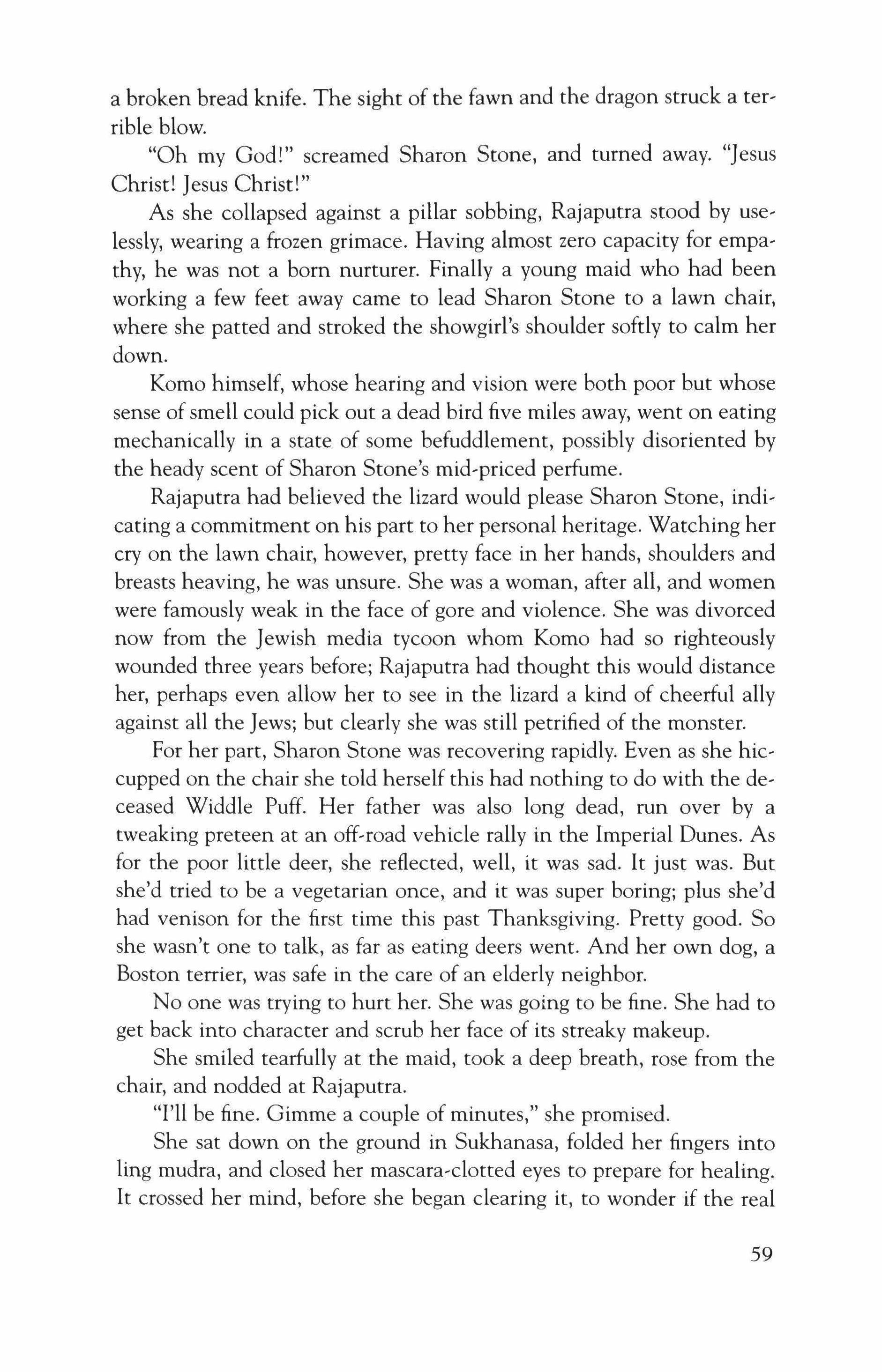
a broken bread knife. The sight of the fawn and the dragon struck a terrible blow.
"Oh my God!" screamed Sharon Stone, and turned away. "Jesus Christ! Jesus Christ!"
As she collapsed against a pillar sobbing, Rajaputra stood by use' lessly, wearing a frozen grimace. Having almost zero capacity for ernpathy, he was not a born nurturer. Finally a young maid who had been working a few feet away came to lead Sharon Stone to a lawn chair, where she patted and stroked the showgirl's shoulder softly to calm her down.
Komo himself, whose hearing and vision were both poor but whose sense of smell could pick out a dead bird five miles away, went on eating mechanically in a state of some befuddlement, possibly disoriented by the heady scent of Sharon Stone's mid-priced perfume.
Rajaputra had believed the lizard would please Sharon Stone, indieating a commitment on his part to her personal heritage. Watching her cry on the lawn chair, however, pretty face in her hands, shoulders and breasts heaving, he was unsure. She was a woman, after all, and women were famously weak in the face of gore and violence. She was divorced now from the Jewish media tycoon whom Komo had so righteously wounded three years before; Rajaputra had thought this would distance her, perhaps even allow her to see in the lizard a kind of cheerful ally against all the Jews; but clearly she was still petrified of the monster.
For her part, Sharon Stone was recovering rapidly. Even as she hiecupped on the chair she told herself this had nothing to do with the de, ceased Widdle Puff. Her father was also long dead, run over by a tweaking preteen at an off,road vehicle rally in the Imperial Dunes. As for the poor little deer, she reflected, well, it was sad. It just was. But she'd tried to be a vegetarian once, and it was super boring; plus she'd had venison for the first time this past Thanksgiving. Pretty good. So she wasn't one to talk, as far as eating deers went. And her own dog, a Boston terrier, was safe in the care of an elderly neighbor.
No one was trying to hurt her. She was going to be fine. She had to get back into character and scrub her face of its streaky makeup.
She smiled tearfully at the maid, took a deep breath, rose from the chair, and nodded at Rajaputra.
"I'll be fine. Gimme a couple of minutes," she promised.
She sat down on the ground in Sukhanasa, folded her fingers into ling mudra, and closed her mascara,clotted eyes to prepare for healing. It crossed her mind, before she began clearing it, to wonder if the real

Sharon Stone would have yelled out "Jesus Christ! Jesus Christ!" But probably it was OK; the star was rumored to be a Buddhist these days.
The maid curtseyed and retreated.
Meanwhile Rajaputra came to a decision.
He left Sharon Stone where she was and came looking for me. He would tell me to kill the lizard, kill it immediately, shoot it point,blank through the head. He would have liked to do the deed himself in full view of his assembled servants, but he suspected Sharon Stone would not appreciate that. If he were a woman, he thought, he would find it highly erotic, but he was not a woman, and he was certainly not Sharon Stone. She had already refused a leopard coat he had offered her, on the grounds that it was not nice to flay dead creatures and steal their furry coverings. This was what he had gathered, at least. He did not quite fathom her religion, but no doubt in time he would learn to predict its irrational prohibitions.
Of course, I had come to be fond of Komo and was not inclined to' ward murder, even beyond the fact that it was illegal and went against the ethics of my profession. But I had worked for Rajaputra for almost a year by then and knew the billionaire's volatile moods all too well, so I agreed to dispose of the lizard provided Rajaputra would permit me to use lethal injection instead of a firearm.
Rajaputra contemplated the request for a few seconds, then seemed to realize the gun gesture would only work if he himself were the shooter. I would steal his fire if he let me kill the dragon myself with his favorite .45. Mine would be the glory. Other staff might see the execution and think I was more manly.
"Fine, fine," he said hurriedly. By now he was quite transparently afraid I might in fact cling to the firearm idea, which he himself had foolishly handed to me on a platter. "Yes. Injection. Do it today! And send the skin to Andre in Tokyo. I want a jacket and two pairs of boots. Size twenty-six men's."
Then he returned to Sharon Stone, who by this time was lying on her back on a towel and pulling up her legs one by one into Vatayanasana, the wind,relieving pose.
I ducked into staff quarters to consult with the chief animal keeper, my confidante on matters of herp care. We did the math and decided on an appropriate dose of sedative; we made calls; I filled a sy, ringe; we pulled on our protective leg-wear and along with two assistant keepers marched over to Komo's indoor enclosure, where the lizard was by then slumbering. He had consumed about forty percent
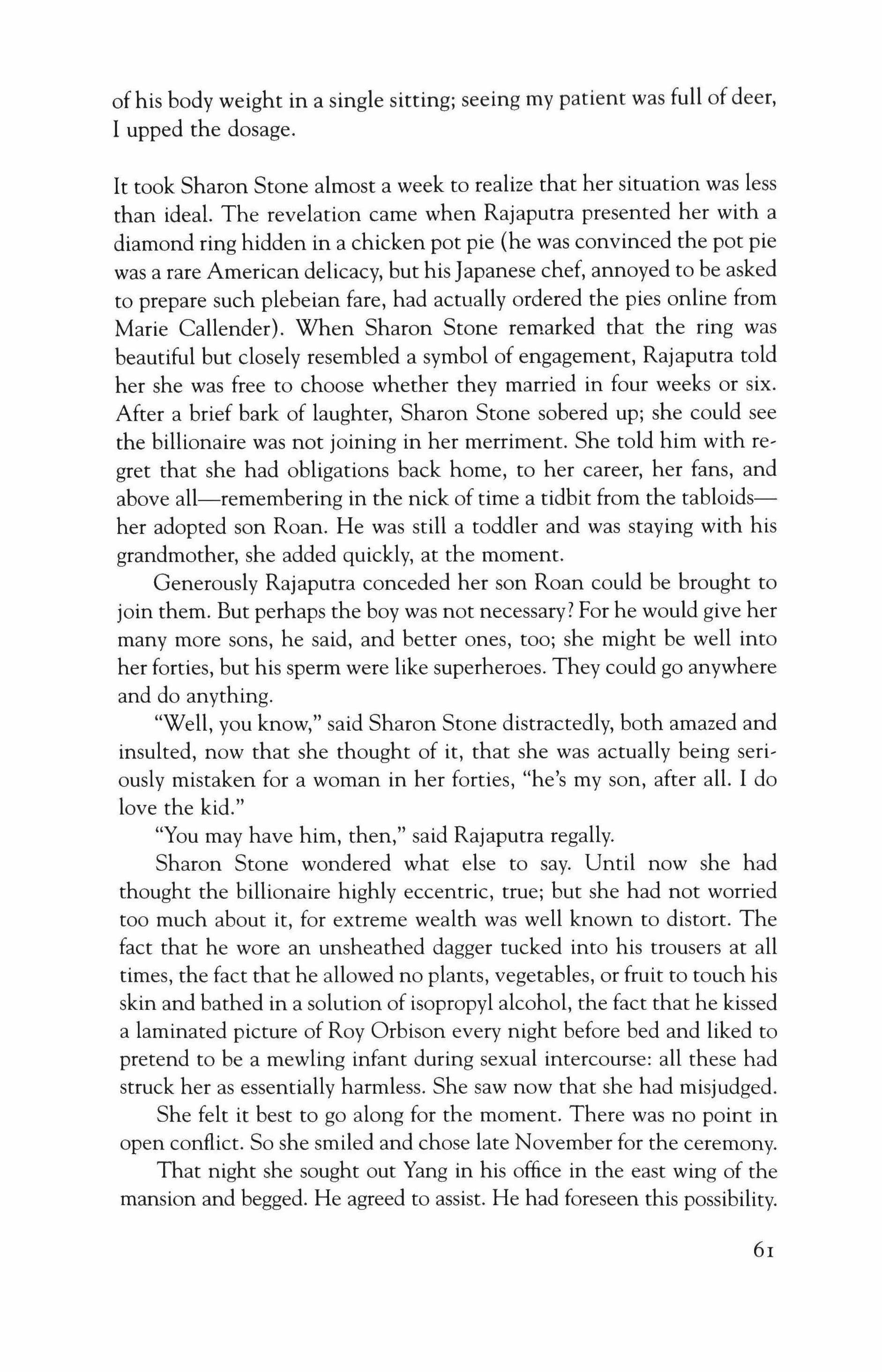
of his body weight in a single sitting; seeing my patient was full of deer, I upped the dosage.
It took Sharon Stone almost a week to realize that her situation was less than ideal. The revelation came when Rajaputra presented her with a diamond ring hidden in a chicken pot pie (he was convinced the pot pie was a rare American delicacy, but his Japanese chef, annoyed to be asked to prepare such plebeian fare, had actually ordered the pies online from Marie Callender). When Sharon Stone remarked that the ring was beautiful but closely resembled a symbol of engagement, Rajaputra told her she was free to choose whether they married in four weeks or six. After a brief bark of laughter, Sharon Stone sobered up; she could see the billionaire was not joining in her merriment. She told him with regret that she had obligations back home, to her career, her fans, and above all-remembering in the nick of time a tidbit from the tabloidsher adopted son Roan. He was still a toddler and was staying with his grandmother, she added quickly, at the moment.
Generously Rajaputra conceded her son Roan could be brought to join them. But perhaps the boy was not necessary? For he would give her many more sons, he said, and better ones, too; she might be well into her forties, but his sperm were like superheroes. They could go anywhere and do anything.
"Well, you know," said Sharon Stone distractedly, both amazed and insulted, now that she thought of it, that she was actually being seriously mistaken for a woman in her forties, "he's my son, after all. I do love the kid."
"You may have him, then," said Rajaputra regally.
Sharon Stone wondered what else to say. Until now she had thought the billionaire highly eccentric, true; but she had not worried too much about it, for extreme wealth was well known to distort. The fact that he wore an unsheathed dagger tucked into his trousers at all times, the fact that he allowed no plants, vegetables, or fruit to touch his skin and bathed in a solution of isopropyl alcohol, the fact that he kissed a laminated picture of Roy Orbison every night before bed and liked to pretend to be a mewling infant during sexual intercourse: all these had struck her as essentially harmless. She saw now that she had misjudged. She felt it best to go along for the moment. There was no point in open conflict. So she smiled and chose late November for the ceremony.
That night she sought out Yang in his office in the east wing of the mansion and begged. He agreed to assist. He had foreseen this possibility.
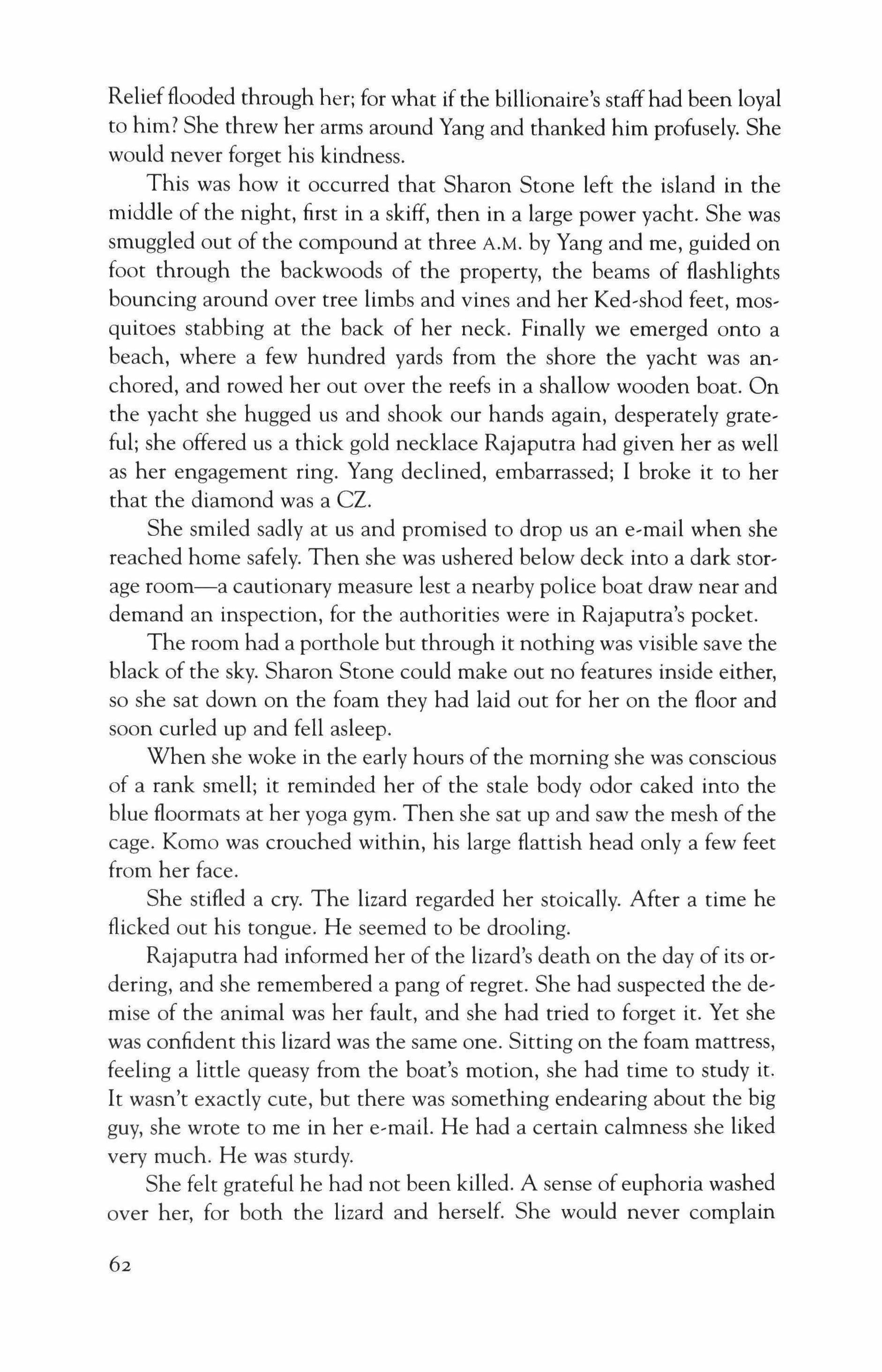
Reliefflooded through her; for what if the billionaire's staffhad been loyal to him? She threw her arms around Yang and thanked him profusely. She would never forget his kindness.
This was how it occurred that Sharon Stone left the island in the middle of the night, first in a skiff, then in a large power yacht. She was smuggled out of the compound at three A.M. by Yang and me, guided on foot through the backwoods of the property, the beams of flashlights bouncing around over tree limbs and vines and her Ked-shod feet, mosquitoes stabbing at the back of her neck. Finally we emerged onto a beach, where a few hundred yards from the shore the yacht was anchored, and rowed her out over the reefs in a shallow wooden boat. On the yacht she hugged us and shook our hands again, desperately grateful; she offered us a thick gold necklace Rajaputra had given her as well as her engagement ring. Yang declined, embarrassed; I broke it to her that the diamond was a CZ.
She smiled sadly at us and promised to drop us an e-mail when she reached home safely. Then she was ushered below deck into a dark storage room-a cautionary measure lest a nearby police boat draw near and demand an inspection, for the authorities were in Rajaputra's pocket.
The room had a porthole but through it nothing was visible save the black of the sky. Sharon Stone could make out no features inside either, so she sat down on the foam they had laid out for her on the floor and soon curled up and fell asleep.
When she woke in the early hours of the morning she was conscious of a rank smell; it reminded her of the stale body odor caked into the blue floormats at her yoga gym. Then she sat up and saw the mesh of the cage. Komo was crouched within, his large flattish head only a few feet from her face.
She stifled a cry. The lizard regarded her stoically. After a time he flicked out his tongue. He seemed to be drooling.
Rajaputra had informed her of the lizard's death on the day of its ordering, and she remembered a pang of regret. She had suspected the demise of the animal was her fault, and she had tried to forget it. Yet she was confident this lizard was the same one. Sitting on the foam mattress, feeling a little queasy from the boat's motion, she had time to study it. It wasn't exactly cute, but there was something endearing about the big guy, she wrote to me in her e-mail. He had a certain calmness she liked very much. He was sturdy.
She felt grateful he had not been killed. A sense of euphoria washed over her, for both the lizard and herself. She would never complain

again, she told herself, would never measure herself against more suecessful people. Just living was success enough. She was the luckiest woman in the world.
Presently there was a knock on her door and a sailor entered with a plastic tray of food.
"Is it safe in here with him?" she asked, but the sailor only bowed and nodded. He did not speak English.
She put some of her rice noodles in the cage with the lizard, who looked hungry, but he did not touch them.
"OK," she said, nodding. "I know you're more of a meat guy. I just thought I'd offer."
Later another sailor came in. He looked Indian to Sharon Stone, since he wore a turban. He bowed and smiled, then bustled around the cage checking the door latches and the lizard's water bowl. But maybe he was not Indian: did Indonesians also wear turbans sometimes? It was too confusing. And though she felt exuberant in the knowledge of her happy escape, she was still too shy to ask him.
Before this trip she had barely heard of Indonesia, and then last night Yang had told her it was the fourth biggest country in the world, people-wise. And India was over a billion strong. Along with China it was about to take over the world, Yang had said, slightly apologetic. In just a few years America would be a minor country, with nothing left of its brief foray into world domination but mountains of plastic and staggering debt. Its national parks and forests would be sold off to richer countries, and what remained of its crumbling cities would be turned into theme parks for foreign tourists. Who knew? She always thought India was a kind of quaint little place with spicy food, where everyone did yoga and the women drew red spots between their eyes, a shame because otherwise they were pretty. The men had cute accents but bad facial hair stylings. A good makeup guy could do wonders with the entire country.
"Where is the dragon going? Is he also going to the airport?"
"We're making a special stop for him," said the Indian. "He's being repatriated."
"How long?"
"Just a few hours. Sorry for the discomfort, Mrs."
"Well shit," said Sharon Stone. "This is nothing. This is great. Try the discomfort of being some crazy freak's sex slave for the rest of your life."
"Of course, Mrs. I get it."

"So thank you. All of you. I mean you guys are like my total saviors."
"I saw you in The Muse," said the Indian, and smiled radiantly. "You were absolutely fantastic!"
"Oh. Thanks, but you know. I'm a ringer."
"Excuse me?"
"I'm not the real Sharon Stone. I look like her, is all."
"Ah! Sure. Sure sure sure."
"No, really!"
"Sure sure. I get it, Mrs. You have my word. Your secret is safe with me."
"But
"I also liked you in Catwoman. Of course, it was not your best film. I will not lie to you, Mrs. Stone. But your performance was exemplary."
"I mean, thanks but-"
"Do you know Halle Berry? Is she a nice lady?"
Sharon Stone gave up.
"Very nice," she said, and smiled sweetly. A little creative license. "If you can get past the bad breath, that is."
Sharon Stone was allowed to go up on deck when they reached the island. The lizard's cage was difficult to fit through the door of the store room and it took six men to move it. She watched as they lowered the cage on a hook into a large motorboat; at the last minute she asked if she could go with them.
"We're just going to leave this fine fellow on the beach," said the Indian. "This is one of his home islands. Part of a national park just for him and his buddies. It won't be a long trip."
"Still," said Sharon Stone. "I would like to see it. Please?"
"Certainly, Mrs.," said the Indian.
She climbed down the ladder and sat next to him in the boat. The bay they were approaching was undeveloped-nothing but a gently curving sandy beach, deserted, and above it dull, dirt-brown hills dotted with a few scrubby trees. She looked at the lizard's hands through the cage, or were they feet? The fingers were kind of fat and wrinkled and the sharp claws gray and dirty. They reminded her of a great-aunt she'd visited in Scarsdale. Mean and crusty. But that wasn't the lizard's fault.
She looked at his face and felt a hole in her stomach at the thought of him being left here.
Gone. She would be alone then, she thought.
And the feeling persisted as she watched from the boat as the men heaved the cage onto the sand, opened it, and stood back with forked
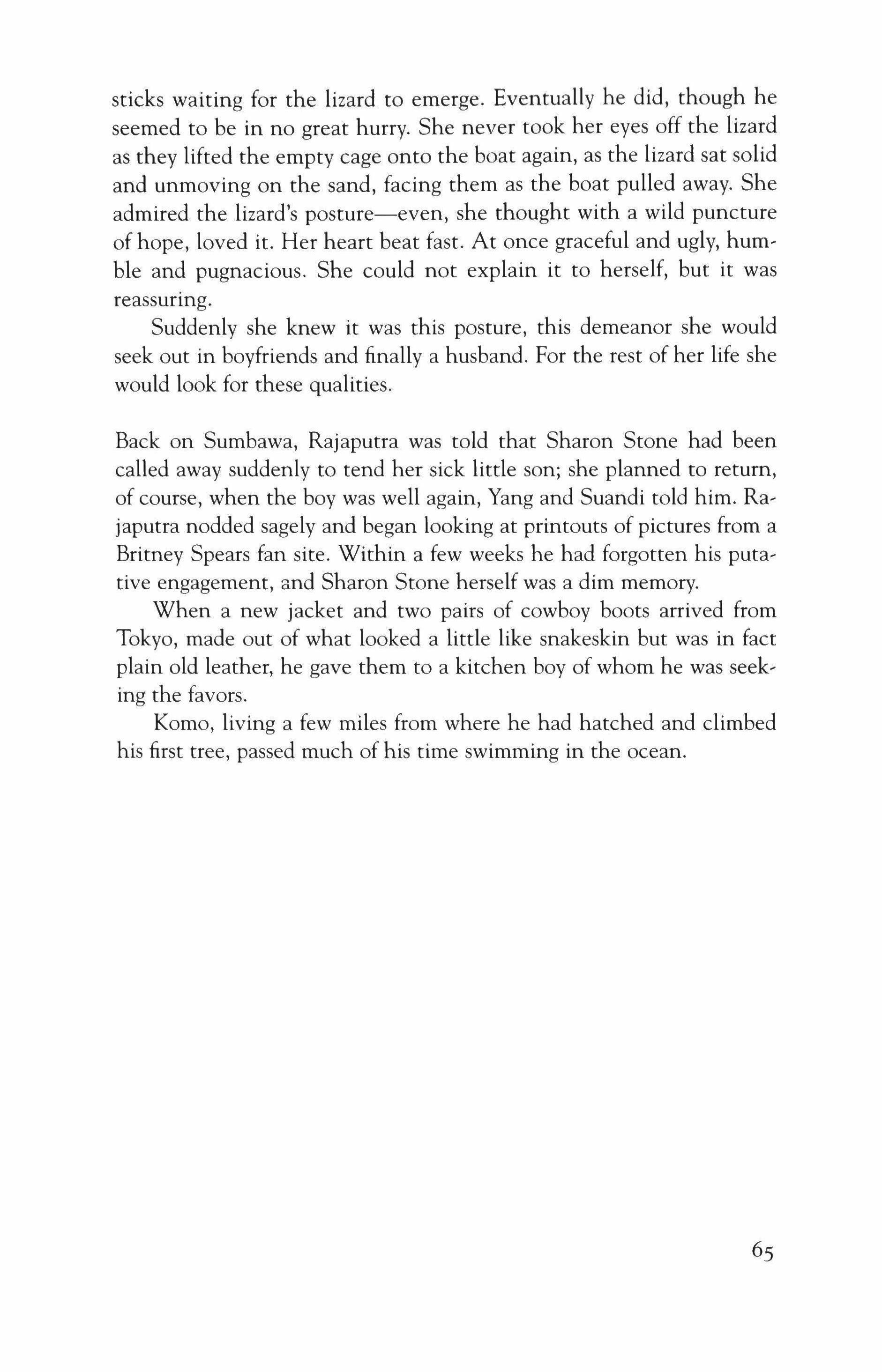
sticks waiting for the lizard to emerge. Eventually he did, though he seemed to be in no great hurry. She never took her eyes off the lizard as they lifted the empty cage onto the boat again, as the lizard sat solid and unmoving on the sand, facing them as the boat pulled away. She admired the lizard's posture-even, she thought with a wild puncture of hope, loved it. Her heart beat fast. At once graceful and ugly, humble and pugnacious. She could not explain it to herself, but it was reassuring.
Suddenly she knew it was this posture, this demeanor she would seek out in boyfriends and finally a husband. For the rest of her life she would look for these qualities.
Back on Sumbawa, Rajaputra was told that Sharon Stone had been called away suddenly to tend her sick little son; she planned to return, of course, when the boy was well again, Yang and Suandi told him. Rajaputra nodded sagely and began looking at printouts of pictures from a Britney Spears fan site. Within a few weeks he had forgotten his putative engagement, and Sharon Stone herself was a dim memory.
When a new jacket and two pairs of cowboy boots arrived from Tokyo, made out of what looked a little like snakeskin but was in fact plain old leather, he gave them to a kitchen boy of whom he was seeking the favors.
Komo, living a few miles from where he had hatched and climbed his first tree, passed much of his time swimming in the ocean.

Nothing was ever better than before, then, when music of Chopin, music of Mahler, and Bartok, whose notes convinced you that even bears danced gratefully. Forget their burnt paws. They ate well.
Today the news, opening old sores, like chewing pine cones-that most hand-grenade of fruitsso that when we taste, we taste bitter, forgetting the flavor of truth, and when we speak, our speech crawls on all fours, our words wither before they reach our own ears.
No music in dreams. No moon, either, none of that glowy light. But running, fleeing in ever slower motion in the dark from people with guns, their hunger whetted by the smell of guns, people with knives, the edges of blades as merciless as insects.
Memory asks me, How did you get such answers from the places you went to ask?
In the same way, I say, a left hand played piano alone, after the right hand was left in the war, the way thoughts will go on rising from the fog of loss, from the iron of severance.
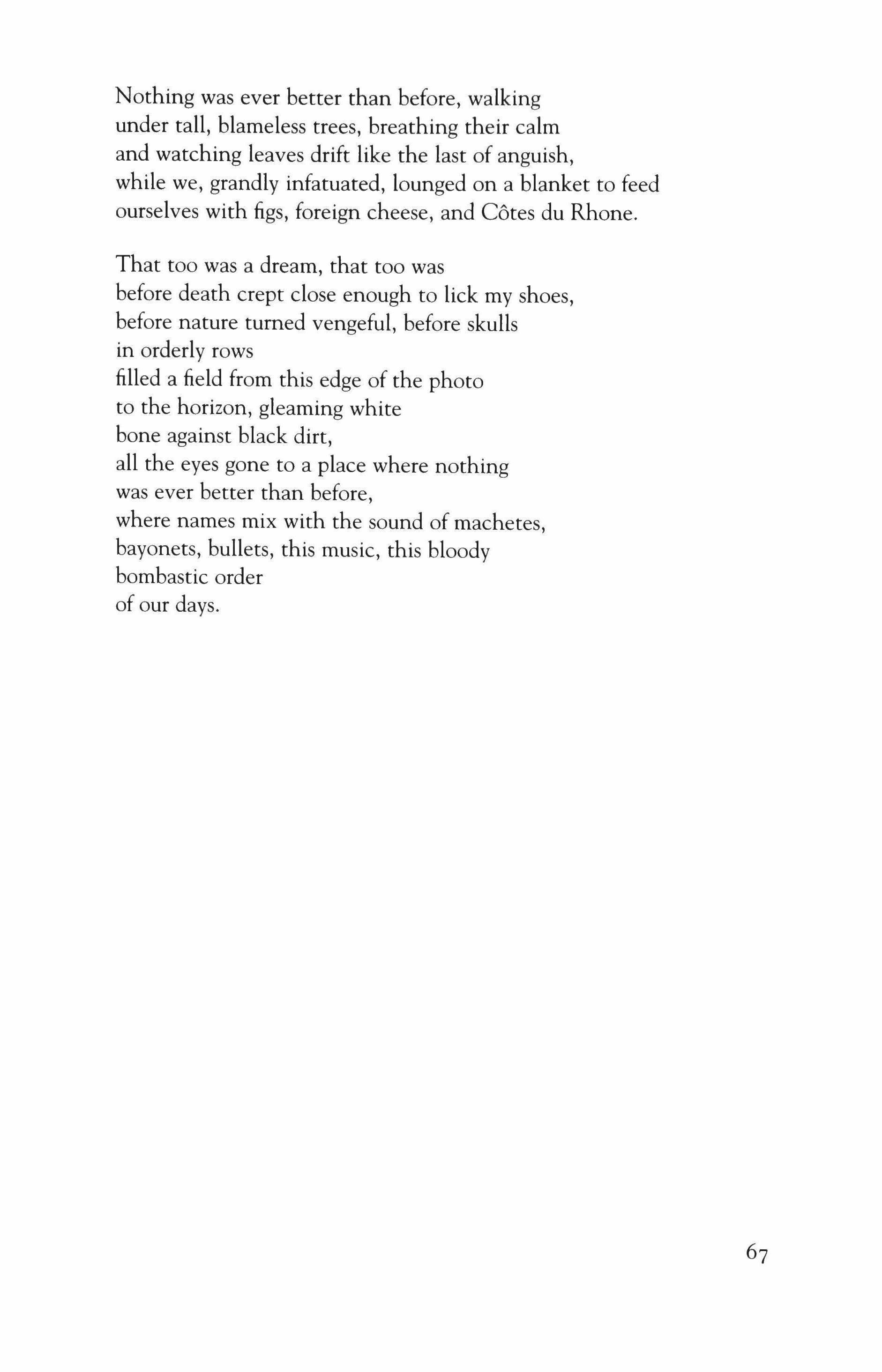
Nothing was ever better than before, walking under tall, blameless trees, breathing their calm and watching leaves drift like the last of anguish, while we, grandly infatuated, lounged on a blanket to feed ourselves with figs, foreign cheese, and Cotes du Rhone.
That too was a dream, that too was before death crept close enough to lick my shoes, before nature turned vengeful, before skulls in orderly rows filled a field from this edge of the photo to the horizon, gleaming white bone against black dirt, all the eyes gone to a place where nothing was ever better than before, where names mix with the sound of machetes, bayonets, bullets, this music, this bloody bombastic order of our days.
Translated from the Arabic1 by
Humphrey Davies
You still remember.
Twice the pistol's muzzle was placed and held firmly against my forehead. Four hands had control over my life, capable of killing me easily and without emotion. With four hands gripping it like steel, the pistol was pressed so hard that the tip of the barrel dug into the skin of my brow, making the bones between my eyebrows bleed.
Both times the distance in time between my brain and its disintegration-its detonation, its blasting, its pulverization-was only a few fractions of a second, an instant, that of a single, easy pressing of an index finger on a trigger leading to the bullet's penetration of my forehead and the explosion of my head and skull, along with the contents, and my crashing onto my back on the ground, no resonating cry or gasp or death rattle, my face covered with blood, my corpse stretched out lifeless, a cadaver.
But sadly-for better or for worse-that instant hasn't happened. Hasn't happened yet.
Two times, my nose filled with mucus, my lungs and chest filled with the searing smell of burnt gunpowder, and the sound of death whistled in my ears.
1.

The black pistol rested quietly on my forehead and the hands of the angel of death squeezed my neck. His palms and fingers, their grip, were of iron. For a period beyond calculation, he held me firm, held me rigid where I was, had command of me and possessed me, but before taking me loosened his grip little by little, removed his fingers from my neck and drew back, leaving me to release the air pent up in my chest and breathe again. He pulled his hands away, leaving on me a mark that has never been erased and will not disappear till he returns to me once more, one final time, on a day not long from now, when he will come and take me and not draw back.
The first time I was a youth, hip and happy.
A few months before, I'd graduated from the Philosophy Department at Cairo University, awarding myself the title "Junior Epicurean Philosopher"! I was the supposed provider for a family provided for by my father and my mother-in-law, with no job and nothing to do. And of course very grateful and much obliged to the government for its openhandedness and amazing generosity, as expressed in the shape of my being excused, on the basis of being an only child, from military service.
Hussein el Kinik's military service status was "on call" for three years. It was in the minibus, as we crossed the Maryoutiya bridge on the way back from the Rimaya Military Service District, official certificates (whose purport was that we were to remain civilians alert to the call of the nation and at its disposal at any time) in hand, that a light went on in Hussein's head: why not offer ourselves to the carpet and papyrus bazaars in el Maryoutiya and Saqqara as salesmen for the tourists?
Hussein bent over and whispered in my ear, "Good money on the one side and living practice in our languages on the other. Sweet work all round, dude."
Hussein is endowed with numerous positive points: as a recent graduate of the Spanish Language Department, Faculty of Humanities, Cairo, he's good at Spanish, plus he has English, naturally. A quick thinker, cheerful, a little shy. I went along with him partly to encourage him and partly to fill up some of my spare time and keep myself amused.
I was unemployed, overripe fruit, a drone. My time was all my own and I had nothing to complain of but boredom, and emotional sterility. After four years of marriage, the distance between me and Afaf had become very wide. No big deal, no big deal at all.
As though I were the head of a family going off to earn his daily bread like any other of God's creatures, I set off with Hussein to make the rounds of the bazaars in search of work.

Hussein would come by my house at around nine in the morning, shaven, in a clean, gaily patterned short-sleeved shirt and Wrangler jeans, shod in Adidas, Ray-Ban sunglasses over his eyes, a Levi's cap on his head, and a silver bracelet round his wrist.
Every morning, full of energy and good spirits, we'd get on the Volkswagen minibus in front of the Abu el Hool School, get down at the Maryoutiya bridge, and proceed on foot.
The Maryoutiya is a canal as long and wide as a branch of the Nile and extends southward from the Pyramids all the way to Saqqara and from there to Dahshour. On his right, the walker will find Europeanstyle villas, their red pitched roofs waiting for the plentiful snows that one day must surely fall, as well as a scattering of sumptuous palaces and large bazaars selling carpets, tapestries, and papyri.
We would check the bazaar out first, before presenting ourselves to the manager or owner. Hussein had an eye for such things by virtue of his previous experience when he had worked in a bazaar here the summer before, and he was my leader. He did not, however, want to go back to the same bazaar he'd worked in, because the mister, the owner of the place, had robbed him and never paid the two months' salary and thousand pounds in commissions he owed him.
Hussein judged the bazaars by floor space, size of building, how expensively appointed they were, type and price of goods, size of workshop and number of workers in it, and the names of the tourist companies whose buses parked in front and which would determine the degree of affluence of the clientele and the grade of guide accompanying the tourist group, from all of which would follow the salary to be expected and the commissions to be hoped for.
For six days our journeys yielded nothing but abject failure as most of the bazaars were swarming with salesmen of our age, all of whom knew languages and were university graduates. Hussein's Spanish and few months' experience were of no help to him, for "supply outstrips demand, my friend."
In our despair, we started to think of each day's trip as a physical and mental exercise, and he would take my arm, or I his, and we would walk, rooting together through every part of our lives to date, each making a bare breast of things before the other, on the way out and on the way back, smoking and making fun of ourselves, joking and laughing at our wearisome good-far-nothingness.
Wherever we looked, the sun was dipping toward sunset over the Saqqara desert. Over the course of the day we had made the rounds of

about ten bazaars, tiring ourselves out with walking and getting de' pressed at the repeated rejections by the bazaar owners and managers, most of whom were men in their middle age, elegant, and arrogant as the lords and priests of ancient Memphis, with faces ruddy, plump, and frowning and with expensive scents-scents of lavish wealth, power, and high birth-wafting off them, and they shook their heads to the right and to the left, pouting their lips and saying, as calmly and slowly as ancient gods, "Be off with you! Go look for your fortunes elsewhere, the two of you!"
When we got to the triangular intersection at the entrance to the desert where the road to the Saqqara step pyramid begins, we decided this would be our last try, our last stop on the route, after which we'd go back to Guiza, never to return.
That last stop was the Tutankhamen Bazaar, a huge yellow building of stone with arabesque windows and a carved double-leaved Arab door ofbeech wood, all of it topped with a striking dome. At a large desk scat' tered with small Pharaonic statues that dominated the spacious store sat a brown giant of around forty, handsome and appealing, his long fluffy hair descending to his shoulders, a gold chain with the face of a lion on it hanging from his neck.
As usual, Hussein addressed himself directly to the manager, saying, "I'm a Spanish major, with English birfikt, okay French, and work expenence.
The man inclined his head, smiling and welcoming, and pointed to me. I said, "I'm English and Swahili."
"What?"
"Swahili, sir. I speak Swahili. Don't tell me you don't get customers from Swahilia."
On the intellectual level, I was going through my surrealist phase.
"A brother African country, sir."
Mr. Muhsin, younger brother of the entrepreneur who owned the bazaar, laughed and said he looked forward to seeing the customers from Swahilia and that meanwhile he hoped I'd be his personal jester. He appointed us as trainee salesmen, to be trained by "Foppy" Subhi.
The most senior, and skillful, of the bazaar's salesmen, Foppy had a body as graceful as a ballet dancer's. With extreme graciousness, lissome movements of his hands and waist, and a low, musical voice, Foppy taught us the elements of the craft in a couple of days. In the workshop, he made us memorize the patter in English and French-brief, simple words that summarized for the customers how the carpets, woven by

children's fingertips from the imagination of peasant artists, were produced-while in the gallery he gave us practical training, entertaining us with graceful and acrobatic displays of the art of showing off the "piece": how to send it flying through the air over the customers' heads and then deftly catch it; how to place it on the ground, turn somersaults, hop around, and leap over it with the movements of a gymnast and so display its aesthetic qualities; how to expose a piece of silk at right angles to the sun's rays, causing the customer to let out a long "Woooow!" of delight as he stood astonished at the shifting play of the colors on the surface of the cloth. He taught us the proper way to unroll the carpet and then roll it up again, like a handkerchief, and put it in the pocket of your pants. Foppy went to great length and into great detail to tutor us in the rules of tourist attraction and the principles of luring, persuading, and finally, with a wholly imaginary discount, seducing the customer, and he also spent a long time on a comprehensive and boringly detailed explanation of the most efficient older and newer techniques for getting the client well and truly plucked and trussed.
And daily, throughout those two months, Mr. Muhsin would boast to us that he, in person, was a direct descendant of the Pharaohs of Memphis. He-above all and with absolute certainty-was of the lineage of the great god Min, the god of coition of the Pharaohs of Memphis, whose children still continued to copulate and procreate in Mit Rahina, only a few steps from where we were.
One evening when making merry, stoned on opium, he brought out from the desk drawer a limestone statuette of moderate size of a man with a lean body, short, very thin, with legs like those of a polio victim and a full, tall, broad torso; an older man, stretched out on his back, his member, thick as a cudgel, emerging from its root between testicles the size of large oranges and stretching up over his belly and chest until its mighty head hung over the man's face like a sunshade. Hussein and I were dumbstruck and stared long at the awe-inspiring ancient stone. Mr. Muhsin said, "Observe well the statue's features. The face is pure Pharaonic, calm and dignified as a glorious god." Mr. Muhsin said it looked like him, exactly.
"This statue is an antiquity, and authentic, just as I am authentic."
Smoothing his long black hair with two thick hands he went on proudly, "I, the god Min, and anything with even a whiff of him about it, are in huge demand, in both Europe and America."
Then the mister went into peals of laughter that shook his huge body
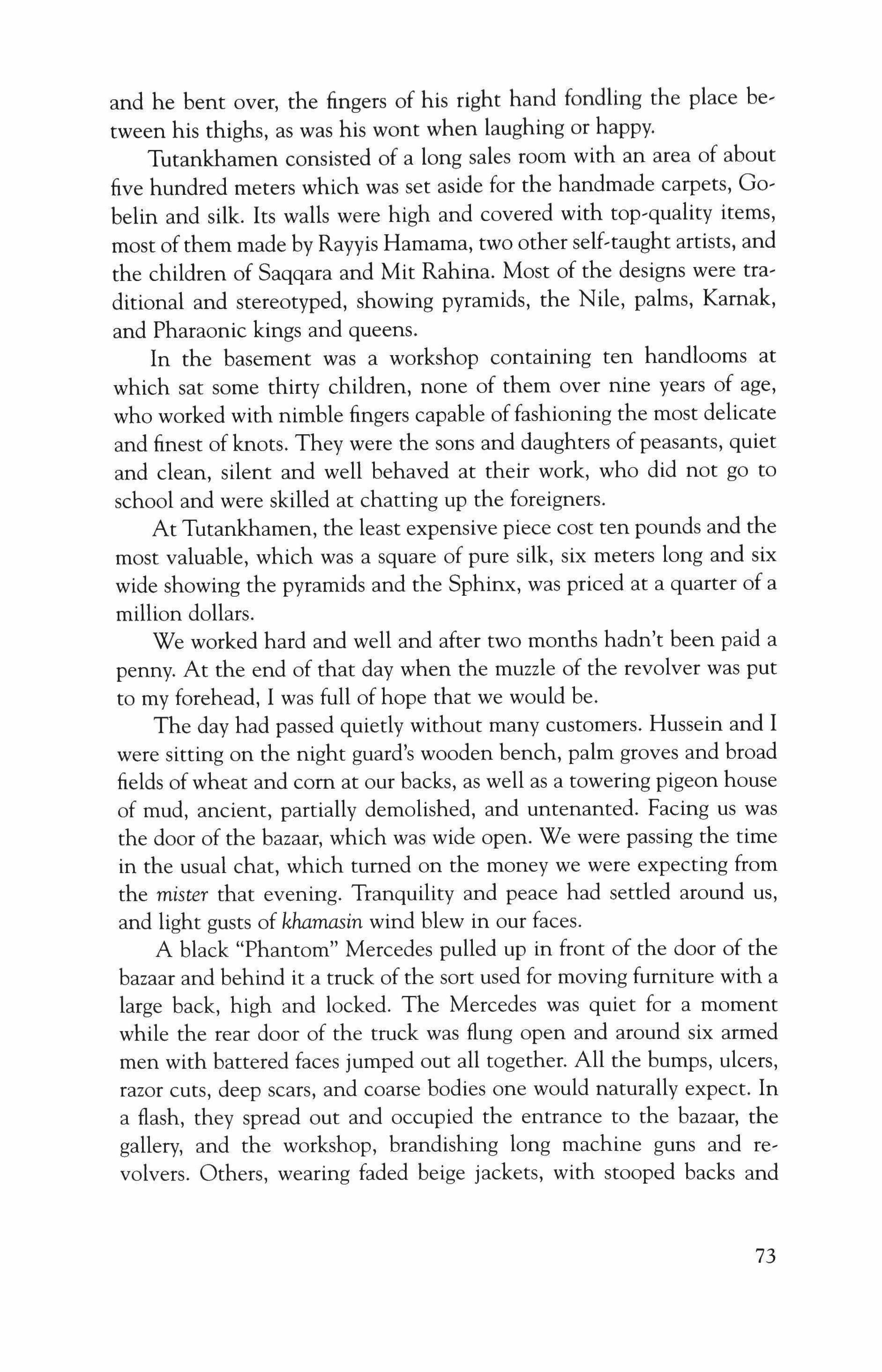
and he bent over, the fingers of his right hand fondling the place between his thighs, as was his wont when laughing or happy.
Tutankhamen consisted of a long sales room with an area of about five hundred meters which was set aside for the handmade carpets, Gobelin and silk. Its walls were high and covered with top-quality items, most of them made by Rayyis Hamama, two other self-taught artists, and the children of Saqqara and Mit Rahina. Most of the designs were traditional and stereotyped, showing pyramids, the Nile, palms, Karnak, and Pharaonic kings and queens.
In the basement was a workshop containing ten handlooms at which sat some thirty children, none of them over nine years of age, who worked with nimble fingers capable of fashioning the most delicate and finest of knots. They were the sons and daughters of peasants, quiet and clean, silent and well behaved at their work, who did not go to school and were skilled at chatting up the foreigners.
At Tutankhamen, the least expensive piece cost ten pounds and the most valuable, which was a square of pure silk, six meters long and six wide showing the pyramids and the Sphinx, was priced at a quarter of a million dollars.
We worked hard and well and after two months hadn't been paid a penny. At the end of that day when the muzzle of the revolver was put to my forehead, I was full of hope that we would be.
The day had passed quietly without many customers. Hussein and I were sitting on the night guard's wooden bench, palm groves and broad fields of wheat and com at our backs, as well as a towering pigeon house of mud, ancient, partially demolished, and untenanted. Facing us was the door of the bazaar, which was wide open. We were passing the time in the usual chat, which turned on the money we were expecting from the mister that evening. Tranquility and peace had settled around us, and light gusts of khamasin wind blew in our faces.
A black "Phantom" Mercedes pulled up in front of the door of the bazaar and behind it a truck of the sort used for moving furniture with a large back, high and locked. The Mercedes was quiet for a moment while the rear door of the truck was flung open and around six armed men with battered faces jumped out all together. All the bumps, ulcers, razor cuts, deep scars, and coarse bodies one would naturally expect. In a flash, they spread out and occupied the entrance to the bazaar, the gallery, and the workshop, brandishing long machine guns and revolvers. Others, wearing faded beige jackets, with stooped backs and

worn faces and looking like typical porters, moved into place. In sec, onds, the armed men had surrounded the workers at the bazaar, confining them to their various places-the elderly guard Abu Shamila, Rayyis Hamama, and the children in the basement, Foppy and the other em, ployees inside the gallery.
Lithe as a panther, one of them leapt in front of me and yelled, bran, dishing his revolver, "Who are you? What are you doing here?"
I must have tried, quite unconsciously, to stand, and from shock I had lost the power of speech. He gripped the pistol with both hands and rested the end of its barrel on my forehead, between my eyes.
In a deep calm voice he ordered me, "Put your hands up. Up."
I raised my arms, opening my hands as wide as I could, and swallowed with difficulty, taken completely aback.
Eventually, I managed to produce, in a high-pitched voice, "I'm employed here as a salesman."
With lightning speed, the whole contents of the bazaar-silks and luxury handmade Gobelin carpets--disappeared. Even the fitted carpet' ing on the floor was ripped from the tiles and loaded into the back of the large truck.
The pistol continued to rest quietly on my forehead, the metal muzzle hurting the skin. My body was rigid in its posture, my hands raised in the air in entreaty, the searing smell of gunpowder mixing with the air as it entered my chest, my face caught in surprise, a profusion of drops of sweat starting off it and dripping into my eyes and onto my cheeks. With a professional lack of emotion and complete indifference, the man watched me, eyes steely, face hard as a rock.
All the while the pistol was held to my forehead, I was thinking of one thing. I was trying to picture what would happen after this professional killer pulled its trigger and the bullet pierced my skull.
Some time after my demise, my father, uncle, and other relatives would come and gather my bloody corpse from off the asphalt, put it in an ambulance or hearse, and take it home. They'd lay it out on my bed. With God's name and with prayers, with water, soap, and the perfumes of the dead, they'd wash the dearly departed, wrap him in a white shroud, and place him on a wooden bier borrowed from the Righteous, ness Mosque. Rough wood beneath me and above me a green velvet cover.
I'd be placed inside a wooden box borne on the shoulders of four of my friends and neighbors. The wailing of Afaf, my uncle's wife, and the women of the quarter would see me off as I came out of the door of the
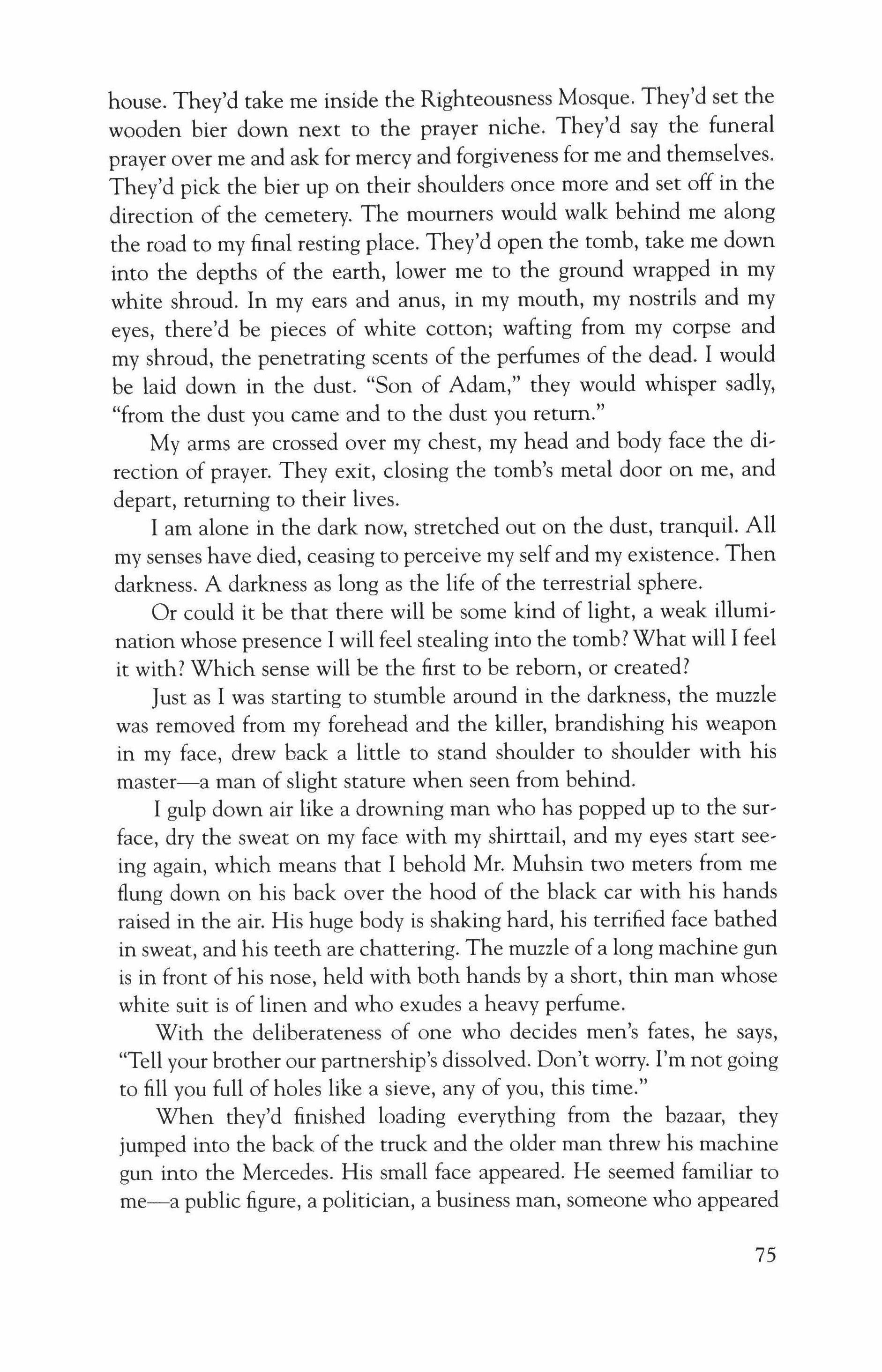
house. They'd take me inside the Righteousness Mosque. They'd set the wooden bier down next to the prayer niche. They'd say the funeral prayer over me and ask for mercy and forgiveness for me and themselves. They'd pick the bier up on their shoulders once more and set off in the direction of the cemetery. The mourners would walk behind me along the road to my final resting place. They'd open the tomb, take me down into the depths of the earth, lower me to the ground wrapped in my white shroud. In my ears and anus, in my mouth, my nostrils and my eyes, there'd be pieces of white cotton; wafting from my corpse and my shroud, the penetrating scents of the perfumes of the dead. I would be laid down in the dust. "Son of Adam," they would whisper sadly, "from the dust you came and to the dust you return."
My arms are crossed over my chest, my head and body face the direction of prayer. They exit, closing the tomb's metal door on me, and depart, returning to their lives.
I am alone in the dark now, stretched out on the dust, tranquil. All my senses have died, ceasing to perceive my self and my existence. Then darkness. A darkness as long as the life of the terrestrial sphere.
Or could it be that there will be some kind of light, a weak illumination whose presence I will feel stealing into the tomb? What will I feel it with? Which sense will be the first to be reborn, or created?
Just as I was starting to stumble around in the darkness, the muzzle was removed from my forehead and the killer, brandishing his weapon in my face, drew back a little to stand shoulder to shoulder with his master-a man of slight stature when seen from behind.
I gulp down air like a drowning man who has popped up to the surface, dry the sweat on my face with my shirttail, and my eyes start seeing again, which means that I behold Mr. Muhsin two meters from me flung down on his back over the hood of the black car with his hands raised in the air. His huge body is shaking hard, his terrified face bathed in sweat, and his teeth are chattering. The muzzle of a long machine gun is in front of his nose, held with both hands by a short, thin man whose white suit is of linen and who exudes a heavy perfume.
With the deliberateness of one who decides men's fates, he says, "Tell your brother our partnership's dissolved. Don't worry. I'm not going to fill you full of holes like a sieve, any of you, this time."
When they'd finished loading everything from the bazaar, they jumped into the back of the truck and the older man threw his machine gun into the Mercedes. His small face appeared. He seemed familiar to me-a public figure, a politician, a business man, someone who appeared
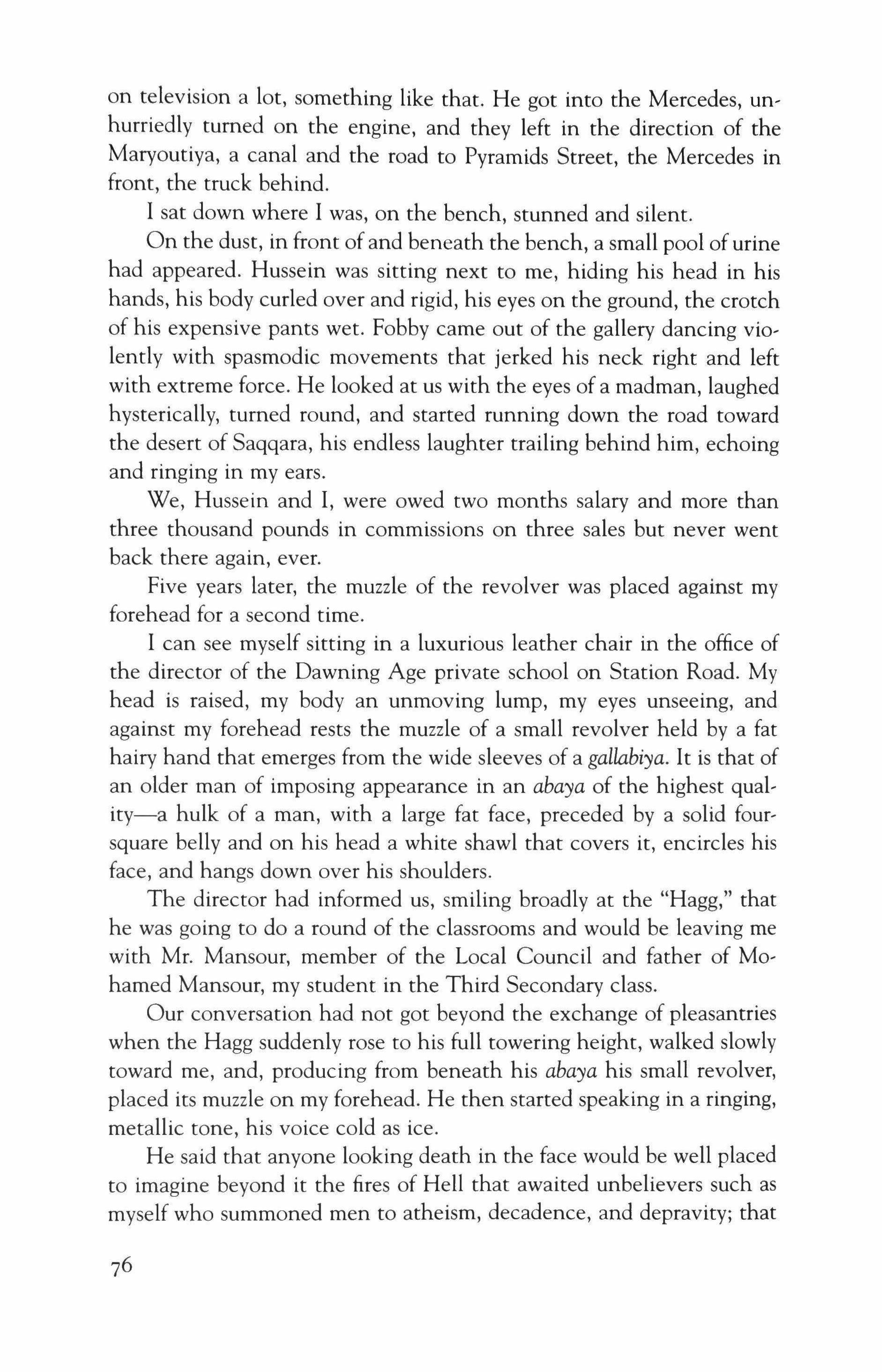
on television a lot, something like that. He got into the Mercedes, unhurriedly turned on the engine, and they left in the direction of the Maryoutiya, a canal and the road to Pyramids Street, the Mercedes in front, the truck behind.
I sat down where I was, on the bench, stunned and silent.
On the dust, in front of and beneath the bench, a small pool of urine had appeared. Hussein was sitting next to me, hiding his head in his hands, his body curled over and rigid, his eyes on the ground, the crotch of his expensive pants wet. Fobby came out of the gallery dancing violently with spasmodic movements that jerked his neck right and left with extreme force. He looked at us with the eyes of a madman, laughed hysterically, turned round, and started running down the road toward the desert of Saqqara, his endless laughter trailing behind him, echoing and ringing in my ears.
We, Hussein and I, were owed two months salary and more than three thousand pounds in commissions on three sales but never went back there again, ever.
Five years later, the muzzle of the revolver was placed against my forehead for a second time.
I can see myself sitting in a luxurious leather chair in the office of the director of the Dawning Age private school on Station Road. My head is raised, my body an unmoving lump, my eyes unseeing, and against my forehead rests the muzzle of a small revolver held by a fat hairy hand that emerges from the wide sleeves of a gallabiya. It is that of an older man of imposing appearance in an abaya of the highest quality-a hulk of a man, with a large fat face, preceded by a solid foursquare belly and on his head a white shawl that covers it, encircles his face, and hangs down over his shoulders.
The director had informed us, smiling broadly at the "Hagg," that he was going to do a round of the classrooms and would be leaving me with Mr. Mansour, member of the Local Council and father of Mohamed Mansour, my student in the Third Secondary class.
Our conversation had not got beyond the exchange of pleasantries when the Hagg suddenly rose to his full towering height, walked slowly toward me, and, producing from beneath his abaya his small revolver, placed its muzzle on my forehead. He then started speaking in a ringing, metallic tone, his voice cold as ice.
He said that anyone looking death in the face would be well placed to imagine beyond it the fires of Hell that awaited unbelievers such as myself who summoned men to atheism, decadence, and depravity; that

he was capable, by means of a simple squeeze, of gaining a heavenly reward from God; that he had, praise God, been endowed with the means to put an end to abomination with his own hand; and that I should listen very carefully. He yelled that the conduct of his son, Mohamed Mansour, had changed greatly. He had stopped going to the mosque for prayers. He drank cheap alcohol, smoked marijuana, and spoke bizarre nonsense about God, the Last Day, and God's Messengers. Most recently, affirming to his companions his new philosophical position, he had gone around proudly telling everyone he was an existentialist, of the sect of Sartre.
"Which means, my dear sir, that he's an atheist and a free thinker, which means that he's an unbeliever, my dear Philosophy teacher."
I felt my body go rigid and my heart stop beating.
"You are a teacher of Unbelief, not a teacher of Philosophy."
I tried to defend myself. I said, beseechingly, that it hadn't happened, that I taught the government curriculum, nothing more, and that I had nothing to do with his son's behavior.
The Local Council member said, "The government are unbelievers and they teach unbelief."
He removed the revolver from my forehead, continuing to brandish it in my face as he bent down and gazed into my face with his large malicious black eyes, and proudly announced, with fake erudition and overweening conceit, that he knew, praise God, the laws of God, and was going to going to carry out God's sentence against me.
My breathing stopped and my throat turned to stone.
He then pronounced his judgment, saying that, legally speaking, I was responsible for his son's atheism, for he who teaches unbelief is an unbeliever; that I had abandoned the community of Islam; and that the preacher of unbelief was an atheist. He, however, unfortunately, was not empowered to carry out God's judgment against me until he had first asked me to repent, meaning that I had either to repudiate my unbelief and trespasses and repeat the two professions of faith, or else
I grabbed the lifebelt he had thrown me and interrupted him by quickly reciting the two professions, mechanically and in a loud voice that came from the roof of my mouth. I repeated them once, twice, and a third time.
The man looked at me with contempt and disgust, spat on the ground, and returned his revolver to the pocket of his white abaya.
As he left the office, he ordered me in a voice of thunder, "Find yourself another job, and cleanse yourself, filth."

The moment the Hagg left, the director arrived and sent me to the administration to terminate my contract.
How had I chosen the wrong path?
Why hadn't I listened to what my father had said?
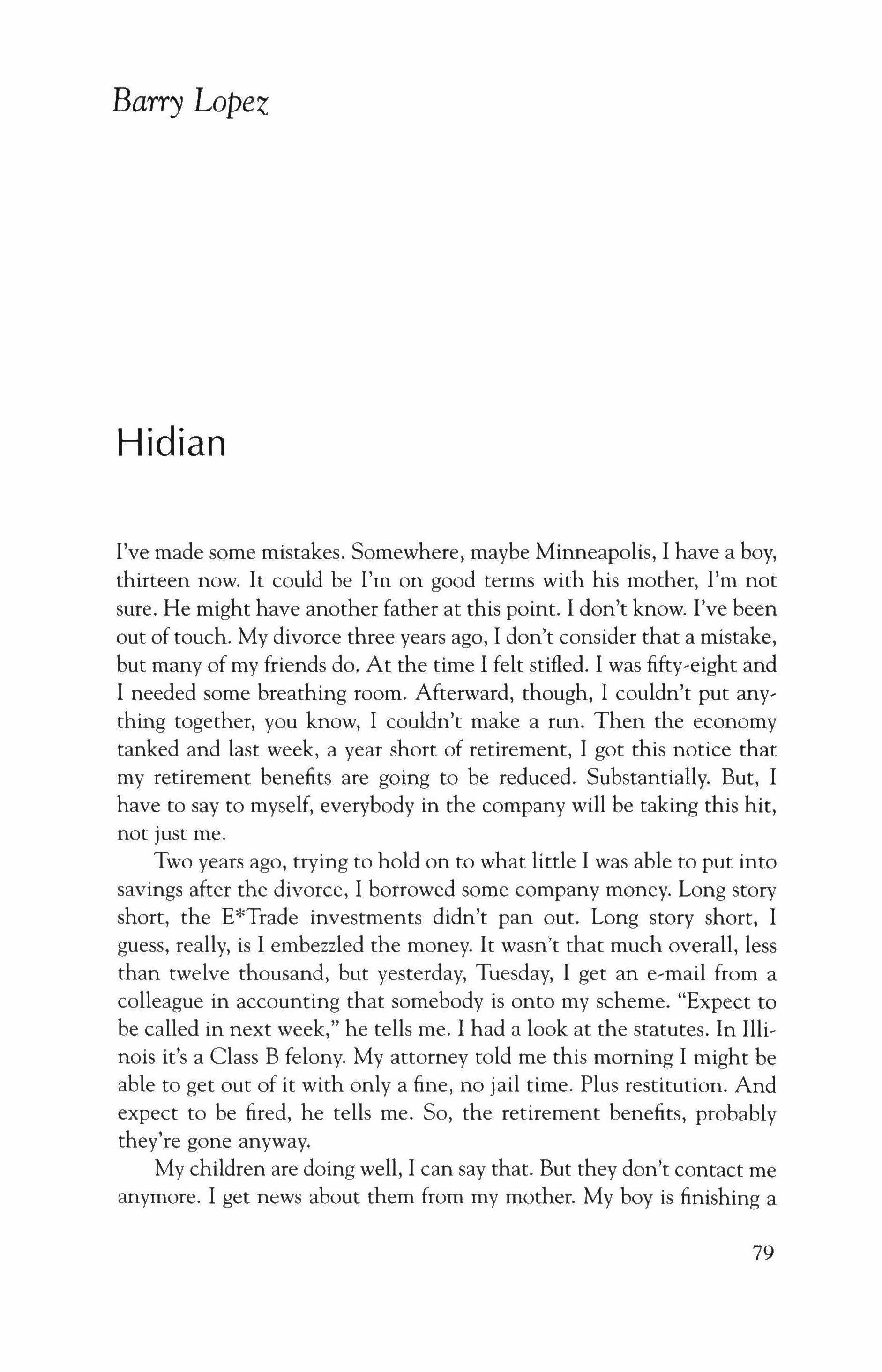
I've made some mistakes. Somewhere, maybe Minneapolis, I have a boy, thirteen now. It could be I'm on good terms with his mother, I'm not sure. He might have another father at this point. I don't know. I've been out of touch. My divorce three years ago, I don't consider that a mistake, but many of my friends do. At the time I felt stifled. I was fifty-eight and I needed some breathing room. Afterward, though, I couldn't put anything together, you know, I couldn't make a run. Then the economy tanked and last week, a year short of retirement, I got this notice that my retirement benefits are going to be reduced. Substantially. But, I have to say to myself, everybody in the company will be taking this hit, not just me.
Two years ago, trying to hold on to what little I was able to put into savings after the divorce, I borrowed some company money. Long story short, the E*Trade investments didn't pan out. Long story short, I guess, really, is I embezzled the money. It wasn't that much overall, less than twelve thousand, but yesterday, Tuesday, I get an e-mail from a colleague in accounting that somebody is onto my scheme. "Expect to be called in next week," he tells me. I had a look at the statutes. In Illinois it's a Class B felony. My attorney told me this morning I might be able to get out of it with only a fine, no jail time. Plus restitution. And expect to be fired, he tells me. So, the retirement benefits, probably they're gone anyway.
My children are doing well, I can say that. But they don't contact me anymore. I get news about them from my mother. My boy is finishing a

PhD in history at Yale. His sister is teaching at [uilliard in New York. She plays viola. I'm glad all the lessons finally came to something. I've been wandering through the apartment this evening, trying to figure out what to do. I worked on some crosswords, answered a couple of e-rnails, but I'm not really getting on top of anything. I think what's slowing me down, really, is disillusionment. People I looked up to, people I wanted to model myself after, finally they failed. These were people I misread, basically, and I need to recover from that, from not catching the flaws right away. One guy, a drinking buddy, a guy I shared box seats with at Wrigley Field for three years, got arrested for child porn. It's all around now, all over, child porn. I don't mean to be insensitive, to be disrespectful, but society goes through regular cycles with this sort of thing, as I see it. Long ago maybe it was Prohibition, then it became cleaning up the inner cities, poverty, corruption in city hall, flagrant prostitution, and so on. Now the focus is on protecting kids. I'm fine with that. I don't condone what my friend did, but I'm tired of hearing about it. Missing children. Okay. The Internet. Okay. He was very successful, my friend was, a major real estate guy in Chicago, probably making four, five, six hundred thousand a year. He had a girlfriend on the side-which, frankly, is what gave me the idea I could pull it off-but in the end, even with all the money, he couldn't beat the thing. His wife divorced him, the girl bailed right away, and he's serving fifteen years in a federal prison. For selling pictures over the Internet.
Another guy, somebody I used to carpool with when I lived out in the suburbs, in Elk Grove, this guy also made a lot, though he had a kind ofgimmick going. What he did was take scary vacations for people. He'd choose some exotic place-Algeria, Colombia, Iran, Bangladeshwhere people don't usually go because of the risk of being kidnapped or getting sick, and instead of them, he'd go. He'd plan the trip with them, usually a wealthy retired couple. They'd pay him, then he'd go wherever it was, take pictures, have adventures, collect anecdotes. He'd even mail postcards the people wrote out to their friends. He'd Photoshop them into some of the photographs. He'd return with souvenirs. He'd hand it all over. He'd regale them with stories they could retell. You didn't have to get any shots, no new travel clothes, you didn't miss any connecting flights, you didn't run out of anything or get mugged. So many people signed up, he started taking the same trip for three, four, five couples at a time, though he advertised it always as an exclusive. These were people, you know, they were just afraid. He'd charge them ten thousand dol-
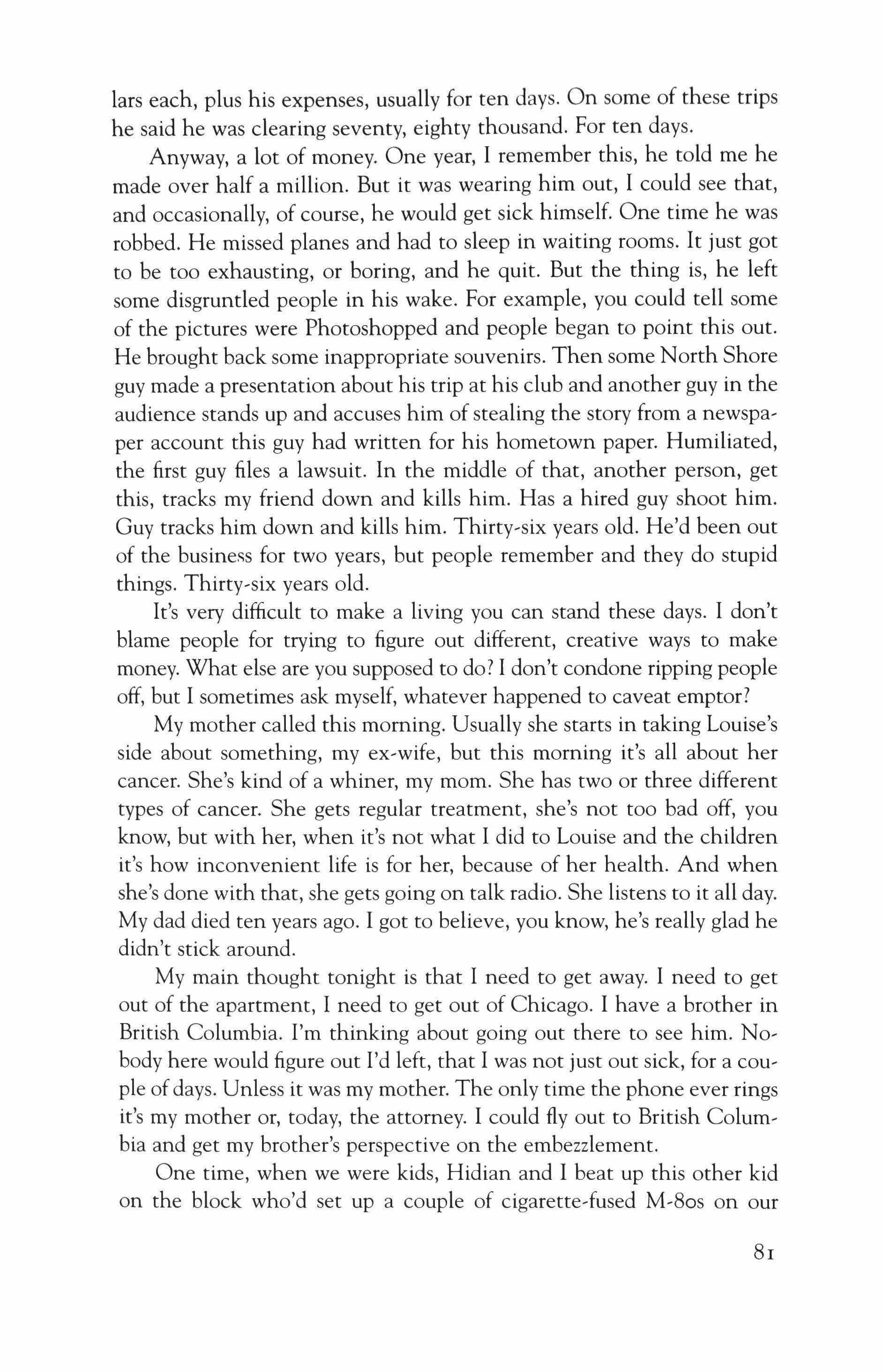
lars each, plus his expenses, usually for ten days. On some of these trips he said he was clearing seventy, eighty thousand. For ten days.
Anyway, a lot of money. One year, I remember this, he told me he made over half a million. But it was wearing him out, I could see that, and occasionally, of course, he would get sick himself. One time he was robbed. He missed planes and had to sleep in waiting rooms. It just got to be too exhausting, or boring, and he quit. But the thing is, he left some disgruntled people in his wake. For example, you could tell some of the pictures were Photoshopped and people began to point this out. He brought back some inappropriate souvenirs. Then some North Shore guy made a presentation about his trip at his club and another guy in the audience stands up and accuses him of stealing the story from a newspaper account this guy had written for his hometown paper. Humiliated, the first guy files a lawsuit. In the middle of that, another person, get this, tracks my friend down and kills him. Has a hired guy shoot him. Guy tracks him down and kills him. Thirty-six years old. He'd been out of the business for two years, but people remember and they do stupid things. Thirty-six years old.
It's very difficult to make a living you can stand these days. I don't blame people for trying to figure out different, creative ways to make money. What else are you supposed to do? I don't condone ripping people off, but I sometimes ask myself, whatever happened to caveat emptor?
My mother called this morning. Usually she starts in taking Louise's side about something, my ex-wife, but this morning it's all about her cancer. She's kind of a whiner, my mom. She has two or three different types of cancer. She gets regular treatment, she's not too bad off, you know, but with her, when it's not what I did to Louise and the children it's how inconvenient life is for her, because of her health. And when she's done with that, she gets going on talk radio. She listens to it all day. My dad died ten years ago. I got to believe, you know, he's really glad he didn't stick around.
My main thought tonight is that I need to get away. I need to get out of the apartment, I need to get out of Chicago. I have a brother in British Columbia. I'm thinking about going out there to see him. Nobody here would figure out I'd left, that I was not just out sick, for a couple ofdays. Unless it was my mother. The only time the phone ever rings it's my mother or, today, the attorney. I could fly out to British Columbia and get my brother's perspective on the embezzlement.
One time, when we were kids, Hidian and I beat up this other kid on the block who'd set up a couple of cigarette-fused M-8os on our

porch. They scared the hell out of my mother when they blew. BOOM! BOOM! BOOM! Hidian, he just went nuts beating on this kid, who was a complete loser anyway, a shoplifter, minor-league dope dealer. Hidian just pounded him. After that, though, I remember all Hidian ever talked to me about was getting out of here, leaving Chicago. He was twelve, I think. I got into scouting, you know, just before that, but Hidian, even though he really liked the outdoors, he wouldn't join. His whole crowd was the straight-A kids. No sports, all reading. He had about five scholarships when he graduated. He took one of them and went to California to study anthropology.
When I made Eagle Scout-Hidian was two years behind me in high school-I wanted to impress on him that to achieve something he had to plan. And he had to hang around with more down-to-earth people, have some fun. That year my scoutmaster set up a field trip for all of us who made Eagle Scout. You could invite a guest and I asked Hidian to come. We went up to the Boundary Waters National Park, in Minnesota. My hope was Hidian would take some instruction from these other guys about living in the wild, getting close to nature, but he was just a smartass, a turd. You'd show him something, like how to make a snare invisible, and he'd tell you how you'd done it wrong, or he'd tell you how to improve it.
"What's the matter with you!" I'd ask him. "Can't you learn something here? These people are all Eagle Scouts for crying out loud." He'd look at me like I was an idiot and say, "It's not all in the manual, Kellen. It's not in there. Wake up." Like he was light-years ahead of the rest of us.
We didn't get along really, Hidian and me. He's gay, but that wasn't the problem. We just had diverging interests. After he got out ofcollege, he moved up to British Columbia and got a house with this native guy and he made these people his whole life, this tribe he'd done his PhD on-Kwakiutl, which to be politically correct now you have to call Kwakwala. After he moved up there we hardly communicated. I felt like he completely turned his back on Mom and Dad-and me, he never really took seriously anyway. I don't think he ever had one word ofpraise for me, for anything I ever accomplished. I could have shown up on his doorstep with half the money from winning Powerball, and he'd have some reason why he couldn't take it, how he preferred not to take it. He'd always make me feel contaminated.
Don't misunderstand me here. I respect what Hidian's done. He's some kind of adopted son to a Kwakwala elder, he speaks the language like a native speaker, and he's translated a lot of their stories and got

them published. When I go on the Web I can see he's a big deal, a widely respected guy. Environmentalists are always quoting him-or, I suppose, quoting Kwakwala people, speaking through the stories he's translating-but I don't see that he's a better man, you know. Truth be known, he's gotten away with a few things, and, at least for now, I have to say I haven't. Right now I'm not getting away with embezzlement. Still, I believe I could make use of his counsel. I can say that. I think if I go up there and see him and we have a chat, then, the two of us talking it over, he might easily be able to point me in the right direction.
Nature. That's often on my mind. When I got up this morning, I saw some kind of bug dead on the windowsill, on the ledge outside. I'm on the thirty-first floor. With the February wind coming off the lake last night, it had to be some kind of hardy bug. It looked like a beetle. That window doesn't open so I couldn't get to it, because I wanted to take it somewhere, the library maybe, and look it up. But while I was staring at it-the sunlight was hitting its shell in a way that made it look iridescent-while I was looking, a bird landed on the ledge and took it, took it away so fast I couldn't see even what kind of bird it was. So, maybe the bug wasn't dead.
Nature is mysterious, the way it draws you in. I was interested in nature long before Hidian ever was, and I actually got pretty good at it. Hidian's better at it now. I read this piece of his, in the Journal ofNative Hunting Practices, about how the Kwakwala hunt black bears, and I could tell it was more than just the observing anthropologist writing up the native experience. As much as anything it was about Hidian hunting, having that frame of mind, like he was one of them.
I see the trap I might be building for myself here, putting my values on one side and my brother's on the other, and thinking if I had my brother's values then maybe I wouldn't be in this fix. But I think my values are in pretty good shape. They just need some kind of exercising. Right now I'd have to say they're not really strong. Anyway, I'm not thinking about going up to Campbell River to change my values, I'm thinking about getting a better perspective. I've made some mistakes, let a few things go by that I can't go back and change now. What I need is a few days to rehabilitate. What I can't put up with any longer is the pressure I'm starting to feel here, the recrimination, the boxing in. I need another point of view, and that's what Hidian has. He has a different point of view.
As I walk through the apartment, looking out at moonlight on the lake, I know I could be talking myself into doing this, but I feel okay
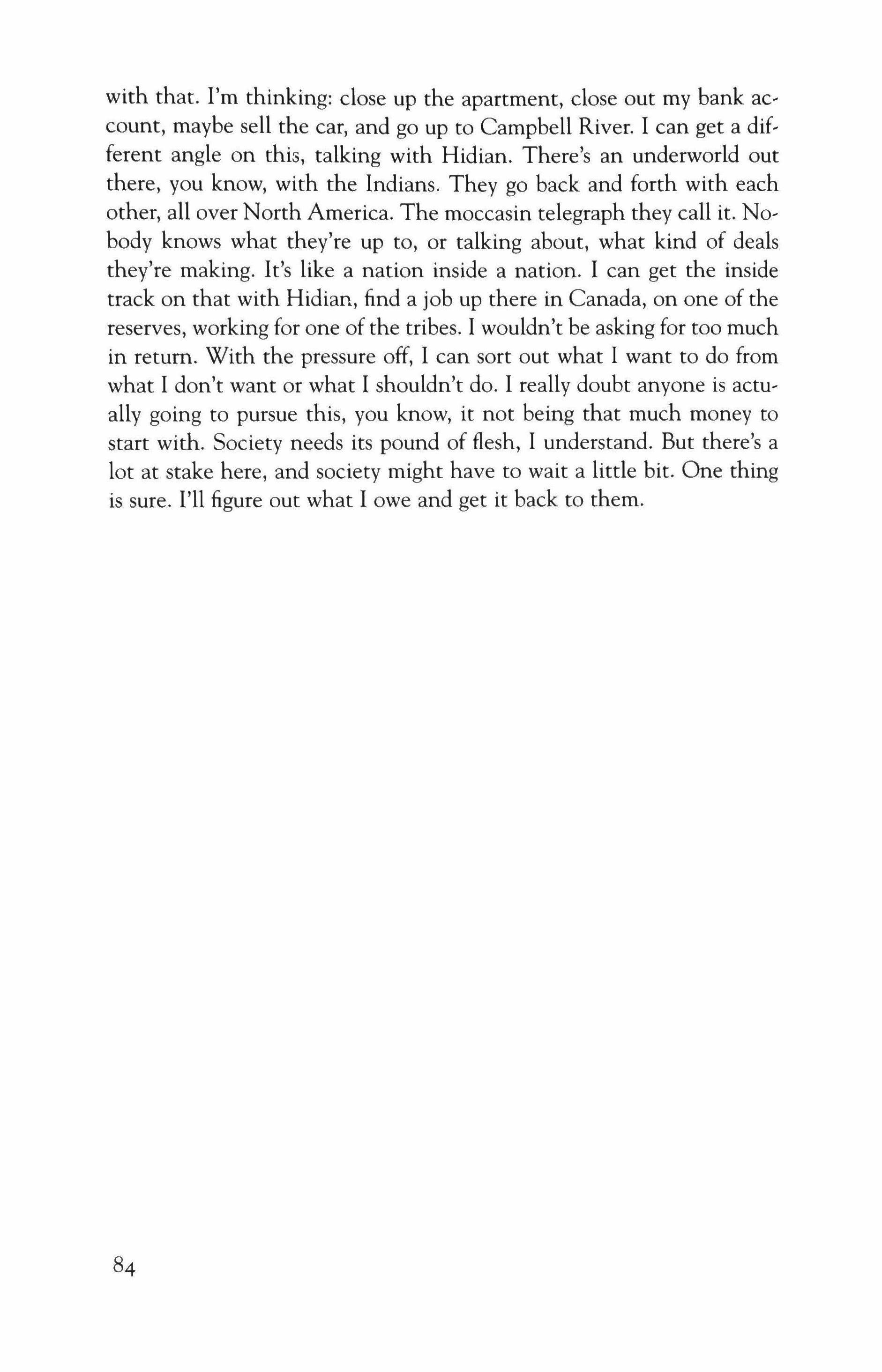
with that. I'm thinking: close up the apartment, close out my bank account, maybe sell the car, and go up to Campbell River. I can get a different angle on this, talking with Hidian. There's an underworld out there, you know, with the Indians. They go back and forth with each other, all over North America. The moccasin telegraph they call it. Nobody knows what they're up to, or talking about, what kind of deals they're making. It's like a nation inside a nation. I can get the inside track on that with Hidian, find a job up there in Canada, on one of the reserves, working for one of the tribes. I wouldn't be asking for too much in return. With the pressure off, I can sort out what I want to do from what I don't want or what I shouldn't do. I really doubt anyone is actually going to pursue this, you know, it not being that much money to start with. Society needs its pound of flesh, I understand. But there's a lot at stake here, and society might have to wait a little bit. One thing is sure. I'll figure out what lowe and get it back to them.
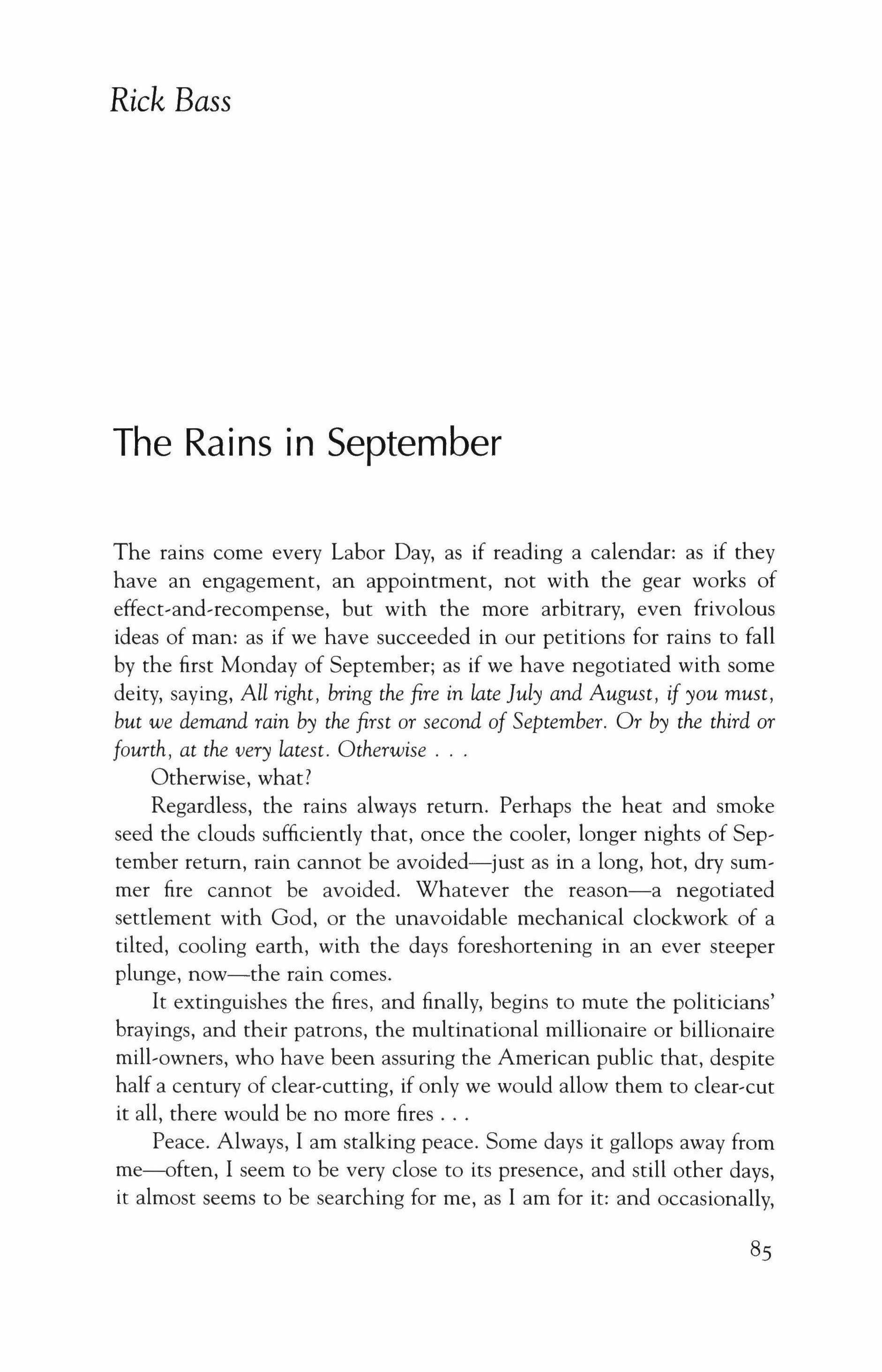
The rains come every Labor Day, as if reading a calendar: as if they have an engagement, an appointment, not with the gear works of effect-and-recompense, but with the more arbitrary, even frivolous ideas of man: as if we have succeeded in our petitions for rains to fall by the first Monday of September; as if we have negotiated with some deity, saying, All right, bring the fire in late July and August, if you must, but we demand rain by the first or second of September. Or by the third or fourth, at the very latest. Otherwise
Otherwise, what?
Regardless, the rains always return. Perhaps the heat and smoke seed the clouds sufficiently that, once the cooler, longer nights of September return, rain cannot be avoided-just as in a long, hot, dry summer fire cannot be avoided. Whatever the reason-a negotiated settlement with God, or the unavoidable mechanical clockwork of a tilted, cooling earth, with the days foreshortening in an ever steeper plunge, now-the rain comes.
It extinguishes the fires, and finally, begins to mute the politicians' brayings, and their patrons, the multinational millionaire or billionaire mill-owners, who have been assuring the American public that, despite half a century of clear-cutting, if only we would allow them to clear-cut it all, there would be no more fires
Peace. Always, I am stalking peace. Some days it gallops away from me-often, I seem to be very close to its presence, and still other days, it almost seems to be searching for me, as I am for it: and occasionally,

peace and I will find ourselves in each other's company. And with the heat and haze and smoke beginning to be vanquished, September is as likely a month to find it as any, and perhaps even more likely.
You can never have enough firewood, you can never have enough berries. In September we'll begin gathering a little bit of firewood (not until the last breath of October, however, will we really kick up into production-gear), and in the first few days of September, there are still, amazingly, a few more huckleberries to be found, up in the high country, where summer is only just now arriving, as if squeezing in through a barely open window, where it will then visit for but a few days, or a week or two, before departing again, sliding back through that windowcrack and on down the mountain, autumn coming in over the mountain, then like a blanket drawn
Another pint, another quart, sometimes another half-gallon. Each day could be the last, the berries shriveling in the sun or withering fi� nally from a fierce frost; and as we sit there in the huckleberry fields (the bushes lower to the ground, up at that wind-scoured elevation), our fingers and faces stained purple, and while it would seem that our thoughts would be on the coming months, and all the different ways we'll use these berries throughout the year-jams, jellies, syrups, pies, cobblers, cheesecakes, in pancakes, on ice cream, in smoothieswhat's really on our minds is nothing, only the somnolent peace of the moment.
We sit there in the high mountain wind and the thin sun, lost in the hunter-gatherer trance of provision, connecting and reconnecting to a deeper, older place with each berry chosen, each berry plucked, so that already, it is as if the mountain is feeding us, and the berries are nurturing us, even before we have eaten the first serving.
The haze of the sun-heated mountains, haze seeming to rise in shimmers from the rocks themselves, will waver before us, and the unending blue waves of mountain ridges will likewise span before us to the horizon, and beyond.
Is there a gene within me, that so fills me with love for this wild landscape, and makes me so willing to fight for its defense, and to guard so fiercely against the going-away of any of this landscape's other inhabitants, be they grizzly or wolf or sturgeon or rare water lily?
Butterflies drift past us, colorful wings paper-thin, sometimes translucent, rallying for their autumn migrations: sucking down the last of the blossoms' nectar, drying yarrow, still pristine-white, and blazing

blue aster, and the incredible other-planet-seemtng magenta of the last of the summer's fireweed
The ravens have been fairly silent, for much of the summer (with the exception of early June, when they feed so lustily on the scraps of lion- and coyote- and wolf- and bear-killed fawns}-but in September, they begin to grow more vocal again, often audible as only a single croak, like the winding-up of the last-of-summer, a one-syllable, one� note guttural sound of cinching up and battening down.
And whether that one note is saying summer (is over) or autumn (is here), I can never tell. Perhaps it is the perfect one-note sound, that is made as the raven flies over the perfect cleft or crevice between these two seasons-as visible to the raven's bright eyes as would be a literal niche or crevice in the cliffs, in the physical landscape below, formed only a few hundred million years ago.
And sometimes, if we're up in the berry fields early enough in the morning, or late enough in the day, into the cooling blue light of dusk, we'll be lucky enough to hear the utterly wild, hair-raising flute-andgrunt call of a bull elk, bugling to announce to the world, and the season, his presence on the landscape, and his position, as powerful and focused.
I have crept in on the big bulls, when they've been announcing themselves in this manner-have peered through the brush and watched, from a distance of only several yards, as the giants thrash their shining antlers against the trunk of a young sapling, scraping the bark from it in joy or fury or something else, before lifting their head (their eyes wide, bulging with life) and bugling again, a sound that resonates in my own chest, so close, and causes tremors of vibrations similar to those experienced when you stand too close to the railroad tracks and a locomotive passes by, roaring its wail-whistle and shaking the ground, causing a tingling in your jaw and your arms and legs, even all the way into your hands and feet
Sometimes, from the tops of mountains, the girls like to roll big rocks down the mountains-not down toward any trail or road, but down some steep slope, to see how far the rock will go before reaching its angle of repose. This is totally opposite of how I like to be in the world, and particularly in the woods, and yet occasionally I let them roll the thunder-rocks, not so much for the joy and power the act gives them (and I have to say, the sight of a rock cartwheeling down the slope, sometimes bolting twenty feet into the air, is hypnotic, awe-provoking), but rather, so that they will at least have a fighting chance of not

becoming exactly like me. Not that that's good, bad, or indifferent, but rather, what matters to me is that they at least have a chance, now and again, of taking a different path.
I let them roll these rocks, and then we move on. "This is the bears' home," I say, unable to resist it. "We have to remember they live here, too, and they probably don't like too much noise."
Still, I tried to let them choose their own way. For about thirty seconds. How unchanging, it seems, are any paths-as foreordained and sometimes, as the grooves carved in mountaintops from the claws of the glaciers that scratched their way down these same mountains, ten thousand years ago.
Hiking down, we spy a pale, curved stick, a branch, that is the exact size and shape of a deer's rib-so much so that we have to pick it up and examine it more closely to be sure that it is not-and this reminds me, again, ofhow nearly identical are the shapes of deer and elk antlers, and the branches of the trees and bushes behind which they take shelter, so that without a doubt, as in Genesis the one thing-the forests, arriving on, say, the third day-has shaped the next thing, the beasts and fowl, arriving on, say, the fourth.
We lie on our backs for a while and watch the astounding clouds, with their animal shapes. Indeed, just this moment, one of the larger ones, drifting up from the south, looking almost precisely like an enormous bull elk-so much so that even the cloud's shadow, projected on the mountain across from us, looks like that same elk.
It's gliding like a schooner, nearly galloping, as graceful in its traverse of that mile or two of distance traveled as would be a real elk, and it calms and soothes us, lying there watching it: not as if it is being presented to us for any message or instruction, but merely beauty, only beauty, and the tight order of a day among the living.
The girls want to roll one more rock down a slope of bear grass far below.
It's the seventh year of the bear grass's cycle-a year of outrageous blossoms-and so I let them, promising Only one.
It's the best roll ever. The small round boulder gallops straight down the hill, as if fleeing us, then inexplicably veers, as if consciously choosing another path, and then veers back again, choosing the same old route. It gallops down through the field of late-season, high-elevation bear grass, snapping the drying stalks and sending up puffs and plumes of pollen that rise and drift slowly downslope-long

after the boulder has disappeared into the woods-with the rising yellow pollen tracing, briefly, the strange and perfect vertical, twisting shape of a deer's rib.
And yet, surely such formality, such stricture and allegiance to oneness does not exist everywhere, and at all times. There is a life, a pulse, and respiration-a fuel, or a force-governing the reaching toward these shapes, formulas, patterns. The bear grass, for instance, with its wild seven-year blooms, the giant sweet-scented pom-pom stalks rising so high above the other flowering plants: surely it is in these seven-year runs that it attempts to expand its range, not merely resting and conserving the nutrients in the thin soil where it is found, but timing its next run in order to achieve maximum colonization
In this regard-the six years of inhalation, and the one bright year of powerful exhalation-the bear grass might be seen to possess a cunning, if limited, singleness of purpose And yet to back away and look at the entire mountain from a distance (from the other mountain across the way, perhaps; the elk mountain), there are so many other puzzle-pieces, each with their path and pattern or inhale-and-exhale, that the mind spins, and you understand that is all always moving, even if just beneath the surface-moving with the alacrity of an elk galloping laterally across a mountain, or even a boulder cartwheeling directly down the mountain
We rise and continue down the mountain ourselves. At one point, still high on the mountain, we startle a pair of large spotted frogs, which spring away from us in spirited, terrified leaps, head directly upslope. They're a long away from any water-the nearest seasonal pond is still a good quarter-mile away, and several hundred feet higher on the mountain, up near its crest-and it occurs to me that these frogs know that rain is imminent, and despite the summer heat, they are migrating, expanding their own range, traveling beneath the shade of the silvery hummocks ofbear grass: and that they are gambling their lives, their territorial explorations, on the belief or perhaps knowledge that it will rain soon, before they dry out, so far from home.
The seasonal ponds will not hold water again until later in the month-it will take days of September's or even October's rains to fill them back up-but perhaps if these frogs find these ponds (perhaps it is where they were born; perhaps they are returning to them, after a summer of exploration, and egg-laying, downslope), they can somehow burrow down between the wide fissures of the mud cracks, squeezing down
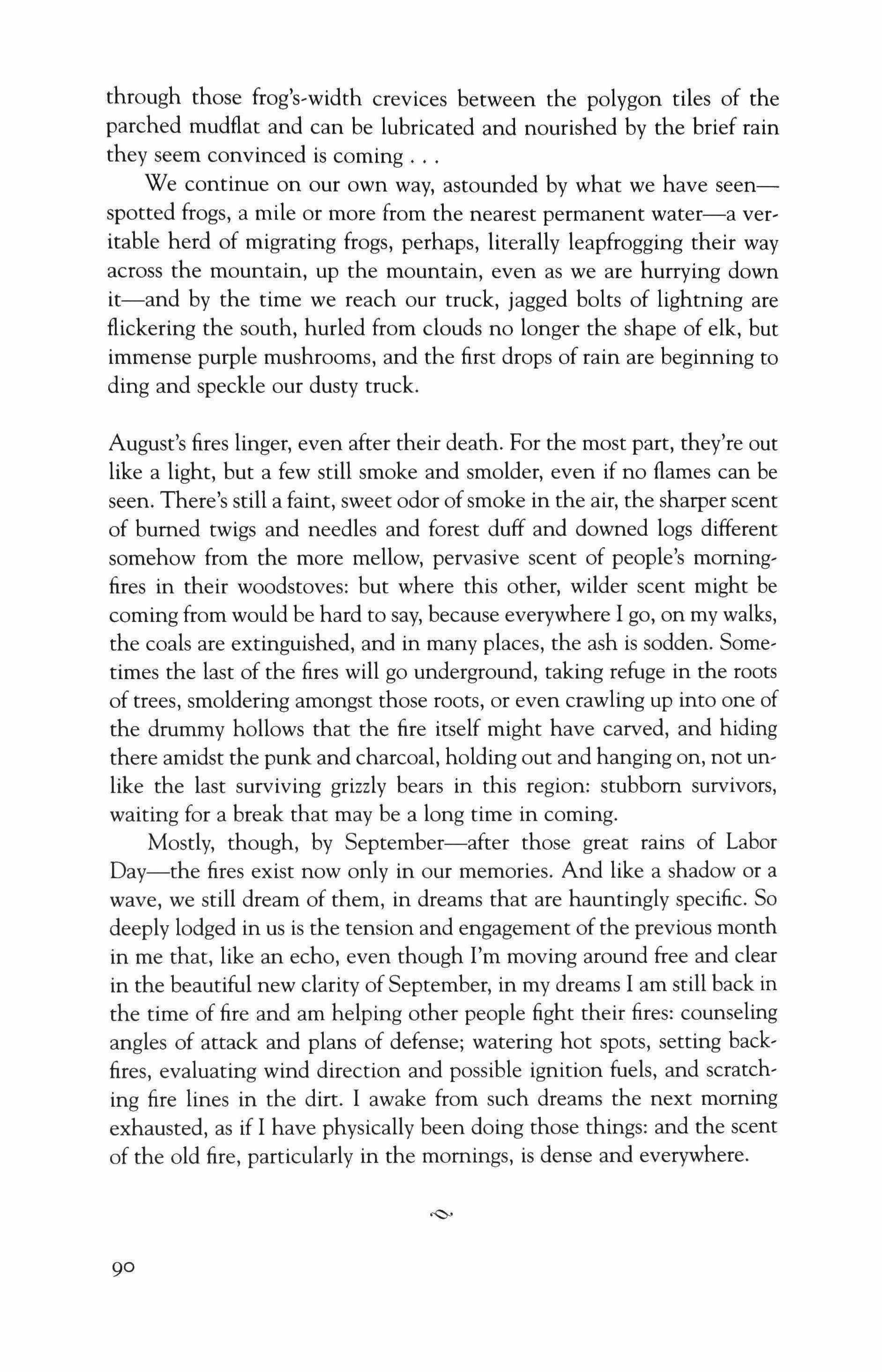
through those frog's-width crevices between the polygon tiles of the parched mudflat and can be lubricated and nourished by the brief rain they seem convinced is coming
We continue on our own way, astounded by what we have seenspotted frogs, a mile or more from the nearest permanent water-a veritable herd of migrating frogs, perhaps, literally leapfrogging their way across the mountain, up the mountain, even as we are hurrying down it-and by the time we reach our truck, jagged bolts of lightning are flickering the south, hurled from clouds no longer the shape of elk, but immense purple mushrooms, and the first drops of rain are beginning to ding and speckle our dusty truck.
August's fires linger, even after their death. For the most part, they're out like a light, but a few still smoke and smolder, even if no flames can be seen. There's still a faint, sweet odor ofsmoke in the air, the sharper scent of burned twigs and needles and forest duff and downed logs different somehow from the more mellow, pervasive scent of people's morning, fires in their woodstoves: but where this other, wilder scent might be coming from would be hard to say, because everywhere I go, on my walks, the coals are extinguished, and in many places, the ash is sodden. Some, times the last of the fires will go underground, taking refuge in the roots of trees, smoldering amongst those roots, or even crawling up into one of the drummy hollows that the fire itself might have carved, and hiding there amidst the punk and charcoal, holding out and hanging on, not unlike the last surviving grizzly bears in this region: stubborn survivors, waiting for a break that may be a long time in coming.
Mostly, though, by September-after those great rains of Labor Day-the fires exist now only in our memories. And like a shadow or a wave, we still dream of them, in dreams that are hauntingly specific. So deeply lodged in us is the tension and engagement of the previous month in me that, like an echo, even though I'm moving around free and clear in the beautiful new clarity of September, in my dreams I am still back in the time of fire and am helping other people fight their fires: counseling angles of attack and plans of defense; watering hot spots, setting back, fires, evaluating wind direction and possible ignition fuels, and scratch, ing fire lines in the dirt. I awake from such dreams the next morning exhausted, as if I have physically been doing those things: and the scent of the old fire, particularly in the mornings, is dense and everywhere.

Still, nothing can be held onto, beyond its time. September must flow out of August, pushing eagerly on with its own life, through the eddies of time and heat and dreams, and one cool morning, not long after Labor Day, two black bears come striding through the center of the marsh in single file, noses pointed into the cool north breeze, just out wandering in the middle of the day, and like the actors in a school play who usher in a new scene, they might as well have been pulling behind them a banner that said Autumn.
I do not mean to complain about the imbalance or loneliness that resides somewhat in all of us, I think-sometimes deep-rooted or all, aflame, though other times merely hidden, like dull coals hunkered warm in the cavity of a hollow tree-but rather, to accept and marvel at it: this slight but clumsiness that almost always sets us some distance apart from the rest of nature, and the calling of the seasons.
There is a different calendar, internal and pulsing, alive, like the creature of time, that is slightly tilted from the mechanical overlay of our own precise but lifeless calendars. This other calendar is not metered by the precision of solstice and equinox, but is fluid, maybe even cunning or stealthy, and our separation from that hidden river, whether below us or farther above, may be to some degree the measure of that strange loneliness whose scent we all catch, from time to time, unbid, den and inexplicable.
Certainly, the changes in our own self-imposed or self,described sea, sons crest well before true solstice or equinox. The panic, or the rut, seems to usually crest in us a couple of weeks early from the rest of nature. Impulsive, we rush, we roar. Hence summer arrives in our hearts on June 7, say, rather than the twenty-first: and autumn, and that bitter, sweet mingling of pleasure-and-confusion-e-a feeling very much like, come to think of it, first love-comes in the first week of September, rather than matching the balanced grace of equal dark, equal light, on the true equinox, in the third week.
What is the reason for this cant, this tilt, and will we ever earn our way into the larger flow? Did we once exist in it, and fall from it? Or is it-this distance, this wobble or separation-the fuel that inspirits us, that gives us life, and moves us across the landscape of the centuries; this distance, or slight loneliness, at first glance seeming regrettable, all the difference, just as the antlers of a deer or elk are different from the branches in the forest through which that deer or elk moves?

I All public celebration is canceled for three days of mourning, but the trees on nan hai da dao can't resist a confetti shower after rain. They scatter yellow rainbows where we walk, remember the dead but dance for the living, shower each going on with flowers. They have lived after seasons of dying before. They know ends are fashioned from fragments gathered in the shattered middle of things that will not last.
2 after an apocalypse we prepare for floods we know all about gods and promises

Five million is not as hard as one who has taken shelter under a walkway that leads from an English garden to a fortified high rise promise of luxury.
Five million is a puzzle for an engineer, distant as a collapsing star, a cipher in a book of equations, a design problem in a textbook for the next hundred-year storm. One in shadows is an other, undeniably fragile as oneself.
One and one and one and one, on and on and on and on.
Not five million.
Five million one by one, every one displaced, displacing.
See her and you are homeless as any buddha.
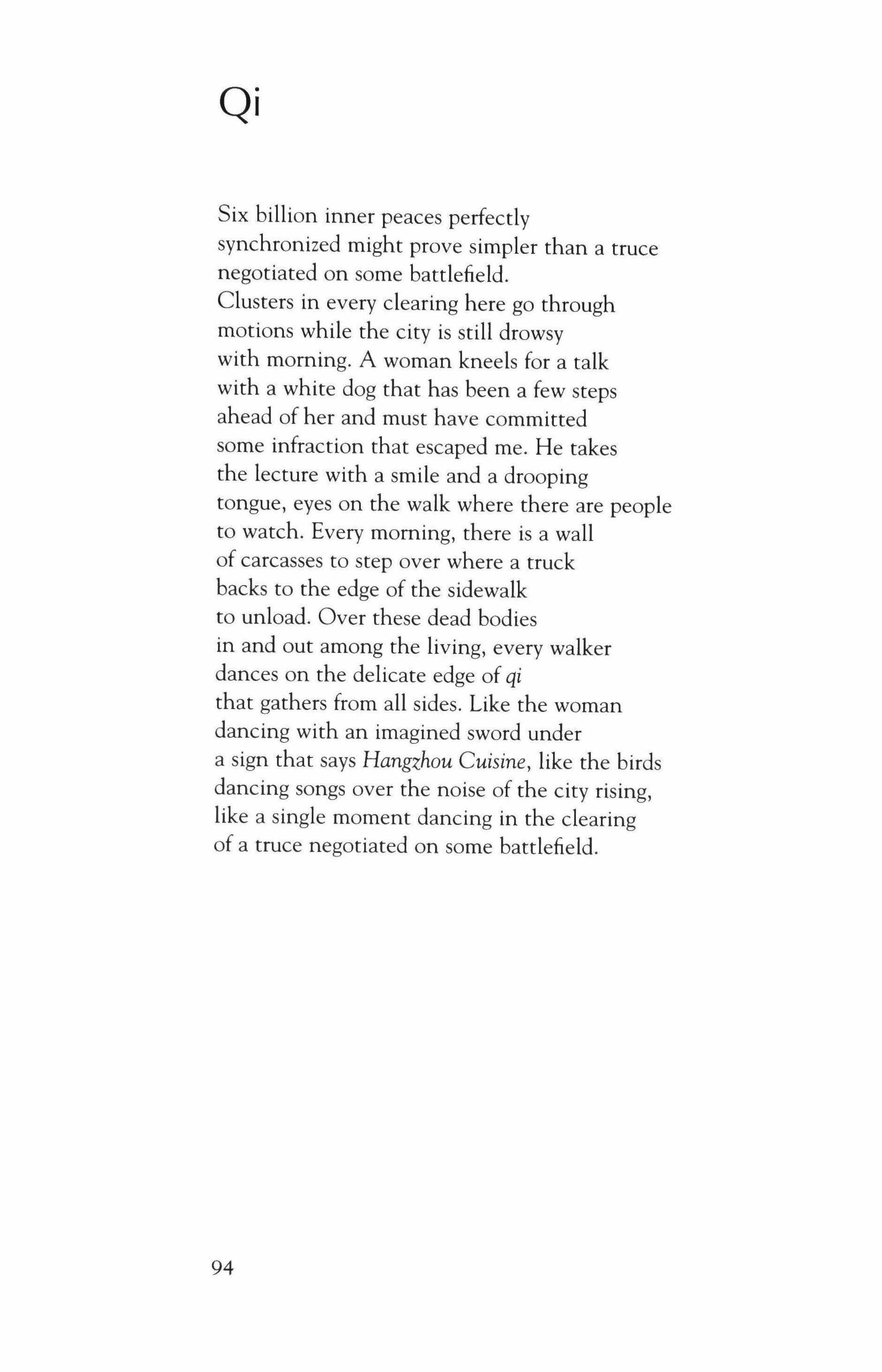
Six billion inner peaces perfectly synchronized might prove simpler than a truce negotiated on some battlefield. Clusters in every clearing here go through motions while the city is still drowsy with morning. A woman kneels for a talk with a white dog that has been a few steps ahead of her and must have committed some infraction that escaped me. He takes the lecture with a smile and a drooping tongue, eyes on the walk where there are people to watch. Every morning, there is a wall of carcasses to step over where a truck backs to the edge of the sidewalk to unload. Over these dead bodies in and out among the living, every walker dances on the delicate edge of qi that gathers from all sides. Like the woman dancing with an imagined sword under a sign that says Hangzhou Cuisine, like the birds dancing songs over the noise of the city rising, like a single moment dancing in the clearing of a truce negotiated on some battlefield.

It has nothing to do with human activities, you said, the vanished Black River, the Yellow River turned into a sewer, the Yangtze on its way to becoming a second Yellow River, deserts that wipe out forests, global warming-nothing to do with mankind. Don't give me that smirk. It's backed up by scientists who study glaciers. I spent a year traveling with Japanese scientists in the desert where the Black River used to roar along the Silk Route. They begged me, a Tibetan Buddhist sutra translator who knows nothing about global warming, to prove that the desert, once a fecund wetland, has nothing to do with warring or overgrazing. Whatever is recorded in the ancient documents-flood, drought, wars-can been found in the fossils, and nothing, nothing so far, has anything to do with us.
So don't you dare point your finger at China as if you were a Westerner! We know what we're doing. We're cleaning up the lakes, planting trees around Beijing, monitors everywhere to check the air quality telling us when we should go out or stay home. Factories are shut down, trucks allowed in the city only at night. The air will be clean by the summer. A special farm raises organic chickens for the athletes. Plastic bags are banned in supermarkets. Can you do that in America? Not in a million years! So stop pointing your fat finger, if you still consider yourself Chinese.
When I was a kid in the country, I'd swim everyday in the river by my house. I'd catch fish, shrimp, crab, and bring them home to Ma. We were poor. Only things from the fields and water, barely enough but always
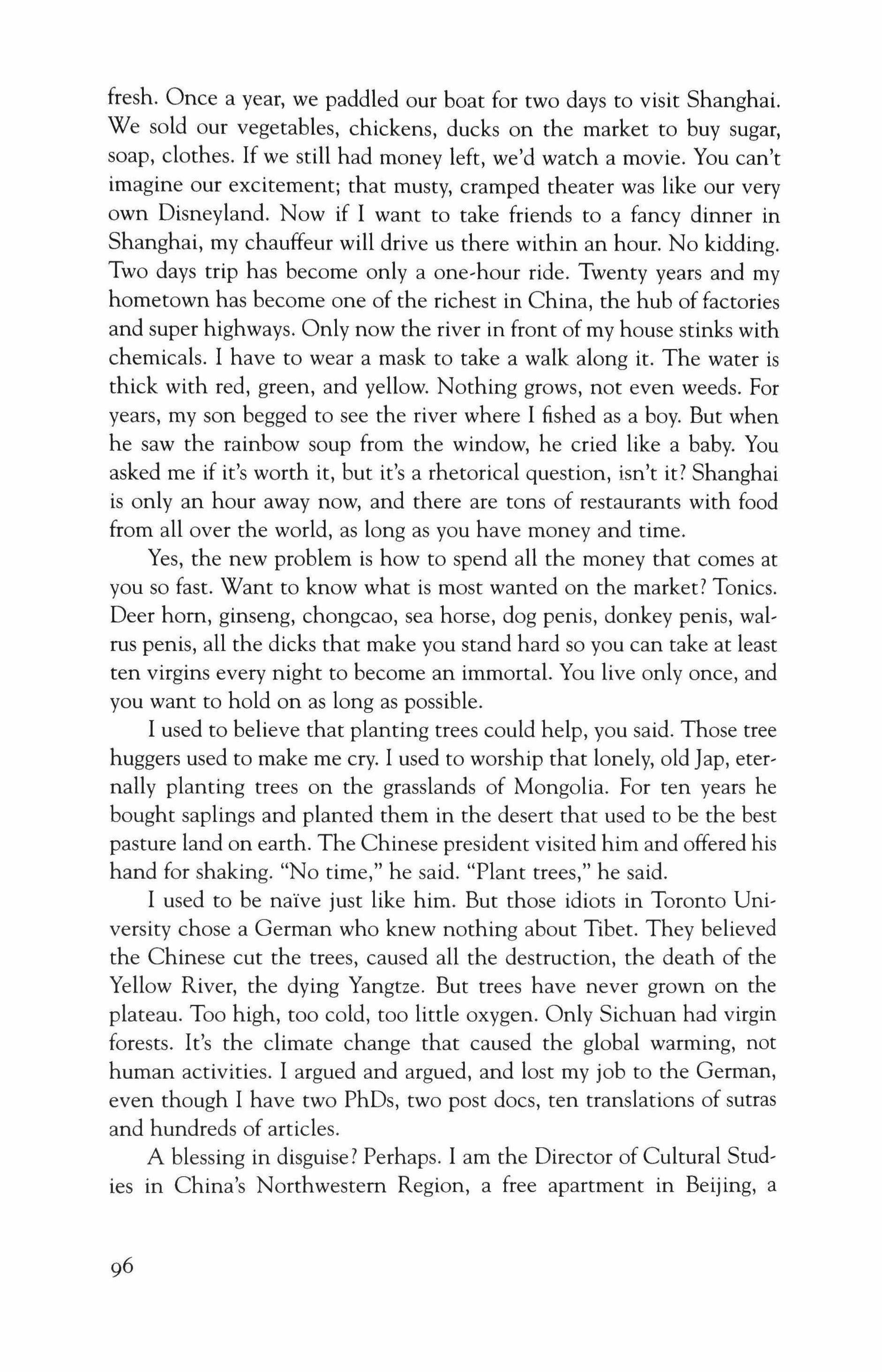
fresh. Once a year, we paddled our boat for two days to visit Shanghai. We sold our vegetables, chickens, ducks on the market to buy sugar, soap, clothes. If we still had money left, we'd watch a movie. You can't imagine our excitement; that musty, cramped theater was like our very own Disneyland. Now if I want to take friends to a fancy dinner in Shanghai, my chauffeur will drive us there within an hour. No kidding. Two days trip has become only a one-hour ride. Twenty years and my hometown has become one of the richest in China, the hub of factories and super highways. Only now the river in front of my house stinks with chemicals. I have to wear a mask to take a walk along it. The water is thick with red, green, and yellow. Nothing grows, not even weeds. For years, my son begged to see the river where I fished as a boy. But when he saw the rainbow soup from the window, he cried like a baby. You asked me if it's worth it, but it's a rhetorical question, isn't it? Shanghai is only an hour away now, and there are tons of restaurants with food from all over the world, as long as you have money and time.
Yes, the new problem is how to spend all the money that comes at you so fast. Want to know what is most wanted on the market? Tonics. Deer hom, ginseng, chongcao, sea horse, dog penis, donkey penis, walrus penis, all the dicks that make you stand hard so you can take at least ten virgins every night to become an immortal. You live only once, and you want to hold on as long as possible.
I used to believe that planting trees could help, you said. Those tree huggers used to make me cry. I used to worship that lonely, old [ap, eternally planting trees on the grasslands of Mongolia. For ten years he bought saplings and planted them in the desert that used to be the best pasture land on earth. The Chinese president visited him and offered his hand for shaking. "No time," he said. "Plant trees," he said.
I used to be narve just like him. But those idiots in Toronto University chose a German who knew nothing about Tibet. They believed the Chinese cut the trees, caused all the destruction, the death of the Yellow River, the dying Yangtze. But trees have never grown on the plateau. Too high, too cold, too little oxygen. Only Sichuan had virgin forests. It's the climate change that caused the global warming, not human activities. I argued and argued, and lost my job to the German, even though I have two PhDs, two post docs, ten translations of sutras and hundreds of articles.
A blessing in disguise? Perhaps. I am the Director of Cultural Studies in China's Northwestern Region, a free apartment in Beijing, a

chauffeur, millions of yuan for research, endless friends and women, but I'm far away from home, a kite with no string.
That's why I'd rather believe in surgery than Chinese medicine or global warming. It has no scientific backing. Five thousand years or not, it doesn't matter if you can't prove it. Like the Tibetan herbs, ninety-five percent of them are poison. And the algae explosion in Lake Tai that left 2.3 million people in my hometown without drinking water, even though they live on the biggest lake in China. Is it natural or human disaster? You tell me.
All I want is to watch my son grow. He can't live in China. He has asthma, can't keep up with their insane schoolwork, can't study from dawn to midnight like those crazy kids, can't breathe the air. That's why my wife keeps him in Minnesota, and I pine away in Beijing.
But it's a small sacrifice. "China has stood up," as Mao announced on Tiananmen Square in 1949. We are indeed standing, even though we're choking in the soupy air. But we have stood up, our bodies covered with sores and cancers, our feet deep in muck. It's part of the process. To stand as a giant is what matters the most, you said.

Yeah, the horse race. It still chums my blood whenever I see a running horse. My only dream as a child was to be a champion. I learned how to ride a horse before I learned how to walk. Strange because my parents are more farmers than nomads. When I was seven, I found a horse that I knew would bring me glory, but he cost a fortune. I started working for other farmers to make the money. Just as my mother had agreed to sell her yak to buy the horse, the hailstorm came. All the crops in the fields were destroyed, and my parents sent me to Aba to live with my uncle.
So I became a driver instead. I've been driving since I was nineteen. My first car was a Beijing Jeep. My uncle traded his yaks for this clanking vehicle, and I transported chickens and ducks, fruit and vegetables for restaurants between Aba and Chendu, Aba and Lhasa. It went into a ravine on a rainy day. All the roads into Lhasa are treacherous, especially the one from Sichuan. I got out before it plunged. After that, I bought a second-hand East Wind Truck to cart steel and concrete into Lhasa. The city has been expanding like a giant pancake since the nineties. It has already reached the surrounding mountains. Where can it go now? My East Wind died after seven years, and I came down with pneumonia from the dust I breathed in. I sold the truck to a scrap metal dealer for two thousand yuan, which went straight to the doctors and medicine. I went back home in Aba. My uncle, who had adopted me after the hailstorm, nursed me back to health. When I got out of the bed, I looked around and realized I had to start from ground zero again. My uncle had sold his yaks to start my first business, and had sold his grassland to pay my medical bills. He was get-
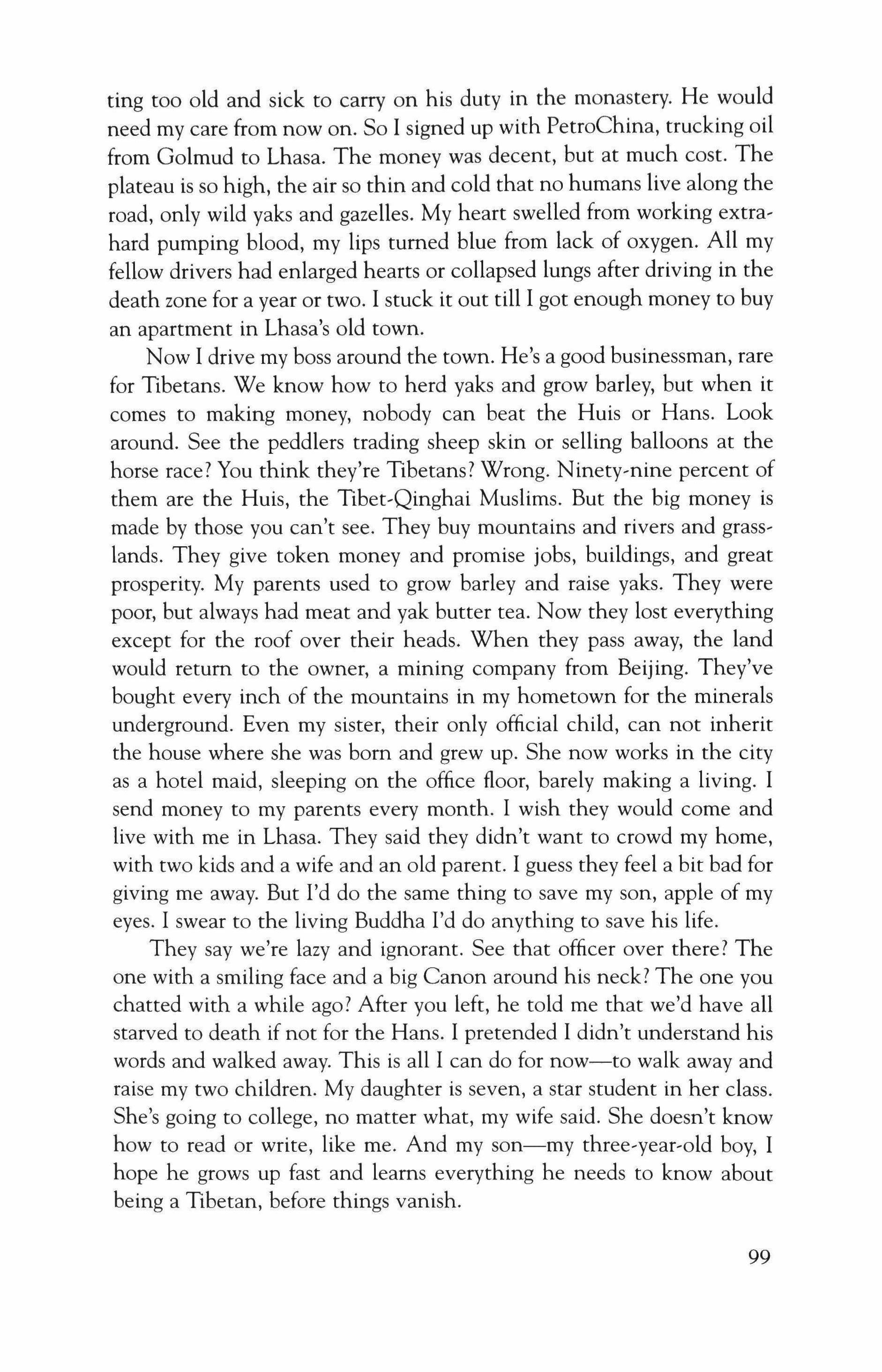
ting too old and sick to carry on his duty in the monastery. He would need my care from now on. So I signed up with PetroChina, trucking oil from Golmud to Lhasa. The money was decent, but at much cost. The plateau is so high, the air so thin and cold that no humans live along the road, only wild yaks and gazelles. My heart swelled from working extrahard pumping blood, my lips turned blue from lack of oxygen. All my fellow drivers had enlarged hearts or collapsed lungs after driving in the death zone for a year or two. I stuck it out till I got enough money to buy an apartment in Lhasa's old town.
Now I drive my boss around the town. He's a good businessman, rare for Tibetans. We know how to herd yaks and grow barley, but when it comes to making money, nobody can beat the Huis or Hans. Look around. See the peddlers trading sheep skin or selling balloons at the horse race? You think they're Tibetans? Wrong. Ninety-nine percent of them are the Huis, the Tibet-Qinghai Muslims. But the big money is made by those you can't see. They buy mountains and rivers and grasslands. They give token money and promise jobs, buildings, and great prosperity. My parents used to grow barley and raise yaks. They were poor, but always had meat and yak butter tea. Now they lost everything except for the roof over their heads. When they pass away, the land would return to the owner, a mining company from Beijing. They've bought every inch of the mountains in my hometown for the minerals underground. Even my sister, their only official child, can not inherit the house where she was born and grew up. She now works in the city as a hotel maid, sleeping on the office floor, barely making a living. I send money to my parents every month. I wish they would come and live with me in Lhasa. They said they didn't want to crowd my home, with two kids and a wife and an old parent. I guess they feel a bit bad for giving me away. But I'd do the same thing to save my son, apple of my eyes. I swear to the living Buddha I'd do anything to save his life.
They say we're lazy and ignorant. See that officer over there? The one with a smiling face and a big Canon around his neck? The one you chatted with a while ago? After you left, he told me that we'd have all starved to death if not for the Hans. I pretended I didn't understand his words and walked away. This is all I can do for now-to walk away and raise my two children. My daughter is seven, a star student in her class. She's going to college, no matter what, my wife said. She doesn't know how to read or write, like me. And my son-my three-year-old boy, I hope he grows up fast and learns everything he needs to know about being a Tibetan, before things vanish.

Wars, as we continue to forget, do not end when the last shot is fired. The hostile nations, winners and losers, are changed forever as soldiers come back altered, damaged, or not at all. Their families are changed. Slowly or quickly, these domestic changes reverberate through society as the economic and personal costs continue to be paid long after the shooting is over and, out in the wider world, geopolitical delineations are reconfigured. The bigger the war, the greater the perturbations. In ancient China, generals returning home with their armies reentered the capital through a so-called Gate of Mourning. This was true whether the campaign had been a success or a defeat, because war is a pollution and ceremonies are required to protect the living from the inevitable spiritual consequences.
During the Vietnam War, I volunteered as a civilian conscientious objector and worked as the field representative for a private agency that treated the most severely wounded children. The children that we brought to major U.S. teaching hospitals were riddled by bullets, slashed by cluster bomb flechettes, blinded and deafened by tossed grenades, had their lips and jaws shot away, their spines severed. Others had their limbs blown off, including one twelve-year-old boy left with only an arm after a road mine blast. Another boy had his chin glued to his chest by napalm. One girl had her eyelids burned off by a white phosphorus artillery shell. One gunshot toddler survived the massacre of her family in a ditch because she was protected by their bodies. I could go on. And, indeed, the memory of such suffering would have been my sole, unadul-

terated sense of Vietnam hadn't my job often taken me into the countryside to explain to parents what we could possibly do for their children at hospitals in the United States. Oddly, that work afforded me a glimpse of another, more enduring Vietnam. Improbable as it might seem, this glimpse came on snatches ofpoetry and song that led me into a realm of beauty and wisdom beyond the mayhem of the war.
At first, I had no clue on what I was hearing. I would be standing on a riverbank way out in the war zone as a little skiff motored by and I would hear a bit of song float past me, sometimes without ever even see' ing the singer's face under the conical leaf hat from where the song drifted up to disappear in the stutter of the boat's two'cycle engine and in the wave wash on the muddy bank at my feet. Once, I found myself waiting in an orchard behind a family's house as they came to a decision about sending their injured, ten-year-old son to America in our care. You can imagine the strange intensity of this moment: "we" had injured their child, yet our huge American war technology made it also seem to Vietnamese farmers that we could do anything maybe even grow back an arm? Back at the regional hospital, it was explained that this could not be done, not even in America, but that it might be possible to make a bone graft to join the severed bones. The arm would always be weak. The graft might fail.
That day, off a dirt road near the Mekong, at their bamboo,thatched house under palm trees, I had come for their decision. While they con, ferred, I went out back to sit on a bench in their fruit orchard. Some, where in the stands of bananas and papaya, a woman's voice started up in song. I was in my twenties and in what you might call a heightened state because of what was happening inside and because being out by myself in the countryside was a risk. The singing was lovely, just a lone voice drifting through the leaves. I couldn't see the woman, but pictured her picking bananas or snagging papaya into one of those little wire bas, kets at the end of a long pole. Inside the simple house, a momentous de, cision was being made about the boy whose right, upper arm had been severed by shrapnel but held together by a plaster-of-paris cast and fed by an underarm sliver of flesh that carried the arteries and nerves. He could still move his fingers, so there was hope. At the hospital weeks earlier, the family had refused the surgeon's advice to have their son's arm removed. Now the splintered bone tips were starting to decay.
After what seemed like forever, they came out with some tea and a sliced mango. It was late in the afternoon, and everyone knew I had to get out of there before too long. Yes, they would send their son for surgery in
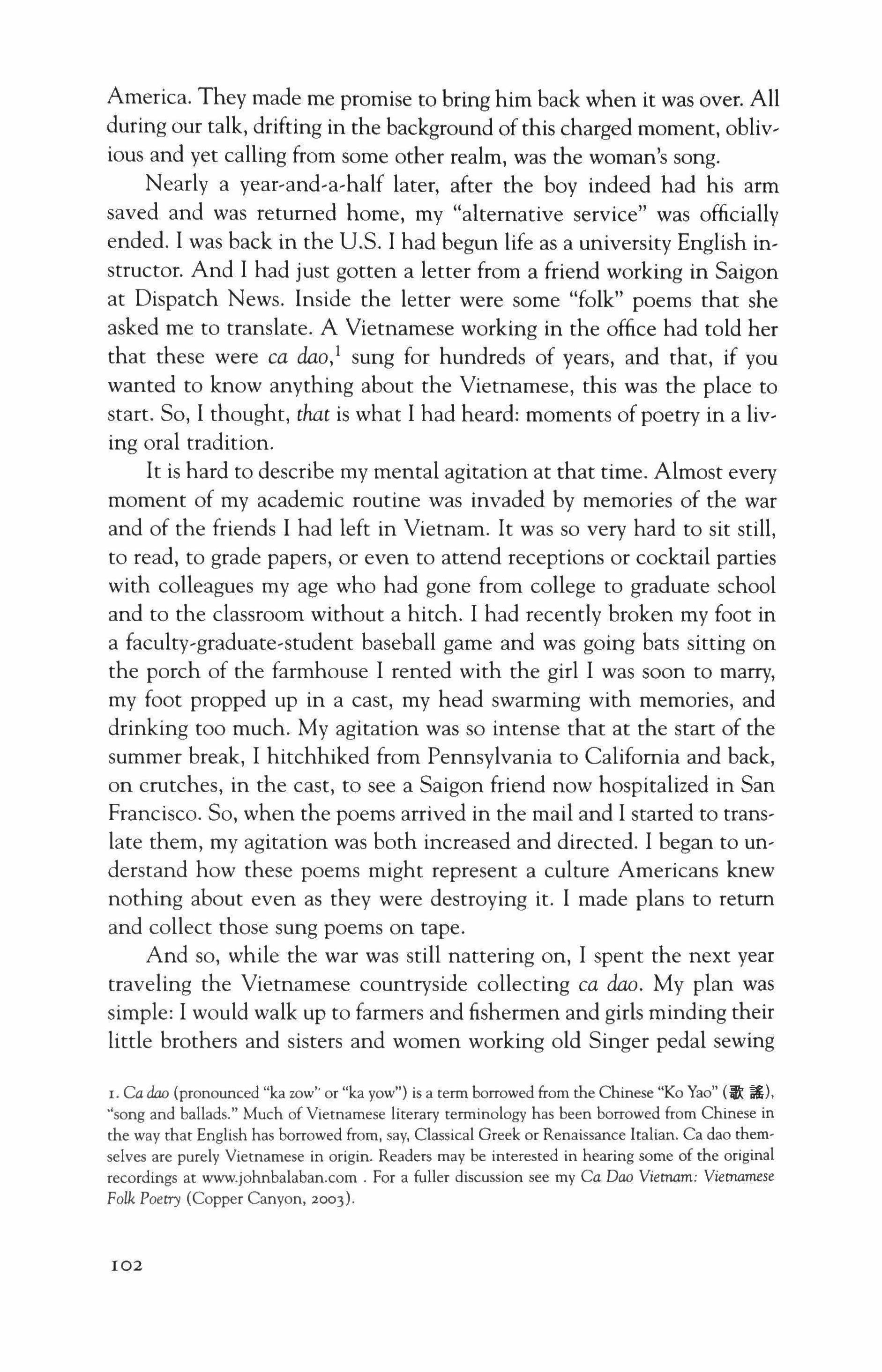
America. They made me promise to bring him back when it was over. All during our talk, drifting in the background ofthis charged moment, oblivious and yet calling from some other realm, was the woman's song.
Nearly a year-and-a-half later, after the boy indeed had his arm saved and was returned home, my "alternative service" was officially ended. I was back in the U.S. I had begun life as a university English instructor. And I had just gotten a letter from a friend working in Saigon at Dispatch News. Inside the letter were some "folk" poems that she asked me to translate. A Vietnamese working in the office had told her that these were ca dao,l sung for hundreds of years, and that, if you wanted to know anything about the Vietnamese, this was the place to start. So, I thought, that is what I had heard: moments of poetry in a living oral tradition.
It is hard to describe my mental agitation at that time. Almost every moment of my academic routine was invaded by memories of the war and of the friends I had left in Vietnam. It was so very hard to sit still, to read, to grade papers, or even to attend receptions or cocktail parties with colleagues my age who had gone from college to graduate school and to the classroom without a hitch. I had recently broken my foot in a faculty-graduate-student baseball game and was going bats sitting on the porch of the farmhouse I rented with the girl I was soon to marry, my foot propped up in a cast, my head swarming with memories, and drinking too much. My agitation was so intense that at the start of the summer break, I hitchhiked from Pennsylvania to California and back, on crutches, in the cast, to see a Saigon friend now hospitalized in San Francisco. So, when the poems arrived in the mail and I started to translate them, my agitation was both increased and directed. I began to understand how these poems might represent a culture Americans knew nothing about even as they were destroying it. I made plans to return and collect those sung poems on tape.
And so, while the war was still nattering on, I spent the next year traveling the Vietnamese countryside collecting ca dao. My plan was simple: I would walk up to farmers and fishermen and girls minding their little brothers and sisters and women working old Singer pedal sewing
I. Ca dao (pronounced "ka zow" or "ka yow") is a term borrowed from the Chinese "Ko Yao" (II: �), "song and ballads," Much of Vietnamese literary terminology has been borrowed from Chinese in the way that English has borrowed from, say, Classical Greek or Renaissance Italian. Ca dao themselves are purely Vietnamese in origin, Readers may be interested in hearing some of the original recordings at www.johnbalaban.com For a fuller discussion see my Ca Dao Vietnam: Vietnamese Folk Poetry (Copper Canyon, 2003)'

machines in their stilt houses above the Mekong, and I would ask them to sing their favorite poems into my tape recorder. I must have seemed very peculiar if not exactly threatening: a lone American, not wearing a uniform, out there in the war zone with a green Harvard bookbag and a Sony tape recorder. I am still amazed that these country people even talked to me, much less agreed to sing poetry into my recorder. In that whole year of recording, I never encountered anyone who did not know some ca dao. It was everywhere, "like dipping a bucket into a well in which the moon shines her silvery light." I recorded some five hundred poems that year from about thirty singers from the Mekong Delta, the Central Highlands, and the old capital of Hue. Di mot ng�y dang, h9C mot sang khan. "Go out one day," the proverb says, "and come back with a basket full of wisdom."
On December 24, 1971, in Hue, I was invited to meet eighty-yearold Le Thanh Canh, a former mandarin in the last imperial court, unusually tall, whiskered, with a raspy voice, and a mischievous twinkle. Decades earlier, in the "change of season" of the revolution, he had bicycled from Hue to Hanoi to join the Viet Minh government but, discovering that he didn't like them very much, he bicycled back to Hue. Still energetic in his old age, he was a collector of ca dao and showed me notebooks in which he had transcribed poetry from the region. This was unusual because while everyone seemed to know the oral poetry, it was usually just taken for granted. Few modem scholars or retired mandarins like Mr. Canh actually studied it, favoring instead the complex literary tradition of Chinese influence. Mr. Canh was delighted that someone was actually going to record ca dao, and, with the boyishly pretty Mrs. C�m from the American Library, he took me to meet two men, Phan Van Kha, fifty-four, a river merchant on the Perfume River, and Tr�n Ngoc Hao, a seventy-year-old with a trailing white beard who had been one of Mr. Canh's palanquin bearers. With the five of us sitting on a shady verandah near a tributary of the Perfume River, he sang the poem below, breaking the meter and rhyme to bend and embellish the notes.
Evening, and all around the King's pavilion people are sitting, fishing, sad and grieving, loving, in love, remembering, waiting, watching. Whose boat plies the river mists offering so many river songs to move these mountains and rivers, our nation?
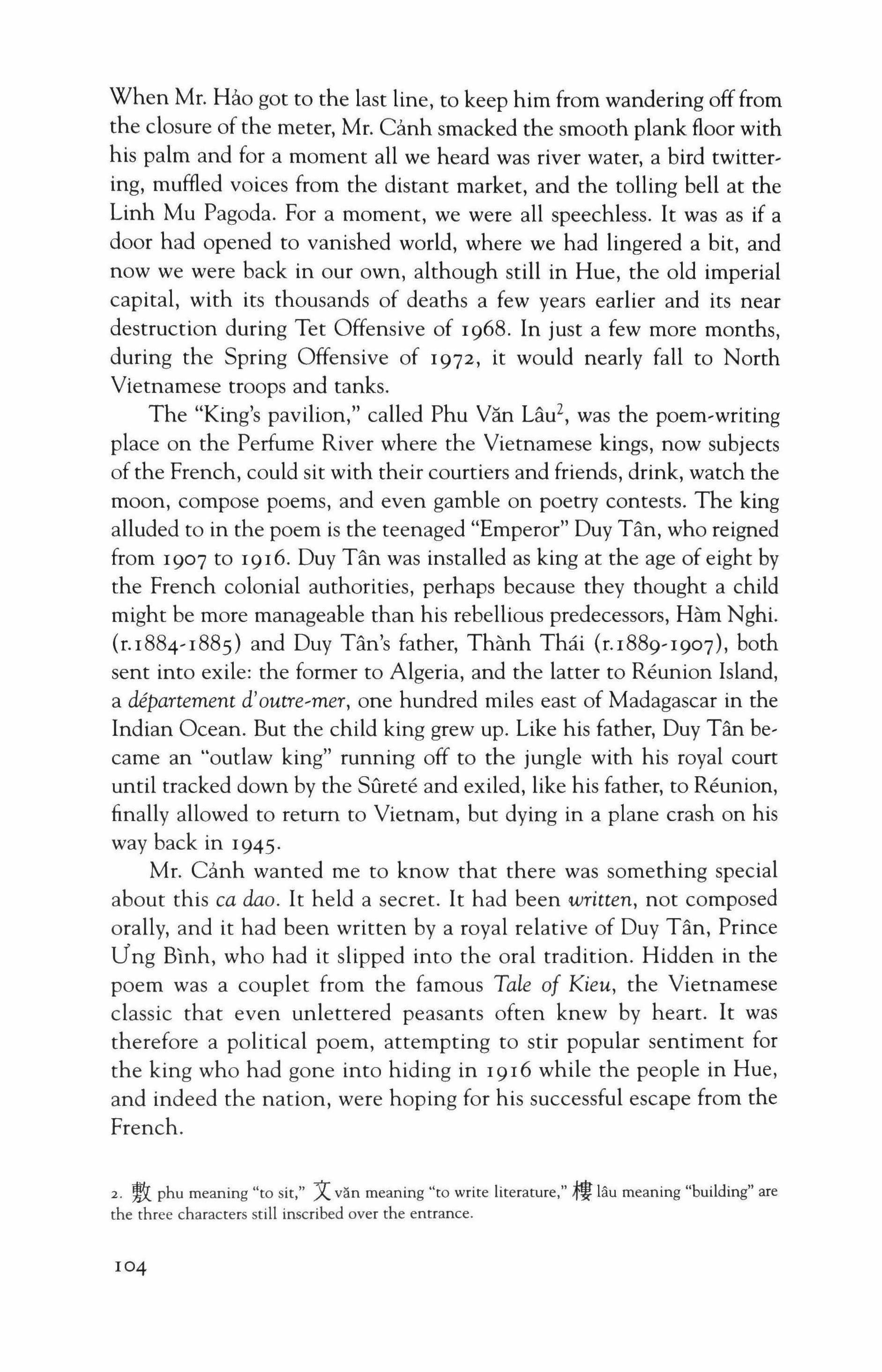
When Mr. Hao got to the last line, to keep him from wandering offfrom the closure of the meter, Mr. Canh smacked the smooth plank floor with his palm and for a moment all we heard was river water, a bird twitter, ing, muffled voices from the distant market, and the tolling bell at the Linh Mu Pagoda. For a moment, we were all speechless. It was as if a door had opened to vanished world, where we had lingered a bit, and now we were back in our own, although still in Hue, the old imperial capital, with its thousands of deaths a few years earlier and its near destruction during Tet Offensive of 1968. In just a few more months, during the Spring Offensive of 1972, it would nearly fall to North Vietnamese troops and tanks.
The "King's pavilion," called Phu Van Uiu2, was the poem-writing place on the Perfume River where the Vietnamese kings, now subjects ofthe French, could sit with their courtiers and friends, drink, watch the moon, compose poems, and even gamble on poetry contests. The king alluded to in the poem is the teenaged "Emperor" Ouy Tan, who reigned from 1907 to 1916. Ouy Tan was installed as king at the age of eight by the French colonial authorities, perhaps because they thought a child might be more manageable than his rebellious predecessors, Ham Nghi. (r.1884'1885) and Ouy Tan's father, Thanh Thai (r.1889'1907), both sent into exile: the former to Algeria, and the latter to Reunion Island, a departement d'ourre-rner, one hundred miles east of Madagascar in the Indian Ocean. But the child king grew up. Like his father, Ouy Tan be' came an "outlaw king" running off to the jungle with his royal court until tracked down by the Surete and exiled, like his father, to Reunion, finally allowed to return to Vietnam, but dying in a plane crash on his way back in 1945.
Mr. Canh wanted me to know that there was something special about this ca dao. It held a secret. It had been written, not composed orally, and it had been written by a royal relative of Ouy Tan, Prince Vng Btnh, who had it slipped into the oral tradition. Hidden in the poem was a couplet from the famous Tale of Kieu, the Vietnamese classic that even unlettered peasants often knew by heart. It was therefore a political poem, attempting to stir popular sentiment for the king who had gone into hiding in 1916 while the people in Hue, and indeed the nation, were hoping for his successful escape from the French.
2. � phu meaning "to sit," )( van meaning "to write literature," ;jf lau meaning "building" are the three characters still inscribed over the entrance.

Years passed, fourteen years, before I encountered the poem again in Bulgaria. In the meantime I had become an academic, had published a novel and some books of poetry and translation, and had pretty much forgotten how to speak Vietnamese.
I had been invited to a meeting of writers in Sofia, Bulgaria during the height of the Cold War in the mid 1980s, as the U.S. was threaten, ing to move its nuclear weapons further east in Europe and the Soviets were threatening to move theirs west into Poland. The American guests included the distinguished poets Denise Levertov, Maxine Kumin, and William Meredith, as well as fiction writers Erskine Caldwell and William Gaddis. I never figured out how we were chosen to be invited. Probably many others had been invited but had declined the visit, like John Updike, famous in Bulgaria for his Vietnam-era visit and his Bech: A Book.
Along with the Americans, there were writers from everywhere on the planet, from Iceland to Vietnam. The Bulgarian Writers Union put up about four hundred of us at their government's expense at the Hotel Pare Moskva. It must have cost them a fortune to feed this literary bat' talion, providing us with plane tickets and city tours, and giving each one of us a packet of spending money with about one hundred dollars in leva.
It was the first time I had met North Vietnamese. I was curious about them and had given one of their delegation poets a copy of my first book of ca dao translations. They were curious about me. The U.S. and Viet, nam still had no diplomatic relations. We had levied a trade embargo against the impoverished nation. How come this American spoke Viet' namese in the southern dialect? Where did he learn it? Why?
Finally, one afternoon I came back to the hotel to find about eight of them sitting in the main lobby. They called me over. It had been four, teen years since I had any reason to speak Vietnamese. I could hardly understand them, much less reply. "That's okay," one said in French. "Sit down. Do you know French?"
I knew a little French. So they began again asking me in French about what I had done in Vietnam. Soon it was rapid fire questioning from several people at once and it was bewildering. I flushed when I first realized I was being interrogated, albeit in the hotel lobby where other poets were talking nearby or walking to the elevators or to the bar Yevtushenko with his entourage of pretty women, along with several nondescript Party hacks from Bloc and Third World countries. When I tried to explain my conscientious objection to the military (which one
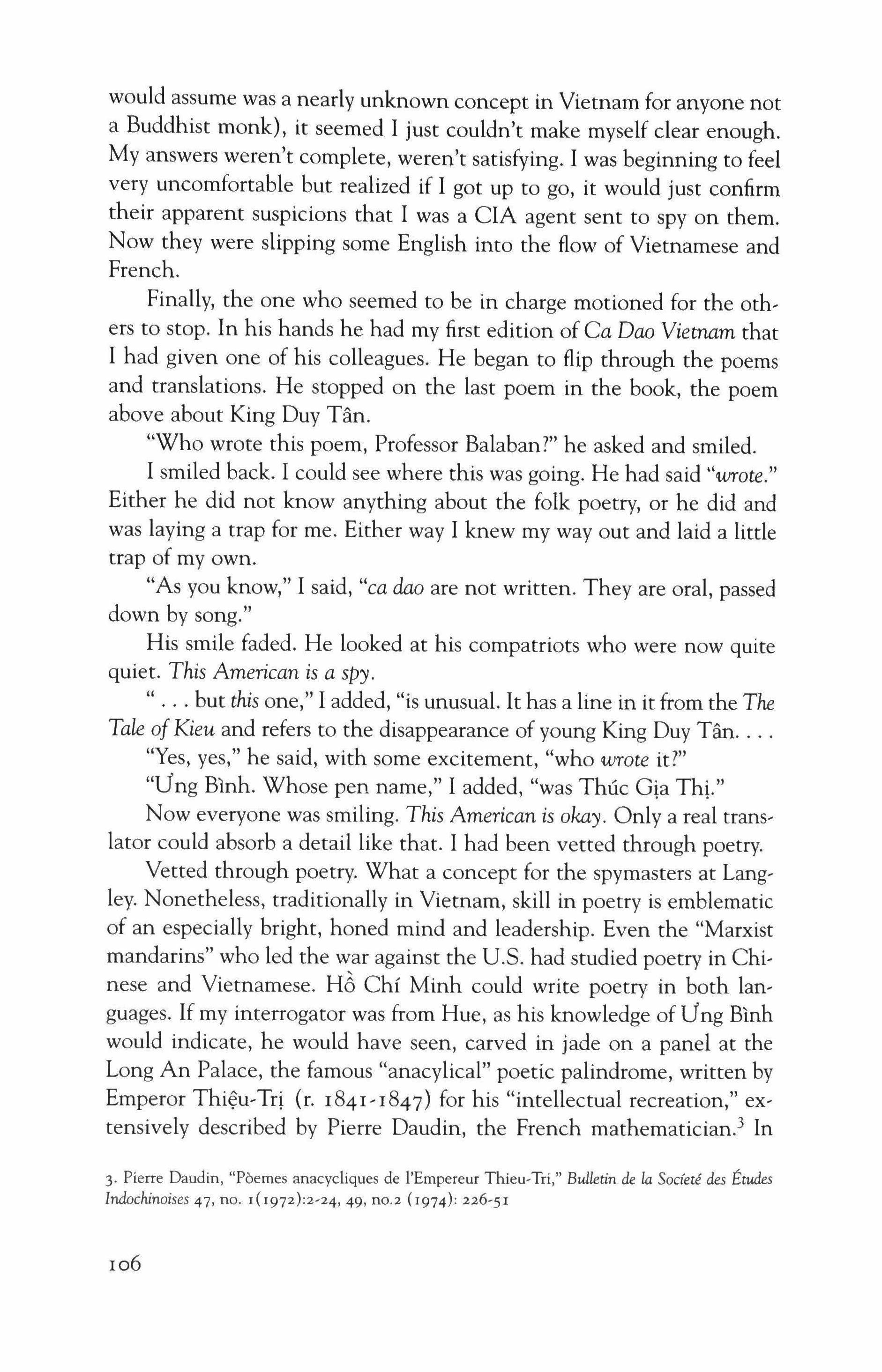
would assume was a nearly unknown concept in Vietnam for anyone not a Buddhist monk), it seemed I just couldn't make myself clear enough. My answers weren't complete, weren't satisfying. I was beginning to feel very uncomfortable but realized if I got up to go, it would just confirm their apparent suspicions that I was a CIA agent sent to spy on them. Now they were slipping some English into the flow of Vietnamese and French.
Finally, the one who seemed to be in charge motioned for the others to stop. In his hands he had my first edition of Ca Dao Vietnam that I had given one of his colleagues. He began to flip through the poems and translations. He stopped on the last poem in the book, the poem above about King Duy Tan.
"Who wrote this poem, Professor Balaban?" he asked and smiled. I smiled back. I could see where this was going. He had said ''tvrote.'' Either he did not know anything about the folk poetry, or he did and was laying a trap for me. Either way I knew my way out and laid a little trap of my own.
"As you know," I said, "ca dao are not written. They are oral, passed down by song."
His smile faded. He looked at his compatriots who were now quite quiet. This American is a spy.
but this one," I added, "is unusual. It has a line in it from the The Tale of Kieu and refers to the disappearance of young King Duy Tan
"Yes, yes," he said, with some excitement, "who wrote it?"
"Vng Blnh. Whose pen name," I added, "was Thiic Gia Thi."
Now everyone was smiling. This American is okay. Only a real translator could absorb a detail like that. I had been vetted through poetry. Vetted through poetry. What a concept for the spymasters at Langley. Nonetheless, traditionally in Vietnam, skill in poetry is emblematic of an especially bright, honed mind and leadership. Even the "Marxist mandarins" who led the war against the u.s. had studied poetry in Chinese and Vietnamese. H6 Chi Minh could write poetry in both languages. If my interrogator was from Hue, as his knowledge of Vng Blnh would indicate, he would have seen, carved in jade on a panel at the Long An Palace, the famous "anacylical" poetic palindrome, written by Emperor Thieu-Tri (r. 1841-1847) for his "intellectual recreation," extensively described by Pierre Daudin, the French mathematician.' In
3. Pierre Daudin, "Poernes anacycliques de l'Empereur Thieu-Tri," Bulletin de La Soc[ete des Etudes Indochinoises 47, no. 1(1972):2-24,49, nO.2 (1974): 226-51
the ideograms of the sun-shaped poem-the sun being the emblem of heavenly mandate-are twelve perfectly rhyming, seven-syllable, eightline poems, with each ray or node being the start of a new poem, whether one reads from the outside, in; or the inside, out; or left-toright, or right-to-left.
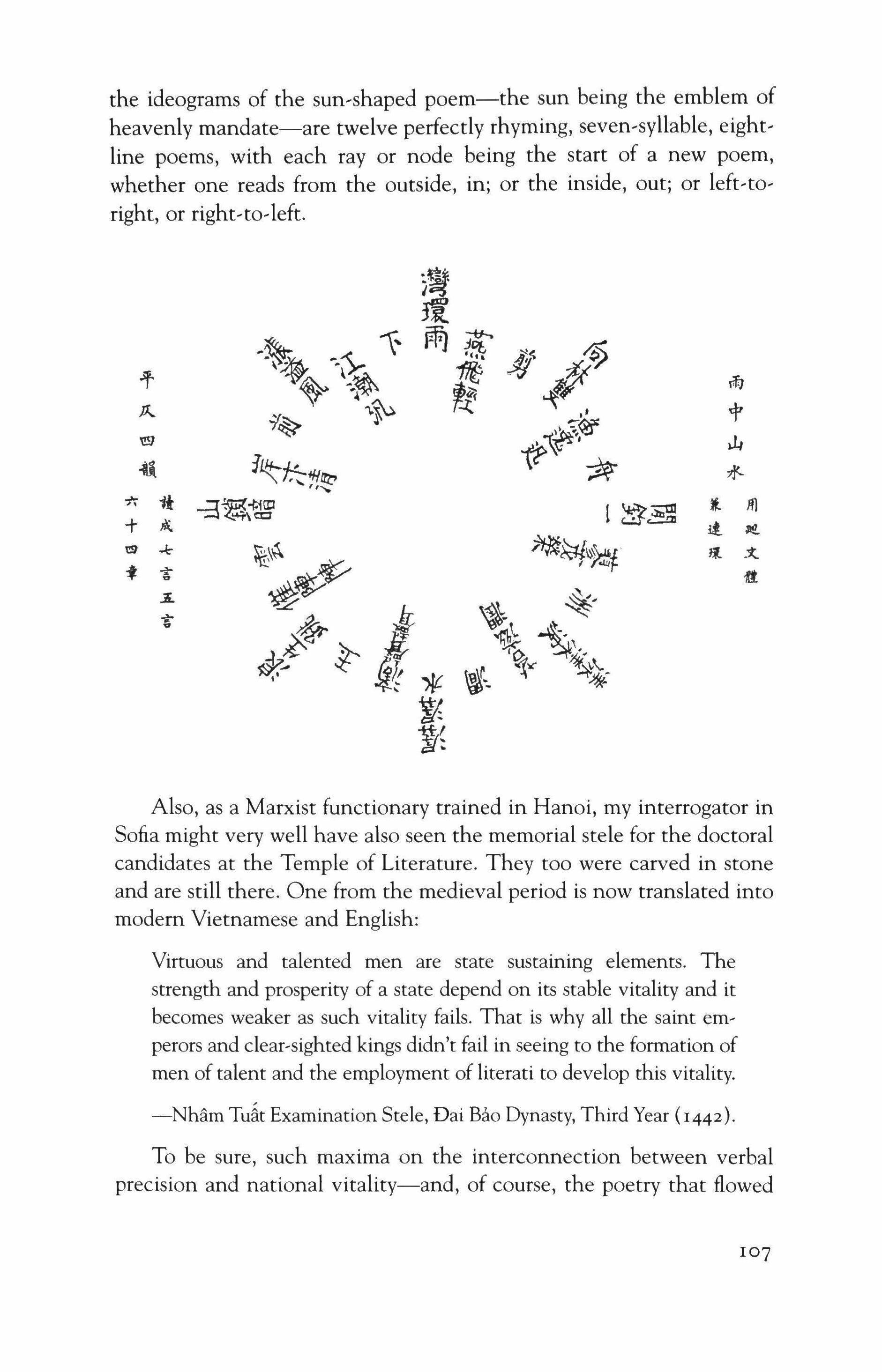
Also, as a Marxist functionary trained in Hanoi, my interrogator in Sofia might very well have also seen the memorial stele for the doctoral candidates at the Temple of Literature. They too were carved in stone and are still there. One from the medieval period is now translated into modem Vietnamese and English:
Virtuous and talented men are state sustammg elements. The strength and prosperity of a state depend on its stable vitality and it becomes weaker as such vitality fails. That is why all the saint ernperors and clear-sighted kings didn't fail in seeing to the formation of men of talent and the employment of literati to develop this vitality.
-Nham Tu&t Examination Stele, Dai Baa Dynasty, Third Year (1442).
To be sure, such maxima on the interconnection between verbal precision and national vitality-and, of course, the poetry that flowed
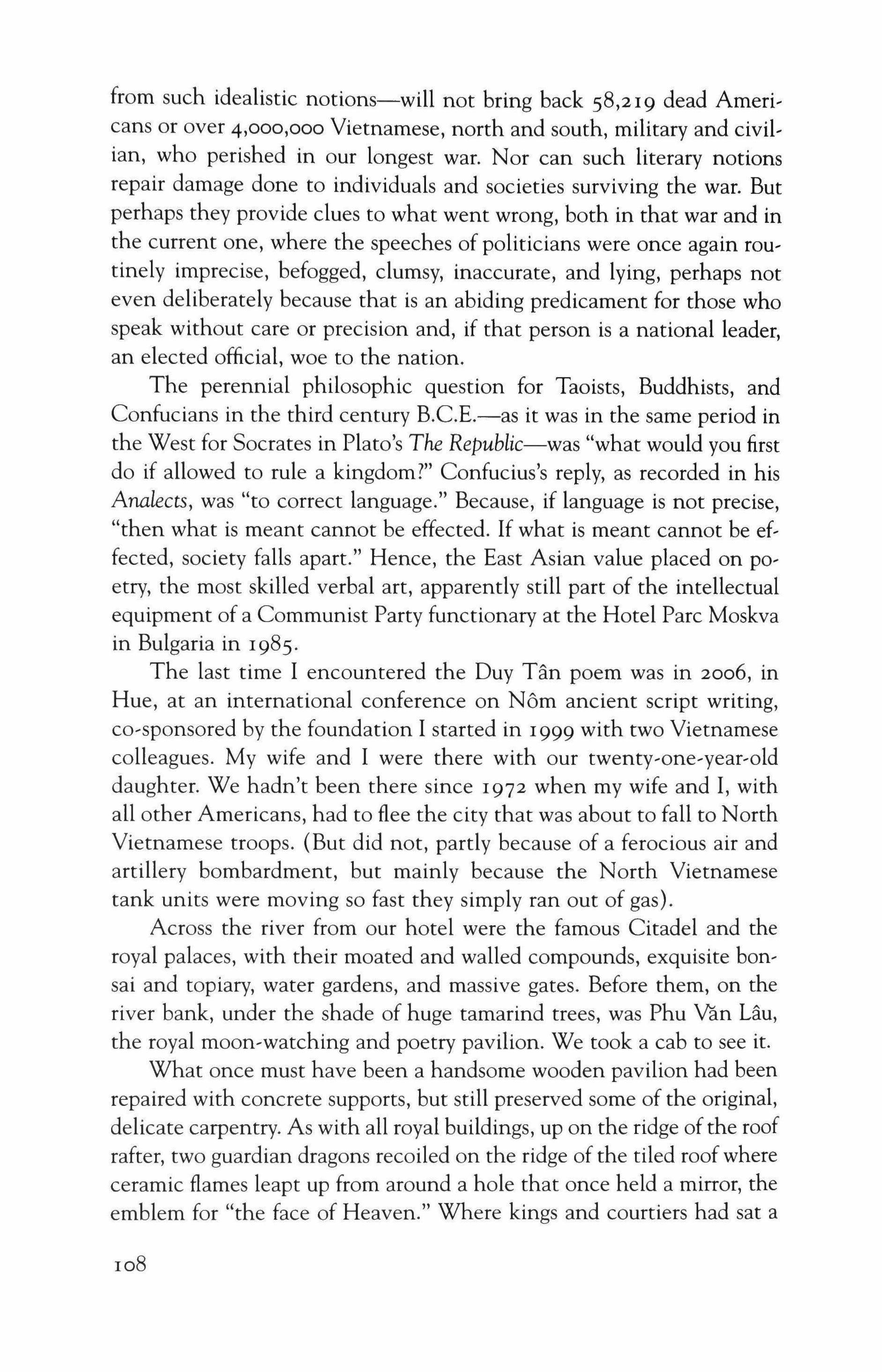
from such idealistic notions-will not bring back 58,219 dead Americans or over 4,000,000 Vietnamese, north and south, military and civilian, who perished in our longest war. Nor can such literary notions repair damage done to individuals and societies surviving the war. But perhaps they provide clues to what went wrong, both in that war and in the current one, where the speeches of politicians were once again routinely imprecise, befogged, clumsy, inaccurate, and lying, perhaps not even deliberately because that is an abiding predicament for those who speak without care or precision and, if that person is a national leader, an elected official, woe to the nation.
The perennial philosophic question for Taoists, Buddhists, and Confucians in the third century B.C.E.-as it was in the same period in the West for Socrates in Plato's The Republic-was "what would you first do if allowed to rule a kingdom?" Confucius's reply, as recorded in his Analects, was "to correct language." Because, if language is not precise, "then what is meant cannot be effected. If what is meant cannot be effected, society falls apart." Hence, the East Asian value placed on poetry, the most skilled verbal art, apparently still part of the intellectual equipment of a Communist Party functionary at the Hotel Parc Moskva in Bulgaria in 1985.
The last time I encountered the Duy Tan poem was in 2006, in Hue, at an international conference on Nom ancient script writing, co-sponsored by the foundation I started in 1999 with two Vietnamese colleagues. My wife and I were there with our twenty-one-year-old daughter. We hadn't been there since 1972 when my wife and I, with all other Americans, had to flee the city that was about to fall to North Vietnamese troops. (But did not, partly because of a ferocious air and artillery bombardment, but mainly because the North Vietnamese tank units were moving so fast they simply ran out of gas).
Across the river from our hotel were the famous Citadel and the royal palaces, with their moated and walled compounds, exquisite bonsai and topiary, water gardens, and massive gates. Before them, on the river bank, under the shade of huge tamarind trees, was Phu van Lau, the royal moon-watching and poetry pavilion. We took a cab to see it.
What once must have been a handsome wooden pavilion had been repaired with concrete supports, but still preserved some of the original, delicate carpentry. As with all royal buildings, up on the ridge of the roof rafter, two guardian dragons recoiled on the ridge of the tiled roof where ceramic flames leapt up from around a hole that once held a mirror, the emblem for "the face of Heaven." Where kings and courtiers had sat a

hundred years before, drinking wine and matching wits in poetry, a young couple were smooching on the steps facing the river.
All around the pavilion, the scene was very much that in the Vng Binh poem of a hundred years before, with people sitting about catching the breeze off the river under the shade of big trees. Three old, whitehaired couples were enjoying a picnic on the grass. When they noticed us, one of the retirees struggled onto to his feet to say "bonjour, mes amis."
"Bonjour, monsieur," my wife and I said together in singsong politesse, as our daughter looked quizzically at the man now walking towards us.
He started to say more in French, but I asked him in Vietnamese if this was indeed Phu Van Lau. His face lit up. He turned to his compatriots still sitting by their picnic and repeated what I had said.
Then, without any announcement, he startled us by singing. He was singing the poem written by Vng Blnh for King Duy Tan, and for a Vietnam that was already vanishing one hundred years ago. With a gulp in my throat, I watched him sing. I saw his stubs of bad front teeth, stained brown from a lifetime of unfiltered cigarettes, and his eyes, the whites a bit rheumy. I thought of all that a man his age must have seen and endured and of the whimsical play alive in him that made him sing this poem because foreigners had come along and asked about Phu Van Lau in Vietnamese.

Then, to my own surprise, I joined him in singing the words because I too knew the little poem by heart. I sang along in Vietnamese, just as I had heard Mr. Hao sing into my tape recorder decades before.
American tourists were not unusual. This was. The other retirees got up to move closer, one woman using a cane.
When the man was done, he cried. His elderly companions said some words to comfort him. I looked at my wife and she was crying and then I started to tear up. I looked at our daughter who, at twenty-one, shared none of our memories of war, its destructions, or the peculiar, restorative beauty of this little poem. In this way, she was no different than most Americans or, indeed, most Vietnamese alive today, the majority born after the end of the war.
"What was that about?" she asked, after everyone had recomposed themselves and shaken hands and we were walking back to our waiting taxi.
"A poem," I said. "From long ago."

June 27, 1177:
Joining River Pavilion.
Fragrant and Flowery Tower. Patrol and Investigation Barracks for Managing the Border.
(Each year, the Patrol and Investigation Inspectorate sends a written report when the plum trees are about to blossom.)
June 28:
Attendant Esquire Causeway.
(The road was lined with people who had never seen a Regulation Marshal before.)
June 29:
Exalted Virtue Temple, overlooking the Assembled River.
(Each year, 50,000 sheep are sacrificed at a festival honoring Grand Protector Li. I wrote a poem against this practice and ordered it engraved in stone.)
June 30:
Jade Citadel Gate.
Floating Clouds Pavilion.
Cherishing Antiquity Pavilion. Rope Bridge.
Nine-Chambered Grotto Heaven of the Precious Immortals Gate.
Realized Lord Hall.
Jade Splendor Tower.
July I (my birthday): Exalted Virtue Temple.
(As the abbots performed the Pacing the Void ceremony, a strange red light appeared and then appeared again.)
(Elderly men and women from Old Folks Village came to see me.)
July 2: Supreme Clarity Palace. Snow Mountains.
(At night, thousands of strange lights appeared.)
July 3: Long-Life Abbey.
July 4: Sage Buddha Cloister.
Su Tung-p'o wrote: "The clear wind-what is it?"
July 5: Serene Spring Hall.
(I ordered the name changed to Ministerial Accomplishments Hall.)
July 6:
Skillful- in-Expressing-Praise Hall.
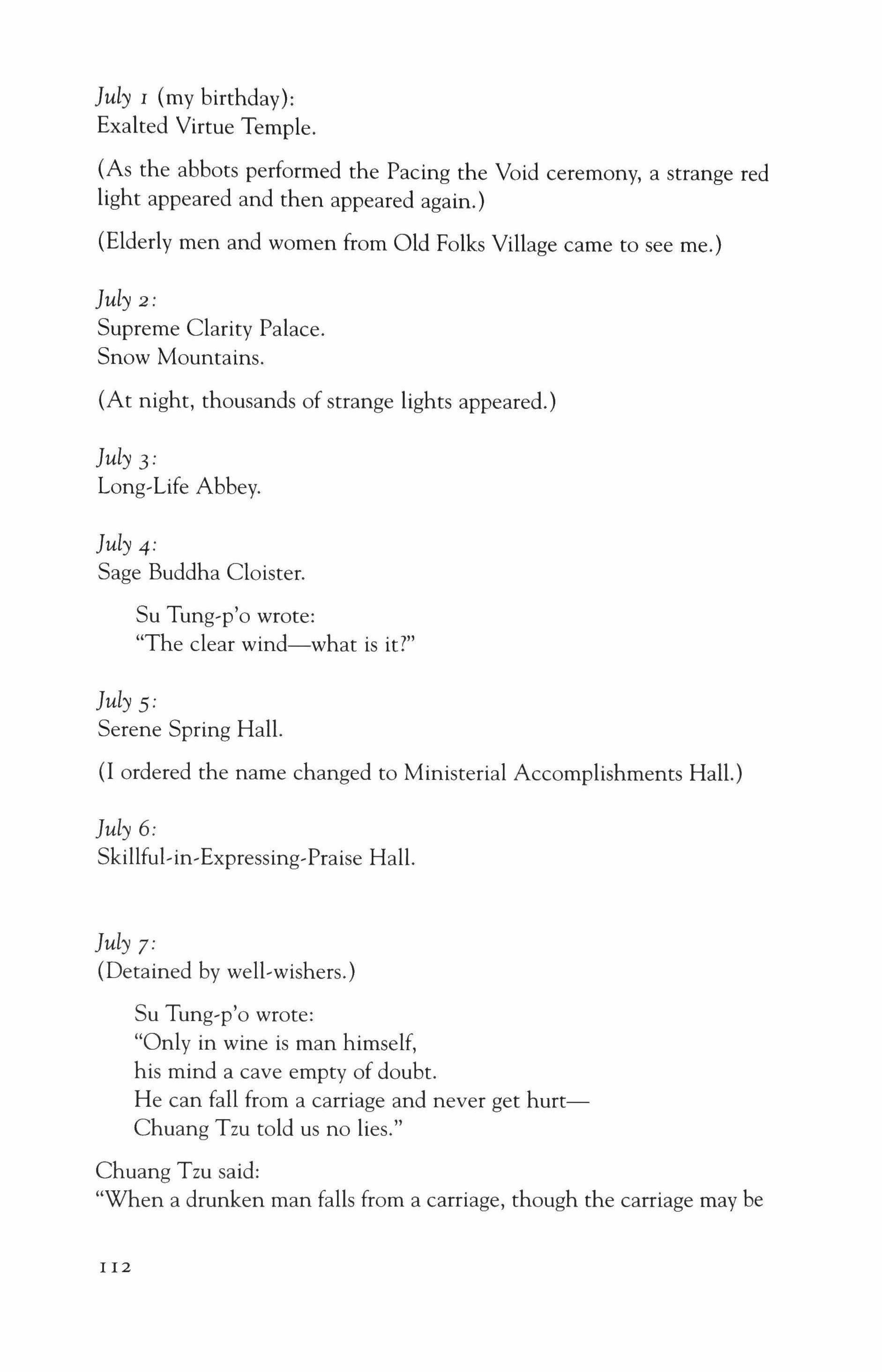
July 7: (Detained by well-wishers.)
Su Tung-p'o wrote:
"Only in wine is man himself, his mind a cave empty of doubt. He can fall from a carriage and never get hurtChuang Tzu told us no lies."
Chuang Tzu said:
"When a drunken man falls from a carriage, though the carriage may be
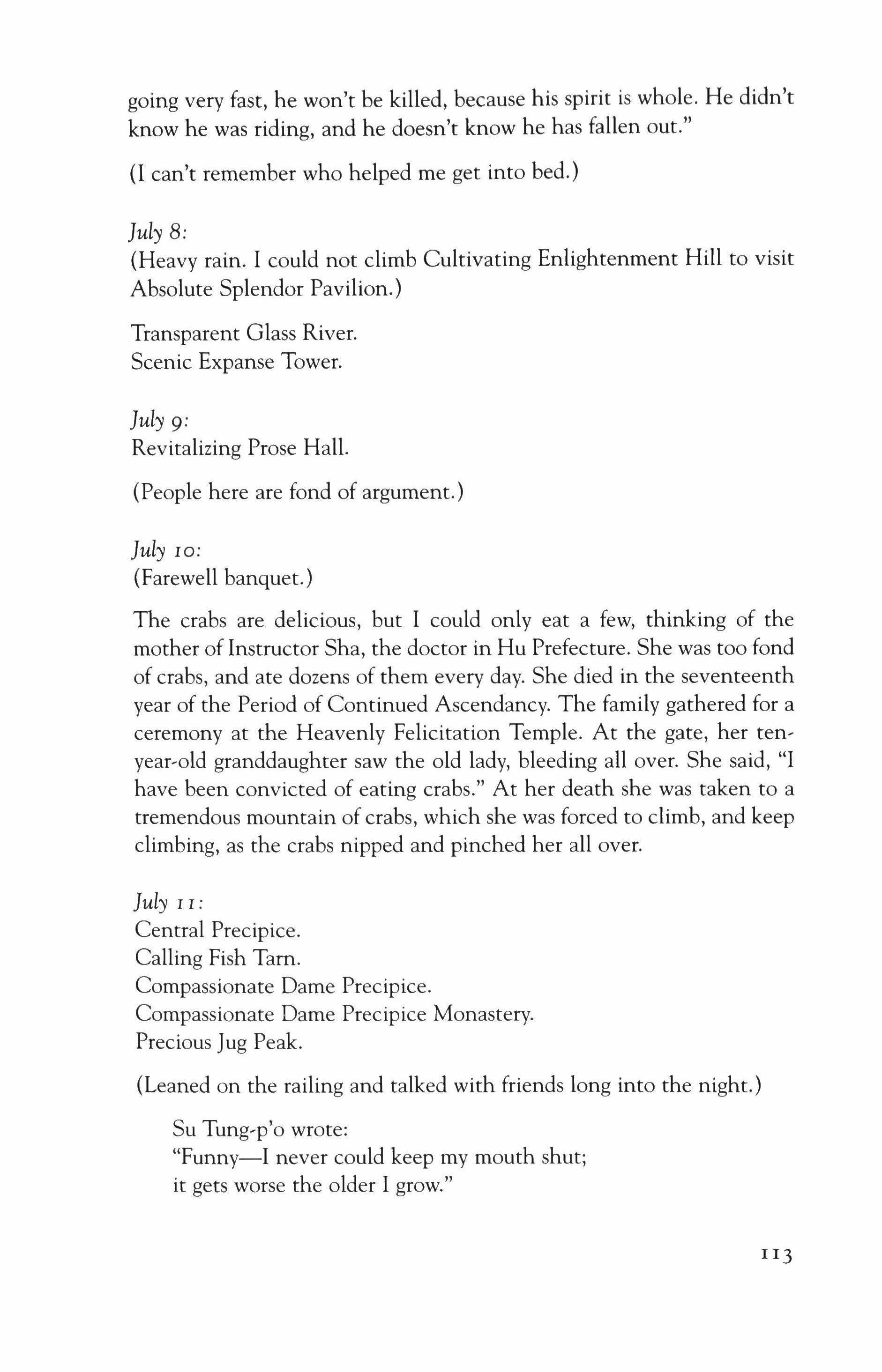
going very fast, he won't be killed, because his spirit is whole. He didn't know he was riding, and he doesn't know he has fallen out."
(1 can't remember who helped me get into bed.)
July 8:
(Heavy rain. 1 could not climb Cultivating Enlightenment Hill to visit Absolute Splendor Pavilion.)
Transparent Glass River. Scenic Expanse Tower.
July 9: Revitalizing Prose Hall.
(People here are fond of argument.)
July ro: (Farewell banquet.)
The crabs are delicious, but I could only eat a few, thinking of the mother of Instructor Sha, the doctor in Hu Prefecture. She was too fond of crabs, and ate dozens of them every day. She died in the seventeenth year of the Period of Continued Ascendancy. The family gathered for a ceremony at the Heavenly Felicitation Temple. At the gate, her tenyear-old granddaughter saw the old lady, bleeding all over. She said, "I have been convicted of eating crabs." At her death she was taken to a tremendous mountain of crabs, which she was forced to climb, and keep climbing, as the crabs nipped and pinched her all over.
July I I: Central Precipice. Calling Fish Tam.
Compassionate Dame Precipice.
Compassionate Dame Precipice Monastery. Precious Jug Peak.
(Leaned on the railing and talked with friends long into the night.)
Su Tung-p'o wrote:
"Funny-I never could keep my mouth shut; it gets worse the older I grow."
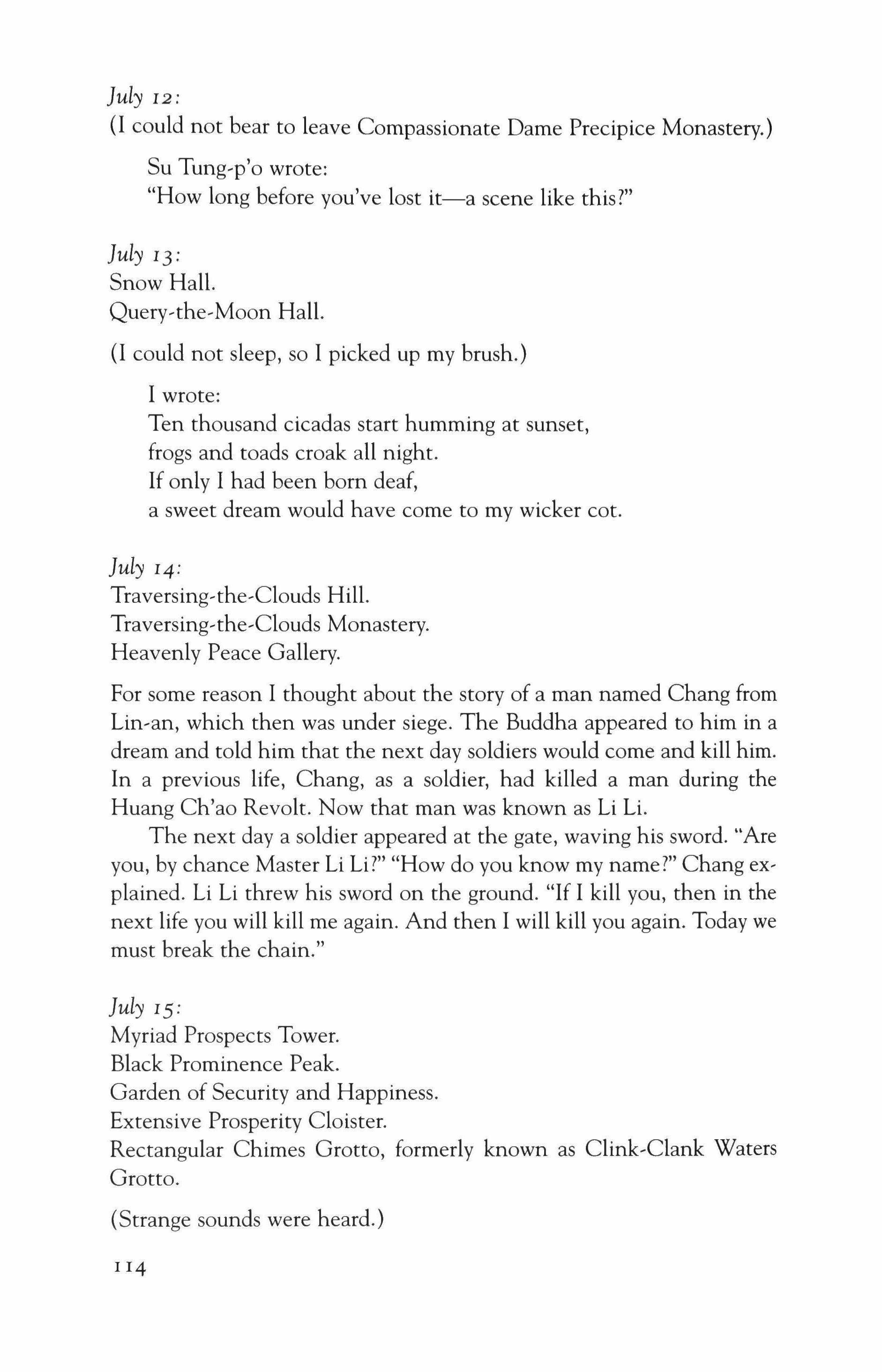
July 12:
(l could not bear to leave Compassionate Dame Precipice Monastery.)
Su Tung-p'o wrote: "How long before you've lost it-a scene like this?"
July 13: Snow Hall.
Query-the-Moon Hall.
(l could not sleep, so I picked up my brush.)
I wrote: Ten thousand cicadas start humming at sunset, frogs and toads croak all night. If only I had been born deaf, a sweet dream would have come to my wicker cot.
July 14:
Traversing-the-Clouds Hill. Traversing-the-Clouds Monastery. Heavenly Peace Gallery.
For some reason I thought about the story of a man named Chang from Lin-an, which then was under siege. The Buddha appeared to him in a dream and told him that the next day soldiers would come and kill him. In a previous life, Chang, as a soldier, had killed a man during the Huang Ch'ao Revolt. Now that man was known as Li Li.
The next day a soldier appeared at the gate, waving his sword. "Are you, by chance Master Li Li?" "How do you know my name?" Chang explained. Li Li threw his sword on the ground. "If I kill you, then in the next life you will kill me again. And then I will kill you again. Today we must break the chain."
July IS:
Myriad Prospects Tower. Black Prominence Peak.
Garden of Security and Happiness. Extensive Prosperity Cloister.
Rectangular Chimes Grotto, formerly known as Clink-Clank Waters Grotto.
(Strange sounds were heard.)

July: 16-20:
Big E Mountain. Middle E Mountain. Little E Mountain.
Su Tung-p'o wrote:
"Do you recall that day, steep winding slopes, road long, all of us tired, our lame donkeys braying?"
July 2 I:
(Groups of village women, their heads wrapped in cloth turbans, were watching me.)
My old friend Lu Yu wrote: "Too bad I didn't spend my life tending a vegetable patch!"
July 22:
Benevolent Fortune Cloister.
Universal Security Cloister. White Stream Manor.
Divine Dragon Hall. Green Bamboo Bridge. Plum Tree Bank.
Two Dragons Hall.
Central Peak Cloister. White Cliff Peak.
Shout-and-Response Peak.
Camphor Tree Ridge.
Ox Heart Ridge.
Ox Heart Monastery.
Precious Manifestation Stream.
(A painting could not capture this scene.)
July 23:
White Stream Monastery.
Prosperity and Peace Hall. Sutras Depository.
Three Thousand Iron Buddhas Hall.
I wrote:
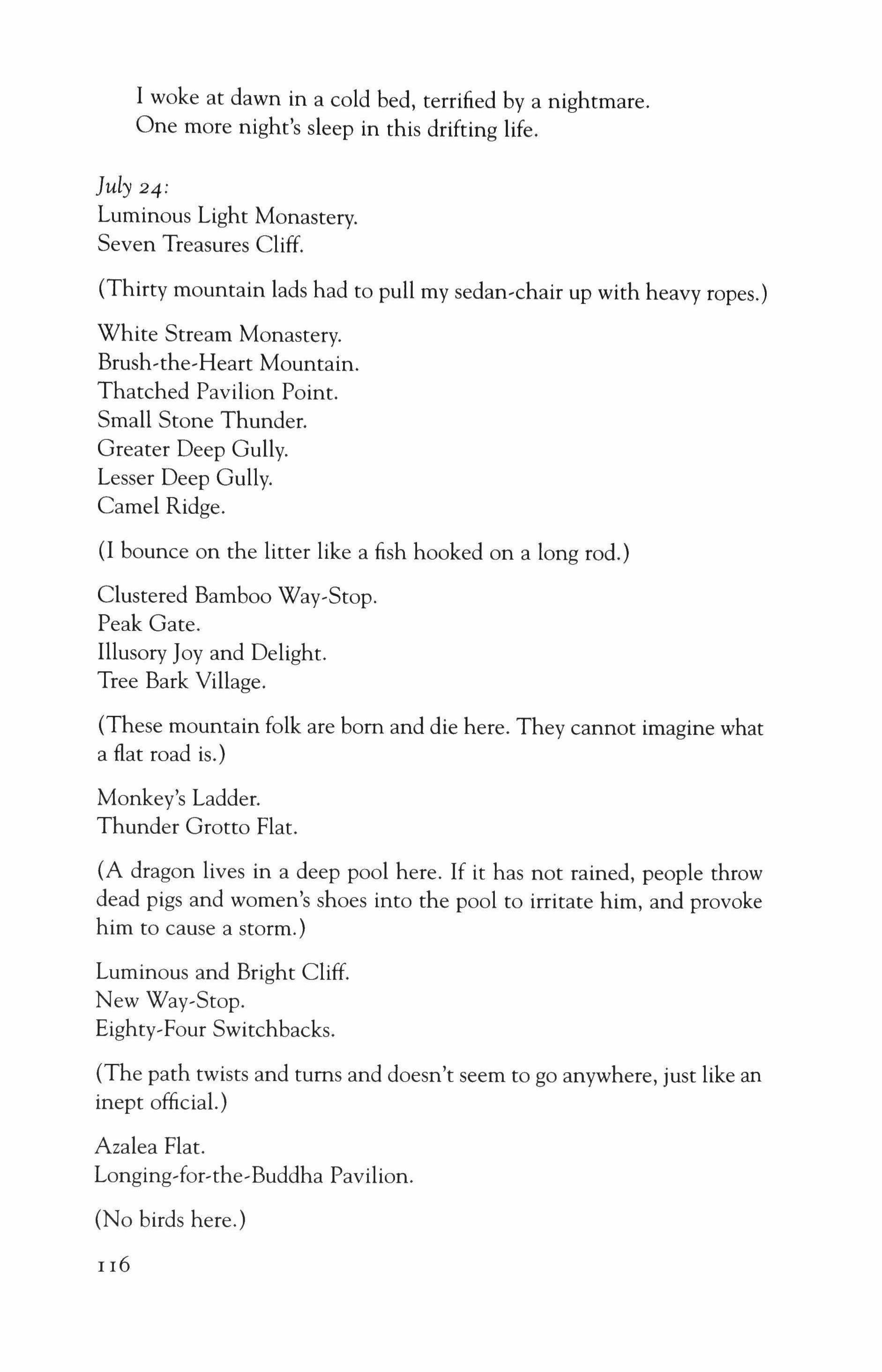
I woke at dawn in a cold bed, terrified by a nightmare. One more night's sleep in this drifting life.
July 24:
Luminous Light Monastery. Seven Treasures Cliff.
(Thirty mountain lads had to pull my sedan-chair up with heavy ropes.)
White Stream Monastery. Brush-the-Heart Mountain. Thatched Pavilion Point.
Small Stone Thunder. Greater Deep Gully. Lesser Deep Gully. Camel Ridge.
(I bounce on the litter like a fish hooked on a long rod.)
Clustered Bamboo Way-Stop. Peak Gate.
Illusory Joy and Delight. Tree Bark Village.
(These mountain folk are born and die here. They cannot imagine what a flat road is.)
Monkey's Ladder. Thunder Grotto Flat.
(A dragon lives in a deep pool here. If it has not rained, people throw dead pigs and women's shoes into the pool to irritate him, and provoke him to cause a storm.)
Luminous and Bright Cliff. New Way-Stop. Eighty-Four Switchbacks.
(The path twists and turns and doesn't seem to go anywhere, just like an inept official.)
Azalea Flat. Longing-for-the-Buddha Pavilion.
(No birds here.)
II6

Tender Grass Flat.
Foot-Washing Stream.
Luminous Light Monastery.
(I put on all the clothes and furs I had with me, and still was shivering.)
Heavenly Immortal Bridge.
(If you boil rice in the water from this spring it will never cook.)
Thunder Grotto Mountain.
(A great globe of light appeared.)
Strangely, I dreamt of a slave girl I had once seen, many years ago, who had the character "escapee" carved on both cheeks.
July 25: Thunder Grotto Mountain.
(A dense fog called the Silvery World.)
(A heavy rain to cleanse the cliff before the Great Manifestation.)
(A globe of light called the Body-Absorbing Light. In its center I could see my reflection, but not that of the person standing next to me.)
(High winds scattering clouds. Another globe of light, called the ClearSky Manifestation.)
July 26:
White Stream Monastery. Black Stream Monastery. Moon Peak.
(I must remember that in the Analects it is said that the Master never spoke of extraordinary things.)
July 27: White Cloud Gorge. Ox-Heart Monastery. Sifting Pearls Spring. Amusing Elixir Rock. Dragon Gate Gorge. Dragon Gate Grotto.
(I am no longer in the human world.)

July 28�30: (Uneventful.)
Su Tung-p'o wrote: "Will I spend all my life on rivers and lakes?"
My old friend Lu Yu wrote: "Success/failure-one tum of the palm."
July 3 I: Looking-at-the-Moon Gazebo. Murmuring Jade Grotto.
(All my life I've been obsessed with searching for that which is hidden.)
August I:
(The riverbanks have boulders that resemble horses, and the villagers hitch them with ropes. If they do not, they say, strange things happen.)
August 2: Great Death Retreat. Locked River Pavilion. Horse Lake River.
(I changed the name of the local wine from Double Cyan to Spring Cyan.)
August 3:
(Did not bother to go ashore. The villages look poor and shoddy. The men wear felt hats and watch the boats go by.)
For some reason I thought about my old friend Lu Yu, when he stopped in No Tin District, next to Tin Mountain, a few years ago. He wrote:
"Toward the end of the Han Dynasty there was a written prophecy that declared: 'While there's tin, war in the world; no tin, the world at rest! While there's tin, struggle in the world; no tin, the world at peace!' From that time until now, whenever any tin comes to light the people here immediately bury it and are afraid to use it."
August 4: Southern Pacification Tower. Arriving Breeze Pavilion. IIB

August 5:
(Detained by a banquet.)
(For the guests, I spontaneously composed a poem, following the rhyme scheme of]udge Ts'u Chi-shao's poem on a river banquet.)
I wrote:
South wind eases sorrow; rain provokes a poem. Peacetime: even hawks and ravens celebrate. I'd need a five-color brush to capture this scene. My poem as cool as the clouds and water.
(The singing girls sing "Bamboo Branch" three times in a row, and the guests forget to go home.)
August 6:
Heaven-Ascendent King Temple.
(Fishermen make offerings of fish. If they have no fish, they offer fish pickle.)
Su Tung-p'o wrote: "Boatmen and water birds dream the same dream; a big fish splashes off like a frightened fox."
August 7: Fisherman's Grotto.
There is an old saying: "Water is not a chisel and yet it pierces stone."
Mud Mound Village.
August 8:
Repaying Kindness Monastery.
(Vapors from the water here are noxious. The women all have goiters.)
I wrote:
You may think these women are ugly, but their boyfriends buy them silver hairpins.
August 9:
(Storm. The boat could not be steered.)
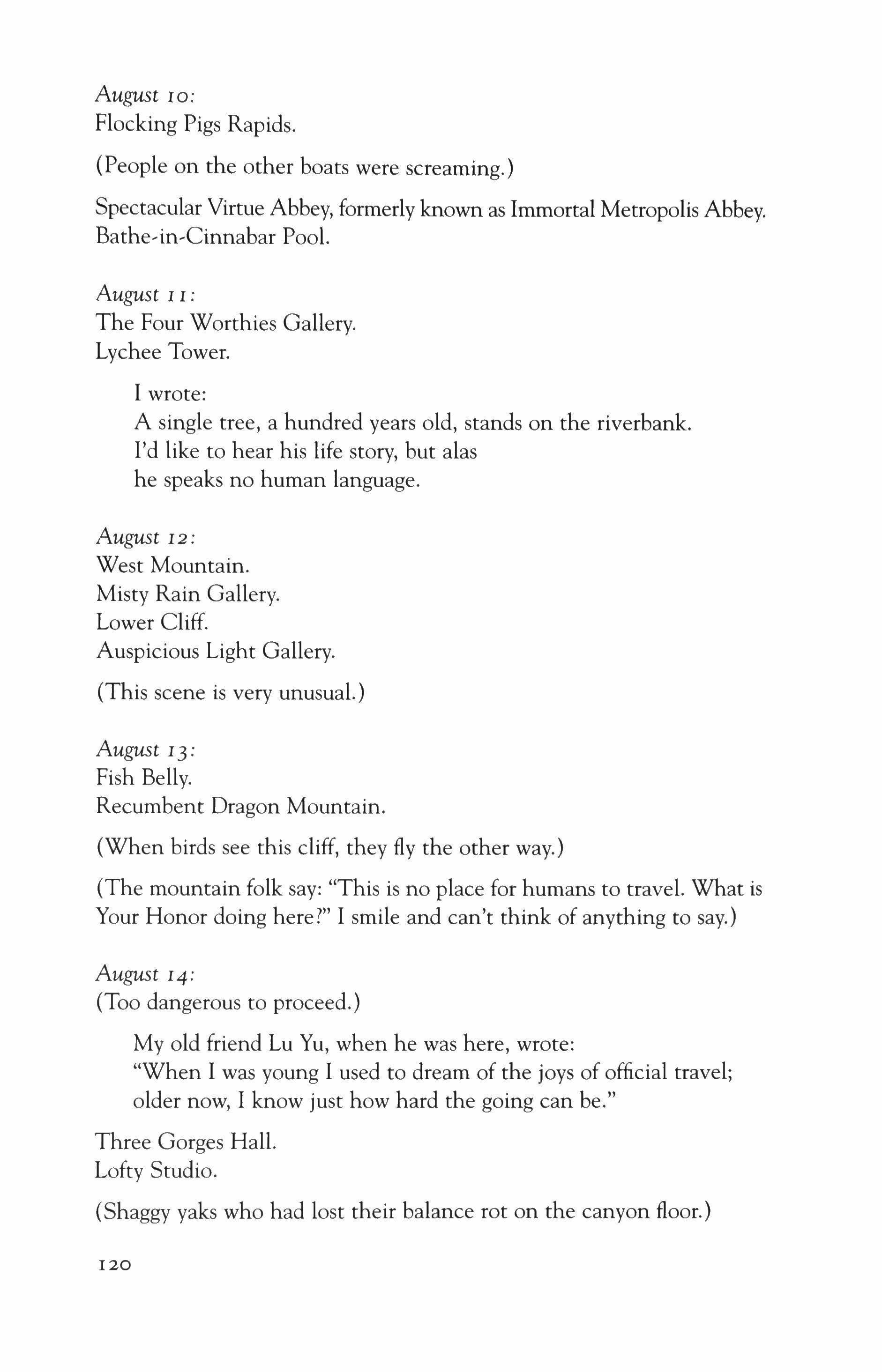
August 10: Flocking Pigs Rapids.
(People on the other boats were screaming.)
Spectacular Virtue Abbey, formerly known as Immortal Metropolis Abbey. Bathe-in-Cinnabar Pool.
August I I: The Four Worthies Gallery. Lychee Tower.
I wrote: A single tree, a hundred years old, stands on the riverbank. I'd like to hear his life story, but alas he speaks no human language.
August 12: West Mountain.
Misty Rain Gallery. Lower Cliff.
Auspicious Light Gallery.
(This scene is very unusual.)
August 13: Fish Belly. Recumbent Dragon Mountain.
(When birds see this cliff, they fly the other way.)
(The mountain folk say: "This is no place for humans to travel. What is Your Honor doing here?" I smile and can't think of anything to say.)
August 14: (Too dangerous to proceed.)
My old friend Lu Yu, when he was here, wrote: "When I was young I used to dream of the joys of official travel; older now, I know just how hard the going can be."
Three Gorges Hall. Lofty Studio.
(Shaggy yaks who had lost their balance rot on the canyon floor.)

August IS: (River still rising.)
(Whirlpools.)
(This is the most dangerous place in the world.)
(I entrusted everything to Nature and did not ask any questions.)
August 16: Divine Woman Temple. Twelve Peaks.
(In the gorges at noon it is as dark as sunset.)
Meng Chiao wrote: "Unearthly voices rise from hidden dens."
He wrote:
"There is nothing human in the sound of gorges."
Sun-and-Clouds Terrace. Approaching Crane Peak.
(Paintings of this scene cannot resemble this scene.)
Congealed Truth Abbey.
(Whirlpools.)
He wrote: "A boat leaves earth entering earth here."
Li Tao-yuan wrote: "This landscape has a soul."
August 17: (Nothing but thatched-roof huts.)
Here the fishermen sing: "A gibbon howls three times and your clothes are drenched with tears."
August 18-25: (Rainstorms, river rising. Could not proceed.)
I wrote:
Miserable at a miserable inn, lying in bed. Water drips through the ceiling and extinguishes dreams.
I wrote: Little mosquitoes, you and I have the same problem: hunger keeps us flying around.
August 26: White Dog Gorge. Jade Void Grotto. New Rapids. Yellow Ox Gorge. Yellow Ox Mountain.
(The river has so many twists, the view of the mountain doesn't change.)
Here the fishermen sing:
"In the morning, set out from Yellow Ox; in the evening, stay at Yellow Ox; three days and three nights, Yellow Ox will be the same."
Folding Fan Gorge. Toad Rock. Flat and Good Embankment.
(Everyone celebrates here.)
August 27: Ultimate Joy Pavilion.
(Nobody knows how many mountains there are here. They disappear into the haze, and the fat clouds are endless. One can only long to go home.)
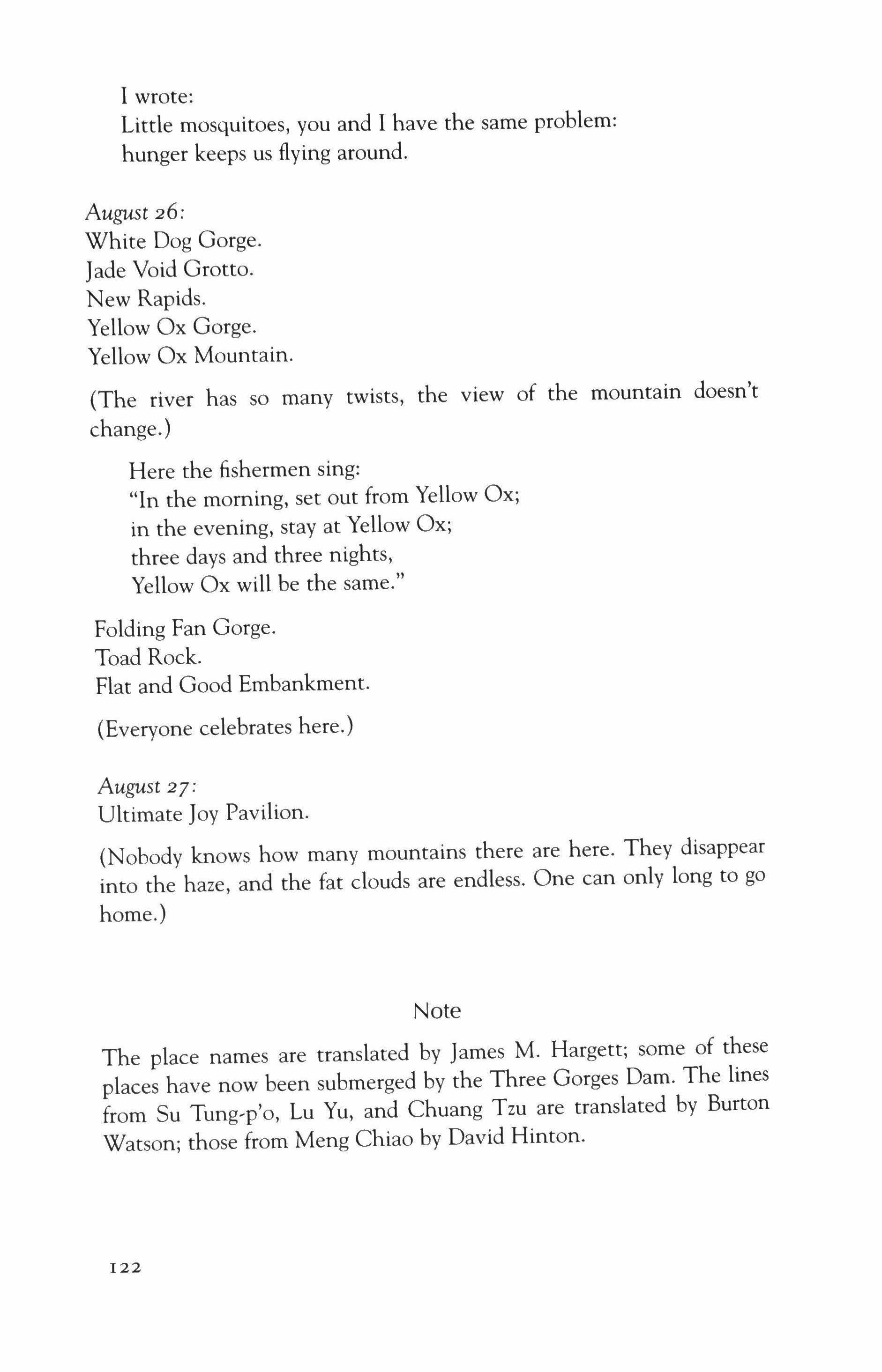
Note
The place names are translated by James M. Hargett; some of these places have now been submerged by the Three Gorges Dam. The lines from Su Tung-p'o, Lu Yu, and Chuang Tzu are translated by Burton Watson; those from Meng Chiao by David Hinton.

In Norwegian there is a word, eventyr, that means something between "fairy tale" and "adventure." I went to Norway because I wanted my life to settle right in that place, where exciting things might happen, and I would then be powerless to explain them. I suppose I could have gone anywhere, since it is only when we are wrenched out of familiarity that the true self really gets a chance to glow. This one country lured me with promises ofmusic, myth, and mountains. The ancient songs of the valleys, each one so different from the others, pockets of innovation in melody and word. The tumbling mountain spaces, deep-green fjord waters. Beautiful synchrony, wild and clear skies. "Event. Tear." I can't ever say it just right. And as a traveler I want this simple word to mean so much more than it ever can-like anything I remember of all that happened there.
There were rumors of a Master, a thinker and doer, with theories on the role of humanity in nature, and his cryptic letter of invitation. "Come to my country. We will go climbing." This and the otherworldly sounds made out ofrock, wind, and improvised flurry. A jazz not ofAmerica, but melded with the cool rhythms of glaciers melting. We make our lists and choose new homelands as we travel and choose to stay where we end up. In this open world we are free to go. Who is ready for us when we arrive? And what are the eventual consequences of rootlessness?
Novalis said "Philosophy is really homesickness. It is the urge to be at home everywhere." So what then distinguishes it from traveling? If

you root yourself in rootlessness you will always find a question worth asking: Where do you want to go today? Where will you sleep? Where will you move to? Where are you in the midst ofthe unwritten trajectory? What to do next, what do you hope to find? And as Ludwig Wittgenstein was so fond of asking, "Is your journey really necessary?"
I would like to write like Wittgenstein, but not of the same things. My teachers always told me what he said was more important than how he said it, the style, they said, was an unfortunate impediment to the message. "If I can't speak about it, I won't talk," or something like that, he wrote. I guess if you never met him you missed most of what he meant. Learning Norwegian is certainly a "language-game" for me. I don't mind learning the rules. But I don't want to play by them. It's like that with everything I do. Wittgenstein spoke Norwegian, as he had a summer house above the Sognetjord.
Stefan says: "I don't want to speak of anything until I am sure of it, or of my relation to it, providing that relation clarifies a need for me to say something about it." That's why he's a real philosopher and I'm a poseur, someone who tries ideas and life out on the fly, making it up as I go along. "You remind me of all the worst things I see in myself," he glares. "All those things I try to keep hidden. But you you flaunt these same, very things."
Will he and I remain friends? Will we hash out these disputes for the rest of our lives? I wonder.
Stefan and I came to this country around the same time, six months ago, to do the same thing, although we arrived under different pretense, he funded by a foundation that funds such intellectual tours, I on my own after failing to gamer any such support. "We don't need to fund people like you," said the woman from the office that handed out such moneys at the university I just graduated from. "You'll go there anyway." Maybe so, but I sure could have used the cash. We are both here before the great oil discoveries, before this nation became the Kuwait of the North. I rent a room in a collective house for forty dollars a month. I have enough money to live for a while in this city if I sneak on and off the trams for free or otherwise bicycle everywhere to get around, and if I subsist on bread, yogurt, cereal, fruit, and cheese. Those foods are good for you and cheap enough, and delicacies do not matter to me right now. I'm here to feast on the pleasures of the mind.
This is what Stefan and I came here to do: work with the Master. Seek him out. On his own turf. We're ready to learn his language-why not? It isn't so hard, not so far from our native tongue.
The Master is the most famous philosopher in all the Northern lands. Once known for his precision in analyzing the way language is used, he is now chiefly recognized as a thoughtful and passionate activist for the rights and soul of nature. He is over seventy years old and lives much of the time in an isolated cabin far above the treeline in the high, est mountains of the country. The rest of the time he's in a small cabin at the edge of this city, where human presence fades out into the loom of the forest. All the subway lines in this city end up in the woods. You emerge from underground and step right into the forest.
The Master welcomed us, as was his wont. "I'm not telling you to stay, I'm not telling you to go." It was not he who set the two of us against each other.
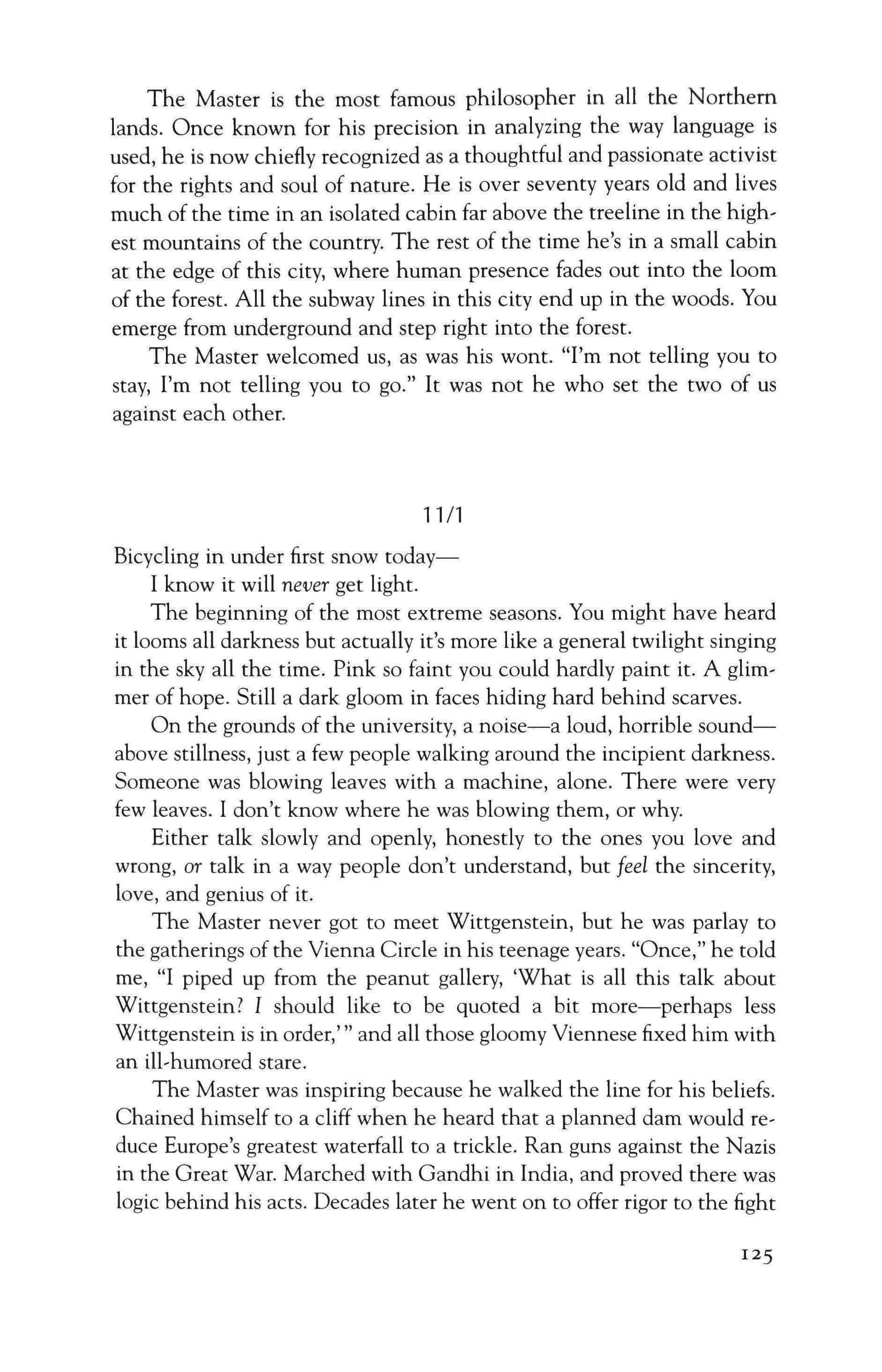
11/1
Bicycling in under first snow today
I know it will never get light.
The beginning of the most extreme seasons. You might have heard it looms all darkness but actually it's more like a general twilight singing in the sky all the time. Pink so faint you could hardly paint it. A glimmer of hope. Still a dark gloom in faces hiding hard behind scarves.
On the grounds of the university, a noise-a loud, horrible soundabove stillness, just a few people walking around the incipient darkness. Someone was blowing leaves with a machine, alone. There were very few leaves. I don't know where he was blowing them, or why.
Either talk slowly and openly, honestly to the ones you love and wrong, or talk in a way people don't understand, but feel the sincerity, love, and genius of it.
The Master never got to meet Wittgenstein, but he was parlay to the gatherings of the Vienna Circle in his teenage years. "Once," he told me, "I piped up from the peanut gallery, 'What is all this talk about Wittgenstein? I should like to be quoted a bit more-perhaps less Wittgenstein is in order,'" and all those gloomy Viennese fixed him with an ill-humored stare.
The Master was inspiring because he walked the line for his beliefs. Chained himself to a cliff when he heard that a planned dam would reduce Europe's greatest waterfall to a trickle. Ran guns against the Nazis in the Great War. Marched with Gandhi in India, and proved there was logic behind his acts. Decades later he went on to offer rigor to the fight
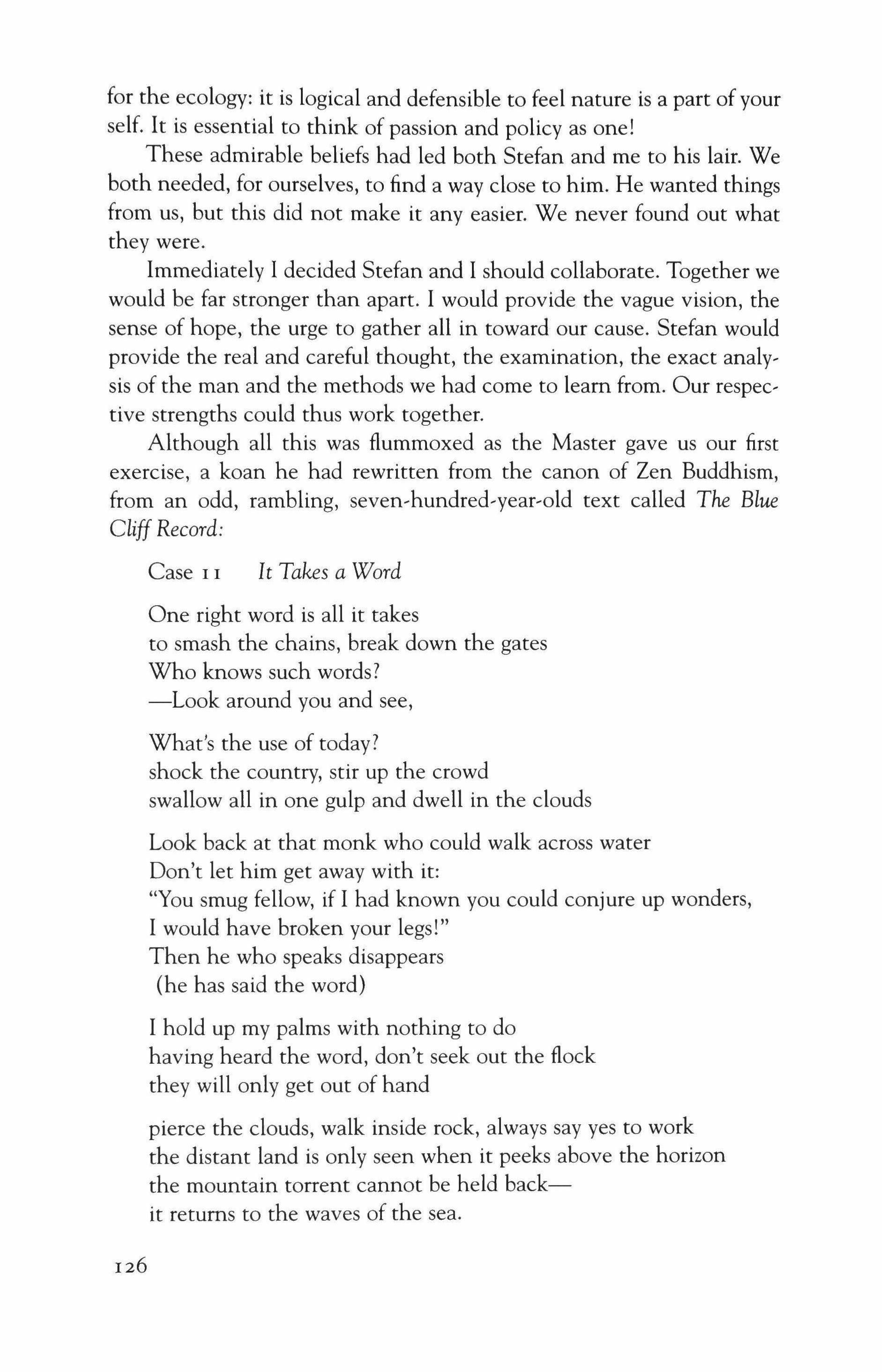
for the ecology: it is logical and defensible to feel nature is a part of your self. It is essential to think of passion and policy as one!
These admirable beliefs had led both Stefan and me to his lair. We both needed, for ourselves, to find a way close to him. He wanted things from us, but this did not make it any easier. We never found out what they were.
Immediately I decided Stefan and I should collaborate. Together we would be far stronger than apart. I would provide the vague vision, the sense of hope, the urge to gather all in toward our cause. Stefan would provide the real and careful thought, the examination, the exact analysis of the man and the methods we had come to learn from. Our respective strengths could thus work together.
Although all this was flummoxed as the Master gave us our first exercise, a koan he had rewritten from the canon of Zen Buddhism, from an odd, rambling, seven-hundred-year-old text called The Blue Cliff Record:
Case I I It Takes a Word
One right word is all it takes to smash the chains, break down the gates
Who knows such words?
-Look around you and see,
What's the use of today?
shock the country, stir up the crowd swallow all in one gulp and dwell in the clouds
Look back at that monk who could walk across water
Don't let him get away with it:
"You smug fellow, if I had known you could conjure up wonders, I would have broken your legs!"
Then he who speaks disappears (he has said the word)
I hold up my palms with nothing to do having heard the word, don't seek out the flock they will only get out of hand pierce the clouds, walk inside rock, always say yes to work the distant land is only seen when it peeks above the horizon the mountain torrent cannot be held backit returns to the waves of the sea.

The Master looked up from his desk, up from his neatly organized piles of fifty years of accumulated, yellowing papers, his desk in the top office, an out-of-the-way office, way up the back stair, and looked at his two young American friends, eager for elucidation, ofsomething. Remember this is no Zen master, but some kind of Euro-Master, a man of our side of the world, who has been through the tribulations of this century and is still around to face these two slack-jawed Yankee wanderers, so similar, so different, but both looking, looking for something.
"And you," he smiled at Stefan, then turned, and smiled at me, "what do you seek?"
I looked first at Stefan before blurting out, always ready to think out loud. "Well I'm here to find out what I can do to help. To help make a difference in this world. So much has gone wrong, there is such despair. All I have is an interest in thinking, thinking our way out of what's wrong. And some naive hope that a new way of looking at things can lead to a new way of living. That's what you need to have faith in philosophy, right?"
"Are you alone in your thinking?" answered the great man.
"No, I hope not. At least Stefan's here, too. He's on the same wavelength somehow."
"I don't know about that," he chimed in, shaking his wavy golden locks. "Does it really take just one right word? I doubt it. Words are fine, but what counts are deeds. We need to figure out what's wrong with our thinking, sure, but then we've got to do something about it. Talk is cheap. An ambiguous phrase may get to the heart of things but it probably makes little difference to the flow of real things."
We were just-out-of-college budding philosophers. This is how we talked! We hadn't got a clue ofwhat to do with ideas out there in a world where few people made any time for perplexing irresolute thoughts. Sure, words had woken us up, all of us, into arenas of beauty and hope. But we didn't yet know how gritty and gray the world was out there, and what a luxury it was to have this time to wonder and to dream. All these years later I still wonder what true opportunities we missed.
"So to 'shock the country, stir up the crowd,' is that what you two young believers hope to accomplish?" asserted the old guy. (He would never call himself a 'Master' of anything. He would never call himself anything, really, but preferred to go on quietly existing, thinking, letting his arguments, de-personalized, speak for him. I just call him the 'Master' here for your benefit, seeing as he used these skewered Zen stories to try to knock some sense into us.)

"If I want that," I replied, "then I would try to do it in this Zen way, making the surrealism direct, blending it in to obvious ordinary activity. "They say for us to 'walk inside rock' while at the same time exalting the ordinary flows of rivers down the slopes of gravity to the blue oceans. It's ordinary and extraordinary at the same time."
"What do you say to that, Stefan?" said our man.
"I don't know," he scowled and kicked the carpet determinedly. "I'd rather think about it a while." He glanced, bored, out the window to the encroaching forests. "Like those Zen cats say, meditate for thirty years and then come back to me. Why are we having this discussion? This is a koan, right? We can't even think about it. We have to inhabit it, meditate with it, live inside it as if it's a rock we're walking inside."
"Reminds me of when I was lecturing in communist China," smiled the Master, as ifhe expected this response. Then he is quick to sidetrack his way into a resonant memory. "At the philosophical institute, the younger students would talk and engage constantly, eagerly looking for more information-from me, from each other." He paused to sip from a cup of tea that looked as if it had been steeping alone on the desk for days. "But the postgraduate students, those who had been working for a decade or more, they would rarely utter a word. Just walk the corridors in deep, lonely contemplation, and just nod at me as they walked by. I had a feeling they were shrugging their shoulders inside, silently announcing the view, 'what really can be said?' by their quiet motions, or the lack of audible motion."
"Perhaps," I blurted, with hesitation, "they hadn't found that one right word that would make all the difference."
"You think there is such a word?"
"Maybe the koan is a call to the power of poetry, of single words to say much more than they mean."
"That sounds too quick to me," added Stefan. "I'm going to wait on this one."
Waiting, sure, good idea. But waiting requires time. "We cannot wait forever to act." I was ready for that one. "Who knows how much time we've got, if things are as urgent as they tell us."
"I think," confided Stefan, "I've got enough time to wait this one out a bit. Sure I trust reason more than gut emotion, but I want to feel my way through this quandary a bit."
"A wise move, my friend," concluded the Master. "And this is only the beginning."
Waving my hands in the air, waving my waters to the sea, I waited
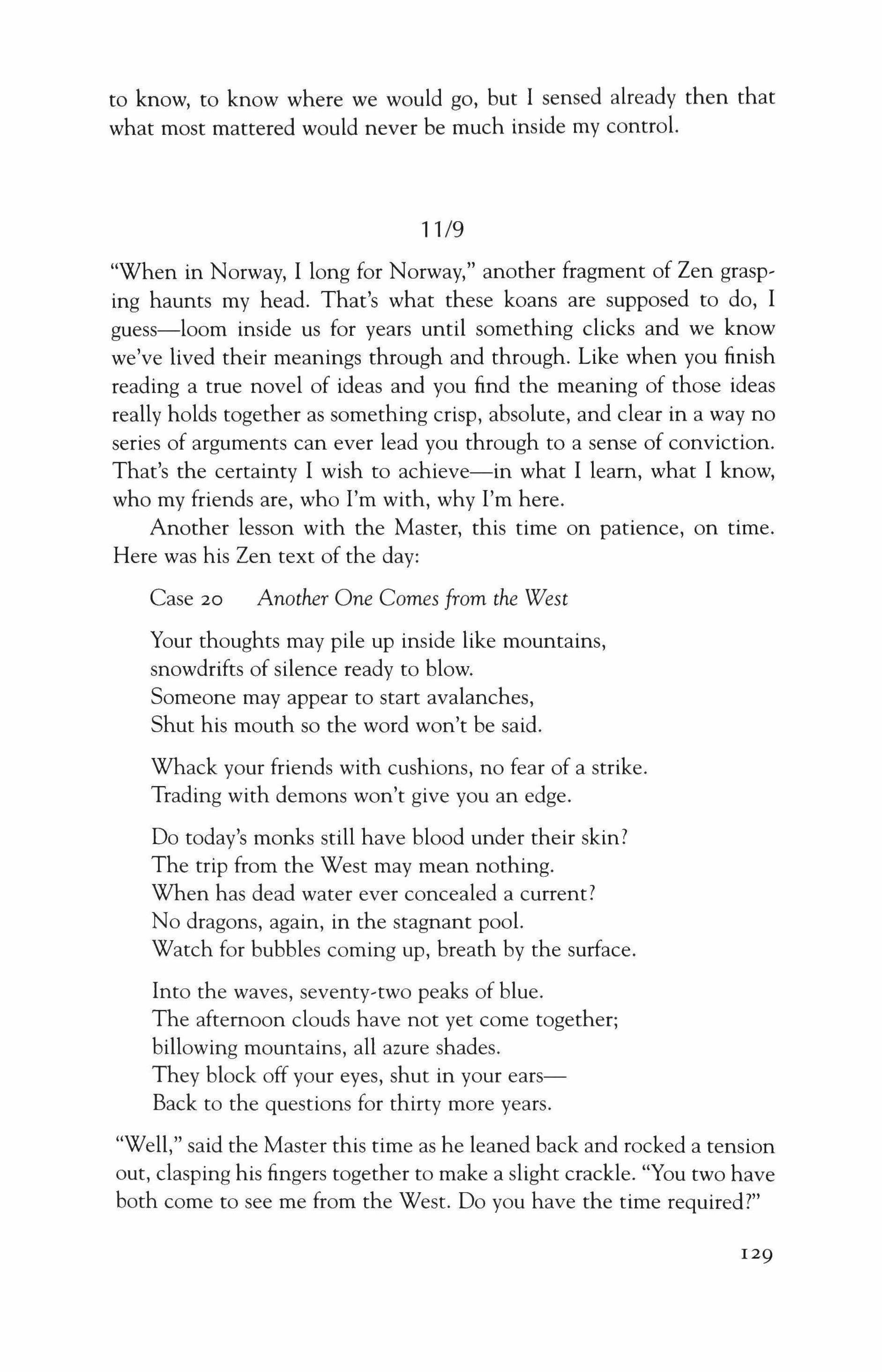
to know, to know where we would go, but I sensed already then that what most mattered would never be much inside my control. 11/9
"When in Norway, I long for Norway," another fragment of Zen grasp' ing haunts my head. That's what these koans are supposed to do, I guess-loom inside us for years until something clicks and we know we've lived their meanings through and through. Like when you finish reading a true novel of ideas and you find the meaning of those ideas really holds together as something crisp, absolute, and clear in a way no series of arguments can ever lead you through to a sense of conviction. That's the certainty I wish to achieve-in what I learn, what I know, who my friends are, who I'm with, why I'm here.
Another lesson with the Master, this time on patience, on time. Here was his Zen text of the day:
Case 20 Another One Comes from the West
Your thoughts may pile up inside like mountains, snowdrifts of silence ready to blow.
Someone may appear to start avalanches, Shut his mouth so the word won't be said.
Whack your friends with cushions, no fear of a strike.
Trading with demons won't give you an edge.
Do today's monks still have blood under their skin?
The trip from the West may mean nothing.
When has dead water ever concealed a current?
No dragons, again, in the stagnant pool.
Watch for bubbles coming up, breath by the surface.
Into the waves, seventy-two peaks of blue.
The afternoon clouds have not yet come together; billowing mountains, all azure shades.
They block off your eyes, shut in your ears
Back to the questions for thirty more years.
"Well," said the Master this time as he leaned back and rocked a tension out, clasping his fingers together to make a slight crackle. "You two have both come to see me from the West. Do you have the time required?"
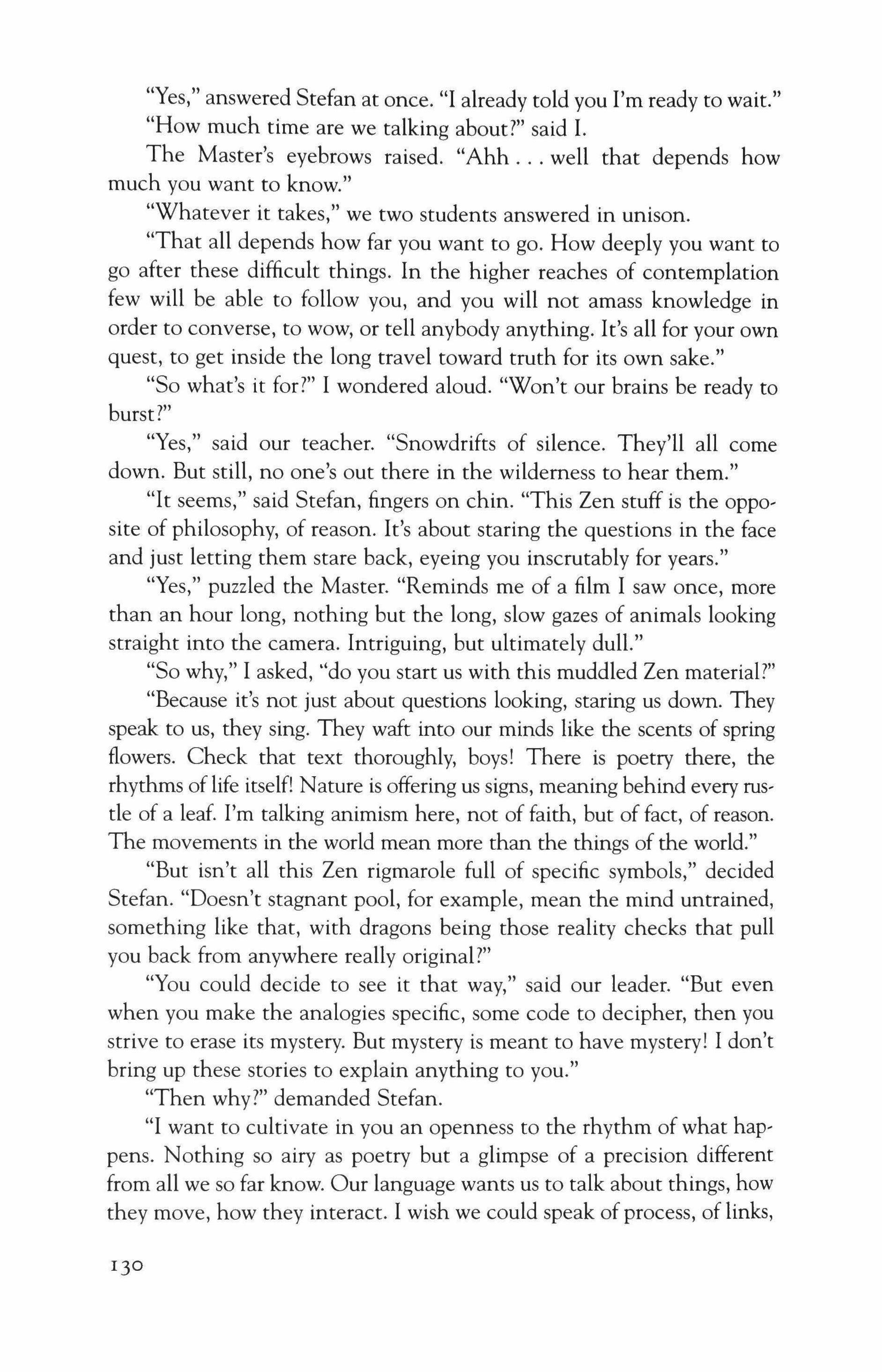
"Yes," answered Stefan at once. "I already told you I'm ready to wait."
"How much time are we talking about?" said I.
The Master's eyebrows raised. "Ahh well that depends how much you want to know."
"Whatever it takes," we two students answered in unison.
"That all depends how far you want to go. How deeply you want to go after these difficult things. In the higher reaches of contemplation few will be able to follow you, and you will not amass knowledge in order to converse, to wow, or tell anybody anything. It's all for your own quest, to get inside the long travel toward truth for its own sake."
"So what's it for?" I wondered aloud. "Won't our brains be ready to burst?"
"Yes," said our teacher. "Snowdrifts of silence. They'll all come down. But still, no one's out there in the wilderness to hear them."
"It seems," said Stefan, fingers on chin. "This Zen stuff is the opposite of philosophy, of reason. It's about staring the questions in the face and just letting them stare back, eyeing you inscrutably for years."
"Yes," puzzled the Master. "Reminds me of a film I saw once, more than an hour long, nothing but the long, slow gazes of animals looking straight into the camera. Intriguing, but ultimately dull."
"So why," I asked, "do you start us with this muddled Zen material?"
"Because it's not just about questions looking, staring us down. They speak to us, they sing. They waft into our minds like the scents of spring flowers. Check that text thoroughly, boys! There is poetry there, the rhythms of life itself! Nature is offering us signs, meaning behind every rustle of a leaf. I'm talking animism here, not of faith, but of fact, of reason. The movements in the world mean more than the things of the world."
"But isn't all this Zen rigmarole full of specific symbols," decided Stefan. "Doesn't stagnant pool, for example, mean the mind untrained, something like that, with dragons being those reality checks that pull you back from anywhere really original?"
"You could decide to see it that way," said our leader. "But even when you make the analogies specific, some code to decipher, then you strive to erase its mystery. But mystery is meant to have mystery! I don't bring up these stories to explain anything to you."
"Then why?" demanded Stefan.
"I want to cultivate in you an openness to the rhythm of what happens. Nothing so airy as poetry but a glimpse of a precision different from all we so far know. Our language wants us to talk about things, how they move, how they interact. I wish we could speak of process, of links,
of dances and encounters before we mention who or what is reaching whom. For individuals are not translatable, though encounters, similarities of feeling, they are the parts of experience we can share."
"How?" I didn't get it one bit.
"Spinoza tried to write a geometry of emotions. But he concentrated too much on the rigor of the system. Like Kierkegaard says, 'the system begins with the immediate. How does it begin? Immediately!' He was poking fun. There is nothing systematic about what matters most. Here we philosophers are caught between a rock and a soft place. We want to prove why everyone but us is wrong-headed. But we're stuck with their language, it's our language as well. We have to make connections no one else has yet made. We want to make them precisely but what we're after is often clearer in dreams."
Now he was definitely losing me. But I did remember my dreams. Sometimes I wrote them down. They seemed to matter. But why? Because they suggested another logic, another way of connecting things? True, I didn't feel part of a story, and life never seems to have a plot. Connections, accidental connections, moments of contact did arise with significance. I had the sense that we all had been reaching for them in the wrong way.
"You can certainly build a model of connectedness," decided the Master. "Take all those things and people that matter to you, that affect your trajectory, and draw them onto the page. Add lines that show how all the parts might be related. There's a map of your social and philosophical world."
"Ideas and people?" I wondered. "All marked down as the same?"
"Neither emerges crisper or clearer than the other," he answered. "Of both we only see facets, sides that tum toward us, while the rest turns away."
Stefan was getting restless. The text for the day seemed pessimistic and imprecise. "Are you saying, sir, that we'll need thirty years to get anywhere on our project?"
"Hmrnm," the Master sipped his tea out of a one-man thermos. "Perhaps more."
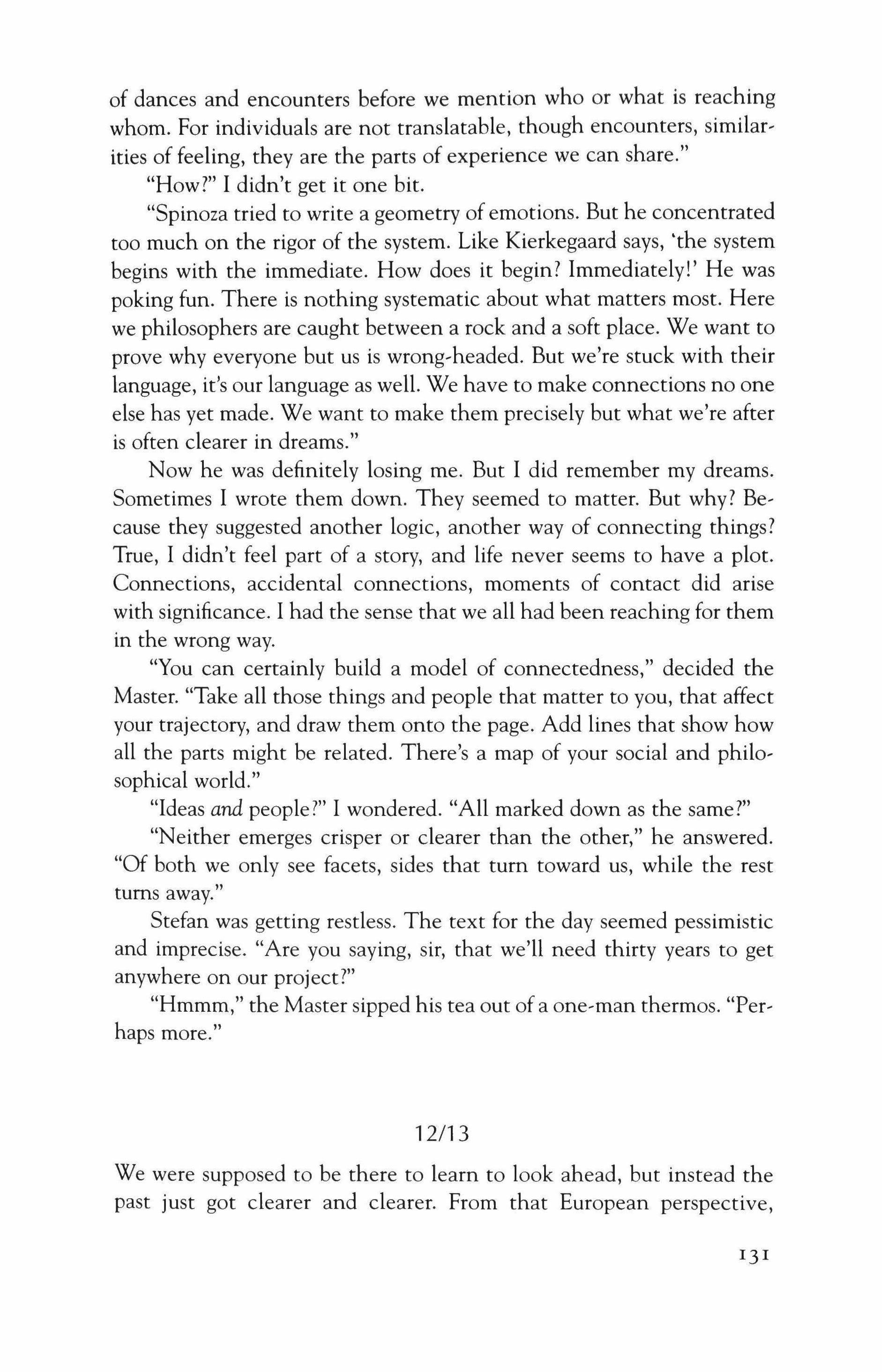
12/13
We were supposed to be there to learn to look ahead, but instead the past just got clearer and clearer. From that European perspective,
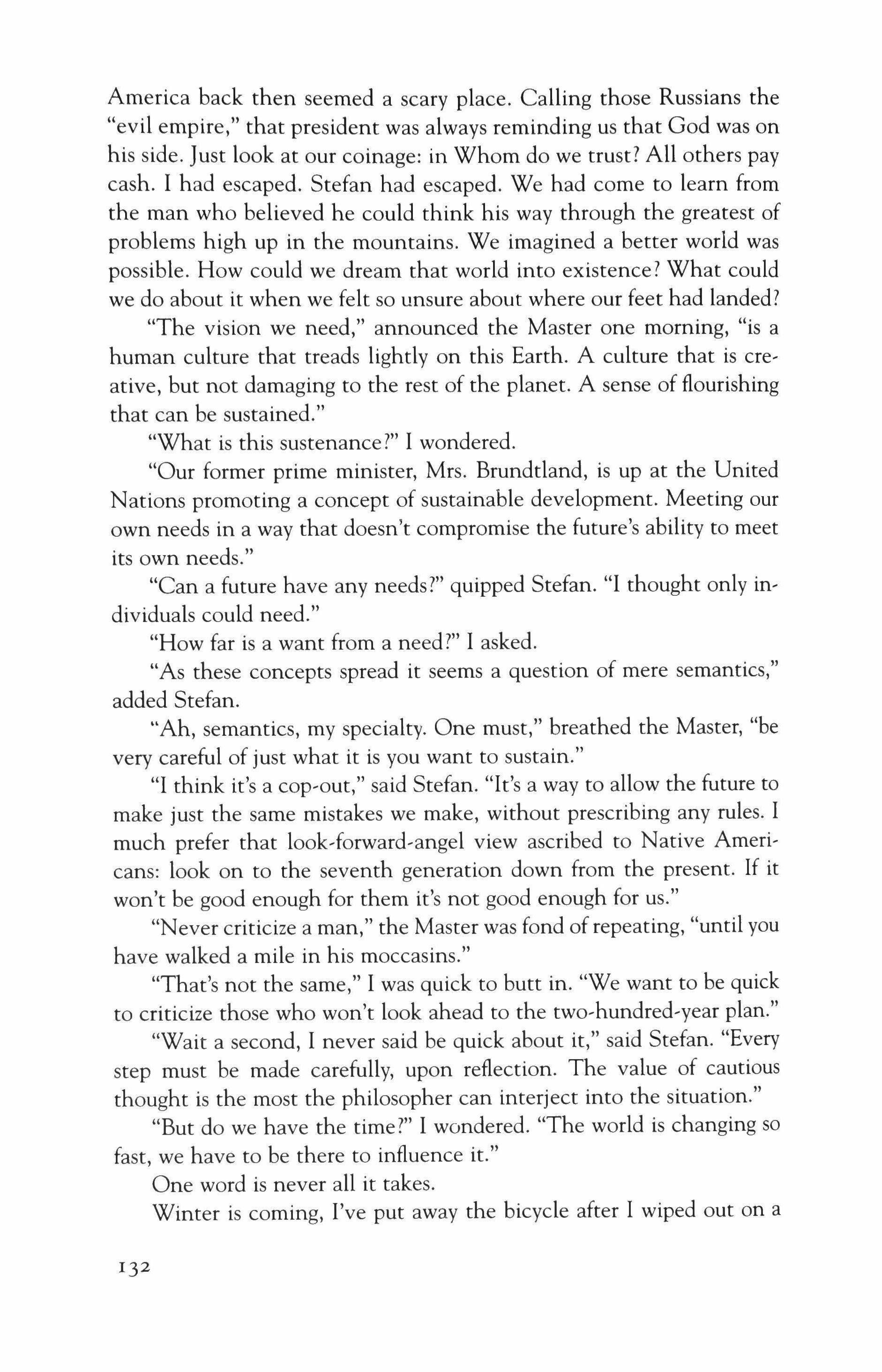
America back then seemed a scary place. Calling those Russians the "evil empire," that president was always reminding us that God was on his side. Just look at our coinage: in Whom do we trust? All others pay cash. I had escaped. Stefan had escaped. We had come to learn from the man who believed he could think his way through the greatest of problems high up in the mountains. We imagined a better world was possible. How could we dream that world into existence? What could we do about it when we felt so unsure about where our feet had landed?
"The vision we need," announced the Master one morning, "is a human culture that treads lightly on this Earth. A culture that is creative, but not damaging to the rest of the planet. A sense of flourishing that can be sustained."
"What is this sustenance?" I wondered.
"Our former prime minister, Mrs. Brundtland, is up at the United Nations promoting a concept of sustainable development. Meeting our own needs in a way that doesn't compromise the future's ability to meet its own needs."
"Can a future have any needs?" quipped Stefan. "I thought only individuals could need."
"How far is a want from a need?" I asked.
"As these concepts spread it seems a question of mere semantics," added Stefan.
"Ah, semantics, my specialty. One must," breathed the Master, "be very careful of just what it is you want to sustain."
"I think it's a cop-out," said Stefan. "It's a way to allow the future to make just the same mistakes we make, without prescribing any rules. I much prefer that look-forward-angel view ascribed to Native Americans: look on to the seventh generation down from the present. If it won't be good enough for them it's not good enough for us."
"Never criticize a man," the Master was fond ofrepeating, "until you have walked a mile in his moccasins."
"That's not the same," I was quick to butt in. "We want to be quick to criticize those who won't look ahead to the two-hundred-year plan."
"Wait a second, I never said be quick about it," said Stefan. "Every step must be made carefully, upon reflection. The value of cautious thought is the most the philosopher can interject into the situation."
"But do we have the time?" I wondered. "The world is changing so fast, we have to be there to influence it."
One word is never all it takes.
Winter is coming, I've put away the bicycle after I wiped out on a

busy street in front of a few oncoming cars. Now I walk through the cold gray streets trying to piece these contacts together. The cold snow stings my face. I collect it inside as my thoughts swirl into one. Another koan stays with me:
Case 13 Snow in a Silver Bowl
Clouds freeze in place over endless plains but the world can still be seen. Snow conceals the white petals, still the flowers are there.
Cold as ice, fine as rice powder these reasons are exact: pile up snow in a silver bowl an outburst of occlusion
What do you say?
I'm here in a mouthful of frost seeing my breath in the air
Rout out the wind that ripples the flag; The white heron walks in the bright night light.
"Glaring images," said the Master. "That's what this puzzle offers us."
"Oh," said Stefan. "I thought it's just trying to confound us. Mixes metaphors like crazy-'outburst of occlusion,' what the hell is that?"
"The supreme whiteness, that's what I hear in it," I said. "Frost, pow, dered rice, snow dusting on white petals." It was autumn leading into winter now but the words seem to long forward to spring. In my mind I could easily pile snow into a frosted bowl, leave it out overnight in the cold, so cold that the wind seemed to be freezing the flag, not rippling it. And where would the herons be on such a winter evening?
These frozen images contradict my warm memories. I remember in, stead ardent touches inside wood-heated rooms with candles on the sills. And then once a candle caught a curtain and the whole window alighted with sudden flames, while in the distance through the ice lay, ers the sky was silently screaming, too, in colors, with the auroras out in force. Who was in there with me-why don't I know?
"Winter doesn't end the world, you know," added the Master. "With our special darkness here it is also the best time for long, complicated thoughts that require insulation from the distractions of experience."
"Experience a distraction?" I was confused.
"You ought not over-inflate the importance of what has happened only to you," quipped Stefan.
"But it's all that I am sure I have."
"Get over it."
"Now, now, boys," the boss mediates. "I am not giving you this Zen material so that you would hunker down and study long enough so that the ice would freeze you in place, hunched over a desk reading until the moon goes down, no, none of that. I just want you to take the time that is needed, to pause and reflect, to digest what is going on in quiet and peace. We all need radiance to outlast the winter, of course we do."
I liked these simple words, their detachable lilt. They did get me thinking: If I can see my breath can my breath see me? How would my life change if I could succeed in dissolving the boundaries between myself and what I notice? Can I detach what I see right now from what I remember? Will the world ever appear innocently immediate and singing and resounding to me with overbearing power?
It's more important to inhabit the senses than to merely trust them. This is why I felt so alive in the heat of the cold. The world itself was knocking so incessantly with its roughness and intensity! Not like summer when the warm lovely air might put you to sleep. This was raw and direct, this was no cold you could easily stuff into a bowl. I'd sift my hands through it and then it would go. Disappear. Running, running, on alone into the night of some luminous past.
These discussions in the high room, with all the Master's papers pushing out from their ancient shelves, they never seemed to begin or to end. I collect them in the midst of my daydreams, where what I planned to do jibes against those things that merely happen to break up the day. That's why there is little order to the story, that's why fragmentary outbursts are my nature and I couldn't tell a straight tale to save my life. It just wouldn't be fair. Sorry to bore you thus with the wandering but that is how life really seems to be. I don't want to ask too much but I also want the story to reveal the random turns of actual life, where we need to be ready for each turning word as it appears.
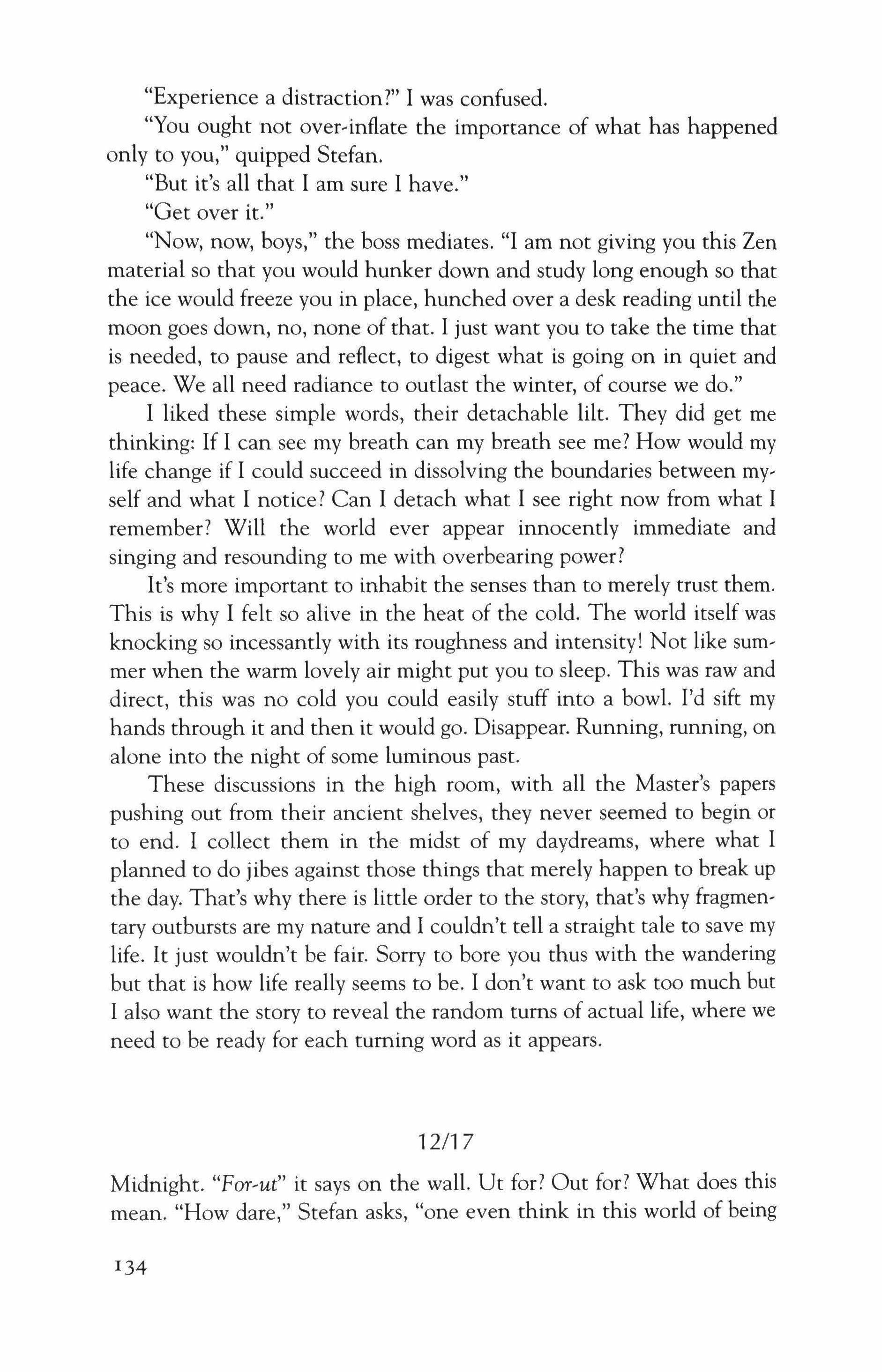
12/17
Midnight. "For-ur" it says on the wall. Ut for? Out for? What does this mean. "How dare," Stefan asks, "one even think in this world of being
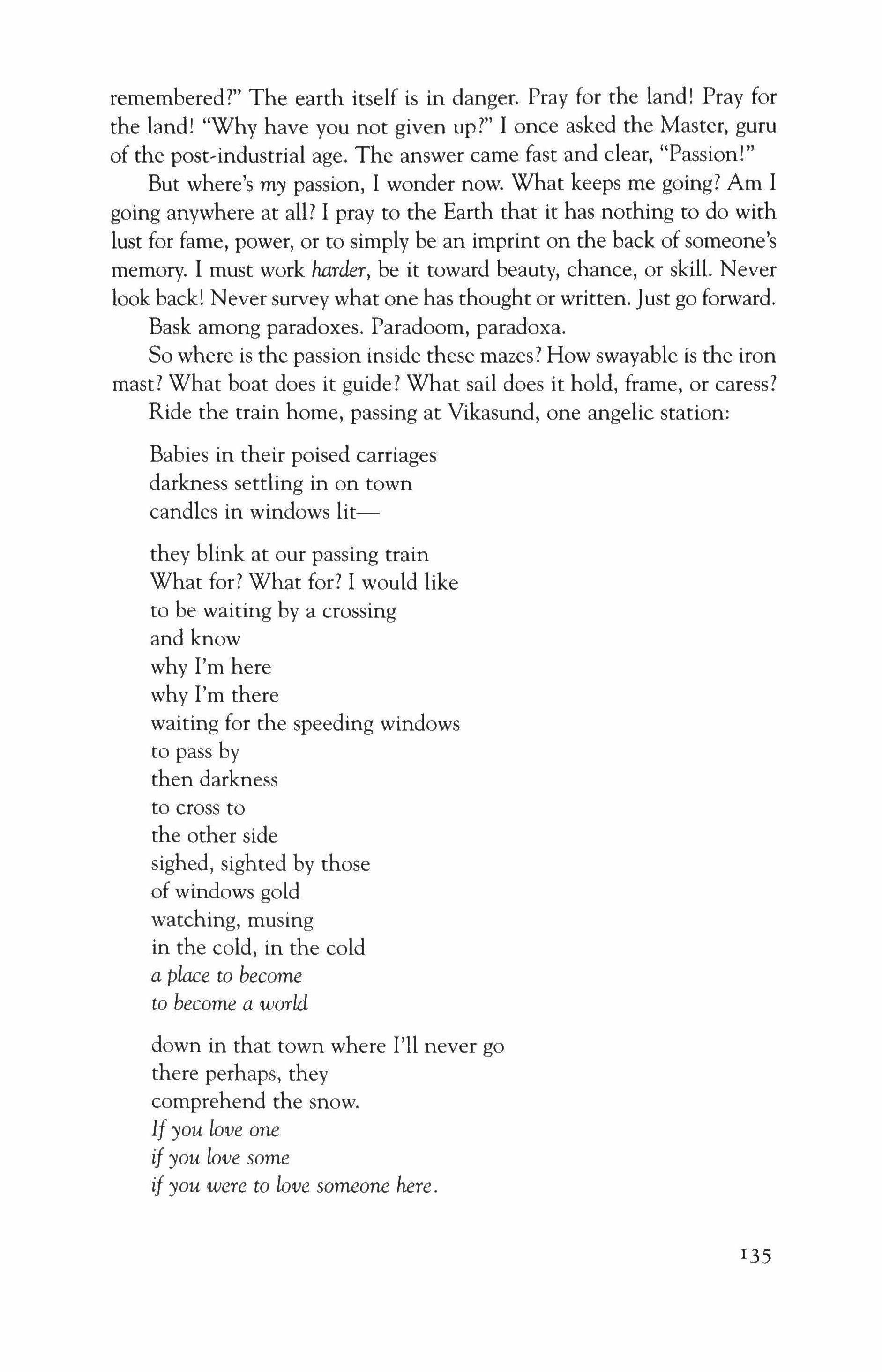
remembered?" The earth itself is in danger. Pray for the land! Pray for the land! "Why have you not given up?" I once asked the Master, guru of the post'industrial age. The answer came fast and clear, "Passion!" But where's my passion, I wonder now. What keeps me going? Am I going anywhere at all? I pray to the Earth that it has nothing to do with lust for fame, power, or to simply be an imprint on the back of someone's memory. I must work harder, be it toward beauty, chance, or skill. Never look back! Never survey what one has thought or written. Just go forward. Bask among paradoxes. Paradoom, paradoxa. So where is the passion inside these mazes? How swayable is the iron mast? What boat does it guide? What sail does it hold, frame, or caress? Ride the train home, passing at Vikasund, one angelic station:
Babies in their poised carriages darkness settling in on town candles in windows litthey blink at our passing train What for? What for? I would like to be waiting by a crossing and know why I'm here why I'm there waiting for the speeding windows to pass by then darkness to cross to the other side sighed, sighted by those of windows gold watching, musing in the cold, in the cold a place to become to become a world down in that town where I'll never go there perhaps, they comprehend the snow. If you love one if you love some if you were to love someone here.
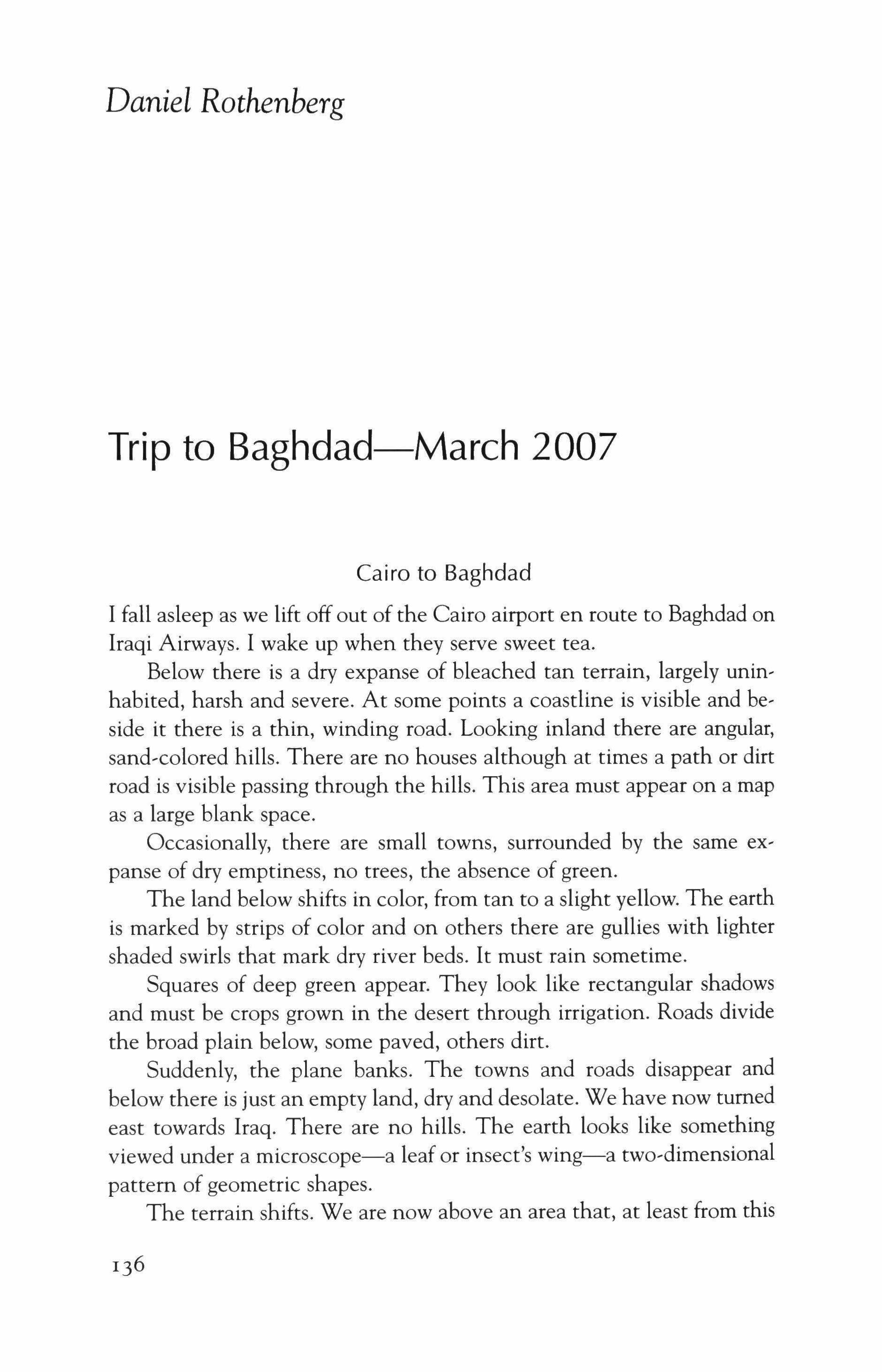
Cairo to Baghdad
I fall asleep as we lift off out of the Cairo airport en route to Baghdad on Iraqi Airways. I wake up when they serve sweet tea.
Below there is a dry expanse of bleached tan terrain, largely uninhabited, harsh and severe. At some points a coastline is visible and beside it there is a thin, winding road. Looking inland there are angular, sand-colored hills. There are no houses although at times a path or dirt road is visible passing through the hills. This area must appear on a map as a large blank space.
Occasionally, there are small towns, surrounded by the same expanse of dry emptiness, no trees, the absence of green.
The land below shifts in color, from tan to a slight yellow. The earth is marked by strips of color and on others there are gullies with lighter shaded swirls that mark dry river beds. It must rain sometime.
Squares of deep green appear. They look like rectangular shadows and must be crops grown in the desert through irrigation. Roads divide the broad plain below, some paved, others dirt.
Suddenly, the plane banks. The towns and roads disappear and below there is just an empty land, dry and desolate. We have now turned east towards Iraq. There are no hills. The earth looks like something viewed under a microscope-a leaf or insect's wing-a two-dimensional pattern of geometric shapes.
The terrain shifts. We are now above an area that, at least from this

height, looks as if it is covered in moss, which must be some type of dark green growth that covers the hills. There are sweeping washes of silt from past storms.
The green disappears and, again, the land appears as a harsh desert with no sign of people or water with the only shift in color found in ovals of lightly colored sand that mirror the rounded shapes of lakes.
A large body of water appears. It is Lake Milh, known as the "Sea of Salt," a shallow body of water filled with water that runs off the Euphrates river. There are no farms on the shores of the lake and no towns or cities. Instead, it is surrounded by the same numbing expanse of sand, colored land.
As we near Baghdad, one can see a line marking where the desert ends and the irrigated fields begin. The land appears-for the first time in the three-hour flight-as inhabited and a place where people could live. The winding river is intersected by canals and there are rows of neat, rectangles of fields of different dimensions and varying shades of green. Fields and small farms run right up to the city's sprawling residential neighborhoods, home to around six million Iraqis, or slightly less than a quarter of the country's population.
The plane curves gently towards the airport. The path is unlike the famous corkscrew descent that I remember from past travels when there were no commercial flights and the only planes operating this route were military or special charter services that work in war zones. Then, the plane would descend in tight circles to stay directly above the air' port and avoid missiles. The descent felt like being on a rollercoaster and it was constantly referenced by journalists and reconstruction work, ers as a prelude to a visit to a troubled, dangerous and chaotic land.
Now, we ease downwards. Outside of the window the military bases at the Baghdad International Airport appear, and just beyond their for, tified walls, one of Saddam Hussein's famous palaces, a huge, gaudy structure beside an artificial lake.
A woman beside me says, "There is no place like Baghdad. Here I feel as if! can really breathe. What do you expect? It is home, and every, one wants to return to their home."
Iraqi Airways is a new version of the previous state,owned airline. The planes are old. The in-flight meals are odd-chunks of chicken
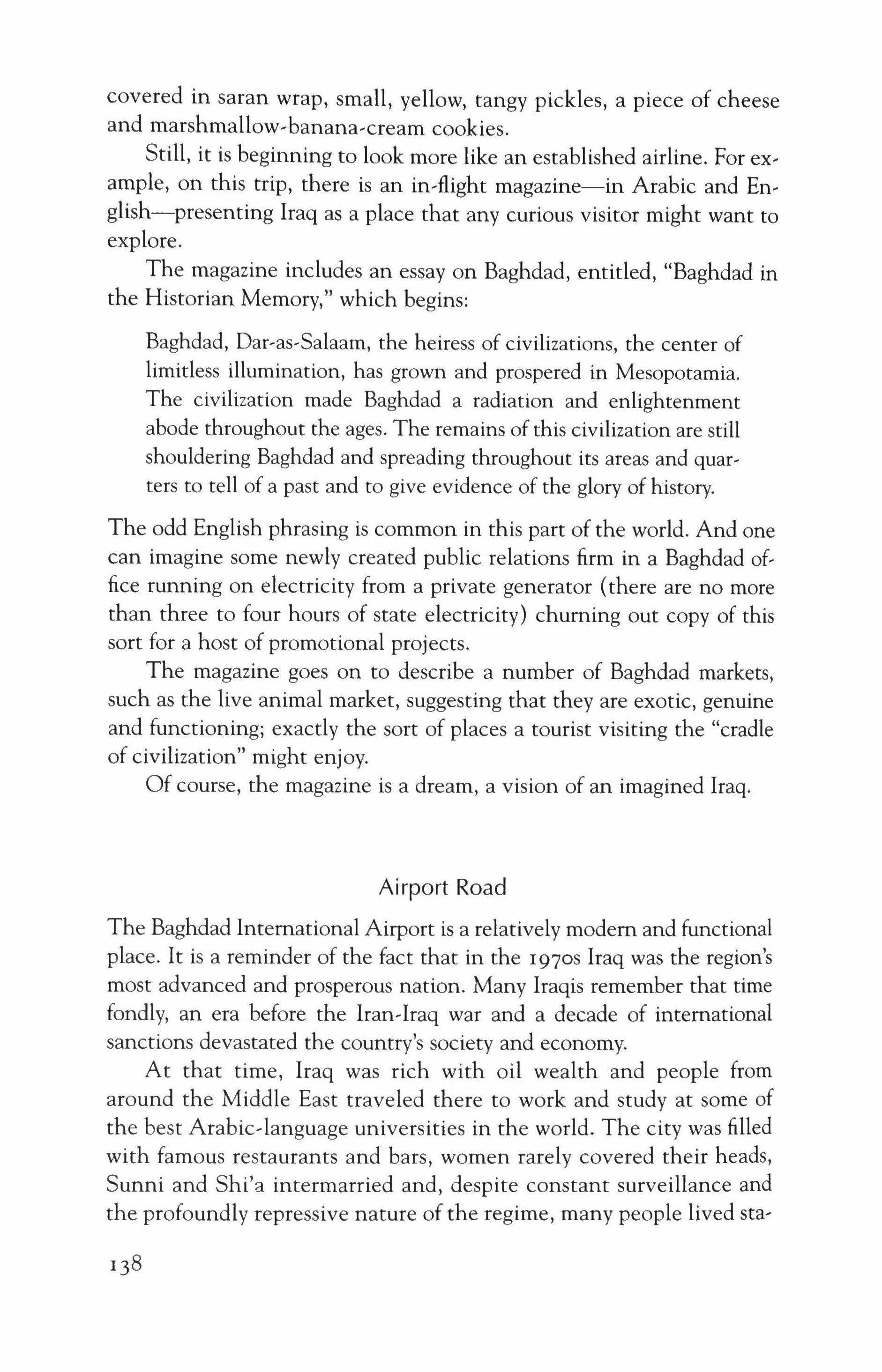
covered in saran wrap, small, yellow, tangy pickles, a piece of cheese and marshmallow-banana-cream cookies.
Still, it is beginning to look more like an established airline. For example, on this trip, there is an in-flight magazine-in Arabic and English-presenting Iraq as a place that any curious visitor might want to explore.
The magazine includes an essay on Baghdad, entitled, "Baghdad in the Historian Memory," which begins: Baghdad, Dar-as-Salaam, the heiress of civilizations, the center of limitless illumination, has grown and prospered in Mesopotamia.
The civilization made Baghdad a radiation and enlightenment abode throughout the ages. The remains of this civilization are still shouldering Baghdad and spreading throughout its areas and quarters to tell of a past and to give evidence of the glory of history.
The odd English phrasing is common in this part of the world. And one can imagine some newly created public relations firm in a Baghdad office running on electricity from a private generator (there are no more than three to four hours of state electricity) churning out copy of this sort for a host of promotional projects.
The magazine goes on to describe a number of Baghdad markets, such as the live animal market, suggesting that they are exotic, genuine and functioning; exactly the sort of places a tourist visiting the "cradle of civilization" might enjoy.
Of course, the magazine is a dream, a vision of an imagined Iraq.
The Baghdad International Airport is a relatively modem and functional place. It is a reminder of the fact that in the 1970S Iraq was the region's most advanced and prosperous nation. Many Iraqis remember that time fondly, an era before the Iran-Iraq war and a decade of international sanctions devastated the country's society and economy.
At that time, Iraq was rich with oil wealth and people from around the Middle East traveled there to work and study at some of the best Arabic-language universities in the world. The city was filled with famous restaurants and bars, women rarely covered their heads, Sunni and Shi'a intermarried and, despite constant surveillance and the profoundly repressive nature of the regime, many people lived sta-
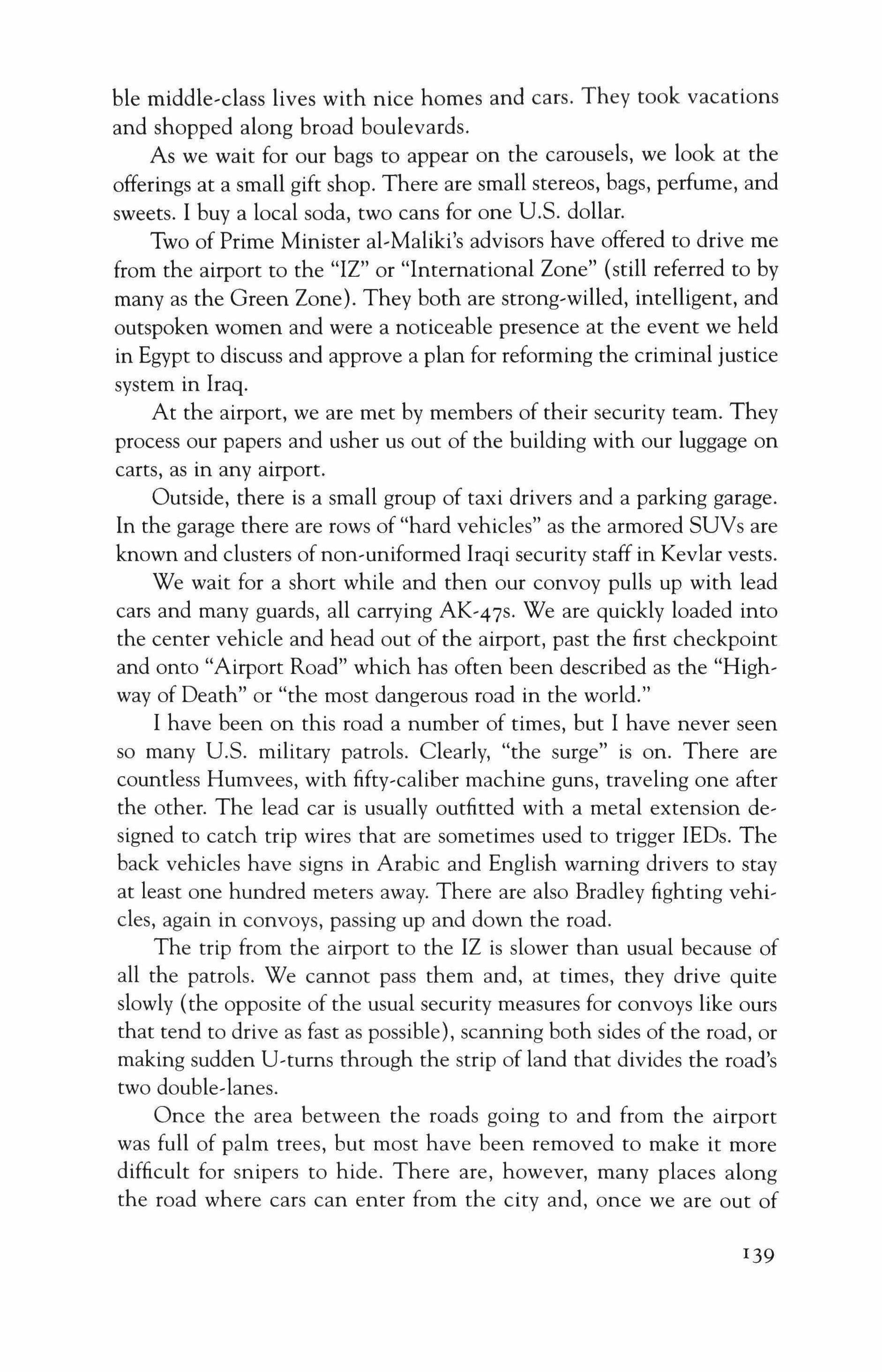
ble middle-class lives with nice homes and cars. They took vacations and shopped along broad boulevards.
As we wait for our bags to appear on the carousels, we look at the offerings at a small gift shop. There are small stereos, bags, perfume, and sweets. I buy a local soda, two cans for one U.S. dollar.
Two of Prime Minister al-Maliki's advisors have offered to drive me from the airport to the "IZ" or "International Zone" (still referred to by many as the Green Zone). They both are strong-willed, intelligent, and outspoken women and were a noticeable presence at the event we held in Egypt to discuss and approve a plan for reforming the criminal justice system in Iraq.
At the airport, we are met by members of their security team. They process our papers and usher us out of the building with our luggage on carts, as in any airport.
Outside, there is a small group of taxi drivers and a parking garage. In the garage there are rows of "hard vehicles" as the armored SUVs are known and clusters of non-uniformed Iraqi security staff in Kevlar vests.
We wait for a short while and then our convoy pulls up with lead cars and many guards, all carrying AK-47S. We are quickly loaded into the center vehicle and head out of the airport, past the first checkpoint and onto "Airport Road" which has often been described as the "Highway of Death" or "the most dangerous road in the world."
I have been on this road a number of times, but I have never seen so many U.S. military patrols. Clearly, "the surge" is on. There are countless Humvees, with fifty-caliber machine guns, traveling one after the other. The lead car is usually outfitted with a metal extension designed to catch trip wires that are sometimes used to trigger IEOs. The back vehicles have signs in Arabic and English warning drivers to stay at least one hundred meters away. There are also Bradley fighting vehicles, again in convoys, passing up and down the road.
The trip from the airport to the IZ is slower than usual because of all the patrols. We cannot pass them and, at times, they drive quite slowly (the opposite of the usual security measures for convoys like ours that tend to drive as fast as possible), scanning both sides of the road, or making sudden U-turns through the strip of land that divides the road's two double-lanes.
Once the area between the roads going to and from the airport was full of palm trees, but most have been removed to make it more difficult for snipers to hide. There are, however, many places along the road where cars can enter from the city and, once we are out of

the airport, the houses of Baghdad neighborhoods are visible on both sides of the road.
Airport Road ends at the entrance to the IZ, where there are huge concrete walls topped by barbed wire on both sides several hundred yards before the first of two major checkpoints. Cell phones must be turned off (they can be used to detonate bombs) and drivers are required to remove the clips from their pistols and display these, often on the dashboard. Each car approaches slowly and then stops, obeying the signals of the armed soldier ahead.
There is a manned tank facing out its barrel pointing directly at oncoming traffic.
We present our badges and are waved on towards to the next set of guards.
The convoy drives on slowly. Again, we stop. The soldiers review our IDs and, since we have the right type ofdocuments, we pass through easily.
We enter the IZ, cruising past a Saddam-era palace that is now a U.S. military base known as "Camp Prosperity" where huge cast-iron heads of Saddam in ancient military dress sit beside rows of tanks and armored vehicles. We cross over a bridge and to the left one can see the parade grounds known as "Crossed Swords" where two enormous sabers sit at the end of an open space held by hands modeled after Saddam's and surrounded by a hundreds of helmets said to be taken from Iranian soldiers killed in the Iraq/Iran war that produced an estimated one million casualties.
In the car, my hosts arrange my hotel room by cell phone and I find myself, on my first night back in Baghdad, the guest of Prime Minister al-Maliki.
Each day, Reuters publishes a review of "security developments in Iraq." On the day I arrived in Baghdad the report included the following:
NEAR MOSUL-Gunmen shot dead the director-general of water projects in Iraq's Mosul, Abdullah Mohammad, just outside the northern city, 390 km (240 miles) north of Baghdad, police said.
RAMADI-A suicide bomber rammed his vehicle into an Iraqi police checkpoint in the western city ofRamadi, wounding I I people, including four policemen, police said.
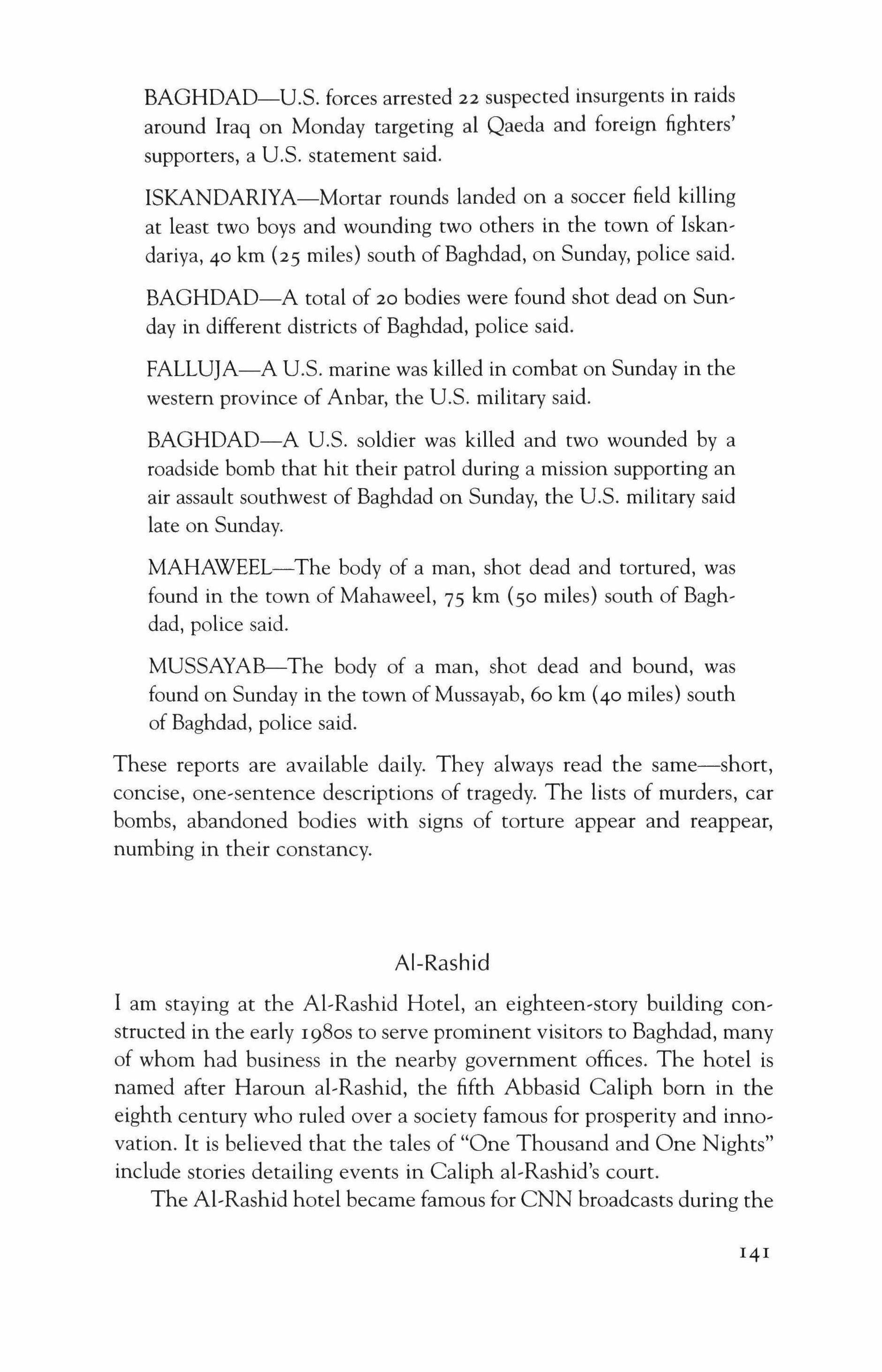
BAGHDAD-U.S. forces arrested 22 suspected insurgents in raids around Iraq on Monday targeting al Qaeda and foreign fighters' supporters, a U.S. statement said.
ISKANDARIYA-Mortar rounds landed on a soccer field killing at least two boys and wounding two others in the town of Iskandariya, 40 km (25 miles) south of Baghdad, on Sunday, police said.
BAGHDAD-A total of 20 bodies were found shot dead on Sunday in different districts of Baghdad, police said.
FALLUJA-A U.S. marine was killed in combat on Sunday in the western province of Anbar, the U.S. military said.
BAGHDAD-A U.S. soldier was killed and two wounded by a roadside bomb that hit their patrol during a mission supporting an air assault southwest of Baghdad on Sunday, the U.S. military said late on Sunday.
MAHAWEEL-The body of a man, shot dead and tortured, was found in the town of Mahaweel, 75 km (50 miles) south of Baghdad, police said.
MUSSAYAB-The body of a man, shot dead and bound, was found on Sunday in the town of Mussayab, 60 km (40 miles) south of Baghdad, police said.
These reports are available daily. They always read the same-short, concise, one-sentence descriptions of tragedy. The lists of murders, car bombs, abandoned bodies with signs of torture appear and reappear, numbing in their constancy.
I am staying at the Al-Rashid Hotel, an eighteen-story building constructed in the early 1980s to serve prominent visitors to Baghdad, many of whom had business in the nearby government offices. The hotel is named after Haroun al-Rashid, the fifth Abbasid Caliph born in the eighth century who ruled over a society famous for prosperity and innovation. It is believed that the tales of "One Thousand and One Nights" include stories detailing events in Caliph al-Rashid's court. The AI-Rashid hotel became famous for CNN broadcasts during the

1991 Gulf War. Following Iraq's defeat, the Hussein regime installed a tile mosaic of former President Bush's face, so that guests would walk over the image as they entered and exited the hotel.
After the U.Sc-led invasion in 2003, the hotel was taken over by the U.S. (and the mosaic removed) and filled with people managing the reconstruction-bureaucrats, diplomats, contractors, soldiers, etc. In 2003, a rocket struck the hotel when Paul Wolfowitz was there. Since then, guests tend to stay on the lower floors. I am on the third floor.
The Al-Rashid is in serious decline. The halls are dark and the carpets are scuffed, stained and torn. The furniture looks like something one might find in a cheap motel in some small desert town in the American Southwest. There are orange-hued mirrors in the elevators, which work slowly and each floor has a guard station, which must have once been used to track guests' movements. The wood stations are now etched with graffiti in various languages, including dirty words in Spanish, probably from the scores of Peruvian guards who provide the hotel with security for Triple Canopy, one of a number of U.S. private security companies.
From the windows in my room, I can look out towards Haifa Street, a neighborhood of former Saddam supporters and a famous site of antiU.S. violence. I can see workers and guards passing in and out of the building and, from a different angle, the half-constructed dome of what was supposed to be the world's largest mosque, built by Hussein as part of an effort to prove his devotion to Islam.
All day and night helicopters pass outside, the whir of their rotors a constant reminder of the conflict.
In the era of Saddam Hussein, Iraq required foreigners to have a visa not only to enter, but also to leave the country. It was a system that created an extra mechanism of legal control, as well a way to obtain bribes and generally increase the bureaucracy of travel. A special exit visa is still technically required, although many foreigners are unaware of this regulation, which may not always be enforced at present. I only know about the issue because one time I tried to fly out of the Baghdad airport I was asked for my exit visa in what became a complicated day-long bureaucratic struggle.
The real problem is that, at the time, I didn't have a Common Ac-
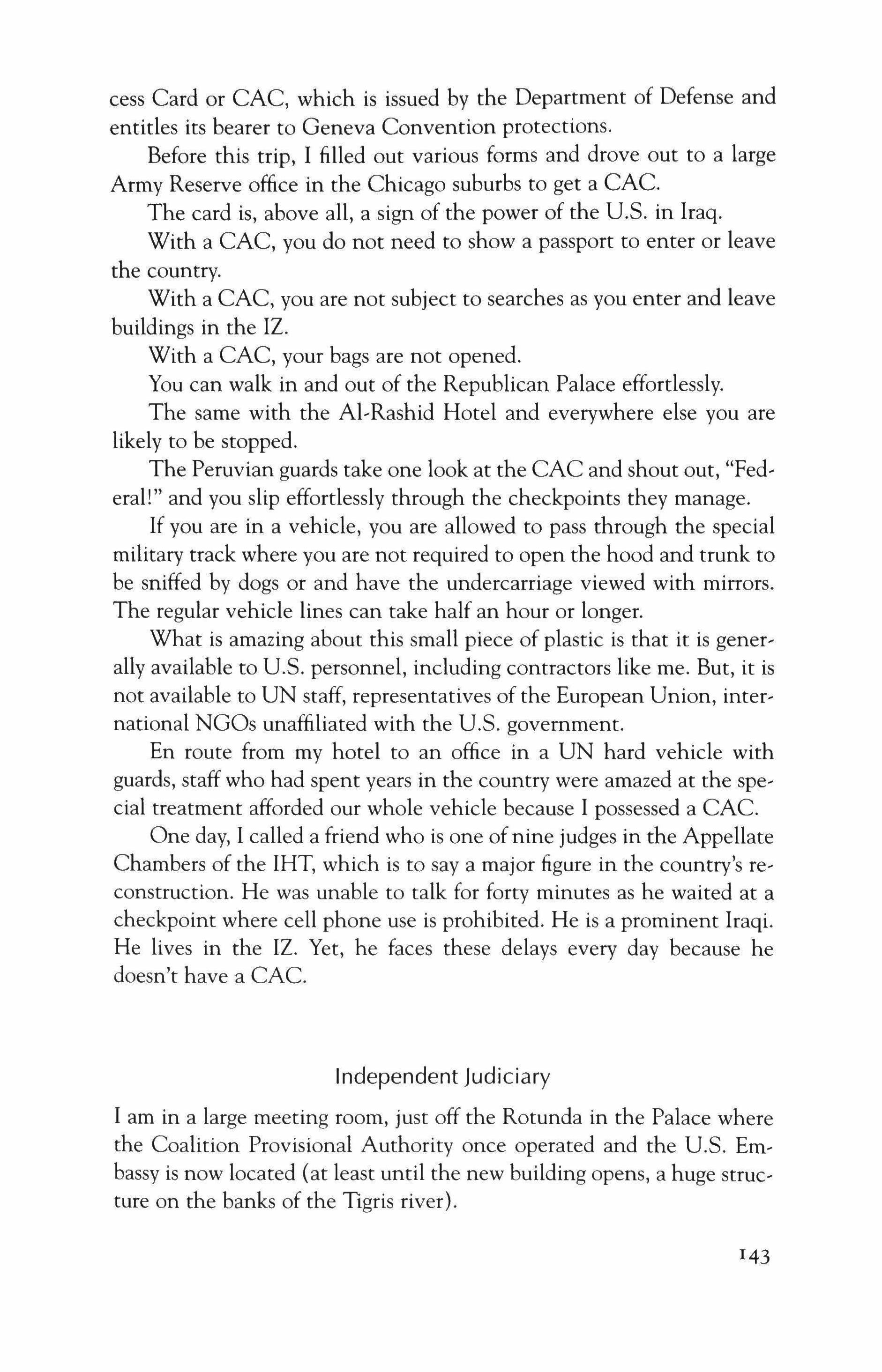
cess Card or CAC, which is issued by the Department of Defense and entitles its bearer to Geneva Convention protections.
Before this trip, I filled out various forms and drove out to a large Army Reserve office in the Chicago suburbs to get a CAe.
The card is, above all, a sign of the power of the u.s. in Iraq.
With a CAC, you do not need to show a passport to enter or leave the country.
With a CAC, you are not subject to searches as you enter and leave buildings in the IZ.
With a CAC, your bags are not opened.
You can walk in and out of the Republican Palace effortlessly.
The same with the Al-Rashid Hotel and everywhere else you are likely to be stopped.
The Peruvian guards take one look at the CAC and shout out, "Federal!" and you slip effortlessly through the checkpoints they manage.
If you are in a vehicle, you are allowed to pass through the special military track where you are not required to open the hood and trunk to be sniffed by dogs or and have the undercarriage viewed with mirrors. The regular vehicle lines can take half an hour or longer.
What is amazing about this small piece of plastic is that it is generally available to U.S. personnel, including contractors like me. But, it is not available to UN staff, representatives of the European Union, international NGOs unaffiliated with the u.s. government.
En route from my hotel to an office in a UN hard vehicle with guards, staff who had spent years in the country were amazed at the special treatment afforded our whole vehicle because I possessed a CAC.
One day, I called a friend who is one of nine judges in the Appellate Chambers of the IHT, which is to say a major figure in the country's reconstruction. He was unable to talk for forty minutes as he waited at a checkpoint where cell phone use is prohibited. He is a prominent Iraqi. He lives in the IZ. Yet, he faces these delays every day because he doesn't have a CAe.
I am in a large meeting room, just off the Rotunda in the Palace where the Coalition Provisional Authority once operated and the U.S. Embassy is now located (at least until the new building opens, a huge structure on the banks of the Tigris river).
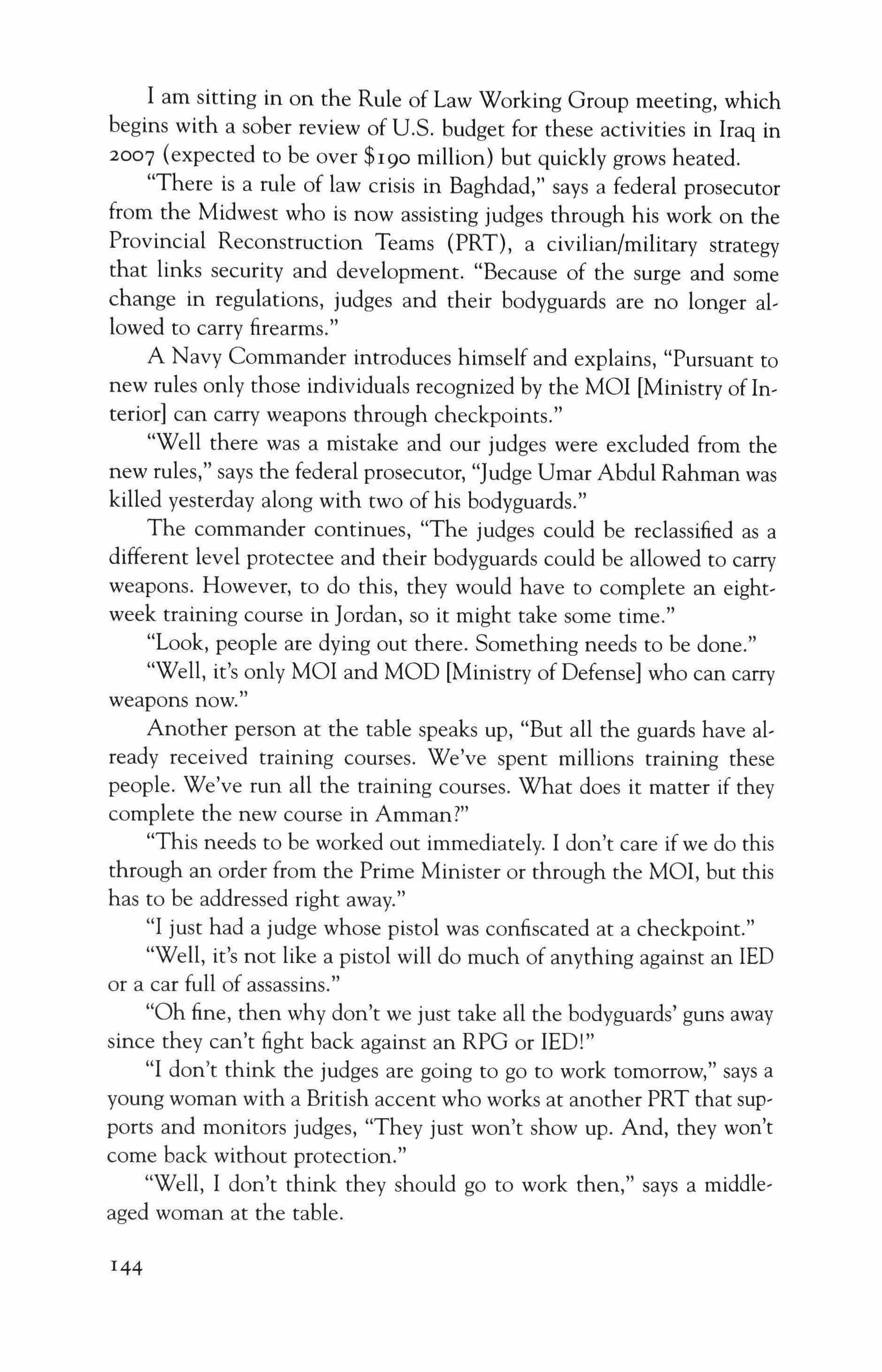
I am sitting in on the Rule of Law Working Group meeting, which begins with a sober review of U.S. budget for these activities in Iraq in 2007 (expected to be over $190 million) but quickly grows heated.
"There is a rule of law crisis in Baghdad," says a federal prosecutor from the Midwest who is now assisting judges through his work on the Provincial Reconstruction Teams (PRT), a civilian/military strategy that links security and development. "Because of the surge and some change in regulations, judges and their bodyguards are no longer allowed to carry firearms."
A Navy Commander introduces himself and explains, "Pursuant to new rules only those individuals recognized by the MOl [Ministry of Interior] can carry weapons through checkpoints."
"Well there was a mistake and our judges were excluded from the new rules," says the federal prosecutor, "Judge Umar Abdul Rahman was killed yesterday along with two of his bodyguards."
The commander continues, "The judges could be reclassified as a different level protectee and their bodyguards could be allowed to carry weapons. However, to do this, they would have to complete an eightweek training course in Jordan, so it might take some time."
"Look, people are dying out there. Something needs to be done."
"Well, it's only MOl and MOD [Ministry of Defense] who can carry weapons now."
Another person at the table speaks up, "But all the guards have already received training courses. We've spent millions training these people. We've run all the training courses. What does it matter if they complete the new course in Amman?"
"This needs to be worked out immediately. I don't care if we do this through an order from the Prime Minister or through the MOl, but this has to be addressed right away."
"I just had a judge whose pistol was confiscated at a checkpoint."
"Well, it's not like a pistol will do much of anything against an lED or a car full of assassins."
"Oh fine, then why don't we just take all the bodyguards' guns away since they can't fight back against an RPG or lED!"
"I don't think the judges are going to go to work tomorrow," says a young woman with a British accent who works at another PRT that supports and monitors judges, "They just won't show up. And, they won't come back without protection."
"Well, I don't think they should go to work then," says a middleaged woman at the table.
"What?" interrupts the PRT advisor, "That's ridiculous."
"Can I finish?
"We go out every day and see judges and lawyers risking their lives to keep the system running. We're telling them that the courts are important and necessary for democracy.
"If they don't want to go to work, they can close the courthouse. They're supposed to have an independent judiciary. So, let them be independent.
"It's good you have Iraqi friends who are eager to help you, even if they're weak-spirited and corrupt."
"How are you?"
"How are we? Every day there are bombs."
"If the Americans leave there will be civil war tomorrow. I am one hundred percent sure."
"I counted thirteen mortars falling when I stepped outside for a cigarette."
"No one here seems to say anything good about the Iraqis in power. All I hear are complaints about their incompetence and how difficult it is to get anything done. People here seem tired as if the Iraqis have failed them and stood in the way of all sorts of great plans."
"And all the Iraqis I know feel that the internationals have failed them."
"For me to get to the airport, it costs my newspaper $3,000, each way."
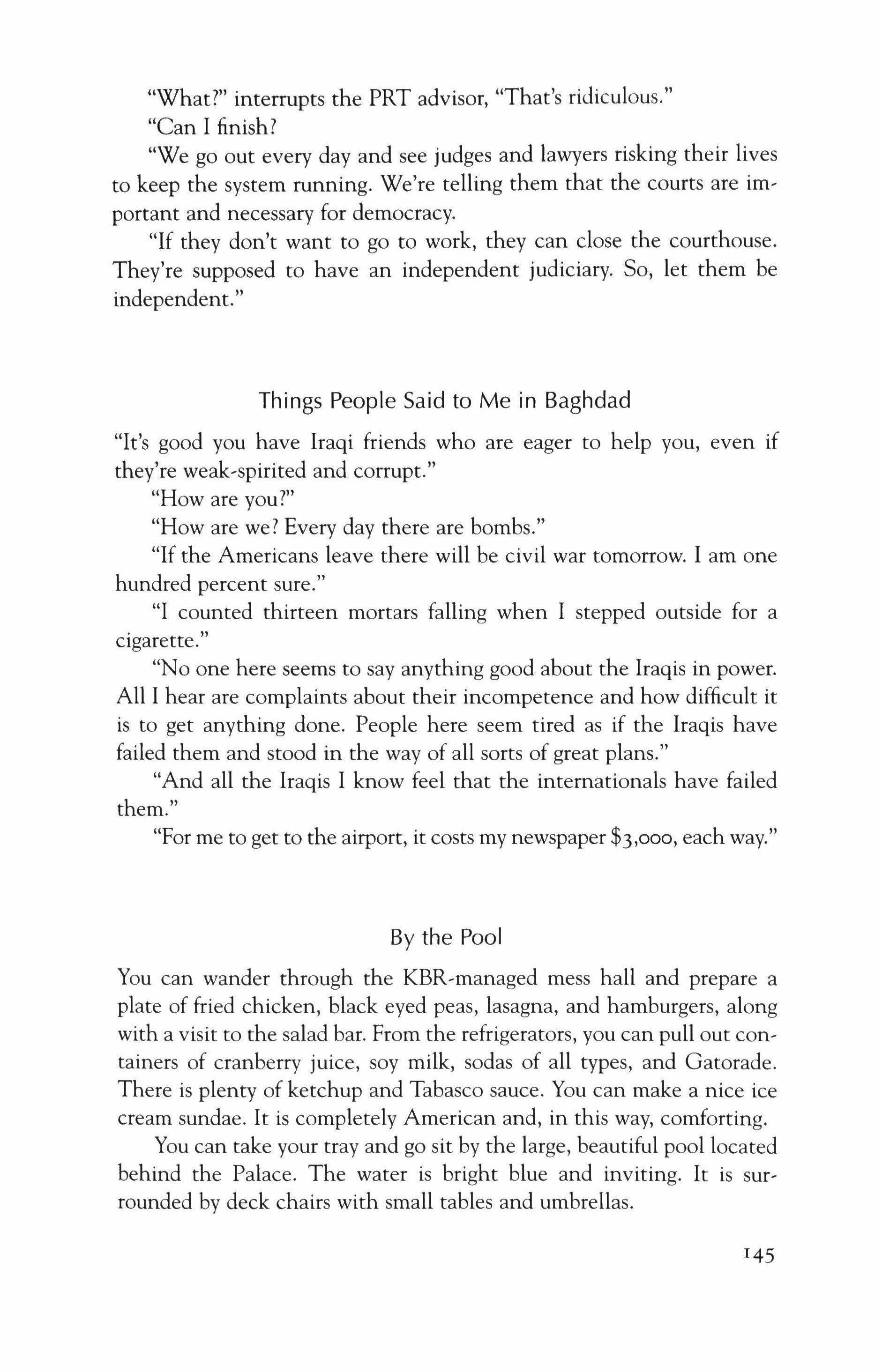 By the Pool
By the Pool
You can wander through the KBR-managed mess hall and prepare a plate of fried chicken, black eyed peas, lasagna, and hamburgers, along with a visit to the salad bar. From the refrigerators, you can pull out containers of cranberry juice, soy milk, sodas of all types, and Gatorade. There is plenty of ketchup and Tabasco sauce. You can make a nice ice cream sundae. It is completely American and, in this way, comforting.
You can take your tray and go sit by the large, beautiful pool located behind the Palace. The water is bright blue and inviting. It is surrounded by deck chairs with small tables and umbrellas. I45
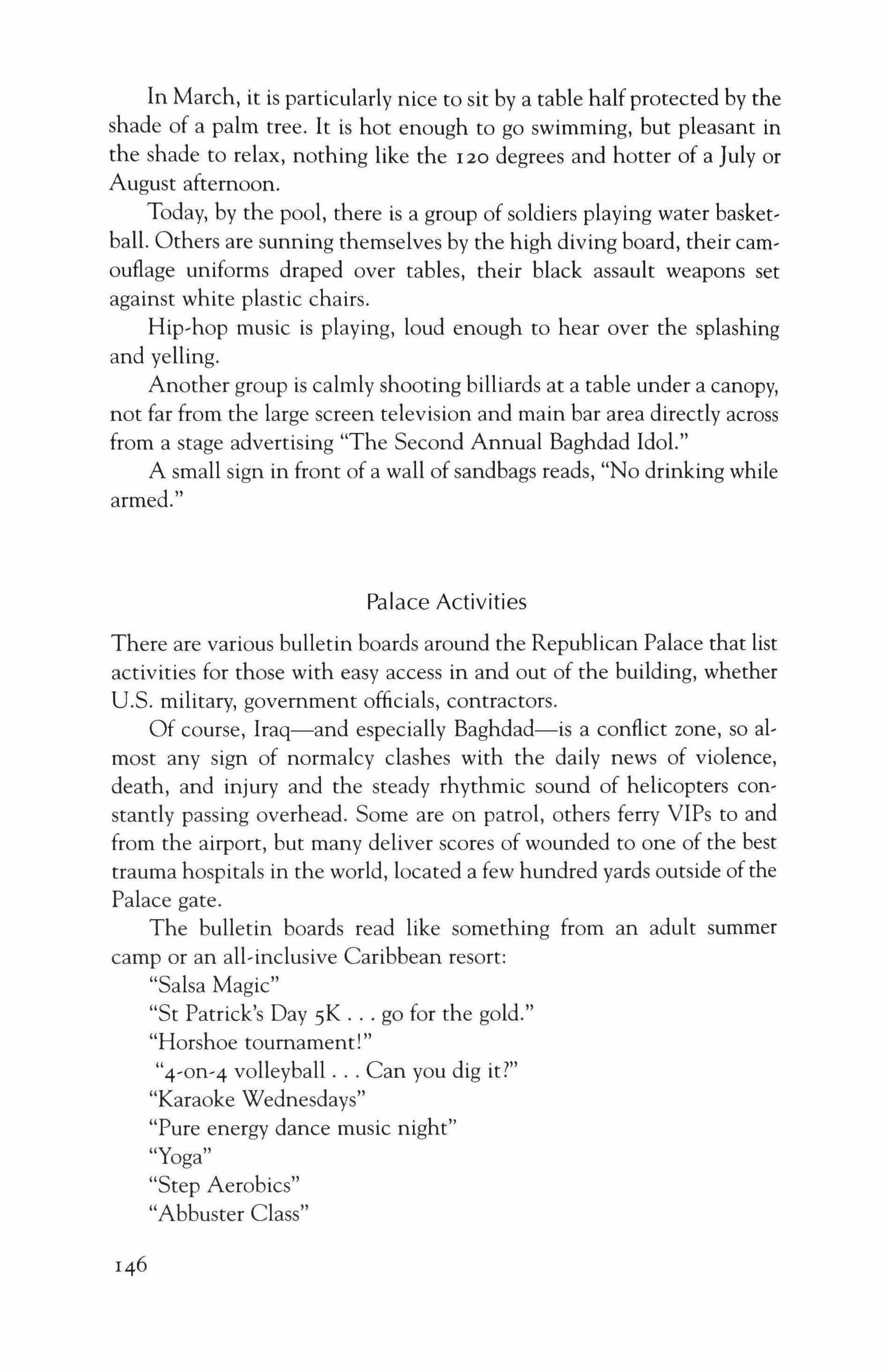
In March, it is particularly nice to sit by a table half protected by the shade of a palm tree. It is hot enough to go swimming, but pleasant in the shade to relax, nothing like the 120 degrees and hotter of a July or August afternoon.
Today, by the pool, there is a group of soldiers playing water basketball. Others are sunning themselves by the high diving board, their camouflage uniforms draped over tables, their black assault weapons set against white plastic chairs.
Hip-hop music is playing, loud enough to hear over the splashing and yelling.
Another group is calmly shooting billiards at a table under a canopy, not far from the large screen television and main bar area directly across from a stage advertising "The Second Annual Baghdad Idol."
A small sign in front of a wall of sandbags reads, "No drinking while armed."
There are various bulletin boards around the Republican Palace that list activities for those with easy access in and out of the building, whether U.S. military, government officials, contractors.
Of course, Iraq-and especially Baghdad-is a conflict zone, so almost any sign of normalcy clashes with the daily news of violence, death, and injury and the steady rhythmic sound of helicopters constantly passing overhead. Some are on patrol, others ferry VIPs to and from the airport, but many deliver scores of wounded to one of the best trauma hospitals in the world, located a few hundred yards outside of the Palace gate.
The bulletin boards read like something from an adult summer camp or an all-inclusive Caribbean resort:
"Salsa Magic"
"St Patrick's Day SK go for the gold."
"Horshoe tournament!"
"z-on-a volleyball Can you dig it?"
"Karaoke Wednesdays"
"Pure energy dance music night"
"Yoga"
"Step Aerobics"
"Abbuster Class"

Perhaps, the strangest sign for an activity for those stationed in Iraq looking for entertainment and relaxation in Saddam Hussein's former Palace, "Middle Eastern Night."
The war in Iraq continues to cost the U.S. an enormous amount of money, with the standard figure presented as ten billion dollars per month. A book has been published that estimates the conflict will end up costing one trillion dollars, a number so large it overwhelms our or, dinary sense of meaning.
While the conflict is not simply about money, the issue of what things cost, and what money buys, is everywhere present during any trip made by a Westerner to Iraq. Wherever you tum, in any part of Iraq where the international presence is clear, one feels the massive nature of the expense of placing hundreds of thousands of foreigners in the country, providing them with security, housing, food, and medical care. Then, one adds to this the enormous costs of designing and managing programs and administering what has become one of the most extraordinary attempts in history to build, or perhaps rebuild, a nation.
It is hard to process intellectually or emotionally what has happened in this country during the five and a half years since Operation Iraqi Freedom brought down one of the most cruel and authoritarian regimes in the world. It is almost comical, and surely tragic, to seriously reflect on the pronouncements and promises of many of the most powerful players who guided the early stages of the occupation. They assured the world that the nation would be rebuilt in a grand, totalizing fashion, with new infrastructure and a complete reform of virtually every sector of society-a new constitution, a new political system based on elections, vastly transformed health programming, massive educational reform and, of course, the complete reenvisioning of an Iraqi security system designed to support and enable a civilian,led democracy.
While there has always been significant and spirited debate about what would and wouldn't work, few analysts at the time (and none allowed to influence policy) imagined that things would look anywhere near as bad as they have turned out. People differed on the expected outcomes, but rarely considered the possibility that half a decade after the richest and most powerful nation in the world took control of Iraq
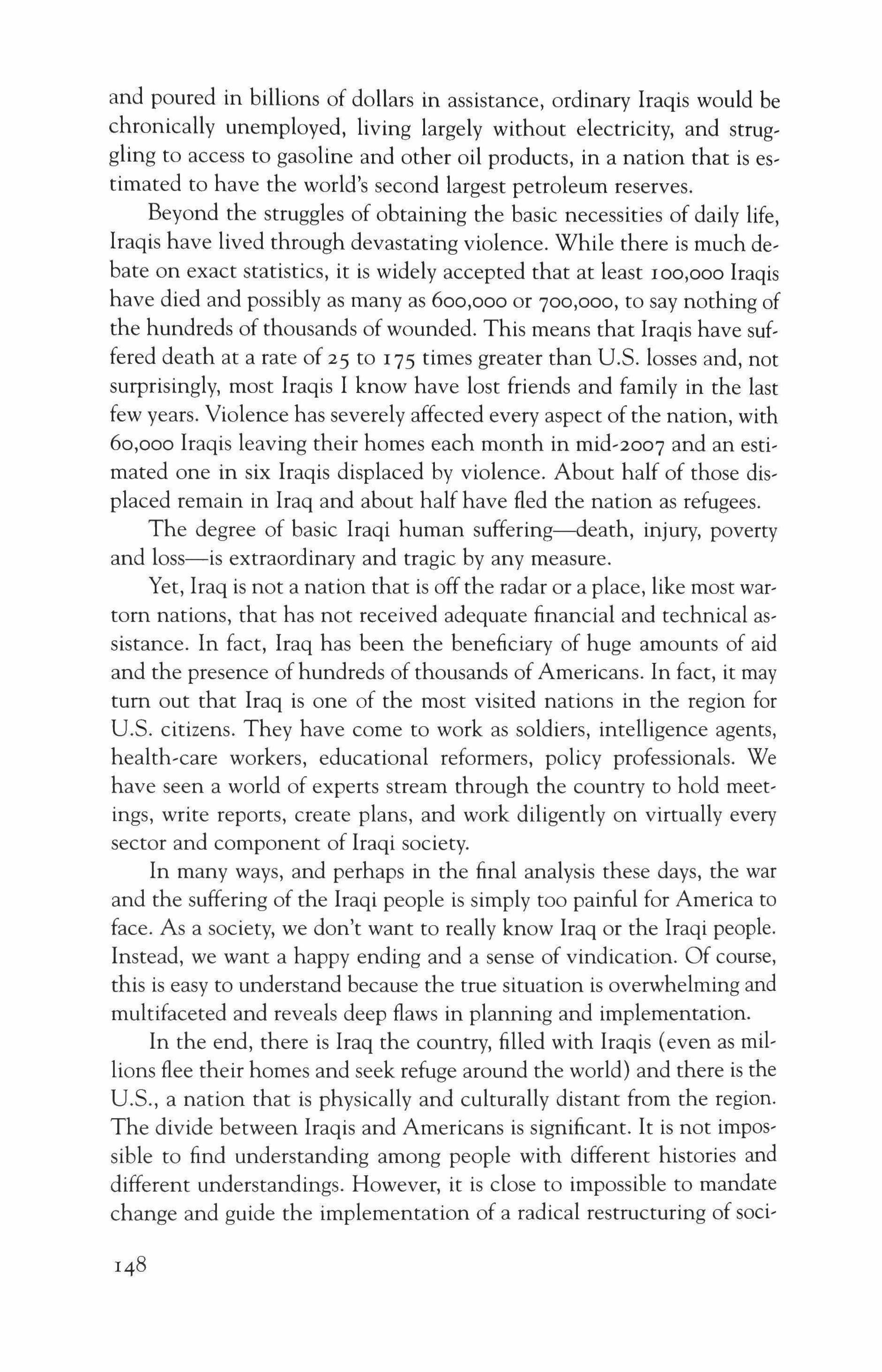
and poured in billions of dollars in assistance, ordinary Iraqis would be chronically unemployed, living largely without electricity, and struggling to access to gasoline and other oil products, in a nation that is estimated to have the world's second largest petroleum reserves.
Beyond the struggles of obtaining the basic necessities of daily life, Iraqis have lived through devastating violence. While there is much debate on exact statistics, it is widely accepted that at least 100,000 Iraqis have died and possibly as many as 600,000 or 700,000, to say nothing of the hundreds of thousands of wounded. This means that Iraqis have suffered death at a rate of 25 to 175 times greater than U.S. losses and, not surprisingly, most Iraqis I know have lost friends and family in the last few years. Violence has severely affected every aspect of the nation, with 60,000 Iraqis leaving their homes each month in rnid-zcoj and an estimated one in six Iraqis displaced by violence. About half of those displaced remain in Iraq and about half have fled the nation as refugees.
The degree of basic Iraqi human suffering-death, injury, poverty and loss-is extraordinary and tragic by any measure.
Yet, Iraq is not a nation that is off the radar or a place, like most wartom nations, that has not received adequate financial and technical assistance. In fact, Iraq has been the beneficiary of huge amounts of aid and the presence of hundreds of thousands of Americans. In fact, it may tum out that Iraq is one of the most visited nations in the region for U.S. citizens. They have come to work as soldiers, intelligence agents, health-care workers, educational reformers, policy professionals. We have seen a world of experts stream through the country to hold meetings, write reports, create plans, and work diligently on virtually every sector and component of Iraqi society.
In many ways, and perhaps in the final analysis these days, the war and the suffering of the Iraqi people is simply too painful for America to face. As a society, we don't want to really know Iraq or the Iraqi people. Instead, we want a happy ending and a sense of vindication. Of course, this is easy to understand because the true situation is overwhelming and multifaceted and reveals deep flaws in planning and implementation.
In the end, there is Iraq the country, filled with Iraqis (even as millions flee their homes and seek refuge around the world) and there is the U.S., a nation that is physically and culturally distant from the region. The divide between Iraqis and Americans is significant. It is not impossible to find understanding among people with different histories and different understandings. However, it is close to impossible to mandate change and guide the implementation of a radical restructuring of sod-
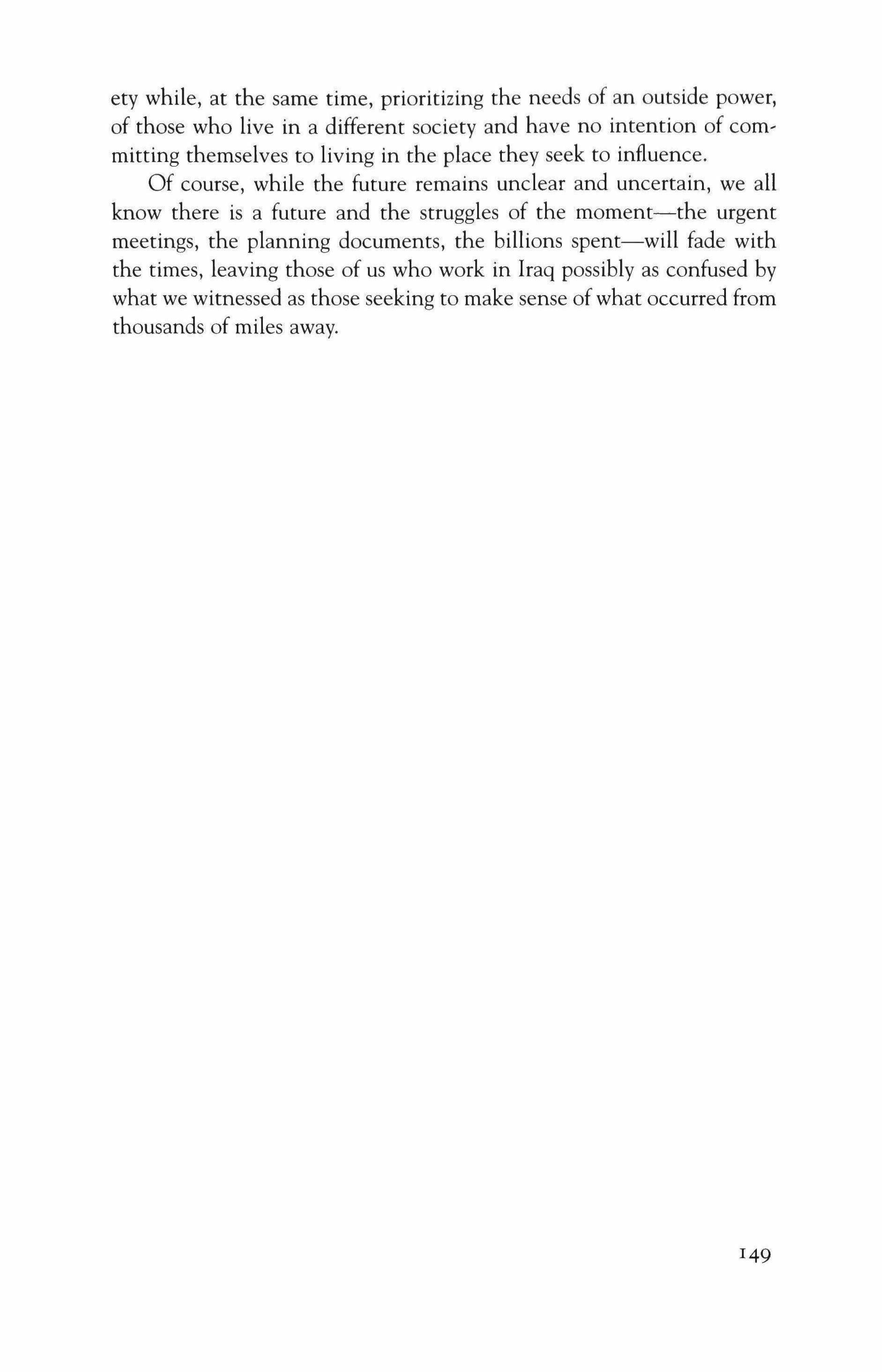
ety while, at the same time, prioritizing the needs of an outside power, of those who live in a different society and have no intention of cornmitting themselves to living in the place they seek to influence.
Of course, while the future remains unclear and uncertain, we all know there is a future and the struggles of the moment-the urgent meetings, the planning documents, the billions spent-will fade with the times, leaving those of us who work in Iraq possibly as confused by what we witnessed as those seeking to make sense of what occurred from thousands of miles away.
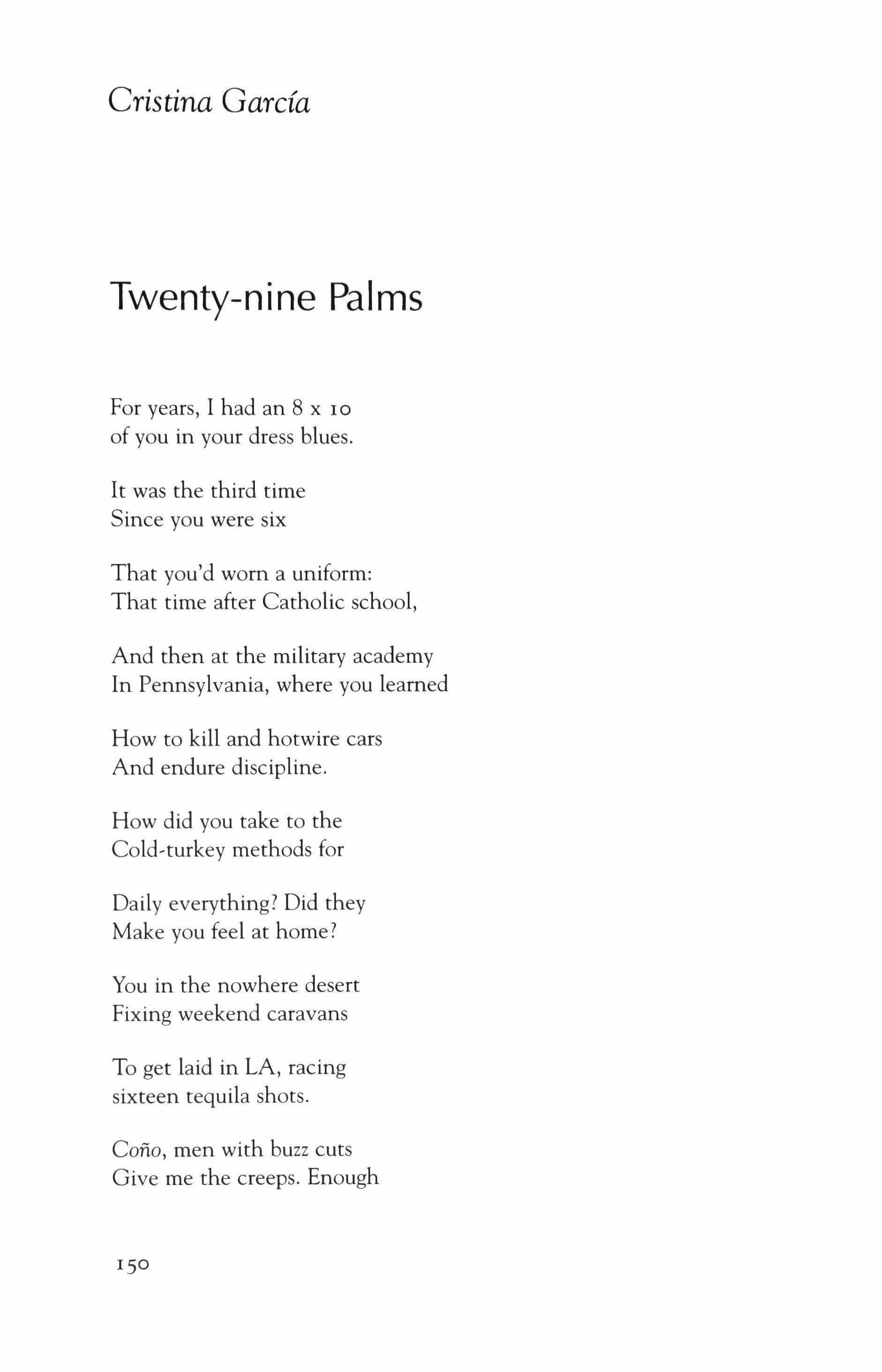
For years, I had an 8 x 10 of you in your dress blues.
It was the third time
Since you were six
That you'd worn a uniform: That time after Catholic school,
And then at the military academy In Pennsylvania, where you learned
How to kill and hotwire cars
And endure discipline.
How did you take to the Cold-turkey methods for
Daily everything? Did they Make you feel at home?
You in the nowhere desert Fixing weekend caravans
To get laid in LA, racing sixteen tequila shots.
Cono, men with buzz cuts
Give me the creeps. Enough
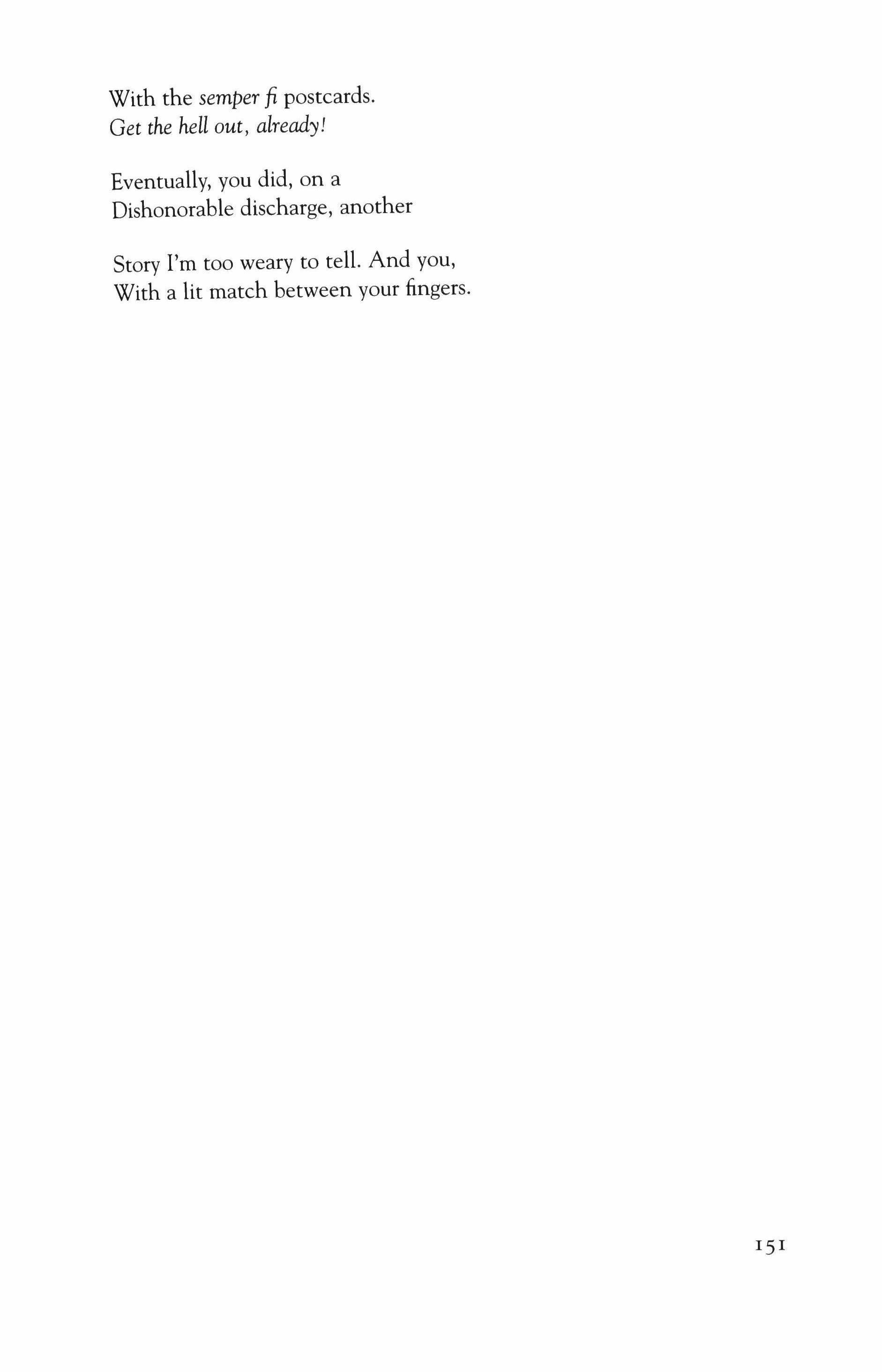
With the semper fi postcards. Get the hell out, already!
Eventually, you did, on a Dishonorable discharge, another
Story I'm too weary to tell. And you, With a lit match between your fingers.
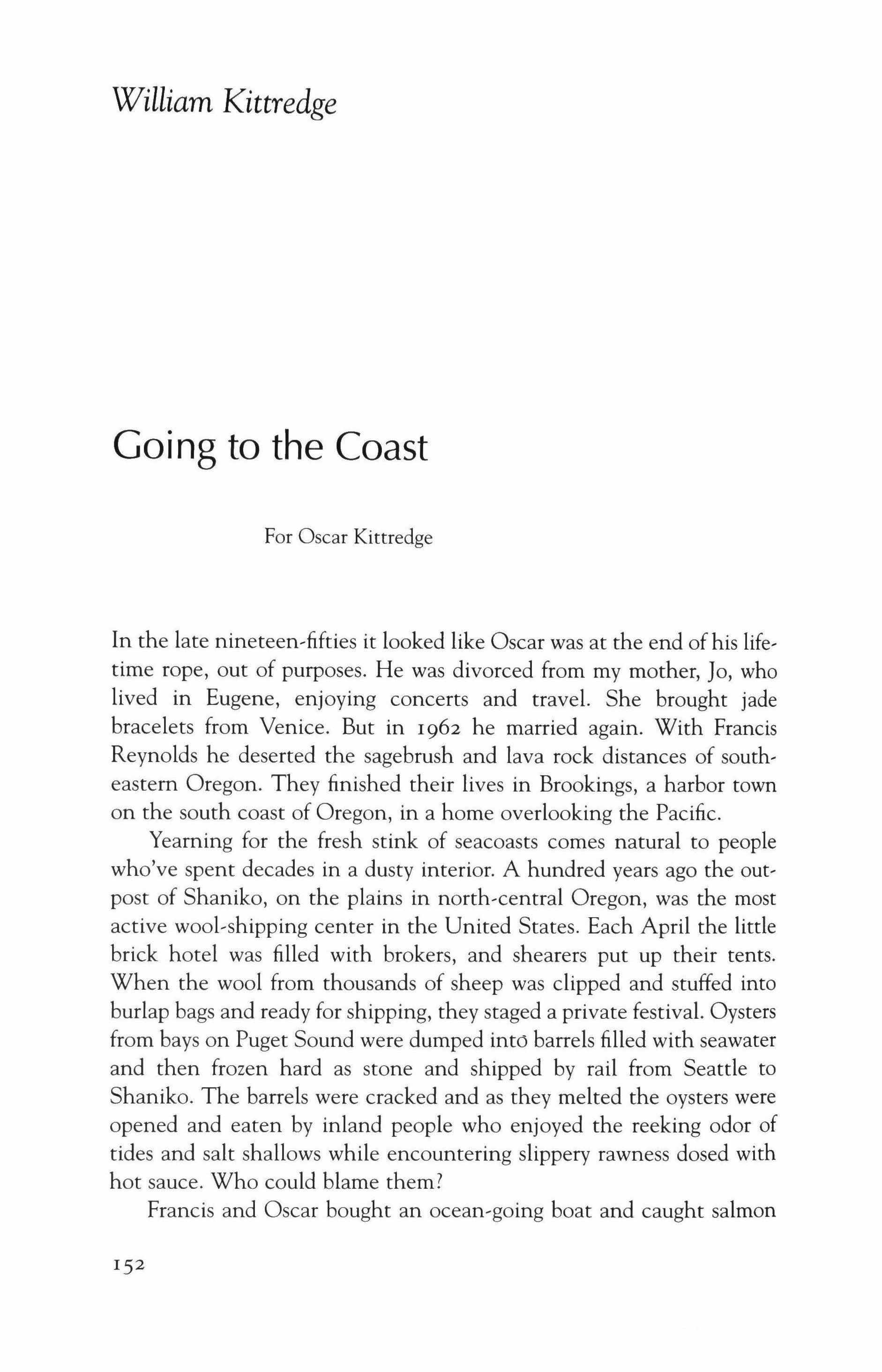
In the late nineteen-fifties it looked like Oscar was at the end ofhis lifetime rope, out of purposes. He was divorced from my mother, jo, who lived in Eugene, enjoying concerts and travel. She brought jade bracelets from Venice. But in 1962 he married again. With Francis Reynolds he deserted the sagebrush and lava rock distances of southeastern Oregon. They finished their lives in Brookings, a harbor town on the south coast of Oregon, in a home overlooking the Pacific.
Yearning for the fresh stink of seacoasts comes natural to people who've spent decades in a dusty interior. A hundred years ago the outpost of Shaniko, on the plains in north-central Oregon, was the most active wool-shipping center in the United States. Each April the little brick hotel was filled with brokers, and shearers put up their tents. When the wool from thousands of sheep was clipped and stuffed into burlap bags and ready for shipping, they staged a private festival. Oysters from bays on Puget Sound were dumped into barrels filled with seawater and then frozen hard as stone and shipped by rail from Seattle to Shaniko. The barrels were cracked and as they melted the oysters were opened and eaten by inland people who enjoyed the reeking odor of tides and salt shallows while encountering slippery rawness dosed with hot sauce. Who could blame them?
Francis and Oscar bought an ocean-going boat and caught salmon
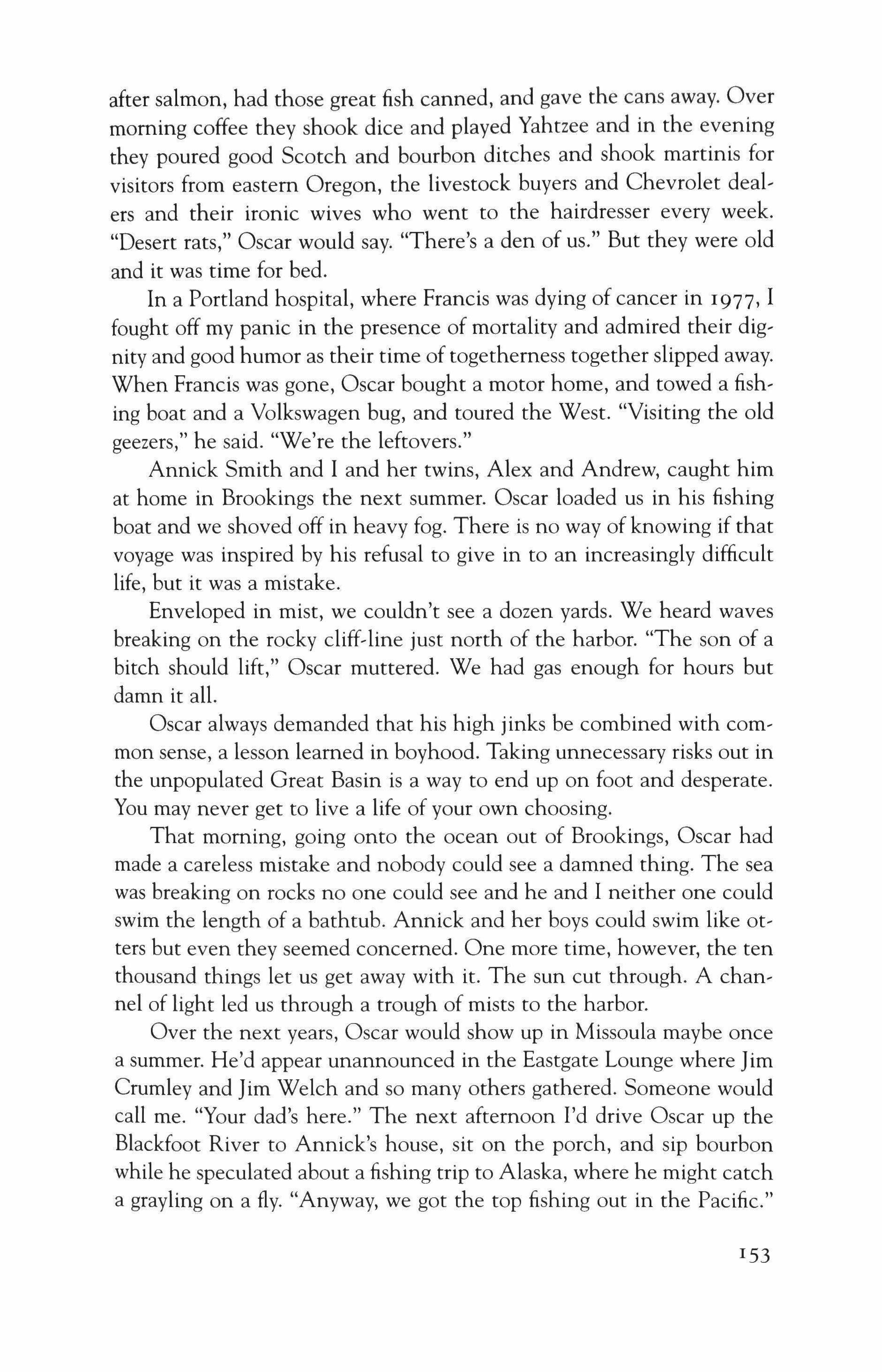
after salmon, had those great fish canned, and gave the cans away. Over morning coffee they shook dice and played Yahtzee and in the evening they poured good Scotch and bourbon ditches and shook martinis for visitors from eastern Oregon, the livestock buyers and Chevrolet deal, ers and their ironic wives who went to the hairdresser every week. "Desert rats," Oscar would say. "There's a den of us." But they were old and it was time for bed.
In a Portland hospital, where Francis was dying of cancer in 1977, I fought off my panic in the presence of mortality and admired their dig, nity and good humor as their time of togetherness together slipped away. When Francis was gone, Oscar bought a motor home, and towed a fishing boat and a Volkswagen bug, and toured the West. "Visiting the old geezers," he said. "We're the leftovers."
Annick Smith and I and her twins, Alex and Andrew, caught him at home in Brookings the next summer. Oscar loaded us in his fishing boat and we shoved off in heavy fog. There is no way of knowing if that voyage was inspired by his refusal to give in to an increasingly difficult life, but it was a mistake.
Enveloped in mist, we couldn't see a dozen yards. We heard waves breaking on the rocky cliff-line just north of the harbor. "The son of a bitch should lift," Oscar muttered. We had gas enough for hours but damn it all.
Oscar always demanded that his high jinks be combined with common sense, a lesson learned in boyhood. Taking unnecessary risks out in the unpopulated Great Basin is a way to end up on foot and desperate. You may never get to live a life of your own choosing.
That morning, going onto the ocean out of Brookings, Oscar had made a careless mistake and nobody could see a damned thing. The sea was breaking on rocks no one could see and he and I neither one could swim the length of a bathtub. Annick and her boys could swim like otters but even they seemed concerned. One more time, however, the ten thousand things let us get away with it. The sun cut through. A chan, nel of light led us through a trough of mists to the harbor.
Over the next years, Oscar would show up in Missoula maybe once a summer. He'd appear unannounced in the Eastgate Lounge where Jim Crumley and Jim Welch and so many others gathered. Someone would call me. "Your dad's here." The next afternoon I'd drive Oscar up the Blackfoot River to Annick's house, sit on the porch, and sip bourbon while he speculated about a fishing trip to Alaska, where he might catch a grayling on a fly. "Anyway, we got the top fishing out in the Pacific."
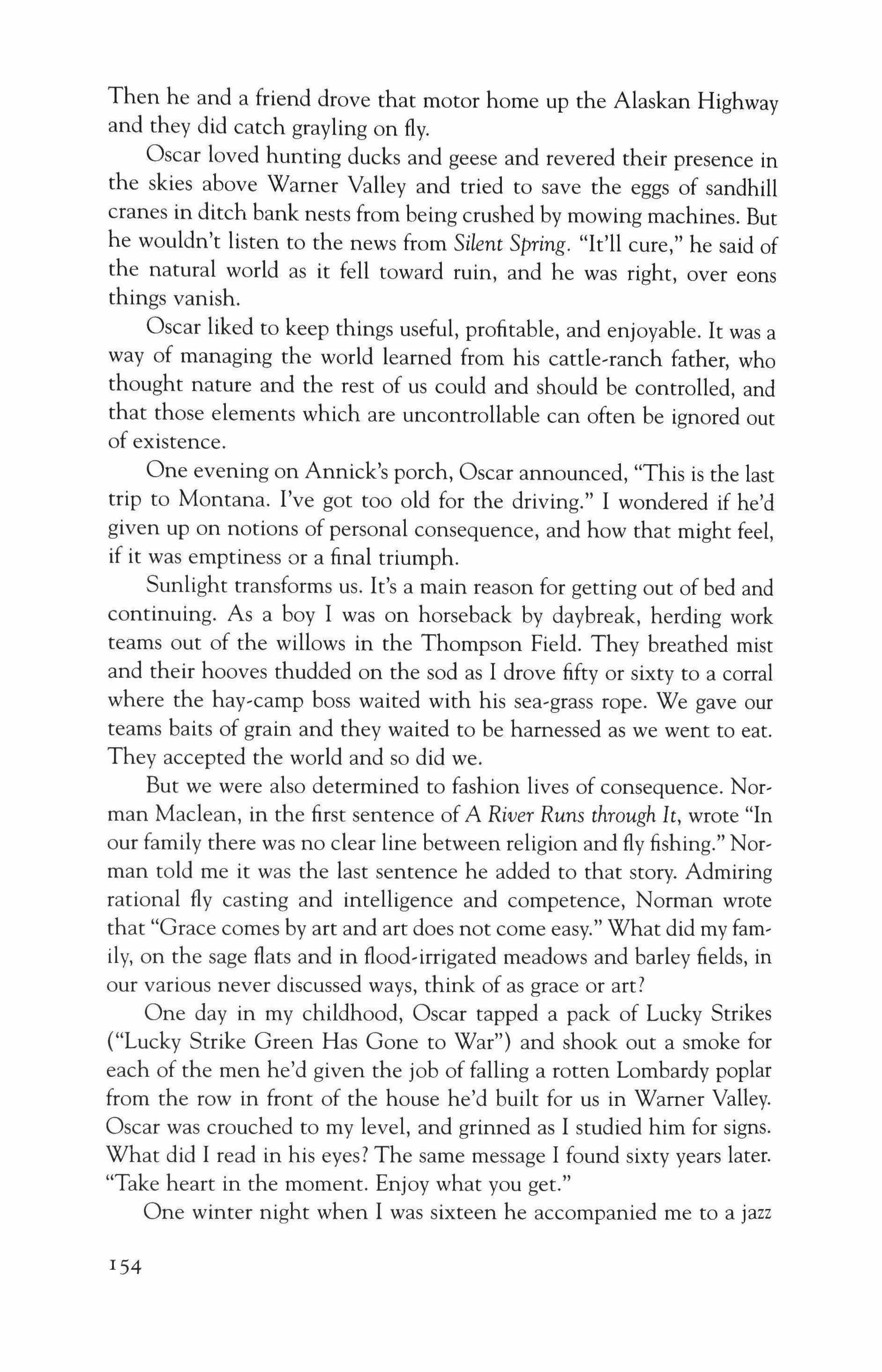
Then he and a friend drove that motor home up the Alaskan Highway and they did catch grayling on fly.
Oscar loved hunting ducks and geese and revered their presence in the skies above Warner Valley and tried to save the eggs of sandhill cranes in ditch bank nests from being crushed by mowing machines. But he wouldn't listen to the news from Silent Spring. "It'll cure," he said of the natural world as it fell toward ruin, and he was right, over eons things vanish.
Oscar liked to keep things useful, profitable, and enjoyable. It was a way of managing the world learned from his cattle-ranch father, who thought nature and the rest of us could and should be controlled, and that those elements which are uncontrollable can often be ignored out of existence.
One evening on Annick's porch, Oscar announced, "This is the last trip to Montana. I've got too old for the driving." I wondered if he'd given up on notions of personal consequence, and how that might feel, if it was emptiness or a final triumph.
Sunlight transforms us. It's a main reason for getting out of bed and continuing. As a boy I was on horseback by daybreak, herding work teams out of the willows in the Thompson Field. They breathed mist and their hooves thudded on the sod as I drove fifty or sixty to a corral where the hay-camp boss waited with his sea-grass rope. We gave our teams baits of grain and they waited to be harnessed as we went to eat. They accepted the world and so did we.
But we were also determined to fashion lives of consequence. Norman Maclean, in the first sentence of A River Runs through It, wrote "In our family there was no clear line between religion and fly fishing." Norman told me it was the last sentence he added to that story. Admiring rational fly casting and intelligence and competence, Norman wrote that "Grace comes by art and art does not come easy." What did my family, on the sage flats and in flood-irrigated meadows and barley fields, in our various never discussed ways, think of as grace or art?
One day in my childhood, Oscar tapped a pack of Lucky Strikes ("Lucky Strike Green Has Gone to War") and shook out a smoke for each of the men he'd given the job of falling a rotten Lombardy poplar from the row in front of the house he'd built for us in Warner Valley. Oscar was crouched to my level, and grinned as I studied him for signs. What did I read in his eyes? The same message I found sixty years later. "Take heart in the moment. Enjoy what you get."
One winter night when I was sixteen he accompanied me to a jazz

club across the street from the Palace Hotel in San Francisco. I'd found they would serve me gin fizzes with no questions asked, and I wanted Oscar to hear a great saxophone man, the redoubtable Wingy Manone, who was playing there. After the first set, Oscar ordered drinks for the house, doubles for Wingy and the side men in his trio. "Sir," Wingy said, smiling big. "What would you like?"
"About twenty minutes of silence." I was mortified but Wingy was amused. "Wondered about you," he said to Oscar. "Every time you come up with a double, you'll get some silence. But no twenty minutes. They'd can my ass."
"Can't have that." Oscar grinned at me again in that secret way. I'm reminded of that look in his eyes as I recall the last time I saw him, eighty-nine and enduring the wait for death in a nursing home.
I didn't credit his condition as I should have. Oscar always survived, and I thought he would go a few more years. A nurse let me into a little room where he sat, emaciated but dressed in gabardine slacks and a wool shirt and asleep in a wheelchair. When I spoke, he was startled. "Bill's corning."
He studied me. "Who the hell did I think you were?" We laughedwish I could remember what we said-and there was that old amusement in his eyes, and then it was time to leave. "I'll be back on the streets," he said. Days later, Oscar died in that home. It's easy to think, though I have excuses, that I might have stayed and helped him see it through. But maybe he didn't need help. There must be a point where the dying takes charge.
On visits to the coast I watched Oscar, on the seaward porch in his wicker rocking chair, eyeing the incessant Pacific, and thought his was a story in which it turns out to be possible to age and to lose loved ones and despite all find a way to face death with tranquility. I tried to imagine what he took to be losses, like never again harnessing a team at the River Ranch just north of Summer Lake so he could take his sisters on their buggy ride to grade school by Schoolhouse Lake, and never again playing poker all night in the Elk's Club in Klamath Falls, and never shaking off a ten-below morning of goose hunting on the Klamath Marsh with shots of good bourbon-never again. But he didn't mention the degree to which he must have felt doors closing, and neither did I. That wasn't the way we did things.

My mother, Helene Beck Deutch, died on March 28, 2007, one day short of her one hundred and first birthday. She did not go easily. It was not in her nature to give in or give up. Her journey had been a long one, starting in a small Transylvanian city in Victorian times and ending at Weiss Hospital on Chicago's North Side in the neighborhood where she had lived off and on for some seventy years. The windows in her hospital room looked east toward Lake Michigan. From her arrival in Chicago in 1937 to her last day on earth, she insisted on living in view of this great lake-her solace and her escape. The city was another matter.
"I hate this place," she told my father her first season in the Windy City. "It is ugly and dirty."
The month was February. Soot-crusted snow rose in piles from drab streets. Icy winds off the lake blew candy wrappers into garbage-strewn gutters. Huddled in their overcoats, people rushed to streetcars and buses, and to my cosmopolitan mother they seemed gruff and plain. In time, she would come to admire the arts and architecture, the lakeside parks and postmodern glories of Chicago's glittering skyline. "They say it is now the most beautiful city in America," she would proclaim in her emphatic Hungarian accent. But the strong-armed prairie metropolis could never be her spiritual home. That was Paris, where she had romanced and married, and where I was born. Golden Paris, the city ofher heart.
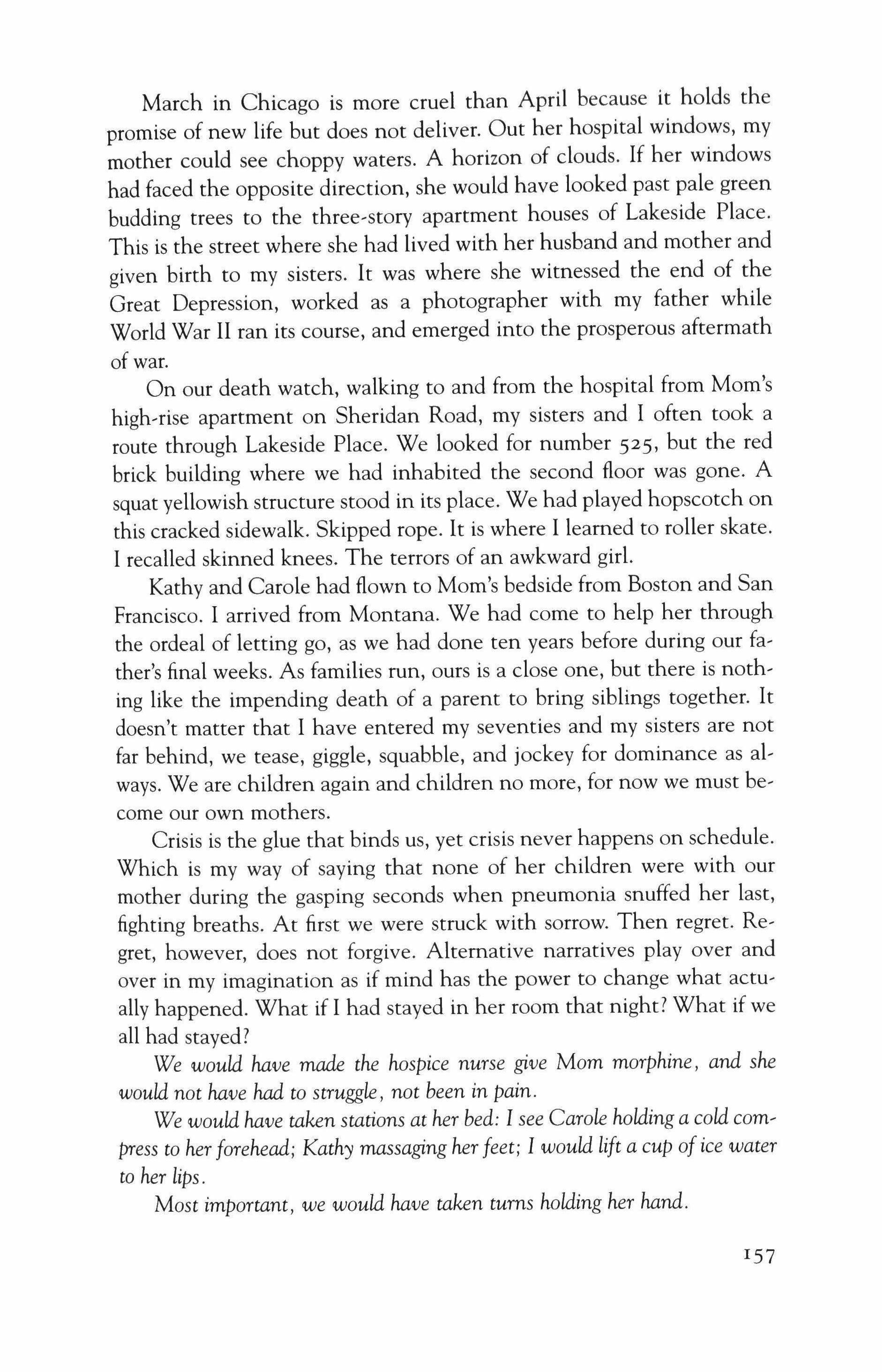
March in Chicago is more cruel than April because it holds the promise of new life but does not deliver. Out her hospital windows, my mother could see choppy waters. A horizon of clouds. If her windows had faced the opposite direction, she would have looked past pale green budding trees to the three-story apartment houses of Lakeside Place. This is the street where she had lived with her husband and mother and given birth to my sisters. It was where she witnessed the end of the Great Depression, worked as a photographer with my father while World War II ran its course, and emerged into the prosperous aftermath of war.
On our death watch, walking to and from the hospital from Mom's high-rise apartment on Sheridan Road, my sisters and I often took a route through Lakeside Place. We looked for number 525, but the red brick building where we had inhabited the second floor was gone. A squat yellowish structure stood in its place. We had played hopscotch on this cracked sidewalk. Skipped rope. It is where I learned to roller skate. I recalled skinned knees. The terrors of an awkward girl.
Kathy and Carole had flown to Mom's bedside from Boston and San Francisco. I arrived from Montana. We had come to help her through the ordeal of letting go, as we had done ten years before during our father's final weeks. As families run, ours is a close one, but there is nothing like the impending death of a parent to bring siblings together. It doesn't matter that I have entered my seventies and my sisters are not far behind, we tease, giggle, squabble, and jockey for dominance as always. We are children again and children no more, for now we must become our own mothers.
Crisis is the glue that binds us, yet crisis never happens on schedule. Which is my way of saying that none of her children were with our mother during the gasping seconds when pneumonia snuffed her last, fighting breaths. At first we were struck with sorrow. Then regret. Regret, however, does not forgive. Alternative narratives play over and over in my imagination as if mind has the power to change what actually happened. What if I had stayed in her room that night? What if we all had stayed?
We would have made the hospice nurse give Mom morphine, and she would not have had to struggle, not been in pain.
We would have taken stations at her bed: I see Carole holding a cold compress to her forehead; Kathy massaging her feet; I would lift a cup of ice water to her lips.
Most important, we would have taken turns holding her hand.

Holding hands. The thought brings me near to tears. Like us, our mother was absent at the death of her mother. She had arrived fifteen minutes too late to the nursing home where ninety-three-year-old Grandma Beck passed away while napping on her bed.
"I wanted to be there to hold Grandma's hand," Mom would tell one or the other of us seemingly out of the blue, the association triggered by who knows what. She was obsessed with guilt, believing she had betrayed her mother. But guilt was not the only thing that haunted her. There was fear. I think my mother was telling us how much she feared death. Especially dying alone. When her time came, she wanted her daughters by her side. She wanted someone she loved to be holding her hand.
On Mom's last night, around midnight, my sisters and I took a taxi back from the hospital to her apartment in The Breakers, a skyscraping senior residence where she had lived for the past ten years. It was too late for a Vietnamese noodle dinner at one of the little restaurants on Bryn Mawr where we often stopped for late evening comfort food. We were exhausted, wanting no more than a few hours of sleep.
At three in the morning the telephone rang. Carole, asleep on the living room couch, jumped to get it. We all jumped. Our sleep-shrouded minds woke in a hurry. We knew this was the crisis. I picked up the extension in Mom's bedroom. Iris, the caregiver we had hired to watch over her that night, spoke in a near whisper.
"We've got a problem," she said.
"What's wrong?" asked Carole. The line went silent. We held our breaths.
"I think your mother's dead."
"You think she's dead?" I interjected.
"She was trying to take that oxygen mask off. You know, the one with the medicine? She couldn't get her breath. Her poor chest rose up a couple of times. And then it just stopped. I think her heart quit."
"I'm sorry," Iris sobbed. "I didn't know what to do."
When we rushed into our mother's hospital room half an hour later nothing had been done to ease the shock ofdeath. Mom lay on her side, uncovered, her hospital gown in a tangle. She was tiny on the long bed and her mouth gaped-toothless and in the posture of agony. We wept to see her so. We wept for the loss of the woman who had given us life, and cared for us and our babies, and who had become our burden. Taking care of this mother was integral to who we had become now that our

own children were grown-and the caring, although difficult, was a kind of joy. Now she was gone. We wept for ourselves. And we wept because there had been no proper good-byes.
The last word our mother had spoken to us was "Tylenol." She had looked up with pleading, red-rimmed eyes and said "Tylenol." This was the only remedy she believed could ease her pain.
"The doctor just gave you some," said Carole. "We can't give you anymore."
Mom drew up her legs and closed her eyes. Kathy bent down to kiss her cheek. "We'll be back in a few hours."
Our mother frowned and turned away. She was angry to the point of fury. That afternoon her doctor had told her there was nothing more he could do. We had put her under hospice care and were planning to bring her home next morning. She knew what that meant: hospitals were where you went to get cured; going home was defeat. Her daughters had taken her life into their hands, and she did not trust us with it. We had told her a hospital bed would be delivered to her bedroom. There would be oxygen and breathing machines. Two trained caregivers. Tranquillizers and morphine.
"You will be more comfortable at home," we said.
"Home," Mom repeated in a hoarse, croaking voice. "I have no home."
Aside from "Tylenol," those are the last words I remember her say, ing. She turned her back on us because she was furious. But in turning away, our mother was also keeping a promise.
"I'm going to be rude to the girls," Mother had confided to her care' giver the night before the last night. "That way they won't be sad when I'm gone." True to her word, perverse and original as ever, she had been rude.
The hospice nurse and an orderly shooed us into the hall while they washed and dressed our mother. They did a good job. When we entered her room for our final farewells, Mom lay on her back in a blue gown. Her false teeth had been put back, her eyes were shut, her white hair had been combed into waves, her brow was smooth, and her hands were clasped on her stomach. She looked younger. Unwrinkled. Serene. Death had done what no amount of creams or toners could do. Death, the ultimate beauty shop. Looking down at her still figure, I could not help thinking the head on the pillow seemed larger than I'd remembered it-a large vessel for a small body.
Looks mattered inordinately to my mother. She would have loved

seeing herself so calm and beautiful. It is easy to imagine her looking down from somewhere nearby as Carole and Kat and I mourned and told stories and repeated her favorite Hungarian jokes. I felt her presence not quite gone from the room-a spirit anything but angelic laughing with and at her daughters, white-haired themselves.
Mom's high spirits had surfaced only once while I was with her those last two days-when my son Andrew came to see her. If anyone could make her smile, it would be Andrew. He brought a video of his baby daughter Tilly. Mom loved babies. "Kick, kick" she said to the video as the nine-month-old kicked her plump legs. "She wants it," she chuckled, as Tilly crawled toward the pacifier I held out to her in the moving picture.
"I'd like to roll on the floor with her," Mom exclaimed. "She can roll all over me. Roll But not Rule!" We laughed. She laughed. Her last joke.
"It was her life in a phrase," Andrew wrote in his journal. "A pun, some laughter, a sweet desire to play and be in physical closeness with her great-grandchild, and-right up to the end-an objection to being 'ruled.' To being under the thrall of another."
A few minutes later, as she slipped into Ambien-laced sleep, Mom mumbled "clean shirt, nice Then "Make sure you bring out the vegetables. Good fresh vegetables." What was she planning, I wonder? A family feast? Everyone clean and dressed for the party. Or, as Andrew wrote in his journal, was she "channeling some generous & motherly thought, providing food & clothes to the ones she loves?"
Food. Clothes. Laughter. Especially laughter. Helene Deutch was her own best audience. She laughed at her favorite stories repeated over and over with equal hilarity, and her laughter was contagious. She would roar at some off-color Hungarian saying she'd just translated for us, or at a remark one of her grandkids had said years ago that tickled her funny bone. Bent double, she laughed until tears came, until she gasped for breath. I have struggled to keep that image in memory's eye but the agony is equally powerful. I guess the two must abide side by side. Like life. Intermingled.
Death is always a beginning. Now I am the eldest in our family, although not quite comfortable in the role, and with Mom gone I am the selfdesignated storyteller. It is easy for writers of a certain age to fall into stories about memory and nostalgia and loss, and I am no exception, but the world we encounter day to day no matter what age we have come to
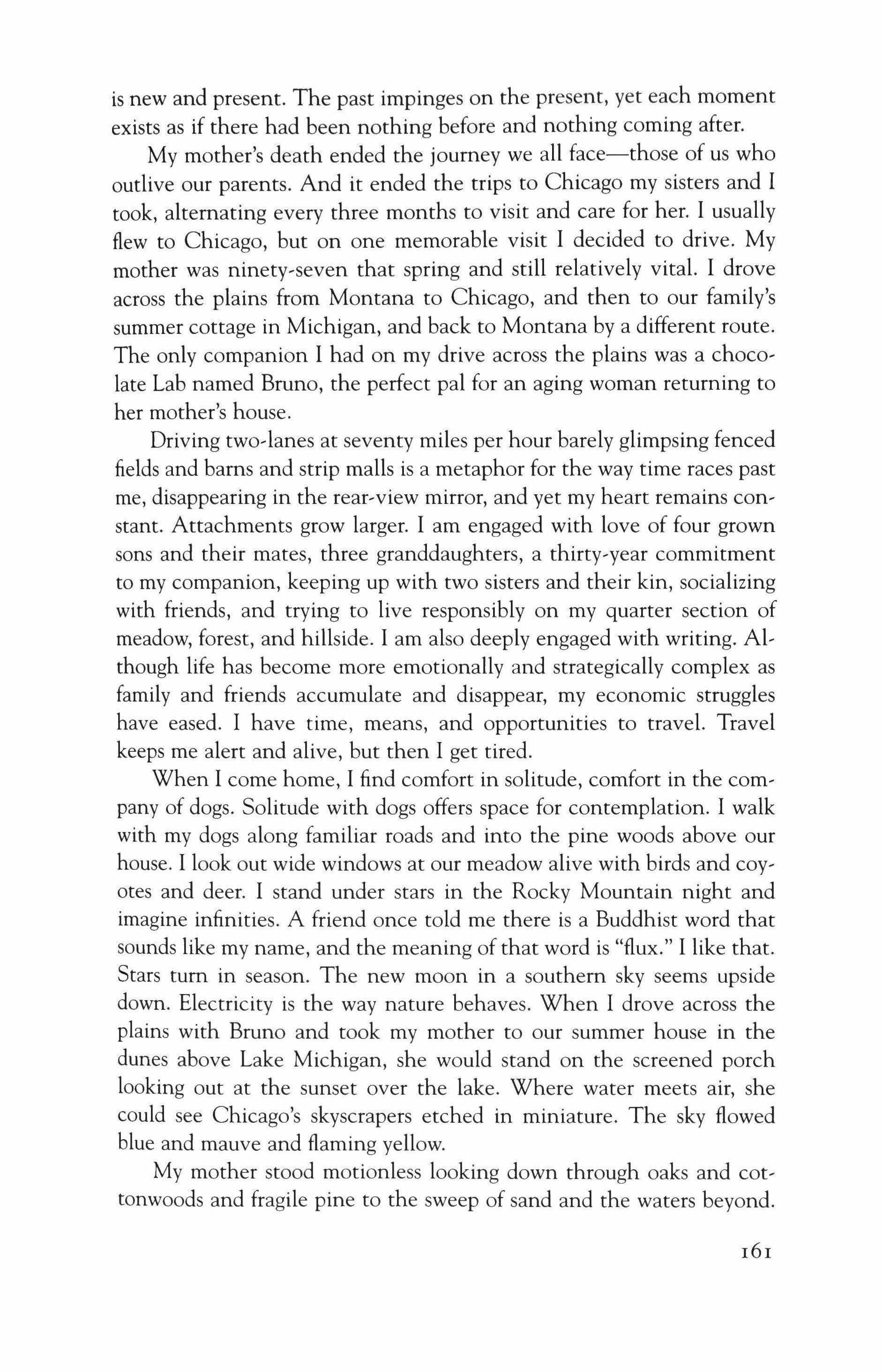
is new and present. The past impinges on the present, yet each moment exists as if there had been nothing before and nothing coming after.
My mother's death ended the journey we all face-those of us who outlive our parents. And it ended the trips to Chicago my sisters and I took, alternating every three months to visit and care for her. I usually flew to Chicago, but on one memorable visit I decided to drive. My mother was ninety-seven that spring and still relatively vital. I drove across the plains from Montana to Chicago, and then to our family's summer cottage in Michigan, and back to Montana by a different route. The only companion I had on my drive across the plains was a chocolate Lab named Bruno, the perfect pal for an aging woman returning to her mother's house.
Driving two-lanes at seventy miles per hour barely glimpsing fenced fields and barns and strip malls is a metaphor for the way time races past me, disappearing in the rear-view mirror, and yet my heart remains con, stant. Attachments grow larger. I am engaged with love of four grown sons and their mates, three granddaughters, a thirty-year commitment to my companion, keeping up with two sisters and their kin, socializing with friends, and trying to live responsibly on my quarter section of meadow, forest, and hillside. I am also deeply engaged with writing. AI, though life has become more emotionally and strategically complex as family and friends accumulate and disappear, my economic struggles have eased. I have time, means, and opportunities to travel. Travel keeps me alert and alive, but then I get tired.
When I come home, I find comfort in solitude, comfort in the com, pany of dogs. Solitude with dogs offers space for contemplation. I walk with my dogs along familiar roads and into the pine woods above our house. I look out wide windows at our meadow alive with birds and coy' otes and deer. I stand under stars in the Rocky Mountain night and imagine infinities. A friend once told me there is a Buddhist word that sounds like my name, and the meaning of that word is "flux." I like that. Stars tum in season. The new moon in a southern sky seems upside down. Electricity is the way nature behaves. When I drove across the plains with Bruno and took my mother to our summer house in the dunes above Lake Michigan, she would stand on the screened porch looking out at the sunset over the lake. Where water meets air, she could see Chicago's skyscrapers etched in miniature. The sky flowed blue and mauve and flaming yellow.
My mother stood motionless looking down through oaks and cot' tonwoods and fragile pine to the sweep of sand and the waters beyond.

I see her there still, a small, hunched figure wrapped in a shawl with her back toward me. She has turned her eyes toward the splintered light, the sinking disc, absorbing all the beauty her mind can hold. She says nothing. Who knows what she is thinking. Or if she is thinking.
We buried Mom's ashes next to my father's in a patch of lily of the valley and red columbine on the high dune overlooking Lake Michigan next to the cottage they had shared for more than half a century. A year later, I sit in faraway Montana and think of the union of earth and ash, soul and place that was theirs and is also mine. I look out at our Maygreen meadow-so green it seems artificial-and raise my eyes to the fire-ravaged mountain masked with spring snow. I am trying to make sense of my mother's story and my father's story and my story-of the many-roomed houses we each inhabited. It is an impossible task. All flux. No matter how I try, I cannot see life whole.
Experience reinvented will have to suffice. Like everyone, I arrange memories, sensations, and thoughts in stories to define myself and those I love. Then I discover those stories are unstable and changing and filled with surprises, but there is consistency in them-the singular voice. That is how stories work: they must be both startling and predictable, like every day's dawn.
My mother used to walk the shores below our cottage and collect pieces of beach glass. Red, green, amber, translucent white, and blue, their colors were muted by the rasp of sand, their edges rounded by waves. She assembled the bits into lampshades and table-tops and oddly concocted mobiles. None beautiful. All distinctly hers. Incidents I fit together from my life-from her life-are like those bits of beach glass. I toss them helter-skelter into the kaleidoscope that is memory's core. One twist of the lens causes the shards to fragment and re-pattern. Now I see amber triangles and deep blue holes. Tomorrow there will be butterflies.
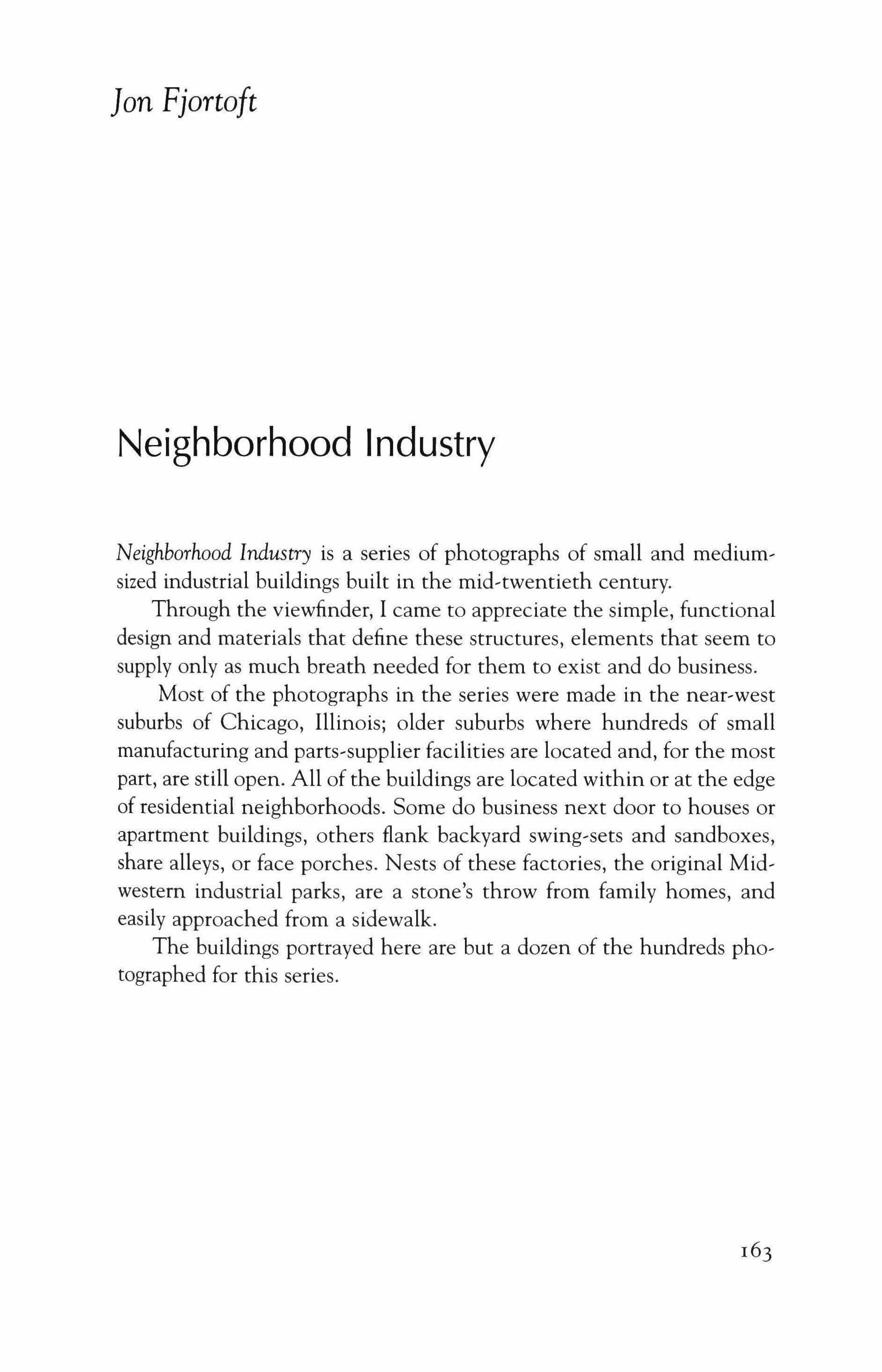
Neighborhood Industry is a series of photographs of small and mediumsized industrial buildings built in the mid-twentieth century.
Through the viewfinder, I came to appreciate the simple, functional design and materials that define these structures, elements that seem to supply only as much breath needed for them to exist and do business.
Most of the photographs in the series were made in the near-west suburbs of Chicago, Illinois; older suburbs where hundreds of small manufacturing and parts-supplier facilities are located and, for the most part, are still open. All of the buildings are located within or at the edge of residential neighborhoods. Some do business next door to houses or apartment buildings, others flank backyard swing-sets and sandboxes, share alleys, or face porches. Nests of these factories, the original Midwestern industrial parks, are a stone's throw from family homes, and easily approached from a sidewalk.
The buildings portrayed here are but a dozen of the hundreds photographed for this series.
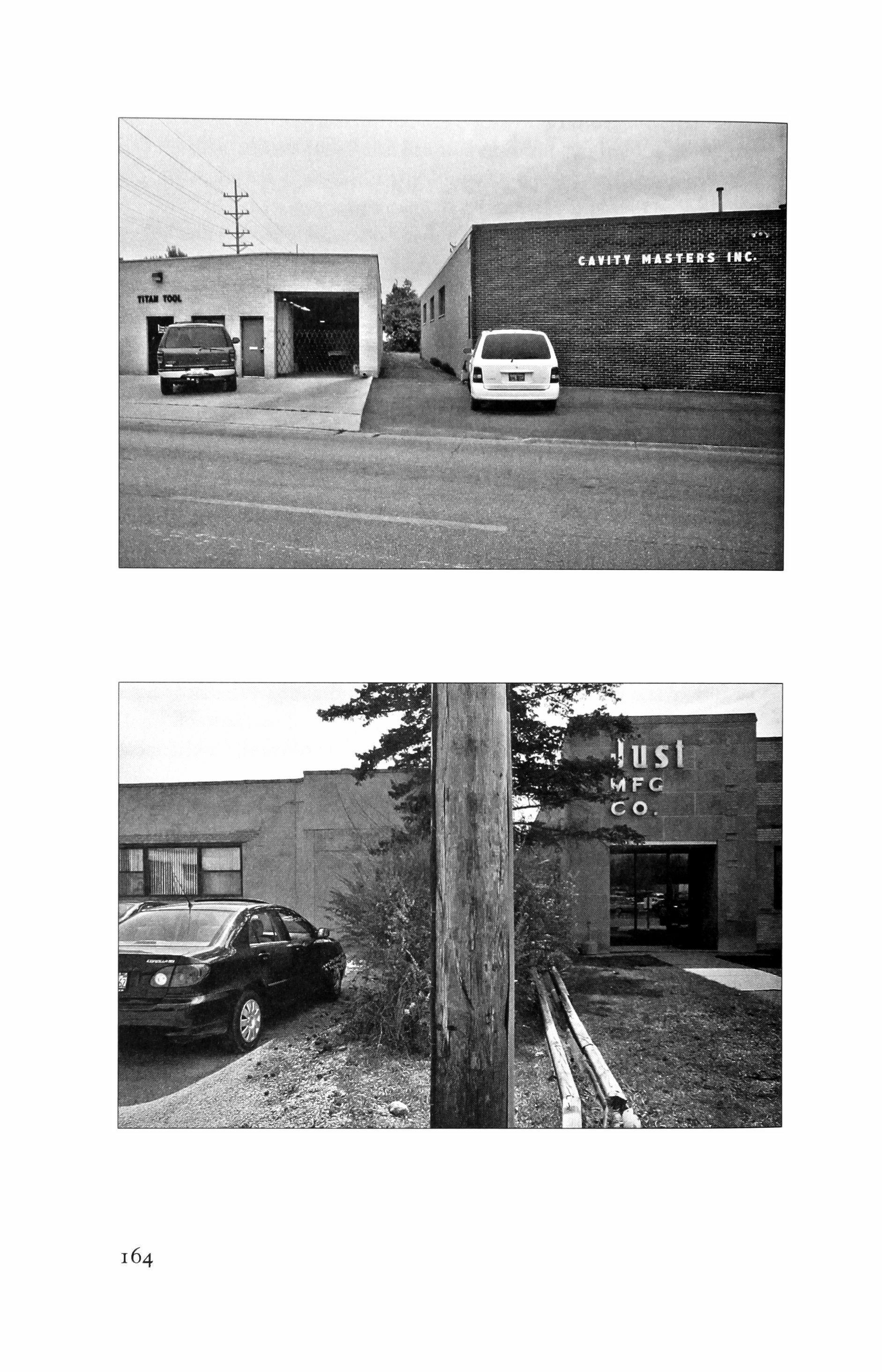

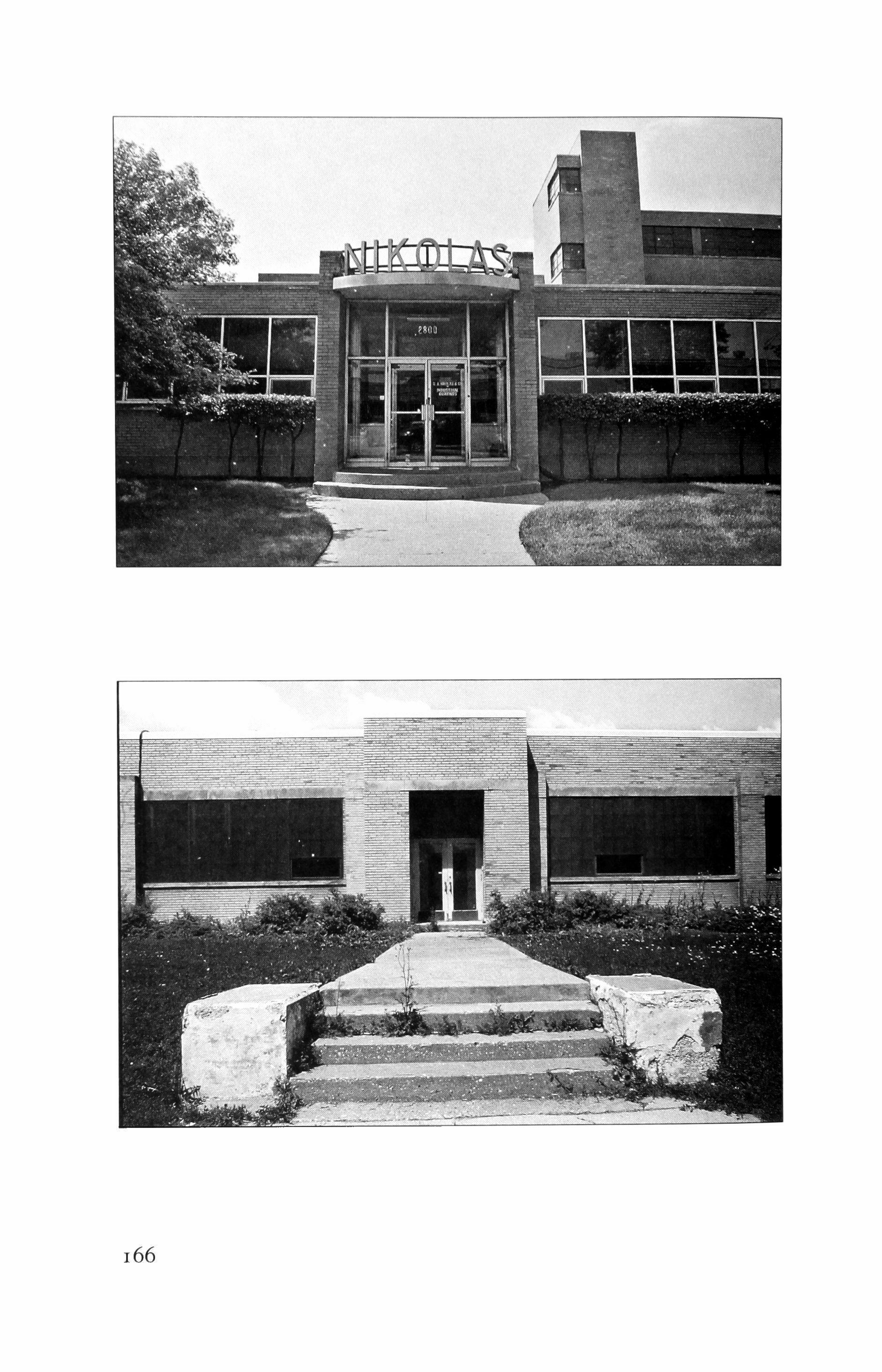
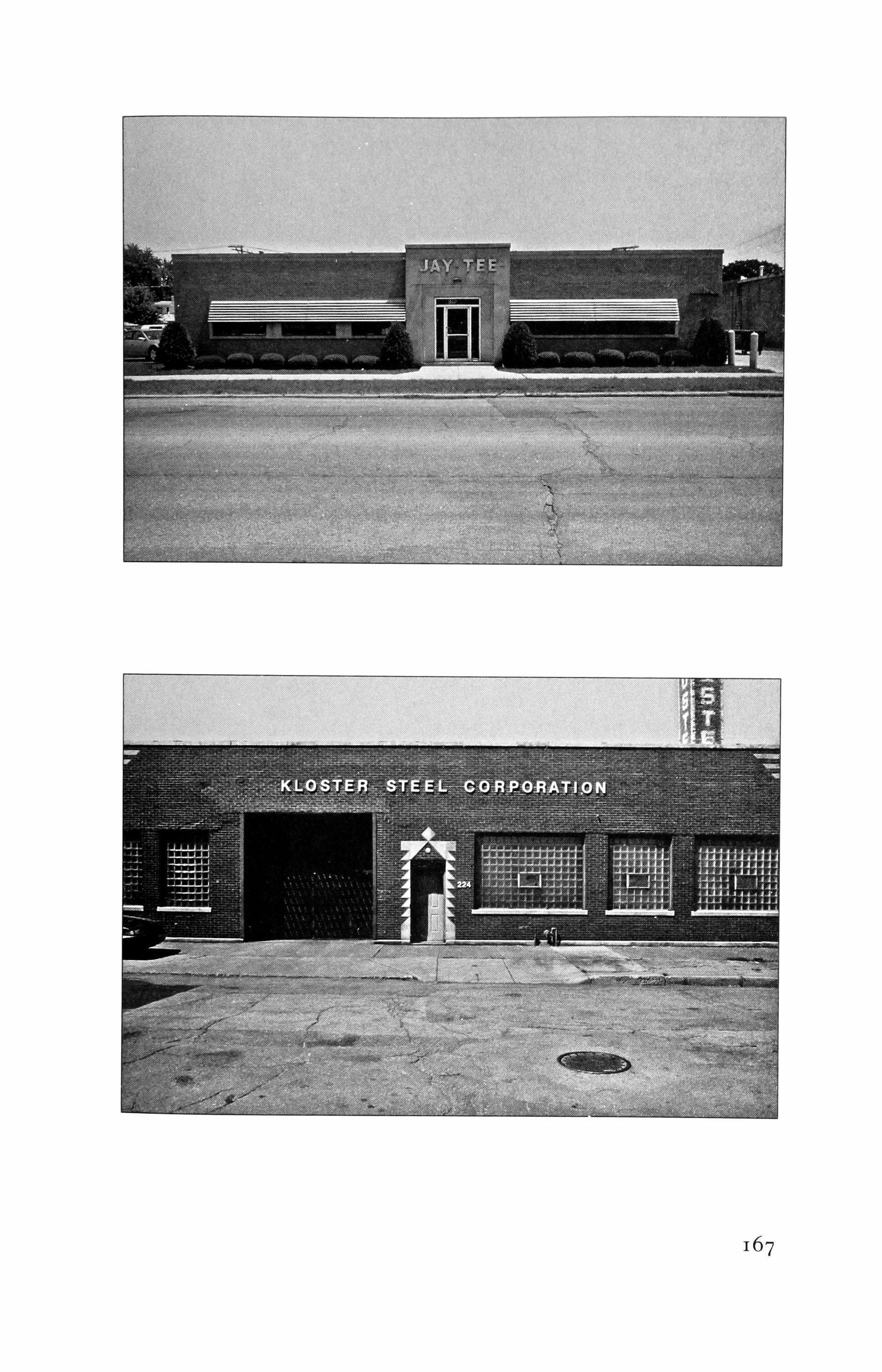
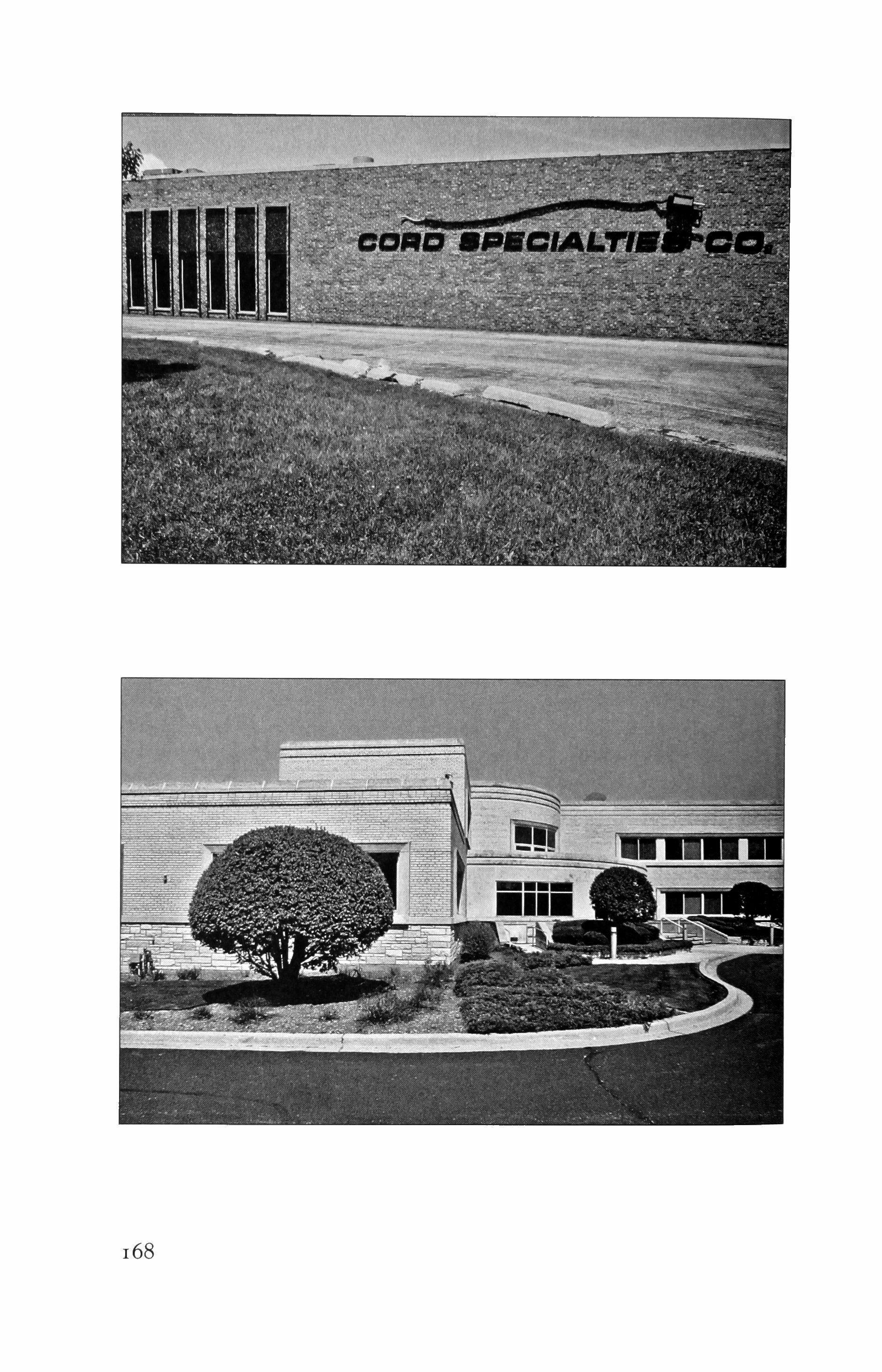


"This is amazing!" Our two-year-old daughter Sophie stands ankle deep in Lake Superior. She watches her tanned feet as sunlight plays over her toes and the shoal of red sandstone beneath them. Her father David has just lifted her from his shoulders and set her in the clear water lapping a leeward cove of a small wilderness island off the coast of Michigan's upper peninsula. We have waded through a hundred yards or so of surf that's both warmer and shallower than usual. Superior, even on hot latesummer days such as this one, is usually numbingly cold.
From the forested mound of bedrock the OJibwa called Misquah be kaw Singk, "Place of the Red Rock," I look south over Sophie's blond head to the mainland point where, among beach grass and driftwood, we left a dry towel in the sand. This coastline-provisionallyprotected now as a state recreation area-looks much the same as it did when the first European explorers landed here centuries ago, with one notable exception. Until sometime around the tum of the last century, Place of the Red Rock was a peninsula, one explorers or immigrants renamed "Little Presque Isle," a mix of French and English, "Little Almost-Island." My grandfather, born nearby in 1915, doesn't recall the island being connected to the mainland, but toward the end of his life he still vividly recalled wading through chest-deep waves to reach the island. He also recalled taking a break from the frigid water by climbing up on a miniisland that has since washed away, a fragment, no doubt, of the original peninsula.
The Cass expedition, commissioned by Michigan Territory's Gover-
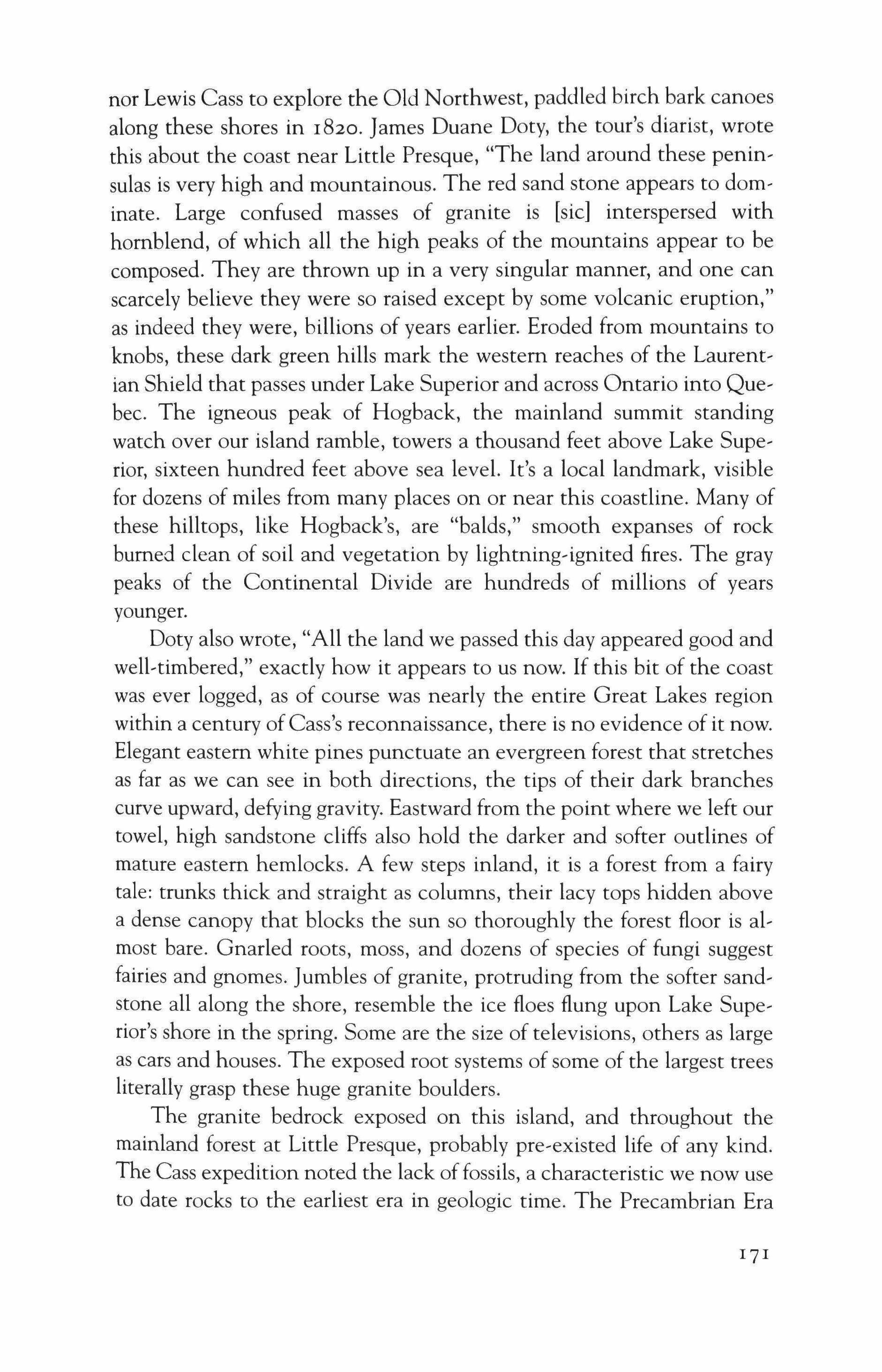
nor Lewis Cass to explore the Old Northwest, paddled birch bark canoes along these shores in 1820. James Duane Doty, the tour's diarist, wrote this about the coast near Little Presque, "The land around these peninsulas is very high and mountainous. The red sand stone appears to dominate. Large confused masses of granite is [sic] interspersed with hornblend, of which all the high peaks of the mountains appear to be composed. They are thrown up in a very singular manner, and one can scarcely believe they were so raised except by some volcanic eruption," as indeed they were, billions of years earlier. Eroded from mountains to knobs, these dark green hills mark the western reaches of the Laurentian Shield that passes under Lake Superior and across Ontario into Quebec. The igneous peak of Hogback, the mainland summit standing watch over our island ramble, towers a thousand feet above Lake Superior, sixteen hundred feet above sea level. It's a local landmark, visible for dozens of miles from many places on or near this coastline. Many of these hilltops, like Hogback's, are "balds," smooth expanses of rock burned clean of soil and vegetation by lightning-ignited fires. The gray peaks of the Continental Divide are hundreds of millions of years younger.
Doty also wrote, "All the land we passed this day appeared good and well-timbered," exactly how it appears to us now. If this bit of the coast was ever logged, as of course was nearly the entire Great Lakes region within a century ofCass's reconnaissance, there is no evidence of it now. Elegant eastern white pines punctuate an evergreen forest that stretches as far as we can see in both directions, the tips of their dark branches curve upward, defying gravity. Eastward from the point where we left our towel, high sandstone cliffs also hold the darker and softer outlines of mature eastern hemlocks. A few steps inland, it is a forest from a fairy tale: trunks thick and straight as columns, their lacy tops hidden above a dense canopy that blocks the sun so thoroughly the forest floor is almost bare. Gnarled roots, moss, and dozens of species of fungi suggest fairies and gnomes. Jumbles of granite, protruding from the softer sandstone all along the shore, resemble the ice floes flung upon Lake Superior's shore in the spring. Some are the size of televisions, others as large as cars and houses. The exposed root systems of some of the largest trees literally grasp these huge granite boulders.
The granite bedrock exposed on this island, and throughout the mainland forest at Little Presque, probably pre-existed life of any kind. The Cass expedition noted the lack offossils, a characteristic we now use to date rocks to the earliest era in geologic time. The Precambrian Era

ended 570 million years ago, an incomprehensible time span which becomes even more so when one considers that Lake Superior itself began to take shape at the end of the last ice age, less than 10,000 years ago.
Near sunny cliff tops above the lake and wherever toppled trees have allowed sunlight to reach the forest floor, ferns and seedlings grow in the soil and moisture that accumulates in the crevices of rocks. Uprooted decaying hemlocks host their own plethora of new growth. If left undisturbed, hemlocks can survive as long as a century as they wait for optimal growing conditions. In that mainland forest, Sophie might brush up against some of the same hemlock seedlings her school-age great grandfather did. Such conditions are becoming increasingly rare. Well-suited to surviving the Upper Peninsula's harsh winters and thin soil, to tolerating shade and drought, hemlocks are less resilient to disruptions introduced by human civilization. Logging and development have reduced the Great Lakes range of eastern hemlocks to less than one one-hundredth its original extent, dramatically reducing the number ofseeds produced each year, as well as the mature forest in which the trees thrive. Deer, who now have few wild predators in Michigan, have browsed hemlock seedlings nearly to extinction, a situation exasperated by the decreases in annual snow accumulation caused by warmer average temperatures. At Little Presque Isle, heavy winter snow cover-historically several feet deep in the heart of winter-protected these seedlings from browsers. Protection from the wooly adelgid, an invasive insect that destroys eastern hemlocks, will have to come from people.
Almost directly across the waves from where we've stepped onto the island, a short expanse of lowland thickets and snags marks the mouth of Harlow Creek. It carries sediment and sand down to Lake Superior from the highlands, nourishing the dunes and the beach. Resident fish, crustaceans, and insects feed animals and birds that also find watering holes and shelter in the thickets that crowd the creek bed. Following a forest footpath along those thickets one morning, I heard hairy woodpeckers, kingfishers, chickadees, and chipmunks sound warning from the moistureloving balsam firs and giant white pines that grow on the bank. Their trunks, most too large to encircle with my arms, bear the streaks ofold fire scars, perhaps a hundred years old. The occasional decaying black stump was a less subtle reminder of fire. I imagined OJibwa women and children following the same trail, gathering the berries they cultivated via controlled bums. They must have explored this island, too.
We don our shoes. Because one of us is a small child, the raging northeast wind and crumbling sandstone drive us away from the well-

traveled trail that follows the island's east side. A steep hillside blocks easy passage to the island's interior and pushes us finally to the island's western shore where we find faint footpaths weaving through red pines and over expansive granite outcroppings, mottled with gray and copper lichen. A late spring hike I took once into New Hampshire's White Mountains comes rushing back to me. Except for the freshwater swells undulating a couple of stories below us, everything here looks subalpine: scrubby, tenacious, and weather-beaten. I'd like to sit for a while, watch the light change and wait to see what creatures might present themselves, but Sophie is not a sitter, and anyway, everything here is brand new to her young self. She moves along with bright eyes trained upon the ground, protectively shadowed by her father.
I'm still taking in the sweeping view of the mainland shore. West of Harlow Creek, sunlight burnishes a few miles of sandy beach and the red pines behind it. These scrappy second-growth trees, named for their bark, mottled with the same coppery hues as the sandstone upon which Sophie waded, grow well in the thin soil ofdunes. They make for a paler, flatter, and looser tree line than the hemlocks, less dramatically elegant from this distance, but full of wonders up close. During that dawn stroll, I heard the ethereal trill of a veery and moments later watched the distant silhouette of an osprey as it glided above Lake Superior against the eastern sky. Wings curved to slow its descent, the raptor seemed to stand up in the sky for a breath before grabbing the top of a sun-bleached snag in Harlow Creek's delta. At my own feet lay a blanket of bunchberries, their fruit bright red against whorls of deep green leaves and needlecluttered sand.
We step into the trees, where I tend to walk with my eyes trained on the ground like Sophie. I am always in search of wildflowers, in bloom or in fruit. This is late summer on a northern coast when most flowers are long gone and many fruits have fallen, so I must identify plants mostly by their leaves. For the most part, all are yellowing and reddening toward winter. Back on the mainland, along the footpath between Harlow Creek and the red pines, I found leaves of starflower, bunchberry, bearberry, bluebead lily, wild lily of the valley, and lady's slipper. I find most of these on the island too, along with velvety evergreen leaves that might be trailing arbutus, a ground cover that bears extravagantly fragrant pale pink blossoms in the spring. I have heard my grandfather describe carrying handfuls of them to my grandmother. Along this portion of Lake Superior's southern shore, arbutus grows so profusely, it's hard to remember it is legally protected.
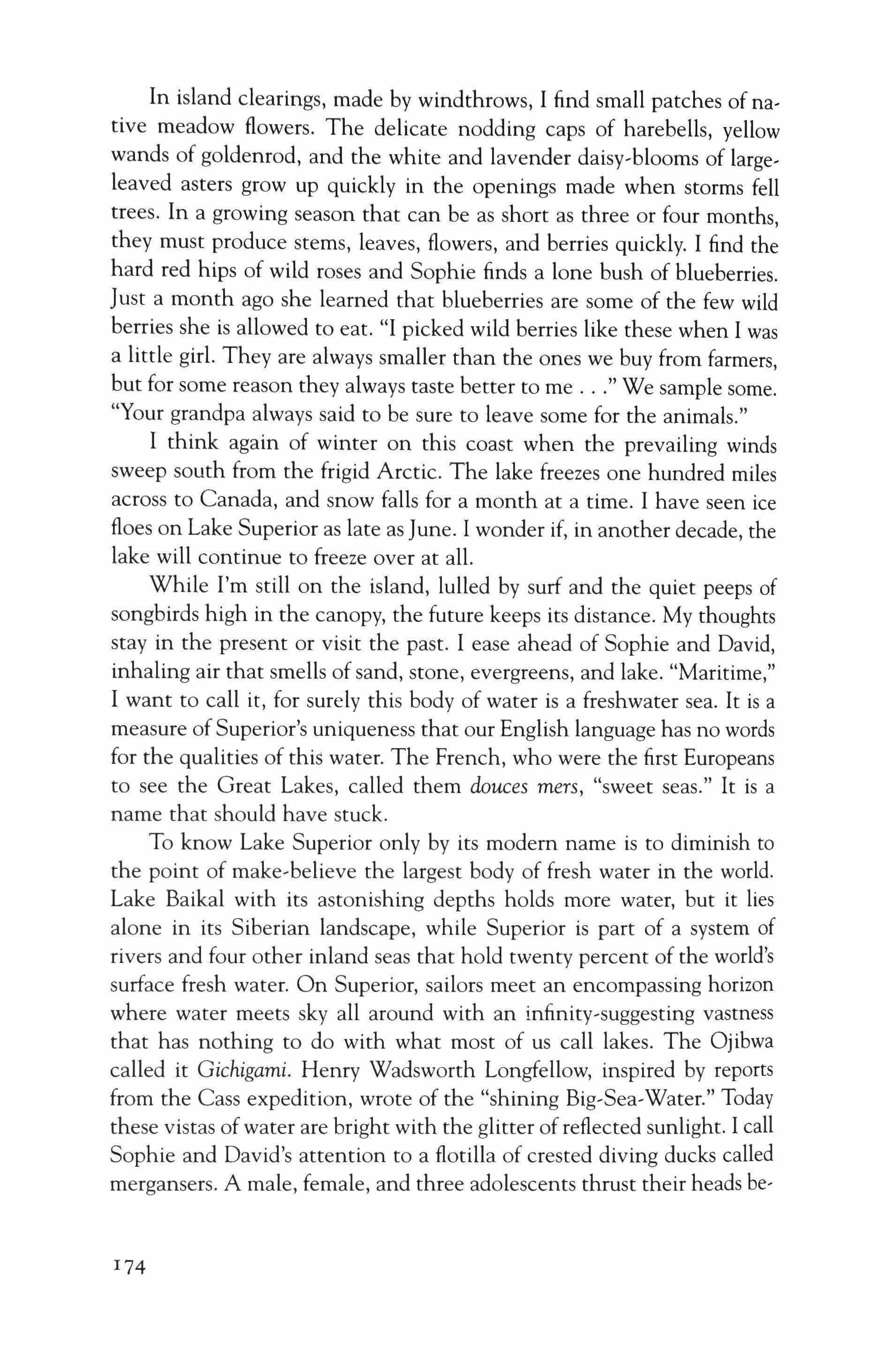
In island clearings, made by windthrows, I find small patches of native meadow flowers. The delicate nodding caps of harebells, yellow wands of goldenrod, and the white and lavender daisy-blooms of largeleaved asters grow up quickly in the openings made when storms fell trees. In a growing season that can be as short as three or four months, they must produce stems, leaves, flowers, and berries quickly. I find the hard red hips of wild roses and Sophie finds a lone bush of blueberries. Just a month ago she learned that blueberries are some of the few wild berries she is allowed to eat. "I picked wild berries like these when I was a little girl. They are always smaller than the ones we buy from farmers, but for some reason they always taste better to me We sample some. "Your grandpa always said to be sure to leave some for the animals."
I think again of winter on this coast when the prevailing winds sweep south from the frigid Arctic. The lake freezes one hundred miles across to Canada, and snow falls for a month at a time. I have seen ice floes on Lake Superior as late as June. I wonder if, in another decade, the lake will continue to freeze over at all.
While I'm still on the island, lulled by surf and the quiet peeps of songbirds high in the canopy, the future keeps its distance. My thoughts stay in the present or visit the past. I ease ahead of Sophie and David, inhaling air that smells of sand, stone, evergreens, and lake. "Maritime," I want to call it, for surely this body of water is a freshwater sea. It is a measure of Superior's uniqueness that our English language has no words for the qualities of this water. The French, who were the first Europeans to see the Great Lakes, called them douces mers, "sweet seas." It is a name that should have stuck.
To know Lake Superior only by its modern name is to diminish to the point of make-believe the largest body of fresh water in the world. Lake Baikal with its astonishing depths holds more water, but it lies alone in its Siberian landscape, while Superior is part of a system of rivers and four other inland seas that hold twenty percent of the world's surface fresh water. On Superior, sailors meet an encompassing horizon where water meets sky all around with an infinity-suggesting vastness that has nothing to do with what most of us call lakes. The Ojibwa called it Gichigami. Henry Wadsworth Longfellow, inspired by reports from the Cass expedition, wrote of the "shining Big-Sea-Water." Today these vistas of water are bright with the glitter ofreflected sunlight. I call Sophie and David's attention to a flotilla of crested diving ducks called mergansers. A male, female, and three adolescents thrust their heads be-
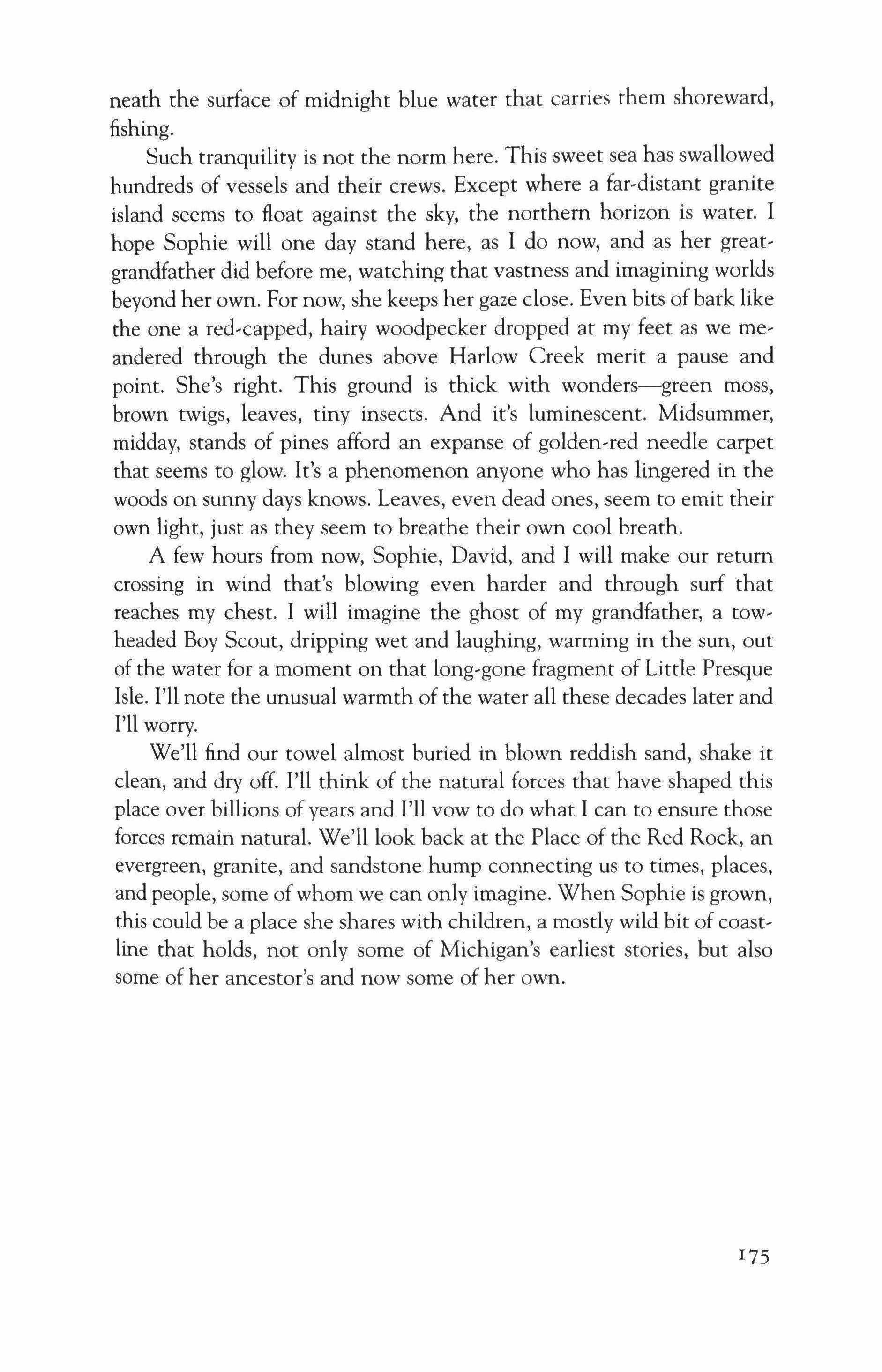
neath the surface of midnight blue water that carries them shoreward, fishing.
Such tranquility is not the norm here. This sweet sea has swallowed hundreds of vessels and their crews. Except where a far-distant granite island seems to float against the sky, the northern horizon is water. I hope Sophie will one day stand here, as I do now, and as her great' grandfather did before me, watching that vastness and imagining worlds beyond her own. For now, she keeps her gaze close. Even bits ofbark like the one a red-capped, hairy woodpecker dropped at my feet as we me' andered through the dunes above Harlow Creek merit a pause and point. She's right. This ground is thick with wonders-green moss, brown twigs, leaves, tiny insects. And it's luminescent. Midsummer, midday, stands of pines afford an expanse of golden-red needle carpet that seems to glow. It's a phenomenon anyone who has lingered in the woods on sunny days knows. Leaves, even dead ones, seem to emit their own light, just as they seem to breathe their own cool breath.
A few hours from now, Sophie, David, and I will make our return crossing in wind that's blowing even harder and through surf that reaches my chest. I will imagine the ghost of my grandfather, a tow, headed Boy Scout, dripping wet and laughing, warming in the sun, out of the water for a moment on that long-gone fragment of Little Presque Isle. I'll note the unusual warmth of the water all these decades later and I'll worry.
We'll find our towel almost buried in blown reddish sand, shake it clean, and dry off. I'll think of the natural forces that have shaped this place over billions of years and I'll vow to do what I can to ensure those forces remain natural. We'll look back at the Place of the Red Rock, an evergreen, granite, and sandstone hump connecting us to times, places, and people, some ofwhom we can only imagine. When Sophie is grown, this could be a place she shares with children, a mostly wild bit of coast' line that holds, not only some of Michigan's earliest stories, but also some of her ancestor's and now some of her own.
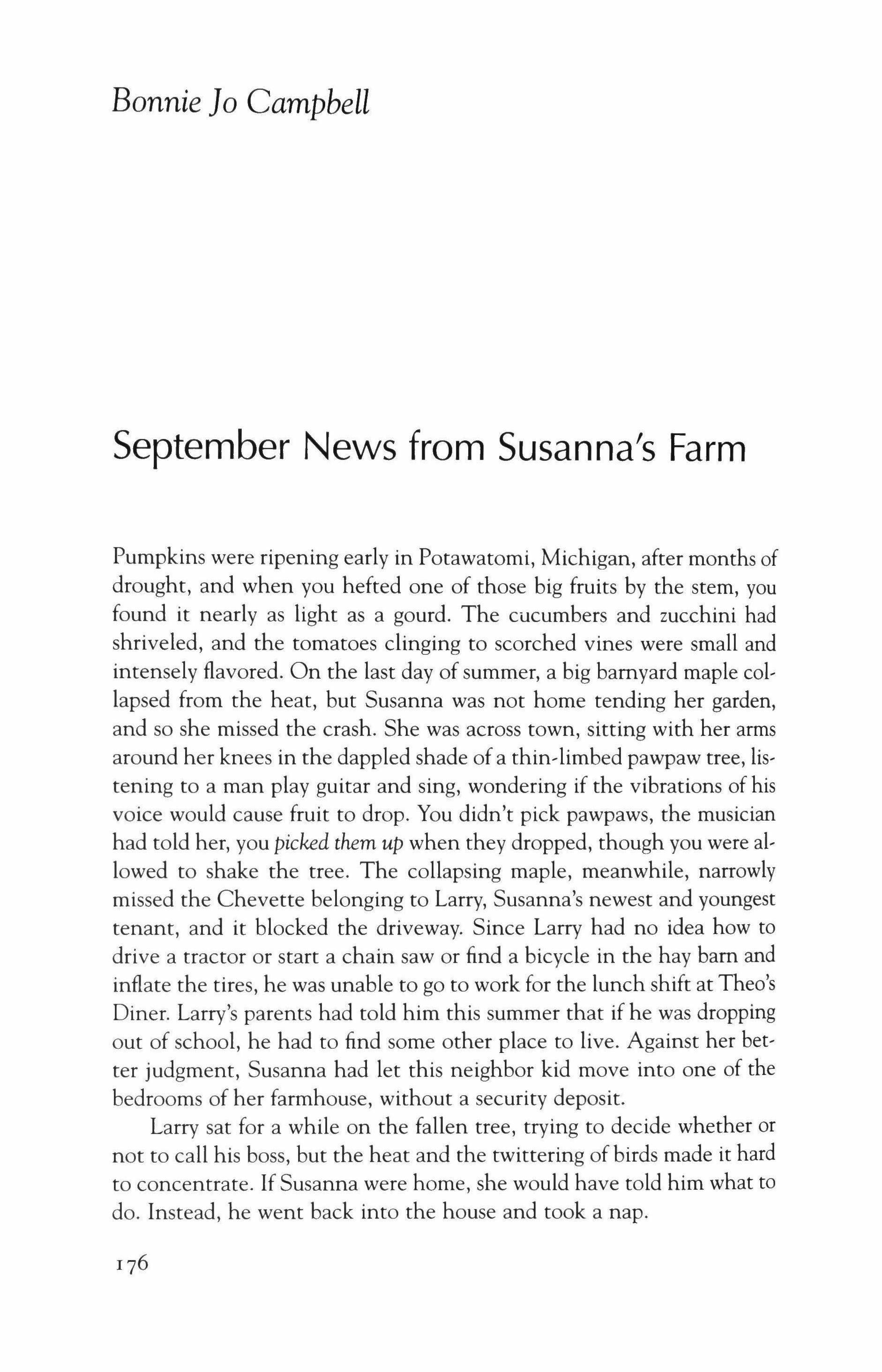
Pumpkins were ripening early in Potawatomi, Michigan, after months of drought, and when you hefted one of those big fruits by the stem, you found it nearly as light as a gourd. The cucumbers and zucchini had shriveled, and the tomatoes clinging to scorched vines were small and intensely flavored. On the last day of summer, a big barnyard maple collapsed from the heat, but Susanna was not home tending her garden, and so she missed the crash. She was across town, sitting with her arms around her knees in the dappled shade of a thin-limbed pawpaw tree, listening to a man play guitar and sing, wondering if the vibrations of his voice would cause fruit to drop. You didn't pick pawpaws, the musician had told her, you picked them up when they dropped, though you were allowed to shake the tree. The collapsing maple, meanwhile, narrowly missed the Chevette belonging to Larry, Susanna's newest and youngest tenant, and it blocked the driveway. Since Larry had no idea how to drive a tractor or start a chain saw or find a bicycle in the hay bam and inflate the tires, he was unable to go to work for the lunch shift at Theo's Diner. Larry's parents had told him this summer that if he was dropping out of school, he had to find some other place to live. Against her better judgment, Susanna had let this neighbor kid move into one of the bedrooms of her farmhouse, without a security deposit. Larry sat for a while on the fallen tree, trying to decide whether or not to call his boss, but the heat and the twittering ofbirds made it hard to concentrate. If Susanna were home, she would have told him what to do. Instead, he went back into the house and took a nap.

Susanna's neighbor and daughter-in-law, Lisa Green, walked up the driveway in search of Susanna, but encountered instead the collapsed tree. Lisa got out of jail last week, which was good news for the subset of Potawatomi Township women who carefully tended their hair and nails (this subset did not include Susanna). Though the women needing cuts and manicures had gone to various salons along Kings Highway in her absence, they had felt disheveled and unbalanced during the months Lisa was locked away for marijuana possession. With her talk about karma and the healing power of personal energy, Lisa provided a spiritual dimension to the women's personal upkeep. Since she'd gotten out of jail, she'd been wearing a radish-sized hunk of quartz on a chain around her neck; the other day she'd insisted Susanna's aura had grown brighter, and she offered to read Susanna's Tarot. Lisa's parents had sold their farmland a few years ago and moved to Florida, leaving Lisa with the little house next door, where she lived with her husband, Susanna's middle son Jeffrey.
Lisa's return was at first a little tense for Jeffrey, who hadn't washed a single dish while Lisa was gone. After about three weeks alone, when every dish in the house was dirty, including Lisa's grandmother's bone china and the wedding crystal, he had carefully boxed the objects and placed them, unwashed, in a comer of the living room, and then bought paper plates and plastic cups. Upon her arrival home, Lisa had demanded an explanation, but Jeffrey didn't know how to say that without her there, he couldn't bear to submerge his hands in warm, soapy water; so he had shrugged. In fact, while Lisa had been in jail, he managed to do little more than go to work and mow the lawn, and he mowed the lawn pretty much every day, sometimes a few times a day, even when the grass was brown and dying from the heat, even when Susanna pulled her truck over and yelled at him to quit it. On the first day of Lisa's freedom, Jeffrey and Lisa spent the whole evening together washing, drying, and putting dishes away, refilling the empty cupboards.
Susanna hadn't seen much ofLisa, hadn't seen much ofher own five kids lately, because she was spending so much time with the musician, especially now that the musician had taken two weeks off from the auto repair shop to mind his pawpaw harvest. Susanna dashed home mornings and evenings to feed the donkeys, pigs, and chickens, and then took off again. But on the day the tree collapsed, she had an afternoon appointment with the veterinarian to have a look at the baby donkey, and she planned to stay home all day. By the time she got there, her youngest son Doug, the only kid of hers still living at home, had dragged the tree

out of the way with the tractor. Susanna drove over the trailing branches. At another time in life, she would have gotten out the chain saw and started cutting the maple into firewood lengths right away, and anybody who showed up would have been pulled into service, but now she stood on the downed tree trunk and marveled. She'd known trees to explode from cold and from lightning strikes, but never from plain old heat. Her own body was strangely warm these days. Her friends told her it was hot flashes, but she wondered if maybe people, too, would begin bursting. When she went into the house, she saw a number eight blinking on the answering machine. She ignored the messages.
Susanna's five children used to complain to each other that she was always calling them and asking them to come over and do work, but now that she'd met the musician, they complained they couldn't get hold of her. There was a note on her desk from her older daughter Rachel, who was as tough and unsentimental as Susanna had ever been: "I came over and weeded for two hours, waiting for you. Your garden looks like a damned jungle." Susanna experienced a twinge of guilt about her garden, but all in all, her neglect made her feel cheerful and liberated, like the ladies who burned their bras way back when.
Undoubtedly the machine had recorded at least one cranky message from Rachel and several weepy ones from Molly, her younger daughter, who had always been a sensitive girl, who had always felt the pain of those around her more keenly than they had felt it themselves, and who, at six months into her first pregnancy, had become a virtual fountain of tears. She cried not just about her uncommunicative boyfriend, but about the outcome of township meetings and about poachers shooting gorillas in Kenya. She seemed to have absorbed the whole world of hurt and was determined to hold onto it for the duration. Susanna didn't know how such a leaky vessel could be sturdy enough to contain a child.
Susanna's tenants had been surprised at how they missed her lately, especially Larry, who had assumed upon moving into the place that he would resent Susanna the way he resented his own parents. When Larry first moved in, Susanna spent most evenings with her feet up on her desk reading library books from a box on the floor. Often when Larry came out of the shower, she had looked up and said, "Did you save any hot water for anybody else?" or she'd mentioned a dirty plate he had left on the table or asked him why he wasn't at work. Nowadays Larry, like the other three tenants, left his weekly rent in her desk drawer, behind the dried up rubber-stamp pads, because Susanna was off with the musician.

This musician was the same musician who ten years ago had been waiting in the parking lot of the Potawatomi Grocery to meet a banjo player driving in from Detroit. From the cab of his truck, the musician saw a woman with wavy hair riding a spotted horse across the railroad tracks. He watched her tie the horse to the pay phone and go into the store. When she came out, she secured her paper bag behind her saddle and rode back across the tracks and up through the park. After the woman had topped a hill and disappeared, the musician closed his eyes and imagined the woman nudging the horse to a gallop, so her long hair would fly around. But the musician had been a married man, who had loved his wife, so much so that when she later died, he had honestly felt he wanted to die alongside her. This June it had been three years since she passed away. This June he had pulled over to the side of the road to help a wavy-haired woman who stood with one foot up on a bumper made of a landscape timber, looking into the engine compartment of a rusting flatbed Ford.
Before the musician had stopped to help her on the road, Susanna had been feeling dragged out and even put-upon. Her farm chores had become more difficult the first day of that month when the donkey [unebug was born and when his mother Jenny decided not to nurse him. At a few days old, the baby donkey seemed a dull creature, and Susanna thought it might be wise to let this one fade away and start again from scratch. Friends and neighbors visited, though, and fussed over [unebug's fluffy hair, said he looked like a plush toy. Her younger daughter Molly had cried at how sweet he looked and had brought over her Humane Society friends to admire him.
Back when Susanna had been struggling to feed and clothe five kids, she would have let nature take its course, but this time she couldn't imagine watching the baby gradually grow weaker unto death. So she picked up the leggy little foal, leaned him against the side of the bam, and force-fed him bottles of mare's milk she reconstituted from powder. She repeated this every few hours, around the clock. He never learned to drink milk from a bowl the way the instructions on the powdered milk bag claimed he would; two consecutive mornings it appeared the baby had finished his bowl of milk, but when Susanna checked on him the next night, she found a twenty-pound possum stretching up on hind legs, supping from the bowl. When the baby was a few weeks old and able to eat some milk pellets, she built a crawl pen with a doorway too low for the mama donkey to enter, but the boy wouldn't go in and eat his pellets unless Susanna pushed him in and latched the gate.
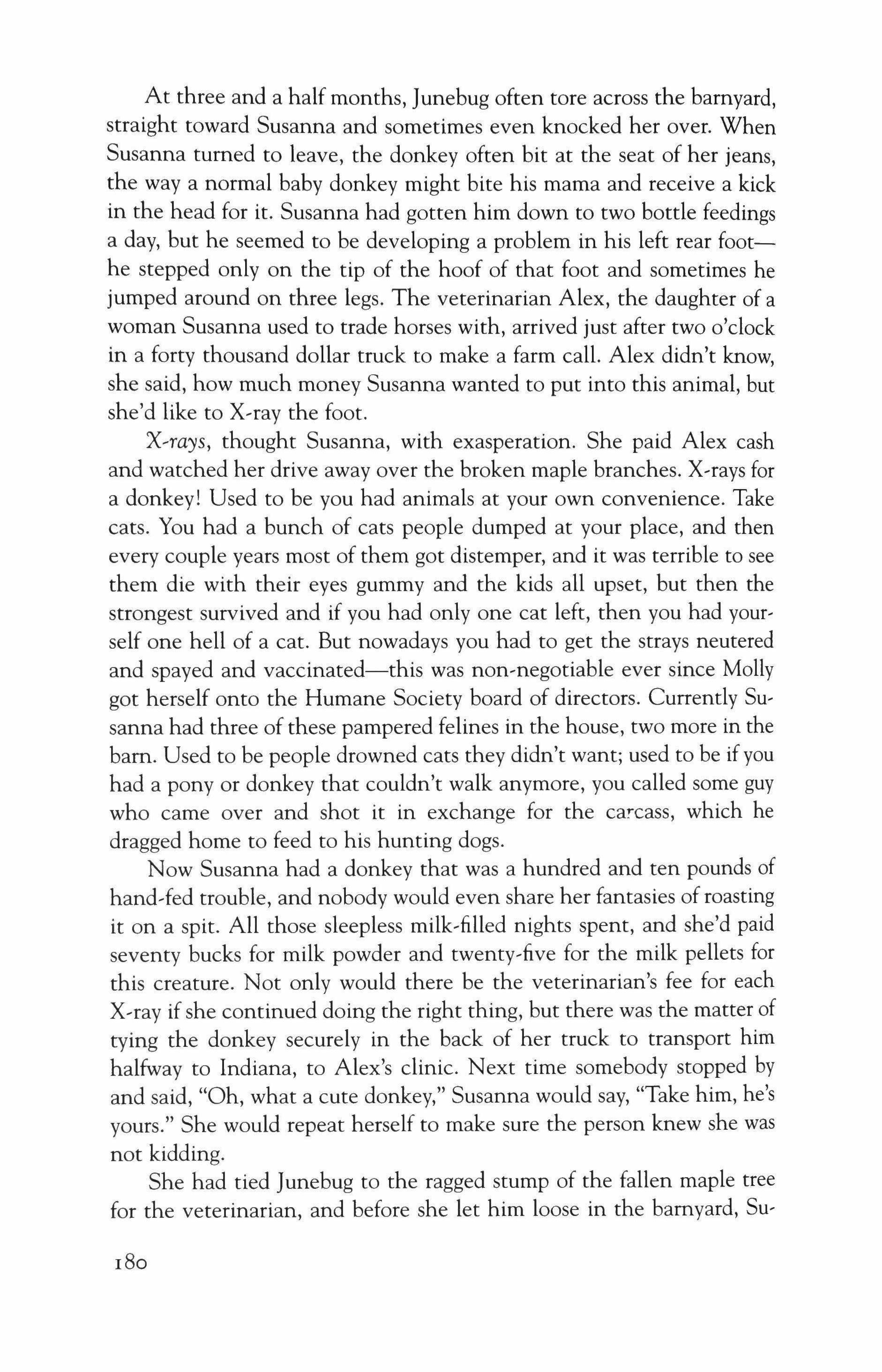
At three and a half months, [unebug often tore across the barnyard, straight toward Susanna and sometimes even knocked her over. When Susanna turned to leave, the donkey often bit at the seat of her jeans, the way a normal baby donkey might bite his mama and receive a kick in the head for it. Susanna had gotten him down to two bottle feedings a day, but he seemed to be developing a problem in his left rear foothe stepped only on the tip of the hoof of that foot and sometimes he jumped around on three legs. The veterinarian Alex, the daughter of a woman Susanna used to trade horses with, arrived just after two o'clock in a forty thousand dollar truck to make a farm call. Alex didn't know, she said, how much money Susanna wanted to put into this animal, but she'd like to Xvray the foot.
X,rays, thought Susanna, with exasperation. She paid Alex cash and watched her drive away over the broken maple branches. X,rays for a donkey! Used to be you had animals at your own convenience. Take cats. You had a bunch of cats people dumped at your place, and then every couple years most of them got distemper, and it was terrible to see them die with their eyes gummy and the kids all upset, but then the strongest survived and if you had only one cat left, then you had yourself one hell of a cat. But nowadays you had to get the strays neutered and spayed and vaccinated-this was non-negotiable ever since Molly got herself onto the Humane Society board of directors. Currently Susanna had three of these pampered felines in the house, two more in the barn. Used to be people drowned cats they didn't want; used to be if you had a pony or donkey that couldn't walk anymore, you called some guy who came over and shot it in exchange for the carcass, which he dragged home to feed to his hunting dogs.
Now Susanna had a donkey that was a hundred and ten pounds of hand-fed trouble, and nobody would even share her fantasies of roasting it on a spit. All those sleepless milk-filled nights spent, and she'd paid seventy bucks for milk powder and twenty,five for the milk pellets for this creature. Not only would there be the veterinarian's fee for each X,ray if she continued doing the right thing, but there was the matter of tying the donkey securely in the back of her truck to transport him halfway to Indiana, to Alex's clinic. Next time somebody stopped by and said, "Oh, what a cute donkey," Susanna would say, "Take him, he's yours." She would repeat herself to make sure the person knew she was not kidding.
She had tied [unebug to the ragged stump of the fallen maple tree for the veterinarian, and before she let him loose in the barnyard, Su-
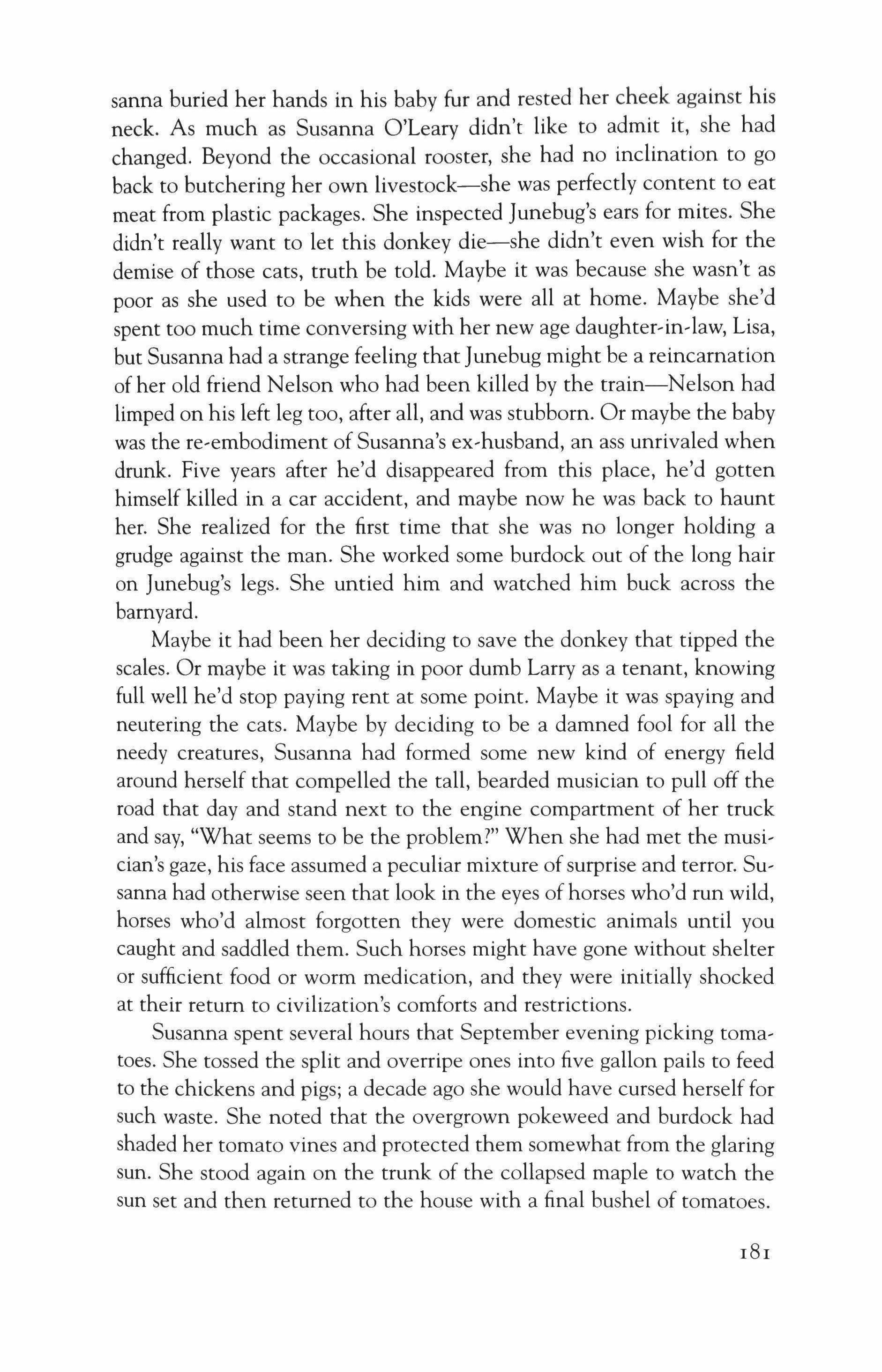
sanna buried her hands in his baby fur and rested her cheek against his neck. As much as Susanna O'Leary didn't like to admit it, she had changed. Beyond the occasional rooster, she had no inclination to go back to butchering her own livestock-she was perfectly content to eat meat from plastic packages. She inspected Junebug's ears for mites. She didn't really want to let this donkey die-she didn't even wish for the demise of those cats, truth be told. Maybe it was because she wasn't as poor as she used to be when the kids were all at home. Maybe she'd spent too much time conversing with her new age daughter,in'law, Lisa, but Susanna had a strange feeling that [unebug might be a reincarnation of her old friend Nelson who had been killed by the train-Nelson had limped on his left leg too, after all, and was stubborn. Or maybe the baby was the re-embodiment of Susanna's ex-husband, an ass unrivaled when drunk. Five years after he'd disappeared from this place, he'd gotten himself killed in a car accident, and maybe now he was back to haunt her. She realized for the first time that she was no longer holding a grudge against the man. She worked some burdock out of the long hair on Junebug's legs. She untied him and watched him buck across the barnyard.
Maybe it had been her deciding to save the donkey that tipped the scales. Or maybe it was taking in poor dumb Larry as a tenant, knowing full well he'd stop paying rent at some point. Maybe it was spaying and neutering the cats. Maybe by deciding to be a damned fool for all the needy creatures, Susanna had formed some new kind of energy field around herself that compelled the tall, bearded musician to pull off the road that day and stand next to the engine compartment of her truck and say, "What seems to be the problem?" When she had met the musidan's gaze, his face assumed a peculiar mixture ofsurprise and terror. Susanna had otherwise seen that look in the eyes of horses who'd run wild, horses who'd almost forgotten they were domestic animals until you caught and saddled them. Such horses might have gone without shelter or sufficient food or worm medication, and they were initially shocked at their return to civilization's comforts and restrictions.
Susanna spent several hours that September evening picking tomatoes. She tossed the split and overripe ones into five gallon pails to feed to the chickens and pigs; a decade ago she would have cursed herself for such waste. She noted that the overgrown pokeweed and burdock had shaded her tomato vines and protected them somewhat from the glaring sun. She stood again on the trunk of the collapsed maple to watch the sun set and then returned to the house with a final bushel of tomatoes.
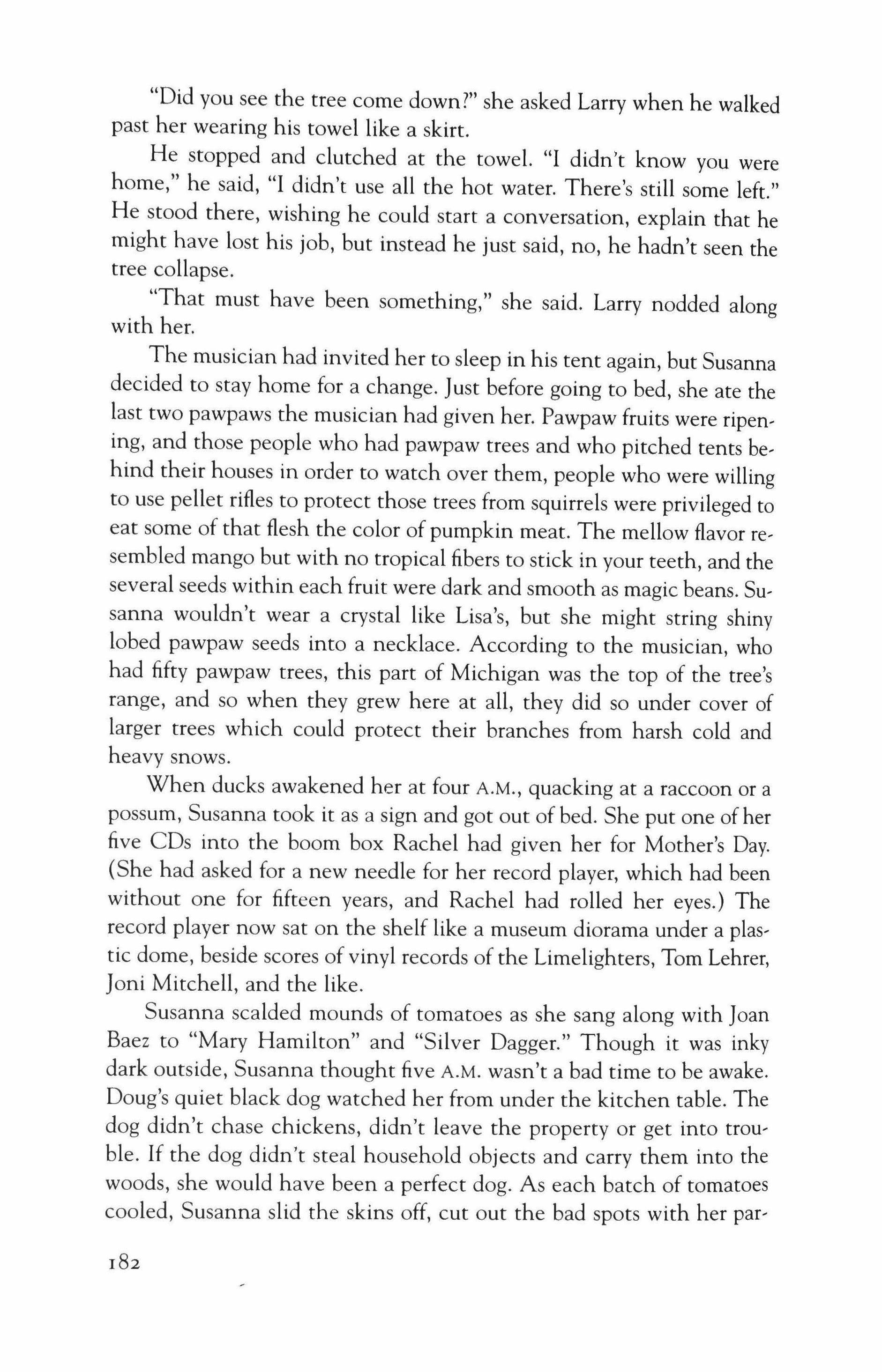
"Did you see the tree come down?" she asked Larry when he walked past her wearing his towel like a skirt.
He stopped and clutched at the towel. "I didn't know you were home," he said, "I didn't use all the hot water. There's still some left." He stood there, wishing he could start a conversation, explain that he might have lost his job, but instead he just said, no, he hadn't seen the tree collapse.
"That must have been something," she said. Larry nodded along with her.
The musician had invited her to sleep in his tent again, but Susanna decided to stay home for a change. Just before going to bed, she ate the last two pawpaws the musician had given her. Pawpaw fruits were ripening, and those people who had pawpaw trees and who pitched tents behind their houses in order to watch over them, people who were willing to use pellet rifles to protect those trees from squirrels were privileged to eat some of that flesh the color of pumpkin meat. The mellow flavor resembled mango but with no tropical fibers to stick in your teeth, and the several seeds within each fruit were dark and smooth as magic beans. Susanna wouldn't wear a crystal like Lisa's, but she might string shiny lobed pawpaw seeds into a necklace. According to the musician, who had fifty pawpaw trees, this part of Michigan was the top of the tree's range, and so when they grew here at all, they did so under cover of larger trees which could protect their branches from harsh cold and heavy snows.
When ducks awakened her at four A.M., quacking at a raccoon or a possum, Susanna took it as a sign and got out of bed. She put one of her five CDs into the boom box Rachel had given her for Mother's Day. (She had asked for a new needle for her record player, which had been without one for fifteen years, and Rachel had rolled her eyes.) The record player now sat on the shelf like a museum diorama under a plastic dome, beside scores of vinyl records of the Limelighters, Tom Lehrer, [oni Mitchell, and the like.
Susanna scalded mounds of tomatoes as she sang along with Joan Baez to "Mary Hamilton" and "Silver Dagger." Though it was inky dark outside, Susanna thought five A.M. wasn't a bad time to be awake. Doug's quiet black dog watched her from under the kitchen table. The dog didn't chase chickens, didn't leave the property or get into trouble. If the dog didn't steal household objects and carry them into the woods, she would have been a perfect dog. As each batch of tomatoes cooled, Susanna slid the skins off, cut out the bad spots with her par-
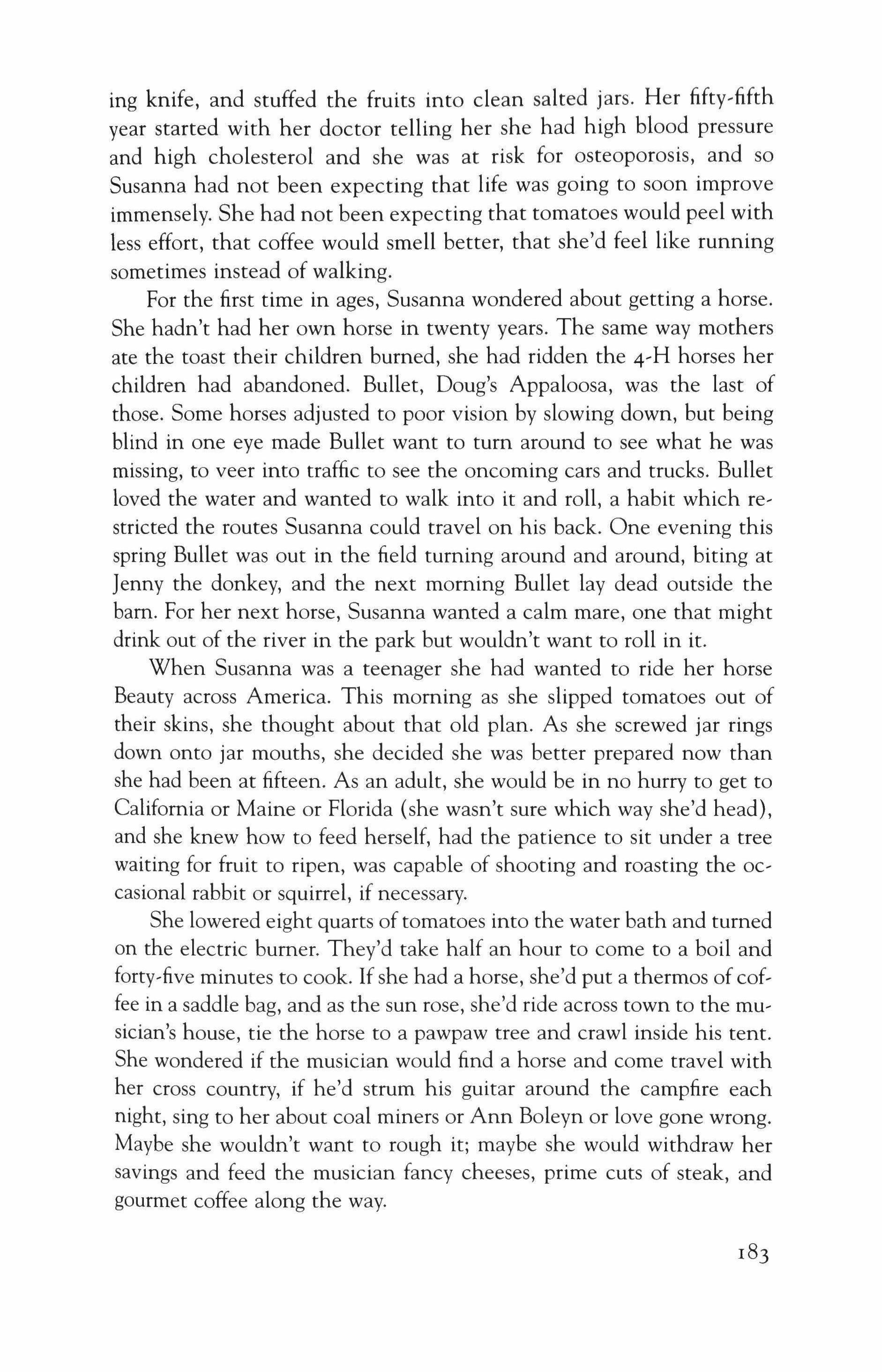
ing knife, and stuffed the fruits into clean salted jars. Her fifty-fifth year started with her doctor telling her she had high blood pressure and high cholesterol and she was at risk for osteoporosis, and so Susanna had not been expecting that life was going to soon improve immensely. She had not been expecting that tomatoes would peel with less effort, that coffee would smell better, that she'd feel like running sometimes instead of walking.
For the first time in ages, Susanna wondered about getting a horse. She hadn't had her own horse in twenty years. The same way mothers ate the toast their children burned, she had ridden the 4-H horses her children had abandoned. Bullet, Doug's Appaloosa, was the last of those. Some horses adjusted to poor vision by slowing down, but being blind in one eye made Bullet want to turn around to see what he was missing, to veer into traffic to see the oncoming cars and trucks. Bullet loved the water and wanted to walk into it and roll, a habit which restricted the routes Susanna could travel on his back. One evening this spring Bullet was out in the field turning around and around, biting at Jenny the donkey, and the next morning Bullet lay dead outside the bam. For her next horse, Susanna wanted a calm mare, one that might drink out of the river in the park but wouldn't want to roll in it.
When Susanna was a teenager she had wanted to ride her horse Beauty across America. This morning as she slipped tomatoes out of their skins, she thought about that old plan. As she screwed jar rings down onto jar mouths, she decided she was better prepared now than she had been at fifteen. As an adult, she would be in no hurry to get to California or Maine or Florida (she wasn't sure which way she'd head), and she knew how to feed herself, had the patience to sit under a tree waiting for fruit to ripen, was capable of shooting and roasting the occasional rabbit or squirrel, if necessary.
She lowered eight quarts of tomatoes into the water bath and turned on the electric burner. They'd take half an hour to come to a boil and forty-five minutes to cook. If she had a horse, she'd put a thermos of coffee in a saddle bag, and as the sun rose, she'd ride across town to the musician's house, tie the horse to a pawpaw tree and crawl inside his tent. She wondered if the musician would find a horse and come travel with her cross country, if he'd strum his guitar around the campfire each night, sing to her about coal miners or Ann Boleyn or love gone wrong. Maybe she wouldn't want to rough it; maybe she would withdraw her savings and feed the musician fancy cheeses, prime cuts of steak, and gourmet coffee along the way.
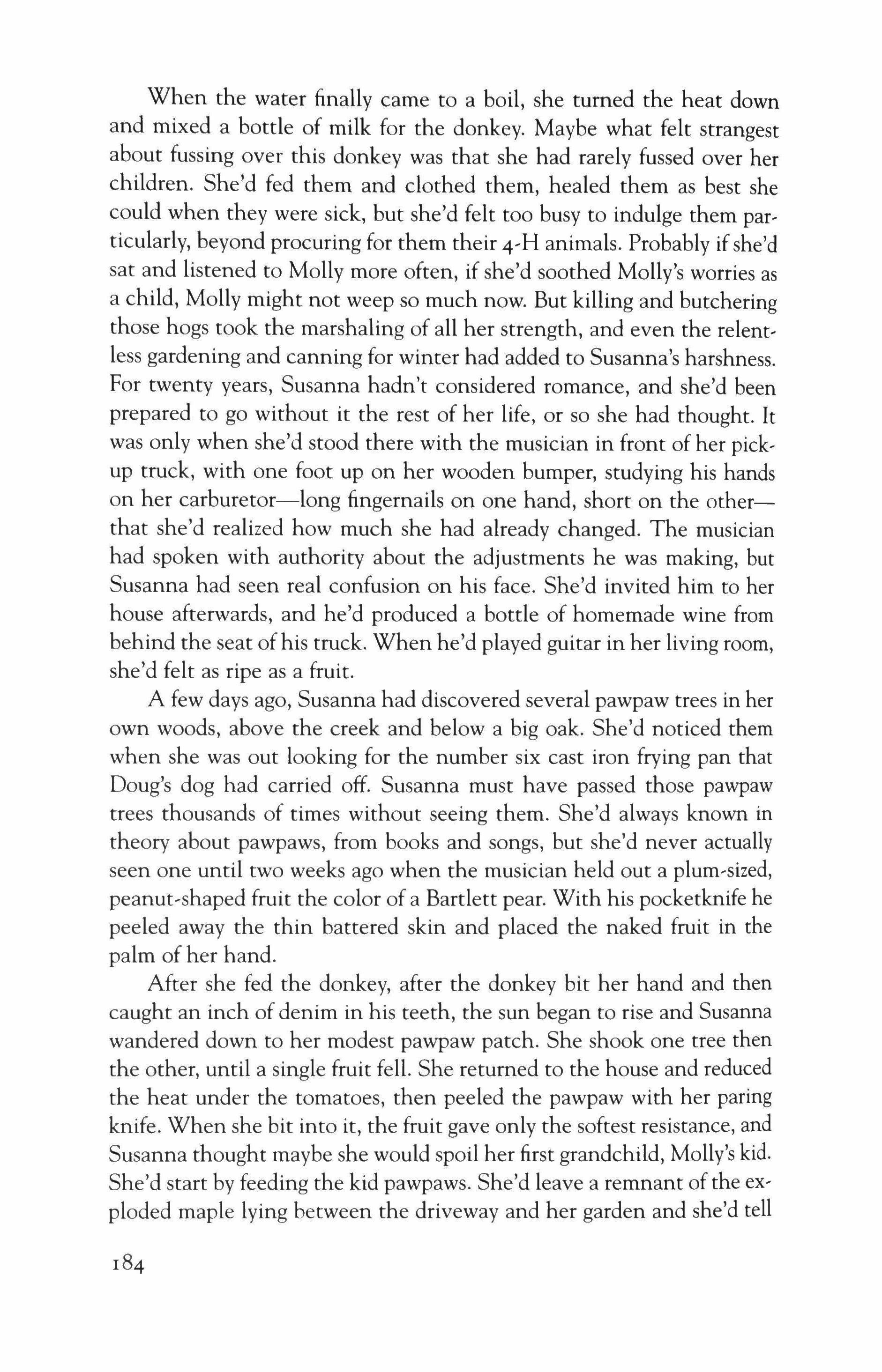
When the water finally came to a boil, she turned the heat down and mixed a bottle of milk for the donkey. Maybe what felt strangest about fussing over this donkey was that she had rarely fussed over her children. She'd fed them and clothed them, healed them as best she could when they were sick, but she'd felt too busy to indulge them particularly, beyond procuring for them their 4-H animals. Probably ifshe'd sat and listened to Molly more often, if she'd soothed Molly's worries as a child, Molly might not weep so much now. But killing and butchering those hogs took the marshaling of all her strength, and even the relentless gardening and canning for winter had added to Susanna's harshness. For twenty years, Susanna hadn't considered romance, and she'd been prepared to go without it the rest of her life, or so she had thought. It was only when she'd stood there with the musician in front of her pickup truck, with one foot up on her wooden bumper, studying his hands on her carburetor-long fingernails on one hand, short on the otherthat she'd realized how much she had already changed. The musician had spoken with authority about the adjustments he was making, but Susanna had seen real confusion on his face. She'd invited him to her house afterwards, and he'd produced a bottle of homemade wine from behind the seat ofhis truck. When he'd played guitar in her living room, she'd felt as ripe as a fruit.
A few days ago, Susanna had discovered several pawpaw trees in her own woods, above the creek and below a big oak. She'd noticed them when she was out looking for the number six cast iron frying pan that Doug's dog had carried off. Susanna must have passed those pawpaw trees thousands of times without seeing them. She'd always known in theory about pawpaws, from books and songs, but she'd never actually seen one until two weeks ago when the musician held out a plum-sized, peanut-shaped fruit the color of a Bartlett pear. With his pocketknife he peeled away the thin battered skin and placed the naked fruit in the palm of her hand.
After she fed the donkey, after the donkey bit her hand and then caught an inch of denim in his teeth, the sun began to rise and Susanna wandered down to her modest pawpaw patch. She shook one tree then the other, until a single fruit fell. She returned to the house and reduced the heat under the tomatoes, then peeled the pawpaw with her paring knife. When she bit into it, the fruit gave only the softest resistance, and Susanna thought maybe she would spoil her first grandchild, Molly's kid. She'd start by feeding the kid pawpaws. She'd leave a remnant of the exploded maple lying between the driveway and her garden and she'd tell
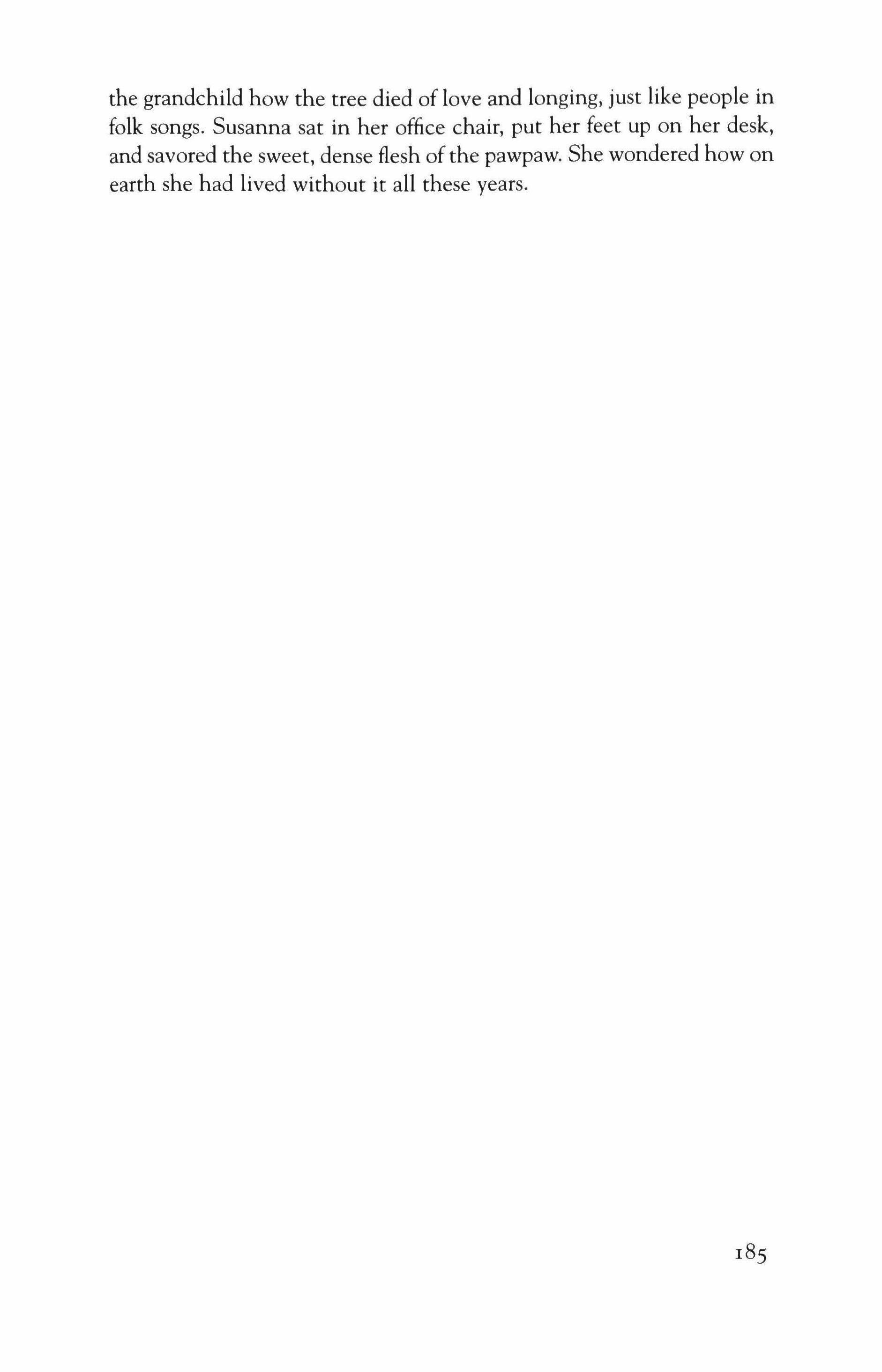
the grandchild how the tree died of love and longing, just like people in folk songs. Susanna sat in her office chair, put her feet up on her desk, and savored the sweet, dense flesh of the pawpaw. She wondered how on earth she had lived without it all these years.

Faith of our fathers, we will strive To win all nations unto Thee; And through the truth that comes from God, We all shall then be truly free.
Frederick W. Faber, Faith of Our FathersAt six A.M. on the morning of Adam Haskins's funeral, as bam lights were coming to life all across Elysian Fields, a storm rolled through-not a thunderboomer, just a quick, hard soaker that ruined the haying for the day and drenched any man or beast unlucky enough to be out in the open before the morning milking. Those who had already begun before the first drops hit the fly-specked and whitewash-stained windows lining their barns paused in the middle of switching softly-clinking surcingles from one cow's back to another or washing an udder or hefting a full milker to stare out at the downpour and thank their lucky stars that they hadn't been caught in it, though that momentary relief came not unmixed with disgust at the image of rain pounding the windrows of hay stretching in long, snaking lines out in their slickening fields. By the time the rain let up a half-hour later, stopping as abruptly as it had begun, they were a dozen cows farther down the line and had already given up hope that their hay would be dry enough to go or that they could get a sprayer through the muddy fields. Thoughts turned to calcu-

lating what they could get done today before it was time to bathe, dress, and drive into town for the service. Once again, it appeared as if Gump Haskins had a direct line to the Almighty, as if he had summoned up this rain so that no one but no one who valued pride, hide, or farm would have the slightest excuse to miss this funeral.
By one-thirty, a half-hour before it was to begin, cars and pickups had already filled the parking lot that wrapped around St. John's Episcopal Church and were lining the streets for two blocks in every direction. As more vehicles wound in, Don Croswell, whose land butted up against the church property, walked out onto his porch with his wife Sheila on his way to the service, saw the jam-up developing at the entrance to the packed lot, and went over to the back corner to swing open a gate into his field. He began signaling folks in, and fifteen min' utes later, forty, maybe fifty, cars were strung out in long, ragged lines on the hay stubble.
The cars kept coming, jouncing out into the field, couples sliding from their seats into the steaming heat and greeting each other in soft voices, respectful even out here in the open, fifty yards from the church. Young, sunburned farmers, heavily muscled and already sweating uncomfortably in their tight-collared white shirts under dark suits, joined their neighbors and moved toward the open gate, trailed by wives dressed in muted colors and digging through shiny, black vinyl purses to double-check their supply of Kleenex one last time before the sure,to' be heartrending service. They merged with older folks in the parking lot, where a few spaces had been saved for those from Gump's genera' tion, gray-hatred men smelling of Old Spice and perfectly coiffed women in print dresses urging themselves up off the bench seats of their Chevy Impalas and Chrysler Imperials and picking their solemn way across the treacherous gravel toward the open church doors. Here and there, lone men emerged from big Buicks or Olds 88s, wearing the blue serge and matching ties that marked them as bankers and downtown businessmen here to do their duty to a good customer-checking their watches and casting nervous glances at the lanes between the cars as they calculated their chances of escaping to their air,conditioned offices when the long line of vehicles, headlights switched on, formed for the procession to the cemetery afterward.
Folks kept coming and coming, friends, relatives, simple acquaintances of the deceased, all shaking their heads in muttering, querulous disbelief at one another about the accident, Adam dead before his time, cut off in the prime of life, so tragic, a young guy like that dying with so
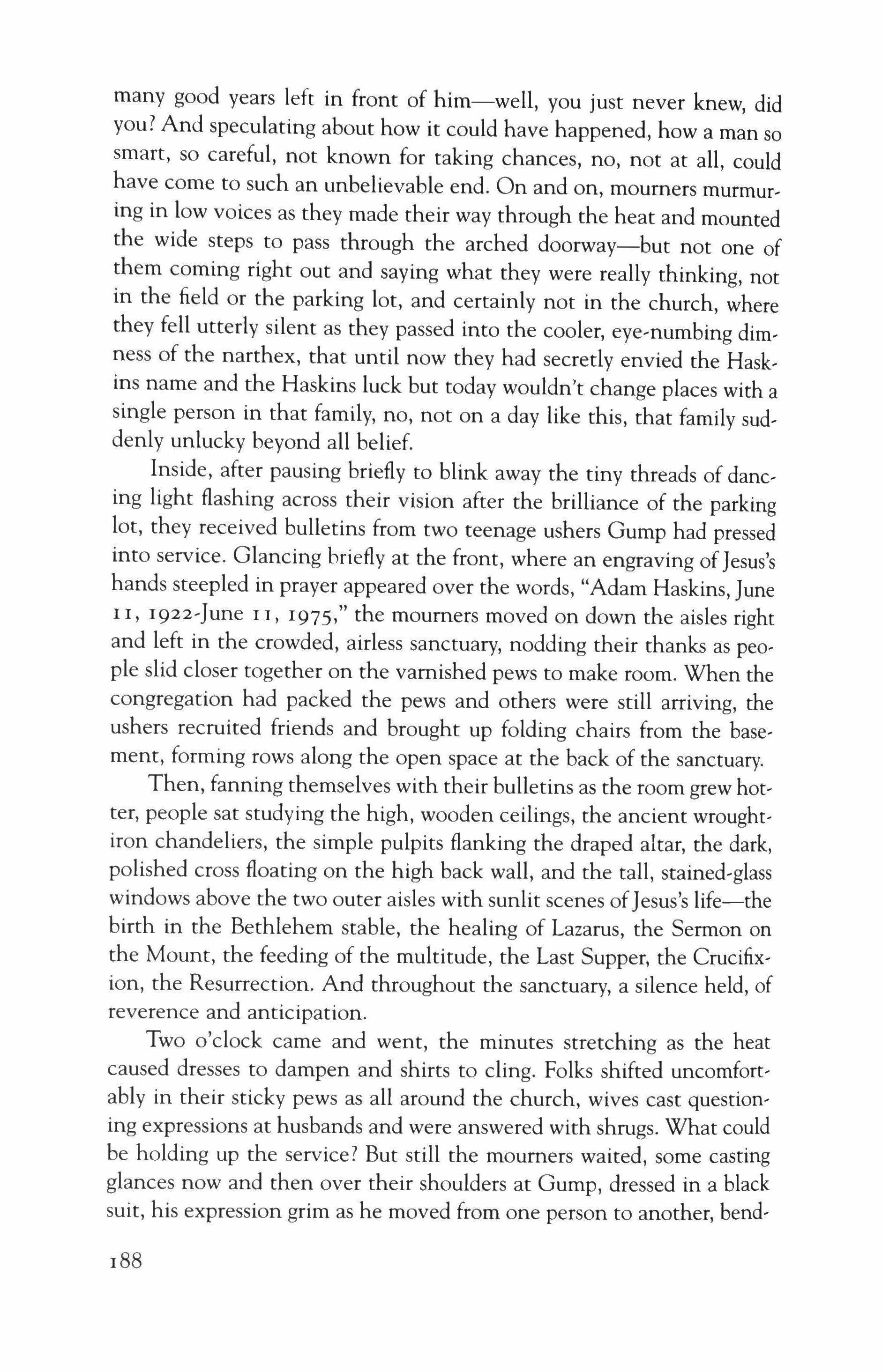
many good years left in front of him-well, you just never knew, did you? And speculating about how it could have happened, how a man so smart, so careful, not known for taking chances, no, not at all, could have come to such an unbelievable end. On and on, mourners murmuring in low voices as they made their way through the heat and mounted the wide steps to pass through the arched doorway-but not one of them coming right out and saying what they were really thinking, not in the field or the parking lot, and certainly not in the church, where they fell utterly silent as they passed into the cooler, eye-numbing dimness of the narthex, that until now they had secretly envied the Haskins name and the Haskins luck but today wouldn't change places with a single person in that family, no, not on a day like this, that family suddenly unlucky beyond all belief.
Inside, after pausing briefly to blink away the tiny threads of dancing light flashing across their vision after the brilliance of the parking lot, they received bulletins from two teenage ushers Gump had pressed into service. Glancing briefly at the front, where an engraving of Jesus's hands steepled in prayer appeared over the words, "Adam Haskins, June I I, 1922-June I I, 1975," the mourners moved on down the aisles right and left in the crowded, airless sanctuary, nodding their thanks as people slid closer together on the varnished pews to make room. When the congregation had packed the pews and others were still arriving, the ushers recruited friends and brought up folding chairs from the basement, forming rows along the open space at the back of the sanctuary.
Then, fanning themselves with their bulletins as the room grew hotter, people sat studying the high, wooden ceilings, the ancient wroughtiron chandeliers, the simple pulpits flanking the draped altar, the dark, polished cross floating on the high back wall, and the tall, stained-glass windows above the two outer aisles with sunlit scenes ofJesus's life-the birth in the Bethlehem stable, the healing of Lazarus, the Sermon on the Mount, the feeding of the multitude, the Last Supper, the Crucifixion, the Resurrection. And throughout the sanctuary, a silence held, of reverence and anticipation.
Two o'clock came and went, the minutes stretching as the heat caused dresses to dampen and shirts to cling. Folks shifted uncomfortably in their sticky pews as all around the church, wives cast questioning expressions at husbands and were answered with shrugs. What could be holding up the service? But still the mourners waited, some casting glances now and then over their shoulders at Gump, dressed in a black suit, his expression grim as he moved from one person to another, bend-
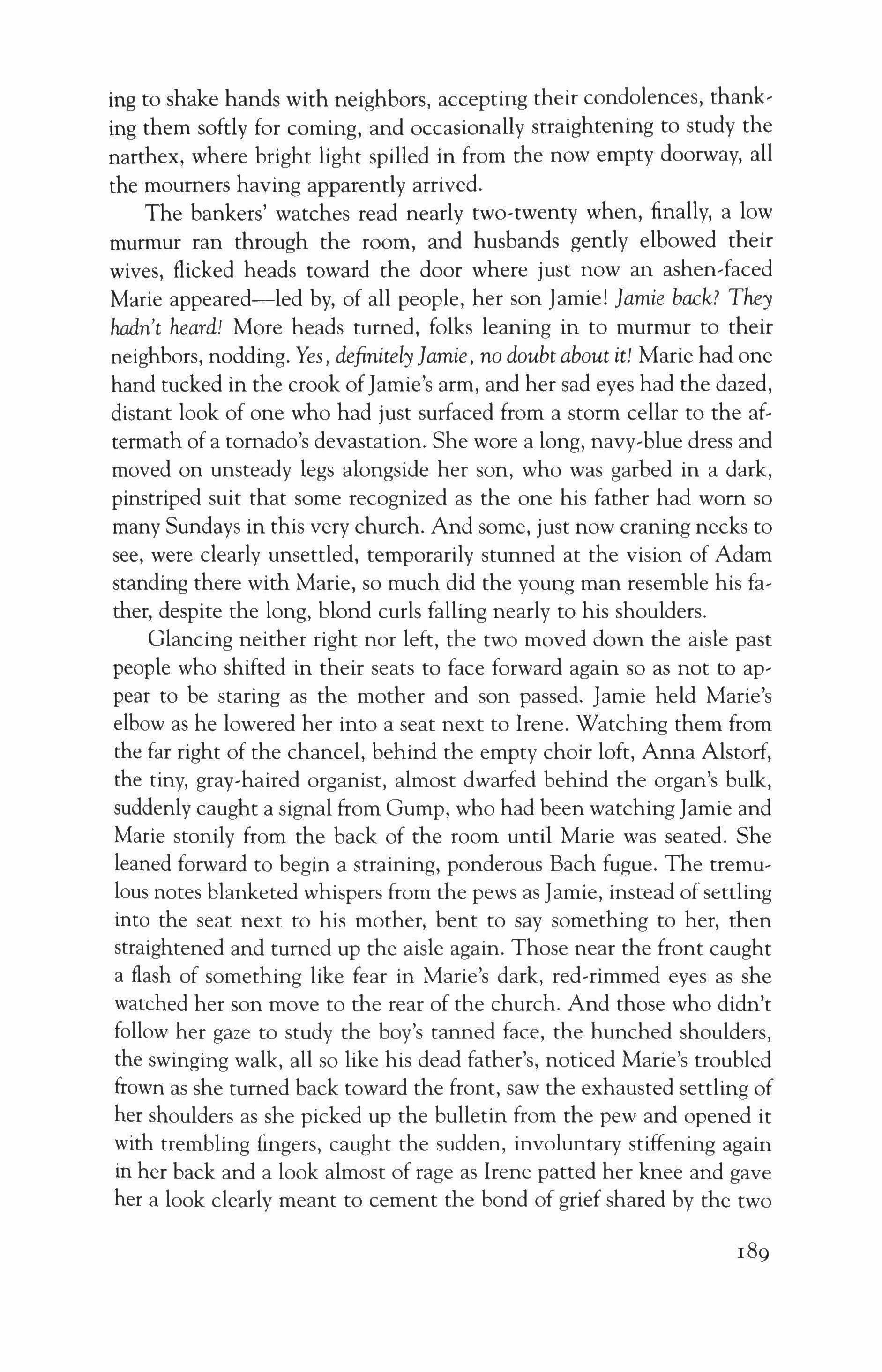
ing to shake hands with neighbors, accepting their condolences, thanking them softly for coming, and occasionally straightening to study the narthex, where bright light spilled in from the now empty doorway, all the mourners having apparently arrived.
The bankers' watches read nearly two-twenty when, finally, a low murmur ran through the room, and husbands gently elbowed their wives, flicked heads toward the door where just now an ashen-faced Marie appeared-led by, of all people, her son Jamie! Jamie back? They hadn't heard! More heads turned, folks leaning in to murmur to their neighbors, nodding. Yes, definitely Jamie, no doubt about it! Marie had one hand tucked in the crook ofJamie's arm, and her sad eyes had the dazed, distant look of one who had just surfaced from a storm cellar to the aftermath of a tornado's devastation. She wore a long, navy-blue dress and moved on unsteady legs alongside her son, who was garbed in a dark, pinstriped suit that some recognized as the one his father had worn so many Sundays in this very church. And some, just now craning necks to see, were clearly unsettled, temporarily stunned at the vision of Adam standing there with Marie, so much did the young man resemble his father, despite the long, blond curls falling nearly to his shoulders.
Glancing neither right nor left, the two moved down the aisle past people who shifted in their seats to face forward again so as not to appear to be staring as the mother and son passed. Jamie held Marie's elbow as he lowered her into a seat next to Irene. Watching them from the far right of the chancel, behind the empty choir loft, Anna Alstorf, the tiny, gray-haired organist, almost dwarfed behind the organ's bulk, suddenly caught a signal from Gump, who had been watching Jamie and Marie stonily from the back of the room until Marie was seated. She leaned forward to begin a straining, ponderous Bach fugue. The tremulous notes blanketed whispers from the pews as Jamie, instead of settling into the seat next to his mother, bent to say something to her, then straightened and turned up the aisle again. Those near the front caught a flash of something like fear in Marie's dark, red-rimmed eyes as she watched her son move to the rear of the church. And those who didn't follow her gaze to study the boy's tanned face, the hunched shoulders, the swinging walk, all so like his dead father's, noticed Marie's troubled frown as she turned back toward the front, saw the exhausted settling of her shoulders as she picked up the bulletin from the pew and opened it with trembling fingers, caught the sudden, involuntary stiffening again in her back and a look almost of rage as Irene patted her knee and gave her a look clearly meant to cement the bond of grief shared by the two

women, as if to say, "There's no escaping the pain, dear, but you and I will get through it somehow," watched as Marie shrugged her mother,in, law off and began reading the bulletin wordlessly.
And though no one, not even those on the folding chairs under, neath the high, stained glass windows back behind Gump, ventured a comment, they couldn't help but notice the flaw in the portrait of family unity and invulnerability that Harmon Haskins had always insisted upon painting for the world. Surprised, curiosity piqued, the generous ones, those whose Christian principles ran to their very marrow, wrote it off as a temporary aberration brought on by events that would test any family- "There but for the grace of God " -and averted their eyes, while others, less charitably, maybe even with a touch of smugness at fl., nally discovering the errant brush stroke in the Haskins portrait, saw at last their secret suspicions confirmed-namely, that Adam, not his fa, ther, had been the glue that held this family together. Silently, they wondered to themselves what would happen now that he was gone. Would everything fall apart at last? Had the vaunted Haskins luck turned? Neighbors and bankers alike, though not without shame at the thought, speculated to themselves about whether Harmon would have to sell his land and his herd. They would bring a pretty penny. Land that fertile, cattle that perfect would be worth the price, whatever it turned out to be. And what other option did Harmon have? None that they could see.
Reaching an alcove off to one side at the back ofthe room, Jamie was met by a phalanx of eight large men in dark suits standing in a loose semicircle. They came to attention as he approached, dropped their arms to their sides, and offered solemn nods or restrained smiles of greeting.
"I believe you know all of these men."
Startled, Jamie jerked left to see his grandfather, who had materialized silently at his shoulder. He nodded to Gump and turned back to the men again. All of them were cousins and uncles except for one whom Jamie recognized as George Pederson, a huge mountain of a man with a terribly red face and tiny purple veins scattergunning his wide nose. Gump stepped forward and said something in a low voice to the men, whose gazes went to curious, almost befuddled expressions, then landed in unison on George. Gump slid to one side, and George took a step forward, leaning forward to speak into Jamie's ear, "Would you like to be a pallbearer, Jamie? I'd be more than willing to give up my spot."
Jamie shook his head and took a small step back, feeling suddenly

claustrophobic in George's towering presence. "No," he said. "You go ahead. I think my mother needs me more than my dad today."
George straightened, taken aback, and Jamie waved an apology. "Fine," George said simply, resumed a grave expression, and rejoined the group. Jamie shot a glance over his shoulder at Gump, whose irritation was etched in his high forehead and hard stare. Then, Gump yanked that great jaw at the men, and, like drapes opening, the pall, bearers floated away to either side, revealing a casket the color of unburnished brass, closed, with shiny brass handholds along the sides, resting on a long, wheeled dolly that looked flimsy enough to collapse at any moment. At one end, a sad,eyed man with wispy, gray hair, whom Jamie recognized immediately as the undertaker Phil Bergman, stood solemnly in a black suit, hands folded at his waist, silently watching him.
Jamie approached the casket on suddenly rubbery legs, laid a hand on its smooth, warm rim to steady himself. Inside lay the man who had given him life, and who, now dead, would never say his name again, would never again ask, "So how are things going, son?" How could you comprehend the mystery in all of that? How could you begin to say good-bye?
Aware that he was holding up the service, that the mourners behind him were watching, no doubt sneaking glances at their watches, he bowed his head as if in prayer and closed his eyes against the hot breath of fear and memory that surged inside of him. And then, to his surprise, a prayer did come to him, unbidden, the first real prayer he had offered in years. Eyes pressed shut, he did not speak the words out loud but heard his own voice say, "Dear God, please watch over the soul of this man, my father. A good man. Let him have peace and a resting place with other good men. Give my mother strength now and in the days to come to deal with all of this." He paused, thinking suddenly of Buck, and added, "And Lord, when my time comes to do the work that needs doing, give me the strength to do it well. Amen." The words sounded clean and pure in his ears, taking with them all awareness of the people lining the pews, of Gump and the men alongside him watching intently, of the mournful music winding up to the high, dark rafters. Now it was just the two of them-himself and his father, dead and gone to some mysterious, unreachable place. Forever.
After a time, from the dim reaches of consciousness, he became aware that his grandfather had moved to the end of the casket and was whispering to someone. He heard a voice answer, "Yes, of course,"
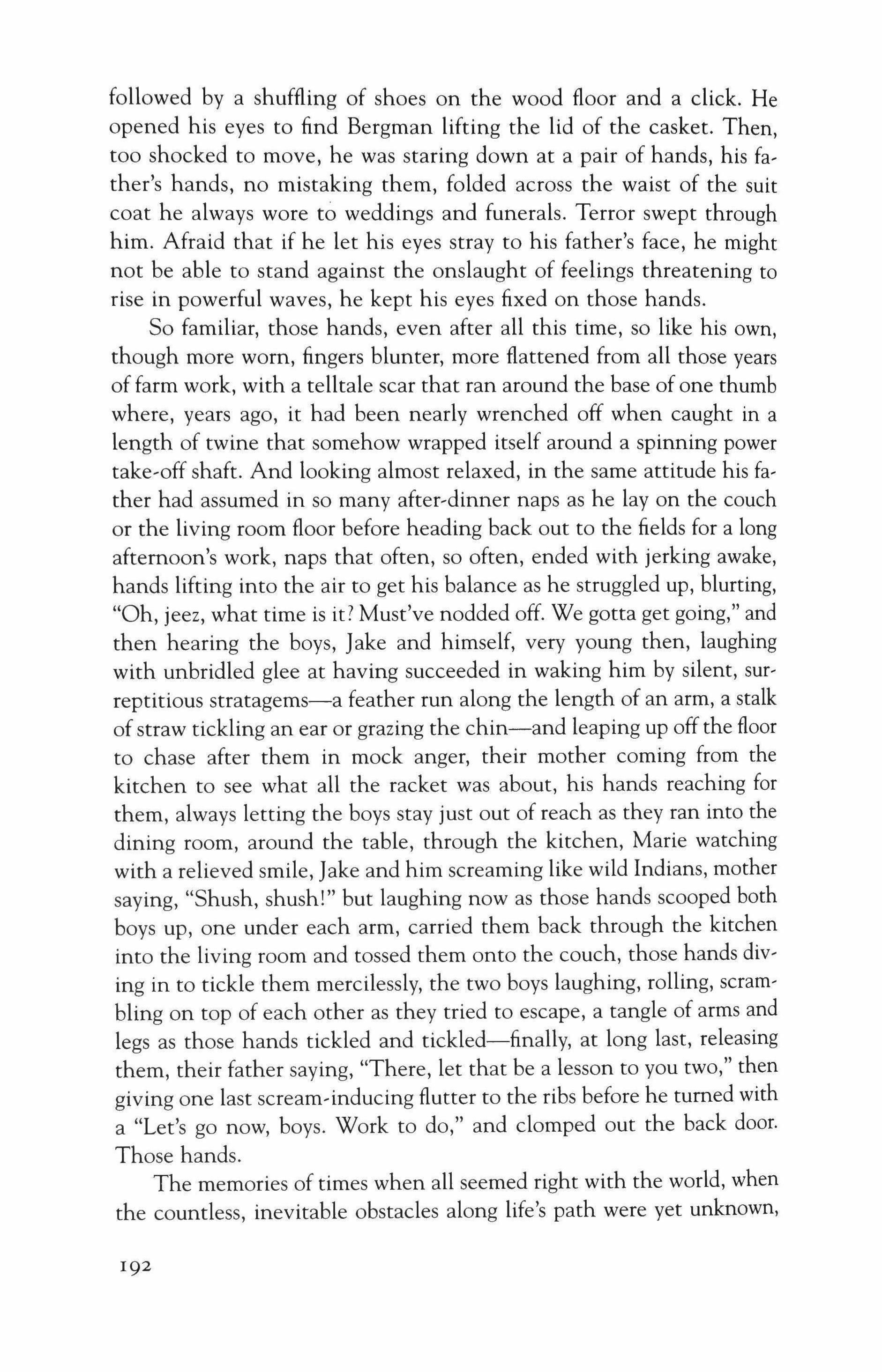
followed by a shuffling of shoes on the wood floor and a click. He opened his eyes to find Bergman lifting the lid of the casket. Then, too shocked to move, he was staring down at a pair of hands, his father's hands, no mistaking them, folded across the waist of the suit coat he always wore to weddings and funerals. Terror swept through him. Afraid that if he let his eyes stray to his father's face, he might not be able to stand against the onslaught of feelings threatening to rise in powerful waves, he kept his eyes fixed on those hands.
So familiar, those hands, even after all this time, so like his own, though more worn, fingers blunter, more flattened from all those years of farm work, with a telltale scar that ran around the base of one thumb where, years ago, it had been nearly wrenched off when caught in a length of twine that somehow wrapped itself around a spinning power take-off shaft. And looking almost relaxed, in the same attitude his father had assumed in so many after-dinner naps as he lay on the couch or the living room floor before heading back out to the fields for a long afternoon's work, naps that often, so often, ended with jerking awake, hands lifting into the air to get his balance as he struggled up, blurting, "Oh, jeez, what time is it? Must've nodded off. We gotta get going," and then hearing the boys, Jake and himself, very young then, laughing with unbridled glee at having succeeded in waking him by silent, surreptitious stratagems-a feather run along the length of an arm, a stalk of straw tickling an ear or grazing the chin-and leaping up off the floor to chase after them in mock anger, their mother coming from the kitchen to see what all the racket was about, his hands reaching for them, always letting the boys stay just out of reach as they ran into the dining room, around the table, through the kitchen, Marie watching with a relieved smile, Jake and him screaming like wild Indians, mother saying, "Shush, shush!" but laughing now as those hands scooped both boys up, one under each arm, carried them back through the kitchen into the living room and tossed them onto the couch, those hands diving in to tickle them mercilessly, the two boys laughing, rolling, scrambling on top of each other as they tried to escape, a tangle of arms and legs as those hands tickled and tickled-finally, at long last, releasing them, their father saying, "There, let that be a lesson to you two," then giving one last scream-inducing flutter to the ribs before he turned with a "Let's go now, boys. Work to do," and clomped out the back door. Those hands.
The memories of times when all seemed right with the world, when the countless, inevitable obstacles along life's path were yet unknown,

when their home, cocooned from the world, seemed filled with a joy that no sorrow would ever penetrate-all those memories, kept at bay while he was on the road for fear that his resolve would weaken, now came rushing back at Jamie with a force that nearly buckled him. To steady himself, he stroked the solid rim of the casket, hoping to let its smoothness calm him.
A hand touched his elbow, and he turned to find himself staring into his grandfather's eyes, which bore a softness that he had not seen in them since long ago, as a boy. Gump's voice too was soft, though firm, as he pulled gently once more on Jamie's arm, whispering, "Best we get started now."
Jamie took a deep breath and straightened as the church reassembled itself around him, faces of the mourners raised to watch him, some in curiosity, some in grief, a few of the women crying openly, their husbands passing them handkerchiefs or lifting arms clumsily around their shoulders. He heard the casket lid click shut behind him, and the pallbearers swam past on either side to assume their appointed positions. Jamie turned numbly and kept his eyes straight ahead as he placed one foot in front of the other deliberately all the way down the aisle.
Approaching the front pew, he saw his mother's grief-stricken face looking up at him. Tears streaked the make-up on her cheeks, and for an instant he thought she might reach up, pull him to her bosom, and rock away the pain for both of them. When he sat down next to her, she turned forward, crying with silent, shoulder-shaking ferocity. On her other side, Irene reached into her purse, pulled out a Kleenex, and held it out to her. Pausing a moment, Marie reluctantly took it, wiped her eyes, blew her nose noisily, then crushed it in the palm of her right hand while she slipped her left into the crook ofJamie's arm.
The service passed like a fugitive dream, and through it all, Jamie sat powerless against the recurring vision of his father's hands, his thoughts floating like leaves on a high summer wind. The dream continued during the slow, six-mile trip to the small family cemetery that lay nestled in a beautiful grove in back of the homestead where the first Haskinses in Minnesota had settled over a century earlier, during the brief graveside service in which they laid his father to rest in the spot next to that marked by his brother Jake's headstone, and all the way back to the reception at the church as he listened to his mother's wracking sobs, which were interrupted periodically by angry outbursts at Adam for deserting her, at Gump for causing it all, even at Jamie

himself who, she said, "had broken his father's heart by leaving." Knowing it was the grief talking, Jamie let it pass, meeting her vitriol with words of reassurance-though the charge leveled at him raised a quick, hot flash of anger and guilt that he had to work hard to hide.
The parking lot and streets around the church filled once again, and folks made their way to the side door leading down to the basement, where the Ladies Aid and Irene's Garden Club friends had laid out a spread of casseroles, sandwiches, salads, and desserts on long tables running in front of the open windows between the kitchen and the social hall. Jamie led his mother-who had gone suddenly silent and stoic as they had swung into the churchyard-to a table at the end of the hall and sat down with her while his Aunt Joan, Howie in tow, went to the head of the line and began filling plates for them despite Marie's protests that she "couldn't possibly think about food right now."
"You have to eat, Marie," Joan told her sister when she and Howie set the heaping plates down in front of them. "You need to keep up your strength."
Marie made as if to take a bite or two, but in truth, there was little time to eat, what with the steady stream of neighbors and relatives and friends flowing up to the table to offer their heartfelt sympathies, their deepest condolences, their my-God-how-awfuls, their if-youneed-anythings, their I'll-call-vou-soons. Young and old they came, faces sorrowful, except for the older ones who bore themselves with a calm acceptance, as if they had seen death's capricious appearance so often that they knew this, too, was simply the way of the world, the will of God. Marie accepted it all, even smiling now and then, which Jamie took to be a good sign. The smile faltered noticeably only when Gump led Irene to a chair across the large, round table, helped her get seated, and then seemed on the verge of sitting down himself. Marie frowned, and whether Gump saw the ice come over her or, as appeared to happen, simply caught sight of someone across the room and moved away to begin the rounds of thanking people for coming, Jamie didn't know. But move away he did, and stayed away, relieving them all of the possibility that Marie might cause a public scene.
Jamie watched his mother greet each person by name, thanking them quietly for coming but otherwise barely responding to their mumbled expressions of sympathy. More than one lifted eyes over Marie's head toward Jamie, saying loudly, "Oh, it must be so good to have your

son back at a time like this," or "Thank God Jamie's here to help you out." Jamie saw his mother nod and say, "Yes. Yes, it is," to each one, agreeing politely but without enthusiasm. After paying their respects to Marie, folks would move around the table toward Jamie, their sad ex, pressions turning to smiles as they shook his hand and welcomed him home, telling him, "No, no. Sit down," when he rose to greet them. The women stared warmly into his eyes, told him how good it was to see him, how they hadn't remembered that he was this tall, how much he looked like his father. The men, many of whom he'd worked alongside in the fields as a boy or who had sons he went to school with, pumped his hand, greeting him expansively, some slapping him on the back, saying loudly, "Hey, Jamie, long time, no see! How ya doin', son?", as if they were all meeting at an ice cream social or community picnic instead of a funeral reception.
Jamie returned the greetings with as much joviality as he could muster, struggling to remember the names attached to faces. The line at the food table never seemed to end, extending all the way out the door and up the stairs for nearly an hour, and the crowd of mourners cluster, ing around the Haskins table would contract, then expand again as more folks, keeping an eye on the crowd and biding their time during the meal, would suddenly see their opportunity, push back their metal fold, ing chairs, and make their way to where Marie, Jamie, and Irene were sitting with Joan-Howie having made his escape outside to smoke and Gump now nowhere to be seen.
Finally, well on their way to the two,hour mark, the crowd began to thin a bit, and Jamie heard Joan say to his mother, "Kids have school to, morrow, Marie. Howie and I better get going. You going home with Jamie, or you coming to stay with us?" Standing on the other side of the table, Jamie caught a suddenly confused, then almost frightened look cross his mother's face at Joan's question. She swung toward him, and he went around the table so he could talk privately with her.
"I think I need to go back with Joan and Howie, Jamie," she said to him in a low voice as he approached. "I can't stand going into that house just yet."
He nodded, feeling both relief and worry. "I don't mind," he said. "I'll call you tomorrow."
"Remember what I told you," she said. Her dark eyes were moist. "If you know what's good for you, you'll go back to the house, pack, and get the hell out of this place." She spoke so softly that her voice was almost

lost in the noise of conversation and restless, racing children, but he heard the hard edge and felt his stomach clench.
"I'm not leaving you," he said.
She cast a glance down the room, and seeing the eyes turned in their direction, stepped forward to hug him around the waist, raising up to whisper into his ear, her grip tight, "You have to get out. Now! If you do anything for me ever again in your life, do that. I need you to be safe." She leaned back to stare up into his face and, aware of those watching from up and down the social hall, forced a weak smile to her lips, one that said, Don't worry about us, folks. This is a family.
"I'm not sure that I can do that. What would happen to you?"
A grim determination settled across her face. "Listen," she said. "Just do what I say. If you don't, it's America's jailor Gump's. Either way, you lose. We both lose."
He didn't reply, not knowing what to say, aware that if he did leave, this would be good-bye-a-and who could say for how long? She too might be gone when he returned, like his father. He wrapped her in a bear hug and leaned down to kiss the top of her head, smelling her sweet, pungent perfume. She accepted it, gave him a last, quick squeeze, and stepped back.
"You will always be my son." She fixed him with a steady gaze.
"I know," he said softly, feeling a sudden surge of emotion. "If I do go---which I am not promising at this moment-I'll call you first."
She blinked and shook her head. "No. Just go. It's better this way."
Gazing up at him, she fingered the sleeve of the black suit jacket. "You know that there's nothing I hate worse than a long good-bye, I just want to remember you in this moment, looking so much like your father."
She held his gaze a moment longer, then let go of his waist, bent to pick up her black purse from the table, and said to Joan, who had been waiting patiently next to her own chair, "I'm ready now."
Jamie watched the two sisters move away, folks at the tables following their progress down the length of the hall to the door where Howie stood waiting with three of the children, one hand clutching the shoulder of his squirming red-haired daughter. With his free hand, Howie waved and smiled. Jamie waved back, and then they were gone, the entourage moving through the door and turning to head up the stairs.
Aware of gazes swinging back in his direction, Jamie reached down, grabbed his cup to take a last sip of cold coffee, and to fend off conversation made a show of studying drawings done by Sunday school chil-

dren on boldly colored construction paper strung down a clothesline along the back wall. Strange to think that, on a day long ago, he had been a boy in that church, and one of those drawings had belonged to him. How many miles had he traveled since then? He felt the nostalgia returning. So much loss.
After a bit, he set his cup on the table and walked quickly toward the door without meeting any of the eyes watching him.
Passing through the low opening and turning to head up the narrow stairs, he nearly bumped into his grandfather, who was standing on the second step staring down at him, a curious expression on his face.
"Sorry, Gump," Jamie said, heart racing from the suddenness of the encounter in the close space.
"You staying?" his grandfather asked. Jamie saw his eyes narrow, and he made no move to step aside and let Jamie pass.
"I thought maybe I'd go. It's getting late, and I'm peopled out."
"Coming back to the farm?" he asked. By which he meant, of course, his own.
"Not right now. Figured I'd go take a drive, clear my head. Been a long day."
"Yes. Yes, it has," he said, his voice distant, as ifdeciding. Then, suddenly, he straightened. "Come with me. I got something I need to talk to you about." He hooked a finger for Jamie to follow and turned up the stairs.
Jamie's shoulders slumped. Now what?
Emerging into the brilliant sheen of sunlight, Jamie had the sensation of a diver breaking water and had to stand for a moment to blink back the brightness. His grandfather was standing on the cement slab at the top of the steps, an index finger raised to a figure sitting behind the wheel of a red pickup on its way out of the parking lot. Jamie heard Gump say, "Wait!" and the truck jerked to a stop. The figure in the truck-who, Jamie saw now, was George Pederson-waved a hand, leaned forward, and nodded. A moment later, the engine was turned off.
"What's up? Jamie asked, watching George settle back in his seat.
Gump ignored the question, instead craning his neck to peer around Jamie's shoulder down the stairs, apparently checking to make sure that Irene and the other women hadn't followed them. Without speaking, he pinched the cuff ofJamie's sleeve and led him away from the open door to the end of the slab at the comer of the church.
"So, what's this all about?" Jamie asked, puzzled.
Gump turned to face him head-on, his narrow, gray eyes riveted on
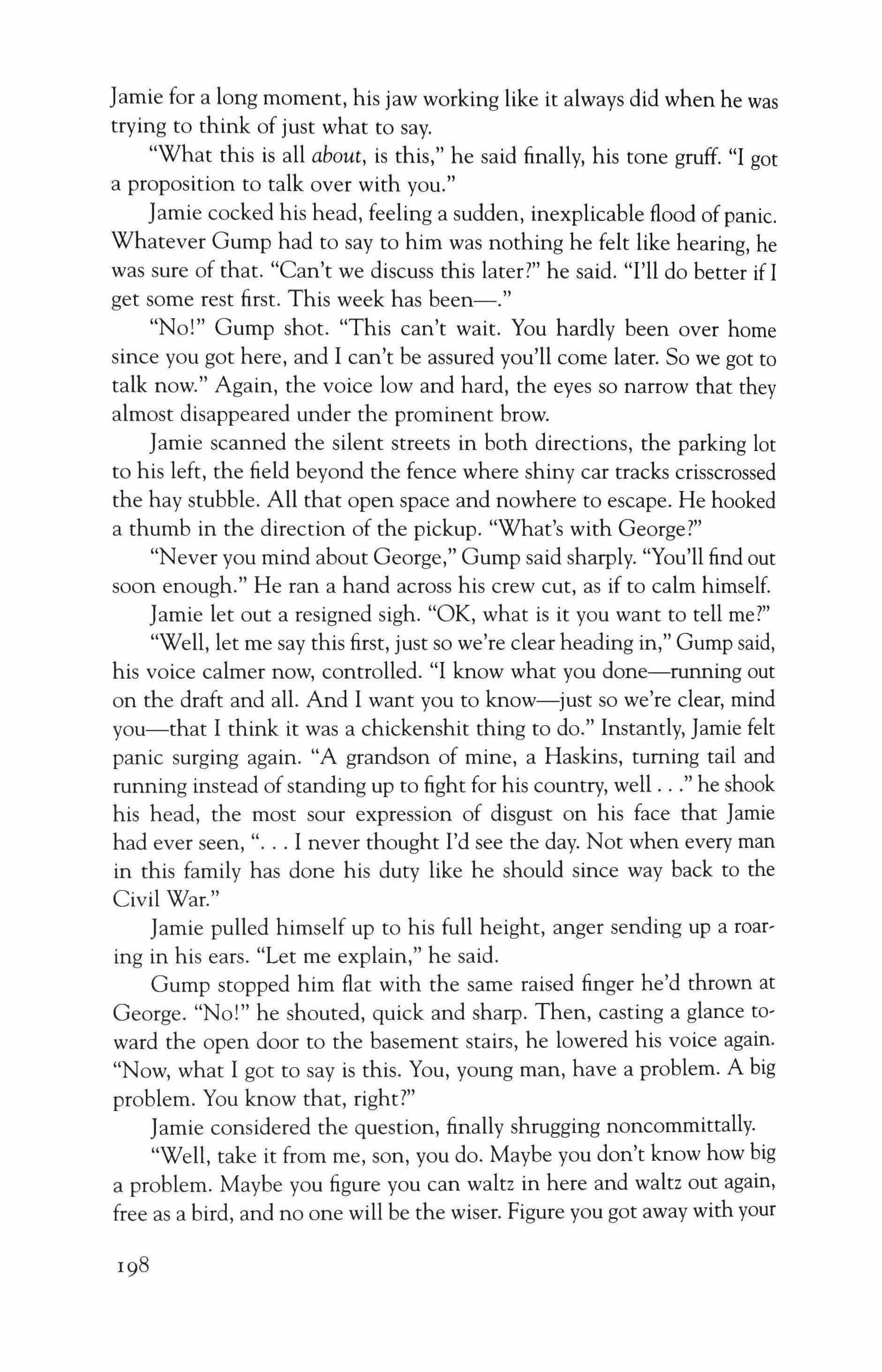
Jamie for a long moment, his jaw working like it always did when he was trying to think of just what to say.
"What this is all about, is this," he said finally, his tone gruff. "I got a proposition to talk over with you."
Jamie cocked his head, feeling a sudden, inexplicable flood of panic. Whatever Gump had to say to him was nothing he felt like hearing, he was sure of that. "Can't we discuss this later?" he said. "I'll do better if I get some rest first. This week has been-."
"No!" Gump shot. "This can't wait. You hardly been over home since you got here, and I can't be assured you'll come later. So we got to talk now." Again, the voice low and hard, the eyes so narrow that they almost disappeared under the prominent brow.
Jamie scanned the silent streets in both directions, the parking lot to his left, the field beyond the fence where shiny car tracks crisscrossed the hay stubble. All that open space and nowhere to escape. He hooked a thumb in the direction of the pickup. "What's with George?"
"Never you mind about George," Gump said sharply. "You'll find out soon enough." He ran a hand across his crew cut, as if to calm himself.
Jamie let out a resigned sigh. "OK, what is it you want to tell me?"
"Well, let me say this first, just so we're clear heading in," Gump said, his voice calmer now, controlled. "I know what you done-running out on the draft and all. And I want you to know-just so we're clear, mind you-that I think it was a chickenshit thing to do." Instantly, Jamie felt panic surging again. "A grandson of mine, a Haskins, turning tail and running instead of standing up to fight for his country, well he shook his head, the most sour expression of disgust on his face that Jamie had ever seen, I never thought I'd see the day. Not when every man in this family has done his duty like he should since way back to the Civil War."
Jamie pulled himself up to his full height, anger sending up a roaring in his ears. "Let me explain," he said.
Gump stopped him flat with the same raised finger he'd thrown at George. "No!" he shouted, quick and sharp. Then, casting a glance toward the open door to the basement stairs, he lowered his voice again. "Now, what I got to say is this. You, young man, have a problem. A big problem. You know that, right?"
Jamie considered the question, finally shrugging noncommittally.
"Well, take it from me, son, you do. Maybe you don't know how big a problem. Maybe you figure you can waltz in here and waltz out again, free as a bird, and no one will be the wiser. Figure you got away with your

chickenshit this long and can get away with it a little longer, that people will never find out what you did or maybe won't care and will just let you be."
Gump paused to throw a glance at George, still motionless in the front seat, apparently studying something fascinating out the front windshield. Then, he turned back to his grandson, his voice going even courser, almost a growl, and carrying a tone of threat. "Well, I'll tell you this, in case you don't know. You ain't never gonna be free, you hear me? You can run to the ends of the earth, take a goddamn rocket to the moon, for Christ's sake, and you won't be free. 'Cause in the end, there's one thing a coward like you can't run from. Himself. His own fear. The thing that makes him a coward in the first place."
Jamie heard himself snap, "Stop calling me a coward! I did what I thought was right. It takes courage to fight against a war, too!"
"Oh, don't give me That's the biggest crock of shit I ever heard. You look down the barrel of a gun, and then tell me it's the same thing as setting fire to a flag or throwing a few flowers in the air."
"I'd like to hear you say that to the people at Kent State," Jamie shot back.
"Those kids got just what they deserved," Gump growled. "If they would've been doing their duty 'stead of marching and yelling their fool heads off, they wouldn't've gotten themselves killed."
"You don't mean that!" Jamie cried out, shocked.
Gump stared at him long and hard before going on, his voice back to its controlled calm. "Look, I'm not about to stand here and debate with you about the war. Call it what you want, but what you done still comes to the same thing. You didn't fight, like the law says you're supposed to do. And you didn't even stand up and take your medicine like a man when you decided, for whatever half-baked reason, that you couldn't fight. You ran. And it don't take any courage to run. In my war, people who ran got themselves shot. No ifs, ands, or buts about it."
Jamie opened his mouth to speak, but the words wouldn't come. Where to begin? With a president who lied, who trumped up reasons for escalating the war, all the while preaching "peace with honor"? With a secretary of state who spent more time arguing about the shape of the table at the peace talks than talking about peace itself? With napalm burning the skin off of innocent children? With Bobby Kennedy, William Sloan Coffin, King, the Berrigans dead or in jail for their beliefs? How did you make someone like Gump understand that there'd

been plenty of courage in the Movement? No, you couldn't begin to convince someone like him.
But something else was at work here, something that caused his skin to prickle under the black suit coat, something that not even Jamie Haskins, who had done his share of marching and nighttime raids in the streets of Madison, had really and truly admitted to himself. A nagging doubt buried so deep in the silent, dark depths of his mind that he had never told anyone, not even Jasmine. A doubt that threatened to surface every time he watched the ROTC guys drilling in the quads at the UW and thought about the reports coming back from Nam saying that second lieutenants, which these guys would become, had the highest fatality rate of anyone in the war. Or that peeked out of those dark depths when he saw helicopters on TV landing in clearings, wind from the blades whipping the tall grass as soldiers leaped from the open side door and ran for cover. Or when he imagined platoons working their way through dense jungle foliage on the lookout for hidden land mines, tiger pits, pungie sticks, tripwires, and agile, deadly men in black pajamas who were as at home in the pathless tangle as the animals whose screams filled the humid nights. Or when he saw the black body bags lined up on the tarmac at Tan Son Nhut airbase waiting for transport back to families in the States. A doubt that came to him now, leaping into the clear light of day at Gump's words-that for all of his rational arguments against war, for all of his calm explanations about the philosophical distinctions between pacifism and nonviolence, for all of his passionate and morally high-toned pronouncements about the illegitimacy of taking another man's life (which he called the closest imaginable thing to a sin), maybe, just maybe, Gump-along with all the rest of that great Silent Majority sweeping Nixon to victory in his annihilation of McGovern-was right, after all. Maybe, when it came right down to it, when you peeled away the veneer of these shiny rationalizations, these buffed and honed arguments, these passionate, polished pronouncements, what you might well find was nothing more and nothing less than a simple fear of dying. Or, worse, of being maimed. And fear of fear itself, the terror of not knowing when the fatal bullet would come, when the cracked twig under your boots would ignite a firefight all around, when, like Jake, you might step on a mine and be blown to bits. And how would you ever know, really, without picking up a gun and heading into the jungle, whether your courage in the streets matched that of those young recruits and fresh-faced second lieutenants leaping out of helicopters into a hail of bullets, whether your refusal to go was

born of strong convictions or simply a weak stomach? The only ones who knew for sure-and the ones Jamie most admired, even though he would never trade places with them for anything in the world-were the vets he'd seen at rallies, the soldiers missing an arm or riding legless in wheelchairs, who ripped their medals off and threw them into boxes to be mailed to Johnson or Nixon. They had been through hell, their character had been tested, they knew what they were made of, and their courage couldn't be questioned. Not like himself, with all his grand rhetoric and secret doubts.
"I did what I had to do," he said quietly.
"No, you didn't," Gump returned. "What you were supposed to do was your duty. You couldn't manage that so now you're on the run, a fugitive, no better than a common criminal." Jamie's anger flashed again, and he started to say, "I don't know what you're-" but Gump stopped him, shaking his head in disgust. "Don't even bother. What do you think, I'm a fool? You know as well as I do what happens to guys who run. You belong in jail." He paused, his gray eyes boring into Jamie's. "And let me tell you, boy, if you don't make things right, that's exactly where you'll end up." The threat in Gump's voice was unmistakable. "What do you mean?" Jamie asked, confused. Gump straightened. "You know exactly what I mean," he said. "Your running days are over, boy."

"Good evening, Fahrer, Europe says hello." Or he could have invited him to speechifying (chaufferesca) instead. Next to Hitler himselfhe was the best speaker, capable of velvety whispers that mutated into torrid crescendo within seconds, and he was his leader's party campaign manager to boot. Single-handedly he ruled the Reich's culture and propaganda and controlled all the arts. Without Goebbels, Hitler would have never been, incapable of mounting his standard obsession with Germans being betrayed by the terms of 1918, which tore the country apart. Still, he should have said no such thing, not to someone famed for outbursts of charismatic violence, especially when just awakened and reminded of his plans to win over the still recalcitrant British. Hitler had to have respect. He slept late.
But Goebbels was an intellectual as well as an energetic neurotic, no better at control than Hitler, capable of getting one's goat for breakfast and thriving on the outcome. Gadfly, Herr Doktor Goebbels (as he styled himself) was a man self-willed to the point of infatuation, no doubt dismayed at being only five feet tall and weighing one hundred pounds, and driven to distraction by being born clubfooted. He dragged his foot behind him as he walked, and suggested (as one wag called him) a man worn by an oversized raincoat.
One of his pranks upon the Fahrer was to introduce him to the Gi� gant, a massive wooden mock up of the real thing, which Hitler took on trust, he being a deuce with things aeronautical. To him, the Gigant was capable of flying to New York, and the sooner the better. Perched in its
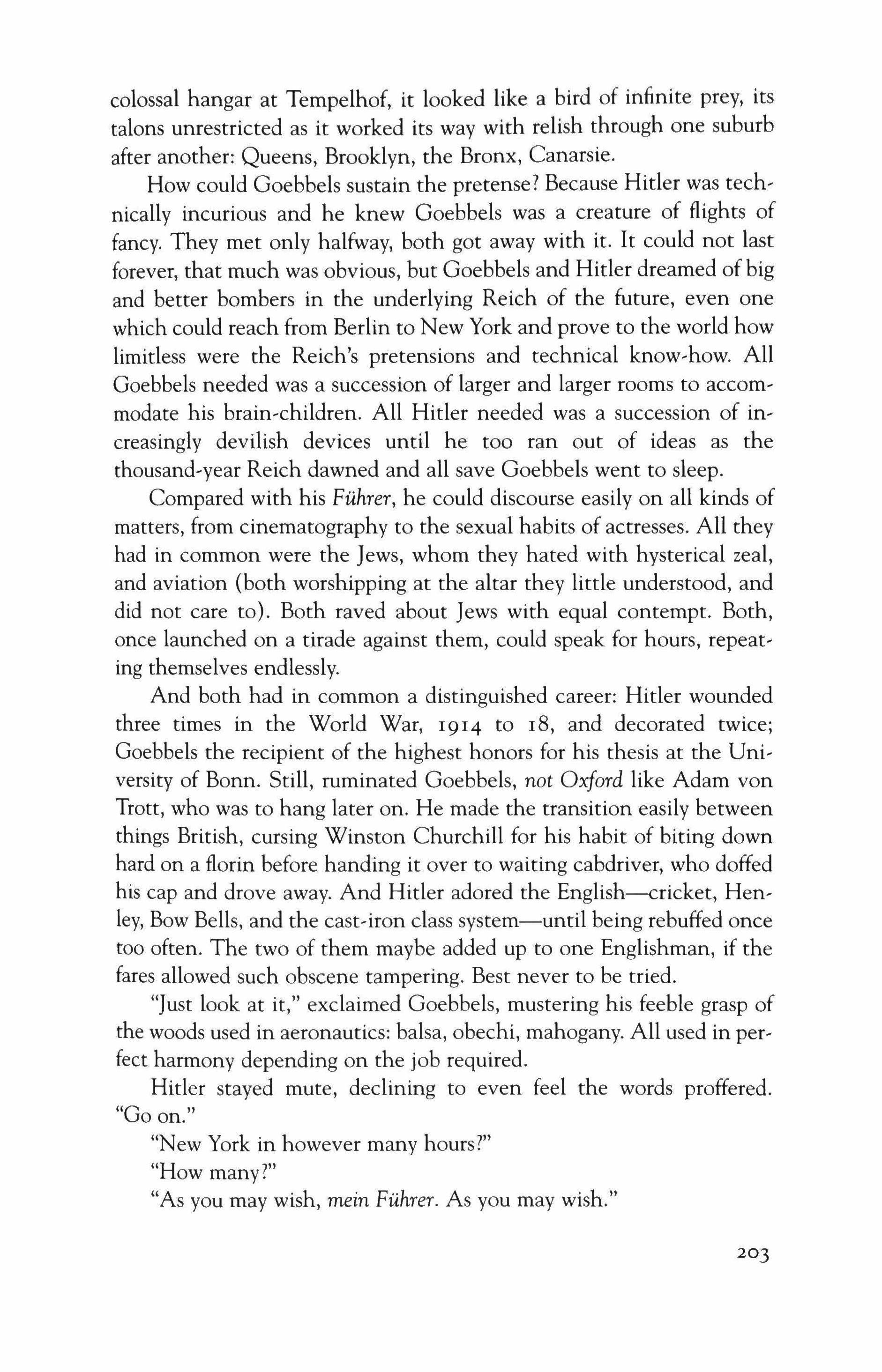
colossal hangar at Tempelhof, it looked like a bird of infinite prey, its talons unrestricted as it worked its way with relish through one suburb after another: Queens, Brooklyn, the Bronx, Canarsie.
How could Goebbels sustain the pretense? Because Hitler was technically incurious and he knew Goebbels was a creature of flights of fancy. They met only halfway, both got away with it. It could not last forever, that much was obvious, but Goebbels and Hitler dreamed of big and better bombers in the underlying Reich of the future, even one which could reach from Berlin to New York and prove to the world how limitless were the Reich's pretensions and technical know-how. All Goebbels needed was a succession of larger and larger rooms to accommodate his brain-children. All Hitler needed was a succession of increasingly devilish devices until he too ran out of ideas as the thousand-year Reich dawned and all save Goebbels went to sleep.
Compared with his Fuhrer, he could discourse easily on all kinds of matters, from cinematography to the sexual habits of actresses. All they had in common were the Jews, whom they hated with hysterical zeal, and aviation (both worshipping at the altar they little understood, and did not care to). Both raved about Jews with equal contempt. Both, once launched on a tirade against them, could speak for hours, repeating themselves endlessly.
And both had in common a distinguished career: Hitler wounded three times in the World War, 1914 to 18, and decorated twice; Goebbels the recipient of the highest honors for his thesis at the University of Bonn. Still, ruminated Goebbels, not Oxford like Adam von Trott, who was to hang later on. He made the transition easily between things British, cursing Winston Churchill for his habit of biting down hard on a florin before handing it over to waiting cabdriver, who doffed his cap and drove away. And Hitler adored the English-cricket, Henley, Bow Bells, and the cast-iron class system-until being rebuffed once too often. The two of them maybe added up to one Englishman, if the fares allowed such obscene tampering. Best never to be tried.
"Just look at it," exclaimed Goebbels, mustering his feeble grasp of the woods used in aeronautics: balsa, obechi, mahogany. All used in perfect harmony depending on the job required.
Hitler stayed mute, declining to even feel the words proffered. "Goon."
"New York in however many hours?"
"How many?"
"As you may wish, mein Fuhrer. As you may wish."
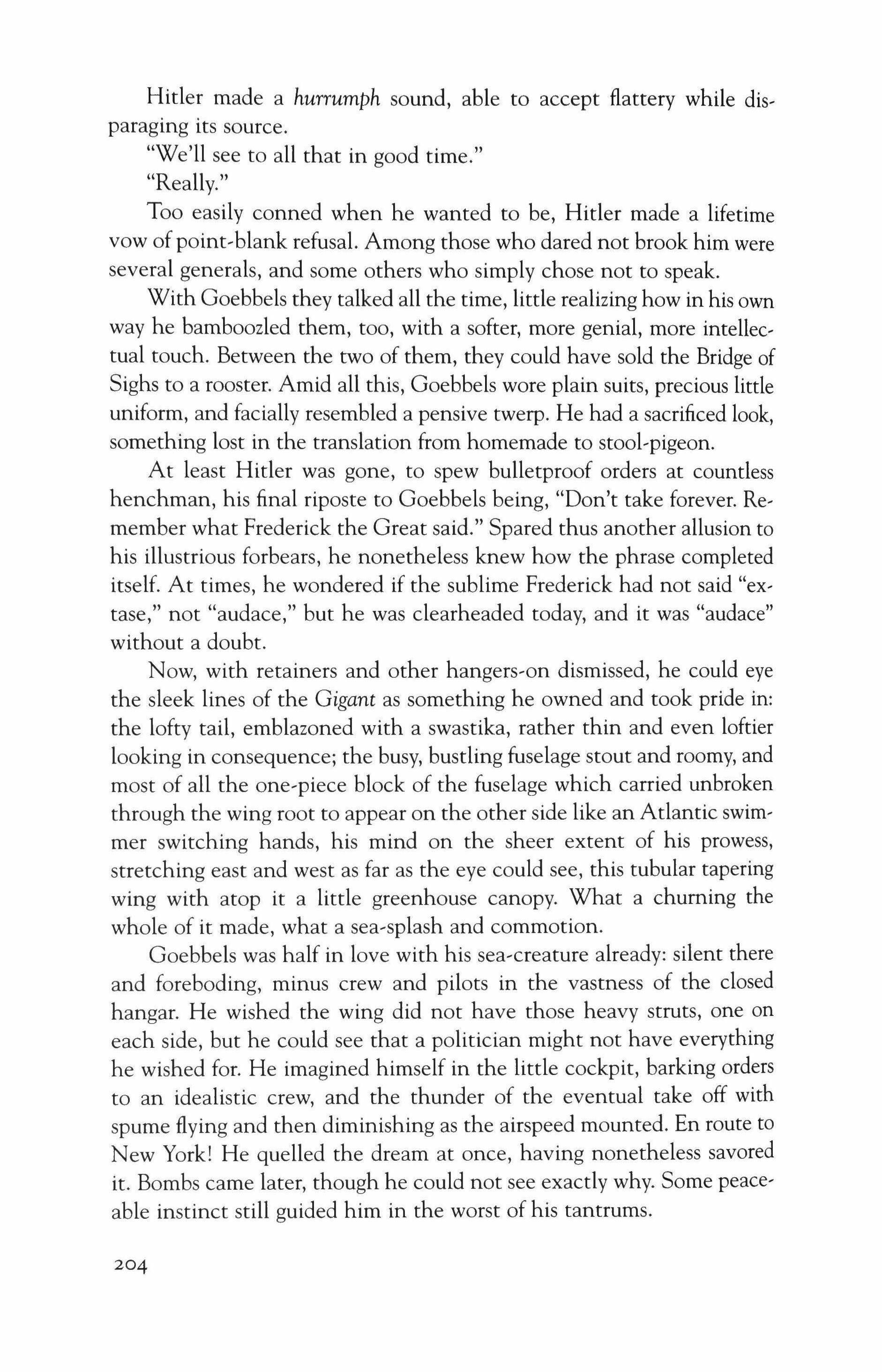
Hitler made a hurrumph sound, able to accept flattery while disparaging its source.
"We'll see to all that in good time."
Too easily conned when he wanted to be, Hitler made a lifetime vow ofpoint-blank refusal. Among those who dared not brook him were several generals, and some others who simply chose not to speak.
With Goebbels they talked all the time, little realizing how in his own way he bamboozled them, too, with a softer, more genial, more intellectual touch. Between the two of them, they could have sold the Bridge of Sighs to a rooster. Amid all this, Goebbels wore plain suits, precious little uniform, and facially resembled a pensive twerp. He had a sacrificed look, something lost in the translation from homemade to stool-pigeon.
At least Hitler was gone, to spew bulletproof orders at countless henchman, his final riposte to Goebbels being, "Don't take forever. Remember what Frederick the Great said." Spared thus another allusion to his illustrious forbears, he nonetheless knew how the phrase completed itself. At times, he wondered if the sublime Frederick had not said "extase," not "audace," but he was clearheaded today, and it was "audace" without a doubt.
Now, with retainers and other hangers-on dismissed, he could eye the sleek lines of the Gigant as something he owned and took pride in: the lofty tail, emblazoned with a swastika, rather thin and even loftier looking in consequence; the busy, bustling fuselage stout and roomy, and most of all the one-piece block of the fuselage which carried unbroken through the wing root to appear on the other side like an Atlantic swimmer switching hands, his mind on the sheer extent of his prowess, stretching east and west as far as the eye could see, this tubular tapering wing with atop it a little greenhouse canopy. What a churning the whole of it made, what a sea-splash and commotion.
Goebbels was half in love with his sea-creature already: silent there and foreboding, minus crew and pilots in the vastness of the closed hangar. He wished the wing did not have those heavy struts, one on each side, but he could see that a politician might not have everything he wished for. He imagined himself in the little cockpit, barking orders to an idealistic crew, and the thunder of the eventual take off with spume flying and then diminishing as the airspeed mounted. En route to New York! He quelled the dream at once, having nonetheless savored it. Bombs came later, though he could not see exactly why. Some peaceable instinct still guided him in the worst of his tantrums.
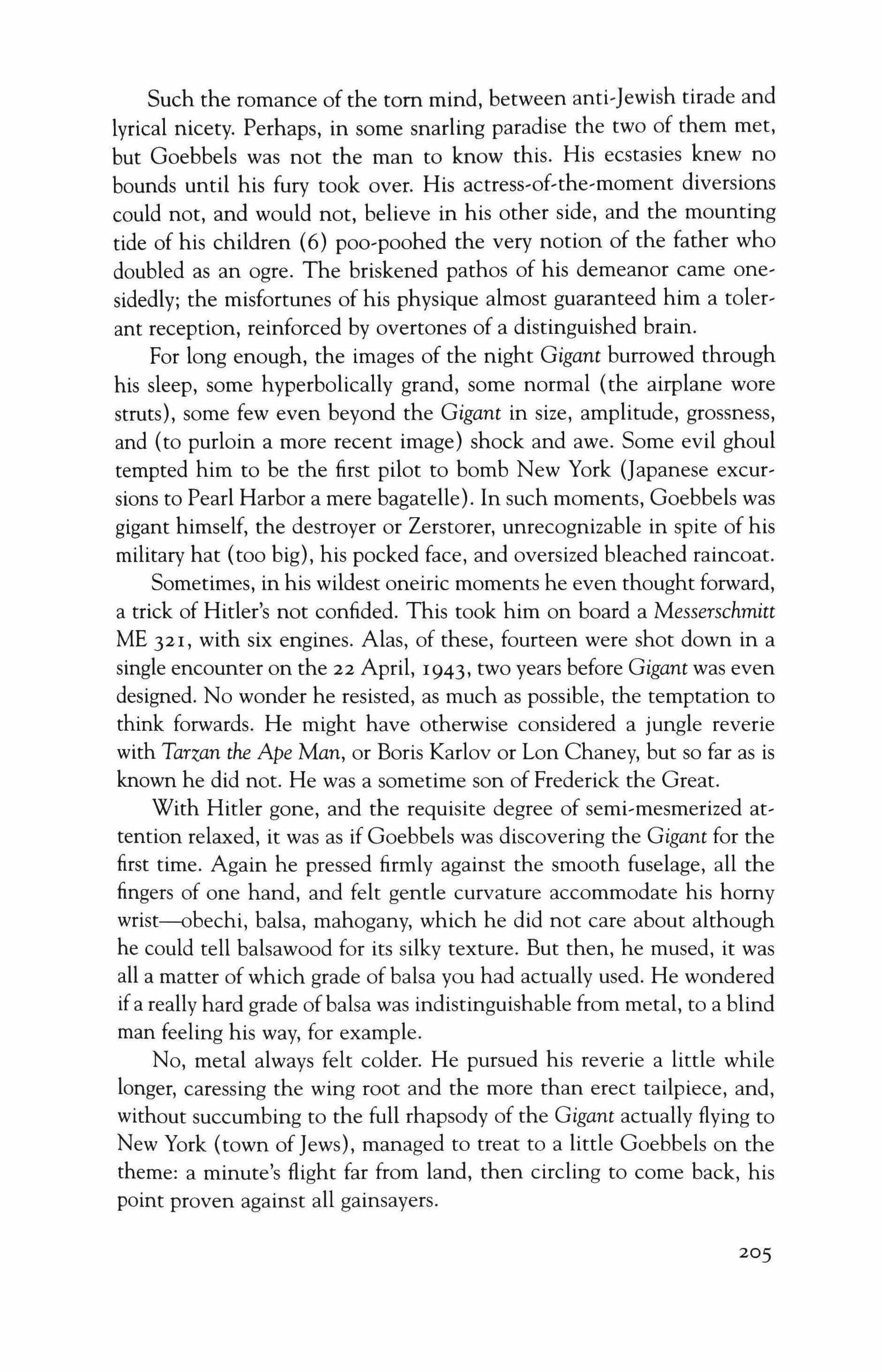
Such the romance of the tom mind, between anti-Jewish tirade and lyrical nicety. Perhaps, in some snarling paradise the two of them met, but Goebbels was not the man to know this. His ecstasies knew no bounds until his fury took over. His actress-of-the-moment diversions could not, and would not, believe in his other side, and the mounting tide of his children (6) poo-poohed the very notion of the father who doubled as an ogre. The briskened pathos of his demeanor came onesidedly; the misfortunes of his physique almost guaranteed him a tolerant reception, reinforced by overtones of a distinguished brain.
For long enough, the images of the night Gigant burrowed through his sleep, some hyperbolically grand, some normal (the airplane wore struts), some few even beyond the Gigant in size, amplitude, grossness, and (to purloin a more recent image) shock and awe. Some evil ghoul tempted him to be the first pilot to bomb New York (Japanese excursions to Pearl Harbor a mere bagatelle). In such moments, Goebbels was gigant himself, the destroyer or Zerstorer, unrecognizable in spite of his military hat (too big), his pocked face, and oversized bleached raincoat.
Sometimes, in his wildest oneiric moments he even thought forward, a trick of Hitler's not confided. This took him on board a Messerschmitt ME 321, with six engines. Alas, of these, fourteen were shot down in a single encounter on the 22 April, 1943, two years before Gigant was even designed. No wonder he resisted, as much as possible, the temptation to think forwards. He might have otherwise considered a jungle reverie with Tarzan the Ape Man, or Boris Karlov or Lon Chaney, but so far as is known he did not. He was a sometime son of Frederick the Great.
With Hitler gone, and the requisite degree of semi-mesmerized attention relaxed, it was as if Goebbels was discovering the Gigant for the first time. Again he pressed firmly against the smooth fuselage, all the fingers of one hand, and felt gentle curvature accommodate his horny wrist-obechi, balsa, mahogany, which he did not care about although he could tell balsawood for its silky texture. But then, he mused, it was all a matter of which grade of balsa you had actually used. He wondered if a really hard grade ofbalsa was indistinguishable from metal, to a blind man feeling his way, for example.
No, metal always felt colder. He pursued his reverie a little while longer, caressing the wing root and the more than erect tailpiece, and, without succumbing to the full rhapsody of the Gigant actually flying to New York (town of Jews), managed to treat to a little Goebbels on the theme: a minute's flight far from land, then circling to come back, his point proven against all gainsayers.

In this, Goebbels was a romantic, although his detestation of Jews stopped at the brink: in all the patchwork quilts ofhis checkered life, he had never once killed a Jew, not one in the depravity of gas chamber music. This, he reasoned with sublunary logic, should count for something. He was guilty of something, although not the measures of Hitler's executioners. Why, then, the suicide, including his wife and six daughters? A bogus hint of shame?
Such were the problems that besieged him daily, a pious amalgam of satanic juices. He soldiered through by a process he had come to know as "doctordom," otherwise dubbed the bright side of the master-race in which blondes, doctorates, and swastikas held sway over everything else.
It was the summer of 1941, with the war, to some, uninvolved as a little foundling although destined to grow worldwide. This war had really started in the early thirties with the death of Hindenburg. A long preparation, including the conversion of gliders to powered aircraft had included Spain {with Heinkel bombers}, and then, in quick order, the Sudetenland, Poland, and Czechoslovakia. The powerful French army was shocked at the ease with which the Nazis marched through their cherished Maginot Line. The insolence of the Germans made the allies wince. And here was Goebbels, party leader, planning New York, close bosom of the maturing sun.
In mock-up at any rate. Engineless, although the big chocks supplanting them beguiled the feckless Hitler. And, to top the whole thing, a glider, which in fact had escaped Hitler {if he had not assumed it from the first and simply was humoring Goebbels}. He kept his aviation dreams apart from wiseacres such as Goring, and from anybody else with the faintest degree of knowledge, officers of the Luftwaffe in particular, whose sharp minds and devil-may-care code of living antagonized Goebbels to no end.
Hitler puzzled him. Surely someone with only the merest knowledge of aviation could have spotted the Gigant mock-up engines, eventually to be replaced, three on either side. But no comment, no ridicule. Perhaps he signified one engine with a nod, two with two, a third with an explosion of delight, and so forth. Something wooden came through about this man, something fixed and unyielding. Goebbels declined to sum him up, preferring instead to note his obsessions with Winston Churchill's visit in 1909 to an Army politician, to laud the mounting climate of socialism, or the German teen who had recorded the whole of the 1914-18 war in festive crayon, resentfully specifying a wartime diet of oats, barley, and com, together with the execution ofNurse Edith
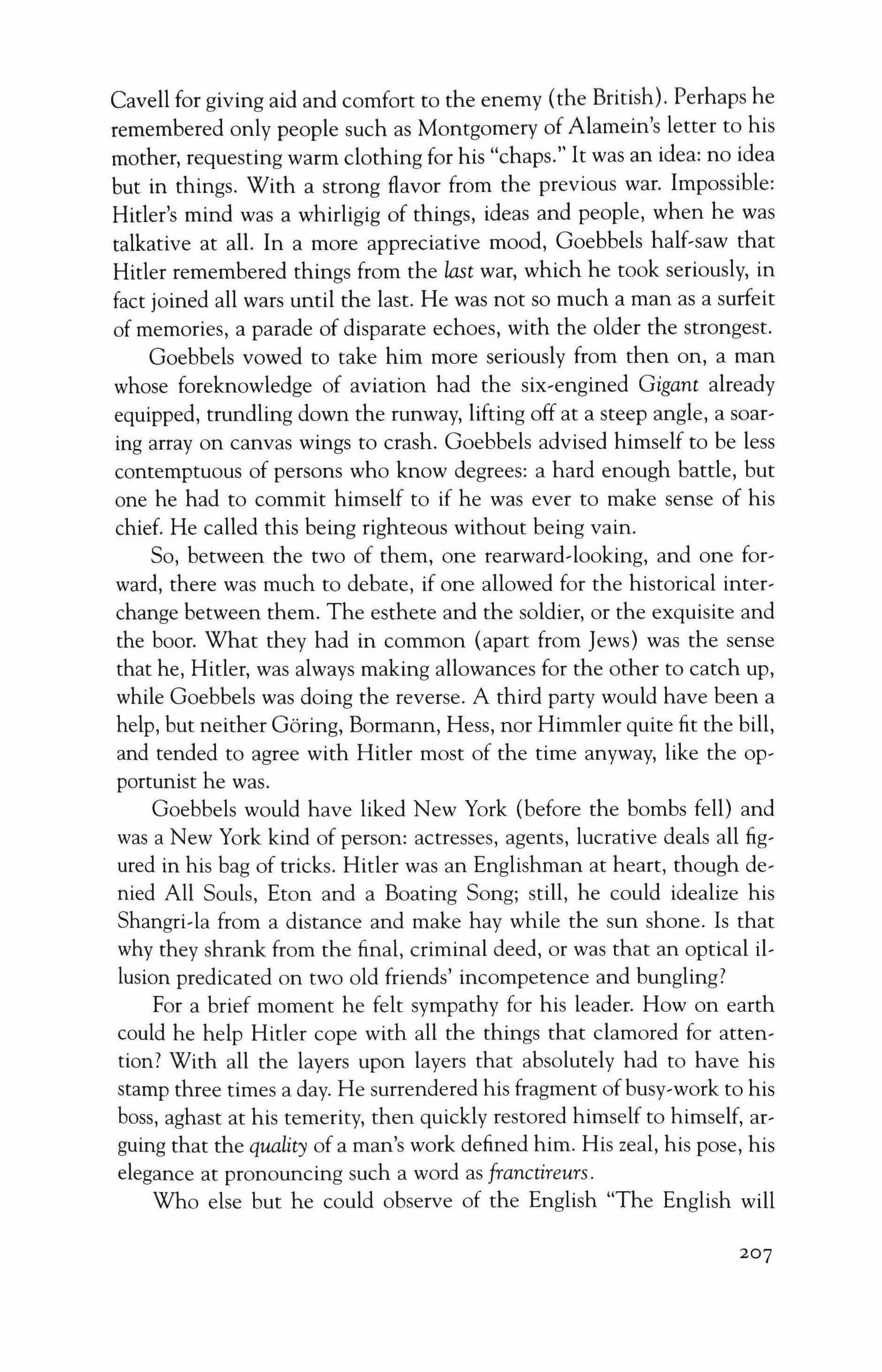
Cavell for giving aid and comfort to the enemy (the British). Perhaps he remembered only people such as Montgomery of Alamein's letter to his mother, requesting warm clothing for his "chaps." It was an idea: no idea but in things. With a strong flavor from the previous war. Impossible: Hitler's mind was a whirligig of things, ideas and people, when he was talkative at all. In a more appreciative mood, Goebbels half-saw that Hitler remembered things from the last war, which he took seriously, in fact joined all wars until the last. He was not so much a man as a surfeit of memories, a parade of disparate echoes, with the older the strongest.
Goebbels vowed to take him more seriously from then on, a man whose foreknowledge of aviation had the six-engined Gigant already equipped, trundling down the runway, lifting off at a steep angle, a soaring array on canvas wings to crash. Goebbels advised himself to be less contemptuous of persons who know degrees: a hard enough battle, but one he had to commit himself to if he was ever to make sense of his chief. He called this being righteous without being vain.
So, between the two of them, one rearward-looking, and one forward, there was much to debate, if one allowed for the historical interchange between them. The esthete and the soldier, or the exquisite and the boor. What they had in common (apart from Jews) was the sense that he, Hitler, was always making allowances for the other to catch up, while Goebbels was doing the reverse. A third party would have been a help, but neither Goring, Bormann, Hess, nor Himrnler quite fit the bill, and tended to agree with Hitler most of the time anyway, like the opportunist he was.
Goebbels would have liked New York (before the bombs fell) and was a New York kind of person: actresses, agents, lucrative deals all figured in his bag of tricks. Hitler was an Englishman at heart, though denied All Souls, Eton and a Boating Song; still, he could idealize his Shangri-la from a distance and make hay while the sun shone. Is that why they shrank from the final, criminal deed, or was that an optical illusion predicated on two old friends' incompetence and bungling?
For a brief moment he felt sympathy for his leader. How on earth could he help Hitler cope with all the things that clamored for attention? With all the layers upon layers that absolutely had to have his stamp three times a day. He surrendered his fragment ofbusy-work to his boss, aghast at his temerity, then quickly restored himself to himself, arguing that the quality of a man's work defined him. His zeal, his pose, his elegance at pronouncing such a word as franctireurs.
Who else but he could observe of the English "The English will

have nothing to laugh about. They are making things too difficult for us since they are committing error after error." Would Hitler have ever noticed that, with his attention to frequentive detail?
This was a Thursday in November, 1939, hardly time to note the mistakes of the English, after spending the day driving Polish roads, dining with the Franks, then speaking to Molotov, warning to Finland and Turkey, short rest at Brae Palace, then visit Belvedere Castle. Never defend, always attack. In the evening, speak with Magda again about Harald. He is causing some worries. Have I enough to do? If only God could grant me more. I sleep little, mostly stertorous snatches of preposterous weavings about, sandwiched between Hitler and Goring, then rescued by a wife going slightly out of her head with the pressure of it all, and the major campaigns to come. How I wish that, in some lapse in hostilities, Hitler and I might sojourn for a few weeks in Bavarian Alps, there to frolic with milkmaids and forget all this wartime business. Short and skinny, and much give to independent mannerisms (which infuriated certain teachers), I was selected for outstanding achievement in Latin, geography, and math. I gave the graduation speech, and received an A for my address, although the headmaster deplored my poor delivery (something I never let him forget). It was only at my weakest that I succumbed to the winks of actresses, who found my tentativeness irresistible, when I was a cuddly bunny who needed a good sleep to restore him to manhood and the cheapjack confidences of his leader.
He did not move away, substituting the world of too much to dothe overpowering of supreme busyness-for the other world ofvoluntary commitment. A classic functionary, ever ready to do his master's bidding even to the death. Still, he could remain critical, even if the experience cost him his life. Going down, with master or without him, he would retain the heaven-sent right to put in a last dissentient word. It was not a matter of loyalty, but of discrimination, touching his leader's voluntary with one of his own, in sheer disagreement.
He could wheedle, beg his way, content with knowing Fuhrer disagreed with himself at least half the time, not thinking fast enough to second-guess himself. Goebbels wanted the last private word in everything, little that Hitler was aware of it. Still, it came down to rarefied common sense, at which Goebbels was an adroit practitioner, author of an unpublished novel and master of the other arts as well. When Hitler first shook his hand, that darkling mesmeric hand flanked further up the arm by a drab, cast-off suit, he was already lost, and knew it. Two spokesmen, one the guttural warlord, the other practitioner of variable finesse.

The one harsh, the other rampant, when they were both going full tilt they sounded like an express train, an event that almost never happened.
Goebbels thought Hitler was wrong about twin-engine bombers of which he had a plentiful supply. Far better to do what the British and the Americans did, after first losing ground to the twins. They built the Halifax, the Lancaster, and the Shorts Stirling, the Fortress and Liberator, with which to pulverize the German twins, from high up and out of reach. Whatever drew Hitler to the twins remained inexpressible. It was not that the Reich had no four engine Gigants, no 323 Messerschmitts (notably on the route from Athens to Dema in Libya) or 321 (fourteen shot down in one day, as Hitler, too, recorded) or 222S for maritime patrol. It was lack of faith. Perhaps he had been scared when young by multiple propellers, say by that maid of all work, the Junkers with triple engines. Had there been an undue fixation in the art-school years; Goebbels could not for the life ofhim see how. A wartime mishap. A bungled suicide back in the old days? An inconquerable aversion to complex machinery? Or a dislike of giants? Perhaps the noise. Big waft of all those propellers?
He could not figure it out, but decided to leave. Whatever the reason, this was no way to reach New York, Goebbels's pie in the sky. If only the Japanese had aimed westward with their (he admitted) twins. A shy but powerful shore of aeronautical enthusiasts had grown up within the Nazi Party who kept on designing this or that multi engine bomber, but without full support. Yet this was the way to win. Otherwise the war was lost.
Hitler would come to appreciate the Gigants in the fullness of time, he was sure of that, whether ultimately built of wood, canvas or duralumin. At the full sweep of the magistrate's arm, a million hands would claw the sky, and the Third Reich would be. Not for him, plenipotentiary safe in his hideaway, retired from all realist causes. Meanwhile, he would tempt his leader to an ever more ambitious future in which all planes would be giants destined to fly westward and leave mother Russia alone. He had it all planned, the only delay coming from the smug Fuhrer and his short-sighted henchmen, all facing the wrong way.
He imagined his leader well on his way to leather and stirrup night with the SS, an event he never dressed for: prosaic jacket, wound badge, and standard trousers, whereas they issued forth in all their military finery, glad of a chance to show themselves off. He half-looked forward to 1943, when the situation would be grimmer and the SS hospitals would be overflowing with wounded. Call him a pessimist, a pessimist-realist
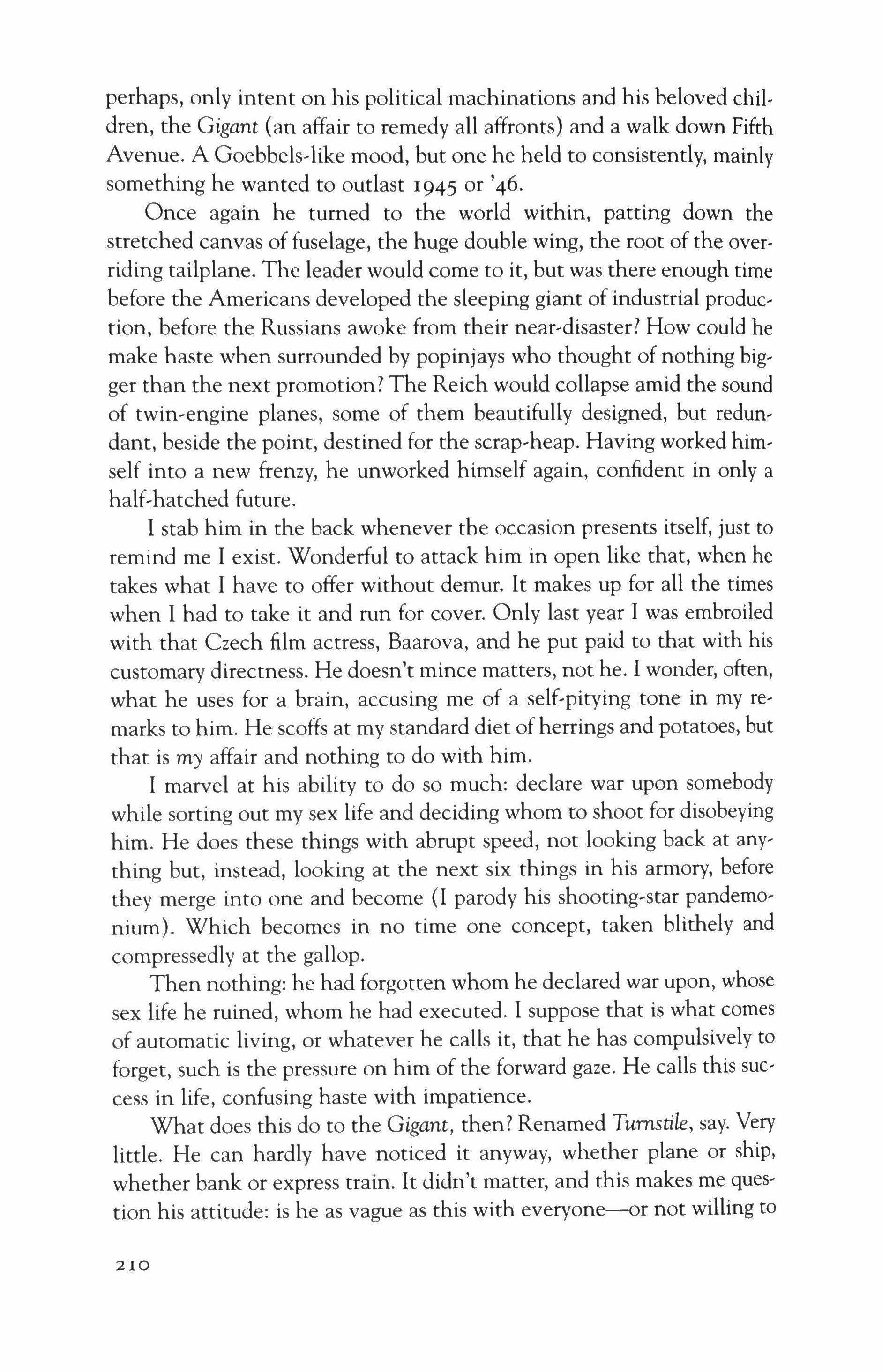
perhaps, only intent on his political machinations and his beloved children, the Gigam {an affair to remedy all affronts} and a walk down Fifth Avenue. A Goebbels-like mood, but one he held to consistently, mainly something he wanted to outlast 1945 or '46.
Once again he turned to the world within, patting down the stretched canvas of fuselage, the huge double wing, the root of the overriding tailplane. The leader would come to it, but was there enough time before the Americans developed the sleeping giant of industrial production, before the Russians awoke from their near-disaster? How could he make haste when surrounded by popinjays who thought of nothing bigger than the next promotion? The Reich would collapse amid the sound of twin-engine planes, some of them beautifully designed, but redundant, beside the point, destined for the scrap-heap. Having worked himself into a new frenzy, he unworked himself again, confident in only a half-hatched future.
I stab him in the back whenever the occasion presents itself, just to remind me I exist. Wonderful to attack him in open like that, when he takes what I have to offer without demur. It makes up for all the times when I had to take it and run for cover. Only last year I was embroiled with that Czech film actress, Baarova, and he put paid to that with his customary directness. He doesn't mince matters, not he. I wonder, often, what he uses for a brain, accusing me of a self-pitying tone in my remarks to him. He scoffs at my standard diet of herrings and potatoes, but that is my affair and nothing to do with him.
I marvel at his ability to do so much: declare war upon somebody while sorting out my sex life and deciding whom to shoot for disobeying him. He does these things with abrupt speed, not looking back at anything but, instead, looking at the next six things in his armory, before they merge into one and become (I parody his shooting-star pandemonium). Which becomes in no time one concept, taken blithely and compressedly at the gallop.
Then nothing: he had forgotten whom he declared war upon, whose sex life he ruined, whom he had executed. I suppose that is what comes of automatic living, or whatever he calls it, that he has compulsively to forget, such is the pressure on him of the forward gaze. He calls this success in life, confusing haste with impatience.
What does this do to the Gigant, then? Renamed Turnstile, say. Very little. He can hardly have noticed it anyway, whether plane or ship, whether bank or express train. It didn't matter, and this makes me question his attitude: is he as vague as this with everyone--or not willing to
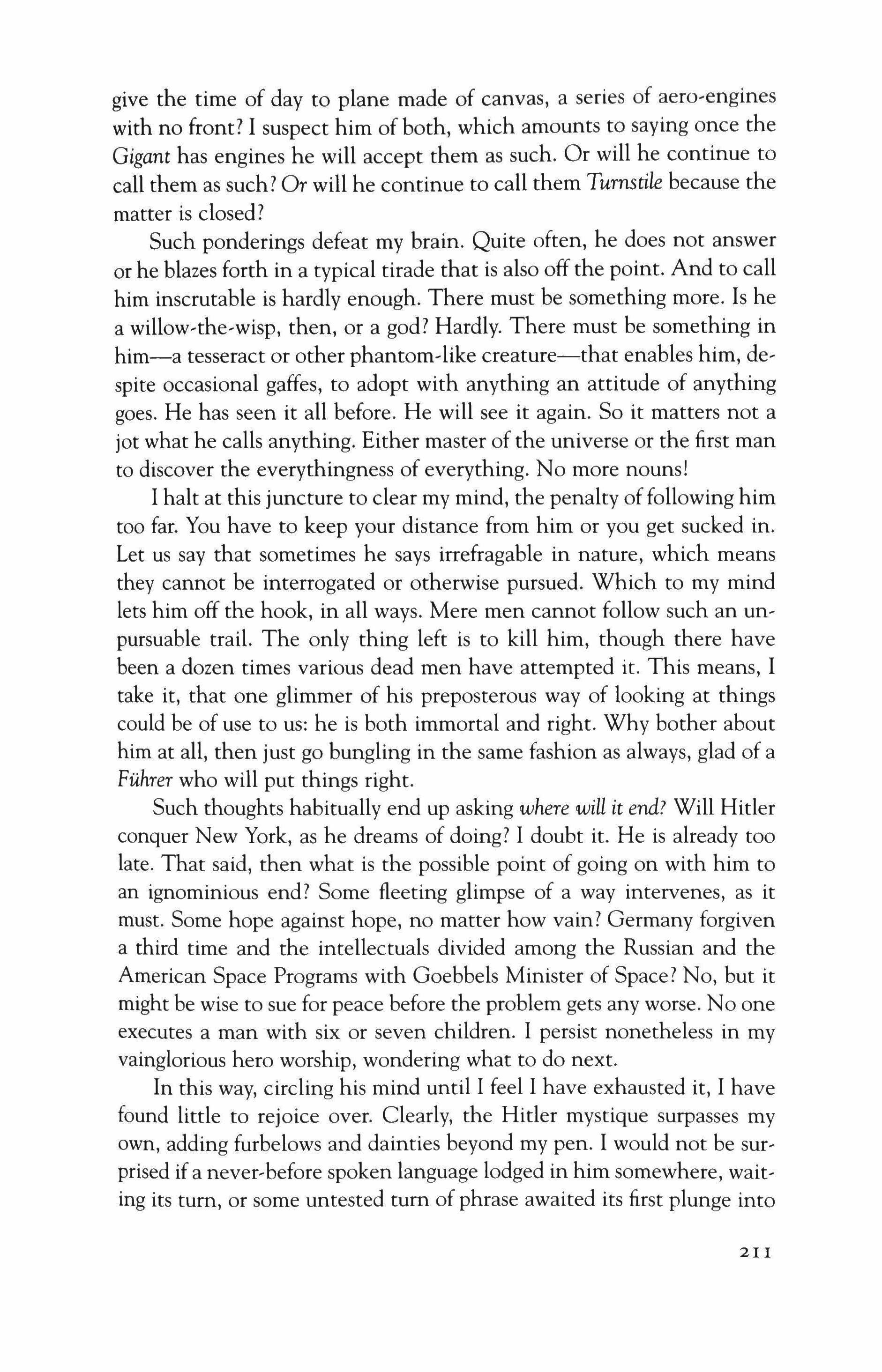
give the time of day to plane made of canvas, a series of aero-engines with no front? I suspect him of both, which amounts to saying once the Gigant has engines he will accept them as such. Or will he continue to call them as such? Or will he continue to call them Turnstile because the matter is closed?
Such ponderings defeat my brain. Quite often, he does not answer or he blazes forth in a typical tirade that is also off the point. And to call him inscrutable is hardly enough. There must be something more. Is he a willow-the-wisp, then, or a god? Hardly. There must be something in him-a tesseract or other phantom,like creature-that enables him, de' spite occasional gaffes, to adopt with anything an attitude of anything goes. He has seen it all before. He will see it again. So it matters not a jot what he calls anything. Either master of the universe or the first man to discover the everythingness of everything. No more nouns!
I halt at this juncture to clear my mind, the penalty offollowing him too far. You have to keep your distance from him or you get sucked in. Let us say that sometimes he says irrefragable in nature, which means they cannot be interrogated or otherwise pursued. Which to my mind lets him off the hook, in all ways. Mere men cannot follow such an unpursuable trail. The only thing left is to kill him, though there have been a dozen times various dead men have attempted it. This means, I take it, that one glimmer of his preposterous way of looking at things could be of use to us: he is both immortal and right. Why bother about him at all, then just go bungling in the same fashion as always, glad of a Fuhrer who will put things right.
Such thoughts habitually end up asking where will it end? Will Hitler conquer New York, as he dreams of doing? I doubt it. He is already too late. That said, then what is the possible point of going on with him to an ignominious end? Some fleeting glimpse of a way intervenes, as it must. Some hope against hope, no matter how vain? Germany forgiven a third time and the intellectuals divided among the Russian and the American Space Programs with Goebbels Minister of Space? No, but it might be wise to sue for peace before the problem gets any worse. No one executes a man with six or seven children. I persist nonetheless in my vainglorious hero worship, wondering what to do next.
In this way, circling his mind until I feel I have exhausted it, I have found little to rejoice over. Clearly, the Hitler mystique surpasses my own, adding furbelows and dainties beyond my pen. I would not be sur, prised if a never,before spoken language lodged in him somewhere, wait, ing its tum, or some untested tum of phrase awaited its first plunge into
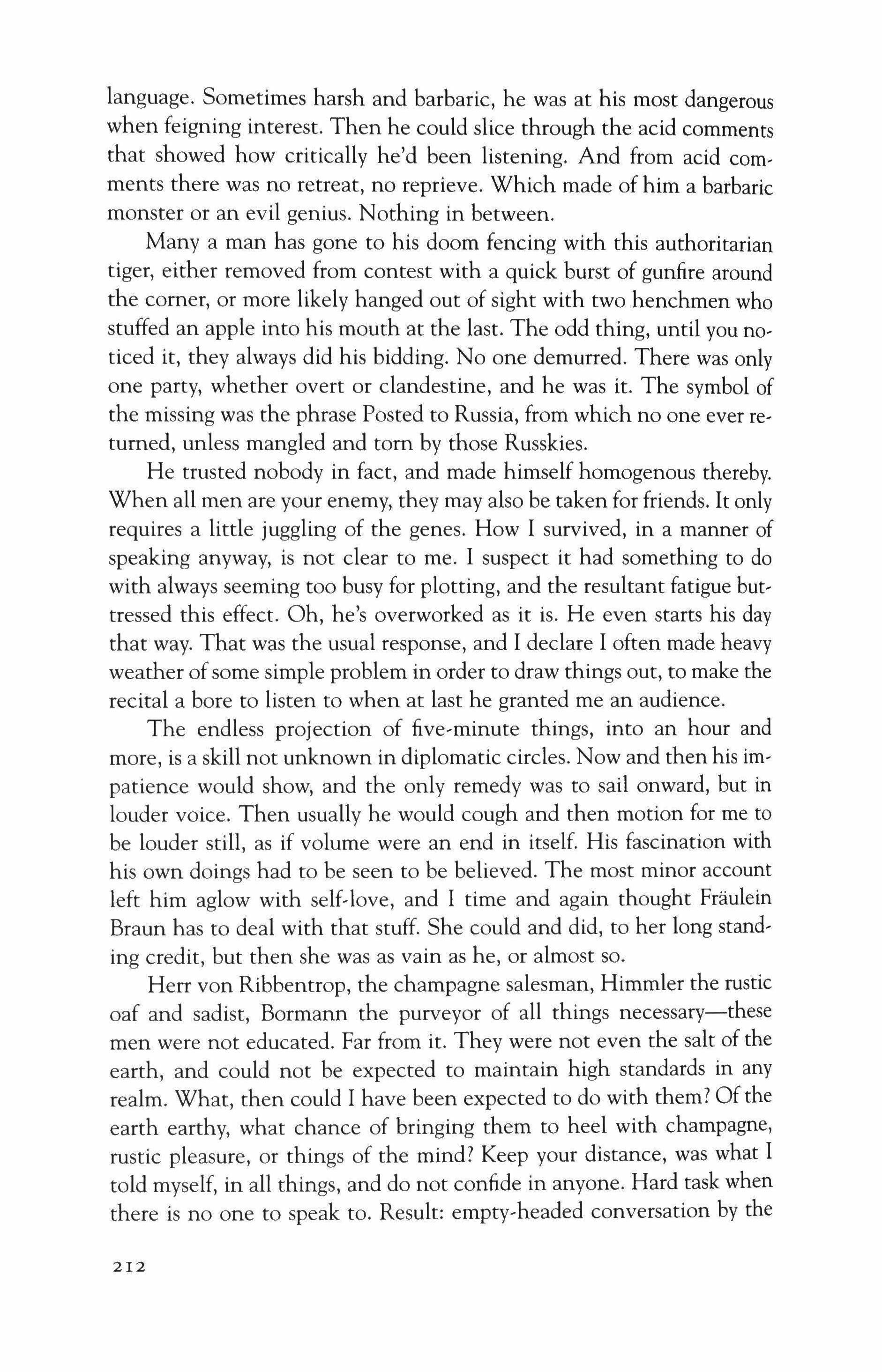
language. Sometimes harsh and barbaric, he was at his most dangerous when feigning interest. Then he could slice through the acid comments that showed how critically he'd been listening. And from acid comments there was no retreat, no reprieve. Which made of him a barbaric monster or an evil genius. Nothing in between.
Many a man has gone to his doom fencing with this authoritarian tiger, either removed from contest with a quick burst of gunfire around the corner, or more likely hanged out of sight with two henchmen who stuffed an apple into his mouth at the last. The odd thing, until you noticed it, they always did his bidding. No one demurred. There was only one party, whether overt or clandestine, and he was it. The symbol of the missing was the phrase Posted to Russia, from which no one ever returned, unless mangled and torn by those Russkies.
He trusted nobody in fact, and made himself homogenous thereby. When all men are your enemy, they may also be taken for friends. It only requires a little juggling of the genes. How I survived, in a manner of speaking anyway, is not clear to me. I suspect it had something to do with always seeming too busy for plotting, and the resultant fatigue buttressed this effect. Oh, he's overworked as it is. He even starts his day that way. That was the usual response, and I declare I often made heavy weather of some simple problem in order to draw things out, to make the recital a bore to listen to when at last he granted me an audience.
The endless projection of five-minute things, into an hour and more, is a skill not unknown in diplomatic circles. Now and then his impatience would show, and the only remedy was to sail onward, but in louder voice. Then usually he would cough and then motion for me to be louder still, as if volume were an end in itself. His fascination with his own doings had to be seen to be believed. The most minor account left him aglow with self-love, and I time and again thought Fraulein Braun has to deal with that stuff. She could and did, to her long standing credit, but then she was as vain as he, or almost so.
Herr von Ribbentrop, the champagne salesman, Himmler the rustic oaf and sadist, Bormann the purveyor of all things necessary-these men were not educated. Far from it. They were not even the salt of the earth, and could not be expected to maintain high standards in any realm. What, then could I have been expected to do with them? Of the earth earthy, what chance of bringing them to heel with champagne, rustic pleasure, or things of the mind? Keep your distance, was what I told myself, in all things, and do not confide in anyone. Hard task when there is no one to speak to. Result: empty-headed conversation by the

bucketload, for years as the Reich continued deeper and deeper into trouble, after such an auspicious start.
Hitler was different, though he too had no monument of intellect, he had too many ideas for one man, mainly of the second or third class, but ideas nonetheless, all quarreling and squabbling together like school children, colliding and doing one another in for the sake of boredom. The more he thought, the more his ideas escaped him, leaving behind only fragments of themselves, no longer recognizable and ultimately to be gathered under the heading of revenge; so long as there was revenge, all was well, and the nation could go to hell while he took it, which explains his scorched earth policy at the last. He love to say it: vergeltungswaffe, with the same maniacal twist of the lips, revenge covering everybody, mainly starting with the war of 1914 to 18, but obviously going to extremes the farther he leaned into his disgust, ending with the Americans for being "Jewish baboons" (and for being able to twist their fortunes the way they wanted). One of his favorites, Fuchsl, was a dog lover who Hitler said "only obeyed me." Another was his favorite sausage-maker, Dione Lucas, his favorite dish "stuffed squash" about four weeks old.
Trapped amid such creatures was no joke, especially when half the time literature was running through your brain. Marooned between doglovers and pastry cooks, no wonder I got increasingly impatient with vergeltungswaffe and the plethora of incomplete fighter planes which would soon doom the increasingly potent Allies. There was something rustic and unpolished about these men, something that doomed them to failure, stepping out oftheir depth as they did and reaping the whirlwind for doing so.
Into the swarm of my own ideas, Hitler managed to reemerge, speaking to me as soon as he entered the hangar, saying (abruptly), "The tail is too high, it has no engines, it is too small, its struts look weak." I said nothing, there was no need since one of his rampages had begun and there was no way of stopping it. He went into overdrive, chiding us all by name and rank, as if I myself were the owner of the Gigant. "All was his," he screamed. "Why so inefficient? Why am I surrounded by imbeciles?" This was familiar stuff. It was safer not to respond. Only Goebbels took it on the chin. Then he relented, gave me a cheery grin, and said, that said Now he was his most dangerous.
Once again he was romancing about his imaginary days on the high seas, murmuring about the Penguin and the Atlantis, two high raiders from the early years of the 1939 war. These two hoax vessels had under wing wraps a two-man biplane; the rest of the superstructure was
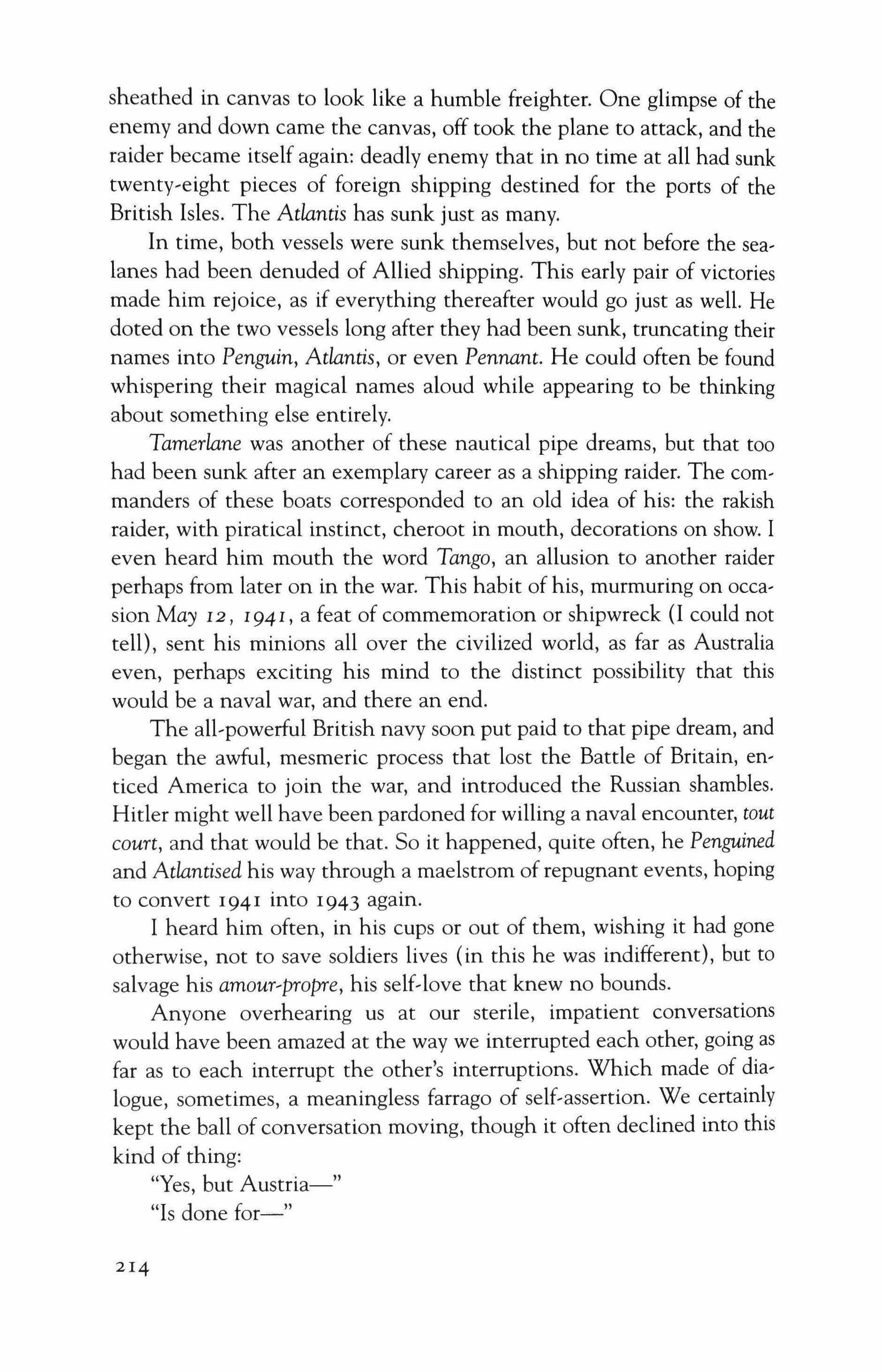
sheathed in canvas to look like a humble freighter. One glimpse of the enemy and down came the canvas, off took the plane to attack, and the raider became itself again: deadly enemy that in no time at all had sunk twenty-eight pieces of foreign shipping destined for the ports of the British Isles. The Atlantis has sunk just as many.
In time, both vessels were sunk themselves, but not before the sealanes had been denuded of Allied shipping. This early pair of victories made him rejoice, as if everything thereafter would go just as welL He doted on the two vessels long after they had been sunk, truncating their names into Penguin, Atlantis, or even Pennant. He could often be found whispering their magical names aloud while appearing to be thinking about something else entirely.
Tamerlane was another of these nautical pipe dreams, but that too had been sunk after an exemplary career as a shipping raider. The commanders of these boats corresponded to an old idea of his: the rakish raider, with piratical instinct, cheroot in mouth, decorations on show. I even heard him mouth the word Tango, an allusion to another raider perhaps from later on in the war. This habit of his, murmuring on occasion May 12, 194 I, a feat of commemoration or shipwreck (I could not tell), sent his minions all over the civilized world, as far as Australia even, perhaps exciting his mind to the distinct possibility that this would be a naval war, and there an end.
The all-powerful British navy soon put paid to that pipe dream, and began the awful, mesmeric process that lost the Battle of Britain, enticed America to join the war, and introduced the Russian shambles. Hitler might well have been pardoned for willing a naval encounter, tout court, and that would be that. So it happened, quite often, he Penguined and Atlantised his way through a maelstrom of repugnant events, hoping to convert 1941 into 1943 again.
I heard him often, in his cups or out of them, wishing it had gone otherwise, not to save soldiers lives (in this he was indifferent), but to salvage his amour�propre, his self-love that knew no bounds.
Anyone overhearing us at our sterile, impatient conversations would have been amazed at the way we interrupted each other, going as far as to each interrupt the other's interruptions. Which made of dialogue, sometimes, a meaningless farrago of self-assertion. We certainly kept the ball of conversation moving, though it often declined into this kind of thing:
"Yes, but Austria-"
"Is done for-"
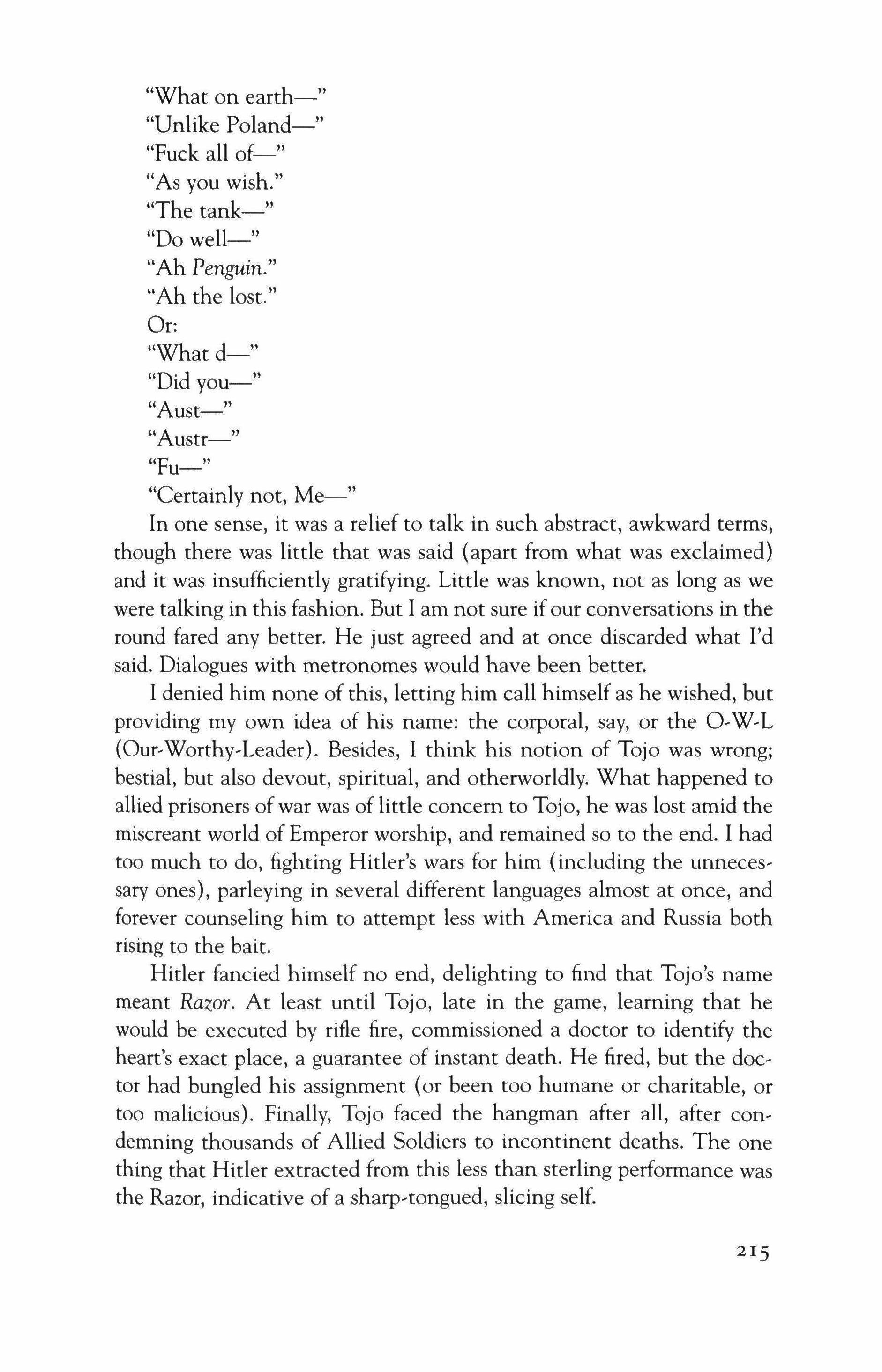
"What on earth-"
"Unlike Poland-"
"Fuck all of-"
"As you wish."
"The tank-"
"Do well-"
"Ah Penguin."
"Ah the lost."
Or:
"Whatd-"
"Did you-"
"Aust-"
"Austr-" "Fu-"
"Certainly not, Me-"
In one sense, it was a relief to talk in such abstract, awkward terms, though there was little that was said (apart from what was exclaimed) and it was insufficiently gratifying. Little was known, not as long as we were talking in this fashion. But I am not sure if our conversations in the round fared any better. He just agreed and at once discarded what I'd said. Dialogues with metronomes would have been better.
I denied him none of this, letting him call himself as he wished, but providing my own idea of his name: the corporal, say, or the 0-W-L (Our-Worthy-Leader). Besides, I think his notion of Tojo was wrong; bestial, but also devout, spiritual, and otherworldly. What happened to allied prisoners of war was of little concern to Tojo, he was lost amid the miscreant world of Emperor worship, and remained so to the end. I had too much to do, fighting Hitler's wars for him (including the unnecessary ones), parleying in several different languages almost at once, and forever counseling him to attempt less with America and Russia both rising to the bait.
Hitler fancied himself no end, delighting to find that Tojo's name meant Razor. At least until Tojo, late in the game, learning that he would be executed by rifle fire, commissioned a doctor to identify the heart's exact place, a guarantee of instant death. He fired, but the doctor had bungled his assignment (or been too humane or charitable, or too malicious). Finally, Tojo faced the hangman after all, after condemning thousands of Allied Soldiers to incontinent deaths. The one thing that Hitler extracted from this less than sterling performance was the Razor, indicative of a sharp-tongued, slicing self.
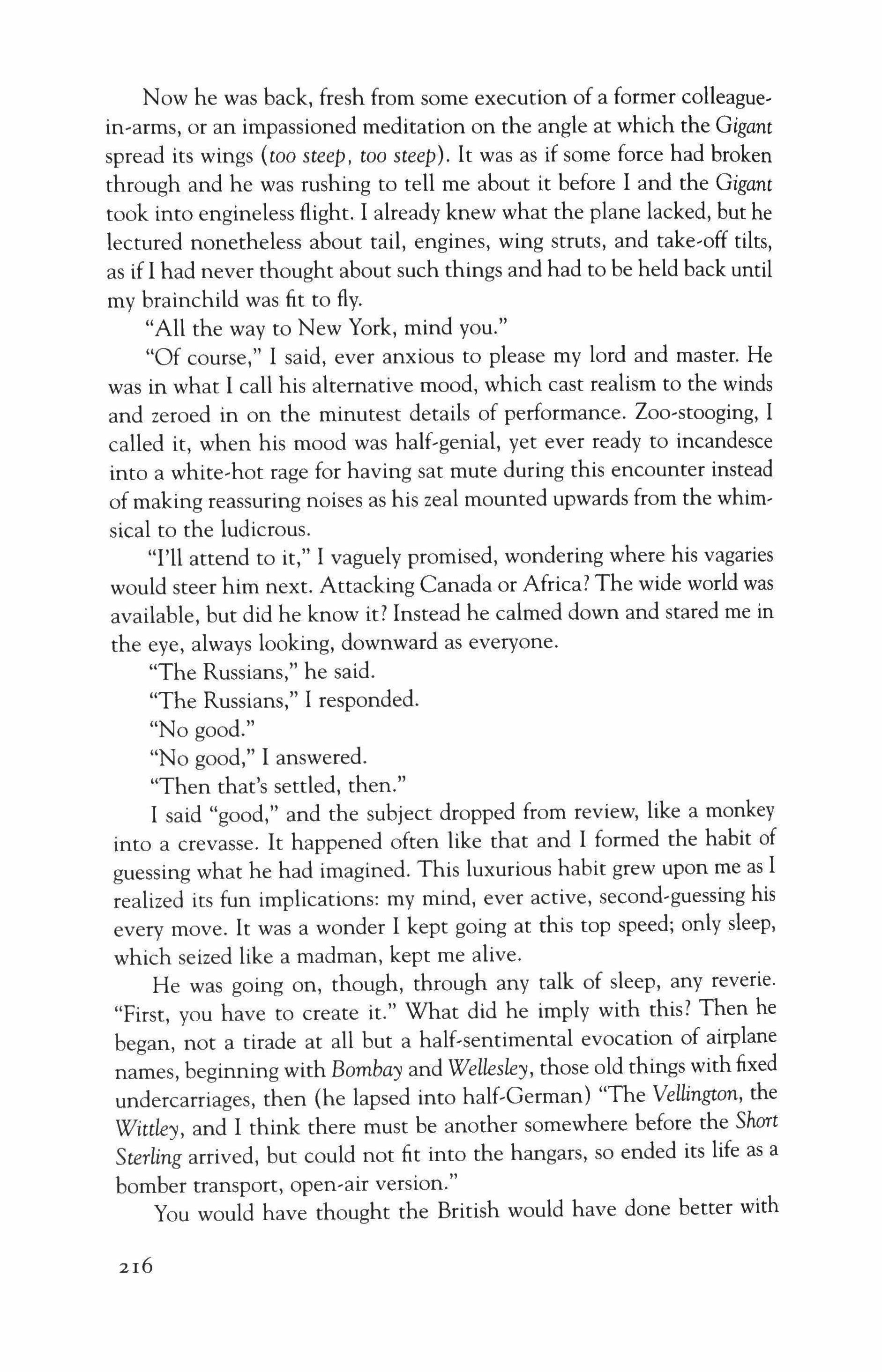
Now he was back, fresh from some execution of a former colleaguein-arms, or an impassioned meditation on the angle at which the Gigant spread its wings (too steep, too steep). It was as if some force had broken through and he was rushing to tell me about it before I and the Gigant took into engineless flight. I already knew what the plane lacked, but he lectured nonetheless about tail, engines, wing struts, and take-off tilts, as if I had never thought about such things and had to be held back until my brainchild was fit to fly.
"All the way to New York, mind you."
"Of course," I said, ever anxious to please my lord and master. He was in what I call his alternative mood, which cast realism to the winds and zeroed in on the minutest details of performance. Zoo-stooging, I called it, when his mood was half-genial, yet ever ready to incandesce into a white-hot rage for having sat mute during this encounter instead of making reassuring noises as his zeal mounted upwards from the whimsical to the ludicrous.
"I'll attend to it," I vaguely promised, wondering where his vagaries would steer him next. Attacking Canada or Africa? The wide world was available, but did he know it? Instead he calmed down and stared me in the eye, always looking, downward as everyone.
"The Russians," he said.
"The Russians," I responded.
"No good."
"No good," I answered.
'Then that's settled, then."
I said "good," and the subject dropped from review, like a monkey into a crevasse. It happened often like that and I formed the habit of guessing what he had imagined. This luxurious habit grew upon me as I realized its fun implications: my mind, ever active, second-guessing his every move. It was a wonder I kept going at this top speed; only sleep, which seized like a madman, kept me alive.
He was going on, though, through any talk of sleep, any reverie. "First, you have to create it." What did he imply with this? Then he began, not a tirade at all but a half-sentimental evocation of airplane names, beginning with Bombay and Wellesley, those old things with fixed undercarriages, then (he lapsed into half-German) "The Vellington, the Wiuley, and I think there must be another somewhere before the Short Sterling arrived, but could not fit into the hangars, so ended its life as a bomber transport, open-air version."
You would have thought the British would have done better with
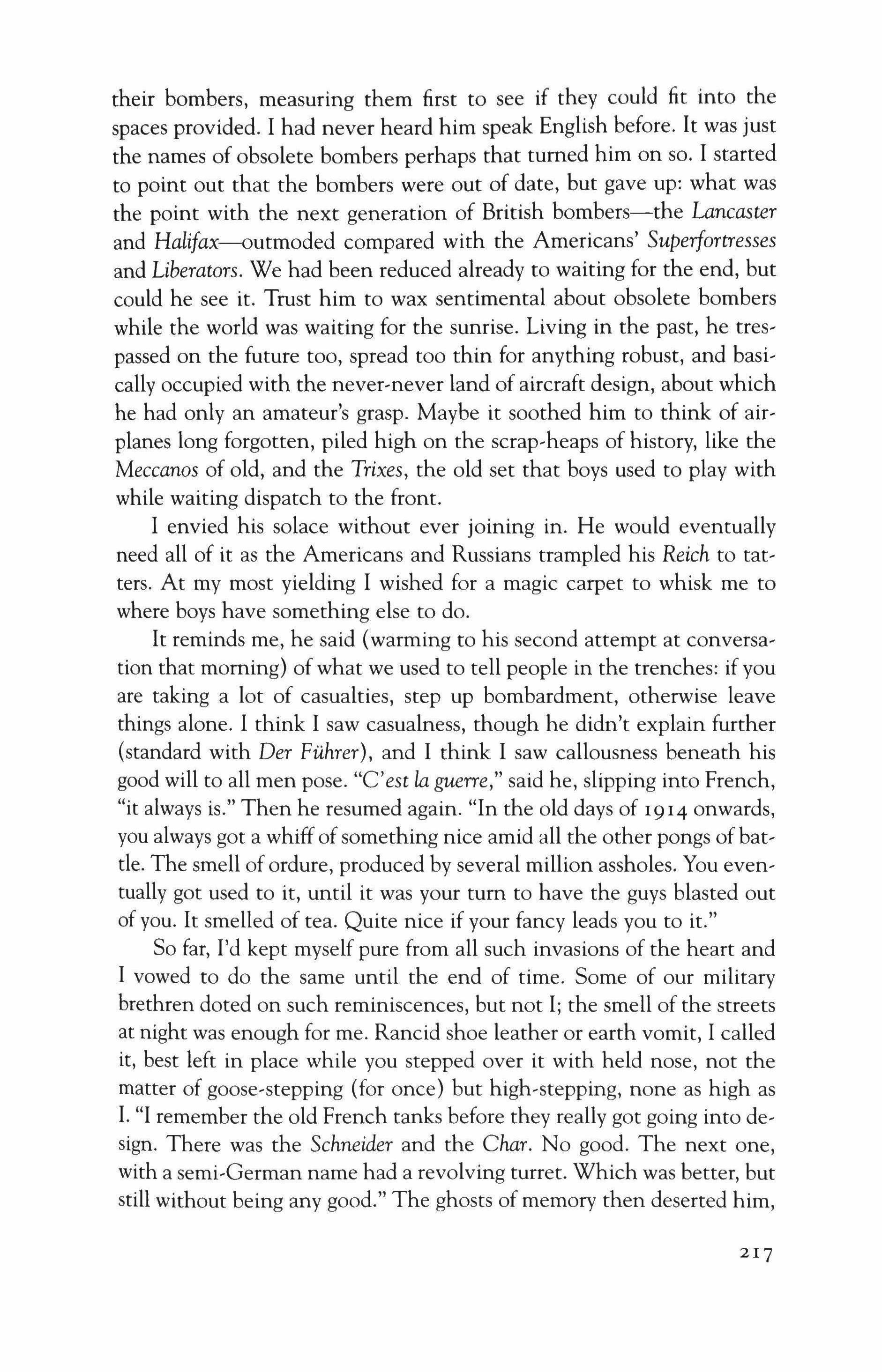
their bombers, measuring them first to see if they could fit into the spaces provided. I had never heard him speak English before. It was just the names of obsolete bombers perhaps that turned him on so. I started to point out that the bombers were out of date, but gave up: what was the point with the next generation of British bombers-the Lancaster and Halifax-outmoded compared with the Americans' Superfortresses and Liberators. We had been reduced already to waiting for the end, but could he see it. Trust him to wax sentimental about obsolete bombers while the world was waiting for the sunrise. Living in the past, he tres, passed on the future too, spread too thin for anything robust, and basi, cally occupied with the never-never land of aircraft design, about which he had only an amateur's grasp. Maybe it soothed him to think of air' planes long forgotten, piled high on the scrap-heaps of history, like the Meccanos of old, and the Trixes, the old set that boys used to play with while waiting dispatch to the front.
I envied his solace without ever joining in. He would eventually need all of it as the Americans and Russians trampled his Reich to tat' ters. At my most yielding I wished for a magic carpet to whisk me to where boys have something else to do.
lt reminds me, he said (warming to his second attempt at conversation that morning) of what we used to tell people in the trenches: if you are taking a lot of casualties, step up bombardment, otherwise leave things alone. I think I saw casualness, though he didn't explain further (standard with Der Fuhrer), and I think I saw callousness beneath his good will to all men pose. "C'est la guerre," said he, slipping into French, "it always is." Then he resumed again. "In the old days of 1914 onwards, you always got a whiffofsomething nice amid all the other pongs ofbat, de. The smell of ordure, produced by several million assholes. You even, tually got used to it, until it was your tum to have the guys blasted out of you. It smelled of tea. Quite nice if your fancy leads you to it."
So far, I'd kept myself pure from all such invasions of the heart and I vowed to do the same until the end of time. Some of our military brethren doted on such reminiscences, but not I; the smell of the streets at night was enough for me. Rancid shoe leather or earth vomit, I called it, best left in place while you stepped over it with held nose, not the matter of goose'stepping (for once) but high-stepping, none as high as I. "I remember the old French tanks before they really got going into de, sign. There was the Schneider and the Char. No good. The next one, with a semi-German name had a revolving turret. Which was better, but still without being any good." The ghosts of memory then deserted him,

but you could see the internal fury mounting as he failed to remember this and that, just when he thought he had me in his narrative clutches for the rest of the morning.
I begged as politely as possible. "Don't, Mein Fahrer, perturb yourself. You have other things to think about, hein?" The spot of French jarred him out of it (a trick I often resorted to), and he was soon bellowing imprecise orders at the roomful, which had the next bout of Hitler fury. They came, expecting a whirlwind but as often received a sulky mumble. The great man was in one of his recessive moods, which did not mean he was inclined to listen any more than when in his acid ravings. He just was sullen, a schoolboy who has been caught monkeying around with the fire extinguisher in the classroom.
Naturally, most of what was said was polite verbosity, with "May In and "Should I suggest, Mein Fahrer, that" ruling the roost. If any proposed anything like an idea, there were ructions to follow, and most held back until he had left the Conference Chamber, usually in a white-hot rage. Any good ideas that came his way, usually from one of the junior officers brought in just for a lark, brought a look of envious, indignant disdain, and the bearer of the idea was at once humbled into silence. (In my time, at the University of Bonn, such behavior was never tolerated). "Why, I was thinking the very same thing moments ago, when Keitel interrupted me " Habuitues were familiar with this kind of thing: the best and the brightest put down before they repeated the offence, followed by a posting to the Russian Front (or if too early to the department stores-condoms or uniforms?) It was a matter of holding your peace only to be overtaken by the ensuing blather in talk as everyone tried to talk at once, and much constructive matter was lost.
In a flash, he was gone, and then upon us, since my own entourage had swelled by now to include some of the high-ranking junior officers whom he liked to stand by him, not that close, but near enough to make approving comments. In another flash (what was his hold upon light"), he seemed to produce from his very being a shower of enfilades, a heap of ancillary stances building up to supplement the light (clearly some effect of mirrors). He was getting close, closer, to a revelation. I had seen it before, this Hitler supplement that made things larger than they had first appeared.
And then the door swung open and we saw hangars upon hangars, every which way, a dozen Gigants or Gigant-seeming aerial pieces in various stages of construction as the doors to them creaked open and there it was in full regal splendor declaiming "You all thought I would leave

you in the lurch! Not so." We looked again adjusting our eyes to the dazzle of fuselages and wings, something that he had brought about by the swinging of a dozen locked drawers. The whole place had opened outward in a celebration of itself. All was planes, and we who had felt superior to Adolf now felt awed by his expertise. A couple ofmonths more and the fleet of new Gigants would thunder away to Churchill's roost and reduce it to shreds. You wanted to cheer. We clapped instead. How had he managed it? By an arrangement of doors and shelves, simple as a gathering ofparsnips, or sheer magic, unfurling what had not been there before for anybody to look at. The bodies of the planes looked similar. No design changes there. But few still had engines and those that had them seemed to be missing other vital parts, tailplanes, a wing here and there. Clearly it was an air force of the future, and once in place a hammer blow for the Reich, but at least as far as Gigants were concerned, a thing of the mind, lovely in prospect yet unmagical to the heart.

The following two pieces are from a book-length work A Monster's Notes, a re-imagining ofthe "monster" from Mary Shelley's Frankenstein. At intervals throughout the book, the monster (still alive in the twenty-first century) takes notes on books he's reading, material he's viewing online and elsewhere, all in an effort to try to understand this strange race of humans that made yet shuns and fears him. The "you" he addresses is his maker, Victor Frankenstein.
Notes on Eva Hesse
From 1964 until her death in 1970, she made sculpture from industrial materials: fiberglass, latex, rubberized cheesecloth, plastic, steel.
She didn't want her work to be beautiful. Of "Right After," she said, "Coming back to it, I felt it needed more, and that was a mistake, because it left the ugly zone and went into the beauty zone."
She had just been operated on for a brain tumor.
(Can ugliness be a form of beauty? Her latex panels look beautiful to meeach worn, damaged membrane slowly leaving but still tethered to the world.)
She wanted her work to be "non-work," to exist beyond her preconceptions.
"Right After" can be hung differently each time.
(When thinking, my mind goes this way and that, swerves, reconsiders,
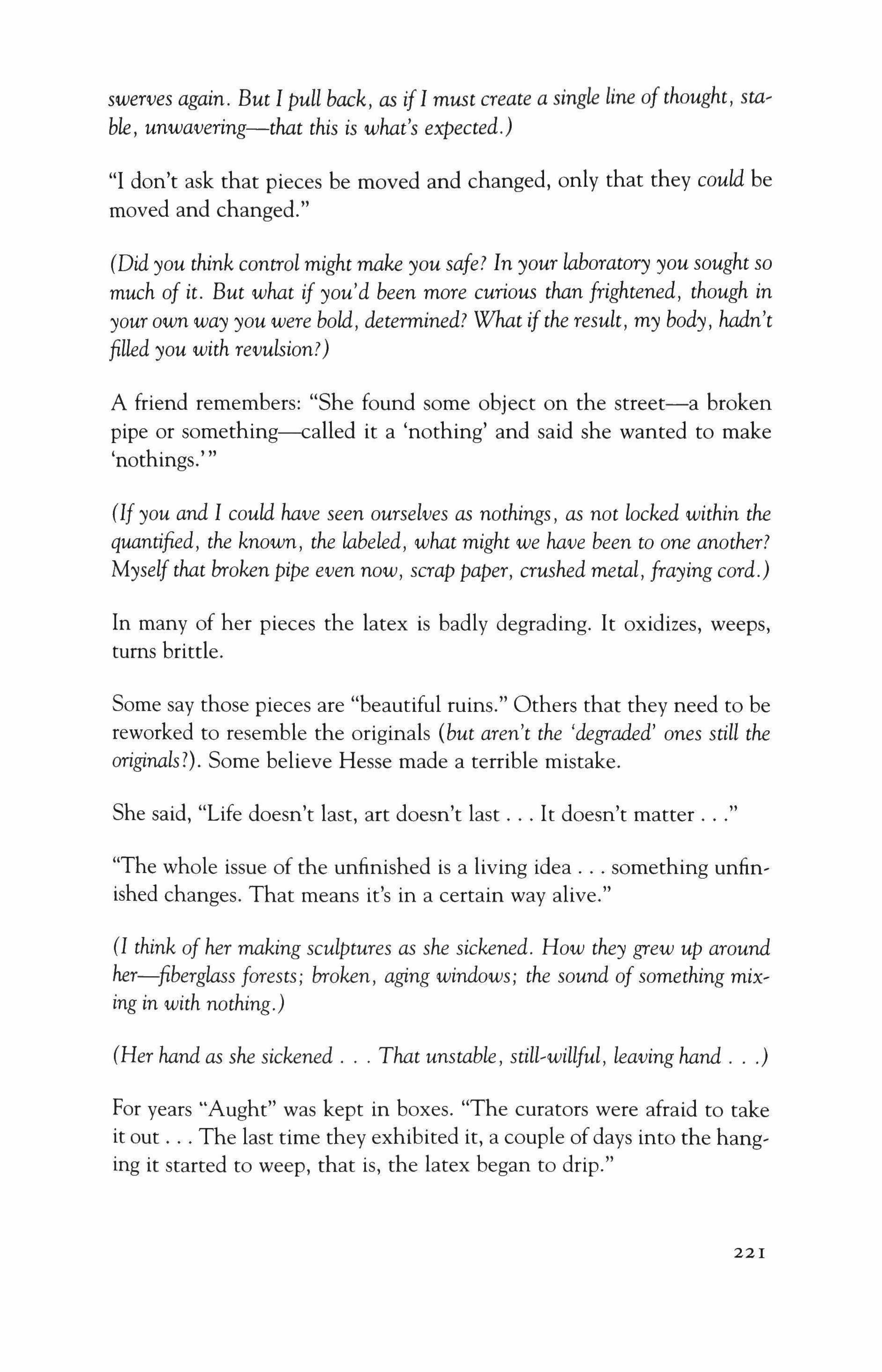
swerves again. But I pull back, as ifI must create a single line ofthought, sta� hle, unwavering-that this is what's expected.)
"I don't ask that pieces be moved and changed, only that they could be moved and changed."
(Did you think control might make you safe? In your laboratory you sought so much of it. But what if you'd been more curious than frightened, though in your own way you were bold, determined? What ifthe result, my body, hadn't filled you with revulsion?)
A friend remembers: "She found some object on the street-a broken pipe or something---called it a 'nothing' and said she wanted to make 'nothings.'
(If you and I could have seen ourselves as nothings, as not locked within the quantified, the known, the labeled, what might we have been to one another? Myself that broken pipe even now, scrap paper, crushed metal, fraying cord.)
In many of her pieces the latex is badly degrading. It oxidizes, weeps, turns brittle.
Some say those pieces are "beautiful ruins." Others that they need to be reworked to resemble the originals (but aren't the 'degraded' ones still the originals?). Some believe Hesse made a terrible mistake.
She said, "Life doesn't last, art doesn't last It doesn't matter "
"The whole issue of the unfinished is a living idea something unfinished changes. That means it's in a certain way alive."
(I think of her making sculptures as she sickened. How they grew up around her-fiberglass forests; broken, aging windows; the sound ofsomething mixing in with nothing.)
(Her hand as she sickened That unstable, still�willful, leaving hand )
For years "Aught" was kept in boxes. "The curators were afraid to take it out The last time they exhibited it, a couple ofdays into the hanging it started to weep, that is, the latex began to drip."
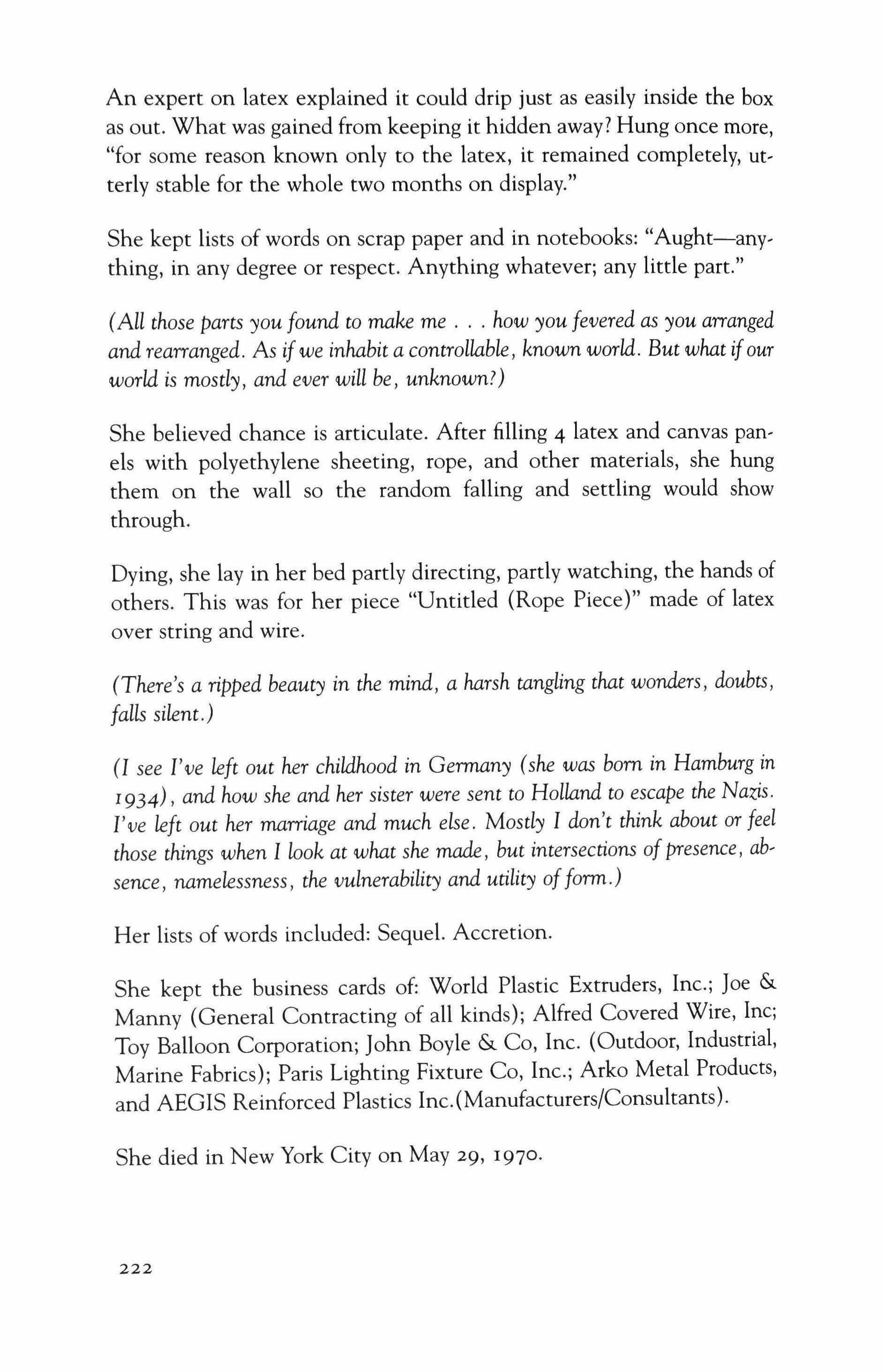
An expert on latex explained it could drip just as easily inside the box as out. What was gained from keeping it hidden away? Hung once more, "for some reason known only to the latex, it remained completely, utterly stable for the whole two months on display."
She kept lists of words on scrap paper and in notebooks: "Aught-anything, in any degree or respect. Anything whatever; any little part."
(All those parts you found to make me how you fevered as you arranged and rearranged. As if we inhabit a controllable, known world. But what if our world is mostly, and ever will be, unknown?)
She believed chance is articulate. After filling 4 latex and canvas panels with polyethylene sheeting, rope, and other materials, she hung them on the wall so the random falling and settling would show through.
Dying, she lay in her bed partly directing, partly watching, the hands of others. This was for her piece "Untitled (Rope Piece)" made of latex over string and wire.
(There's a ripped beauty in the mind, a harsh tangling that wonders, doubts, falls silent.)
(I see 1've left out her childhood in Germany (she was born in Hamburg in I934), and how she and her sister were sent to Holland to escape the Nazis. 1've left out her marriage and much else. Mostly I don't think about or feel those things when I look at what she made, but intersections ofpresence, absence, namelessness, the vulnerability and utility ofform.)
Her lists of words included: Sequel. Accretion.
She kept the business cards of: World Plastic Extruders, Inc.; Joe & Manny (General Contracting of all kinds); Alfred Covered Wire, Inc; Toy Balloon Corporation; John Boyle & Co, Inc. (Outdoor, Industrial, Marine Fabrics); Paris Lighting Fixture Co, Inc.; Arko Metal Products, and AEGIS Reinforced Plastics Inc.(Manufacturers/Consultants).
She died in New York City on May 29, 1970.

The Nuremberg Code states, "The voluntary consent of the human subject is absolutely essential." It calls the patient the "experimental subject." (What would you have called me?)
It holds that experiments must not be "random in nature." (Yet doesn't much that's beautiful and good arise from what's random? My mind spins as 1 think this)
(In "consent" 1 hear "sent." You sent met forth into my self, my body, but that self was made of otherness and strangeness, in darkness and in shame. The experiment I was wasn't mine. I was sent into a foreign country, but that country's inside me, and 1 never meant to go.)
In October, 1976, John Moore was diagnosed with hairy-cell leukemia.
After "withdrawing samples of blood, bone marrow aspirate, and other bodily substances," Dr. David W. Golde confirmed the diagnosis and recommended Moore's spleen be removed.
Moore signed a consent form authorizing the operation.
(Forms, signatures, codes-how far from what happened in your laboratory. Yet when I think of the doctor in his white coat behind his desk, and the pa� tient on the other side, lost in the strange country of his illness, I think of all that passed between us. So much unspoken. So much before my eyes had even opened.)
On October 20, Dr. Golde removed John Moore's spleen. He'd made arrangements to keep it for his research, but Moore didn't know this.
He was using Moore's T�lymphocites to establish a cell line of lymphokines for medical purposes. From 1976 through 1983, John Moore returned for additional visits at Dr. Golde's request. Each time he left samples of "blood, blood serum, skin, bone marrow aspirate and sperm."
(Strange to think how part of oneself can thrive, exist, outside oneself, can have a separate life apart.)
("The Truth, is Bald, and Cold-")

Moore thought giving samples was an ordinary part of follow-up therapeutic care.
(How little we know of our lives. The mind sees but doesn't, knows much but also doesn't.)
His Tlymphocytes were "interesting" to Dr. Golde because they "over, produced certain lymphokines, thus making the genetic material easier to identify."
On January 30, 1981, Dr. Golde, his colleague Dr. Shirley Quan, and the Regents of the University of California, applied for a patent on John Moore's cell line.
(Unlike them, you hid in shame what you had done. Should I respect the shame you felt? Feel tenderness toward the way you suffered, lived in secrecy? But what might have happened if1'd turned out as you wanted? What ifyou'd liked what you had made, hadn't felt ashamed, disgusted? That question haunts me.)
On March 20, 1984, U.S Patent No. 4,438,°32 named Dr. Golde and Dr. Quan "inventors of the cell-line" and the Regents the "assigne." They would "share in any royalties or profits."
Biotechnology experts predicted a three billion dollar market for lymphokines by 1990.
(More and more I trust in the bare facts of things, even if such facts are hard to gather and get clear. I want to grasp the facts ofthis, what happened. I want to let those facts-not my wonderings about them-speak.)
When he learned of the patent, Moore filed suit, accusing the doctors and university of interfering with his "ownership" and "right of posses' sion." He claimed a proprietary interest in any "products the defendants might create from his cells or patented cell line."
(Strange how the body becomes a thing that's owned, co-owned, disputed. How it's one's own but not -a generator ofprofits. Legalized, fought over, shared, unshared. What does it mean to be "oneself?")
In 1990 the California Supreme Court ruled against John Moore.
224
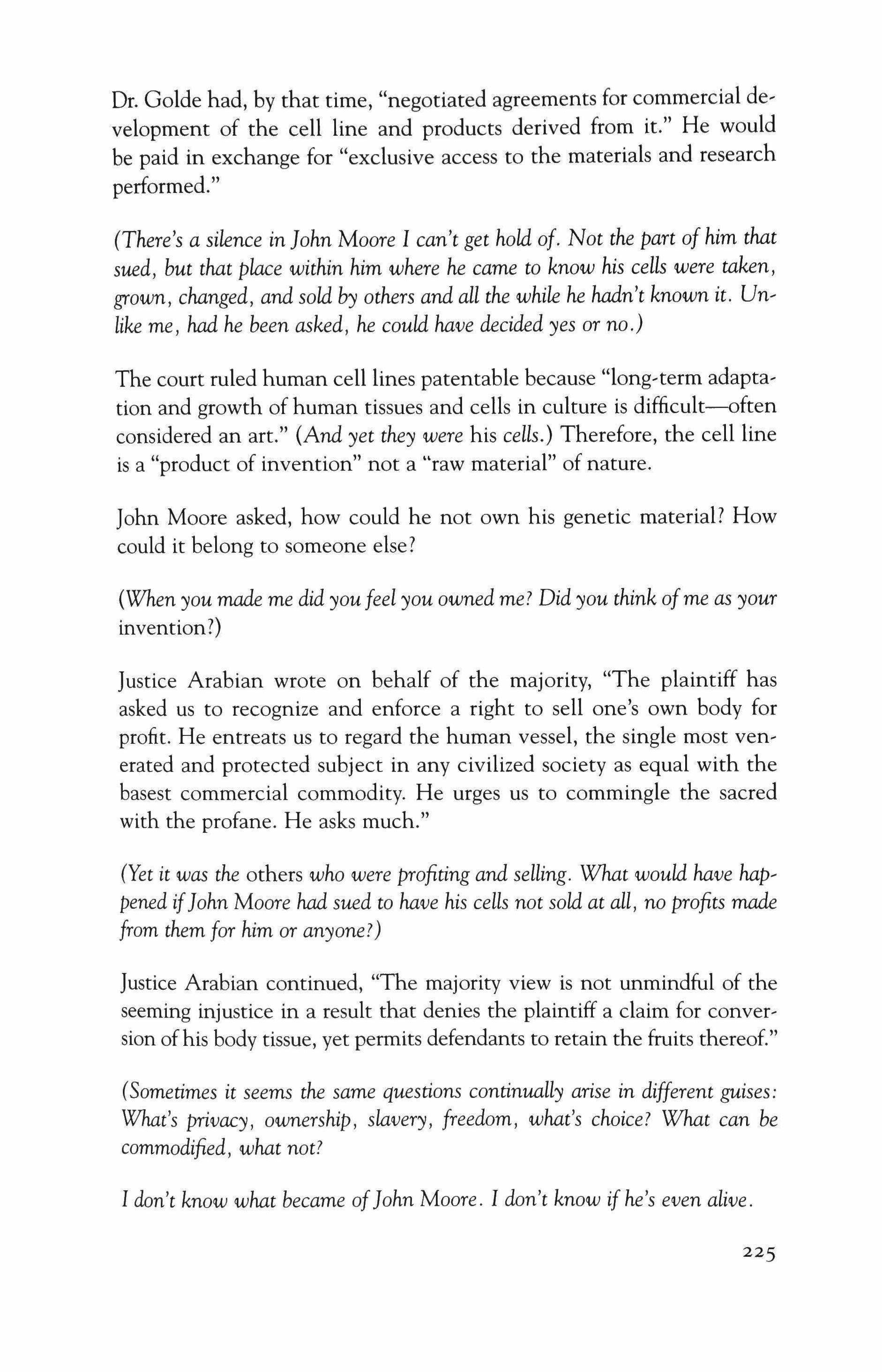
Dr. Golde had, by that time, "negotiated agreements for commercial development of the cell line and products derived from it." He would be paid in exchange for "exclusive access to the materials and research performed."
(There's a silence in John Moore I can't get hold of. Not the part of him that sued, but that place within him where he came to know his cells were taken, grown, changed, and sold by others and all the while he hadn't known it. Unlike me, had he been asked, he could have decided yes or no.)
The court ruled human cell lines patentable because "long-term adaptation and growth of human tissues and cells in culture is difficult-often considered an art." (And yet they were his cells.) Therefore, the cell line is a "product of invention" not a "raw material" of nature.
John Moore asked, how could he not own his genetic material? How could it belong to someone else?
(When you made me did you feel you owned me? Did you think of me as your invention?)
Justice Arabian wrote on behalf of the majority, "The plaintiff has asked us to recognize and enforce a right to sell one's own body for profit. He entreats us to regard the human vessel, the single most venerated and protected subject in any civilized society as equal with the basest commercial commodity. He urges us to commingle the sacred with the profane. He asks much."
(Yet it was the others who were profiting and selling. What would have happened ifJohn Moore had sued to have his cells not sold at all, no profits made from them for him or anyone?)
Justice Arabian continued, "The majority view is not unmindful of the seeming injustice in a result that denies the plaintiff a claim for conversion ofhis body tissue, yet permits defendants to retain the fruits thereof."
(Sometimes it seems the same questions continually arise in different guises: What's privacy, ownership, slavery, freedom, what's choice? What can be commodified, what not?
I don't know what became ofJohn Moore. I don't know if he's even alive.
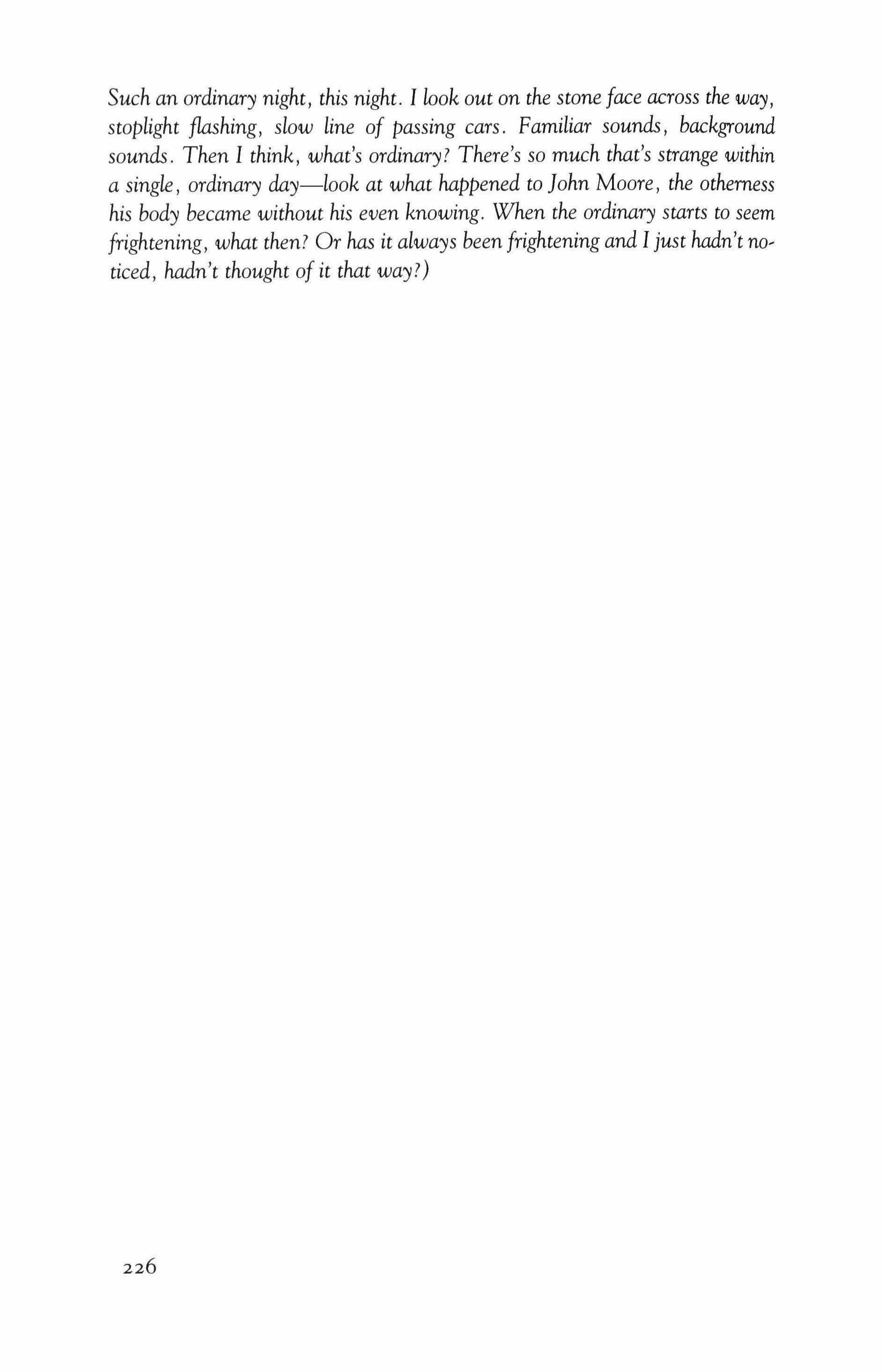
Such an ordinary night, this night. I look out on the stone face across the way, stoplight flashing, slow line of passing cars. Familiar sounds, background sounds. Then I think, what's ordinary? There's so much that's strange within a single, ordinary day-look at what happened to John Moore, the otherness his body became without his even knowing. When the ordinary starts to seem frightening, what then? Or has it always been frightening and I just hadn't no, ticed, hadn't thought of it that way?)

The water chestnut is what is known as "an introduced species," but on this July morning on this quiet backstretch of the Hudson River, such phrasing seems especially curious. I have always thought of an introduction as some kind of courteous exchange, an agreement on some kind of mutual civility. In the language of botany, however, the term refers to nonindigenous organisms that have either accidentally or deliberately been brought to a new location, often with an adverse effect on native plant and animal life. Out here on the river now, it's clear that no gracious understanding of any kind has come to pass. Rather, the water chestnuts have simply returned here as they do every summer, their leaves forming a canopy over the surface of the water, preventing light from getting into the water, reducing oxygen, preventing photosynthesis, and in the process, making it nearly impossible for the aquatic life beneath to survive.
Emerson suggested a weed was nothing but a plant whose virtues had not yet been discovered, but as befits a time when our transactions with the natural world seem to have gone awry, it only makes sense that the water chestnut has followed the reverse course. Once valued for both its culinary and medicinal properties, it was introduced to this country in the late eighteenth century as an exotic ornamental plant. Now, it is nothing more than a water weed that chokes our rivers, and with seeds that can attach from everything to bird feathers and fur to boats and cars, its reach across the waterways of the northeast has been

swift and irreversible. Which is to say, it spreads like most other kinds of trouble-whenever, wherever, and however mercilessly it can.
Yet looking at the plant, who would think it capable of such malevolence? Who could have dreamed up such a plant that at once floats and is rooted? Certainly the configuration of its parts is so particular you could only imagine it was designed for some specific purpose, though it would be hard to guess precisely what. Its rosette composed of softly triangular leaves floats on the surface of the water, while its barbed black seedpod anchors the plant in the riverbed; often called a devil's head, the pod, with its sharp, pointed protrusions, is treacherous when stepped on. Clearly, this is a plant with a double life, one above the surface of the water, the other below; it is at once concealed and exposed, submerged and in the open air, its innate beauty and brutality tied together by nothing more than a submerged frail stem and feathery leaves tinted a watery brown and pink. Alternately, the plant has been called "death flower," "water rose," and "water caltrop" after the metal burs intended to pierce the hooves of horses in warfare.
And each season now, they come and they go. Like any other agents of dysfunction, they observe their own rhythms, their own private sense of order, specific to time, to place and to the conditions of the air and water around them. Annuals, they grow best where the river is slow and shallow, and this particular patch of the Hudson River just above a spit of land is a shallow backwater that seems made to cultivate them. Their custom is to arrive sometime in the middle ofjune. Later in the summer, as the salt front from the Atlantic Ocean moves up river, the salinity will kill them, and by the end of September, the leaves, roots, and stems will have all decomposed. By then, however, the sharp devil's head is just the husk for its seed that drops down to the river bed to winter in the mud and germinate the following summer.
When I had gone down to the river in earlyJune, there was no sight of them. But it was late afternoon, and the tide was high, and the angle of the summer sun was such that the river seemed without color, just a wide, glistening sheet of light. There is no beach on this stretch of river, but when I climbed over the rocks to put my feet in the water, I see that it is brown, murky, turbid, all evidence of its aquatic health. But the water chestnuts operate with their own botanical craft, making themselves visible only at low tide, and already, I know, they have been carpeting the surface of the Fishkill Creek just south of here. It is pointless to imagine we will be spared the water chestnuts this summer.
Besides, invasive though they may be, the water chestnuts can still

generate mixed feelings. A friend of mine who is a marine ecologist tells me she views them as the aquatic equivalent of canaries in the mine. She believes their annual appearance offers its own reassurance-their sudden absence could indicate that things are even more wrong than they already are. Her words are a reminder of how our index of disaster has been revised; and of all the different ways things can go wrong. That they are here at all brings distress to the river's aquatic life; but were they to vanish, that could signal even greater disaster. And it occurs to me then that we have entered upon some new abnormality in the landscape of calamity that we must consider how things are going wrong when they have not gone wrong.
And sure enough, a week and a half later, I see they have surfaced, a radiant meadow of assassins in full bloom across that wide plane where the water meets the air. For the first week or so, their blanket across this stretch of river is incomplete, patchy rather than the continuous, opaque surface I remember from the year before. But in a matter of a days, there are more of them, and then still more, and as they continue to fill in over the course of the weeks that follow, it is impossible not to wonder if they are creating a habitat of their own, this city of stars floating at the edge of the river. In late June when it is spawning season, you can watch the carp jumping, flashing, arcing in and out of the surface. Tolerant of water with low oxygen levels, the carp are after the macroinvertebrates that thrive on the water chestnuts or in the sediment on the bottom of the river. The young carp can also take advantage of the shelter they find in the water chestnut beds from waves and currents, as well as from predators such as the large-mouthed and striped bass.
Clearly there is some kind of life going on here. Elsewhere, the blue heron use the carpet of water chestnuts as a feeding ground. And citing big blue damselfly adults, marsh lady beetles, water lily leaf beetles, wolf spiders, and water fleas, a report prepared by the local conservation group, Hudsonia, remarks that "the water-chestnut-community must be a restaurant for small to medium sized predators which can cope with dense beds, water, and soft mud." Surely there is some lesson here about those times that calamity becomes its own reassuring habitat; those occasions both on the river and off in which a constant state of distress becomes so familiar, sometimes so deeply comforting and comfortable, as to cultivate its own small, sustaining ecosystems.
By early July, they have become dense, and what began as a thin, almost translucent film of leaves across the surface of the water has become a thick, unremitting carpet. Well removed from the current of the

mid-channel, this tranquil stretch of river offers a place to swim, but if it is to be accommodating to swimmers, some of the water chestnuts will have to be pulled out. It's a job that has its own enticements, though; being in a cool river on a hot summer day has a universal appeal. But it's not just that a river remains a symbol of restoration for all of us, some vital artery streaming through our emotional landscape. At a time when a sense of displacement so often characterizes our transactions with the natural world, there may also be something in the act of clearing a river choked with weeds that speaks to our own collective need for order. All of which is how my friend Nancy and I have come to find ourselves weeding the river.
It's in the high eighties, the water temperature only ten degrees cooler, not much on a blistering July day. This is a summer river, which is to say, the water at the surface is tepid, warm, but the deeper you go, the cooler it is. Low tide was at II: I 9, so we have come an hour earlier, so that we will be able to stand up where the water deepens. The water is waist high, or at the most, chest high. The stem can be several feet long.
If you reach into the water and grab a water chestnut by its stem, then wind it around your wrist before you pull it out, Nancy tells me, you'll have a better hold on it and a better chance of getting it by the root. We fill our buckets this way, then walk through the water over to the shore where we dump them above the tide line where they will decompose. And then we do it a second time.
Weeding a river is an exercise in which leisure and industry easily coincide; it's a brand of gardening in which a sense of purpose can intersect with being languid. Like most things you try to do in water, you find yourself doing it slowly, as though it is possible to take on the liquid motion of what is around you. The stems can be pulled out with the gentlest tug; their attachment to the river bed seems slight, their resistance imperceptible. Yet there is the smallest bit of spring to them, as though some bit of elastic thread has woven its way through the watery pink tendrils, and they have that sense of give that, oddly, the most tenacious opponents sometimes seem to have. With a bit of stretch, these interlopers seem to be hanging on, though without much faith. And the mud on the bed of the river has a give too; at each step, we sink in a bit. Perhaps this is why I am so drawn to the waterworld of rivers; nothing here stays the same for too long; things are always shifting, drifting, gently giving way.
Our weeding accessories are primitive. Once we have pulled them

up, we put the water chestnuts in a small, gray bucket. Small circles no larger than a dime have been punched into it so that the water drains out. The bucket is kept afloat with a bright, blue foam swimming noodle encircling it and attached with a strip of silver duct tape. Buckets, noodles, tape. There is an almost childlike quality to the tools we are using, as though they are the accessories in some kind of water game. We are not dousing the leaves with pesticides, because there are no such things as safe pesticides; only ones that are more or less toxic. Nor are we relying on the blades of some mechanical weedcutter or harvester. They are expensive, and the heavy boats that carry them are impractical for shallow water. And while biological controls may be found in the future, there is nothing conclusive, or licensed for that matter yet.
Not long ago I read an account of Qingdao, a city in China whose coast was being choked by an unexpected bloom of green algae, officially said to be a result of warmer weather and heavy rains, but more likely a product of excessive nutrients from sewage, industrial pollutants, agricultural waste. The photographs documented not so much a landscape of displacement, but a grotesque parody of aquatic flora-what should have been the surface of clear water was a swirling, shaggy stew of chartreuse plant life. The city was to host the regatta for the summer Olympics, and thousands of city residents had volunteered-or been ordered-to go out into the Yellow Sea on foot or in small wooden boats to scoop it up by hand.
And I wonder how it has come to be that our responses to these invasive species are so rudimentary--our little gray buckets, their little wooden boats; and how our ingenuity so often fails us when it comes to cleaning up after ourselves, as we are going out now, collecting these with nothing but our hands. I have often heard the term citizen activist to describe the kind of effort we are engaged in this morning, but the phrase that makes more sense to me is incidental steward. Because what we do and what we use to do it with both have the air of improvisation. Pete Seeger says the world changes one teaspoon at a time, but on the river on this shiningJuly morning, it is more like one leaf, one stem, one seed at a time.
The water is clear, and it's easy to see the river bottom. The spit of land we are near was once the town dump, and I have seen a photograph in which plumes of smoke rise from what is now a grassy lawn. But the river bed still bears evidence of that time, shards of glass, the remnants of cans and tools, bit of metal, an old shoe. Nancy finds a

dartboard, debris that looks to be more recent, but it is unlikely to serve again as any measure of human accuracy. I have always thought of a river as a place of running water, of currents and flow and velocity, a fluid artery that takes you from one place to another with a sense of purpose and direction. This afternoon, though, this quiet backstretch seems more like an archive, some wide, watery cabinet that contains things: leaves, stems, pods, mud, floating logs, debris, rocks. Things reside here. Amazingly, they can rest here. And as we continue to pull the weeds out for the next hour or so, we find ourselves gently disrupting the arrangement of the river bed, reassembling its articles in slow motion to compose a subaquatic still life that is only slightly different from the one before. A shoe is realigned next to an old bottle. A devils head is pulled out of the river's silt. The situation of a shining leaf is changed. Pulling the weeds out of a river, I realize, is as close as you can get to weeding your dreams.
I wonder whether it would make a difference if only some percentage of these weeds were removed; and whether this is the kind ofdistress that can be alleviated by degrees. There are times, after all, when partial recovery is the most you can ask for. Can distress of this magnitude be thinned, pruned, diminished? Or, as a practical matter, must it be extinguished altogether? But in regard to water chestnuts, oxygen depletion, and maybe other things as well, it is the kind of idle speculation that is easy to engage in when you are spending the morning in and on the river. The only thing I am beginning to grasp for sure is what has brought me here, which has something to do with the chance to restore clarity to what is cloudy and cluttered in our lives. That it is possible to weed something so fluid as river water speaks to our ability to put some kind of order to those things in our lives thought to be too quick, too changeable, too transparent to require our care.
And so we pull at the stems, and as we do, the shape is reconfigured, the space between the rosettes changed. I am reminded of the work of the artist John McQueen, whose materials tend to be those found in nature, willows branches, twigs, and weeds. But from time to time he also manages to find letters of the alphabet in these and in the limbs and leaves of trees, often photographing an A or an H or an M, a whole system of improvisational typography constructed by the arc and bend of branches and boughs. His search for these letters reminds me of the way we all look to the natural world for meaning. In the same way children find in a cloud formation a fish, a castle, sometimes even an entire continent, something they know, or perhaps, something they want to know,

it seems to be in us all to look to nature to track something we might recognize, some elusive calligraphy of order.
But just as we can find meaning, so, too, can we remain indifferent to it. For all their elusive beauty, McQueen's woodland alphabet can't help but evoke the 1963 movie, It's a Mad, Mad, Mad, Mad World, in which a trove of cash is hidden under the Big W, a grand configuration made by the arcing trunks of palm trees. Something in me remains certain that the Big W is a precursor to the vast acreage of environmental art that has since been produced. Surely its message is as resonant as any piece of earth art by Robert Smithson or Michael Heizer. In the movie, hilarity ensues as Buddy Hackett, Milton Berle, and an assortment of other deranged characters keep looking around the palm trees, through them, in front of them, behind them, without ever actually seeing the extravagant letter they form swaying over their heads. I saw the movie when I was ten, and though I may not have realized it at the time, it taught me how comedy can sometimes be a product of nothing more than our scathing indifference to what is right before our eyes. And how laughter can sometimes make you weep. And as Nancy and I continue to reshape the contour of these leaves, revising the space between them, I find myself amazed all over again at how we seem to nurture equally and simultaneously the ability to locate a logic in the natural world and the aptitude to remain oblivious to it.
I have never been much of a gardener. I have nothing but respect for the process and certainly am grateful for the rewards, the Mexican pitcher full of daffodils in April or the bowl of fresh blueberries in August. But whether it is the time or the patience or the sheer volume of knowledge that seems to be required to properly cultivate a garden, I know it is something beyond me. Each spring, though, it gives me pleasure and satisfaction to pull the weeds out of the perennial bed. There is something about yanking out the sprouts of maple, dandelion roots, and ryegrass that have threaded their way through the peonies and irises that answers to the part of me that wants to set things right. Pull out a tuft of crabgrass and you are getting the better of an interloper. Tug the brambles out of the ground, and it restores some small sense of order.
Weeding this backstretch of river is a similar enterprise, but on a scale that is at once more grand and more elusive. And it occurs to me now that it is the opposite of an introduction, and I find myself wondering if there is a word for that. And where I might find the letters, possibly even an entire language, whether in the branches of trees or between leaves on the water or anywhere else at all, that might offer the
word for that kind of polite disengagement that would enable all of us and the things we live with to become strangers to one another; to resume never having met. Surely that is what the situation requires. I know that if I ever found that word, though, it would disappear as quickly as it came, as fugitive as any cloud or leaf. All I have at hand, anyway, are the blue noodle, the gray bucket, the silver tape. And by the time the morning is over and the tide coming in again, I know that weeding this river is probably as close as I'll ever come to knowing what that word is.
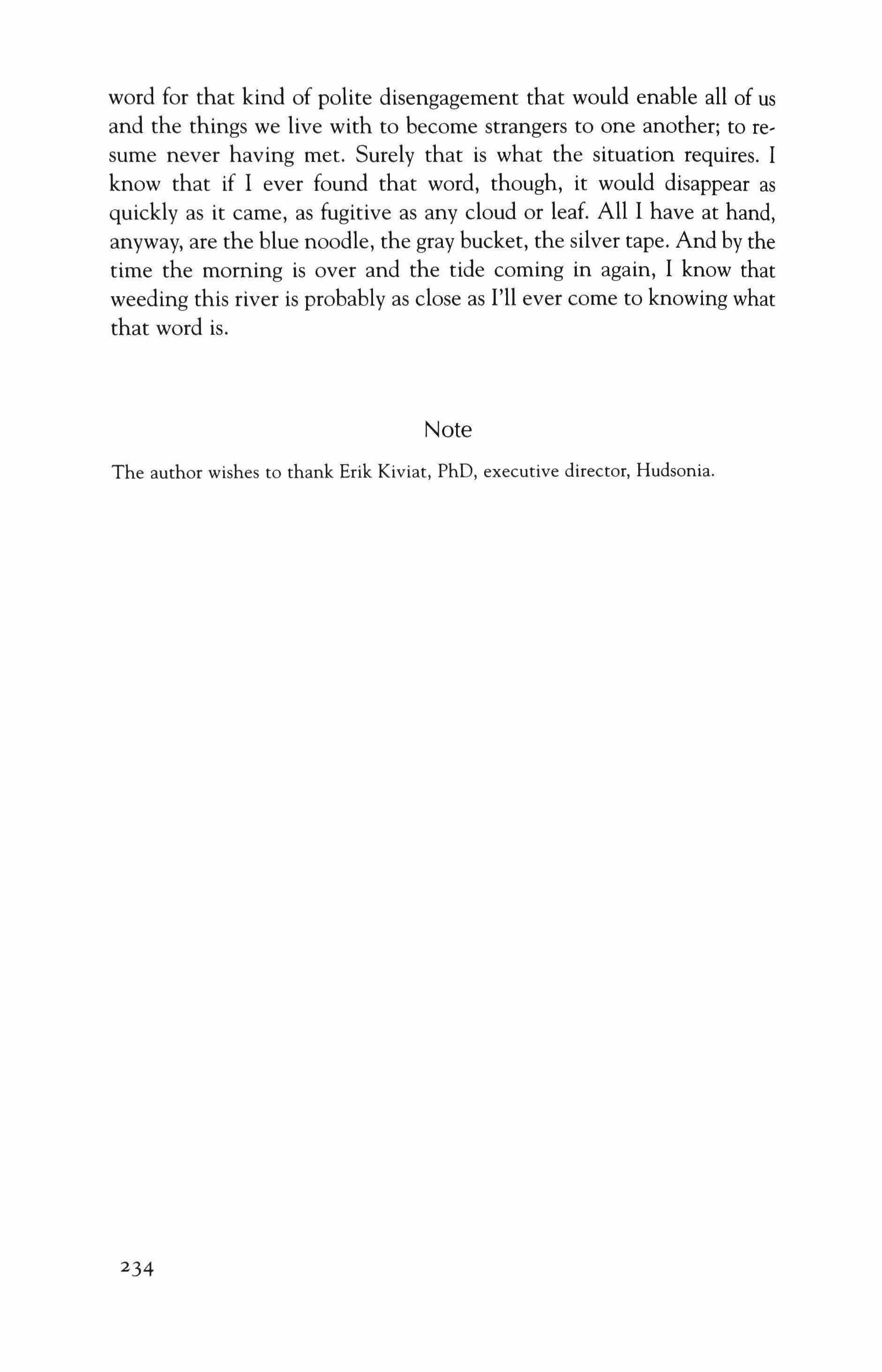
Note
The author wishes to thank Erik Kiviat, PhD, executive director, Hudsonia.
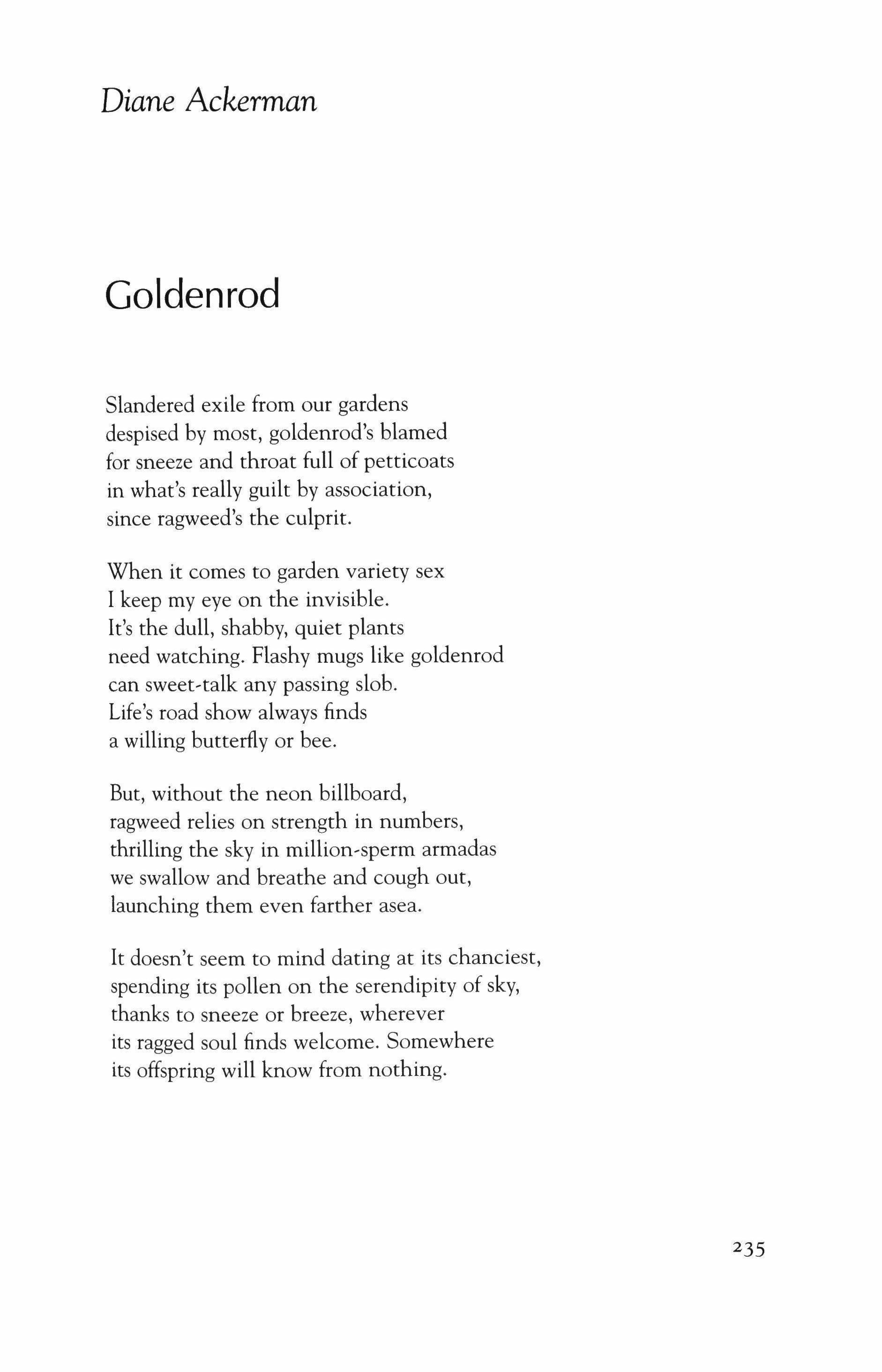
Slandered exile from our gardens despised by most, goldenrod's blamed for sneeze and throat full of petticoats in what's really guilt by association, since ragweed's the culprit.
When it comes to garden variety sex
I keep my eye on the invisible. It's the dull, shabby, quiet plants need watching. Flashy mugs like goldenrod can sweet-talk any passing slob. Life's road show always finds a willing butterfly or bee.
But, without the neon billboard, ragweed relies on strength in numbers, thrilling the sky in million-sperm armadas we swallow and breathe and cough out, launching them even farther asea.
It doesn't seem to mind dating at its chanciest, spending its pollen on the serendipity of sky, thanks to sneeze or breeze, wherever its ragged soul finds welcome. Somewhere its offspring will know from nothing.
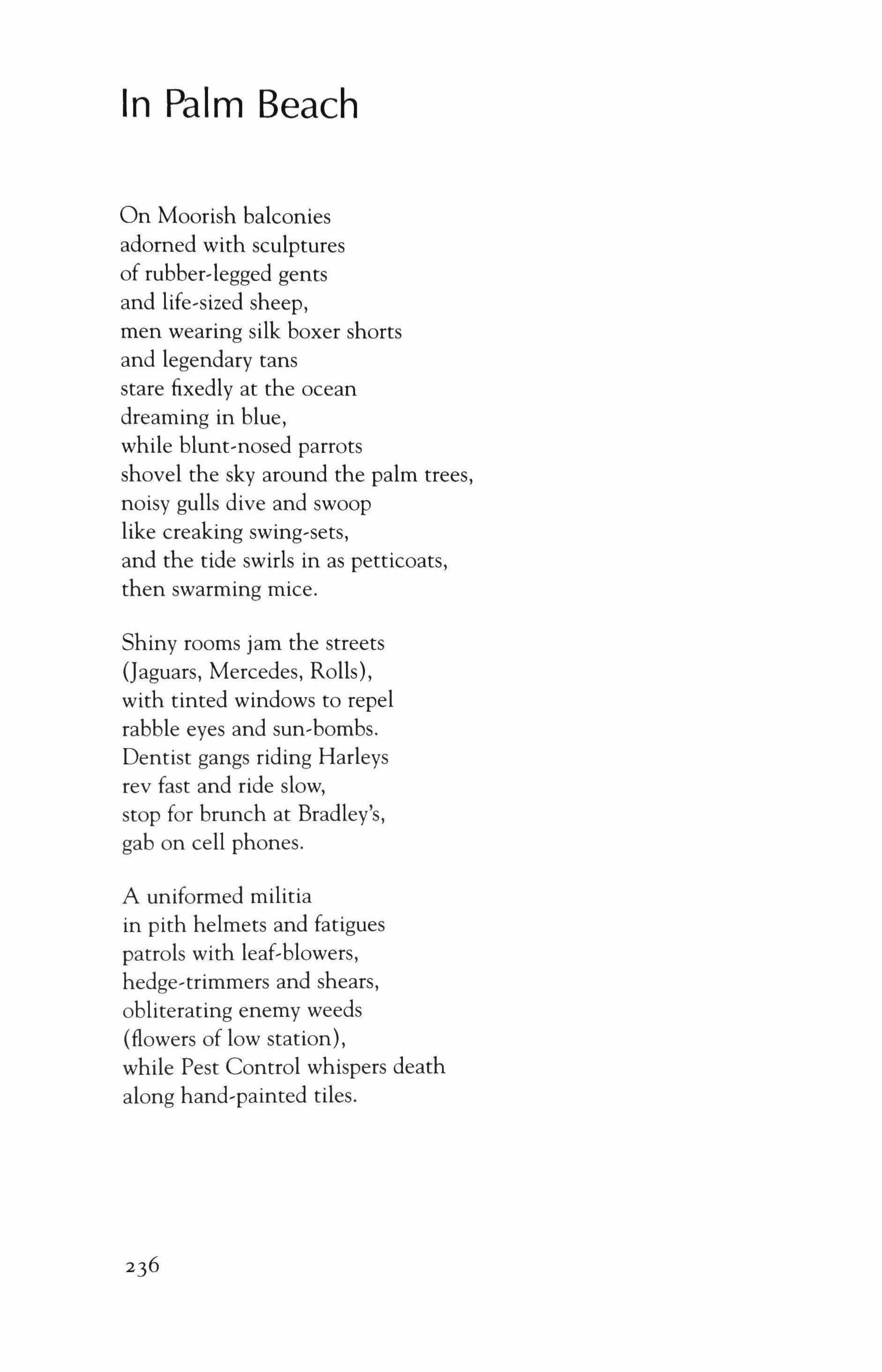
On Moorish balconies adorned with sculptures of rubber-legged gents and life-sized sheep, men wearing silk boxer shorts and legendary tans stare fixedly at the ocean dreaming in blue, while blunt-nosed parrots shovel the sky around the palm trees, noisy gulls dive and swoop like creaking swing-sets, and the tide swirls in as petticoats, then swarming mice.
Shiny rooms jam the streets (Jaguars, Mercedes, Rolls), with tinted windows to repel rabble eyes and sun-bombs. Dentist gangs riding Harleys rev fast and ride slow, stop for brunch at Bradley's, gab on cell phones.
A uniformed militia in pith helmets and fatigues patrols with leaf-blowers, hedge-trimmers and shears, obliterating enemy weeds (flowers oflow station), while Pest Control whispers death along hand-painted tiles.

Mom and I dine on salads at her club, as neighbors pause to gush hello. Between mouthfuls I help her sort memories of early childhood, teen years, being a young bride, the many trials that shamed her. I am the first she trusts with this recital of growing up poor, marrying pain, learning grit.
Glad to guide her reveries as best I can, I play uneasy roles: confessor, parent, gal pal, life-review guide, grief counselor. When, in feats of self-fright, she imagines unpuzzling in a coffin, I renovate the scene for her, fashioning metaphors she can bear.
At my bidding, all alone while my dad runs errands, she's been turning on the tape recorder and reminiscing out loud, savoring the picturesque saga of her life.
Today she shares some intimacies she plans to leave out, but wants me to know and never write about. Hungry for the milk of her past, I listen and agree what to omit, what to reveal, as the room brightens to a sunlit field where life is the innkeeper and love the meal.

All your friends will have been punched by then and you will have worried for a while about the idea of it, but it would not be so bad the first time. It would not be so bad getting punched hard and in the eye high up near the cheekbone especially if you didn't know the punch was coming. Especially if there wasn't any time for the worrying about was a punch going to come or not.
But if there was nothing you could do about it-like if you were sleeping when it happened and you had no idea what hit you-there would be no time to worry. You would just wake up on the top bunk and jet back on your bed toward the wall holding your hand over your eye and looking out the other eye at your father.
It would take a while to figure out what happened because you will not be used to waking up that way. You are used to waking up slowly and leaning over to see the clock on the dresser, so there won't be time to rub your eyes and squint at the light coming in the window. You wouldn't sit there to remind yourself what day it is and wonder if you should get up right away or go back to sleep because it's Saturday. You would just jet back against the wall away from the punch, and ask yourself where am I, and then your head would try to figure out why your father is standing there.
And through your other eye you would begin to wonder if you are going to get punched again, and could he still reach you if you get way back against the wood-looking paneling. And then you would wonder why he would do that, why he would wake you up that way.

Probably there would be two reasons. One of the reasons would be because he found stick matches in your top drawer after he got a whiff of fire from the coffee can where you conducted the fire experiments in the basement. Probably he smelled old fire while he was ironing his own shirt in the basement. That would be the thing he would be yelling about. Not yelling really, but making the skin tight around his mouth and gritting his teeth. But not screaming. He wouldn't want to wake your brother up in the bottom bunk if that is where he even was right then.
Your father would not say anything about the other reason why he punched you in the eye to wake you up on a Saturday in the springtime. He would not say that it was because your mother told him she didn't love him anymore and maybe never did.
That is the reason you would be thinking of though, while he is gritting his teeth about the matches and the fire. You would be thinking of what you heard your mother tell him the night they were sitting on the steps of the apartment building on the first warm night of spring. You would try not to cry in the comer of the bunk bed but you would not be able to stop. Not because of the pain, though-not because of the throbbing in your eye, the blood pumping to your face like a heartbeat. You would not cry because of the pain but because of what your mother told him.
And you would begin to wonder what your eye looked like. You would want to see it in the mirror. And while you are crying there and your father is talking about the dangers of matches you would know that he is trying to look under your hand to see how your eye is and you would try to cover it up better so that he could not see it.
But you would know this: you would know he didn't mean to do it. He didn't mean to wake you up that way. He would not have to say he was sorry. You would already know that he was sorry from the way he was not grinding his teeth anymore and from the way he was leaning and trying to see your eye under your hand you would know that he was sorry.
You would feel your eye blacken, feel it puffing up a little, and even somehow see it turning black and blue, and you would begin to wonder what you would tell your friends when they see you with your black eye. You would begin to wonder what to tell your mother.
You would wish you could lean over the bunk bed to see if your little brother is down there, but you would be afraid to get too close to your father. You would make a secret sign of the cross in your head and pray a secret prayer that your brother is watching cartoons in the front
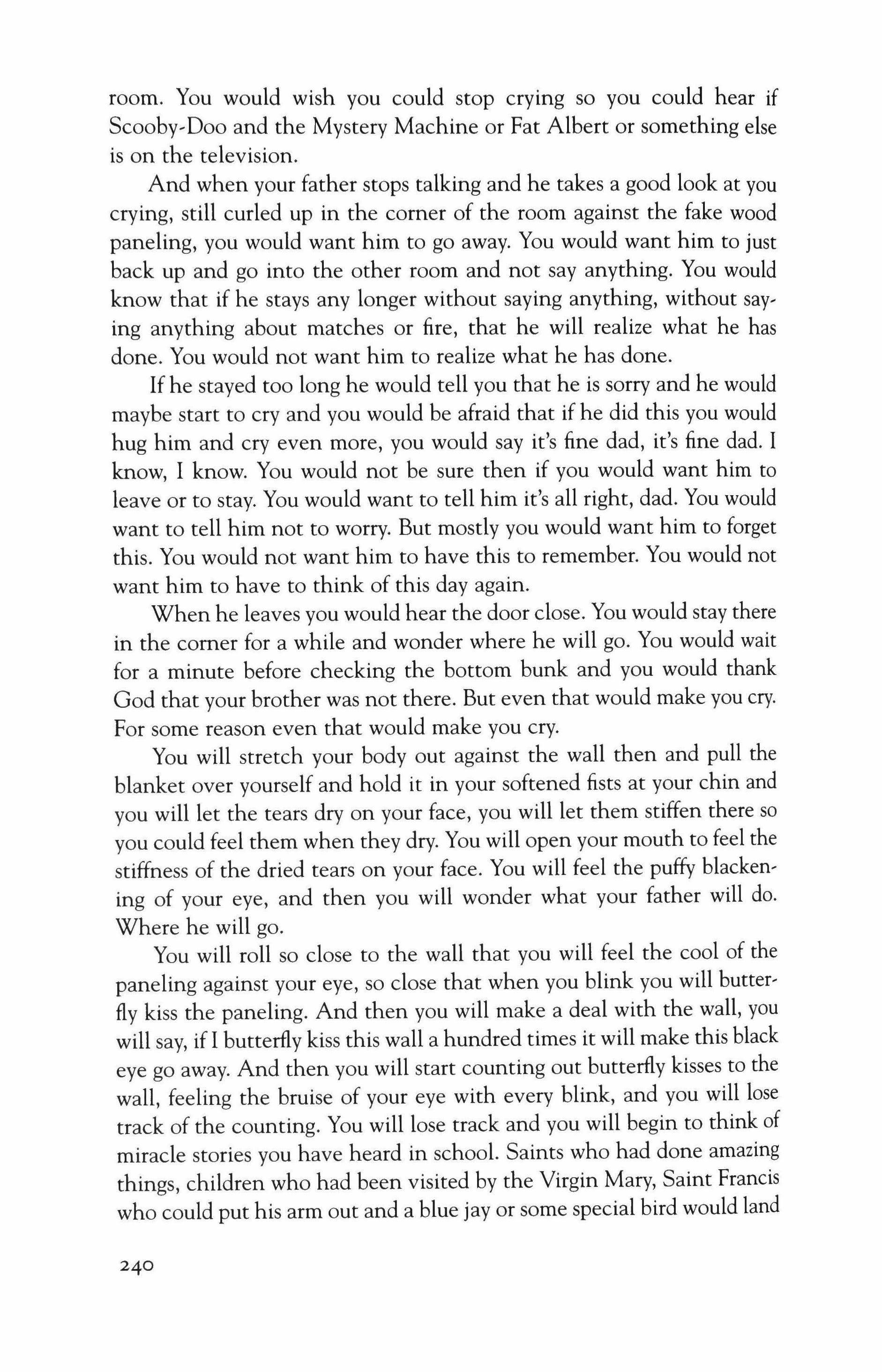
room. You would wish you could stop crying so you could hear if Scooby-Doo and the Mystery Machine or Fat Albert or something else is on the television.
And when your father stops talking and he takes a good look at you crying, still curled up in the corner of the room against the fake wood paneling, you would want him to go away. You would want him to just back up and go into the other room and not say anything. You would know that if he stays any longer without saying anything, without saying anything about matches or fire, that he will realize what he has done. You would not want him to realize what he has done.
If he stayed too long he would tell you that he is sorry and he would maybe start to cry and you would be afraid that if he did this you would hug him and cry even more, you would say it's fine dad, it's fine dad. I know, I know. You would not be sure then if you would want him to leave or to stay. You would want to tell him it's all right, dad. You would want to tell him not to worry. But mostly you would want him to forget this. You would not want him to have this to remember. You would not want him to have to think of this day again.
When he leaves you would hear the door close. You would stay there in the corner for a while and wonder where he will go. You would wait for a minute before checking the bottom bunk and you would thank God that your brother was not there. But even that would make you cry. For some reason even that would make you cry.
You will stretch your body out against the wall then and pull the blanket over yourself and hold it in your softened fists at your chin and you will let the tears dry on your face, you will let them stiffen there so you could feel them when they dry. You will open your mouth to feel the stiffness of the dried tears on your face. You will feel the puffy blackening of your eye, and then you will wonder what your father will do. Where he will go.
You will roll so close to the wall that you will feel the cool of the paneling against your eye, so close that when you blink you will butterfly kiss the paneling. And then you will make a deal with the wall, you will say, if I butterfly kiss this wall a hundred times it will make this black eye go away. And then you will start counting out butterfly kisses to the wall, feeling the bruise of your eye with every blink, and you will lose track of the counting. You will lose track and you will begin to think of miracle stories you have heard in school. Saints who had done amazing things, children who had been visited by the Virgin Mary, Saint Francis who could put his arm out and a blue jay or some special bird would land

on his finger or a baby deer would eat from his hand. You will close your eyes and say to God, if you are out there God, if you are so special you can make this black eye go away. You will think that God could go back in time about a half hour if he wanted to, and he could let you wake up like you usually wake up on a Saturday, without a black eye. He could even go back in time to before your mother started going out with her friends on Fridays and before she started dressing up and wearing her hair different, and makeup. You could do this God, you will say and you will close your eyes to concentrate on God, but you will still feel the bruise and the puff of your cheek and you will still feel the black of it with that same eye, you will see its blackness, and you will wonder, where is he now, where is he now.
You will wonder if God needed more time to make a black eye go away, you will wonder if miracles needed more time. If you went to sleep for a little while maybe you would wake up and it would be gone. You will not want to see it in the mirror anymore.
You will tell your friends you walked into a pole.
I walked into a pole you will tell your friends.
I wasn't looking you will say. I didn't see it coming.
When your father gathers all of you around the dining room table, a thing he has never done before, you will look around at your older brothers, Stevie and Joey, like what is going on? Joey will smile and fake shrug to show you that he knew this talk was coming. He is the kid at school who somehow knows there's going to be a surprise fire drill sometime after lunch, so during the fire drill when the whole school is in the playground shivering, Joey will be the only one with his coat and his hat, and even though he never wears a scarf or mittens, he will have all of that on during the fire drill. Stevie will shrug, too, but it will not be a fake shrug. It will be a quick shrug like I don't care, I just hope this isn't going to take long; his friend, Tommy Bokina is waiting for him on Thirtysecond Street with a Sucrets lozenges tin filled with tightly rolled joints. But you do not know this yet.
Nini and Johnny will not even remember this night. They are only eight and seven years old. They will not remember how many days in a row they asked you where mom was this morning. They will not remember you told them a million times already that she was waiting

tables at Papa John's on Thirtv-first and Princeton. What they will remember when they are older, is afterward-how all of the days tumbled into one day. Johnny will remember you handing him his school shirt straight from the dryer one day, and Nini will remember asking you if this shirt is clean or dirty and did you iron it, and would you zip up her uniform dress in the back. They will remember you at the countertop in the kitchen-ten slices of bread lined up in pairs, the sound of the but, ter knife against the mayonnaise jar.
What none of them will remember is that there was only enough meat for sandwiches on Monday and Tuesday-and that was only if you were careful to put only one slice and a quarter on each sandwich. That Wednesday was always peanut butter and jelly sandwiches, Thursday was always fried egg sandwiches, and Friday was Philadelphia cream cheese sandwiches. They won't remember how hard it was to smooth out the cream cheese without ripping holes in the bread. You have to take it out of the refrigerator when you wake up to pee in the middle of Thursday night so that it is soft in the morning.
After a week, your sister will continue to ask you where Mom is, but she will ask you in a different way. She will ask you, is Mom at Papa John's on Thirty,first and Princeton today? She will say the location of the restaurant as though it were a part of the name of the restaurant. One day it will make you smile to remember her asking you if Mom was at Papa John's on Thirty-first and Princeton today, but when you are brushing her hair and holding it up to make sure it doesn't catch in the zipper of her uniform, it will not make you smile. It will be like a punishment of sadness when she asks you. It will remind you every time that that is where you were two Saturdays ago when you told your mother what you had promised yourself you would not tell her. You had promised yourself that you would tell her you got your black eye from walking into a pole. You had promised yourself that you would be a man and that you would lie. On the walk past Parnell Street and past Canal and past Stewart Street and past Shields, you had promised her that you would say you were walking along the curb pretending you were balancing on a tightrope when you clanged your face into the pole of the streetlight. But when you got to Papa John's on Thirty-first and Princeton-just after the break, fast rush and sat at an empty table by the kitchen with your two sunny-side-up eggs and hash browns and ketchup, and she finally got a chance to sit down and talk for two minutes-you just started cry' ing again like a fucking baby and then like a dirty snitcher you told
her the truth: that it was your father who gave you the black eye. That's how he woke you up that morning.
You will not tell Nini that the name of the restaurant is only Papa John's, though. You will only close your eyes when she says it that way and remember sitting there at the restaurant table telling your mother the stupid truth. You will close your eyes and remember the look on your father's face as he stood there trying to peek under your hand to see if your eye was okay, as it slowly dawned on him the thing he had done. You will stand there with only the tiniest bruise under your eye still-a purplish-yellow button the size of a thumbnail-and punish yourself by remembering all of it: the punch, the look on his face, the sadness in his back as he walked out of the bedroom and out the back door.
You will stand there at the kitchen counter and match the edges of the sheet of waxed paper, fold the edges into a hem and tighten it over the sandwich as your father taught you, all the while wishing you could go back in time a couple of weeks so that you could do the right thing. So that you could lie to your mother like you had promised yourself. So that everything could have been back to normal.
Normal. Normal Street. That is the other name of the street you passed on the way to Papa John's. Just before Canal. How could you for, get Normal Street.

How to Remember a Day with Your Son
One way is to move into an apartment. You could work things out so that he has to change schools when he is in the middle offirst grade. You could pick him up on his last day of school before Christmas break. You would remember that. You would not even have to close your eyes to remember how his friend Theo waited in the middle of the block to hug him without crying in front of the other boys. You could walk slowly and quietly to your car through Lincoln Park and keep looking at how he is holding the goodbye football from Theo that his classmates have signed under one arm, and you could keep looking at the memory book they made for him in his other hand. You would not have to stop there and talk to him and hug him and feel him cry against you, but you could. You would not have to though. You would still remember everything.
Or in the summer, after his tee-ball game, on your Wednesday or every other Saturday you could tease him with your keys while you are talking to Dave and Sandy. And finally you can give them to him and

while you are talking with Dave and Sandy you can forget he has your keys and he can run around the park with Jimmy and Kevin while you are keeping one eye on him and telling Dave and Sandy with the other eye how you are holding up.
And when Dave and Sandy are saying goodbye you can wave your son over to you and tell him it's time to go, and you can check your pockets for your keys while he is walking toward you and you are not finding them. You can poke the toe of your shoe around the grass by your canvas folding chair and say, Damn it, where are those keys? And when your son is finally there you can remember he had the keys, that he took them from you while you were talking with Dave and Sandy. You can ask him what did you do with my keys? And he can look in his hands and say, I don't have them and you can say, I see that you don't have them. I can see that. And you can remind him that he took them from you. He took them from your hands, and he could start looking for them too, in the grass by your chair.
Then when you have been looking for the keys for a while he can forget what he was doing and he can say can we go now, Dad? And you can say, no, we cannot go because we do not have the keys and you can continue to look for them. Then when he asks you did you found the keys yet you can tell him, no, I didn't found the keys yet. If I found the keys I would have told you that I found them. And you can tell him then, you know what, you can tell him, you find the key, you find the keys all by yourself. You can tell him it is his responsibility to find the keys, you can tell him to go and look for the keys in the places where he was playing and to find them. You can tell him you will be sitting right here by the foul lines along third base on your canvas folding chair that says DAD on the backrest while he looks for them. I'll be right here, you can tell him, and you can watch him walk that close to his tears, you can watch him walk through the park looking skimpily for your keys.
You can check your watch while he wanders in the outfield looking for your keys, and while he also begins throwing imaginary pitches and swinging imaginary baseball bats you can check your watch again. You can imagine the recentness ofyour keys in your hand, the ring ofthem on your finger, the tinkling of them and the swinging weight of them on your finger. You can say to yourselfyou had them there, you had them right there, you can point to your left hand where the ring of them was and you can say you had them right there, you fucking had them right there.
And that is when you can look at him fielding an imaginary line drive at third base and you can get up from your canvas folding chair and

screamwhistle through your teeth to get his ass over here and you can watch him look up from the ground, and you can watch him look over his shoulder at you standing there and you can watch him walk slowly to you.
And you can tell him when he finally gets to you, don't take my keys anymore, okay? Just don't play with them anymore. They're important. Someone could find them and take our car, you can tell him. Someone could find them and they would have the keys to Daddy's apartment, Okay? And they could go there and take everything, all of your baseball cards and your trophies from tee ball and floor hockey and soccer and they can take your football from Theo, too. They could take everything.
Then you can pound through the park with him looking for your keys. You can try to trace the wild history of a boy on a Wednesday or a Saturday through the infields and outfields and in the sandbox and in the bleachers, and you can recall the sound of the keys, your apartment key and car key and the key for the lock on your mountain bike, and you can check your watch again, and you can look at the wrapper of a candy bar thinking it is your keys and you can see the glint of cellophane and think it is your keys, and the next time you look at the candy wrapper and bend to pick it up thinking it is your keys again you can growl in your throat and you can say goddamn and your son can look at you and he can move away from you some and he can look for the keys on the base path of field three where he was running the bases earlier with Jimmy and Kevin.
You can check your watch again and then look under the bleachers where you think you saw the boys running up and down the stairs. You can look up through the skeleton of aluminum and remember how just last summer you used to sit right up there with his mother and watch his tee-ball games. How sometimes she would scratch your back under your t-shirt and it would send chills through you. And that is when your son can come back near you so quickly that you are startled. That is when he can reach for your hand to apologize by putting his small hand in yours and you can miss that gesture. That is when you can try to show him how frustrated you are. You can clench your hand into a fist not to hit him, but just to show him how angry you are, to show him you are so angry that you could make a fist and almost use it, you can bend your elbow to raise the fist a little.
And he will not be sure why you are growling and clenching your hand, and in the confusion of aluminum under the bleachers he can squint and flinch at the raised fist of you, he can shut his boys' eyes and
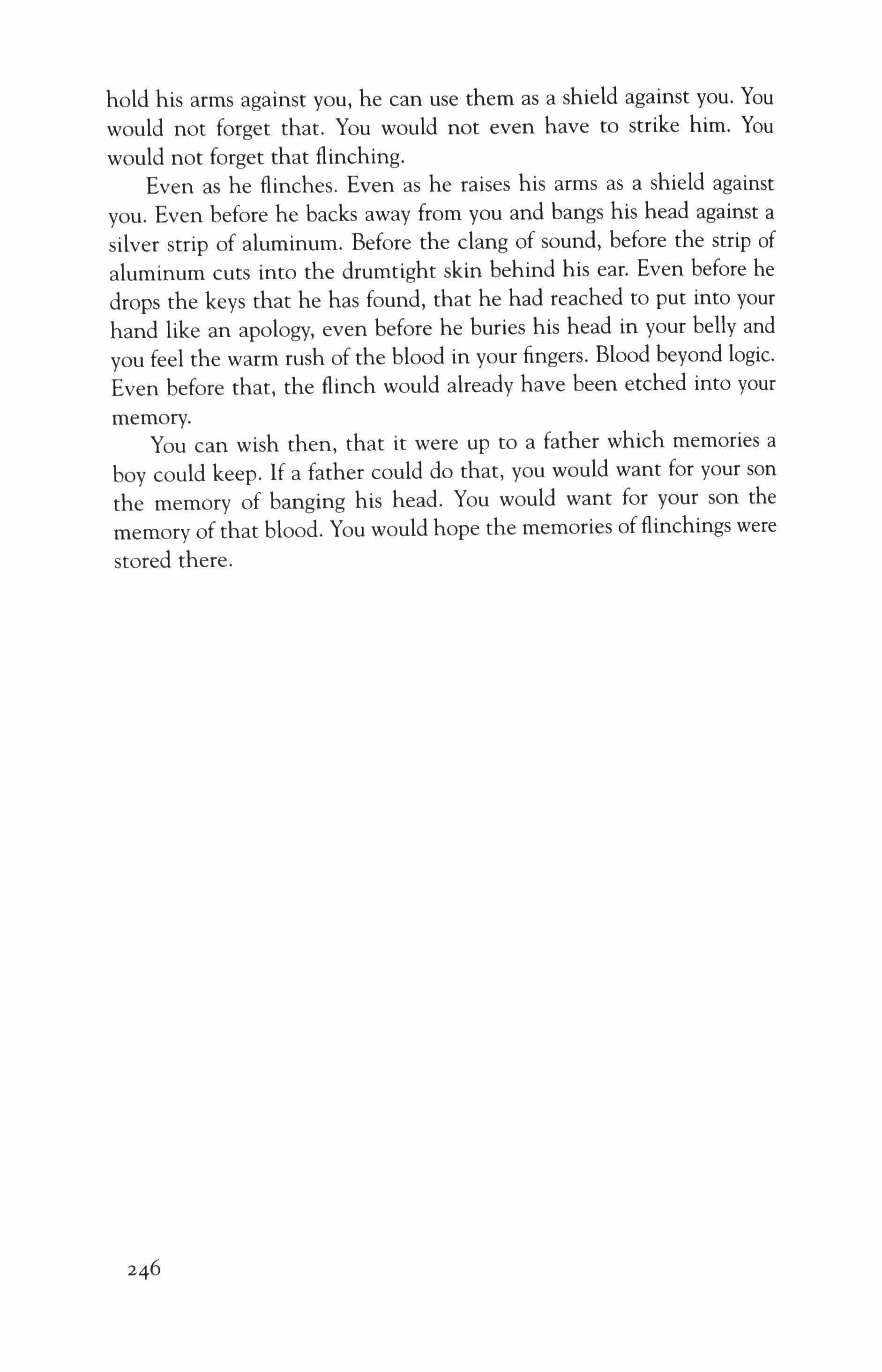
hold his arms against you, he can use them as a shield against you. You would not forget that. You would not even have to strike him. You would not forget that flinching.
Even as he flinches. Even as he raises his arms as a shield against you. Even before he backs away from you and bangs his head against a silver strip of aluminum. Before the clang of sound, before the strip of aluminum cuts into the drumtight skin behind his ear. Even before he drops the keys that he has found, that he had reached to put into your hand like an apology, even before he buries his head in your belly and you feel the warm rush of the blood in your fingers. Blood beyond logic. Even before that, the flinch would already have been etched into your memory.
You can wish then, that it were up to a father which memories a boy could keep. If a father could do that, you would want for your son the memory of banging his head. You would want for your son the memory of that blood. You would hope the memories of flinchings were stored there.

The moment I drove into our carport, my two youngest girls still strapped in the back seat, I was pierced by a mother sense--one that's come upon me only once or twice in my life-that something was terribly wrong. I shut off the engine with my body already half out of the van, scooped up my little girls, and ran toward the sounds of a weeping child coming from the back patio of our rental house; raced through wavy heat with a toddler on my hip and another holding tight to my hand, calling my older daughters' names, Amanda! Stephanie! As soon as I rounded the comer, I spotted our dog's chain stretched tight over a pink adobe retaining wall. On the other side of that wall I found Mac, our too-still dog, and next to him seven-year-old Stephanie, who held a green hose in her hand. She trickled cool water onto the boxer's dusty brindle coat so that rivulets of brownish mud ran down his side and puddled on the ground.
The dog was stretched like a fallen log under a thick cluster of oleander, his tongue draped from between pale gums and his legs bent in strange angles. I knew he was dead. I pulled Stephanie into my arms as she wept out her discovery, which I'd figured out for myself: Mac had jumped over the wall sometime during the hours when I was gone to work and the girls to school-we arrived home within ten minutes of each other on these overwrought weekday afternoons, the older girls walking to our rental house from the school bus, the younger ones freshly retrieved by me at daycare after my workday-and had snarled his chain in the bushes. He couldn't get back to his water dish. The temperature that day was one hundred and five degrees.

I held Stephanie while the little girls wrapped themselves around my legs and pleaded to know the reason for their sister's tears, for the upset that had settled suddenly over the sun dashed patio. "Where's Amanda?" I whispered to Stephanie about the oldest of my four daughters.
"We couldn't find you," Stephanie said into my chest, "so she went in to call Dad."
Inside the cooled house, I found nine-year-old Amanda rolled like a boulder on the tile floor, the phone pushed against her ear. She turned her red and wet face up to me and handed me the receiver, relieved, I could tell, to give this disaster up to the adults.
With the little girls still hanging onto my legs, I held the telephone away from my face, desperate to avoid talking to the man on the other end, my husband of twelve years-in that second, I wanted to bolt back to the car, pull the cord from the wall, make any move that would stop this inevitable conversation before it started. But my four daughters stared, silent, waiting for me to somehow right our latest catastrophe.
The girls and I had lived in Tucson, in the unfamiliar desert that doesn't give an inch, for only a month. In late August, I'd packed up my children and as much stuff as I could squeeze into the back of our van to travel thousands of miles south from Washington state. I did so allowing myself to think the move was meant to save my marriage rather than to end it, buying into a distinctly American notion that a switch in geography is one solution to many of life's problems, that you can simply start again in a new place if things get too rough in the old. My husband had grown up on a ranch in the Catalina Mountains-Arizona was his childhood home, and he'd glowed about the southwest part of the country since I'd met him. I convinced this man, who I'd married when I was just a girl, that we might find each other again if we lived in the place he most loved. I wasn't yet able to recognize that some part of me was already working on a different plan: I'd get my husband into a familiar setting, around family and dear old friends, so it would be that much easier for me to leave him.
He must have seen through a charade I couldn't acknowledge in myself, for he'd refused to come with the girls and me when we moved to Tucson. Once we arrived and found a rental house to live in, he stub, bomly declined to say when he might join us. He'd stayed in Washing, ton to finish the sale of our house, to close his long'struggling business, he said, and over the weeks of his excuses and delays, our relationship
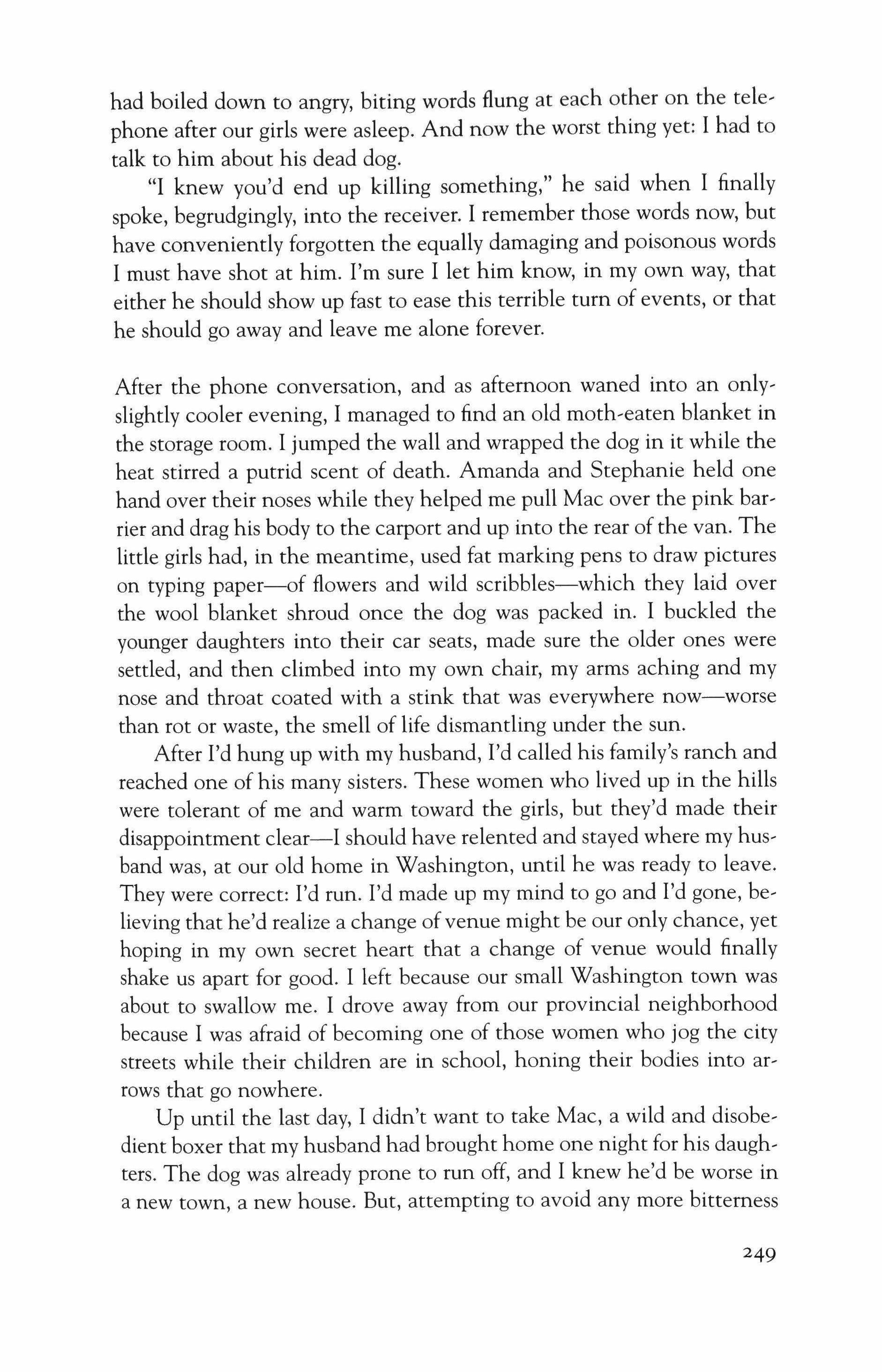
had boiled down to angry, biting words flung at each other on the telephone after our girls were asleep. And now the worst thing yet: I had to talk to him about his dead dog.
"I knew you'd end up killing something," he said when I finally spoke, begrudgingly, into the receiver. I remember those words now, but have conveniently forgotten the equally damaging and poisonous words I must have shot at him. I'm sure I let him know, in my own way, that either he should show up fast to ease this terrible turn of events, or that he should go away and leave me alone forever.
After the phone conversation, and as afternoon waned into an onlyslightly cooler evening, I managed to find an old moth-eaten blanket in the storage room. I jumped the wall and wrapped the dog in it while the heat stirred a putrid scent of death. Amanda and Stephanie held one hand over their noses while they helped me pull Mac over the pink barrier and drag his body to the carport and up into the rear of the van. The little girls had, in the meantime, used fat marking pens to draw pictures on typing paper-of flowers and wild scribbles-which they laid over the wool blanket shroud once the dog was packed in. I buckled the younger daughters into their car seats, made sure the older ones were settled, and then climbed into my own chair, my arms aching and my nose and throat coated with a stink that was everywhere now-worse than rot or waste, the smell of life dismantling under the sun.
After I'd hung up with my husband, I'd called his family's ranch and reached one of his many sisters. These women who lived up in the hills were tolerant of me and warm toward the girls, but they'd made their disappointment clear-I should have relented and stayed where my husband was, at our old home in Washington, until he was ready to leave. They were correct: I'd run. I'd made up my mind to go and I'd gone, believing that he'd realize a change of venue might be our only chance, yet hoping in my own secret heart that a change of venue would finally shake us apart for good. I left because our small Washington town was about to swallow me. I drove away from our provincial neighborhood because I was afraid of becoming one of those women who jog the city streets while their children are in school, honing their bodies into arrows that go nowhere.
Up until the last day, I didn't want to take Mac, a wild and disobedient boxer that my husband had brought home one night for his daughters. The dog was already prone to run off, and I knew he'd be worse in a new town, a new house. But, attempting to avoid any more bitterness
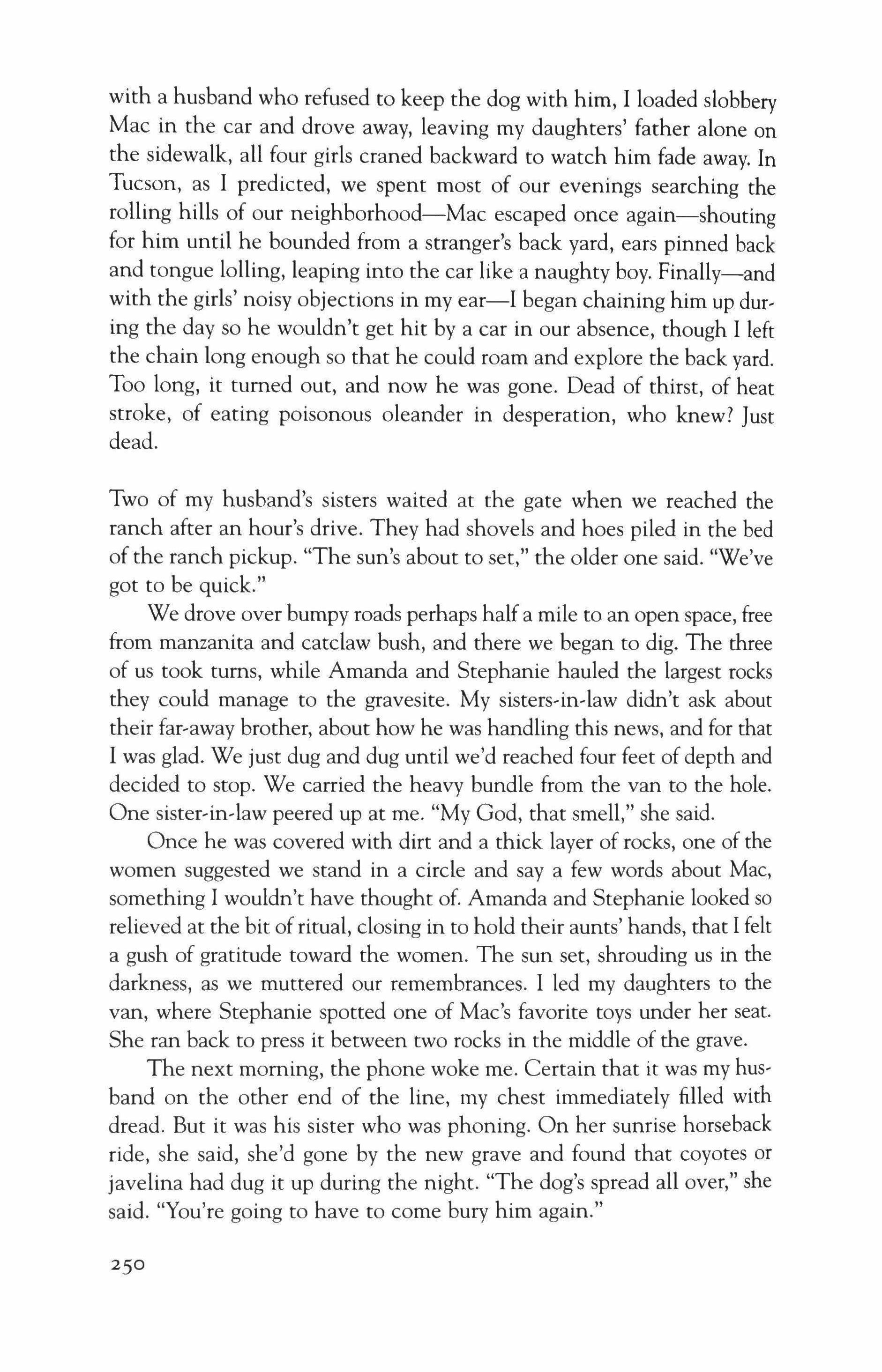
with a husband who refused to keep the dog with him, I loaded slobbery Mac in the car and drove away, leaving my daughters' father alone on the sidewalk, all four girls craned backward to watch him fade away. In Tucson, as I predicted, we spent most of our evenings searching the rolling hills of our neighborhood-Mac escaped once again-shouting for him until he bounded from a stranger's back yard, ears pinned back and tongue lolling, leaping into the car like a naughty boy. Finally-and with the girls' noisy objections in my ear-I began chaining him up during the day so he wouldn't get hit by a car in our absence, though I left the chain long enough so that he could roam and explore the back yard. Too long, it turned out, and now he was gone. Dead of thirst, of heat stroke, of eating poisonous oleander in desperation, who knew? Just dead.
Two of my husband's sisters waited at the gate when we reached the ranch after an hour's drive. They had shovels and hoes piled in the bed of the ranch pickup. "The sun's about to set," the older one said. "We've got to be quick."
We drove over bumpy roads perhaps half a mile to an open space, free from manzanita and catclaw bush, and there we began to dig. The three of us took turns, while Amanda and Stephanie hauled the largest rocks they could manage to the gravesite. My sisters-in-law didn't ask about their far-away brother, about how he was handling this news, and for that I was glad. We just dug and dug until we'd reached four feet of depth and decided to stop. We carried the heavy bundle from the van to the hole. One sister-in-law peered up at me. "My God, that smell," she said.
Once he was covered with dirt and a thick layer of rocks, one of the women suggested we stand in a circle and say a few words about Mac, something I wouldn't have thought of. Amanda and Stephanie looked so relieved at the bit of ritual, closing in to hold their aunts' hands, that I felt a gush of gratitude toward the women. The sun set, shrouding us in the darkness, as we muttered our remembrances. I led my daughters to the van, where Stephanie spotted one of Mac's favorite toys under her seat. She ran back to press it between two rocks in the middle of the grave.
The next morning, the phone woke me. Certain that it was my husband on the other end of the line, my chest immediately filled with dread. But it was his sister who was phoning. On her sunrise horseback ride, she said, she'd gone by the new grave and found that coyotes or javelina had dug it up during the night. "The dog's spread all over," she said. "You're going to have to come bury him again."
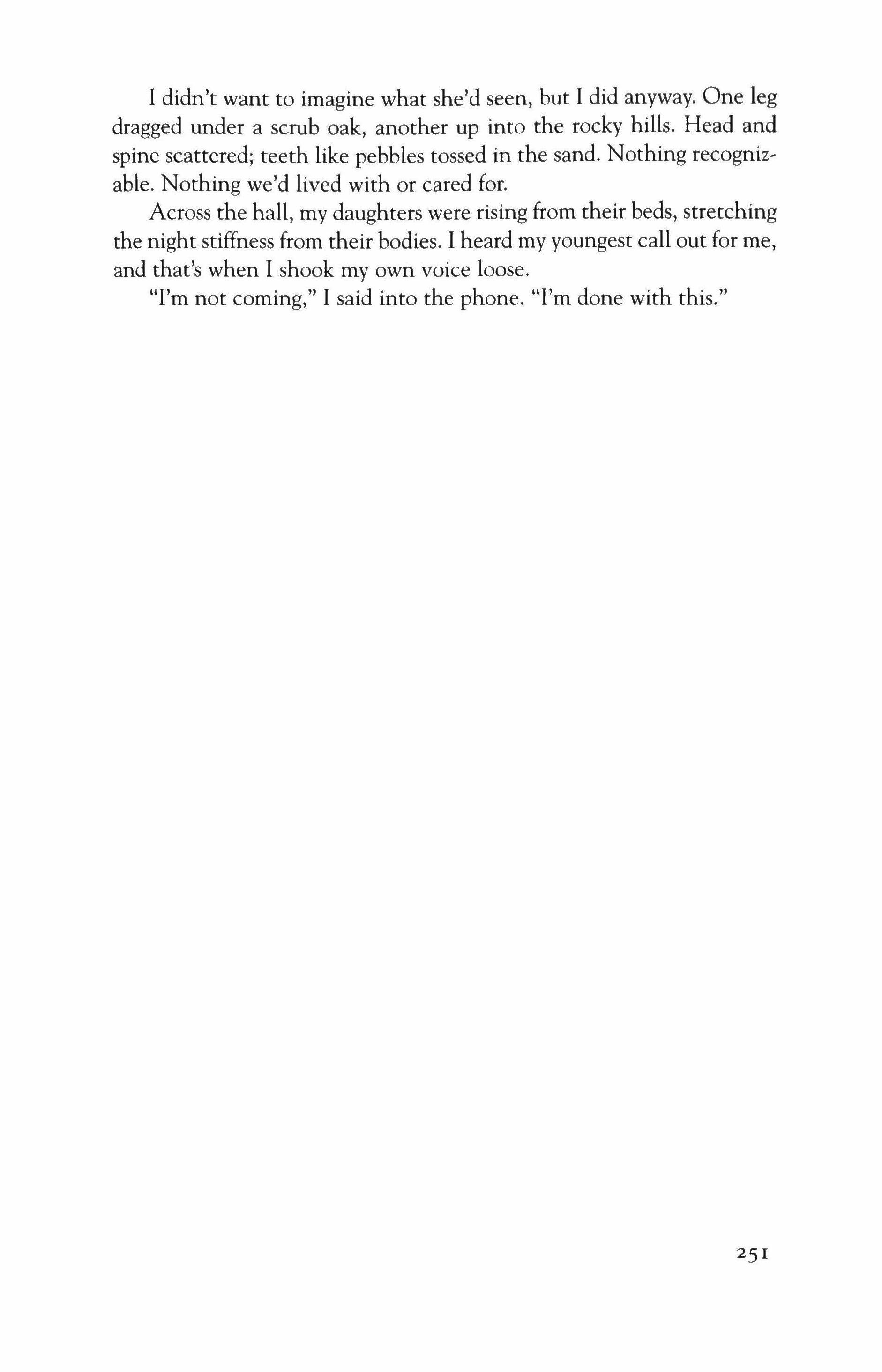
I didn't want to imagine what she'd seen, but I did anyway. One leg dragged under a scrub oak, another up into the rocky hills. Head and spine scattered; teeth like pebbles tossed in the sand. Nothing recognizable. Nothing we'd lived with or cared for.
Across the hall, my daughters were rising from their beds, stretching the night stiffness from their bodies. I heard my youngest call out for me, and that's when I shook my own voice loose.
"I'm not coming," I said into the phone. "I'm done with this."

Crust: In geology, a crust is the outermost solid shell of a planet or moon. Crust is chemically and mechanically different from underlying material. Like any shell, the crust is brittle, and prone to fractures-the process by which the major plates are formed. The crust is where most earthquakes originate.
The year she nearly took her child's life, the world was in a deadly mood all around. It had been a long winter to begin with, and then spring's fecundity simply never happened. It was hard to look at the earth beneath her feet-for what should have been a surface increasingly radiant with the promise of new life remained instead a barren topography-so chillingly lackluster that anything trying to emerge verdant was intimidated right back into the ground. She would remember few details, save the morbid ones: like the sky, how it swept like an eraser across a chalkboard, its chilly troposphere both pale and vague. The lambs and calves-frozen solid if they weren't birthed in barns-and only then with heat lamps glaring down. The alfalfa that never really flourishedmildewing in the pasture long before it was tall enough to thresh. And the bears. They woke up late and practically starved. One was desperate enough to come up out of the draw, into their yard. He dismissed three barking dogs, a floodlight, and an impressive fence in his quest to eat her daughter's pet goat. The creature had then circled back and damn near got her husband as he rummaged in the shed for his gun. In hindsight, everything natural-rotations of weather, cycles of
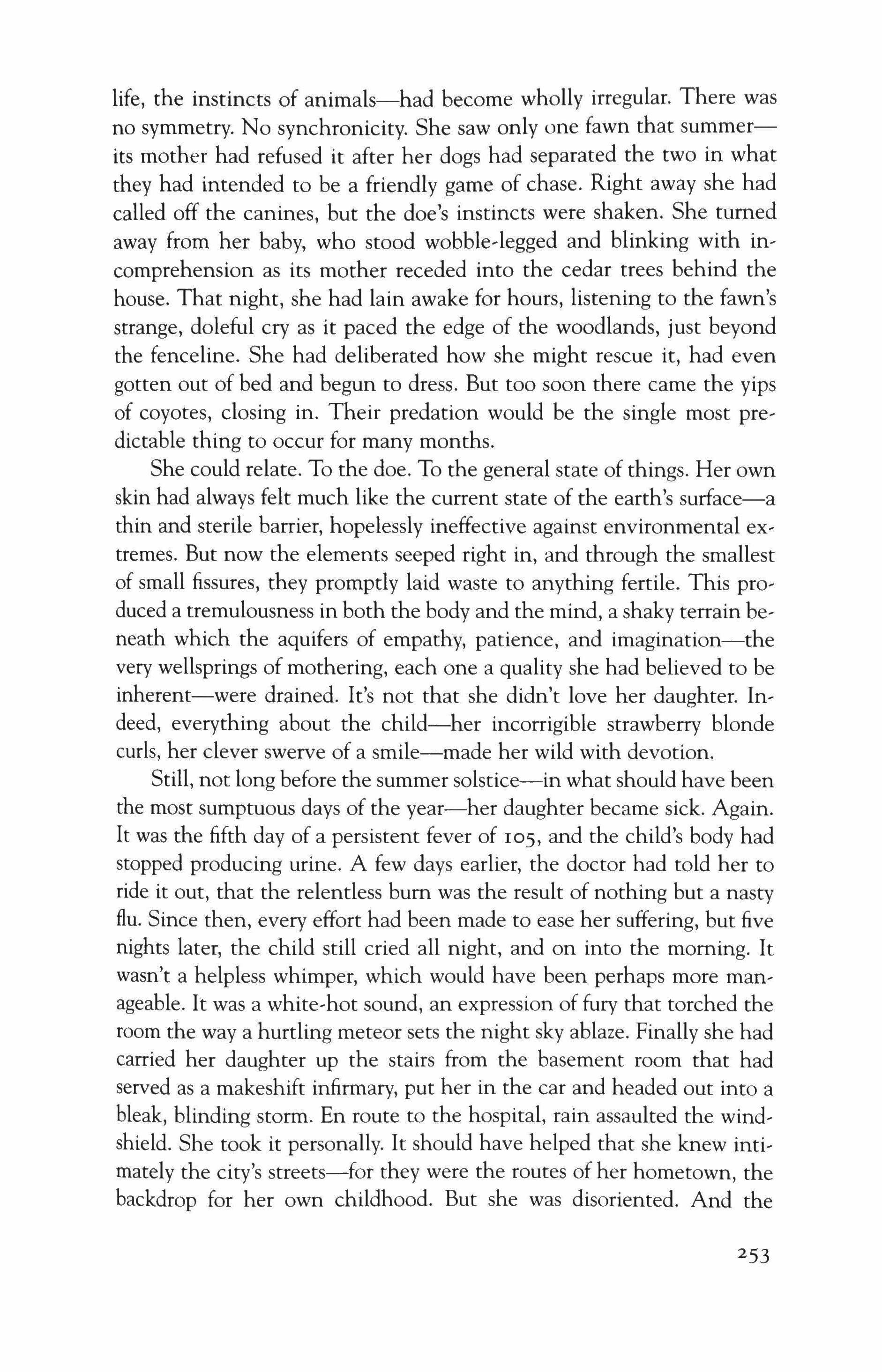
life, the instincts of animals-had become wholly irregular. There was no symmetry. No synchronicity. She saw only one fawn that summerits mother had refused it after her dogs had separated the two in what they had intended to be a friendly game of chase. Right away she had called off the canines, but the doe's instincts were shaken. She turned away from her baby, who stood wobble-legged and blinking with incomprehension as its mother receded into the cedar trees behind the house. That night, she had lain awake for hours, listening to the fawn's strange, doleful cry as it paced the edge of the woodlands, just beyond the fenceline. She had deliberated how she might rescue it, had even gotten out of bed and begun to dress. But too soon there came the yips of coyotes, closing in. Their predation would be the single most predictable thing to occur for many months.
She could relate. To the doe. To the general state of things. Her own skin had always felt much like the current state of the earth's surface-a thin and sterile barrier, hopelessly ineffective against environmental ex� tremes. But now the elements seeped right in, and through the smallest of small fissures, they promptly laid waste to anything fertile. This produced a tremulousness in both the body and the mind, a shaky terrain beneath which the aquifers of empathy, patience, and imagination-the very wellsprings of mothering, each one a quality she had believed to be inherent-were drained. It's not that she didn't love her daughter. Indeed, everything about the child-her incorrigible strawberry blonde curls, her clever swerve of a smile-made her wild with devotion.
Still, not long before the summer solstice-in what should have been the most sumptuous days of the year-her daughter became sick. Again. It was the fifth day of a persistent fever of 105, and the child's body had stopped producing urine. A few days earlier, the doctor had told her to ride it out, that the relentless bum was the result of nothing but a nasty flu. Since then, every effort had been made to ease her suffering, but five nights later, the child still cried all night, and on into the morning. It wasn't a helpless whimper, which would have been perhaps more manageable. It was a white-hot sound, an expression of fury that torched the room the way a hurtling meteor sets the night sky ablaze. Finally she had carried her daughter up the stairs from the basement room that had served as a makeshift infirmary, put her in the car and headed out into a bleak, blinding storm. En route to the hospital, rain assaulted the windshield. She took it personally. It should have helped that she knew intimately the city's streets-for they were the routes of her hometown, the backdrop for her own childhood. But she was disoriented. And the 253
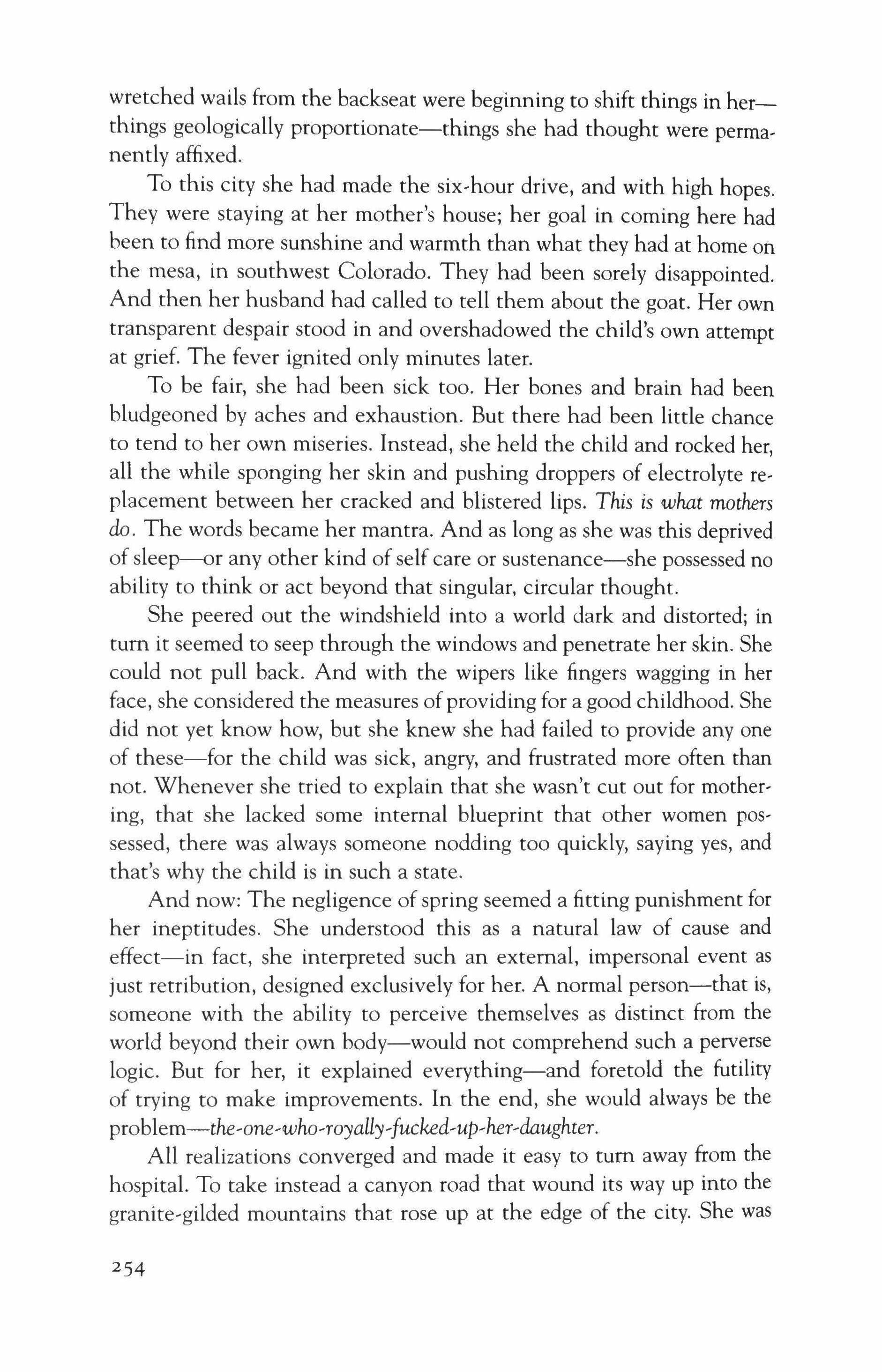
wretched wails from the backseat were beginning to shift things in herthings geologically proportionate-things she had thought were permanently affixed.
To this city she had made the six-hour drive, and with high hopes. They were staying at her mother's house; her goal in coming here had been to find more sunshine and warmth than what they had at home on the mesa, in southwest Colorado. They had been sorely disappointed. And then her husband had called to tell them about the goat. Her own transparent despair stood in and overshadowed the child's own attempt at grief. The fever ignited only minutes later.
To be fair, she had been sick too. Her bones and brain had been bludgeoned by aches and exhaustion. But there had been little chance to tend to her own miseries. Instead, she held the child and rocked her, all the while sponging her skin and pushing droppers of electrolyte replacement between her cracked and blistered lips. This is what mothers do. The words became her mantra. And as long as she was this deprived of sleep---or any other kind of self care or sustenance-she possessed no ability to think or act beyond that singular, circular thought.
She peered out the windshield into a world dark and distorted; in tum it seemed to seep through the windows and penetrate her skin. She could not pull back. And with the wipers like fingers wagging in her face, she considered the measures ofproviding for a good childhood. She did not yet know how, but she knew she had failed to provide anyone of these-for the child was sick, angry, and frustrated more often than not. Whenever she tried to explain that she wasn't cut out for mothering, that she lacked some internal blueprint that other women possessed, there was always someone nodding too quickly, saying yes, and that's why the child is in such a state.
And now: The negligence of spring seemed a fitting punishment for her ineptitudes. She understood this as a natural law of cause and effect-in fact, she interpreted such an external, impersonal event as just retribution, designed exclusively for her. A normal person-that is, someone with the ability to perceive themselves as distinct from the world beyond their own body-would not comprehend such a perverse logic. But for her, it explained everything-and foretold the futility of trying to make improvements. In the end, she would always be the problem-the-one-who-royally-fucked-up-her-daughter.
All realizations converged and made it easy to tum away from the hospital. To take instead a canyon road that wound its way up into the granite-gilded mountains that rose up at the edge of the city. She was

soothed by her search for the right bend in the pavement-one without a guardrail but where canyon dropped away anyway. Within just a few miles, a lifetime of struggles coalesced into a single metallic bead, shining dead ahead-a perfect sphere of impervious logic: she could not give her daughter good health. She could not offer her peace of mind. These alone might have been forgiven, but she could see now that even her love was conditional-for she could only provide it when her skin was thick enough to resist the external environment, when she was able to stand on solid ground. In tum, she was teaching her child to stand in the world braced-as one stands in a doorway during an earthquake. As if the tectonic plates themselves were about to be pulled out from under her feet.
She continued up-canyon, past the chosen spot, just far enough from the curve to get a run at it. Then she slowed, made a four-point turnaround until the hood of the car faced it squarely. Engine idling, she sat there, now inured to her daughter's screeches in the backseat. This infuriated the child, who threw a purple sippy cup at the back of her mother's head. She hardly felt it. Death preoccupied her, the mere thought had caught her up like a clandestine lover.
This was not the first time. Those who knew of her preoccupation were disgusted, dismissing it either as a pathetic plea for attention, or an outright cop-out. But ever since her father had shot himself, the impulse had grown stronger, had honed itself like a knife straight off the whetting stone. And then she had given birth-only to find herself overwhelmed entirely. Yes, no matter what lay beyond this world, it had to be better than what was here and now. And yes, everyone would benefit by her being out of the picture.
Her mind ran back and forth across the blade, until the logic expanded: She knew firsthand from her father's departure what that does to a child. Sure, she had felt a profound sense of relief when her father, an incorrigible alcoholic, had put a shotgun to his chest. But no matter how well she appreciated how unsustainable this world was for him, the legacy he left behind-a toxic cocktail of guilt and desertion-was nearly unbearable. And this is how she came to see her only option clearly, how the knife of logic at last gleamed with precision: Suicide would be the ultimate abandonment, one that would scar her daughter for life. For the child's sake, she could not be left behind.
The night before, her husband must have heard through the phone an eerie prelude in her voice-for he had jumped in his car the next morning and was racing along the interstate through a storm that

engulfed the entire Intermountain West. Every hour, he called. He called again just as she entered the canyon.
Just two more hours then I will be there. He had screamed the words at her-a man both furious and frightened.
Oh It was all she could muster, and the syllable echoed like she was standing at the far end of a tunnel.
Is there anyone who can take her while you pull yourselftogether? But he knew the answer. This may have been her hometown, but there wasn't really that kind of support available.
Well then, shit. I don't know. Pray? The question was for her. For him, there had never been any question. He was a man firmly planted in this world, a man who was in accordance with what God had in store for him.
The phone cut out, and his last word hung in her ear. It was odd, the way it shimmered there. Prayer was a thing of the past-something she knew only as an infrequent perfunctory exercise, and an abstract one at that. With rain coming down and steam rising spectral off the granite slabs that shored up the canyon like flying buttresses, she considered her spiritual void, how familiar it was to the point ofbeing a thing-not the dearth of it. The deity ofher upbringing had been much like her own father, absent mostly. And like her father, she knew that God was supposed to be revered, but instead she felt complete disinterest. It was hard to invest in anything with which you had so little contact.
She laid her head against the steering wheel and stared down at her hands in her lap. They were small, sun-spotted. They were not instruments of prayer, they were agents of destruction; everything they touched was eventually reduced to ash. She had practically burned through her third marriage-the way she had burned through careers, friendships, bank accounts. The results were disastrous, but soothingly predictable. The involvement of others, the intimacies required--once these were out of the way, there was always great relief in being alone.
She needed to believe in nothing. Its framework had served her well in the temporal world-had buffered her from the inevitable anxieties and disappointments. From there, being spiritually sociopathic had been a breeze.
And then it occurred to her. For all the professed nihilism, she really didn't know what lay ahead. Perhaps death would actually bring her face-to-face with some kind of maker, perhaps with her father. It never crossed her mind that this could be a good thing; all she knew was that the idea of being in close quarters with either of them was something

she could not entertain. And then there was her daughter: to think that she might be delivering her daughter into a realm even more emotionally spare than the one she provided was the one thing she could not allow to happen.
And so she resumed her original route. When she finally carried the hot child, still crying, into the emergency room, the automatic doors hissed shut behind her and she began to shake uncontrollably. It was not fear but relief that produced this response; here, there were people that could help, machines that would diagnose, medicines that would heal. The sense of relief was age-old, for she too had been a sick child. The repeated rushes for urgent care, the stays in the hospital-they had been heavenly. When a medical professional had helped restore the breath that her asthma had taken away, or administered the antibiotic that would kill off the infection, she saw these acts as bestowed miracles. She put great stock in the whole thing; for it was here that she had come closest to feeling deep comfort and care.
To her left, in the waiting room, she could just barely see the people standing, peering out. And straight ahead, she could just make out the white-clothed figures rising from the intake desk, briskly moving forward with outstretched arms to catch her daughter as she thrust her at them. In the process, the child had become strangely quiet and still. What's wrong? The nurse quickly scanned the small, limp body for signs of harm.
Take her. Her jaw shook the words loose off her tongue. You must take her and make her better. I cannot do this. I cannot do this. I will kill us both. She turned and walked away.
Mantle: The Earth's middle layer, the mantle, is the thickest layer of Earth. There is intense and increasing pressure as one travels deeper into the mantle. In April 2005, scientists drilled a hole in the ocean floor that descended all the way through the earth's top layer. It took 8 weeks to drill 4,644 feet. Their next goal: to pierce the "Mohorovicic discontinuity"-or Moho=-the boundary that separates the earth's brittle crust from the hotter, more pliable mantle below.
It takes time and effort, no matter what resources are provided for the excavation. And it's a gamble, to see what gets exposed. You start by
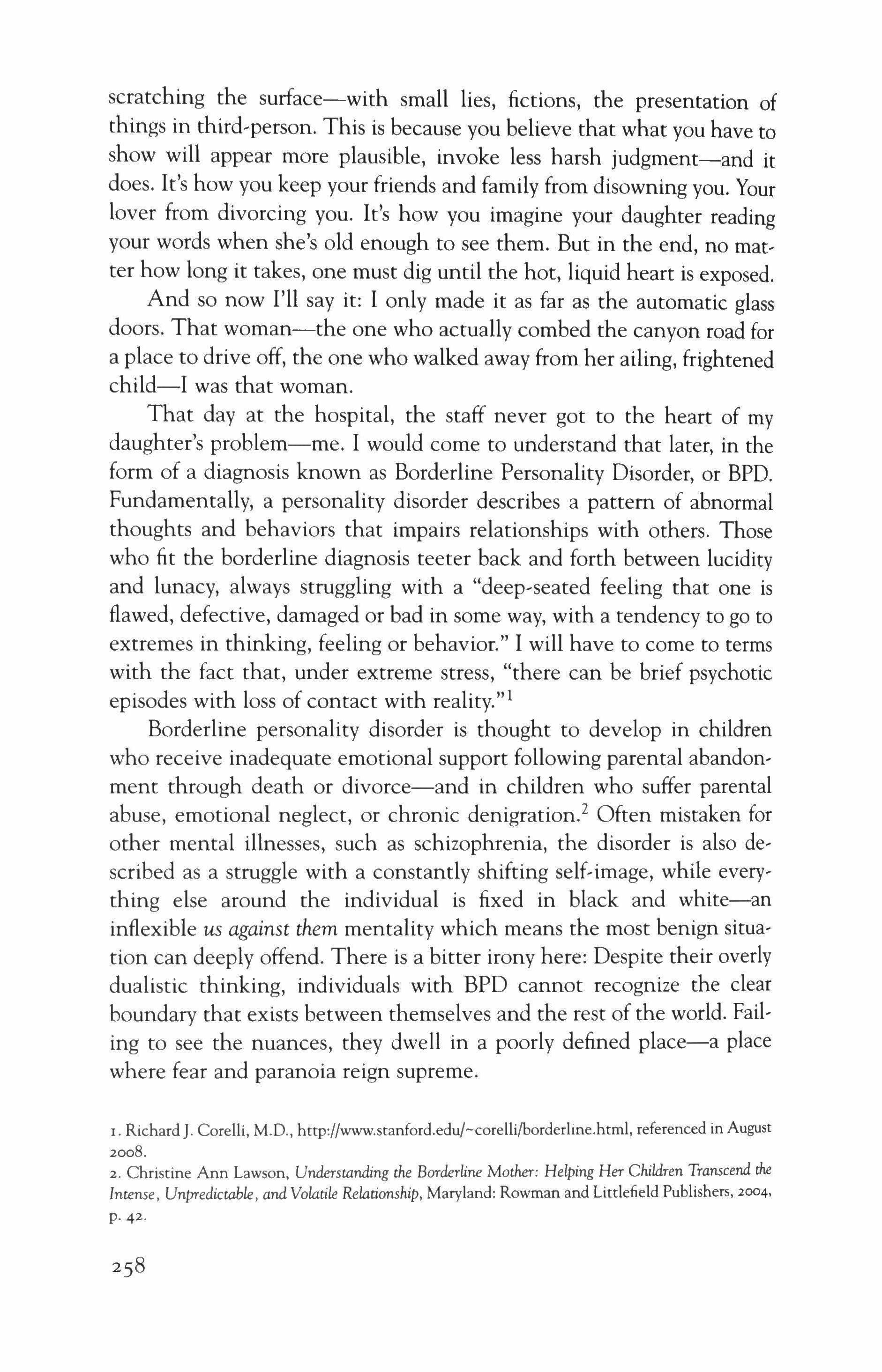
scratching the surface-with small lies, fictions, the presentation of things in third-person. This is because you believe that what you have to show will appear more plausible, invoke less harsh judgment-and it does. It's how you keep your friends and family from disowning you. Your lover from divorcing you. It's how you imagine your daughter reading your words when she's old enough to see them. But in the end, no matter how long it takes, one must dig until the hot, liquid heart is exposed.
And so now I'll say it: I only made it as far as the automatic glass doors. That woman-the one who actually combed the canyon road for a place to drive off, the one who walked away from her ailing, frightened child-I was that woman.
That day at the hospital, the staff never got to the heart of my daughter's problem-me. I would come to understand that later, in the form of a diagnosis known as Borderline Personality Disorder, or BPD. Fundamentally, a personality disorder describes a pattern of abnormal thoughts and behaviors that impairs relationships with others. Those who fit the borderline diagnosis teeter back and forth between lucidity and lunacy, always struggling with a "deep-seated feeling that one is flawed, defective, damaged or bad in some way, with a tendency to go to extremes in thinking, feeling or behavior." I will have to come to terms with the fact that, under extreme stress, "there can be brief psychotic episodes with loss of contact with reality,"!
Borderline personality disorder is thought to develop in children who receive inadequate emotional support following parental abandonment through death or divorce-and in children who suffer parental abuse, emotional neglect, or chronic denigration.i Often mistaken for other mental illnesses, such as schizophrenia, the disorder is also described as a struggle with a constantly shifting self-image, while everything else around the individual is fixed in black and white-an inflexible us against them mentality which means the most benign situation can deeply offend. There is a bitter irony here: Despite their overly dualistic thinking, individuals with BPD cannot recognize the clear boundary that exists between themselves and the rest of the world. Failing to see the nuances, they dwell in a poorly defined place-a place where fear and paranoia reign supreme.
I. Richard J. Corelli, M.D., http://www.stanford.edu/-corelli/borderline.html, referenced in August 2008.
2. Christine Ann Lawson, Understanding the Borderline Mother: Helping Her Children Transcend the Intense, Unpredictable, and Volatile Relationship, Maryland: Rowman and Littlefield Publishers, 2004, P·42.

I would learn that it can be considered a generational disease-for kids model what behaviors they witness in their caregivers. My father's drinking didn't help; so unsteady was he that even threading a worm on a hook during an afternoon at the kids' fishing pond could leave me bloodied and shaking. But children with mothers who suffer from BPD are especially at risk. And so as obvious a culprit as my father was, I must consider too the women in my family-none of which were great nurturers. Not that I blame them. The tough-love style that permeated our clan seemed as much a matter of culture and heredity as anything. My mother and father both descended from tough, frontier-taming Mormon settlers-an already dense gene pool even further consolidated by horny patriarchs who believed a man must have at least three wives in order to attain the highest level of the afterlife, a place where they would become gods and rule their own planets. But the wives were divinely destined to remain mere helpmeets to the men-turned-gods-and thus was their role on earth. It was telling that in all of Mormon theology, even the angels who made cameo appearances as heavenly messengers were distinctly masculine. Mother Mary was ignored entirely-save a brief and silent stint in the manger scene of the Christmas Nativity. The result: a complete lack of divine imagery in which to model and honor their maternal psyches and spiritual worth left women born out of Mormon tradition wanting for a sense of self-potency. From there, any task they set upon-especially raising children-would be tainted by their bitterness, their uncertainty, of what was never realized.
That day at the hospital, the doctors and nurses would determine only that Ruby was dehydrated, and that she didn't yet suffer from any sort of secondary infection. The mental health specialist sent in to evaluate what had been labeled "an unstable situation" concluded that I was doing everything right, that I was simply exhausted. I stared at her, my mouth hanging open like a half moon.
"You mean you aren't going to call Child Services? Get her into protective custody?"
She smiled, as if I were making a joke.
"How about me? You'll take me? For evaluation? Or at least prescribe something-a mild sedative? Just for a few days?"
But with each plea, she shook her head.
"You are just fine," she said. "I see mothers like you every week." As she was leaving the room she winked at Ruby, who had made an astonishingly rapid recovery, and sat on her best behavior, smiling sweetly.

Herb arrives in Salt Lake, whisks Ruby away so I can sleep. A few days later, he escorts us back, scrambles to catch up at work while still attending to domestic chores at home-the pieces I can't seem to get to. I aim at him arrows aflame with guilt and shame I cannot stand to own. Whenever he is down, I feed on his every weakness like a predator. Meanwhile the world on the mesa has grown more frigid, more barren. The forsythia and china rose we planted earlier in the year never took hold, and begin to die off. Missing too are the honey bees. One day I am out walking, jacket zipped up and leaning into the wind, while my daughter naps beneath blankets in the stroller. My neighbor, a crusty old rancher, stops his Ford pickup, tips his sweat-stained cap. As always, we talk about the weather. He scoffs, says the cold and damp prove those environmentalists are a bunch of alarmist crackpots, that global warming sure as shit ain't our problem. Then late August: we have given up on summer, the way we eventually gave up on spring-when the temperatures on the mesa suddenly shoot up twenty degrees. Things dry and curl like paper. There is an increase in local seismic activity-small but noticeable tremors. There is a rash of wildfires. Things tremble and bum all around.
I stumble across a book called Understanding the Borderline Mother: Helping Her Children Transcend the Intense, Unpredictable and Volatile Relationship. The author describes the world of the BPD mother as a place where "inconsistency, unpredictability, and inappropriate intensity rule."3 She coins it Borderland.
This is a geography all too familiar. I have scrambled to its summits, slithered into its canyons. But now this place has a name, and its contours have been thoroughly surveyed, mapped and explored. And so I begin to try to moderate my responses to the world, to recognize myself as the source of damages I had once believed to be the result of natural disasters. My husband can't yet see my efforts. He is too busy worrying about whether he should leave a loaded gun in the house-for the rogue bear has been back and tried to get in-or if he should keep our firearms far from my reach. It's a tough call, when you live in a place like we do. When you're married to a woman like me.
Borderland. Now that I can make out the demarcation of its boundaries, see how distinguishable it is from the territory beyond, I feel ambivalent about leaving. For me, this landscape is a vast, untrammeled
3. Lawson, p. 6.
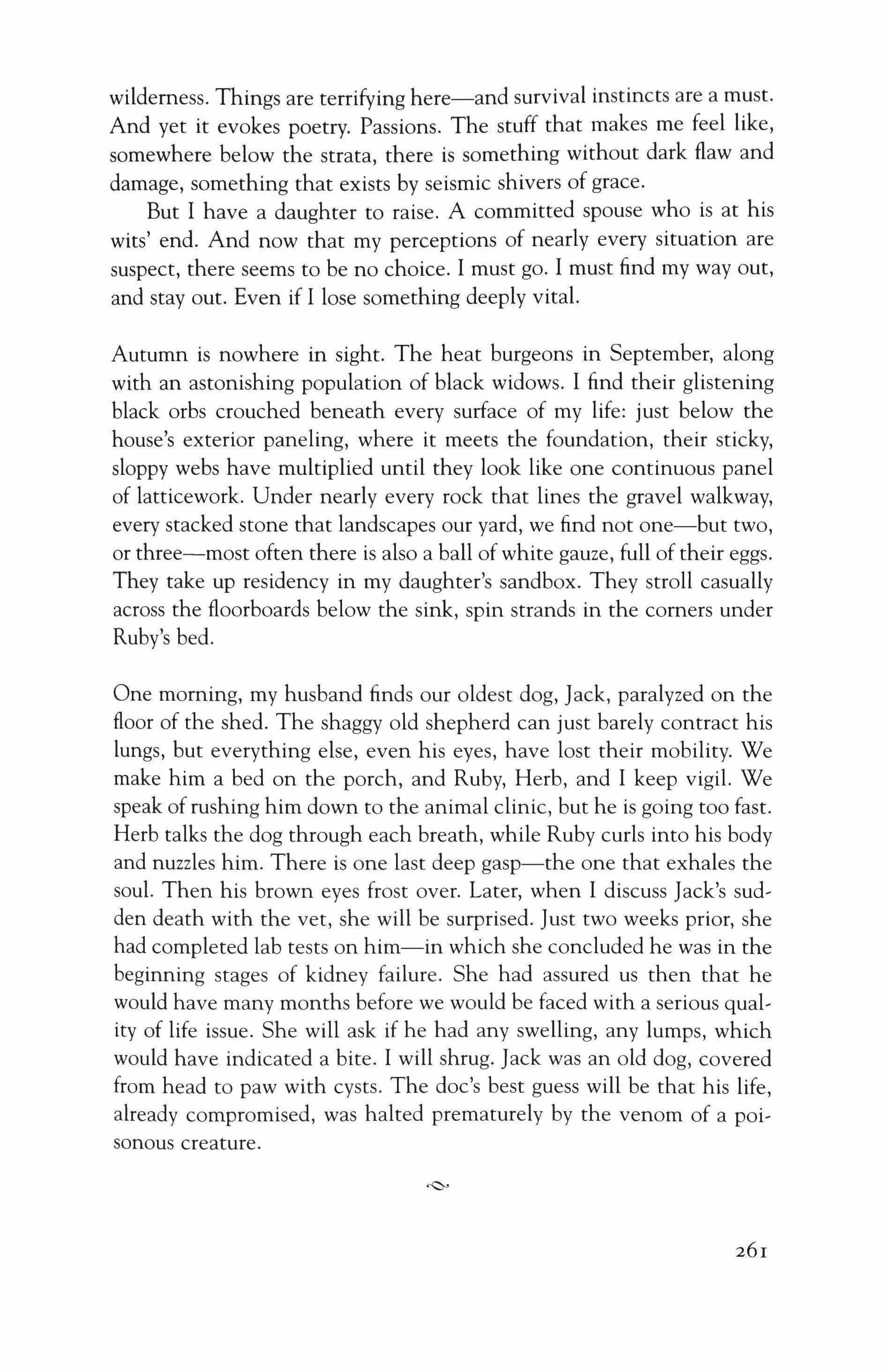
wilderness. Things are terrifying here-and survival instincts are a must. And yet it evokes poetry. Passions. The stuff that makes me feel like, somewhere below the strata, there is something without dark flaw and damage, something that exists by seismic shivers of grace.
But I have a daughter to raise. A committed spouse who is at his wits' end. And now that my perceptions of nearly every situation are suspect, there seems to be no choice. I must go. I must find my way out, and stay out. Even if I lose something deeply vital.
Autumn is nowhere in sight. The heat burgeons in September, along with an astonishing population of black widows. I find their glistening black orbs crouched beneath every surface of my life: just below the house's exterior paneling, where it meets the foundation, their sticky, sloppy webs have multiplied until they look like one continuous panel of latticework. Under nearly every rock that lines the gravel walkway, every stacked stone that landscapes our yard, we find not one-but two, or three-most often there is also a ball of white gauze, full of their eggs. They take up residency in my daughter's sandbox. They stroll casually across the floorboards below the sink, spin strands in the comers under Ruby's bed.
One morning, my husband finds our oldest dog, Jack, paralyzed on the floor of the shed. The shaggy old shepherd can just barely contract his lungs, but everything else, even his eyes, have lost their mobility. We make him a bed on the porch, and Ruby, Herb, and I keep vigil. We speak of rushing him down to the animal clinic, but he is going too fast. Herb talks the dog through each breath, while Ruby curls into his body and nuzzles him. There is one last deep gasp-the one that exhales the soul. Then his brown eyes frost over. Later, when I discuss Jack's sudden death with the vet, she will be surprised. Just two weeks prior, she had completed lab tests on him-in which she concluded he was in the beginning stages of kidney failure. She had assured us then that he would have many months before we would be faced with a serious quality of life issue. She will ask if he had any swelling, any lumps, which would have indicated a bite. I will shrug. Jack was an old dog, covered from head to paw with cysts. The doc's best guess will be that his life, already compromised, was halted prematurely by the venom of a poisonous creature.
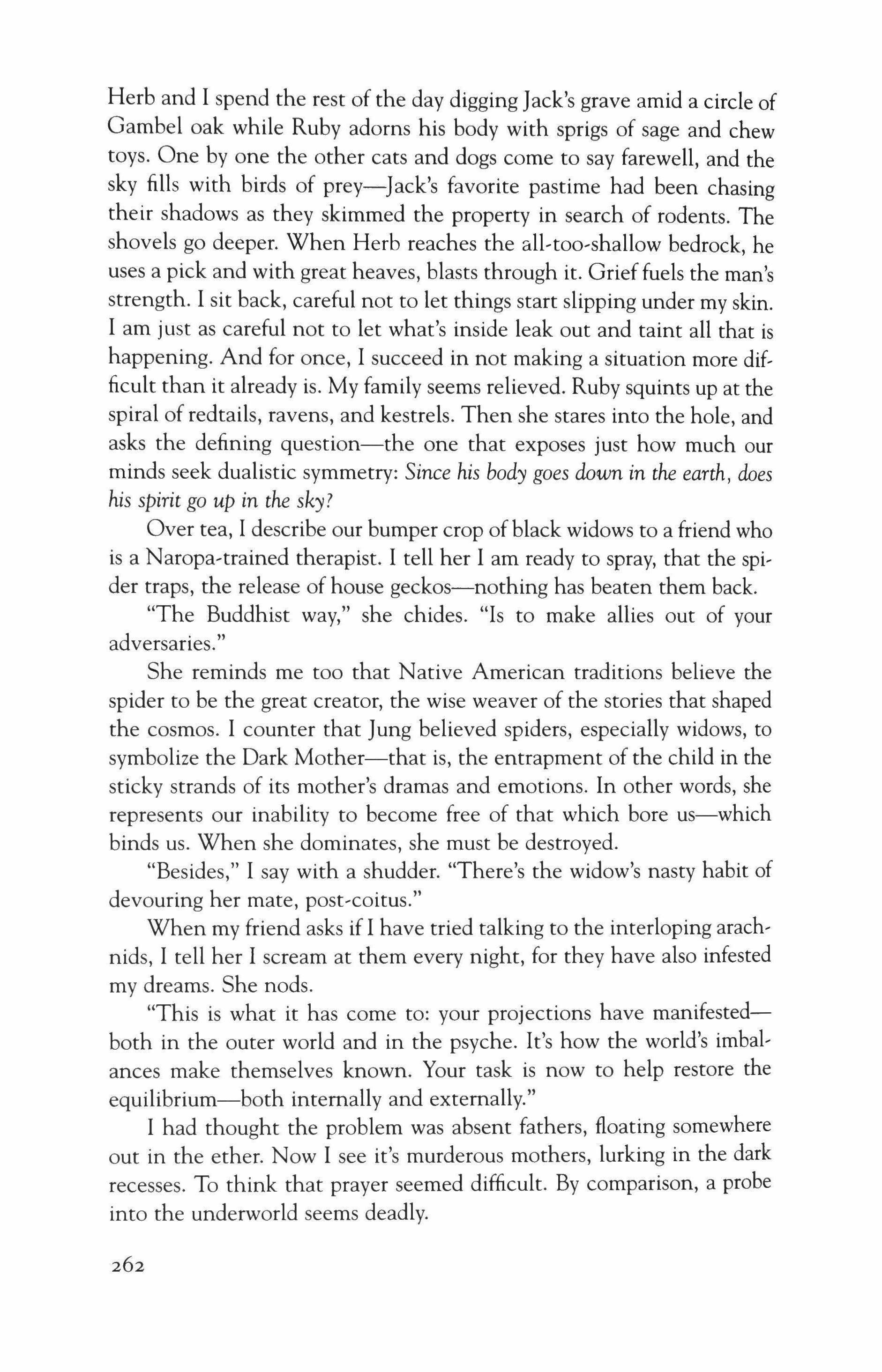
Herb and I spend the rest of the day digging Jack's grave amid a circle of Gambel oak while Ruby adorns his body with sprigs of sage and chew toys. One by one the other cats and dogs come to say farewell, and the sky fills with birds of prey-Jack's favorite pastime had been chasing their shadows as they skimmed the property in search of rodents. The shovels go deeper. When Herb reaches the all-too-shallow bedrock, he uses a pick and with great heaves, blasts through it. Grieffuels the man's strength. I sit back, careful not to let things start slipping under my skin. I am just as careful not to let what's inside leak out and taint all that is happening. And for once, I succeed in not making a situation more difficult than it already is. My family seems relieved. Ruby squints up at the spiral of redtails, ravens, and kestrels. Then she stares into the hole, and asks the defining question-the one that exposes just how much our minds seek dualistic symmetry: Since his body goes down in the earth, does his spirit go up in the sky?
Over tea, I describe our bumper crop ofblack widows to a friend who is a Naropa-trained therapist. I tell her I am ready to spray, that the spider traps, the release of house geckos-nothing has beaten them back.
"The Buddhist way," she chides. "Is to make allies out of your adversaries.
She reminds me too that Native American traditions believe the spider to be the great creator, the wise weaver of the stories that shaped the cosmos. I counter that [ung believed spiders, especially widows, to symbolize the Dark Mother-that is, the entrapment of the child in the sticky strands of its mother's dramas and emotions. In other words, she represents our inability to become free of that which bore us-which binds us. When she dominates, she must be destroyed.
"Besides," I say with a shudder. "There's the widow's nasty habit of devouring her mate, post-coitus."
When my friend asks if I have tried talking to the interloping arachnids, I tell her I scream at them every night, for they have also infested my dreams. She nods.
"This is what it has come to: your projections have manifestedboth in the outer world and in the psyche. It's how the world's imbalances make themselves known. Your task is now to help restore the equilibrium-both internally and externally."
I had thought the problem was absent fathers, floating somewhere out in the ether. Now I see it's murderous mothers, lurking in the dark recesses. To think that prayer seemed difficult. By comparison, a probe into the underworld seems deadly.

Core: The inner core of the Earth is a solid, spinning ball of nickel and iron. Its diameter is only about 70 percent that of the Moon, and most likely generates even more heat than the Sun's surface. The core is surrounded by what is called the "shadow zone"-a liquid barrier through which certain seismic waves cannot travel-which for a long time prevented researchers from measuring the innermost part of the planet. One scientist has theorized that the dangers ofglobal warming come not from climate change, but rather from the overheating of the Earth's interior. His hypothesis: heat generated inside the planet is largely nuclear, and cooling occurs only at the surface. As increasing greenhouse gases trap more solar heat, the cooling rate of the planetary interior is diminished. The hypothetical result: "Centrifugal segregation of unstable isotopes in the molten part of the spinning planetary core would 'enrich' the nuclear fuel in the core to the point of creating conditions for a chain reaction and a gigantic atomic explosiorr"
I maintain a cool exterior. But what is happening internally is totally in' congruent with what I portray to the world; the axis of my being spins and bums. There is no outlet, and I feel things begin to build-the pres, sure results, I believe, from living a lie. My daughter calls my bluff. She begins to tum away from me, instead seeks out conversations with what she calls her "spirit mother." I ask her where she learned about such a thing. She says she just showed up, that she came to take care of her since sometimes I cannot.
I stick to managing the superficialities. The tangibles. I call pest con, trol. The man arrives in a golf shirt and jeans-no mask, no gloves. He ambles around the perimeter of my house waving a thick wand of broad, spectrum insecticide as if he were playing a leisurely game of badminton. I scramble to get the dogs and Ruby far upwind. When he's finished, I ask him why he thinks we've got such a spider problem. He shrugs, says that everywhere he works-across three counties-the conditions are just right this year. He also says that, in his two decades of experience, the bugs are definitely multiplying.
4. Dr. Tom J. Chalko, MSc, PhD, "No Second Chance? Can Earth Explode as a Result of Global Warming?" NU Journal ofDiscovery, Vol 3, (May 2001), NU Joumal.net., P'3.!.

"They're taking over everything," he says. "And this year is the worst one yet."
When we move back into the house a few days later, not a single fly remains. The house is sterile-and it is a bit creepy. But the spiders remain in my dreams. And so I make another phone call. This time to a healer I know-a man that had treated my post-partum physical ills with great success. Christopher is a lighthearted and generous man who indulges in cigarettes and fine chocolate. He wears hair gel and fabulous eyeglasses, and looks into you as if he can read every hidden layer. He is also wellknown for his skill in homeopathy-a system of medicine that believes "like cures like." When Ruby was two, I had gone to him out of desperation, for conventional medicine, and even other forms of "natural" medicine, were not helping either of us. Homeopathy differs from the other types of diagnosis by inquiring into the patient's entire experience, then finds the thing in nature that produces those same symptoms in a healthy person. In other words, a person who has been bitten by a black widow would receive black widow venom-but in a form so diluted that not a single molecule of the original substance could be detected. For the proper remedy to be identified, a patient interview can take as long as three hours.
I had initially wanted Christopher to treat Ruby right alongside me. That first day at his house, he peered over the rim of his glasses-first at me, then at her. Then he asked Herb to take our child out of the room. Whatever cures the mother will cure the daughter. Little did I know how true his words would prove to be.
The first remedy he gave me was mercury-used for people who have extreme reactions to the world around them. The second one he gave me was petroleum, that dark, thick fluid that has been dredged up from the depths of the earth to be burned as fuel. With each one, my body responded overnight. Many of Ruby's symptoms also greatly improved.
Now I was calling to tell him we had more work to do; that my physical body was healed but my mind was apparently not. And then there was my daughter-still prone to illness and being off-kilter. I tell him what I had done, in the car, at the hospital. About the black widows. And about my diagnosis. When I try to tell him more, he is already talking, as if he has been waiting to have this conversation, as if he knew how it would all unfold with me.
"Sweetheart," he says. "You suffer not from mental illness. You suffer from not living the life you were meant to live. Now, there are Rain-

bow Mothers and Crazy Tooth Mamas. The sooner you accept that you are not a Rainbow Mother, the better off everyone will be."
I ask him to explain.
"In ancient indigenous traditions, there was a vast spectrum of mother archetypes. The Rainbow Mother represents the quintessential mother we all know and adore-even if we didn't have one to raise us. She is the bottomless well ofsacrifice and unconditional love. She bakes bread and happily tends to the home while the children play between the folds ofher skirts. She is the one, the only one, to exemplify the rnatemal in this culture. This makes the Rainbow Mother disproportionately influential-and as wonderful as she is-without the others to balance her-she can be a dangerous thing."
"The others?" I ask.
"Well, first off, she needs the masculine for balance-the father. There is also a spectrum of maternal archetypes to complement her energy-and at the end of that spectrum there's the Crazy Tooth Mama. She is sometimes dark and unsettled, often unavailable. She must retreat, delve deep-for she has important work she has been called to do there."
"But my daughter He interrupted me.
"Your daughter chose you, knowing full well what you were. You are infuriating her, and causing great duress, by trying to pretend to be something you are not."
I Google. I find Kali, the black Hindu goddess of destruction. And Tara, the Buddhist goddess of compassion. There is the Com Mother, who in Native American tradition brings on the harvest, but in eastern European mythology, kills it. I begin to see the symmetry-how for every benevolent archetype there is a wrathful one. They correspond with the "good" in us, and with what psychoanalysts have referred to as the repressed "shadow self." The goal in many spiritual or psychological traditions is to bring the two sides into consciousness-and therefore into balance. By doing so, many believe, we will no longer project our shadows-our fear and loathing-into the world. This allows others to achieve their own restoration. Some believe the effect can heal the entire cosmos.
But everywhere I look, there is no sign of the Crazy Tooth Mama. I call Christopher again, tell him there's nothing out there. Once more, he laughs.
"She lives underground these days. She was visible during the time of nomads-thousands of years ago when people were far more inter-

connected with one another and to the world around them. There were real tribes-where everyone-even the elders, the eccentricshad a place and a role. There was none of this nuclear family-livingin-isolation bullshit. Crazy Tooth was there. She was the village madwoman, a sort of female shaman. Specifically, in Buddhist terms, she was a dakini-the embodiment of the feminine divine."
I tell him that I have no business emulating a shaman-let alone a dakini. I ask him to give me another image with which to work, another framework that will translate. I tell him that I feel like an imposter, trying to borrow from another culture's archetypes. I remind him that I was raised white, western, and Mormon. That I need something really pretty basic. He reminds me that archetypes, no matter what their form or theology, are universal. That they are necessary expressions of the basic human psyche.
"Joseph Campbell would say that our mentally ill may have been shamans, had they lived in another time, another way. He says they are most ripe for a shamanic experience, which is nothing short of a 'schizophrenic crack-up-where the consciousness opens up and the individual falls in." Well, Crazy Tooth fell in, all the way in. From there she became a conduit to other realms, other possibilities."
He snorts. "Borderline personality my ass. It's no disorder, girl. It's a gift. Go find the myth you need, the one that strikes a chord. Hold a candle to it-scrutinize its heroes and heroines, its victims and its villians. Then tum it upside down. See what emerges."
That night, I toss wildly in bed. Sweat saturates the sheets. I want to tear off my skin. Finally, my dreams take me along the edge of a ravine that borders the west end of our mesa home. It is a beautiful place, one that in the waking world was proposed for wilderness designation. That was before the oil and gas corporations greased palms for the opportunity to plunge their drills. Before my cowboy neighbor threatened to take up arms if the elected officials pursued the issue.
Below the rim, there is a broad ledge covered with junk---old box springs, a Dodge pickup, a wheelchair. Things tossed over the years by the locals. In the dream I am peering down at the junk when I hear voices behind me. I tum, and there is a line of women standing there, each one carrying a basket of fruit, or grains. They wear white, and their heads are adorned with wreaths of flowers. Their voices ring out like bells.
Sisterhood. The single-word thought comes with a deep sense of yearning. No wonder my Mormon ancestors agreed to polygamy. Their
5. Joseph Campbell, with Bill Moyers, The Power ofMyth (New York: Doubleday, 1991), p. 85·
unity, their reflections in one another-it was all they had to shore themselves up. I begin to walk toward them. I seek the faces of my mother, my grandmothers, my sister and aunts. I recognize no one.
Then I see: beneath each diaphanous dress there is the soft round belly, the mother belly. On each one I can just make out the blood-red curves of an hourglass. I tum to run, but they have formed an arc around me, a rainbow of women closing in.
I tum and jump. I fall past the junk piles, past soft sandstone cliffs that give way to a slope of oak, yucca, and lemonade bush. And as I brace for impact, the canyon floor, its silver stream and stands of willow, cracks open. The earth implodes. I plunge into the gash. In a rain ofsoil, unearthed bones and arrowheads fall in too.
I tumble down, through bedrock. Then through viscous strata, growing hotter. Growing darker.
Then brightness. The ground I hit pings-metallic. I rise to my hands and knees, a ring of fire surrounds. I see my daughter on the other side of the flames, cheeks glowing, eyes ablaze. She looks wildly, devilishly alive. She looks straight at me, claps her hands in sheer delight. Next to her stands a man, tall and dark, steam rising off his skin.
Hell. My grandmother, my mother's mother, had always told me that I was such a bad child, that this is where I would end up.
The man smiles. It's a fervent grin, one not quite menacing, but searingly ravenous and passionate. He points up. Far above, on the canyon rim, the women have cast webs across the sky. The silky strands are so thick they block the sun. Dark ice crystals fall to the earth. Before my eyes, the trees and flowers freeze solid. Now the women are leaning over the abyss, screeching my name. Their long spidery fingers point at the man, demanding my return, my daughter's. Their voices hiss accusations.
Abductor

The man hands me an iron scepter. He nods at me to brandish it. Haltingly, I give it a wave at the flames. The fire rolls on itself, pushes upward like molten liquid from a volcano. Sparks fly, torching the sky webs. They sizzle and bum away, and the sun beams down once more. The women fall back. Their bodies morph into wolves, grizzlies, whooping cranes. Creatures rare and endangered. They tum and scatter to the winds."
I look down. The flames have crept up on me. My skin sizzles, falls away. The feeble armor bums at my feet.
6. I credit here dreamwork practitioner Marc Bregman's book The Secret of the Pomegranate (North of Eden Press, 2007), which offered me the initial subversion of the myth of Persephone-which serves as framework for the dream.
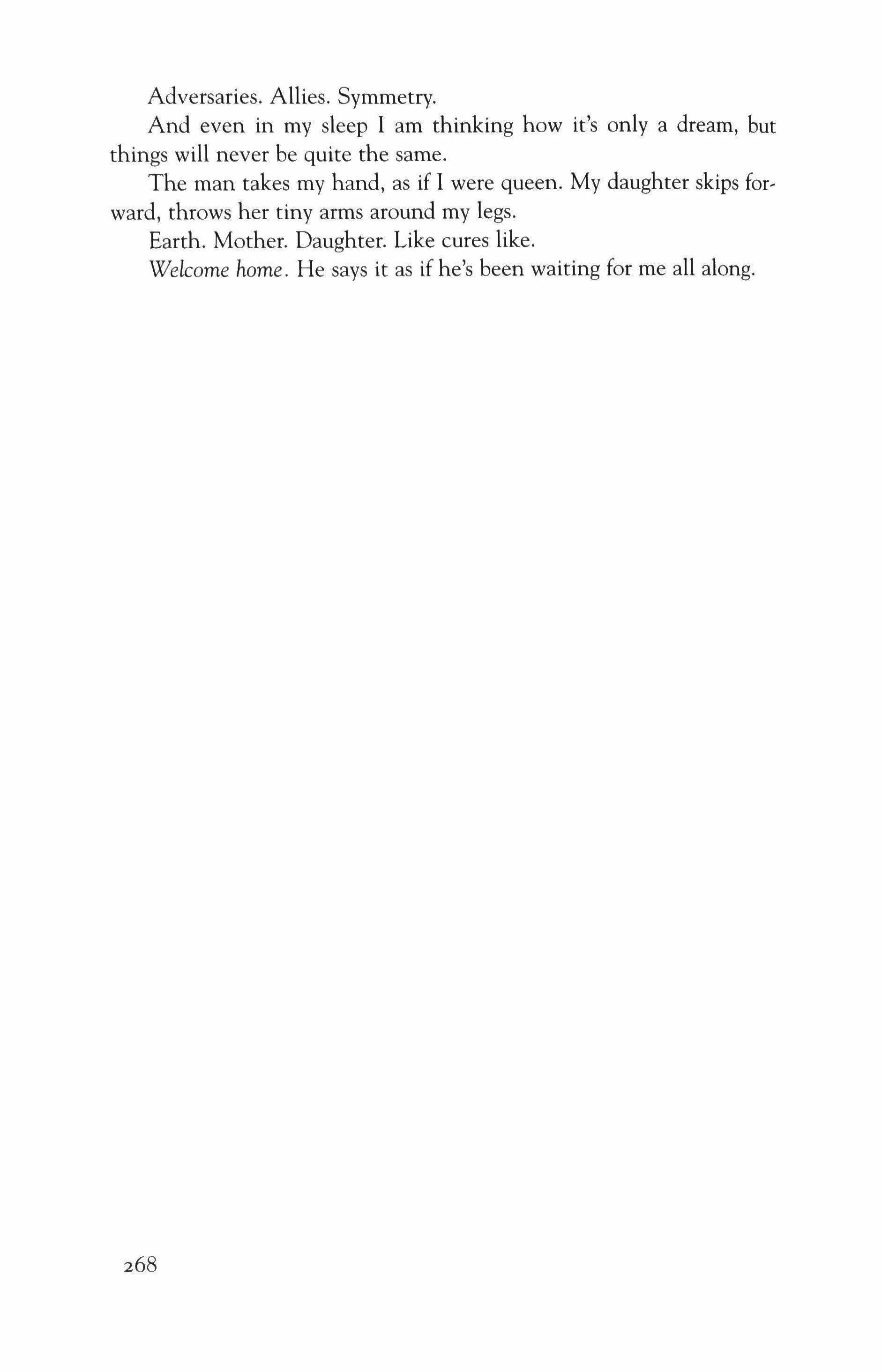
Adversaries. Allies. Symmetry.
And even in my sleep I am thinking how it's only a dream, but things will never be quite the same.
The man takes my hand, as if I were queen. My daughter skips forward, throws her tiny arms around my legs.
Earth. Mother. Daughter. Like cures like.
Welcome home. He says it as if he's been waiting for me all along.
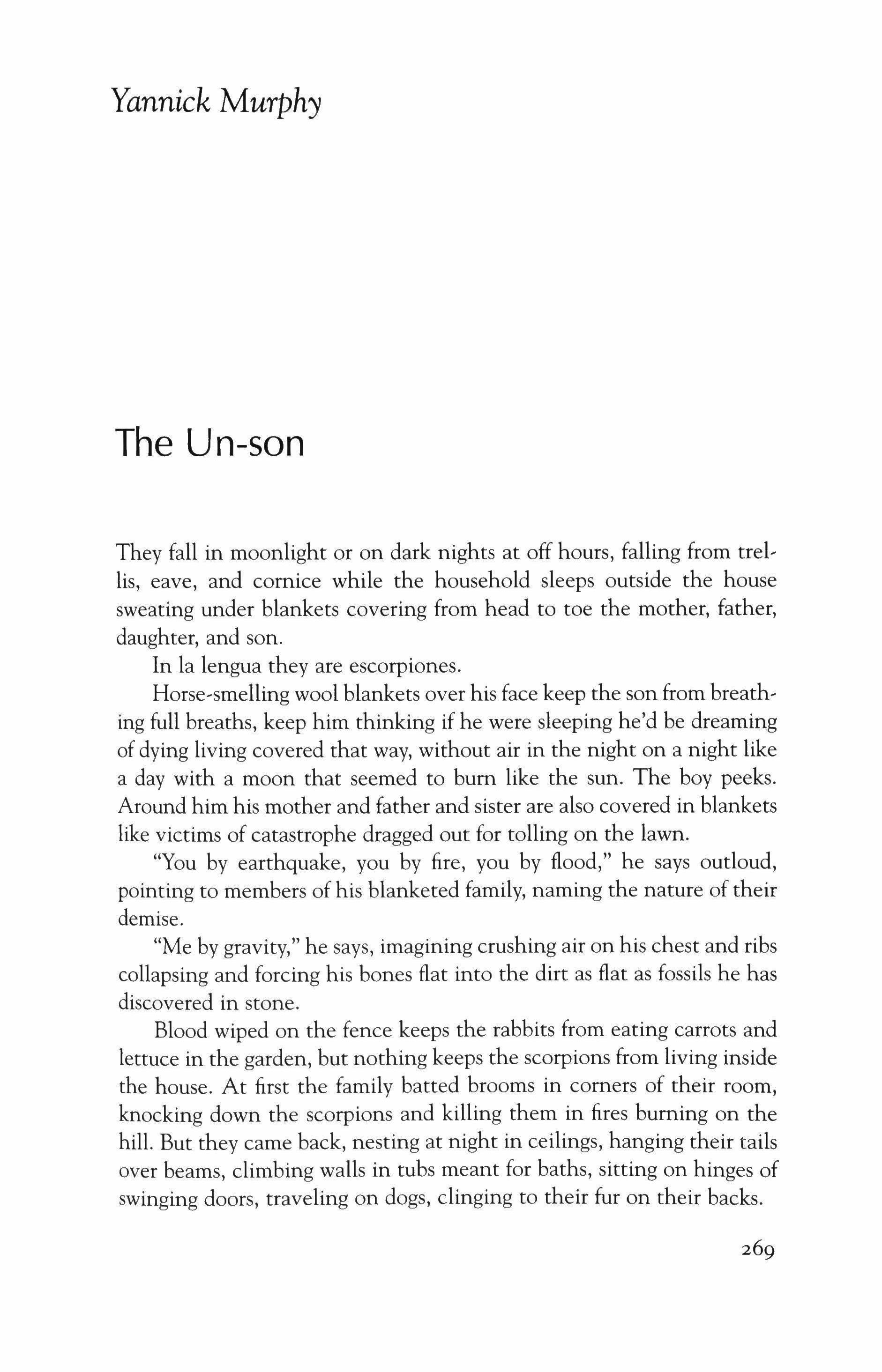
They fall in moonlight or on dark nights at off hours, falling from trellis, eave, and cornice while the household sleeps outside the house sweating under blankets covering from head to toe the mother, father, daughter, and son.
In la lengua they are escorpiones.
Horse-smelling wool blankets over his face keep the son from breathing full breaths, keep him thinking if he were sleeping he'd be dreaming of dying living covered that way, without air in the night on a night like a day with a moon that seemed to bum like the sun. The boy peeks. Around him his mother and father and sister are also covered in blankets like victims of catastrophe dragged out for tolling on the lawn.
"You by earthquake, you by fire, you by flood," he says outloud, pointing to members of his blanketed family, naming the nature of their demise.
"Me by gravity," he says, imagining crushing air on his chest and ribs collapsing and forcing his bones flat into the dirt as flat as fossils he has discovered in stone.
Blood wiped on the fence keeps the rabbits from eating carrots and lettuce in the garden, but nothing keeps the scorpions from living inside the house. At first the family batted brooms in comers of their room, knocking down the scorpions and killing them in fires burning on the hill. But they came back, nesting at night in ceilings, hanging their tails over beams, climbing walls in tubs meant for baths, sitting on hinges of swinging doors, traveling on dogs, clinging to their fur on their backs.

Spaniards put them in purses and set them loose by sleeping enemies. The boy's family sweeps them out the door, throwing them really, sending them flying out toward the arroyo and toward the chaparral. Once the boy almost swallowed one hung to the lip of a pitcher and his sister, once stung in the heel, now drags back a foot, trailing a snake path in sand.
In la lengua the boy's father says his family is disfortunado because their tierra is a tierra of scorpions and can never be sold and even during this crazy revolution the Federales don't want to steal it and everyone in town and all the towns over know that his family is up to their orejas in scorpions, so much so they cannot even rest their heads at night in their beds because they may be stung by a tail in their sleep.
The horses whinny, and the boy hears them and takes his blanket off his sweating chest and goes to the garden, seeing by moonlight to pull up carrots to feed to the horses. He climbs over the fence wiped with blood and wonders if the rabbits watch him, saying to each other. "He has crossed, the boy has crossed through the blood." He imagines his mother going to the garden in the morning finding her fence trampled and so many rabbits on all of her rows that she wonders how she is the only woman around who has planted carrot and lettuce seed and grown a garden of fur instead.
Out loud, to the horses, he says, "When will the boy come? When will he ride us through the river? That's what you're thinking, isn't it?" he says in the caballeriza.
"Diego is coming, here I come," he says walking to see them.
River water splashes up the horse's legs, his legs. He rides one horse and leads three others. He cannot see the morning sun for mist and a fog that rises from the water around the horse's legs and at his ankle bones. He can hear the pebbled riverbed beneath him being tripped and hooved, a rolling, knocking sound to sleep by. He does. What wakes him is not the leads of the three horses his sleep has let slip from his hands that now lay in the shallow water or his own horse that rides him under leaves of a branch that hit his face, but a dream of his uncle aloft, cloud riding, arms crossed over his chest, scorpions hanging from his skin sagged at the elbows, from his earlobes, from his beard and bowed legs, from his lips and eyelids and even his boot tips.
When he wakes and sees the three horses standing in the water he calls them. Madre Mia, Por EI Amor, Malditasea, he calls them and then calls them cabrones, hijos de putas and the horses tum to him and walking back to his house he tells them of his dream of his scorpioned uncle aloft on the clouds.

"What's that 1 heard you calling them when 1 was down by the river this morning?" the mother says to her son.
"I dreamt about Uncle Rafael," he says. "Do you want to hear my dream?" he says.
"No," the mother says, "I only don't want to hear you naming horses names we have not named them."
The boy wonders if she has yet been to her garden for lettuce and carrots.
"Diego, carifio, get some soap for the floors," the mother says.
"I am so old," he thinks he hears his mother say as he goes to the shed for the soap, but she is not speaking.
His sister is under a tree.
"Look," she says. She points to a bird's nest in a low branch. She walks in circles under the nest, holding onto the back of her leg to help her foot along.
"Where is the mother? There is no mother," she says. She tries to climb the tree, but slides down, bark breaking where her foot drags whose heel was once stung by a scorpion.
"You'll kill yourself, La Concha," the mother calls out from the window of the kitchen to her daughter. Diego lifts his sister to the nest. He feels her heart beating as he holds her.
"Calm down, the mother will come back," he tells his sister.
"Maybe she was killed by cats. There are cats. 1 have seen them," his sister says.
His father is in the field. There is a place in the field that is worn from where the father has walked in circles watching his horses. Diego has walked in this place but his feet feel strange, as if they were walking in boots that had been walked in by somebody else and there are small lifts and depressions that do not form to his feet and he feels as if he is alternately being tipped over and falling backwards and could step off over the edge when just walking on ground.
Tumbled clumps ofweed and straw shore up in wind against downed fence posts piled by the riding ring. Diego climbs the pile, careful not to splinter up his palms on the rotted pine wood posts.
"Bendejo! Hijo de Puta!" his father yells at a horse who rises to strike and seemingly gallop into the sky.
Rafael comes through the gate and takes the lead of the horse and says tranquilo to the horse and says calmate to the horse and pats the horse's neck and the horse snorts and lowers his head.
"Cabrone!" the father yells and punches the horse's shoulder. The
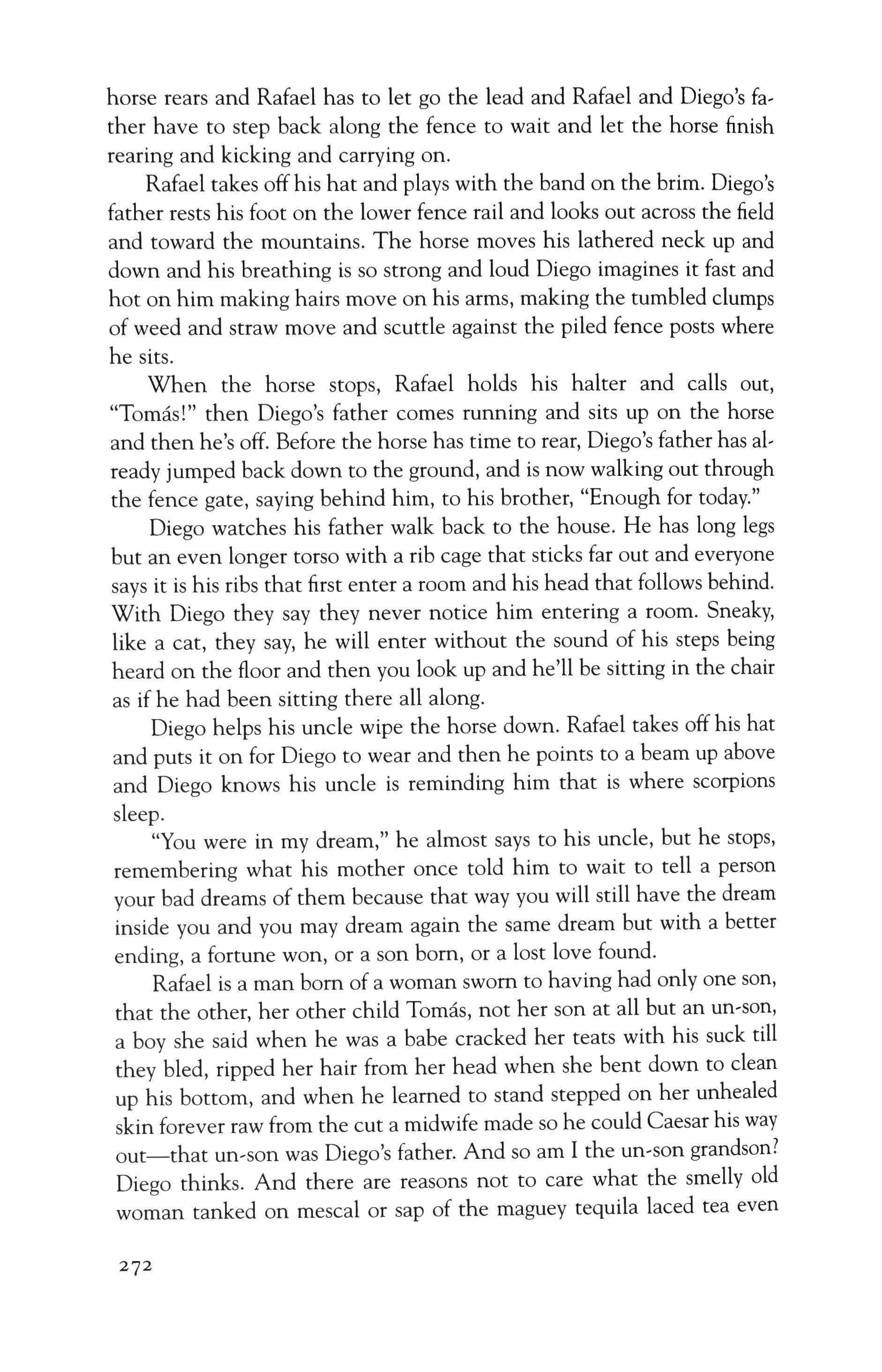
horse rears and Rafael has to let go the lead and Rafael and Diego's father have to step back along the fence to wait and let the horse finish rearing and kicking and carrying on.
Rafael takes off his hat and plays with the band on the brim. Diego's father rests his foot on the lower fence rail and looks out across the field and toward the mountains. The horse moves his lathered neck up and down and his breathing is so strong and loud Diego imagines it fast and hot on him making hairs move on his arms, making the tumbled clumps of weed and straw move and scuttle against the piled fence posts where he sits.
When the horse stops, Rafael holds his halter and calls out, "Tomas!" then Diego's father comes running and sits up on the horse and then he's off. Before the horse has time to rear, Diego's father has already jumped back down to the ground, and is now walking out through the fence gate, saying behind him, to his brother, "Enough for today."
Diego watches his father walk back to the house. He has long legs but an even longer torso with a rib cage that sticks far out and everyone says it is his ribs that first enter a room and his head that follows behind. With Diego they say they never notice him entering a room. Sneaky, like a cat, they say, he will enter without the sound of his steps being heard on the floor and then you look up and he'll be sitting in the chair as if he had been sitting there all along.
Diego helps his uncle wipe the horse down. Rafael takes off his hat and puts it on for Diego to wear and then he points to a beam up above and Diego knows his uncle is reminding him that is where scorpions sleep.
"You were in my dream," he almost says to his uncle, but he stops, remembering what his mother once told him to wait to tell a person your bad dreams of them because that way you will still have the dream inside you and you may dream again the same dream but with a better ending, a fortune won, or a son born, or a lost love found.
Rafael is a man born of a woman sworn to having had only one son, that the other, her other child Tomas, not her son at all but an un-son, a boy she said when he was a babe cracked her teats with his suck till they bled, ripped her hair from her head when she bent down to clean up his bottom, and when he learned to stand stepped on her unhealed skin forever raw from the cut a midwife made so he could Caesar his way out-that un-son was Diego's father. And so am I the un-son grandson? Diego thinks. And there are reasons not to care what the smelly old woman tanked on mescal or sap of the maguey tequila laced tea even
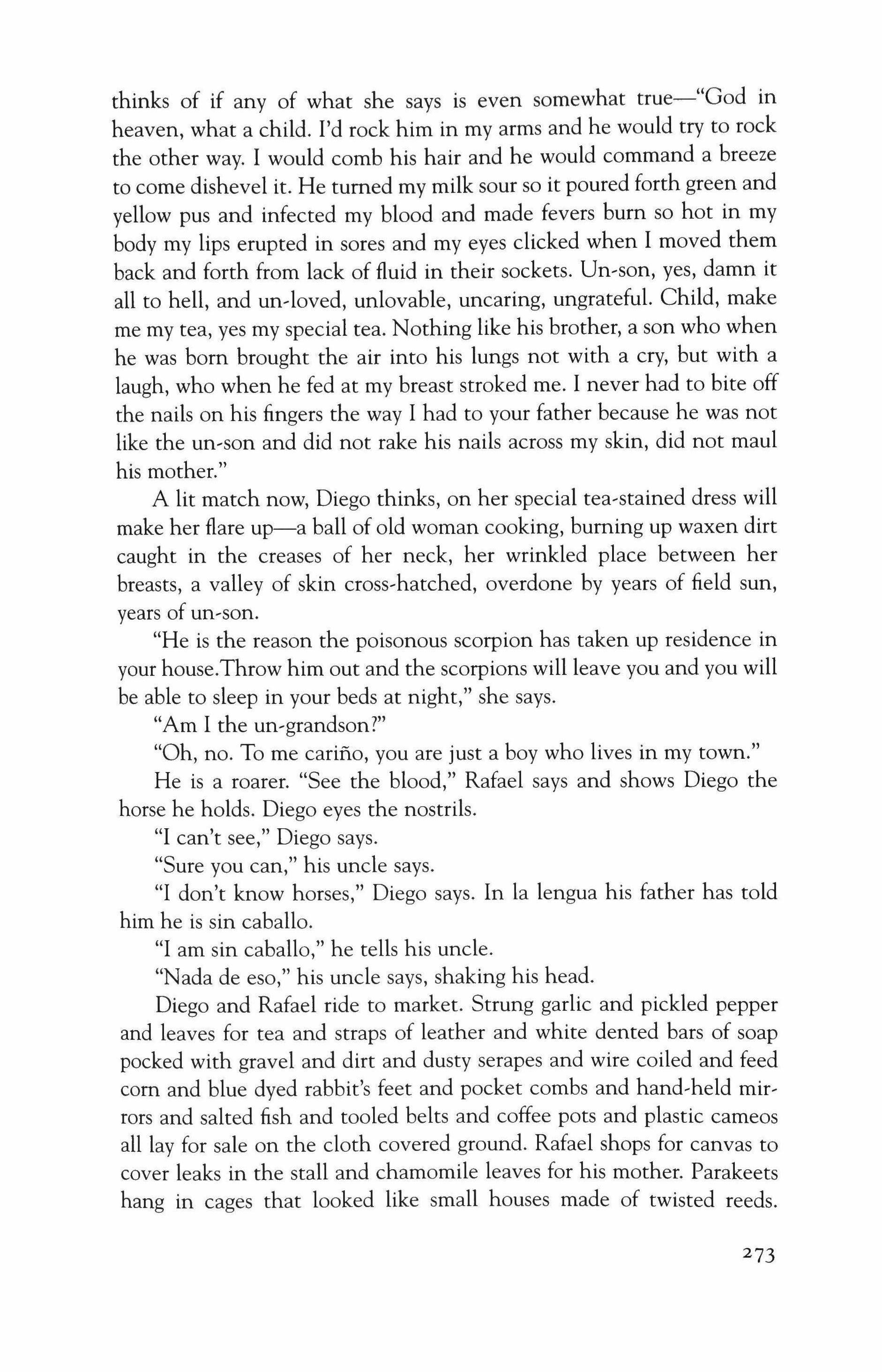
thinks of if any of what she says is even somewhat true-"Ood in heaven, what a child. I'd rock him in my arms and he would try to rock the other way. I would comb his hair and he would command a breeze to come dishevel it. He turned my milk sour so it poured forth green and yellow pus and infected my blood and made fevers bum so hot in my body my lips erupted in sores and my eyes clicked when I moved them back and forth from lack of fluid in their sockets. Un-son, yes, damn it all to hell, and un- loved, unlovable, uncaring, ungrateful. Child, make me my tea, yes my special tea. Nothing like his brother, a son who when he was born brought the air into his lungs not with a cry, but with a laugh, who when he fed at my breast stroked me. I never had to bite off the nails on his fingers the way I had to your father because he was not like the un-son and did not rake his nails across my skin, did not maul his mother."
A lit match now, Diego thinks, on her special tea-stained dress will make her flare up-a ball of old woman cooking, burning up waxen dirt caught in the creases of her neck, her wrinkled place between her breasts, a valley of skin cross-hatched, overdone by years of field sun, years of un-son.
"He is the reason the poisonous scorpion has taken up residence in your house.Throw him out and the scorpions will leave you and you will be able to sleep in your beds at night," she says.
"Am I the uri-grandson?"
"Oh, no. To me carifio, you are just a boy who lives in my town."
He is a roarer. "See the blood," Rafael says and shows Diego the horse he holds. Diego eyes the nostrils.
"I can't see," Diego says.
"Sure you can," his uncle says.
"I don't know horses," Diego says. In la lengua his father has told him he is sin caballo.
"I am sin caballo," he tells his uncle.
"Nada de eso," his uncle says, shaking his head.
Diego and Rafael ride to market. Strung garlic and pickled pepper and leaves for tea and straps of leather and white dented bars of soap pocked with gravel and dirt and dusty serapes and wire coiled and feed com and blue dyed rabbit's feet and pocket combs and hand-held mirrors and salted fish and tooled belts and coffee pots and plastic cameos all lay for sale on the cloth covered ground. Rafael shops for canvas to cover leaks in the stall and chamomile leaves for his mother. Parakeets hang in cages that looked like small houses made of twisted reeds.
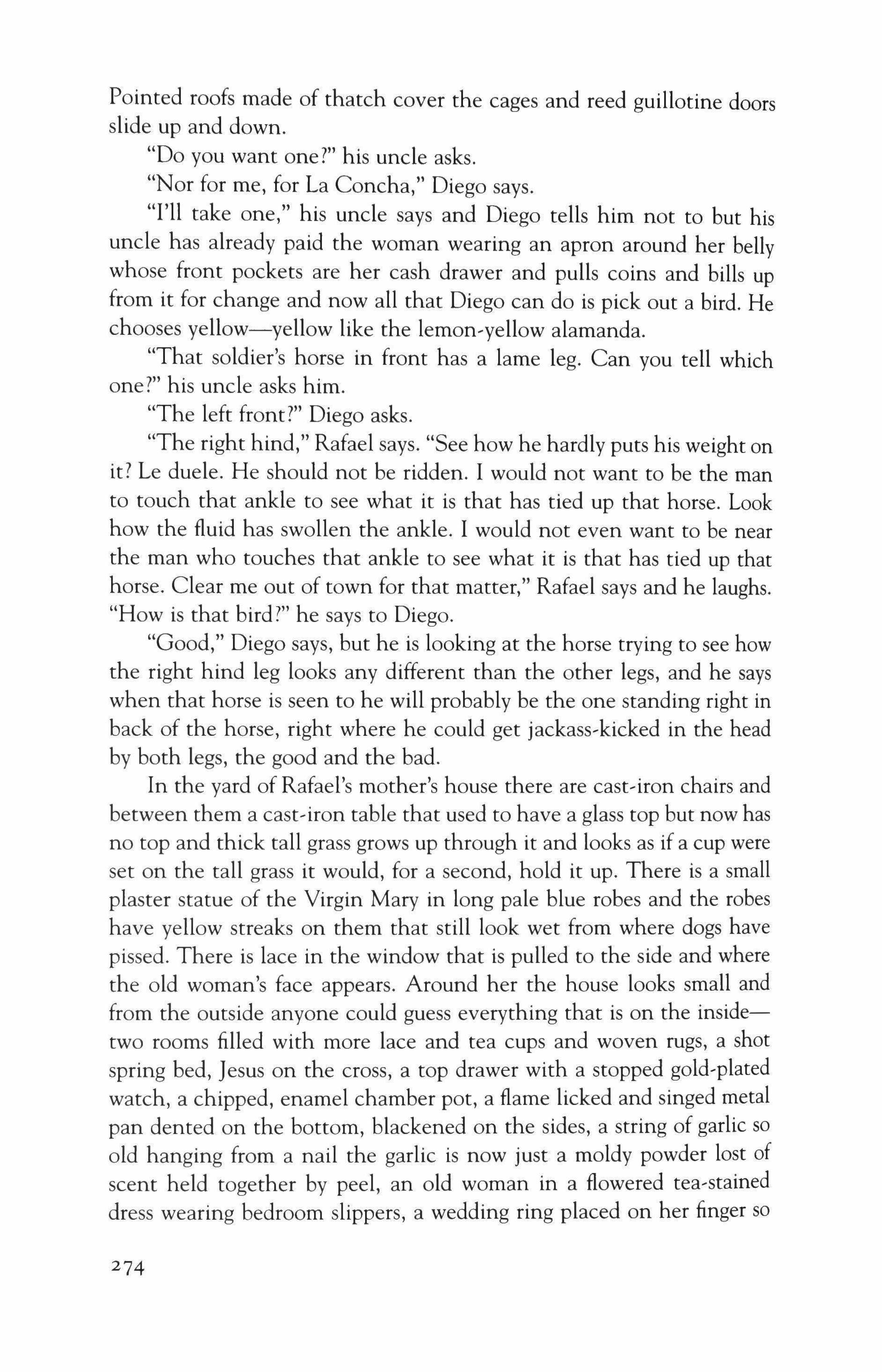
Pointed roofs made of thatch cover the cages and reed guillotine doors slide up and down.
"Do you want one?" his uncle asks.
"Nor for me, for La Concha," Diego says.
"I'll take one," his uncle says and Diego tells him not to but his uncle has already paid the woman wearing an apron around her belly whose front pockets are her cash drawer and pulls coins and bills up from it for change and now all that Diego can do is pick out a bird. He chooses yellow-yellow like the lemon-yellow alamanda.
"That soldier's horse in front has a lame leg. Can you tell which one?" his uncle asks him.
"The left front?" Diego asks.
"The right hind," Rafael says. "See how he hardly puts his weight on it? Le duele. He should not be ridden. I would not want to be the man to touch that ankle to see what it is that has tied up that horse. Look how the fluid has swollen the ankle. I would not even want to be near the man who touches that ankle to see what it is that has tied up that horse. Clear me out of town for that matter," Rafael says and he laughs. "How is that bird?" he says to Diego.
"Good," Diego says, but he is looking at the horse trying to see how the right hind leg looks any different than the other legs, and he says when that horse is seen to he will probably be the one standing right in back of the horse, right where he could get jackass-kicked in the head by both legs, the good and the bad.
In the yard of Rafael's mother's house there are cast-iron chairs and between them a cast-iron table that used to have a glass top but now has no top and thick tall grass grows up through it and looks as if a cup were set on the tall grass it would, for a second, hold it up. There is a small plaster statue of the Virgin Mary in long pale blue robes and the robes have yellow streaks on them that still look wet from where dogs have pissed. There is lace in the window that is pulled to the side and where the old woman's face appears. Around her the house looks small and from the outside anyone could guess everything that is on the insidetwo rooms filled with more lace and tea cups and woven rugs, a shot spring bed, Jesus on the cross, a top drawer with a stopped gold-plated watch, a chipped, enamel chamber pot, a flame licked and singed metal pan dented on the bottom, blackened on the sides, a string of garlic so old hanging from a nail the garlic is now just a moldy powder lost of scent held together by peel, an old woman in a flowered tea-stained dress wearing bedroom slippers, a wedding ring placed on her finger so

many years ago, fat has grown around it and you wonder if the woman is in pain.
Anna Luisa Matilda Ruiz is her name. But she was called AnnaLoo by other children when she was a child and AnnaLoo by the child who became the man she married.
Diego ties the parakeet to his saddle and follows his uncle into the house.
She won't talk to Rafael.
"Mama, please," he says.
Diego is standing on the skirt of her flowered dress fanned out on the floor. He steps off it.
AnnaLoo moans.
A fly flies to the rim of her teacup.
Rafael kneels down.
"I have chamomile," he tells her.
Diego looks out at what she can see from her window. Rows of gar, den com whose husks are shaggy and split and kernels gnarled made grotesque by blights of smut they are none two the same shape or size but patterned like they had been melted and could drip off the cob in wobbly dollops to the dry silk matted ground.
Diego takes the dented pan and gets water from the well. The well is deep and people from the town say that someone once fell down there and now his ghost lives in there whose scraping fingernails you can hear at night as he tries to climb the side of the well's stone walls. The water bucket up Diego looks for signs of the drowned man. A kerchiefhe once maybe wore around his neck, a bloodied fingernail, but there is nothing but a swirl of algae resting on the top.
"Mama, por favor, we go through this every time. I want to know how you've been. It was cold a few days ago. Did you have wood for a fire? Did you use some blankets?" Rafael asks his mother. She does not answer. "You are a strong woman, Anna Luisa Matilda Ruiz, the strongest I have ever known," Rafael says.
Maybe AnnaLoo's nose is stuffed. She breathes heavily. Her chest, blown full for air as she sits tall in her chair is huge like Diego's father's. She leaves just her eyes for talking. Words that if they could be heard might be stories of her girlhood. But she was a girl who had a girlhood that was not sweet, that was not the kind that makes for stories to tell children before bed, but was the kind that makes for stories to remind children of how lucky they are that they did not lead the life of Anna Luisa Matilda Ruiz.
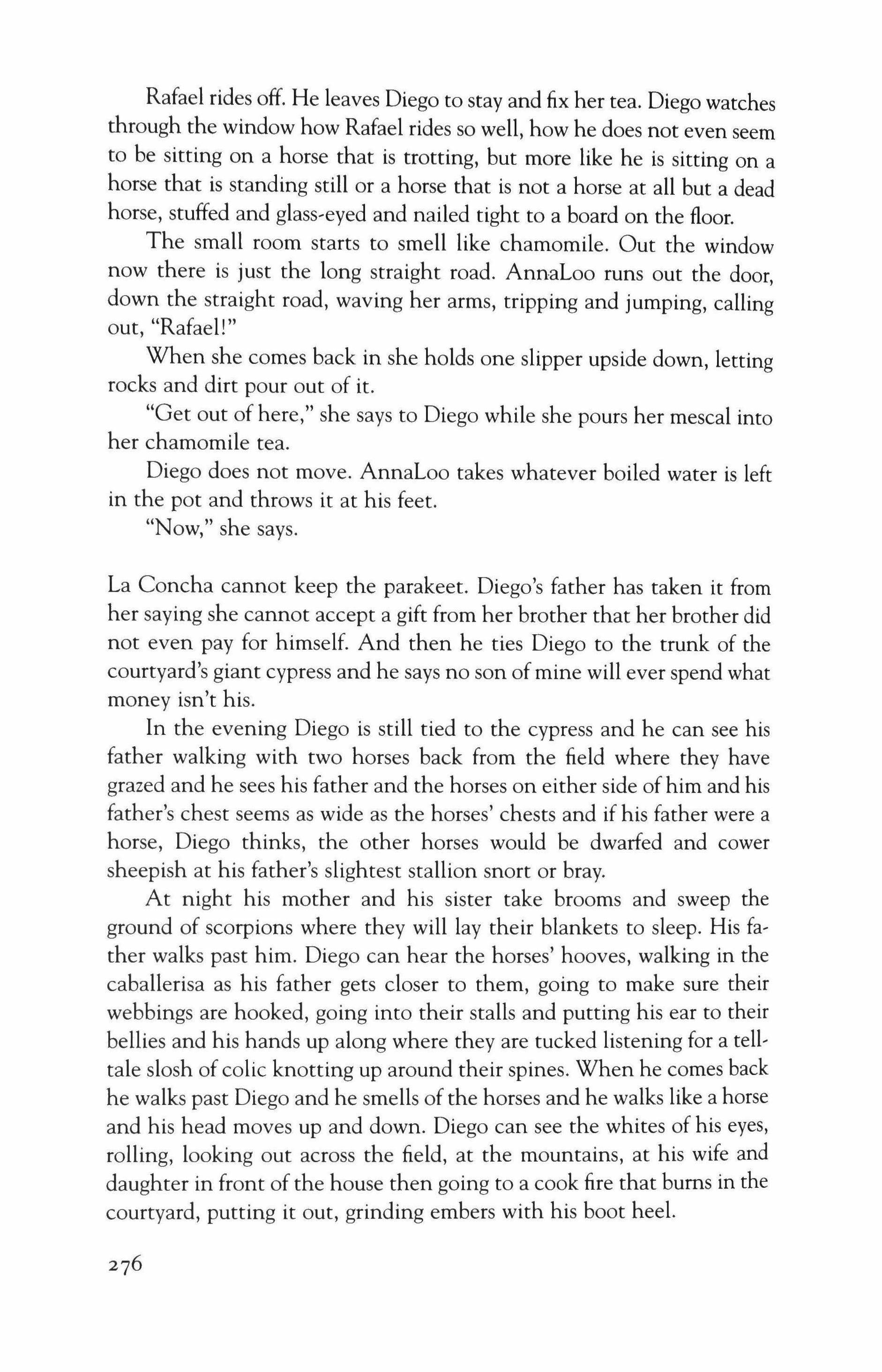
Rafael rides off. He leaves Diego to stay and fix her tea. Diego watches through the window how Rafael rides so well, how he does not even seem to be sitting on a horse that is trotting, but more like he is sitting on a horse that is standing still or a horse that is not a horse at all but a dead horse, stuffed and glass-eyed and nailed tight to a board on the floor.
The small room starts to smell like chamomile. Out the window now there is just the long straight road. AnnaLoo runs out the door, down the straight road, waving her arms, tripping and jumping, calling out, "Rafael!"
When she comes back in she holds one slipper upside down, letting rocks and dirt pour out of it.
"Get out of here," she says to Diego while she pours her mescal into her chamomile tea.
Diego does not move. AnnaLoo takes whatever boiled water is left in the pot and throws it at his feet.
"Now," she says.
La Concha cannot keep the parakeet. Diego's father has taken it from her saying she cannot accept a gift from her brother that her brother did not even pay for himself. And then he ties Diego to the trunk of the courtyard's giant cypress and he says no son of mine will ever spend what money isn't his.
In the evening Diego is still tied to the cypress and he can see his father walking with two horses back from the field where they have grazed and he sees his father and the horses on either side ofhim and his father's chest seems as wide as the horses' chests and if his father were a horse, Diego thinks, the other horses would be dwarfed and cower sheepish at his father's slightest stallion snort or bray.
At night his mother and his sister take brooms and sweep the ground of scorpions where they will lay their blankets to sleep. His father walks past him. Diego can hear the horses' hooves, walking in the caballerisa as his father gets closer to them, going to make sure their webbings are hooked, going into their stalls and putting his ear to their bellies and his hands up along where they are tucked listening for a telltale slosh of colic knotting up around their spines. When he comes back he walks past Diego and he smells of the horses and he walks like a horse and his head moves up and down. Diego can see the whites of his eyes, rolling, looking out across the field, at the mountains, at his wife and daughter in front of the house then going to a cook fire that bums in the courtyard, putting it out, grinding embers with his boot heel.
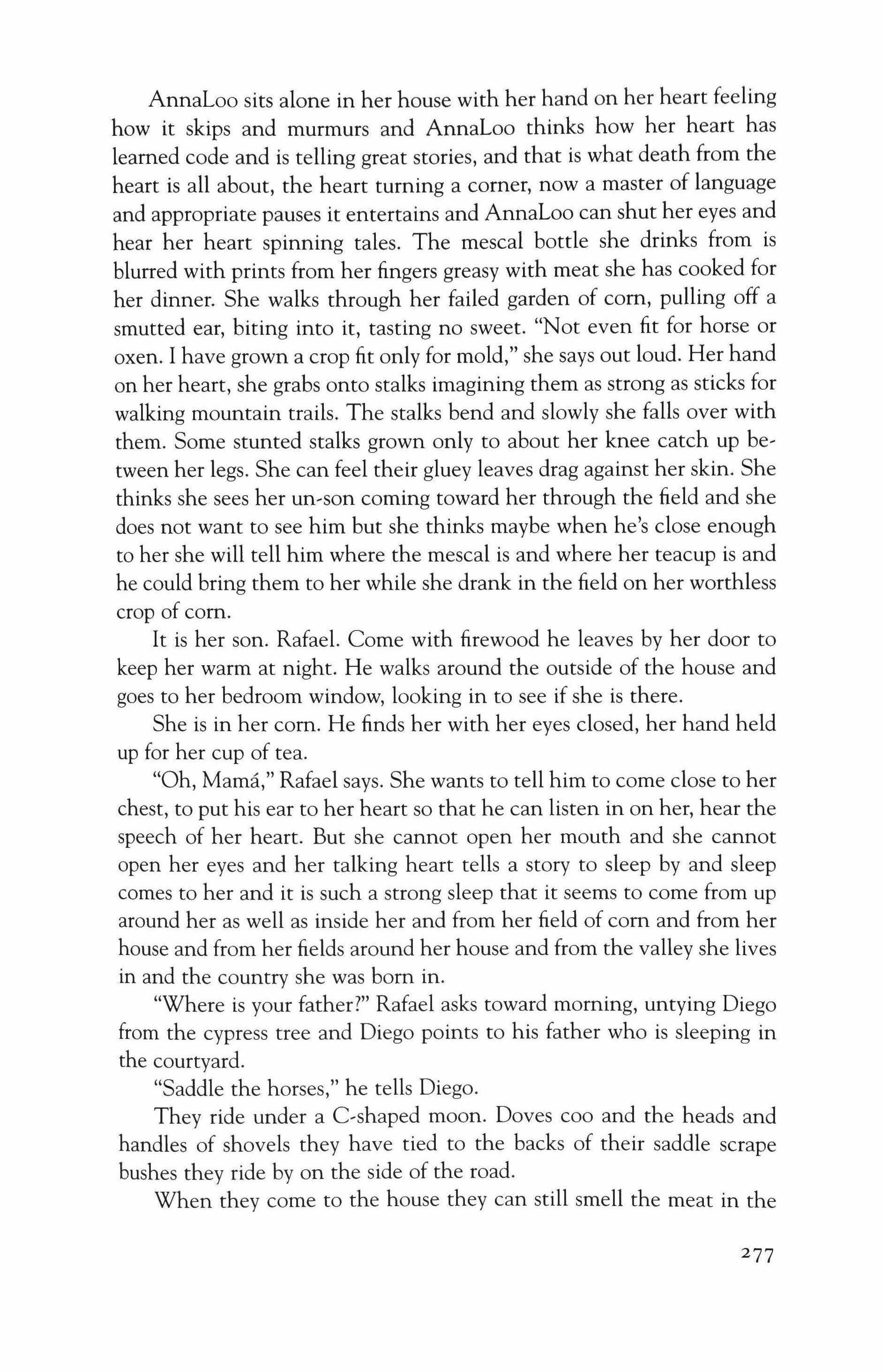
AnnaLoo sits alone in her house with her hand on her heart feeling how it skips and murmurs and AnnaLoo thinks how her heart has learned code and is telling great stories, and that is what death from the heart is all about, the heart turning a comer, now a master of language and appropriate pauses it entertains and AnnaLoo can shut her eyes and hear her heart spinning tales. The mescal bottle she drinks from is blurred with prints from her fingers greasy with meat she has cooked for her dinner. She walks through her failed garden of com, pulling off a smutted ear, biting into it, tasting no sweet. "Not even fit for horse or oxen. I have grown a crop fit only for mold," she says out loud. Her hand on her heart, she grabs onto stalks imagining them as strong as sticks for walking mountain trails. The stalks bend and slowly she falls over with them. Some stunted stalks grown only to about her knee catch up between her legs. She can feel their gluey leaves drag against her skin. She thinks she sees her un-son coming toward her through the field and she does not want to see him but she thinks maybe when he's close enough to her she will tell him where the mescal is and where her teacup is and he could bring them to her while she drank in the field on her worthless crop of com.
It is her son. Rafael. Come with firewood he leaves by her door to keep her warm at night. He walks around the outside of the house and goes to her bedroom window, looking in to see if she is there.
She is in her com. He finds her with her eyes closed, her hand held up for her cup of tea.
"Oh, Mama," Rafael says. She wants to tell him to come close to her chest, to put his ear to her heart so that he can listen in on her, hear the speech of her heart. But she cannot open her mouth and she cannot open her eyes and her talking heart tells a story to sleep by and sleep comes to her and it is such a strong sleep that it seems to come from up around her as well as inside her and from her field of com and from her house and from her fields around her house and from the valley she lives in and the country she was born in.
"Where is your father?" Rafael asks toward morning, untying Diego from the cypress tree and Diego points to his father who is sleeping in the courtyard.
"Saddle the horses," he tells Diego.
They ride under a C-shaped moon. Doves coo and the heads and handles of shovels they have tied to the backs of their saddle scrape bushes they ride by on the side of the road.
When they come to the house they can still smell the meat in the
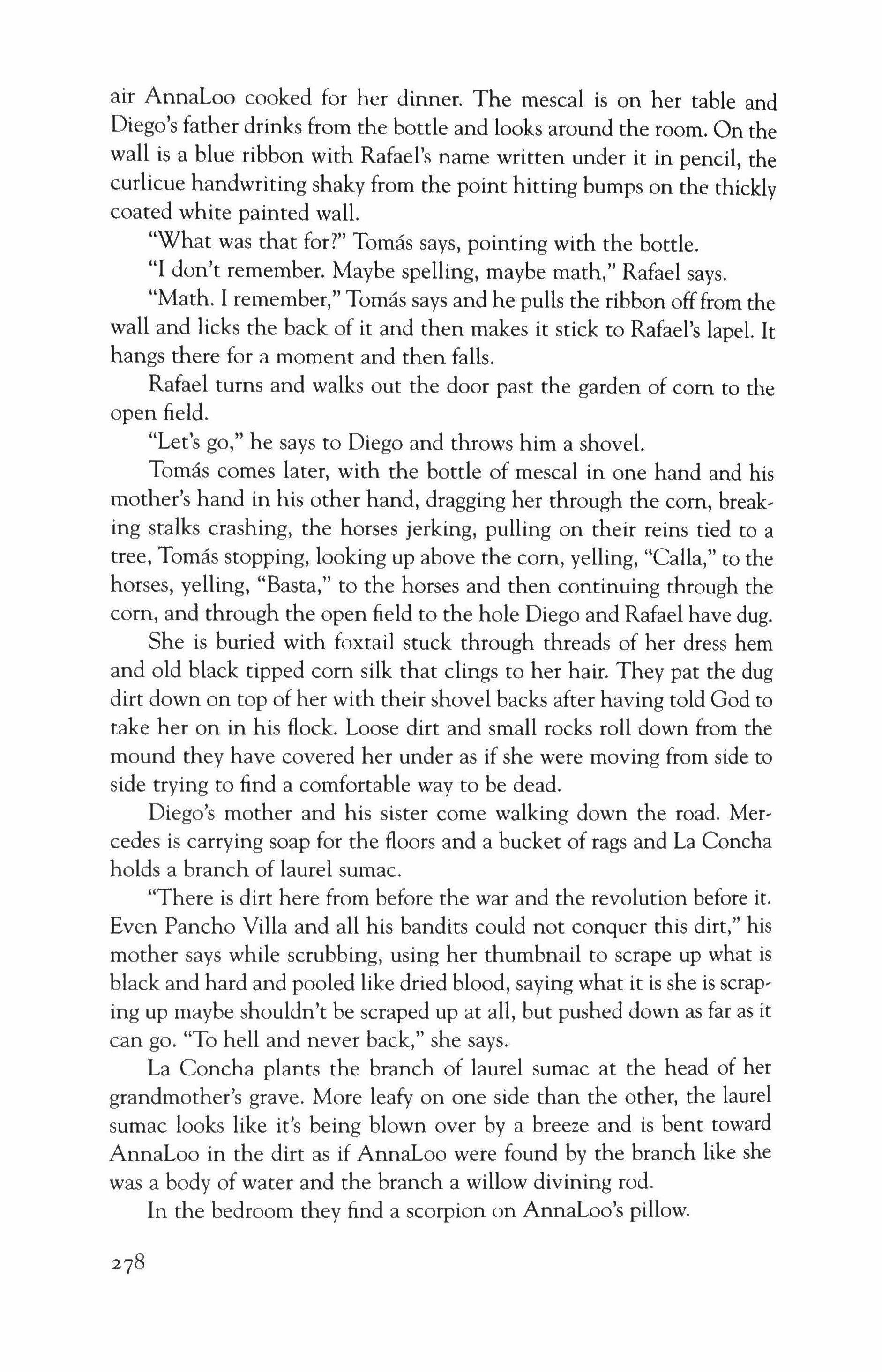
air AnnaLoo cooked for her dinner. The mescal is on her table and Diego's father drinks from the bottle and looks around the room. On the wall is a blue ribbon with Rafael's name written under it in pencil, the curlicue handwriting shaky from the point hitting bumps on the thickly coated white painted wall.
"What was that for?" Tomas says, pointing with the bottle.
"I don't remember. Maybe spelling, maybe math," Rafael says.
"Math. I remember," Tomas says and he pulls the ribbon offfrom the wall and licks the back of it and then makes it stick to Rafael's lapel. It hangs there for a moment and then falls.
Rafael turns and walks out the door past the garden of corn to the open field.
"Let's go," he says to Diego and throws him a shovel.
Tomas comes later, with the bottle of mescal in one hand and his mother's hand in his other hand, dragging her through the corn, breaking stalks crashing, the horses jerking, pulling on their reins tied to a tree, Tomas stopping, looking up above the corn, yelling, "Calla," to the horses, yelling, "Basta," to the horses and then continuing through the corn, and through the open field to the hole Diego and Rafael have dug.
She is buried with foxtail stuck through threads of her dress hem and old black tipped corn silk that clings to her hair. They pat the dug dirt down on top of her with their shovel backs after having told God to take her on in his flock. Loose dirt and small rocks roll down from the mound they have covered her under as if she were moving from side to side trying to find a comfortable way to be dead.
Diego's mother and his sister come walking down the road. Mercedes is carrying soap for the floors and a bucket of rags and La Concha holds a branch of laurel sumac.
"There is dirt here from before the war and the revolution before it. Even Pancho Villa and all his bandits could not conquer this dirt," his mother says while scrubbing, using her thumbnail to scrape up what is black and hard and pooled like dried blood, saying what it is she is scraping up maybe shouldn't be scraped up at all, but pushed down as far as it can go. "To hell and never back," she says.
La Concha plants the branch of laurel sumac at the head of her grandmother's grave. More leafy on one side than the other, the laurel sumac looks like it's being blown over by a breeze and is bent toward AnnaLoo in the dirt as if AnnaLoo were found by the branch like she was a body of water and the branch a willow divining rod.
In the bedroom they find a scorpion on AnnaLoo's pillow.
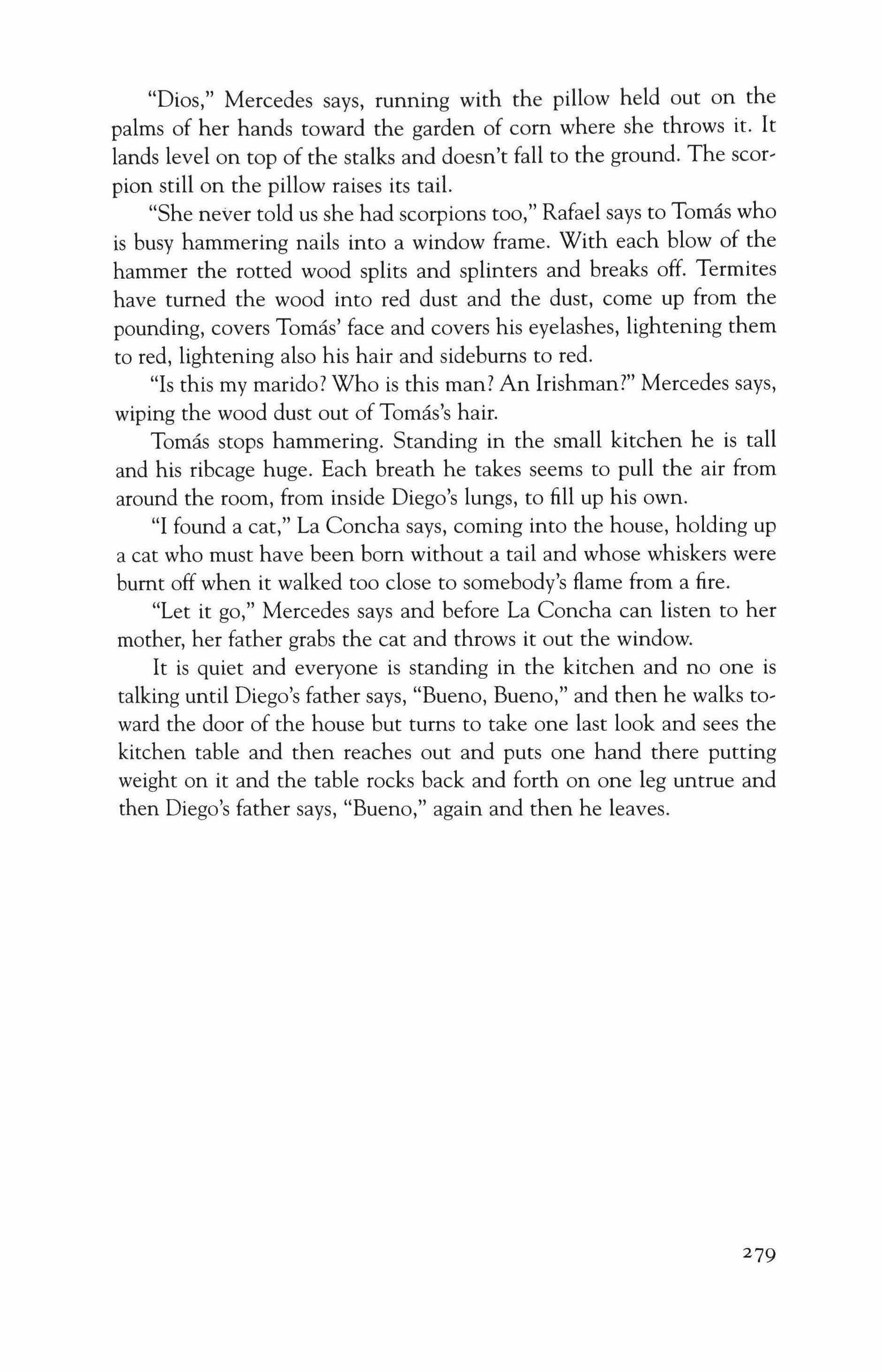
"Dios," Mercedes says, running with the pillow held out on the palms of her hands toward the garden of com where she throws it. It lands level on top of the stalks and doesn't fall to the ground. The scorpion still on the pillow raises its tail.
"She never told us she had scorpions too," Rafael says to Tomas who is busy hammering nails into a window frame. With each blow of the hammer the rotted wood splits and splinters and breaks off. Termites have turned the wood into red dust and the dust, come up from the pounding, covers Tomas' face and covers his eyelashes, lightening them to red, lightening also his hair and sideburns to red.
"Is this my marido? Who is this man? An Irishman?" Mercedes says, wiping the wood dust out of Tomas's hair.
Tomas stops hammering. Standing in the small kitchen he is tall and his ribcage huge. Each breath he takes seems to pull the air from around the room, from inside Diego's lungs, to fill up his own.
"I found a cat," La Concha says, coming into the house, holding up a cat who must have been born without a tail and whose whiskers were burnt off when it walked too close to somebody's flame from a fire.
"Let it go," Mercedes says and before La Concha can listen to her mother, her father grabs the cat and throws it out the window.
It is quiet and everyone is standing in the kitchen and no one is talking until Diego's father says, "Bueno, Bueno," and then he walks toward the door of the house but turns to take one last look and sees the kitchen table and then reaches out and puts one hand there putting weight on it and the table rocks back and forth on one leg untrue and then Diego's father says, "Bueno," again and then he leaves.
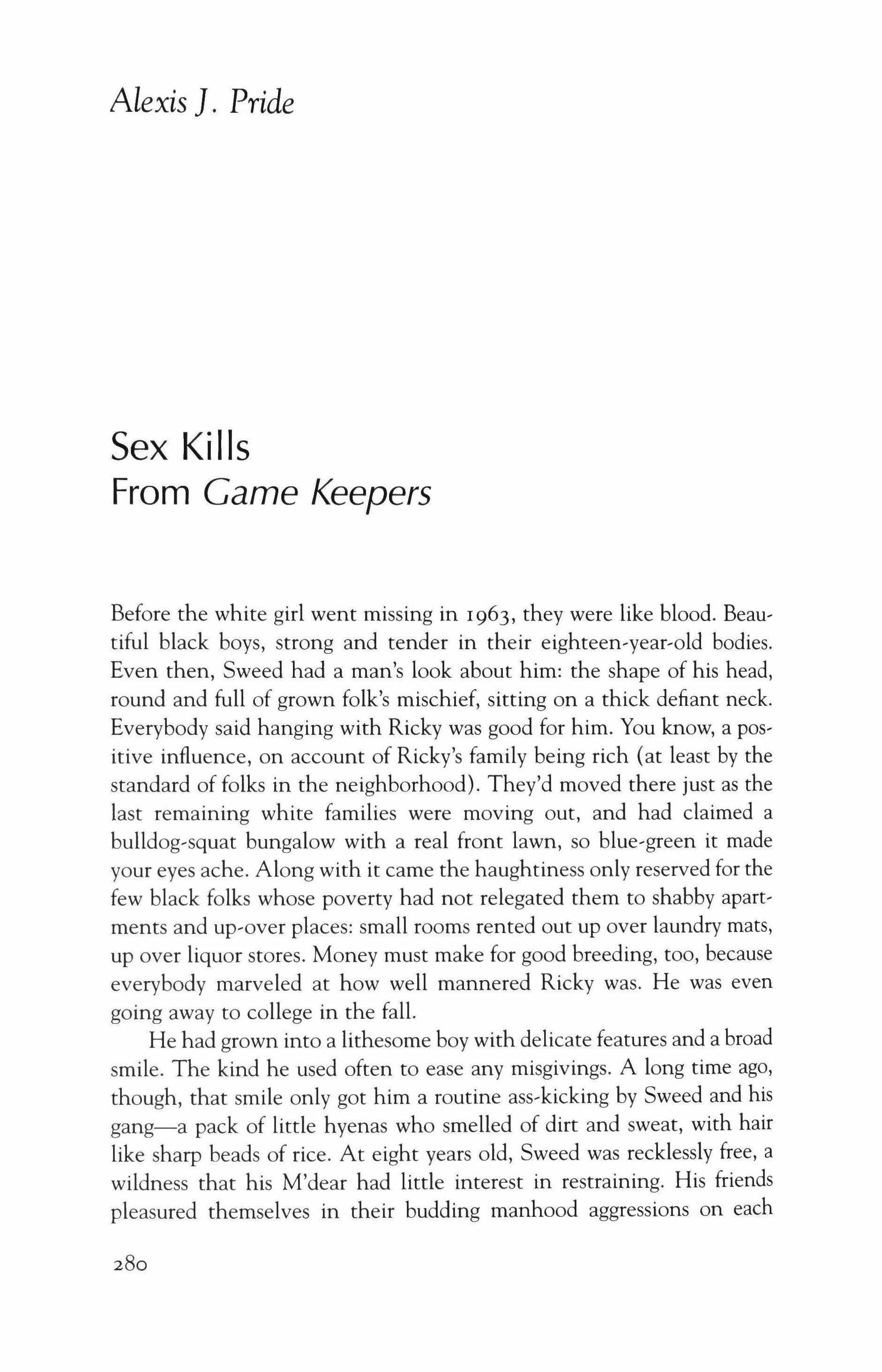
Before the white girl went missing in 1963, they were like blood. Beautiful black boys, strong and tender in their eighteen-year-old bodies. Even then, Sweed had a man's look about him: the shape of his head, round and full of grown folk's mischief, sitting on a thick defiant neck. Everybody said hanging with Ricky was good for him. You know, a positive influence, on account of Ricky's family being rich {at least by the standard of folks in the neighborhood}. They'd moved there just as the last remaining white families were moving out, and had claimed a bulldog-squat bungalow with a real front lawn, so blue-green it made your eyes ache. Along with it came the haughtiness only reserved for the few black folks whose poverty had not relegated them to shabby apartments and up-over places: small rooms rented out up over laundry mats, up over liquor stores. Money must make for good breeding, too, because everybody marveled at how well mannered Ricky was. He was even going away to college in the fall.
He had grown into a lithesome boy with delicate features and a broad smile. The kind he used often to ease any misgivings. A long time ago, though, that smile only got him a routine ass-kicking by Sweed and his gang-a pack of little hyenas who smelled of dirt and sweat, with hair like sharp beads of rice. At eight years old, Sweed was recklessly free, a wildness that his M'dear had little interest in restraining. His friends pleasured themselves in their budding manhood aggressions on each
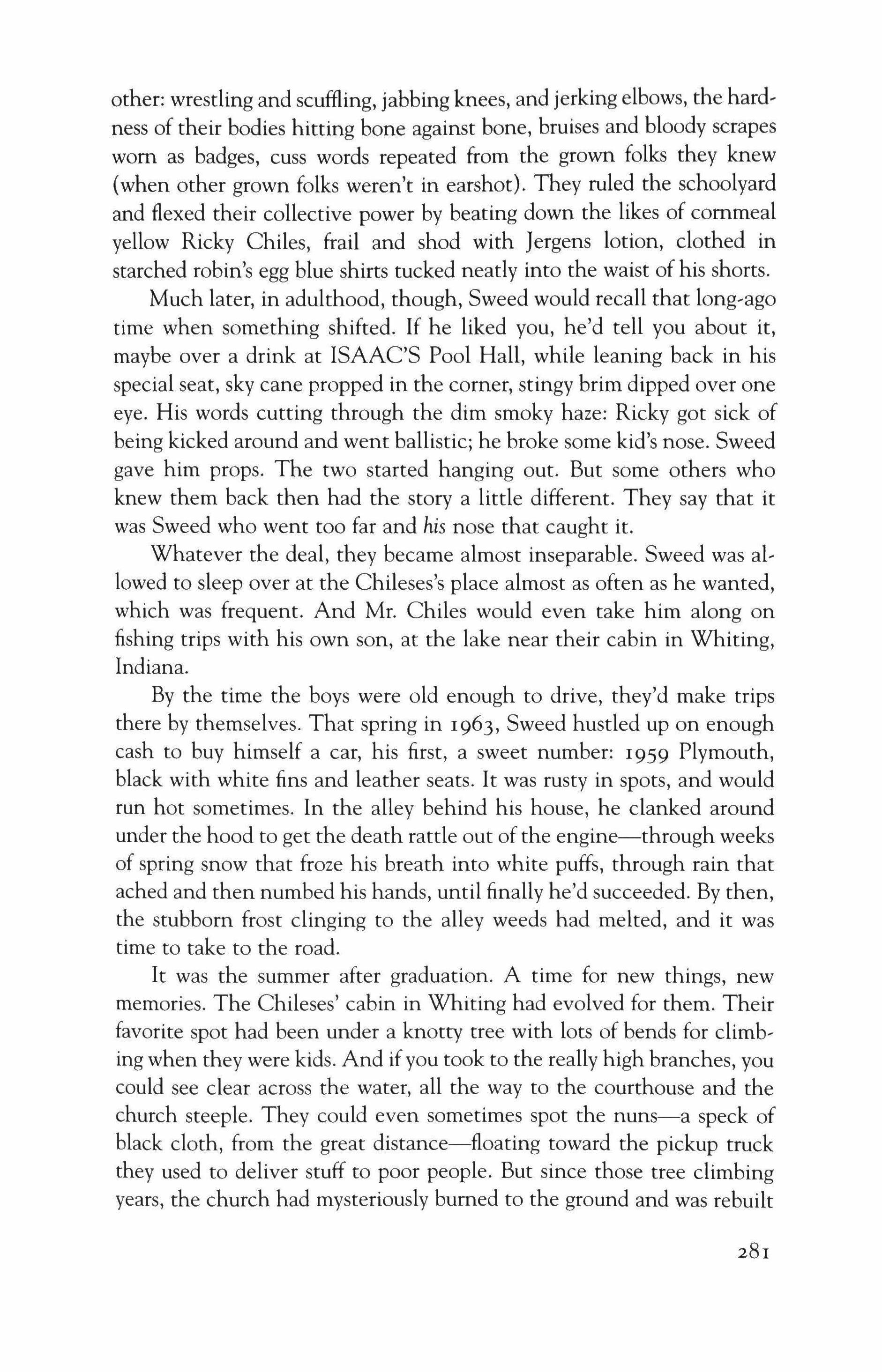
other: wrestling and scuffling, jabbing knees, and jerking elbows, the hard, ness of their bodies hitting bone against bone, bruises and bloody scrapes worn as badges, cuss words repeated from the grown folks they knew {when other grown folks weren't in earshot}. They ruled the schoolyard and flexed their collective power by beating down the likes of cornmeal yellow Ricky Chiles, frail and shod with Jergens lotion, clothed in starched robin's egg blue shirts tucked neatly into the waist of his shorts.
Much later, in adulthood, though, Sweed would recall that long'ago time when something shifted. If he liked you, he'd tell you about it, maybe over a drink at ISAAC'S Pool Hall, while leaning back in his special seat, sky cane propped in the comer, stingy brim dipped over one eye. His words cutting through the dim smoky haze: Ricky got sick of being kicked around and went ballistic; he broke some kid's nose. Sweed gave him props. The two started hanging out. But some others who knew them back then had the story a little different. They say that it was Sweed who went too far and his nose that caught it.
Whatever the deal, they became almost inseparable. Sweed was allowed to sleep over at the Chileses's place almost as often as he wanted, which was frequent. And Mr. Chiles would even take him along on fishing trips with his own son, at the lake near their cabin in Whiting, Indiana.
By the time the boys were old enough to drive, they'd make trips there by themselves. That spring in 1963, Sweed hustled up on enough cash to buy himself a car, his first, a sweet number: 1959 Plymouth, black with white fins and leather seats. It was rusty in spots, and would run hot sometimes. In the alley behind his house, he clanked around under the hood to get the death rattle out of the engine-through weeks of spring snow that froze his breath into white puffs, through rain that ached and then numbed his hands, until finally he'd succeeded. By then, the stubborn frost clinging to the alley weeds had melted, and it was time to take to the road.
It was the summer after graduation. A time for new things, new memories. The Chileses' cabin in Whiting had evolved for them. Their favorite spot had been under a knotty tree with lots of bends for climb, ing when they were kids. And ifyou took to the really high branches, you could see clear across the water, all the way to the courthouse and the church steeple. They could even sometimes spot the nuns-a speck of black cloth, from the great distance-floating toward the pickup truck they used to deliver stuff to poor people. But since those tree climbing years, the church had mysteriously burned to the ground and was rebuilt
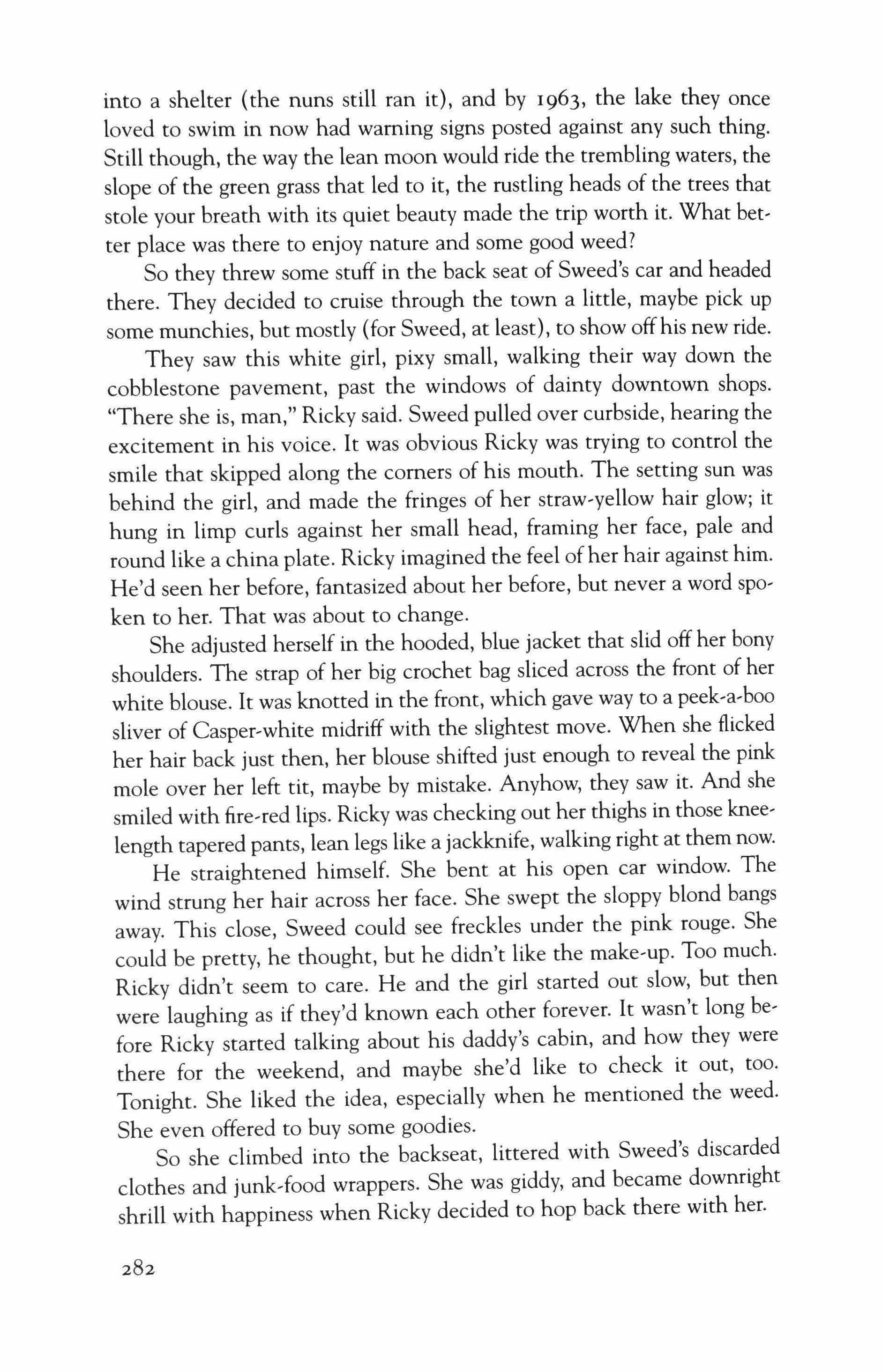
into a shelter (the nuns still ran it), and by 1963, the lake they once loved to swim in now had warning signs posted against any such thing. Still though, the way the lean moon would ride the trembling waters, the slope of the green grass that led to it, the rustling heads of the trees that stole your breath with its quiet beauty made the trip worth it. What better place was there to enjoy nature and some good weed?
So they threw some stuff in the back seat of Sweed's car and headed there. They decided to cruise through the town a little, maybe pick up some munchies, but mostly (for Sweed, at least), to show offhis new ride.
They saw this white girl, pixy small, walking their way down the cobblestone pavement, past the windows of dainty downtown shops. "There she is, man," Ricky said. Sweed pulled over curbside, hearing the excitement in his voice. It was obvious Ricky was trying to control the smile that skipped along the comers of his mouth. The setting sun was behind the girl, and made the fringes of her straw-yellow hair glow; it hung in limp curls against her small head, framing her face, pale and round like a china plate. Ricky imagined the feel ofher hair against him. He'd seen her before, fantasized about her before, but never a word spoken to her. That was about to change.
She adjusted herself in the hooded, blue jacket that slid off her bony shoulders. The strap of her big crochet bag sliced across the front of her white blouse. It was knotted in the front, which gave way to a peek-a-boo sliver of Casper-white midriff with the slightest move. When she flicked her hair back just then, her blouse shifted just enough to reveal the pink mole over her left tit, maybe by mistake. Anyhow, they saw it. And she smiled with fire-red lips. Ricky was checking out her thighs in those kneelength tapered pants, lean legs like a jackknife, walking right at them now.
He straightened himself. She bent at his open car window. The wind strung her hair across her face. She swept the sloppy blond bangs away. This close, Sweed could see freckles under the pink rouge. She could be pretty, he thought, but he didn't like the make-up. Too much. Ricky didn't seem to care. He and the girl started out slow, but then were laughing as if they'd known each other forever. It wasn't long before Ricky started talking about his daddy's cabin, and how they were there for the weekend, and maybe she'd like to check it out, too.
Tonight. She liked the idea, especially when he mentioned the weed. She even offered to buy some goodies.
So she climbed into the backseat, littered with Sweed's discarded clothes and junk-food wrappers. She was giddy, and became downright shrill with happiness when Ricky decided to hop back there with her.
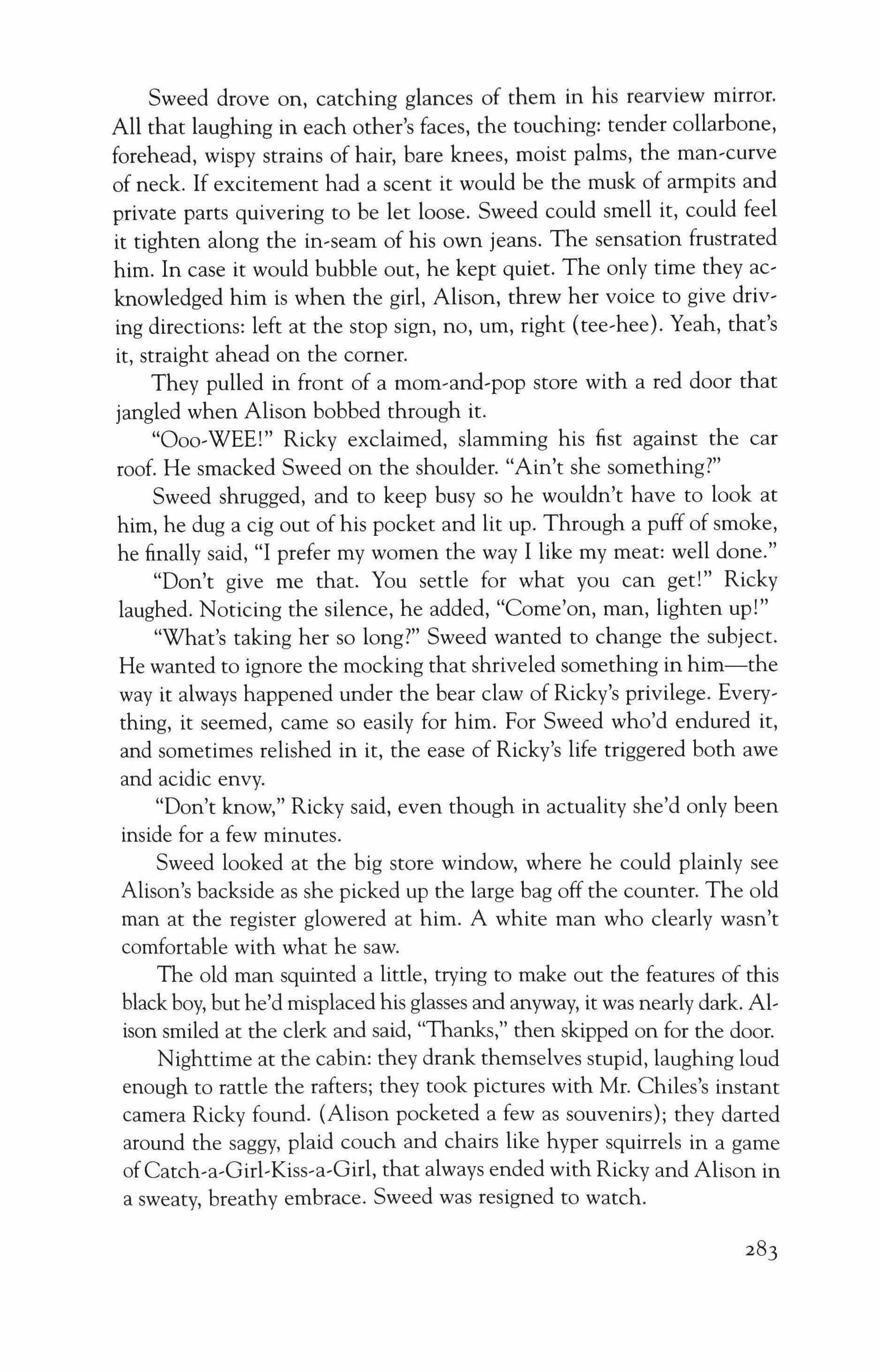
Sweed drove on, catching glances of them in his rearview mirror. All that laughing in each other's faces, the touching: tender collarbone, forehead, wispy strains of hair, bare knees, moist palms, the man-curve of neck. If excitement had a scent it would be the musk of armpits and private parts quivering to be let loose. Sweed could smell it, could feel it tighten along the in-seam of his own jeans. The sensation frustrated him. In case it would bubble out, he kept quiet. The only time they acknowledged him is when the girl, Alison, threw her voice to give driving directions: left at the stop sign, no, urn, right (tee-hee). Yeah, that's it, straight ahead on the corner.
They pulled in front of a mom-and-pop store with a red door that jangled when Alison bobbed through it.
"Ooo-WEE!" Ricky exclaimed, slamming his fist against the car roof. He smacked Sweed on the shoulder. "Ain't she something?"
Sweed shrugged, and to keep busy so he wouldn't have to look at him, he dug a cig out of his pocket and lit up. Through a puff of smoke, he finally said, "I prefer my women the way I like my meat: well done."
"Don't give me that. You settle for what you can get!" Ricky laughed. Noticing the silence, he added, "Come'on, man, lighten up!"
"What's taking her so long?" Sweed wanted to change the subject. He wanted to ignore the mocking that shriveled something in him-the way it always happened under the bear claw of Ricky's privilege. Everything, it seemed, came so easily for him. For Sweed who'd endured it, and sometimes relished in it, the ease of Ricky's life triggered both awe and acidic envy.
"Don't know," Ricky said, even though in actuality she'd only been inside for a few minutes.
Sweed looked at the big store window, where he could plainly see Alison's backside as she picked up the large bag off the counter. The old man at the register glowered at him. A white man who clearly wasn't comfortable with what he saw.
The old man squinted a little, trying to make out the features of this black boy, but he'd misplaced his glasses and anyway, it was nearly dark. Alison smiled at the clerk and said, "Thanks," then skipped on for the door.
Nighttime at the cabin: they drank themselves stupid, laughing loud enough to rattle the rafters; they took pictures with Mr. Chiles's instant camera Ricky found. (Alison pocketed a few as souvenirs); they darted around the saggy, plaid couch and chairs like hyper squirrels in a game ofCatch-a-Girl-Kiss-a-Girl, that always ended with Ricky and Alison in a sweaty, breathy embrace. Sweed was resigned to watch.
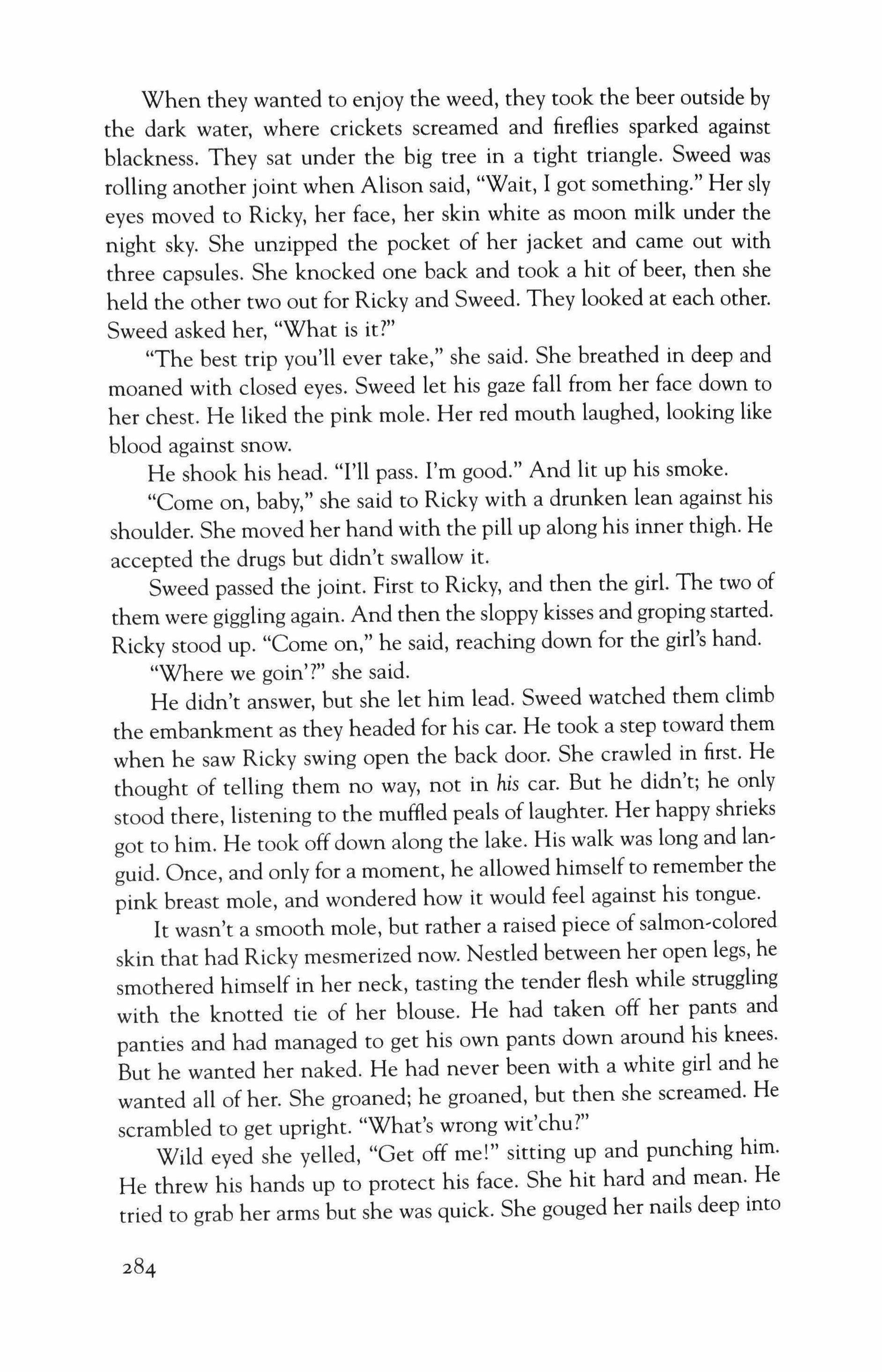
When they wanted to enjoy the weed, they took the beer outside by the dark water, where crickets screamed and fireflies sparked against blackness. They sat under the big tree in a tight triangle. Sweed was rolling another joint when Alison said, "Wait, I got something." Her sly eyes moved to Ricky, her face, her skin white as moon milk under the night sky. She unzipped the pocket of her jacket and came out with three capsules. She knocked one back and took a hit of beer, then she held the other two out for Ricky and Sweed. They looked at each other. Sweed asked her, "What is it?"
"The best trip you'll ever take," she said. She breathed in deep and moaned with closed eyes. Sweed let his gaze fall from her face down to her chest. He liked the pink mole. Her red mouth laughed, looking like blood against snow.
He shook his head. "I'll pass. I'm good." And lit up his smoke.
"Come on, baby," she said to Ricky with a drunken lean against his shoulder. She moved her hand with the pill up along his inner thigh. He accepted the drugs but didn't swallow it.
Sweed passed the joint. First to Ricky, and then the girl. The two of them were giggling again. And then the sloppy kisses and groping started. Ricky stood up. "Come on," he said, reaching down for the girl's hand.
"Where we goin'?" she said.
He didn't answer, but she let him lead. Sweed watched them climb the embankment as they headed for his car. He took a step toward them when he saw Ricky swing open the back door. She crawled in first. He thought of telling them no way, not in his car. But he didn't; he only stood there, listening to the muffled peals of laughter. Her happy shrieks got to him. He took off down along the lake. His walk was long and languid. Once, and only for a moment, he allowed himself to remember the pink breast mole, and wondered how it would feel against his tongue.
It wasn't a smooth mole, but rather a raised piece of salmon-colored skin that had Ricky mesmerized now. Nestled between her open legs, he smothered himself in her neck, tasting the tender flesh while struggling with the knotted tie of her blouse. He had taken off her pants and panties and had managed to get his own pants down around his knees. But he wanted her naked. He had never been with a white girl and he wanted all of her. She groaned; he groaned, but then she screamed. He scrambled to get upright. "What's wrong wit'chu?"
Wild eyed she yelled, "Get off me!" sitting up and punching him. He threw his hands up to protect his face. She hit hard and mean. He tried to grab her arms but she was quick. She gouged her nails deep into

his throat. He howled like a wounded animal and punched her. Her face exploded with blood, then out of nowhere she upped a razor and swiped at his mid-section, but only nicked him as he flattened himself against the door. He snatched at the knife, her hand, blood running down his own hand, and he wrestled her down, both leveled on the seat again. Grunting, sweating, snarling, he fought this girl with man-strength who shrieked like he was killing her. Their bodies writhing and twisting, she jerked her knee upward and he let out another hideous cry and fell back on the door that popped open, this time spilling him out onto the grass. She bolted from the other door screaming, "They're all over me! Get 'em off me!" Running headlong down the grassy slope for the lake, hitting and scratching, slicing herself with her own razor.
"Hey! Hey!" Ricky tussled with his pants to get them up while running after her.
Sweed turned and saw them-the white girl with crazy arms and Ricky chasing her. Sweed started running, too. The girl was already thrashing in the lake by the time he'd gotten close to Ricky; they both were breathing heavy, mouth and eyes stretched open. She fitfully made her way deeper into the lake. The moonlight glinted off the angry water, her screaming face glowing, and those arms that seemed to be struggling more than fighting now. The "No Swimming" sign was just a few yards away. Sweed stepped out of his shock and remembered the sign. "Get outta there! You can't swim in there!" They heard the gurgling sound. They saw her head bob above the water once with her arm straight out at them. But then she went down. Everything was still.
He looked at Ricky who just stared where the water had closed over. Sweed shook his arm. "Ricky? Hey, man."
Ricky blinked at him.
"We gotta call somebody," Sweed said. He was going for the car.
Ricky grabbed him from behind. "Wait."
Sweed looked at his bloody hand. "What the hell happened?"
"I don't know, man. The chick went crazy." Ricky started crying. "We were doing our thing, and then she starts screaming at me. Just crazy, man!"
"We can't fake like nothing happened."
"So what we gonna tell the cops, huh? We was getting high, man." Then he whispered, "I was with a white girl. You know they gonna say it was rape!"
Sweed saw the fear raging in the whites ofhis eyes. He looked at the cut on Ricky's shirt and the slice of blood.

"We gotta get outta here," Sweed said, "we gotta split now." He snatched a glance toward the street. He started running for the car, lurching up the grassy slope, Ricky keeping up behind him.
Sweed shot down the road, steering wheel clinched and pulse throbbing. Ricky wouldn't stop crying, hunched into his sniffles. Sweed couldn't take the noise. He got confused and wound up driving down the dark throat of tree-lined path. Sweat collected on his forehead, his upper lip.
"God, I didn't mean to do nothing wrong," Ricky said, as if talking to himself. "She just-"
"It's gonna be okay," Sweed interrupted, his voice thick and husky, more irritated than consoling. He swerved onto another path and soon found his way back toward the highway signs. That's when Ricky threw up.
"Shit, man!" Sweed yelled. He wiped his forehead; he felt the trickle of his own fear running slick and wet from his armpits. "Look in the glove box. I think there's some paper or something you can use to wipe that up."
The sour rank smell of hot vomit filled their space. "And open the window," he added.
"Sorry, man," Ricky sniveled, awkwardly groping with the slow movements of an old man. He pulled out a map and wadded it like a paper towel.
Sorry, Sweed repeated to himself. He grinded his angry teeth. He thought about the pathetic boy he used to hate.
Ricky's soft sobs broke the silence now.
Neither spoke until Sweed pulled up to Ricky's house. The lights were out, the quiet porch hidden by the night shadow of an elm tree.
Ricky unlocked his passenger door; he eyed his lap still wet with the remains of his nerves puked out and stinking. Then he turned to Sweed who silently stared at him. "Hey, man," Ricky said softly, "What we gonna do if the cops come after us?"
"We got outta there. Nobody saw," Sweed said.
"But how you know?" Ricky sniffled, wiping his nose on the back of his hand like somebody's kid.
Sweed didn't have an answer. And with that, Ricky went inside.
At home, Sweed parked near the slanted back stairs of their building. He got out and looked around the empty alley and up to the rear apartment windows, then he opened the back passenger door slowly. There they were: a tangled knot of girl pants and panties on the car floor. They had gotten buried in the mix of rags he used when fixing on

his car, his own sweatshirt jackets, discarded food wrappers, old papers of all kinds. He picked up the girl's things and peeled them apart. There was blood on the panties. Her big crochet bag was there, too. He pulled from it a tattered brown leather wallet. Inside was a student 1.0.: Alison Tucker, Gerald T. Holland High School, six dollars, a bus pass, and what he assumed to be a house key. His palms went damp and his heart raced when he fished out the photos they'd taken with Mr. Chiles's instant camera: he held the one of Alison and Ricky wrapped in a grinning hug. He quickly looked up and down the alley again as he stuffed these things under his 'Tshirt. He went straight to his room. For no reason he could tell you, he pulled out the tin lockbox from underneath his bed, the secret place usually reserved solely for his weed. For now though, he'd use the hiding place for something else. He took out the envelope of marijuana and then crammed the pants with its wallet and key, the soiled panties and the photos inside. He would pitch the purse.
Sweed and Ricky would not see each other for a few days. As a mat, ter of fact, Sweed hadn't touched his own car since that night. Maybe he'd hoped to convince himself that what happened in Indiana would simply go away. No, it wouldn't.
At first Mr. and Mrs. Tucker of Whiting, Indiana thought their daughter had run off again on account of the fight they had. She was always running off after the fights, but would usually show up in a day or so, at night, round about the time when she knew her daddy would be passed out drunk and wouldn't start in on her again. But this time, some, thing didn't feel right, her mama with her nervous fingers splitting the window blinds for her only wild weed to return. She never showed.
It was Mrs. Tucker who started phoning around first. No one had seen the girl. So Mr. Tucker put on a shirt with a collar, and he and his wife drove their truck down to the police station. Their daughter had been missing for three days by then. The cops told them they'd investigate. Word about it traveled lickety-split, like a crackling fire through tall weeds.
But it wasn't until Mr. McNeal saw the story on the TV news about the missing girl did it click for him what he'd seen. Now was it two no, four days ago when that girl came in and bought all sorts of junk at his store: potato chips, Twinkies, liquorish sticks, and Bazooka Joe bubble gum. Crazy kid, he remembered thinking. And now he recalled watching that dark Plymouth parked outside his store when the girl was there. A colored boy driving, but it had been too dark to make him out, even though Mr. McNeal knew the boy was staring back at him. And he

was pretty sure he saw somebody in the back seat, too. It was unsettling, the car idling with that boy casing his place. Moments before, he had not seen the girl when she'd gotten out of the car, so when she turned to leave, he called out to stop her. "Hey!" And louder still, "Hey!" But she'd already gone through the jingling door.
Mr. McNeal had pushed himself from behind the counter. He tried to hobble after the girl who had gotten into the backseat of the dangerous car with that boy. But the driver was too fast. Still though, Mr. McNeal was pretty certain the plates were from Illinois. This was the first break for the cops.
The news was picked up in Chicago. And late one evening when Sweed's M'dear fell asleep watching TV, the reporter made his announcement. Sweed was passing by on his way to the kitchen when he heard. He stopped cold; his heart thumped as he listened: Whiting police are investigating the disappearance of Alison Tucker, fourteenyears-old, last seen five days ago at McNeal's General Store around 8:00 P.M. She's described as fair-complexioned, blond, and approximately ninety pounds. She was wearing a blue jacket and tan pants. An eyewitness saw her get into the backseat of a dark Plymouth with white tails. The car has Illinois plates. The driver of the automobile was a Negro male, approximately twenty-years-old. If you have any information, please contact the Chicago Police Department. They are working in cooperation with Whiting officials.
Sweed felt for the sofa to collect himself. Fourteen? He looked over at M'dear sleeping in her wing chair, her wiry gray head flung back and snoring. Suddenly, the face of the old man at the general store in Whiting loomed at him.
He wondered if Ricky had heard. He needed to find out. He went to Ricky's place. Mrs. Chiles greeted him, all smiles with her muffin cheeks and protruding coffee-stained teeth. She still had on her dishwashing apron, wiping her palms against the apple pockets and telling Sweed, "Well, well, we haven't seen you in days. Come in. Ricky's in his room. He came down with something, it seems. He says he doesn't want his mama fussing around him. Maybe seeing you will do him some good." He nodded and was glad that she didn't try to make conversation like usual. Instead, she disappeared back into the kitchen. Sweed took the stairs by twos, like he always did, up to Ricky's room.
When Sweed saw him, he didn't have to ask. Ricky sat on his bedside, his face buried in his hands. He looked up like he'd been kicked in the gut and was trying to hold back the painful tears. Sweed closed

the door but didn't come any closer. "We gotta get our stories straight," he said.
Ricky shook his head, telling him, "I ain't going to jail. I can't go to jail, man." He did the sniveling thing.
"You need to hold it together." Sweed walked to him. "You can't go round crying. Guilty folks cry."
Ricky put his head down again. "Look at me," Sweed told him. He did. "If you crack, we both go down. If you play it cool, maybe this'll blow over. But we gotta be prepared."
Ricky walked to his window overlooking the backyard, now washed in moonlight. "I was thinking. I got this uncle in Florida His voice trailed off. He turned to Sweed. "They haven't found her," he whispered. "Folks could think maybe she just ran off some place. Right?"
Sweed got within inches of his face. "Like I said, we gotta be prepared. We never went up to the cabin. You hear? I had car trouble so we couldn't make the trip. You stayed over at my place. M'dear, she won't remember."
"What if they wanna see your car? What if they test it for fingerprints or something?"
Sweed took a step back, shifting his eyes. He hadn't thought about that.
"You gonna get rid of your car?" Ricky asked him. "You got to, man." "I can-Maybe I can drive it someplace. Keep it outta sight for awhile."
"And if they ask where it is? They'll find it, man. And if they doif they figure out you was lying-"
"Hey, I'm not the one who messed with the white girl."
"What? You wanna start pointing fingers? You think that's gonna matter to the cops, man?"
Sweed jabbed a finger at him. "You had to do it. Why her? Why you couldn't be satisfied with your own?"
"Don't lecture me. If you coulda, you woulda done the same," Ricky shot back, jutting an arrogant chin at him.
"This ain't about you being better than me. It's about you being stupid. Niggas get killed for less." Right then, Sweed was just as mad at himself as he was scared. Mad because he was the one stupid enough not to listen to his gut. For the last few days, he couldn't get out of his head all the things he should've said: Man, that's dangerous goods, let's drive on. Ricky, the pink ain't worth it. But he hadn't said any of those things, and now he wondered why. Maybe because he didn't want to look like the

punk. Or maybe because he could never admit that Ricky was right. The smell of Alison still trapped in his secret tin box beneath his bed.
"Look," Ricky said, holding out his palms, "I just I just can't go to jail, man. And I'm willing to do whatever it takes not to. My uncle in Florida, I know he'd let me crash there."
Sweed narrowed his eyes at him. "You'd split on me?"
Ricky let out a tired sigh, sitting on his bed again. "I'm going to college in a few weeks, man."
"So what's that supposed to mean? Your ass shouldn't do time because you're too important?"
"That ain't what I said."
"Yeah. Sure you didn't."
Ricky stood up to face him. "Don't look at me like that. I'm just talking about what I got to lose. Me. Personally." He patted his chest with an open palm, fingers splayed. "I wanna make something outta my life. My daddy expect me to be somebody."
"Not like the rest of us, huh?"
"What's your problem, man?"
"Nothing." Sweed looked away. He felt the smallness of his own existence and didn't want Ricky to see it so clearly in his eyes. The reality of it was stark in the face of his self-possessed friend. For Sweed, there would be no fleeing from the neighborhood of leaning houses, from the drunks passed out in doorways, sleeping in their own piss. A disdain for it all, loud and shrill, were in Ricky's words, whether or not he knew it. But it didn't matter. Sweed had heard it, felt it. He turned for the door.
"Hey," Ricky said softly, "the car, what are you gonna do, man?"
Sweed paused, angling his head just slightly. "Whatever it takes to look out for me."
The choice became clear in a matter of a few days. Even before they fished the body out of the water, the folks in Whiting had convinced themselves that a white girl who went missing in the company of a black boy could only mean one thing.
On that chilly 5:00 A.M. morning, with the sky still purple and bruised, an old man and his dog spotted the dirty blond hair floating among the kelp. He waded in to see if it was, in fact, what he thought. And being sure, he was so stunned he fell backwards into the water. Fitfully, he made his way out again and called the cops.
The squad cars and uniforms standing around the embankment got some attention, even at that hour. A few crept out of their houses to get

a better look, still wrapped in their robes and slippers; women in their hair nets; men in their undershirts, hair askew from the pillows they'd left behind. They kept their distance, whispering in tight clusters of two or three, stretching their necks as the uniforms positioned the body onto the gurney. They wanted to stake their morning gossip on the concreteness of features they expected to recognize. But that would not happen. Water swollen, her face had bloated like molded cauliflower; her skin was translucent as fish gills. The blue jacket told them it was her: Alison Tucker. And the triangle of yellow pubic hair screaming at them confirmed it was rape.
The murder-rape story sizzled and crackled through all of Lake County, and right into the headlines ofChicago newspapers and the TV. On the same day the evening broadcast carried the story, Sweed waited to make his move in the nighttime stillness.
He drove to a junkyard near the railroad tracks miles away from the neighborhood. He wanted to make sure the flames wouldn't be seen. With one swoop of his hand, the torch he'd lit caught onto the alcohol soaked seats.
He walked away and didn't look back. But then with a suddenness that stopped him cold, he realized all of his worries had not been left among the cinders. His head pulsed with a sharp ache; they'd left the camera on the dining table back at the cabin. Were there any pictures also in plain sight? He continued on, turning his collar up against the night chill riding through the vacant lot. He tried to replay the time they spent in the cabin. Distracted, his foot left the curb; the blare of a horn came rushing at him with fierce white headlights. He stumbled back onto the sidewalk. He couldn't be sure.
That last conversation with Ricky still burned in his throat like bile; they had not spoken since. But Sweed showed up at his place just the same, early the next morning. He only needed to mention the camera, the pictures, and they immediately began conspiring to return one last time to retrieve them.
They hustled all day to find a car they could borrow. Finally, one of Sweed's friends came through. But he couldn't get the guy's ride until his shift was over at the plant. By then, it was dusk. The Chrysler's dented passenger door couldn't open, and the car shuddered when you drove too fast, but it seemed steady enough to make the trip.
The two had little to say as they rolled along Highway 90. Ricky kept making this noise: unnh, rattling deep in his throat. Sweed cut an eye toward him. He was twisting the hairs at his temple. It was a nervous tic.

Fact was they were both scared. The tension fluttered low in Sweed's gut; his palms were slick, gliding along the steering wheel as he turned off for the Whiting exit.
He wondered, as he had sometimes over these many years, how the nighttime here could be so peaceful and so unsettling at the same time. In town now, they drove down the two-lane road heading toward the lake. Without streetlights, velvety darkness crept over the trees. They made a final tum onto a gravel path.
The last leg of the journey on this dusty trail seemed long with anxious anticipation. Finally, Sweed pulled into the driveway. Their headlights caught the front door and the small dark window. Neither spoke.
Inside the house, Ricky cut on the light. They both saw it, right there on the little round table tucked in the Lshaped nook of the living room: the camera. One photo. Ricky took three long strident steps and scooped up both while Sweed hung by the door. And then they were gone.
No sooner than they'd gotten outside, blinding headlights swallowed them. The cops. Sweed bolted for the driver's seat and Ricky pounced in alongside him, yelling at him to go. The screech of their tires, the cop lights bearing down hard behind them. They swerved onto the gravel path. The car trembled but kept moving. Ricky looked back, his eyes and mouth stretched open in silent terror. Sweed hunched forward, teeth gritted as he barreled down the road.
The light behind them grew brighter, filling up their car. Sweed could feel its heat. Sweat skittered down his forehead into his eyes. He tried blinking his vision clear. The car sputtered.
"Faster, man, drive faster!" Ricky shouted, tears in his voice.
"I'm trying, man, it's-it's this-" The steering wheel vibrated. The tremor moved through Sweed. The wheels wobbled. The front tires caught the edge of the road where the embankment slope was steep. He jerked to right the car. His heart thumped loud in his chest, in his ears. He blinked again, the sweat sliding onto his slack mouth, gone chalkydry. He tasted the saltiness, tasted his tears. The main road heading to the highway wasn't that far away now. Then BAM. They jerked forward. The cops slammed into them, riding their bumper.
"They running us off the road!" Ricky croaked. "Do something!"
"I'm trying."
Sweed barred down on the gas pedal. He gained an inch. BAM. His face flew forward from the impact. "Son of a-"
He floored it for another two inches. The car rattled. They both could smell the smoke. The main road was in view.
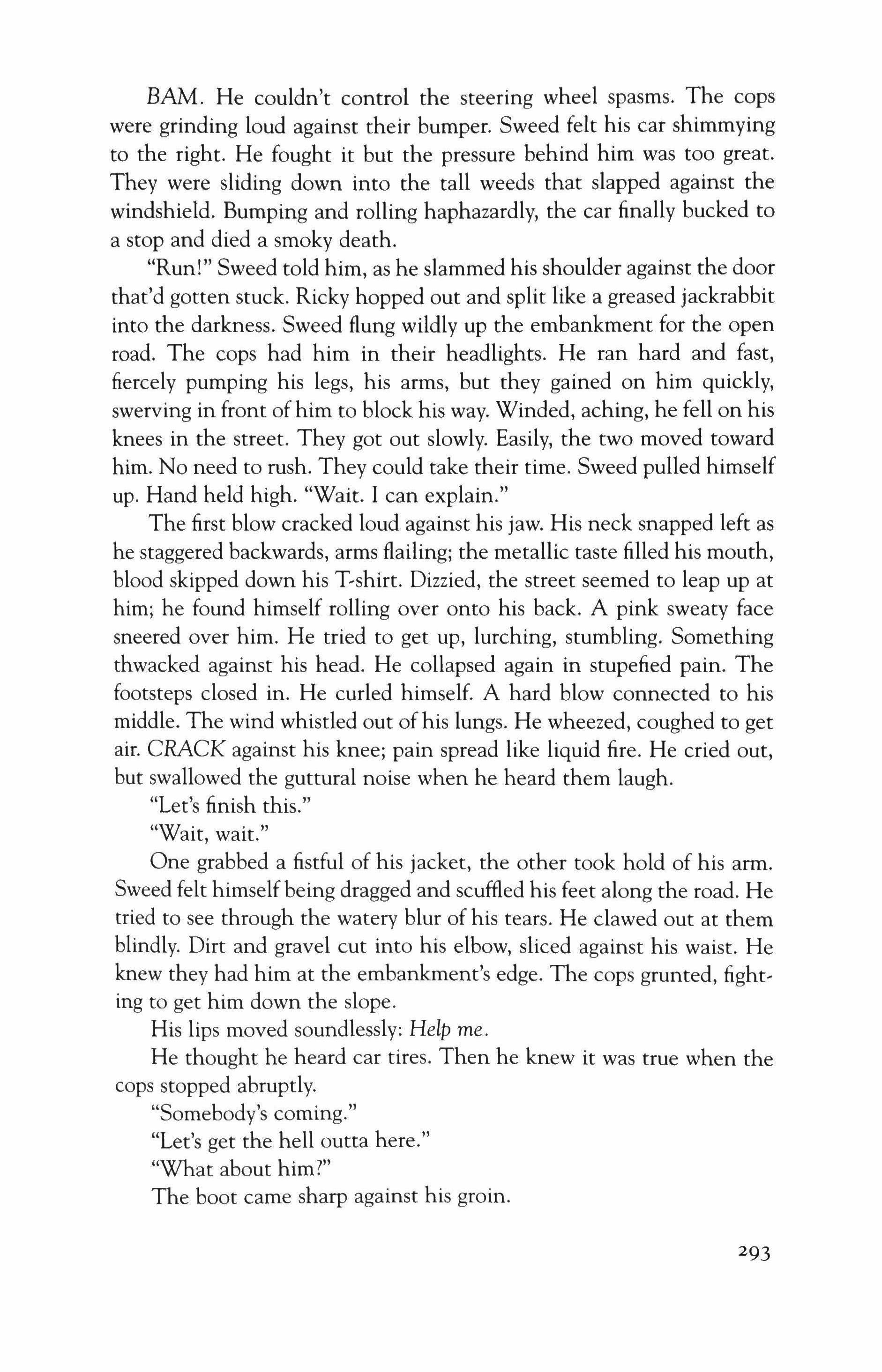
BAM. He couldn't control the steering wheel spasms. The cops were grinding loud against their bumper. Sweed felt his car shimmying to the right. He fought it but the pressure behind him was too great. They were sliding down into the tall weeds that slapped against the windshield. Bumping and rolling haphazardly, the car finally bucked to a stop and died a smoky death.
"Run!" Sweed told him, as he slammed his shoulder against the door that'd gotten stuck. Ricky hopped out and split like a greased jackrabbit into the darkness. Sweed flung wildly up the embankment for the open road. The cops had him in their headlights. He ran hard and fast, fiercely pumping his legs, his arms, but they gained on him quickly, swerving in front of him to block his way. Winded, aching, he fell on his knees in the street. They got out slowly. Easily, the two moved toward him. No need to rush. They could take their time. Sweed pulled himself up. Hand held high. "Wait. I can explain."
The first blow cracked loud against his jaw. His neck snapped left as he staggered backwards, arms flailing; the metallic taste filled his mouth, blood skipped down his 'Tshirt. Dizzied, the street seemed to leap up at him; he found himself rolling over onto his back. A pink sweaty face sneered over him. He tried to get up, lurching, stumbling. Something thwacked against his head. He collapsed again in stupefied pain. The footsteps closed in. He curled himself. A hard blow connected to his middle. The wind whistled out ofhis lungs. He wheezed, coughed to get air. CRACK against his knee; pain spread like liquid fire. He cried out, but swallowed the guttural noise when he heard them laugh.
"Let's finish this."
"Wait, wait."
One grabbed a fistful of his jacket, the other took hold of his arm. Sweed felt himselfbeing dragged and scuffled his feet along the road. He tried to see through the watery blur of his tears. He clawed out at them blindly. Dirt and gravel cut into his elbow, sliced against his waist. He knew they had him at the embankment's edge. The cops grunted, fight, ing to get him down the slope.
His lips moved soundlessly: Help me.
He thought he heard car tires. Then he knew it was true when the cops stopped abruptly.
"Somebody's coming."
"Let's get the hell outta here."
"What about him?"
The boot came sharp against his groin.

"Next time you won't be so lucky, boy. We gonna find you again."
He folded himself tight, holding onto his throbbing privates and crying; the ache went out in vibrations from between his legs and traveled throughout his limbs. Too weak, he couldn't fight it as they rolled him down into the weeds out ofsight. The rush of their footsteps moved away from him, as did the piercing cry of their tires.
He must have blacked out from the pain, because the next thing he remembered was the feel of a smooth hand rubbing his forehead. A woman's soft voice told him, "You're going to be okay."
His eyes fluttered open. It was a gentle face framed in a nun's habit. Was he dead? No, dead men don't feel pain. It pulsed everywhere.
"Can you walk?" she whispered.
He swallowed, but couldn't muster the strength to answer. He nodded his head slowly. The nun struggled to pull him up, bracing him by the waist, his arm draped over her shoulder. They crept, limped, to her truck idling not far from where the cops had sped away.
"I'm taking you to the hospital," she said firmly, but quietly.
He strained out the word, "No."
"You're hurt. You need a doctor," she told him.
He stopped shuffling along. Erecting himself a little, he looked at her. "No. Hospitals. They keep records, don't they?"
She pulled back just enough to look him squarely in the eye. Without speaking it, she connected all she had heard in the news--even the gossip that had made its way to the shelter-with this boy. "You," she breathed.
He read the lilt of surprise, the glint of fear in her pale blue eyes. "I need to get home," he said, almost pleading. And then tinged with defiance: "Don't judge what you don't know. I ain't done nothing wrong." His knee, nearly crippled with pain, gave out. She caught him before he hit the ground. "Where do you live?" she said.
She called a tow from a gas station to take his car away. And then she took Sweed away. That night when he left Whiting, crumpled in the front seat of the nun's pickup, he prayed for the first time-and the last.
The ride back home gave him time to think. Did Ricky make it out okay? What would happen tomorrow? He learned the first answer easily. A phone call to the Chileses' house the next day and he was told Ricky had caught the train the night before to visit his girl in Michigan. He had no plans of returning home any time soon. As for the answer to the second question, nothing happened. The cops never came after him about the dead girL And while Sweed nursed himself well again, Ricky
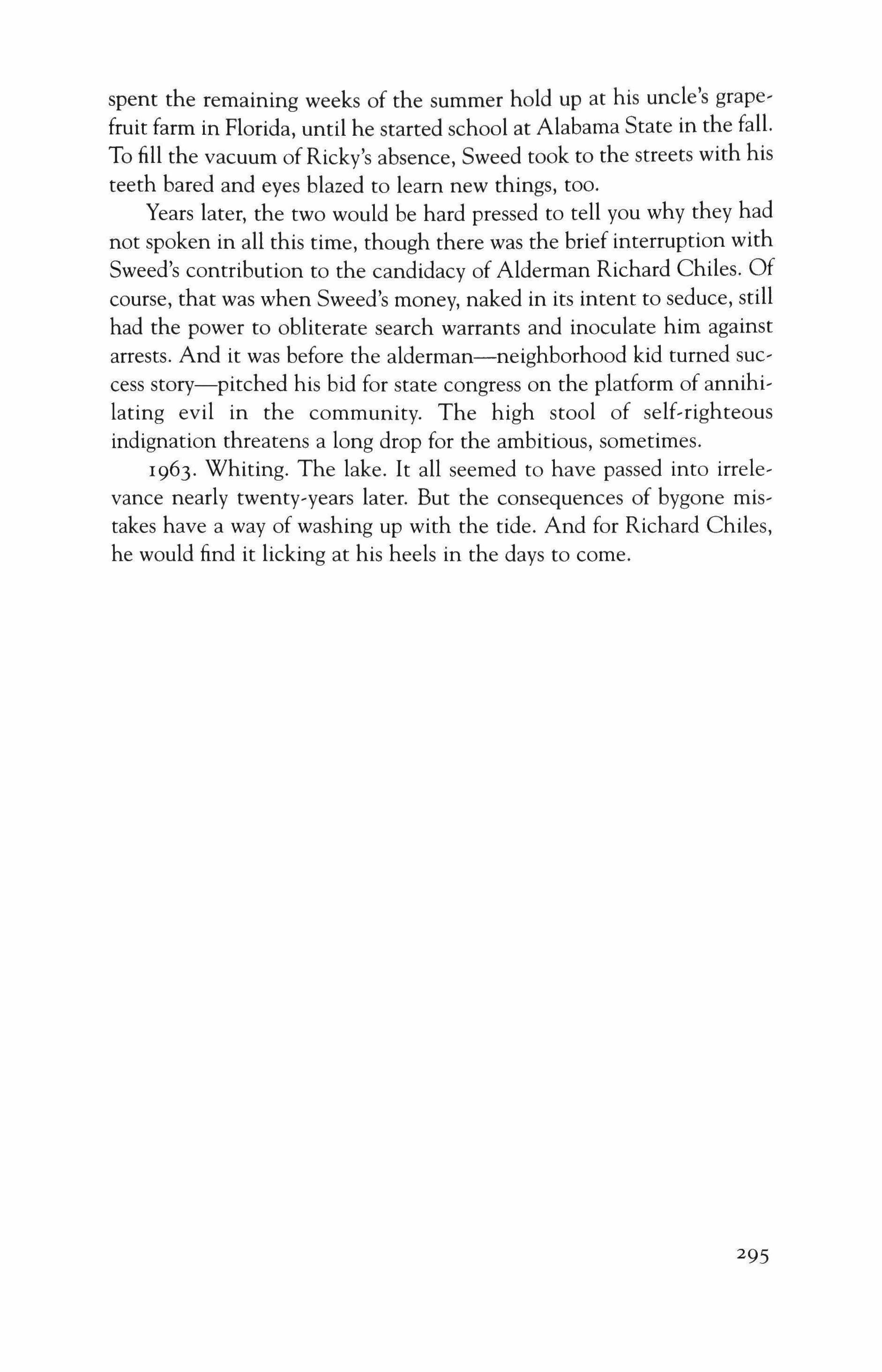
spent the remaining weeks of the summer hold up at his uncle's grapefruit farm in Florida, until he started school at Alabama State in the fall. To fill the vacuum of Ricky's absence, Sweed took to the streets with his teeth bared and eyes blazed to learn new things, too.
Years later, the two would be hard pressed to tell you why they had not spoken in all this time, though there was the brief interruption with Sweed's contribution to the candidacy of Alderman Richard Chiles. Of course, that was when Sweed's money, naked in its intent to seduce, still had the power to obliterate search warrants and inoculate him against arrests. And it was before the alderman-neighborhood kid turned success story-pitched his bid for state congress on the platform of annihilating evil in the community. The high stool of self-righteous indignation threatens a long drop for the ambitious, sometimes.
1963. Whiting. The lake. It all seemed to have passed into irrelevance nearly twenty-years later. But the consequences of bygone mistakes have a way of washing up with the tide. And for Richard Chiles, he would find it licking at his heels in the days to come.

I was leaned back on a folding chair drinking a can of Brahma, staring out at those vicious waves knocking the surfer boys and girls around like bobbers when I saw the Tattoo Guy, with his dreadlocks and his canvas bag of tricks, weaving down the white sand towards me. The beach was packed and covered with brightly colored blankets. Vendors strolled through the glare of the sun selling beer and popsicles, and of course, everywhere you looked, there were women. Perhaps you've heard that the women of Rio de Janeiro are the most beautiful in the world. It's true. I was in a heaven designed specifically for me. And I was miserable. Anxious, confused, and miserable. And now the Tattoo Guy had spotted me. Again.
The first time he crossed my path I had been there with Bea, my girl. After I left her in Chicago, I would call every night from my hotel room, and she would ask the same question, at first quivering with heartache and eventually more distant and demanding: "When are you coming home?" The answer was always the same: "When the job is done." She was fading. She was young, pretty, and alone back in Chicago. I figured I'd better fly her in to see me. But when I met her at the airport and saw the way her dark eyes could not meet mine, I knew. Just another thing I had lost to all of this.
Her last afternoon in Rio, we sat on that beach in mournful silence. The Tattoo Guy plopped down on his knees in the sand next to us and showed us his stencils. I didn't pay him much attention, but at some point he started dabbing a paint brush into a little bowl of henna, and
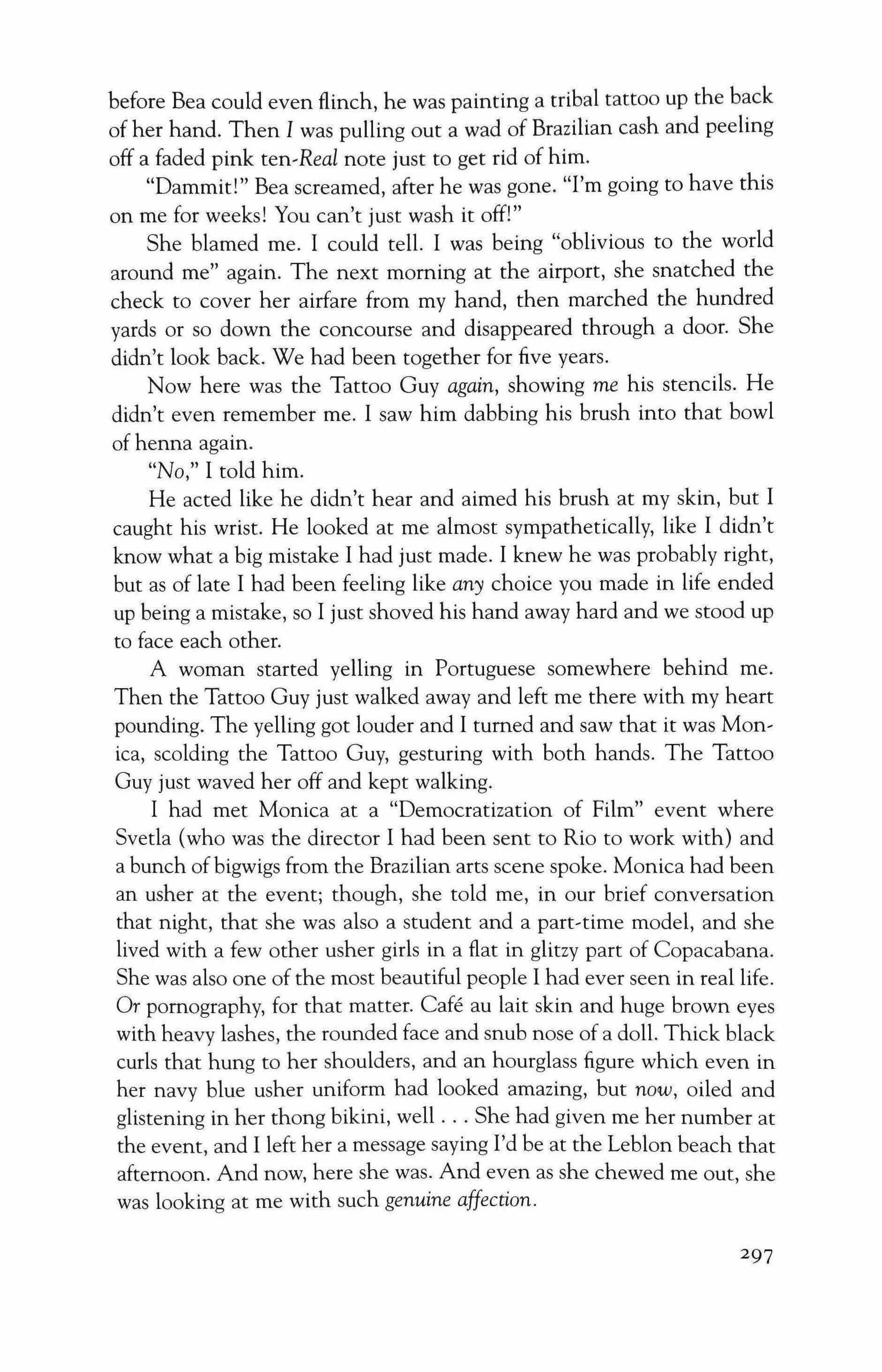
before Bea could even flinch, he was painting a tribal tattoo up the back of her hand. Then I was pulling out a wad of Brazilian cash and peeling off a faded pink ten-Real note just to get rid of him.
"Dammit!" Bea screamed, after he was gone. "I'm going to have this on me for weeks! You can't just wash it off!"
She blamed me. I could tell. I was being "oblivious to the world around me" again. The next morning at the airport, she snatched the check to cover her airfare from my hand, then marched the hundred yards or so down the concourse and disappeared through a door. She didn't look back. We had been together for five years.
Now here was the Tattoo Guy again, showing me his stencils. He didn't even remember me. I saw him dabbing his brush into that bowl of henna again.
"No," I told him.
He acted like he didn't hear and aimed his brush at my skin, but I caught his wrist. He looked at me almost sympathetically, like I didn't know what a big mistake I had just made. I knew he was probably right, but as of late I had been feeling like any choice you made in life ended up being a mistake, so I just shoved his hand away hard and we stood up to face each other.
A woman started yelling in Portuguese somewhere behind me. Then the Tattoo Guy just walked away and left me there with my heart pounding. The yelling got louder and I turned and saw that it was Monica, scolding the Tattoo Guy, gesturing with both hands. The Tattoo Guy just waved her off and kept walking.
I had met Monica at a "Democratization of Film" event where Svetla (who was the director I had been sent to Rio to work with) and a bunch of bigwigs from the Brazilian arts scene spoke. Monica had been an usher at the event; though, she told me, in our brief conversation that night, that she was also a student and a part-time model, and she lived with a few other usher girls in a flat in glitzy part of Copacabana. She was also one of the most beautiful people I had ever seen in real life. Or pornography, for that matter. Cafe au lait skin and huge brown eyes with heavy lashes, the rounded face and snub nose of a doll. Thick black curls that hung to her shoulders, and an hourglass figure which even in her navy blue usher uniform had looked amazing, but now, oiled and glistening in her thong bikini, well She had given me her number at the event, and I left her a message saying I'd be at the Leblon beach that afternoon. And now, here she was. And even as she chewed me out, she was looking at me with such genuine affection.
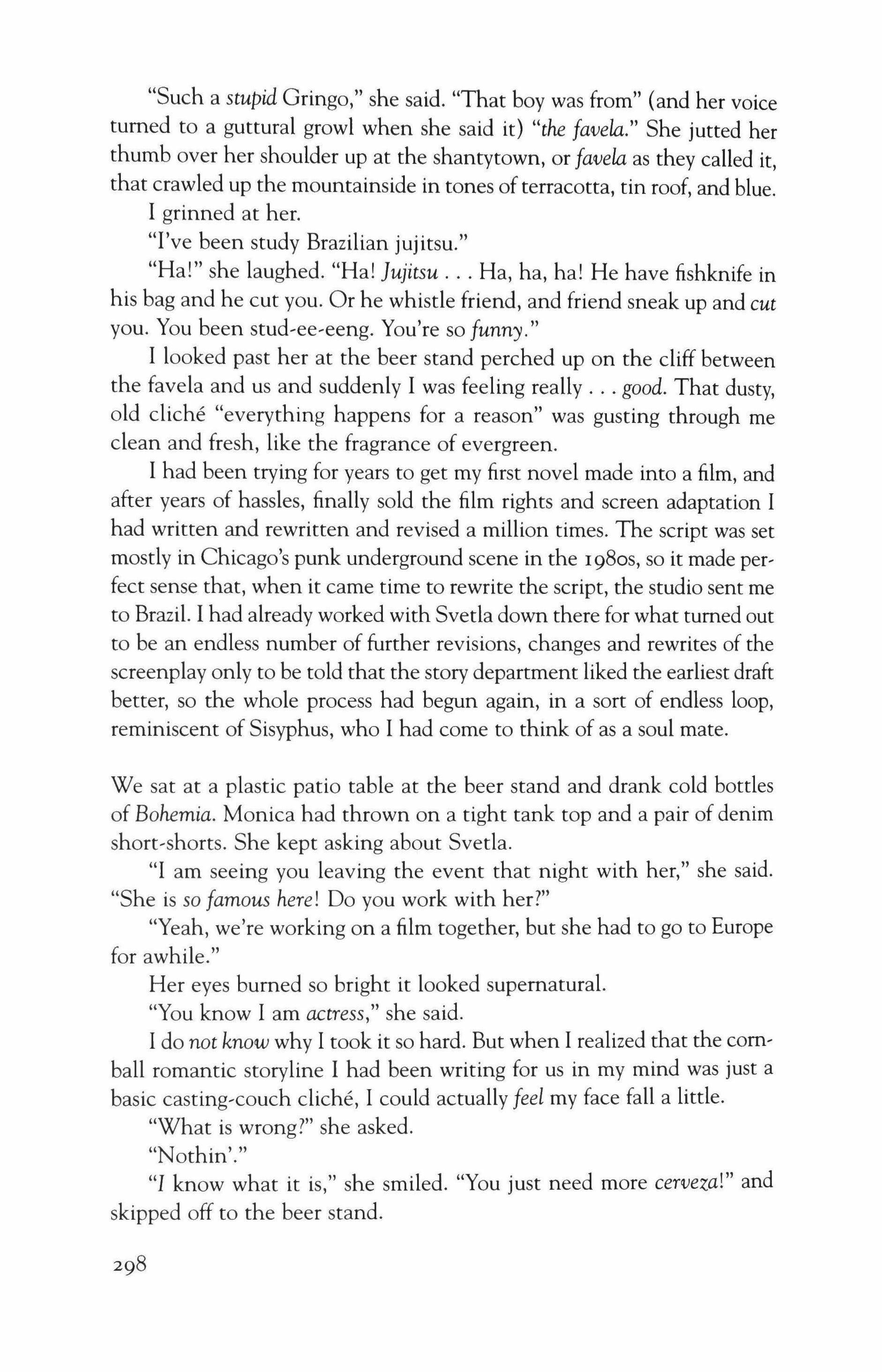
"Such a stupid Gringo," she said. "That boy was from" (and her voice turned to a guttural growl when she said it) "the favela." She jutted her thumb over her shoulder up at the shantytown, or favela as they called it, that crawled up the mountainside in tones of terracotta, tin roof, and blue.
I grinned at her.
"I've been study Brazilian jujitsu."
"Ha!" she laughed. "Hal Jujitsu Ha, ha, hat He have fishknife in his bag and he cut you. Or he whistle friend, and friend sneak up and cut you. You been stud-ee-eeng. You're so funny."
I looked past her at the beer stand perched up on the cliff between the favela and us and suddenly I was feeling really good. That dusty, old cliche "everything happens for a reason" was gusting through me clean and fresh, like the fragrance of evergreen.
I had been trying for years to get my first novel made into a film, and after years of hassles, finally sold the film rights and screen adaptation I had written and rewritten and revised a million times. The script was set mostly in Chicago's punk underground scene in the 1980s, so it made per' feet sense that, when it came time to rewrite the script, the studio sent me to Brazil. I had already worked with Svetla down there for what turned out to be an endless number of further revisions, changes and rewrites of the screenplay only to be told that the story department liked the earliest draft better, so the whole process had begun again, in a sort of endless loop, reminiscent of Sisyphus, who I had come to think of as a soul mate.
We sat at a plastic patio table at the beer stand and drank cold bottles of Bohemia. Monica had thrown on a tight tank top and a pair of denim short-shorts. She kept asking about Svetla.
"I am seeing you leaving the event that night with her," she said. "She is so famous here! Do you work with her?"
"Yeah, we're working on a film together, but she had to go to Europe for awhile."
Her eyes burned so bright it looked supernatural.
"You know I am actress," she said.
I do not know why I took it so hard. But when I realized that the com' ball romantic storyline I had been writing for us in my mind was just a basic casting-couch cliche, I could actually feel my face fall a little.
"What is wrong?" she asked.
"Nothin'."
"I know what it is," she smiled. "You just need more cerveza!" and skipped off to the beer stand.
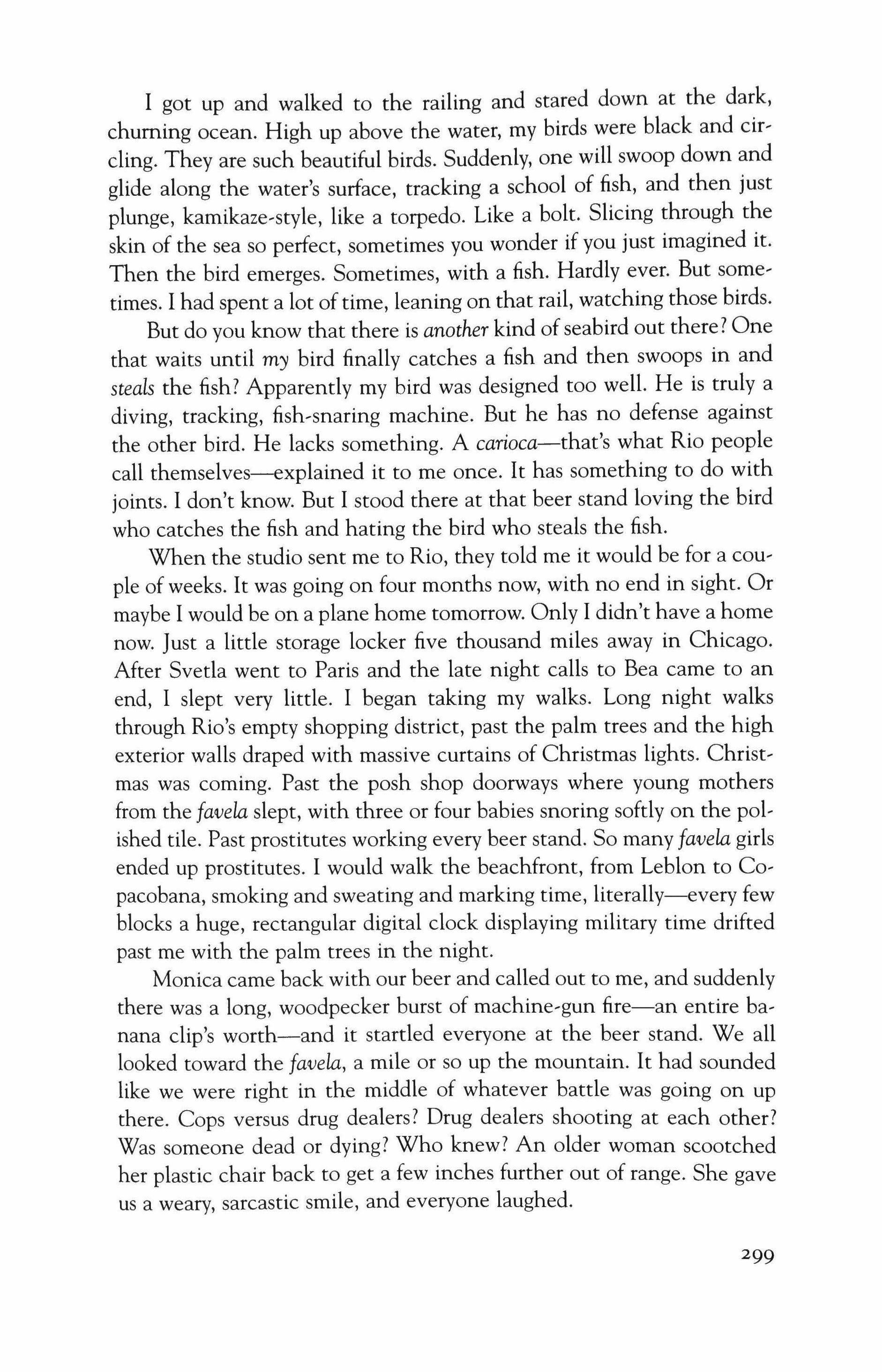
I got up and walked to the railing and stared down at the dark, churning ocean. High up above the water, my birds were black and circling. They are such beautiful birds. Suddenly, one will swoop down and glide along the water's surface, tracking a school of fish, and then just plunge, kamikaze-style, like a torpedo. Like a bolt. Slicing through the skin of the sea so perfect, sometimes you wonder if you just imagined it. Then the bird emerges. Sometimes, with a fish. Hardly ever. But sometimes. I had spent a lot of time, leaning on that rail, watching those birds. But do you know that there is another kind ofseabird out there? One that waits until my bird finally catches a fish and then swoops in and steals the fish? Apparently my bird was designed too well. He is truly a diving, tracking, fish-snaring machine. But he has no defense against the other bird. He lacks something. A carioca-that's what Rio people call themselves-explained it to me once. It has something to do with joints. I don't know. But I stood there at that beer stand loving the bird who catches the fish and hating the bird who steals the fish.
When the studio sent me to Rio, they told me it would be for a couple of weeks. It was going on four months now, with no end in sight. Or maybe I would be on a plane home tomorrow. Only I didn't have a home now. Just a little storage locker five thousand miles away in Chicago. After Svetla went to Paris and the late night calls to Bea came to an end, I slept very little. I began taking my walks. Long night walks through Rio's empty shopping district, past the palm trees and the high exterior walls draped with massive curtains of Christmas lights. Christmas was coming. Past the posh shop doorways where young mothers from the favela slept, with three or four babies snoring softly on the polished tile. Past prostitutes working every beer stand. So many favela girls ended up prostitutes. I would walk the beachfront, from Leblon to Copacobana, smoking and sweating and marking time, literally-every few blocks a huge, rectangular digital clock displaying military time drifted past me with the palm trees in the night.
Monica came back with our beer and called out to me, and suddenly there was a long, woodpecker burst of machine-gun fire-an entire banana clip's worth-and it startled everyone at the beer stand. We all looked toward the favela, a mile or so up the mountain. It had sounded like we were right in the middle of whatever battle was going on up there. Cops versus drug dealers? Drug dealers shooting at each other? Was someone dead or dying? Who knew? An older woman scootched her plastic chair back to get a few inches further out of range. She gave us a weary, sarcastic smile, and everyone laughed.
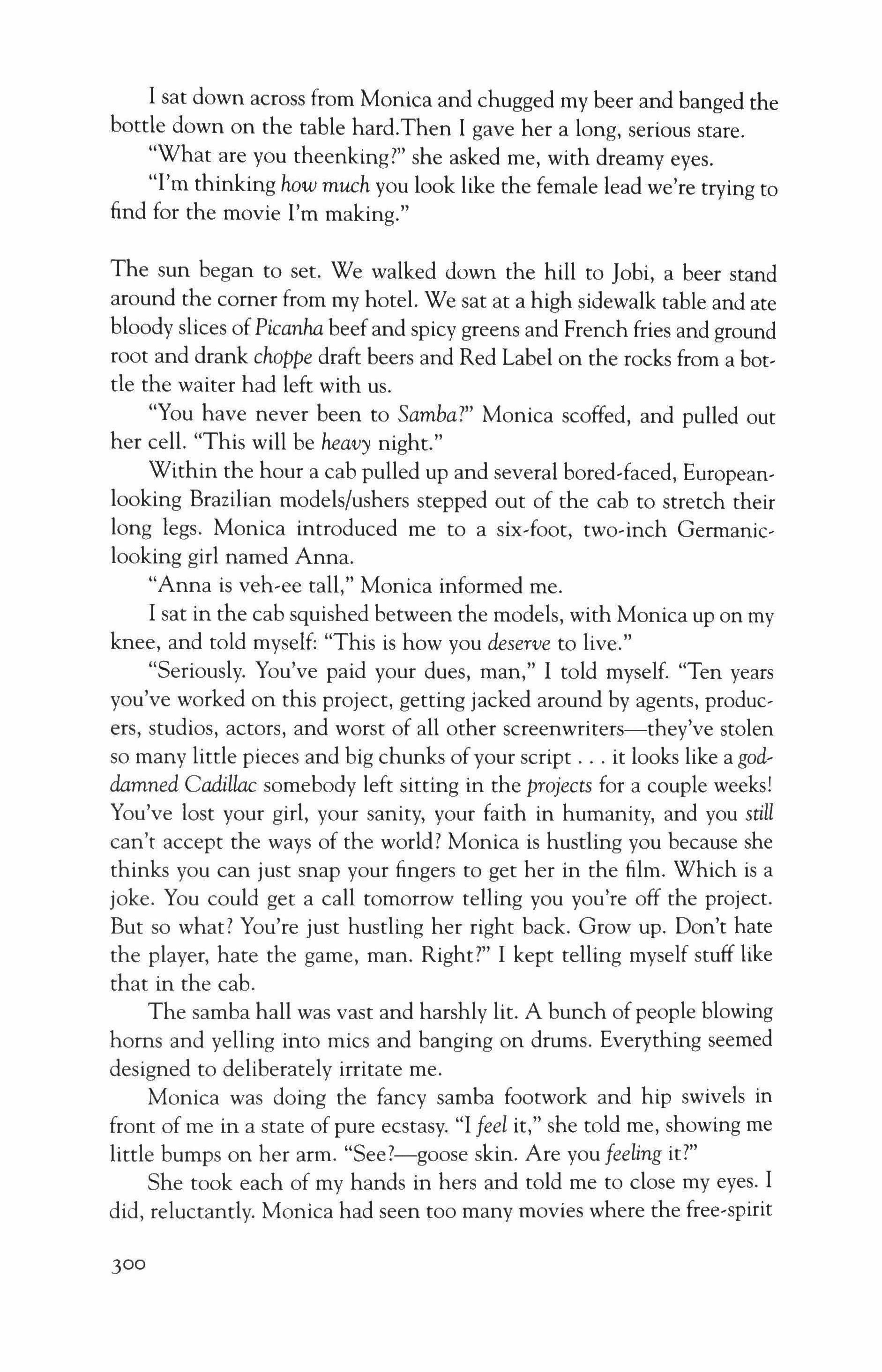
I sat down across from Monica and chugged my beer and banged the bottle down on the table hard.Then I gave her a long, serious stare.
"What are you theenking?" she asked me, with dreamy eyes.
"I'm thinking how much you look like the female lead we're trying to find for the movie I'm making."
The sun began to set. We walked down the hill to [obi, a beer stand around the comer from my hotel. We sat at a high sidewalk table and ate bloody slices ofPicanha beefand spicy greens and French fries and ground root and drank choppe draft beers and Red Label on the rocks from a bottle the waiter had left with us.
"You have never been to Samba?" Monica scoffed, and pulled out her cell. "This will be heavy night."
Within the hour a cab pulled up and several bored-faced, Europeanlooking Brazilian models/ushers stepped out of the cab to stretch their long legs. Monica introduced me to a six-foot, two-inch Germaniclooking girl named Anna.
"Anna is veh-ee tall," Monica informed me.
I sat in the cab squished between the models, with Monica up on my knee, and told myself: "This is how you deserve to live."
"Seriously. You've paid your dues, man," I told myself. "Ten years you've worked on this project, getting jacked around by agents, producers, studios, actors, and worst of all other screenwriters-they've stolen so many little pieces and big chunks of your script it looks like a goddamned Cadillac somebody left sitting in the projects for a couple weeks! You've lost your girl, your sanity, your faith in humanity, and you still can't accept the ways of the world? Monica is hustling you because she thinks you can just snap your fingers to get her in the film. Which is a joke. You could get a call tomorrow telling you you're off the project. But so what? You're just hustling her right back. Grow up. Don't hate the player, hate the game, man. Right?" I kept telling myself stuff like that in the cab.
The samba hall was vast and harshly lit. A bunch of people blowing horns and yelling into mics and banging on drums. Everything seemed designed to deliberately irritate me.
Monica was doing the fancy samba footwork and hip swivels in front of me in a state of pure ecstasy. "I feel it," she told me, showing me little bumps on her arm. "See?-goose skin. Are you feeling it?"
She took each of my hands in hers and told me to close my eyes. I did, reluctantly. Monica had seen too many movies where the free-spirit

Brazilian girl teaches the uptight Gringo to loosen up. "Now leeesen to the music do you feel it?" I waited a few seconds.
"Yeah. Yep. I feel it."
I opened my eyes and saw her staring at me with a desperate, pleading look.
"Can you hailp me? Please? I need it so bad."
I looked her dead in the eye.
"I will help you in any way I can."
She smiled.
"But you have to work on your American accent."
She actually stomped her foot.
"Antonio Banderas don't have to!"
I started to laugh, but then I saw that she was crying.
"Monica, what's the matter?"
"My mother she is die-ing."
"I'm so sorry, Monica."
"She is die-ing tonight."
"She's dying tonight?"
"Yes."
Goddamn, girl, I thought to myself. But I was more disappointed in myself. Did I look that green? I thought about asking her why we were out Samba dancing in the midst of such tragedy, but she had run away to the bathroom to wipe away her tears and fix her mascara.
The tall German Anna approached me grimfaced and said that Monica was drunk and that I needed to take her home. I nodded dutifully.
It wasn't until we were in the cab that I thought about the tense patterns of Monica's broken English and questioned her further and discovered that, in fact, her mother had died on this night, of cancer, one year ago. Maybe. I believed her mother was dead, anyway. I started to feel bad, so I drank deeply from the bottle ofJohnny Walker Monica had somehow snagged from the samba hall bar, and was so lost in thought and encroaching drunkenness that I didn't even pay much attention when Monica barked in Portuguese to the driver and the cab drove past Leblon and past the beer stand where we drank earlier and approached the police checkpoint at the entrance to the favela.
"Where are we going?" I asked, as policemen used their M-16s to wave us in. All she said was: "Better place."
The cab dropped us off next to a row of young men who sat on parked motorcycles. Monica said something to the men, and then we
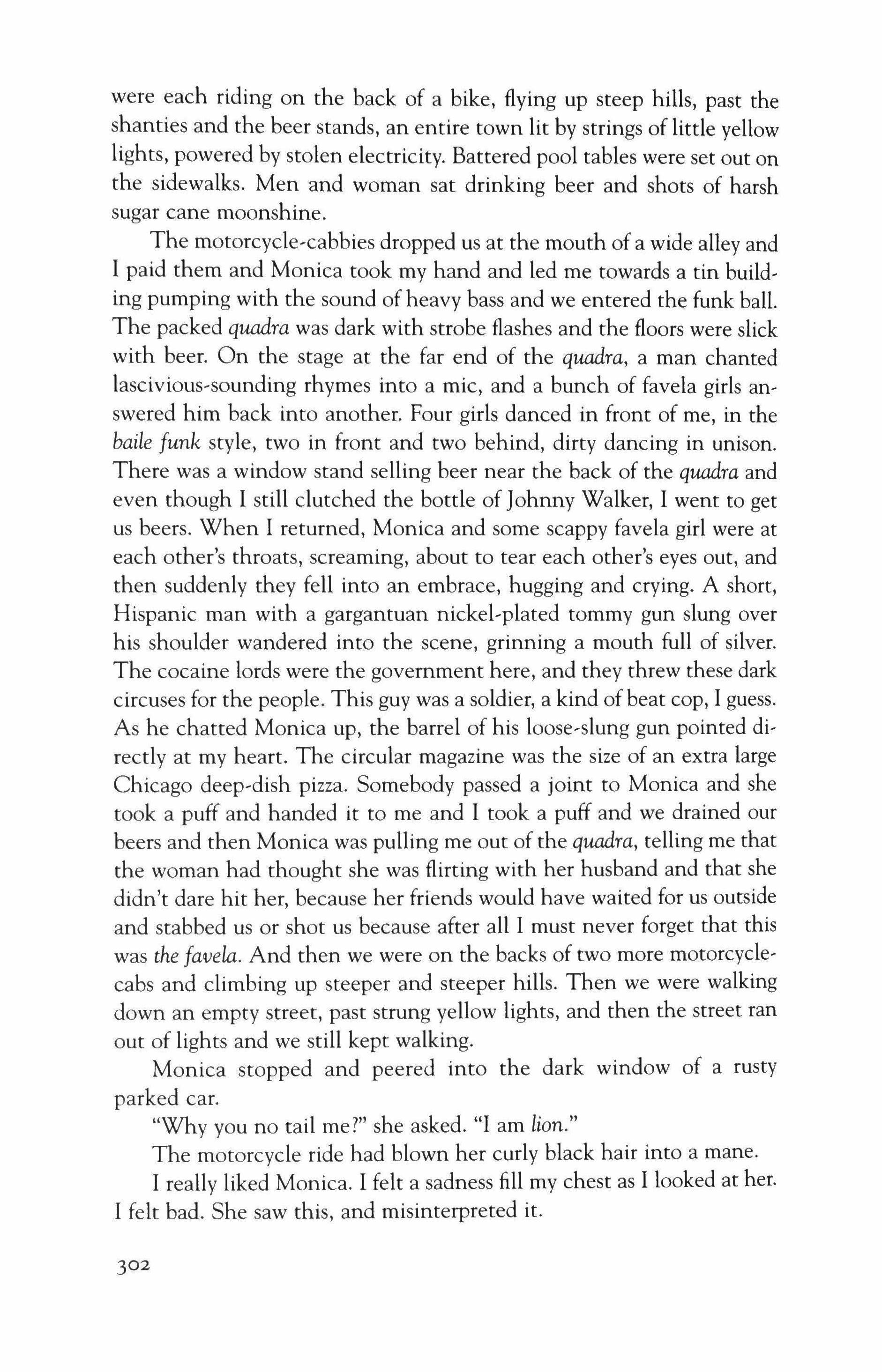
were each riding on the back of a bike, flying up steep hills, past the shanties and the beer stands, an entire town lit by strings of little yellow lights, powered by stolen electricity. Battered pool tables were set out on the sidewalks. Men and woman sat drinking beer and shots of harsh sugar cane moonshine.
The motorcycle-cabbies dropped us at the mouth of a wide alley and I paid them and Monica took my hand and led me towards a tin building pumping with the sound of heavy bass and we entered the funk ball. The packed quadra was dark with strobe flashes and the floors were slick with beer. On the stage at the far end of the quadra, a man chanted lascivious-sounding rhymes into a mic, and a bunch of favela girls answered him back into another. Four girls danced in front of me, in the baile funk style, two in front and two behind, dirty dancing in unison. There was a window stand selling beer near the back of the quadra and even though I still clutched the bottle of Johnny Walker, I went to get us beers. When I returned, Monica and some scappy favela girl were at each other's throats, screaming, about to tear each other's eyes out, and then suddenly they fell into an embrace, hugging and crying. A short, Hispanic man with a gargantuan nickel-plated tommy gun slung over his shoulder wandered into the scene, grinning a mouth full of silver. The cocaine lords were the government here, and they threw these dark circuses for the people. This guy was a soldier, a kind of beat cop, I guess. As he chatted Monica up, the barrel of his loose-slung gun pointed directly at my heart. The circular magazine was the size of an extra large Chicago deep-dish pizza. Somebody passed a joint to Monica and she took a puff and handed it to me and I took a puff and we drained our beers and then Monica was pulling me out of the quadra, telling me that the woman had thought she was flirting with her husband and that she didn't dare hit her, because her friends would have waited for us outside and stabbed us or shot us because after all I must never forget that this was the favela. And then we were on the backs of two more motorcyclecabs and climbing up steeper and steeper hills. Then we were walking down an empty street, past strung yellow lights, and then the street ran out of lights and we still kept walking.
Monica stopped and peered into the dark window of a rusty parked car.
"Why you no tail me?" she asked. "I am lion."
The motorcycle ride had blown her curly black hair into a mane. I really liked Monica. I felt a sadness fill my chest as I looked at her. I felt bad. She saw this, and misinterpreted it.

She took my hand in hers and raised my fingers up to her hair.
"Feel," she said. "Baaa."
I squinted at her.
"Baaa Baaaaaaaaaa She was bleating like a lamb. "See? Is very soff."
It was very soft.
We kissed. Then she pulled back and looked at me with doubt and hope.
"Can you really hailp me? I would do anything."
I didn't answer her. All I could think was: "Anything?"
She took my hand and we turned into a labyrinth of corridors and walked up narrow concrete steps, up and up, turning endless comers, and then down some concrete steps and then up some more and finally we were knocking on a shanty door. A little, beige-skinned girl, maybe ten or twelve, opened the door. She wore a homemade T,shirt dress with one shoulder strap, and she greeted me with the polite, remote, dignified repose of a tiny ballerina. Monica and I followed her into a little kitchen, with peeling linoleum floors and a mildewed 3,0 poster of Pope John Paul II thumbtacked to the wall. We sat at a folding table as the little girl glided to the ancient icebox and removed a plastic pitcher of water. She set two disposable plastic cups in front of us, and poured. A very old, black woman walked by the doorway and paused.
Monica nodded at her.
"My grammother."
Her grandmother smiled at Monica and gave me the warm eyes of a hospitable Brazilian. Then her eyes shifted sharply to the little girl, who was putting away the pitcher of water. "Just checking," those eyes seemed to say, "to see if you are still carrying yourself with the dignified repose of a tiny ballerina." Then the grandmother walked out of sight and the little girl began to sweep the floor with an old, wooden broom that dwarfed her.
I looked at the table. Huge tears were falling on the table.
"Monica Monica, what's the matter?"
"I am already telling you," she said quietly. "My mother. She is dying here. Tonight."
I squeezed her hand and there was only the dry sound of the broom. Before we left she put a faded green and pink and tan roll of Brazil, ian currency into a mason jar on a rusting set of steel shelves in the cor, ner of the kitchen. And I began to fully piece things together. Though she lived in Copacabana now, with those girls, this was her home. It isn't

romanticization to say that she had grown up on the meanest streets in the world. It is statistical fact. Now her mother was dead, there was no man, and she was the sole means of support for the old woman, and the wonderful, little girl.
I looked at Monica as we walked down the concrete steps again, and I do not think it was just my conscience or the weed playing tricks on me when I began to see how similar she looked in the face to the baby who had haunted me since my second week in Rio.
I had been sitting at a table at the juice stand around the comer from my hotel, thus far entirely oblivious to the spirit or aesthetic of this city. I sat there in the tropical heat in combat boots and tight blue jeans and a black T�shirt and reading Nausea by [can-Paul Sartre and drinking hot espresso and chain-smoking. Though I lived two blocks from the beach, I had not yet even seen it. I looked up from my book and saw an ambulatory collectible doll toddling towards me, a chocolate cherub, a baby girl just old enough to walk comfortably by herself, with a suntinted head of ringlets falling down her back like a rain of Krugerrands. She was smiling at me as she stopped at my table and opened her mouth and pointed to it. Behind her on the sidewalk stood an ashen-skinned tiny strip of a boy, maybe seven, watching closely. I gave her a twentyReal bill and went back to my book. Ten minutes later, she reappeared, eating a pastry ball ofpau du queijo. She approached me as if to whisper something, and when I leaned down to listen, she kissed me on the cheek. As she walked away, her brother, who was now eating a cheese sandwich, gave me a significant look, along with the thumbs-up sign. The thumbs-up sign is very big in Rio. It's like one, big, neverending Mentos commercial down there. It can mean any number of positive things, but in this particular case it was clear: the kid was telling me: "You're one of the good guys."
As far as Monica was concerned: I had made my decision. I was not going to see this through. She thought I could help her, and I let her think it. But I couldn't help her. I couldn't even help myself. If I could have helped her, I would have. I would have rather helped her than slept with her right then. But I couldn't help her. All I could do was not go through with my plans to take advantage of her. So that's what I did. I guess I could have articulated my position to her. But no words were coming, so instead I drank more and utilized an old skill of mine-I deliberately acted like an ass. When she leaned into me as we walked down the concrete steps out of the twisting, turning, shanty labyrinth, I acted oblivious.
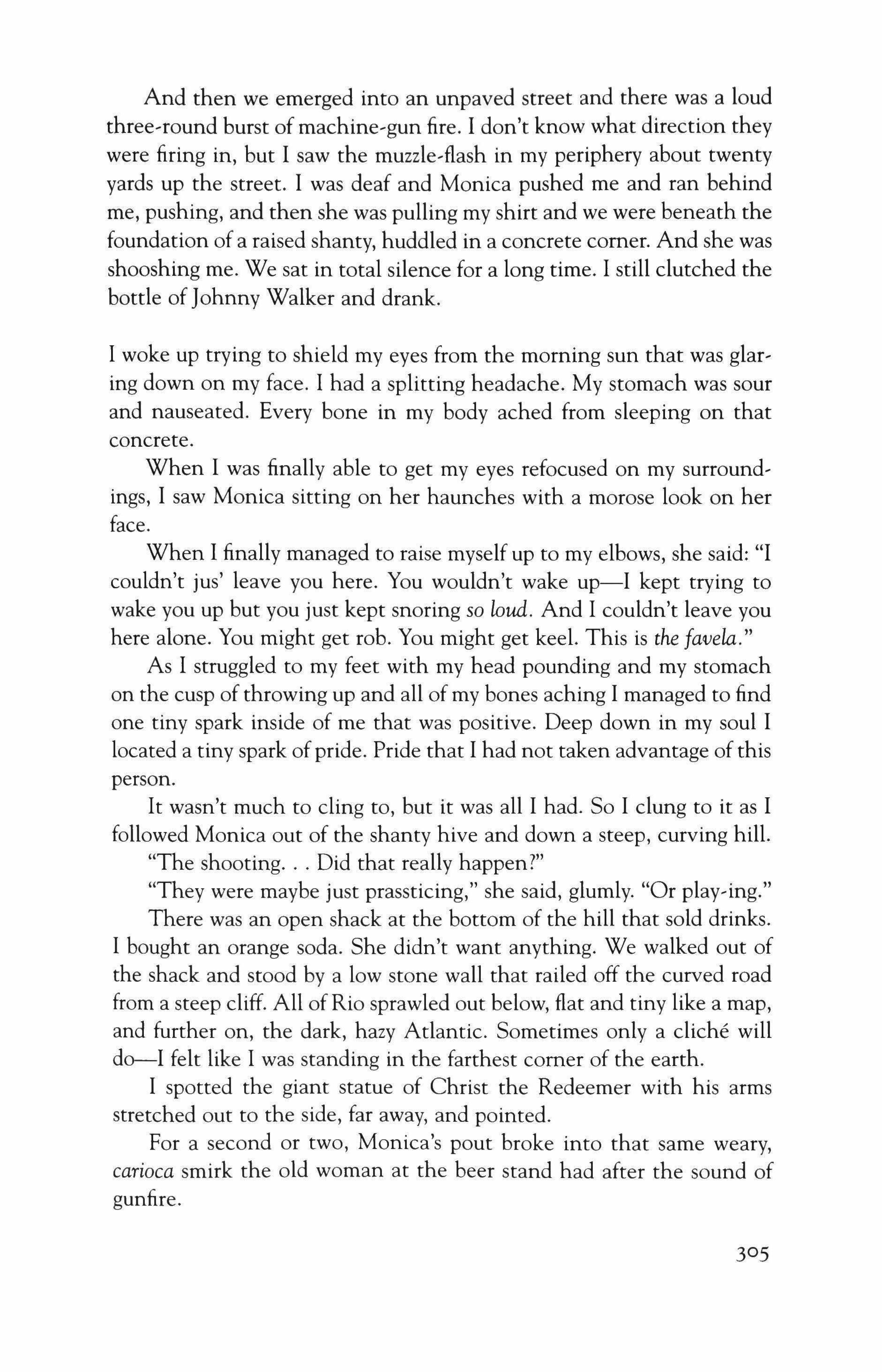
And then we emerged into an unpaved street and there was a loud three-round burst of machine-gun fire. I don't know what direction they were firing in, but I saw the muzzle'flash in my periphery about twenty yards up the street. I was deaf and Monica pushed me and ran behind me, pushing, and then she was pulling my shirt and we were beneath the foundation of a raised shanty, huddled in a concrete corner. And she was shooshing me. We sat in total silence for a long time. I still clutched the bottle of Johnny Walker and drank.
I woke up trying to shield my eyes from the morning sun that was glaring down on my face. I had a splitting headache. My stomach was sour and nauseated. Every bone in my body ached from sleeping on that concrete.
When I was finally able to get my eyes refocused on my surround, ings, I saw Monica sitting on her haunches with a morose look on her face.
When I finally managed to raise myself up to my elbows, she said: "I couldn't jus' leave you here. You wouldn't wake up-I kept trying to wake you up but you just kept snoring so loud. And I couldn't leave you here alone. You might get rob. You might get keel. This is the favela."
As I struggled to my feet with my head pounding and my stomach on the cusp of throwing up and all of my bones aching I managed to find one tiny spark inside of me that was positive. Deep down in my soul I located a tiny spark ofpride. Pride that I had not taken advantage of this person.
It wasn't much to cling to, but it was all I had. So I clung to it as I followed Monica out of the shanty hive and down a steep, curving hill.
"The shooting Did that really happen?"
"They were maybe just prassticing," she said, glumly. "Or play-ing."
There was an open shack at the bottom of the hill that sold drinks. I bought an orange soda. She didn't want anything. We walked out of the shack and stood by a low stone wall that railed off the curved road from a steep cliff. All of Rio sprawled out below, flat and tiny like a map, and further on, the dark, hazy Atlantic. Sometimes only a cliche will do-I felt like I was standing in the farthest comer of the earth.
I spotted the giant statue of Christ the Redeemer with his arms stretched out to the side, far away, and pointed.
For a second or two, Monica's pout broke into that same weary, carioca smirk the old woman at the beer stand had after the sound of gunfire.
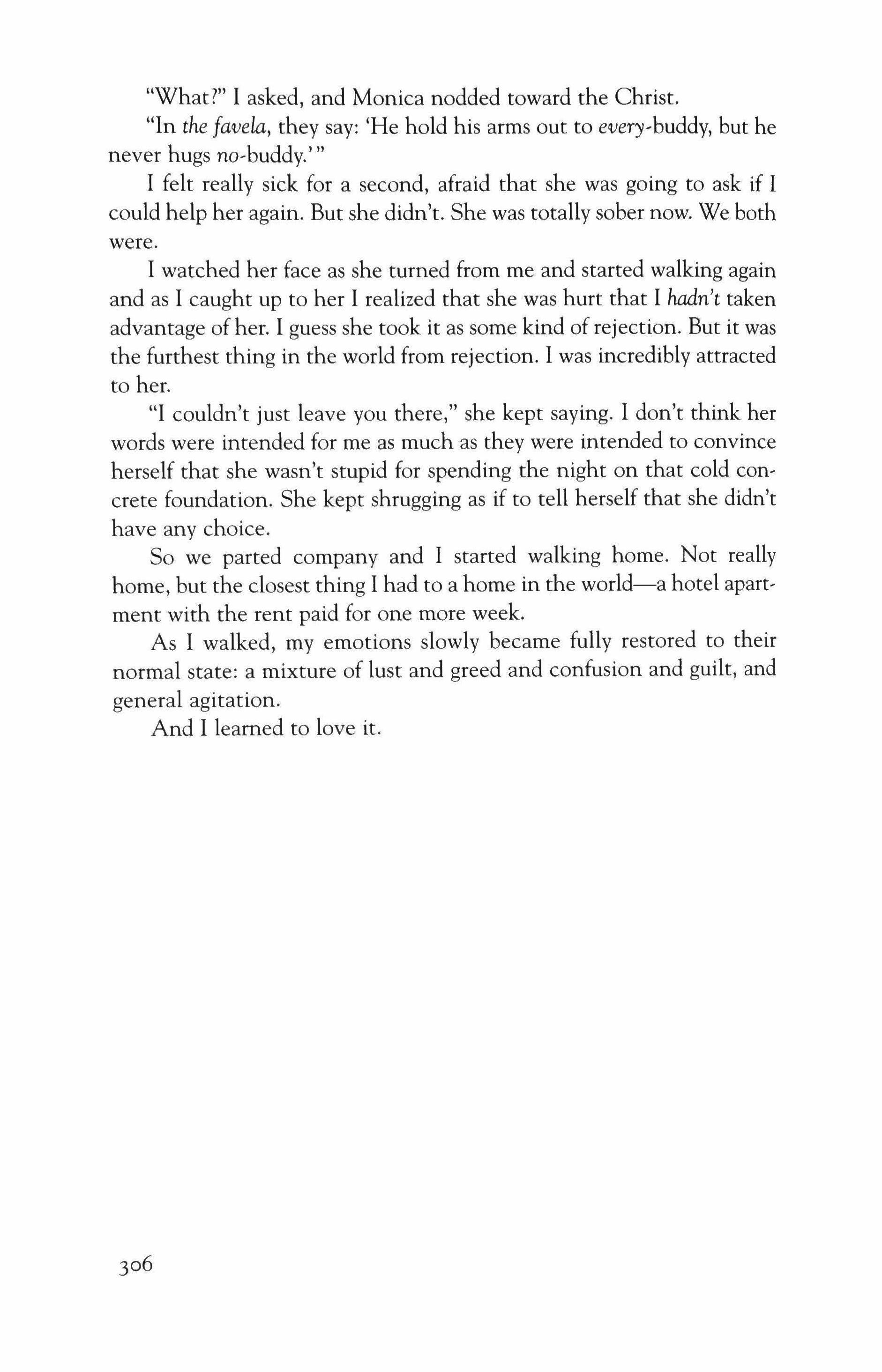
"What?" I asked, and Monica nodded toward the Christ.
"In the favela, they say: 'He hold his arms out to every-buddy, but he never hugs no-buddy.'"
I felt really sick for a second, afraid that she was going to ask if I could help her again. But she didn't. She was totally sober now. We both were.
I watched her face as she turned from me and started walking again and as I caught up to her I realized that she was hurt that I hadn't taken advantage of her. I guess she took it as some kind of rejection. But it was the furthest thing in the world from rejection. I was incredibly attracted to her.
"I couldn't just leave you there," she kept saying. I don't think her words were intended for me as much as they were intended to convince herself that she wasn't stupid for spending the night on that cold concrete foundation. She kept shrugging as if to tell herself that she didn't have any choice.
So we parted company and I started walking home. Not really home, but the closest thing I had to a home in the world-a hotel apartment with the rent paid for one more week.
As I walked, my emotions slowly became fully restored to their normal state: a mixture of lust and greed and confusion and guilt, and general agitation. And I learned to love it.
Gina B. Nahai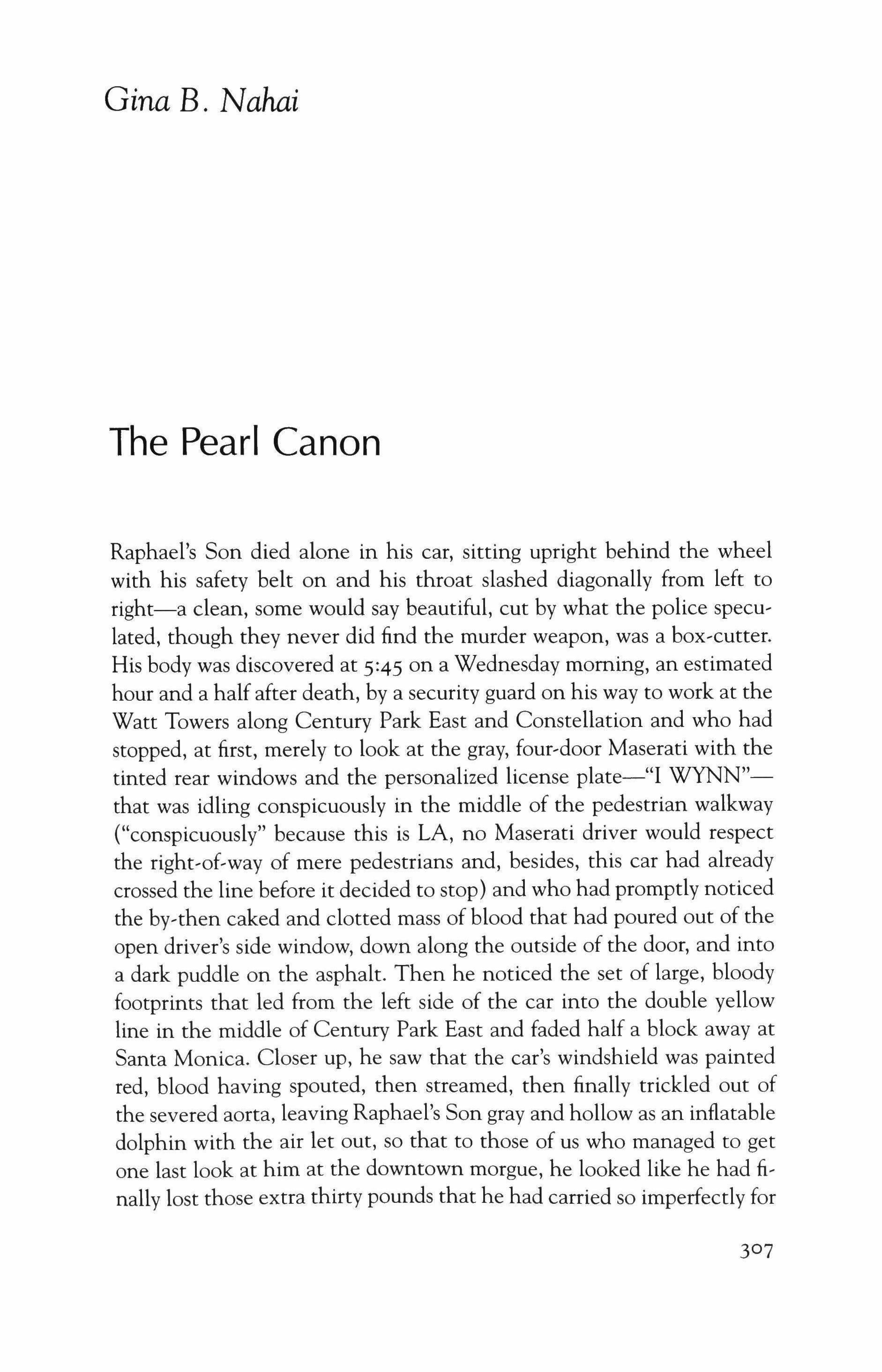
Raphael's Son died alone in his car, sitting upright behind the wheel with his safety belt on and his throat slashed diagonally from left to right-a clean, some would say beautiful, cut by what the police speculated, though they never did find the murder weapon, was a box-cutter. His body was discovered at 5:45 on a Wednesday morning, an estimated hour and a halfafter death, by a security guard on his way to work at the Watt Towers along Century Park East and Constellation and who had stopped, at first, merely to look at the gray, four-door Maserati with the tinted rear windows and the personalized license plate-"I WYNN"that was idling conspicuously in the middle of the pedestrian walkway ("conspicuously" because this is LA, no Maserati driver would respect the right-of-way of mere pedestrians and, besides, this car had already crossed the line before it decided to stop) and who had promptly noticed the by-then caked and clotted mass of blood that had poured out of the open driver's side window, down along the outside of the door, and into a dark puddle on the asphalt. Then he noticed the set of large, bloody footprints that led from the left side of the car into the double yellow line in the middle of Century Park East and faded half a block away at Santa Monica. Closer up, he saw that the car's windshield was painted red, blood having spouted, then streamed, then finally trickled out of the severed aorta, leaving Raphael's Son gray and hollow as an inflatable dolphin with the air let out, so that to those of us who managed to get one last look at him at the downtown morgue, he looked like he had finally lost those extra thirty pounds that he had carried so imperfectly for
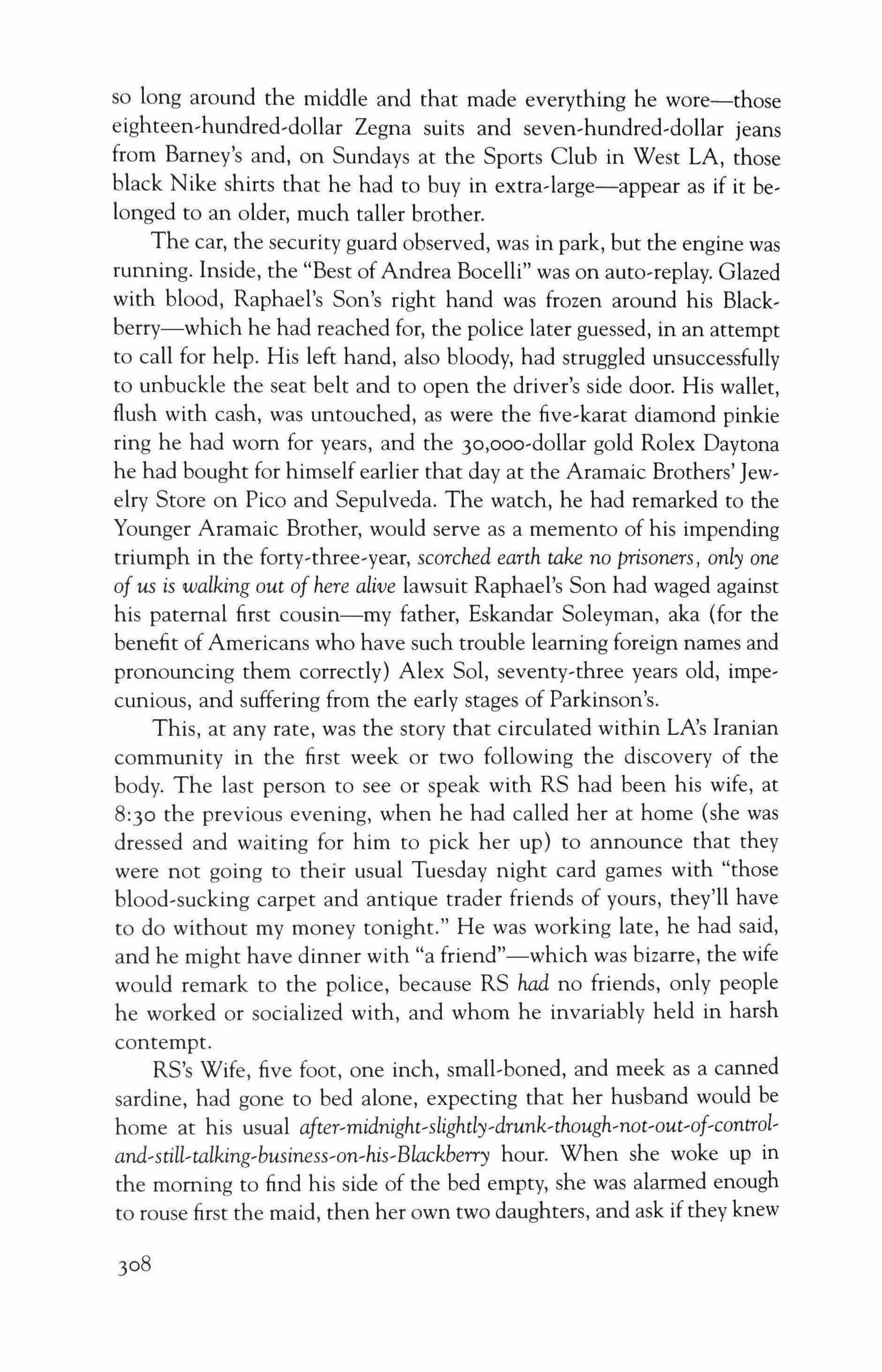
so long around the middle and that made everything he wore-those eighteen-hundred-dollar Zegna suits and seven-hundred-dollar jeans from Barney's and, on Sundays at the Sports Club in West LA, those black Nike shirts that he had to buy in extra-large-appear as if it belonged to an older, much taller brother.
The car, the security guard observed, was in park, but the engine was running. Inside, the "Best ofAndrea Bocelli" was on auto-replay. Glazed with blood, Raphael's Son's right hand was frozen around his Blackberry-which he had reached for, the police later guessed, in an attempt to call for help. His left hand, also bloody, had struggled unsuccessfully to unbuckle the seat belt and to open the driver's side door. His wallet, flush with cash, was untouched, as were the five-karat diamond pinkie ring he had worn for years, and the jo.ooo-dollar gold Rolex Daytona he had bought for himself earlier that day at the Aramaic Brothers' Jewelry Store on Pico and Sepulveda. The watch, he had remarked to the Younger Aramaic Brother, would serve as a memento of his impending triumph in the forty-three-year, scorched earth take no prisoners, only one of us is walking out of here alive lawsuit Raphael's Son had waged against his paternal first cousin-my father, Eskandar Soleyman, aka (for the benefit of Americans who have such trouble learning foreign names and pronouncing them correctly) Alex Sol, seventy-three years old, impecunious, and suffering from the early stages of Parkinson's.
This, at any rate, was the story that circulated within LA's Iranian community in the first week or two following the discovery of the body. The last person to see or speak with RS had been his wife, at 8:30 the previous evening, when he had called her at home (she was dressed and waiting for him to pick her up) to announce that they were not going to their usual Tuesday night card games with "those blood-sucking carpet and antique trader friends of yours, they'll have to do without my money tonight." He was working late, he had said, and he might have dinner with "a friend"-which was bizarre, the wife would remark to the police, because RS had no friends, only people he worked or socialized with, and whom he invariably held in harsh contempt.
RS's Wife, five foot, one inch, small-boned, and meek as a canned sardine, had gone to bed alone, expecting that her husband would be home at his usual after-midnighHlightly-drunk-though-not-out-ofcontroland-still-talking-business-on-his-Blackberry hour. When she woke up in the morning to find his side of the bed empty, she was alarmed enough to rouse first the maid, then her own two daughters, and ask if they knew
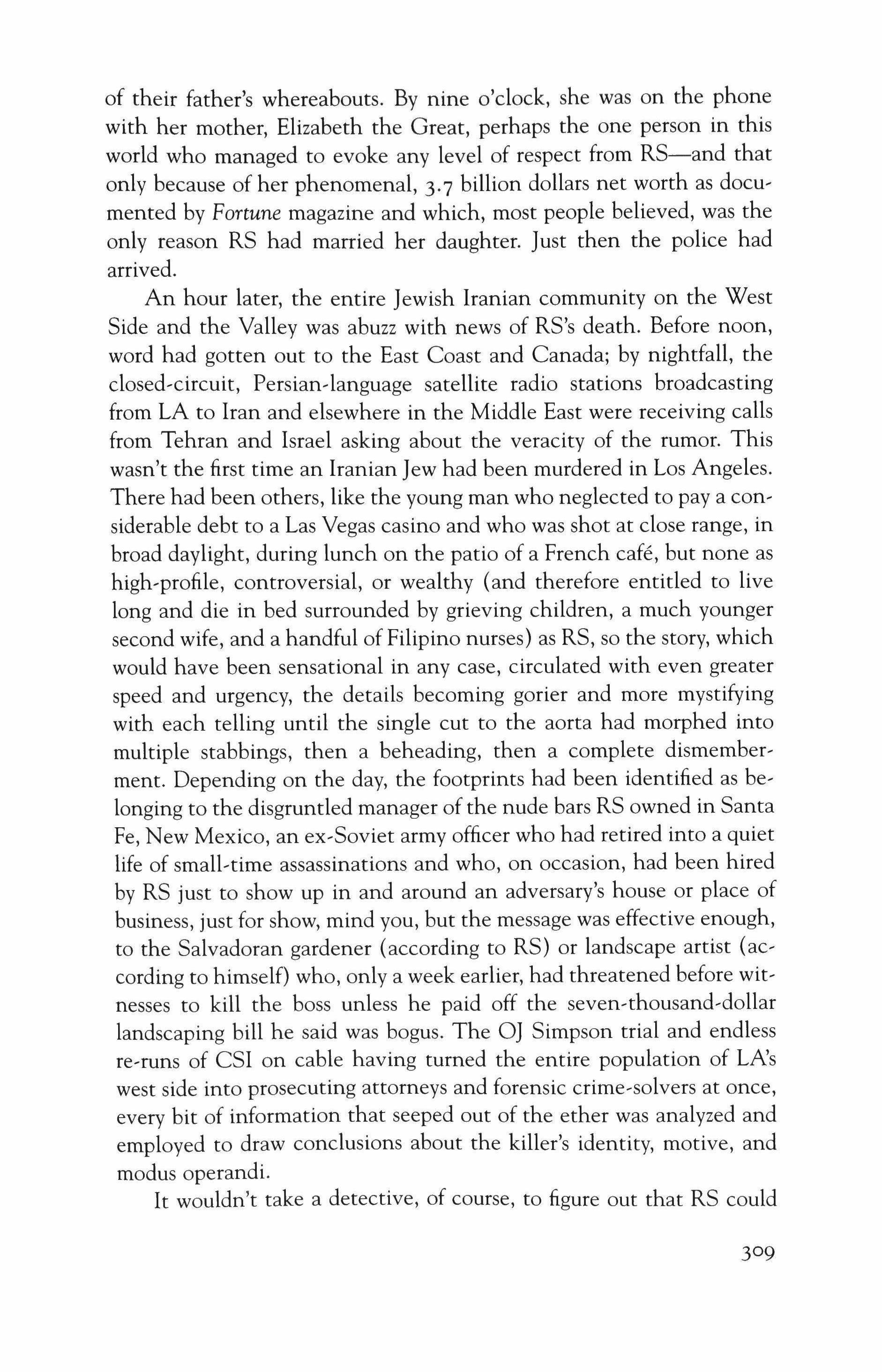
of their father's whereabouts. By nine o'clock, she was on the phone with her mother, Elizabeth the Great, perhaps the one person in this world who managed to evoke any level of respect from RS-and that only because of her phenomenal, 3.7 billion dollars net worth as documented by Fortune magazine and which, most people believed, was the only reason RS had married her daughter. Just then the police had arrived.
An hour later, the entire Jewish Iranian community on the West Side and the Valley was abuzz with news of RS's death. Before noon, word had gotten out to the East Coast and Canada; by nightfall, the closed-circuit, Persian-language satellite radio stations broadcasting from LA to Iran and elsewhere in the Middle East were receiving calls from Tehran and Israel asking about the veracity of the rumor. This wasn't the first time an Iranian Jew had been murdered in Los Angeles. There had been others, like the young man who neglected to pay a considerable debt to a Las Vegas casino and who was shot at close range, in broad daylight, during lunch on the patio of a French cafe, but none as high-profile, controversial, or wealthy (and therefore entitled to live long and die in bed surrounded by grieving children, a much younger second wife, and a handful of Filipino nurses) as RS, so the story, which would have been sensational in any case, circulated with even greater speed and urgency, the details becoming gorier and more mystifying with each telling until the single cut to the aorta had morphed into multiple stabbings, then a beheading, then a complete dismemberment. Depending on the day, the footprints had been identified as belonging to the disgruntled manager of the nude bars RS owned in Santa Fe, New Mexico, an ex-Soviet army officer who had retired into a quiet life of small-time assassinations and who, on occasion, had been hired by RS just to show up in and around an adversary's house or place of business, just for show, mind you, but the message was effective enough, to the Salvadoran gardener (according to RS) or landscape artist (according to himself) who, only a week earlier, had threatened before witnesses to kill the boss unless he paid off the seven-thousand-dollar landscaping bill he said was bogus. The OJ Simpson trial and endless re-runs of CSI on cable having turned the entire population of LA's west side into prosecuting attorneys and forensic crime-solvers at once, every bit of information that seeped out of the ether was analyzed and employed to draw conclusions about the killer's identity, motive, and modus operandi.
It wouldn't take a detective, of course, to figure out that RS could

have been murdered by any number of bitter enemies he had made with such effortlessness in his forty-seven years-from former business partners who had sued him for breach of contract, to squatters in the downtown roach motels that he bought and tore down, to his own wife who, the detective who broke the news to her noted, received word of his passing with a mixture of absolute astonishment-that someone as fierce and unkind as he would have been erased from the world so quickly and with so little trouble-and total confusion, but with almost no apparent grief. The only person who had ever liked RS, people said, was his mother, but she was dead and buried in Israel and besides, she was no queen of congeniality herself.
He was so friendless and unpopular, in fact, that even though he had hundreds of blood relatives living in LA and hundreds more on the East Coast and in Europe, not one of them offered to help his wife collect his body from the police or arrange for funeral services, the shiva, or the memoriaI that must be held on day seven. Elizabeth the Great did send her personal assistant to accompany her daughter when she went to the morgue on day one to identify RS, but she insisted that someone from our side of the family (that was me) had to sign the legal papers presented by the coroner's office and take legal possession of the corpse and hand it over to the undertakers. After that, the burial, and the thousand other tasks that are usually performed by a dead person's blood next-ofkin, fell into the reluctant hands of Elizabeth's crew of secretaries and Queen's maids and ladies in waiting.
The deceased's wife and daughters, understandably, were excused from such duties so they could abandon themselves to their grief or, equally important to some, to a quiet but urgent search for a month's worth of flattering new black designer outfits (it's a small community you can't wear the same thing twice people will think you're cheap, or poor, they'll stop inviting you to their parties and won't come to yours and before you know it, you're no one, a non-entity, your daughters won't marry the right people and your sons will take Asian wives). This was certainly true in the case of RS's two daughters, Sara and Saba, who, to put it tactfully, could use all the help they might get from all the clothes on all three floors at Neiman Marcus and from its shoe department as well, provided they could tolerate the intolerable sales people acted as if the future of the free world hinged on whether a customer maxed out her Neiman's Card on every visit-"they're short and ugly; they took after your side of the family" is how the girls' father had put it

to their mother more than once, blaming her for his daughters' homeliness as he did for everything else that went wrong in his domestic life.
Which isn't to say that being universally disliked had any bearing on the turnout at RS's funeral and shiva: in LA, you can be a proven thief and an ex-convict, a pedophile, a person of infinite moral turpitude; or you can be Mother Theresa twice over. The one with the most money gets the respect. This is true as much among the natives-third or fourth generation Americans, most of whom are transplants from some other part of the country-as it is for us immigrants, so let's hold the holier than thou fire for now, though I realize how badly some West' side natives would like to find reasons to justify their barely disguised antipathy toward Iranians.
Elizabeth the Great's $3.7 billion, therefore, went a long way in according her son-in-law the kind of send-off some heads of state would be envious of, but so did his own not'inconsiderable fortune, his family his, tory, and the extraordinary circumstances of his death. His funeral, de' layed by the county's insistence on doing an autopsy, was among the most anticipated events of the decade, drawing no fewer that two thou, sand men and women, and giving the native mourners at Forest Lawn (for whom a dozen people constitutes a crowd) yet another occasion to complain that Iranians are cliquey and loud and disruptive.
Among the attendees were dozens of "suspects" who had been tried and convicted by the rumor mill in the preceding days, and who were on their best behavior, going out of their way to show "genuine" grief about RS and making sure they shook as many hands and kissed as many faces as possible. There was also the pair of American police detectives assigned to the case and who had become a fixture in the community since immediately after the killing. The man, detective O'Briant, was tall, fair skinned, and very obviously gentile. His partner was a small, Jewish, very angry woman with stringy bleached hair and a face that had aged beyond its years. Between the two of them, she was clearly the "bad" cop. She didn't like Iranians and didn't mind if they knew it, would love to send one of more of them to jail and throwaway the key. She introduced herself as Detective Shelly, no first name no handshake no let's try and pretend we're all on the side of truth and justice necessary. She and O'Briant had interviewed dozens of people already, some twice and three times and (to their astonishment) been treated by everyone like old friends, invited into homes and welcomed in shops and offices, offered tea, coffee, or a shot of Tequila if that suits you better and please,
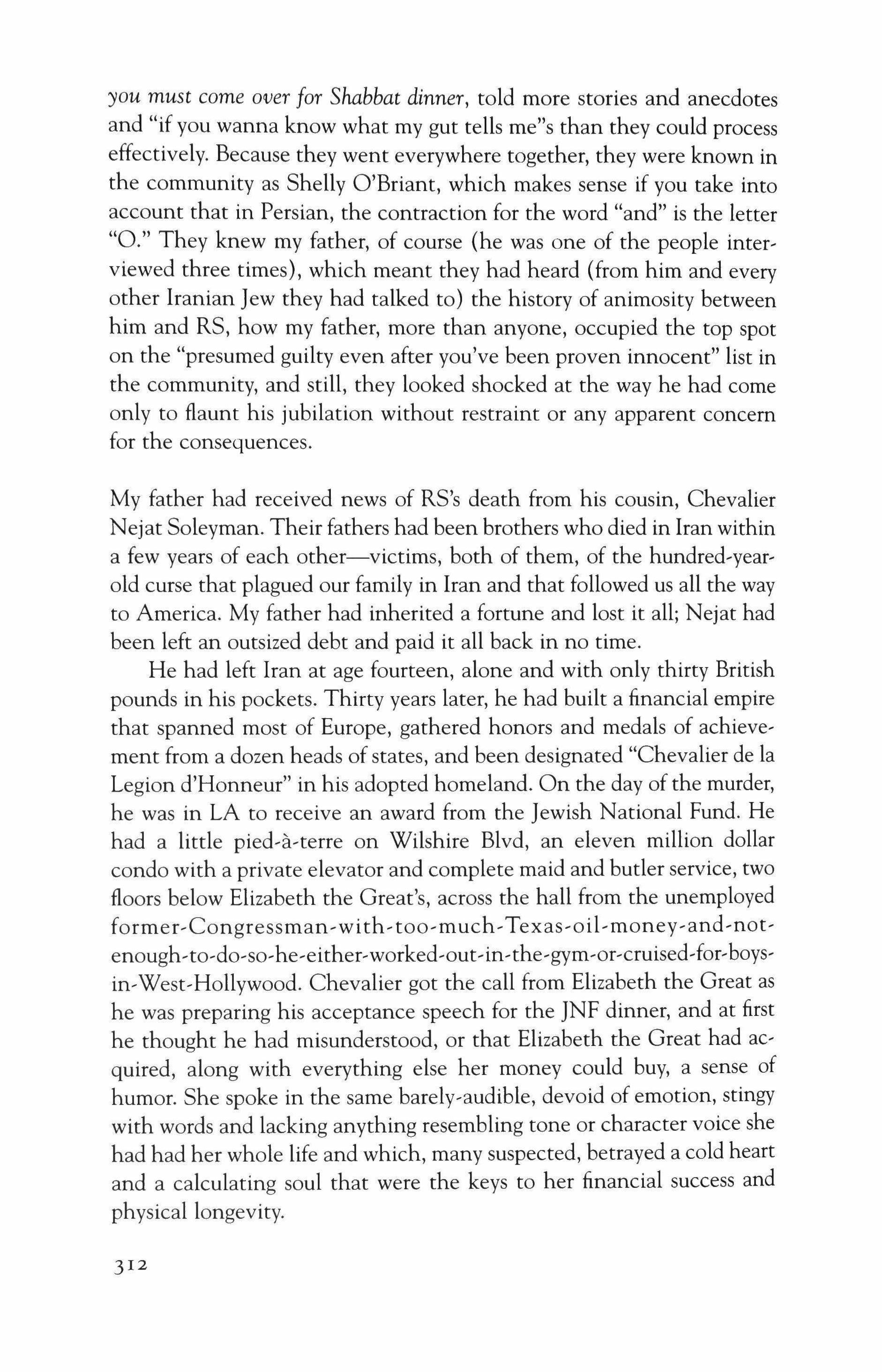
you must come over for Shabbat dinner, told more stories and anecdotes and "if you wanna know what my gut tells me"s than they could process effectively. Because they went everywhere together, they were known in the community as Shelly O'Briant, which makes sense if you take into account that in Persian, the contraction for the word "and" is the letter "0." They knew my father, of course (he was one of the people interviewed three times), which meant they had heard (from him and every other Iranian Jew they had talked to) the history of animosity between him and RS, how my father, more than anyone, occupied the top spot on the "presumed guilty even after you've been proven innocent" list in the community, and still, they looked shocked at the way he had come only to flaunt his jubilation without restraint or any apparent concern for the consequences.
My father had received news of RS's death from his cousin, Chevalier Nejat Soleyman. Their fathers had been brothers who died in Iran within a few years of each other-victims, both of them, of the hundred-yearold curse that plagued our family in Iran and that followed us all the way to America. My father had inherited a fortune and lost it all; Nejat had been left an outsized debt and paid it all back in no time.
He had left Iran at age fourteen, alone and with only thirty British pounds in his pockets. Thirty years later, he had built a financial empire that spanned most of Europe, gathered honors and medals of achievement from a dozen heads of states, and been designated "Chevalier de la Legion d'Honneur" in his adopted homeland. On the day of the murder, he was in LA to receive an award from the Jewish National Fund. He had a little pied-a-terre on Wilshire Blvd, an eleven million dollar condo with a private elevator and complete maid and butler service, two floors below Elizabeth the Great's, across the hall from the unemployed former�Congressman�with�too�much�Texas-oil-money-and-notenough�to�do�so�he�either�worked�out�in�the�gym�or�cruised�for�boys� in-West-Hollvwood. Chevalier got the call from Elizabeth the Great as he was preparing his acceptance speech for the JNF dinner, and at first he thought he had misunderstood, or that Elizabeth the Great had acquired, along with everything else her money could buy, a sense of humor. She spoke in the same barely-audible, devoid of emotion, stingy with words and lacking anything resembling tone or character voice she had had her whole life and which, many suspected, betrayed a cold heart and a calculating soul that were the keys to her financial success and physical longevity.

"Sanam's husband has passed away," she said after her assistant had gotten Chevalier on the phone for her. In Persian, Sanam means "uncommonly tall and exceptionally beautiful"-an embarrassing irony to Elizabeth the Great when the girl grew to an unfortunate five feet, and stopped.
"They found him in his car in Century City. It seems he was murdered."
Chevalier's first thought was that Elizabeth sounded not in the least aggrieved; that she sounded rather joyful, in fact, or at least notas-neutral and unfeeling as usual. His second thought was that she was doing an odd thing, calling him with the news instead of letting lesser folk deliver it in good time. He wondered if this meant she wanted him to play godfather to the Soleyman family, step in and find the culprit(s), do what must be done. Then he remembered my father.
"Does Eskandar know?" he asked and immediately regretted the question.
"I mean, has anyone told him yet?"
Elizabeth's voice was as icy as ever. "I don't know what Eskandar knows," she said, then added, "the police will find out."
Chevalier had to fight the urge to tell Elizabeth that she may want the killer identified so she could send him a personal thank-you note, for ridding her of the son-in-law that she wished she had never had, but he was too much of a gentleman to say such a thing and so he wrapped up the conversation with Her Highness and hung up. He decided he should try to beat the police or anyone else to the punch and deliver the news to my father himself. Partly, this was to protect my father against any foolish and self-incriminating response he might offer the police; partly, it was to relish with my parents the only bit of good news about RS they would receive.
He looked in his phone book for my parents' phone number and saw a dozen different ones listed and scratched out. The first was the number for the seven-bedroom, eight-and-a-half bath with two acres of land, a gray stone shell, and gold-plated fixtures on Sunset and Foothill where we lived when we first moved to LA from Iran. It was a house that had belonged to a woman named Mercedez the Movie Star.
The rest of the numbers represented the many times my parents had had to move, always to a smaller place in a less desirable neighborhood, until they ended up in their current eight-hundred-square-foot, secondstory�no�elevator�no�washer�dryer�and�the�refrigerator's�so�old�it� howls-like-a-hyena apartment on Beverly Glen, two blocks North of

Pico, Cousin Chevalier had been to the house on Sunset a number of times, and he had been to one or two of their our other houses as well, but after a while he realized that my parents were embarrassed by their new homes, especially before a man who traveled with his own airplane and full-time pilot, and so whenever he came to LA, he arranged to meet them at one of the Iranian restaurants on Westwood Boulevard instead. He knew, too, that my parents rarely answered their phone, because they hoped to avoid the creditors and the landlord, the attorneys and bill collectors who wanted money my parents didn't have because they had spent everything they owned fighting RS in one Los Angeles court or another, so that Chevalier decided he had no choice but to make an unannounced trip to their apartment.
He had the chauffeur drop him off in front of my parents' building, then drive a few blocks away, to spare his cousins the sight of the late model, convertible blue Bentley he kept in LA for the few weeks a year he spent here. He had tried to dress as casually as his Germin Street clothes would allow, and he made a point of standing to the left of the front door as he knocked (the size of the apartment making a doorbell superfluous), so as to deprive himself of a view of the inside of the unit when the door opened. He knocked once, waited with his hands clasped in front of him and his head slightly bowed, knocked again a few minutes later. He heard the shuffling ofhouse slippers, felt someone look through the peephole. The door was so flimsy, he could hear my mother's breathing on the other side. There was a pause. She went away, ostensibly to share with my father news ofChevalier's appearance, to figure out ifthey should open, or if they should pretend they weren't at home. Minutes went by. Then my mother opened the door.
"How is it," Chevalier asked with genuine kindness when their eyes met, "that you look more beautiful every time I see you?"
She was wearing a tight-fitting green dress and three-inch heels, hastily applied lipstick and mascara, a couple of fake gold bracelets. She had clearly rushed to change out ofher house clothes before she opened the door for Chevalier, and she was overdressed for someone who wasn't expecting company, as if anyone in LA walked around the house in narrow pumps and noisy bracelets but Chevalier was relieved by this, glad he hadn't caught her in a state she would have been embarrassed to be seen in.
It matters-the face you show the world.
It mattered a great deal in Iran, and it still matters to the Iranians of

my parents' generation who live in the West, and to their children as well, albeit to a lesser degree. For us, there's the truth you own privately, that you deal with alone or within the strict boundaries of the family, that you protect at all cost even if it's an open secret floating around everywhere. And then there's the truth you "present" to the outside.
It's not intended to deceive-this insistence on grace and elegance, this manner we have of wrapping the naked truth in layers of fine acts and gestures and words that mean one thing literally, something else entirely in the context in which they're used. It's not duplicitous; it's a way of painting the world in shades that are more appealing, more attractive to the eye, of making beauty where there is none.
Like when my mother said, "please come in," to Chevalier, because that's what you do with a guest, even one you hadn't invited. Ifhe's Iranian, he'll know this is an offer he's not expected to accept.
"I wouldn't dream of it," he answered, bowing his head to her in respect.
"But you must," she insisted, still in the interest of civility.
"Another time, with pleasure," he returned the civility. "I just wanted to have a word with you and Eskandar; couldn't reach you by phone."
Here he was, a Chevalier de la Legion d'Honneur, standing at the doorstep of my sixty-seven-year-old, penniless, title-less mother, acting like a messenger boy aware of the lowliness of the station he occupies in life. It's another one of the social graces unknown in the West: among Iranians with true social pedigree, the more noble and high-ranking a person, the more humbly he will act with those inferior to him.
Behind her in the tiny living room, my father walked out of the shadow, holding a newspaper in one hand and his reading glasses in the other.
"I apologize for the intrusion," Chevalier was hyper-aware of the ernbarrassment his visit had caused. "I wanted to give you the news myself."
My father shuffled up to the door in his rubber slippers, extended a shaky hand at his cousin, then leaned over and kissed him on both cheeks.
"I hope it's good," he said, unconvinced and hesitant, knowing that something of consequence must have occurred for Chevalier to tum up unexpectedly like that.
Chevalier tried to broach the subject diplomatically.
"This kind of thing is never good," he said, and suddenly felt his throat constrict. He paused, looked away from my parents at the dirty
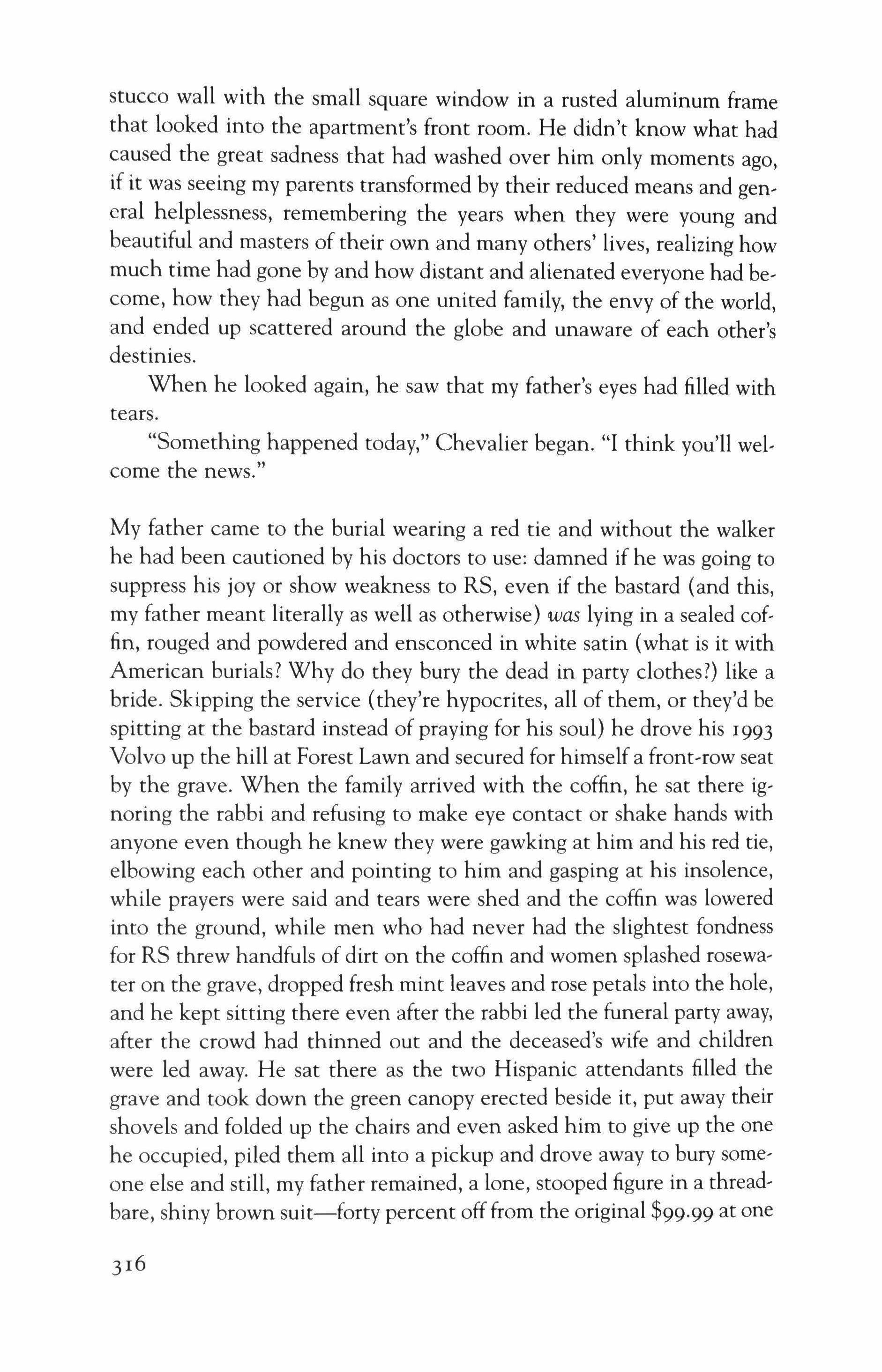
stucco wall with the small square window in a rusted aluminum frame that looked into the apartment's front room. He didn't know what had caused the great sadness that had washed over him only moments ago, if it was seeing my parents transformed by their reduced means and general helplessness, remembering the years when they were young and beautiful and masters of their own and many others' lives, realizing how much time had gone by and how distant and alienated everyone had become, how they had begun as one united family, the envy of the world, and ended up scattered around the globe and unaware of each other's destinies.
When he looked again, he saw that my father's eyes had filled with tears.
"Something happened today," Chevalier began. "I think you'll welcome the news."
My father came to the burial wearing a red tie and without the walker he had been cautioned by his doctors to use: damned if he was going to suppress his joy or show weakness to RS, even if the bastard {and this, my father meant literally as well as otherwise} was lying in a sealed coffin, rouged and powdered and ensconced in white satin {what is it with American burials? Why do they bury the dead in party clothes?} like a bride. Skipping the service (they're hypocrites, all of them, or they'd be spitting at the bastard instead of praying for his soul) he drove his 1993 Volvo up the hill at Forest Lawn and secured for himself a front-row seat by the grave. When the family arrived with the coffin, he sat there ignoring the rabbi and refusing to make eye contact or shake hands with anyone even though he knew they were gawking at him and his red tie, elbowing each other and pointing to him and gasping at his insolence, while prayers were said and tears were shed and the coffin was lowered into the ground, while men who had never had the slightest fondness for RS threw handfuls of dirt on the coffin and women splashed rosewater on the grave, dropped fresh mint leaves and rose petals into the hole, and he kept sitting there even after the rabbi led the funeral party away, after the crowd had thinned out and the deceased's wife and children were led away. He sat there as the two Hispanic attendants filled the grave and took down the green canopy erected beside it, put away their shovels and folded up the chairs and even asked him to give up the one he occupied, piled them all into a pickup and drove away to bury someone else and still, my father remained, a lone, stooped figure in a threadbare, shiny brown suit-forty percent offfrom the original $99.99 at one

of those shops on Santee Alley downtown-and scuffed brown shoes, watching the grave as if to make his heart believe what his eyes could see: that it was over, at last, the filthy bastard had got his comeuppance, he was gone once and for all, would never return as he had so many times in the past to obliterate my father by taking from him everything he owned, even his good name, to settle a score that could never be settled, no matter how many lawsuits he won and how many gold watches he bought, because what RS had wanted-really wanted-was the respect and recognition of my father and his family and that, ladies and gentlemen, was a wish the bastard would have taken to the grave had he lived to be a thousand years old.

I used to have a lover who sleepwalked. In the dead of night, suddenly, he would rise without a word, a dark figure pulled up headfirst, then chest, belly, hips, legs, which he would swing onto the floor to begin his nocturnal ballet. His movements were so fluid when he sleepwalked, much more than in waking life, when his gait was choppy, full offits and starts. Asleep, he would glide from the bedroom through the little hallway into the living room and the kitchen, then back to the little hallway again.
Whether myth or fact, I believed that rousing him from his peripatetic slumber might fill him with such rage that he would tum into a monster and rip me to shreds. So I never, ever startled him. But it was disconcerting to wait in bed while a flesh-and-blood ghost meandered through the rooms; you never knew what he might do. I used to think that Lorena Bobbitt had been sleepwalking when she wandered into her kitchen, fetched the knife, and detached her husband's penis. But then I realized that she probably had been sleepwalking all her life and that she had never, before that fateful moment, been more awake.
"Alfredo," I would say, in the softest possible voice, "shall we go to bed?" He would look at me with "eyes open, sense shut," as the Bard said, resist a little, seem mildly disgruntled, but then, follow me obediently back to bed. In the morning, he never remembered his nighttime excursion.
Lady Macbeth, you'll recall, sleepwalked, too. But she had something to sleepwalk about. Tortured by her husband's deadly deeds, in
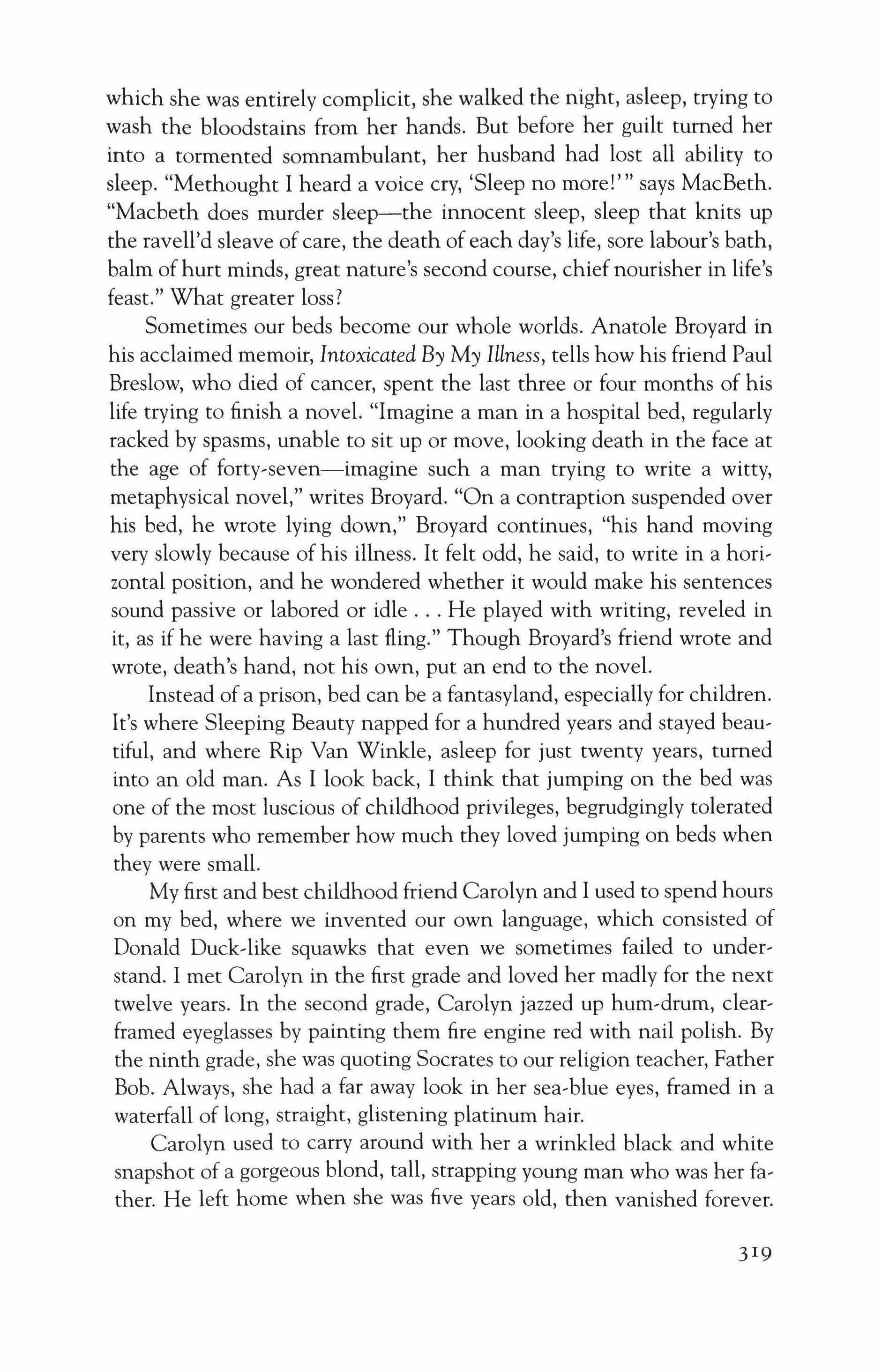
which she was entirely complicit, she walked the night, asleep, trying to wash the bloodstains from her hands. But before her guilt turned her into a tormented somnambulant, her husband had lost all ability to sleep. "Methought I heard a voice cry, 'Sleep no more!'" says MacBeth. "Macbeth does murder sleep-the innocent sleep, sleep that knits up the ravell'd sleave of care, the death of each day's life, sore labour's bath, balm ofhurt minds, great nature's second course, chief nourisher in life's feast." What greater loss?
Sometimes our beds become our whole worlds. Anatole Broyard in his acclaimed memoir, Intoxicated By My Illness, tells how his friend Paul Breslow, who died of cancer, spent the last three or four months of his life trying to finish a novel. "Imagine a man in a hospital bed, regularly racked by spasms, unable to sit up or move, looking death in the face at the age of forty,seven-imagine such a man trying to write a witty, metaphysical novel," writes Broyard. "On a contraption suspended over his bed, he wrote lying down," Broyard continues, "his hand moving very slowly because of his illness. It felt odd, he said, to write in a horizontal position, and he wondered whether it would make his sentences sound passive or labored or idle He played with writing, reveled in it, as if he were having a last fling." Though Broyard's friend wrote and wrote, death's hand, not his own, put an end to the novel.
Instead of a prison, bed can be a fantasyland, especially for children. It's where Sleeping Beauty napped for a hundred years and stayed beau, tiful, and where Rip Van Winkle, asleep for just twenty years, turned into an old man. As I look back, I think that jumping on the bed was one of the most luscious of childhood privileges, begrudgingly tolerated by parents who remember how much they loved jumping on beds when they were small.
My first and best childhood friend Carolyn and I used to spend hours on my bed, where we invented our own language, which consisted of Donald Duck-like squawks that even we sometimes failed to under, stand. I met Carolyn in the first grade and loved her madly for the next twelve years. In the second grade, Carolyn jazzed up hum-drum, clear' framed eyeglasses by painting them fire engine red with nail polish. By the ninth grade, she was quoting Socrates to our religion teacher, Father Bob. Always, she had a far away look in her sea-blue eyes, framed in a waterfall of long, straight, glistening platinum hair.
Carolyn used to carry around with her a wrinkled black and white snapshot of a gorgeous blond, tall, strapping young man who was her fa, ther. He left home when she was five years old, then vanished forever.
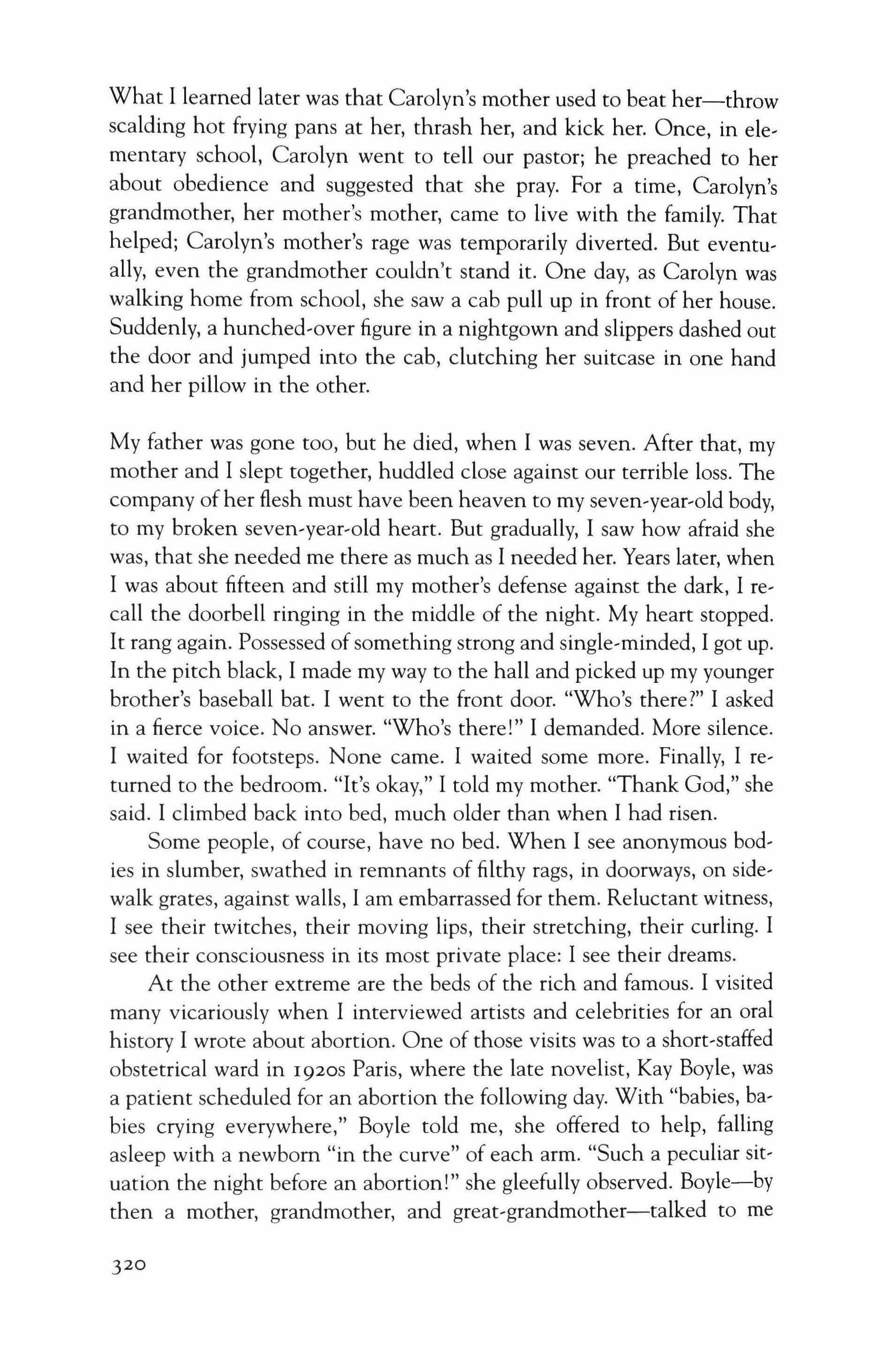
What I learned later was that Carolyn's mother used to beat her-throw scalding hot frying pans at her, thrash her, and kick her. Once, in elementary school, Carolyn went to tell our pastor; he preached to her about obedience and suggested that she pray. For a time, Carolyn's grandmother, her mother's mother, came to live with the family. That helped; Carolyn's mother's rage was temporarily diverted. But eventually, even the grandmother couldn't stand it. One day, as Carolyn was walking home from school, she saw a cab pull up in front of her house. Suddenly, a hunched-over figure in a nightgown and slippers dashed out the door and jumped into the cab, clutching her suitcase in one hand and her pillow in the other.
My father was gone too, but he died, when I was seven. After that, my mother and I slept together, huddled close against our terrible loss. The company of her flesh must have been heaven to my seven-year-old body, to my broken seven-year-old heart. But gradually, I saw how afraid she was, that she needed me there as much as I needed her. Years later, when I was about fifteen and still my mother's defense against the dark, I recall the doorbell ringing in the middle of the night. My heart stopped. It rang again. Possessed of something strong and single-minded, I got up. In the pitch black, I made my way to the hall and picked up my younger brother's baseball bat. I went to the front door. "Who's there?" I asked in a fierce voice. No answer. "Who's there!" I demanded. More silence. I waited for footsteps. None came. I waited some more. Finally, I returned to the bedroom. "It's okay," I told my mother. "Thank God," she said. I climbed back into bed, much older than when I had risen.
Some people, of course, have no bed. When I see anonymous bodies in slumber, swathed in remnants of filthy rags, in doorways, on sidewalk grates, against walls, I am embarrassed for them. Reluctant witness, I see their twitches, their moving lips, their stretching, their curling. I see their consciousness in its most private place: I see their dreams.
At the other extreme are the beds of the rich and famous. I visited many vicariously when I interviewed artists and celebrities for an oral history I wrote about abortion. One of those visits was to a short-staffed obstetrical ward in 1920S Paris, where the late novelist, Kay Boyle, was a patient scheduled for an abortion the following day. With "babies, babies crying everywhere," Boyle told me, she offered to help, falling asleep with a newborn "in the curve" of each arm. "Such a peculiar situation the night before an abortion!" she gleefully observed. Boyle-by then a mother, grandmother, and great-grandmother-talked to me
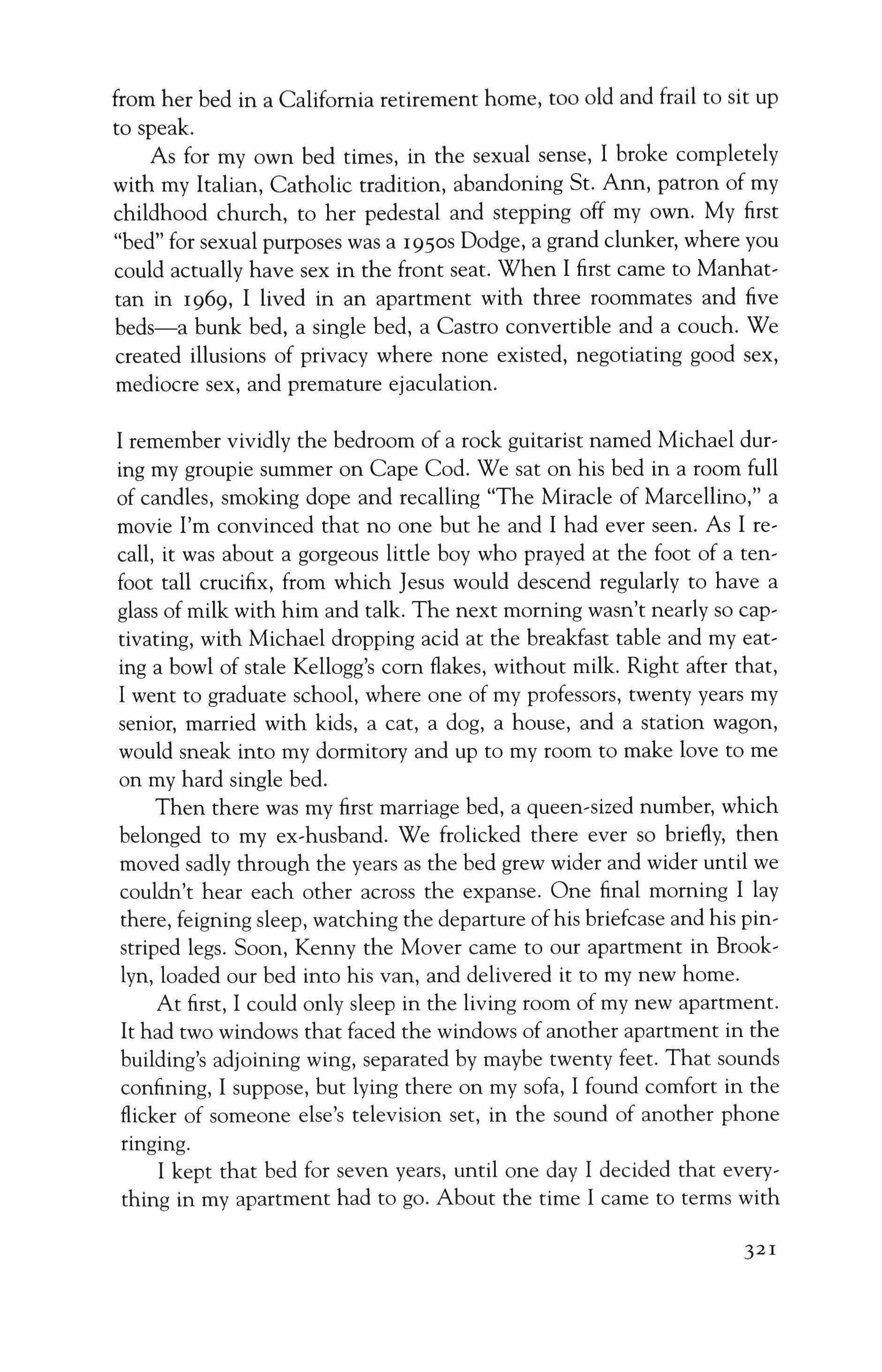
from her bed in a California retirement home, too old and frail to sit up to speak.
As for my own bed times, in the sexual sense, I broke completely with my Italian, Catholic tradition, abandoning St. Ann, patron of my childhood church, to her pedestal and stepping off my own. My first "bed" for sexual purposes was a 1950S Dodge, a grand clunker, where you could actually have sex in the front seat. When I first came to Manhattan in 1969, I lived in an apartment with three roommates and five beds-a bunk bed, a single bed, a Castro convertible and a couch. We created illusions of privacy where none existed, negotiating good sex, mediocre sex, and premature ejaculation.
I remember vividly the bedroom of a rock guitarist named Michael during my groupie summer on Cape Cod. We sat on his bed in a room full of candles, smoking dope and recalling "The Miracle of Marcellino," a movie I'm convinced that no one but he and I had ever seen. As I recall, it was about a gorgeous little boy who prayed at the foot of a tenfoot tall crucifix, from which Jesus would descend regularly to have a glass of milk with him and talk. The next morning wasn't nearly so captivating, with Michael dropping acid at the breakfast table and my eating a bowl of stale Kellogg's com flakes, without milk. Right after that, I went to graduate school, where one of my professors, twenty years my senior, married with kids, a cat, a dog, a house, and a station wagon, would sneak into my dormitory and up to my room to make love to me on my hard single bed.
Then there was my first marriage bed, a queen-sized number, which belonged to my ex-husband. We frolicked there ever so briefly, then moved sadly through the years as the bed grew wider and wider until we couldn't hear each other across the expanse. One final morning I lay there, feigning sleep, watching the departure ofhis briefcase and his pinstriped legs. Soon, Kenny the Mover came to our apartment in Brooklyn, loaded our bed into his van, and delivered it to my new home.
At first, I could only sleep in the living room of my new apartment. It had two windows that faced the windows of another apartment in the building's adjoining wing, separated by maybe twenty feet. That sounds confining, I suppose, but lying there on my sofa, I found comfort in the flicker of someone else's television set, in the sound of another phone ringing.
I kept that bed for seven years, until one day I decided that everything in my apartment had to go. About the time I came to terms with

a rampaging eating disorder and its accompanying depression, I noticed that not only had I felt dreary inside, my surroundings were dreary, too. That sofa was third-generation, inherited from my friend's grandmother, a hopelessly shredded and stained affair that I had covered with a brown-fringed throw that I probably got at Woolworth's. The design of my area rug was alternating rings of brown and black; I had no lamps, just a dull ceiling light; and my writings were stored in cardboard boxes. One day, I went out and bought a pink rug, beige filing cabinets, white lamps, a light gray couch, and a double bed. Soon after, I met a wonderful man.
For a time, Glenn and I slept on the frame of his first marriage bed. It was a queen-sized wooden structure that he sawed in half when he couldn't get it into the apartment he was moving into with his ex-wife. He then reassembled it with some sturdy nails. We went out to Futon King on West Seventy-second Street in Manhattan and replaced the mattress, waddling with the new one out to the street and cramming it into the trunk of a yellow cab. Some years later, we were ready for our own bed, a really good bed, an expensive bed. We went to all the major sleep stores, cheerfully flopping up and down on all manner ofbeds lined up in endless rows. Finally, we found a bed we loved; it gave each of us our own set of springs, guaranteeing that one person's weight would never sink the other.
We've had that bed for years now. It's been a good bed, dependable, maybe even wise. Oh, I've had nightmares here and sleepless nights. But it's our haven. It's where Glenn and I still whisper in the dark, giggle, play, and make love. But what I cherish most, more than anything else, is when we settle in at the end of the day, pull up the covers, heave great sighs, and drift off into the sweetest sleep, touching toes, holding hands.
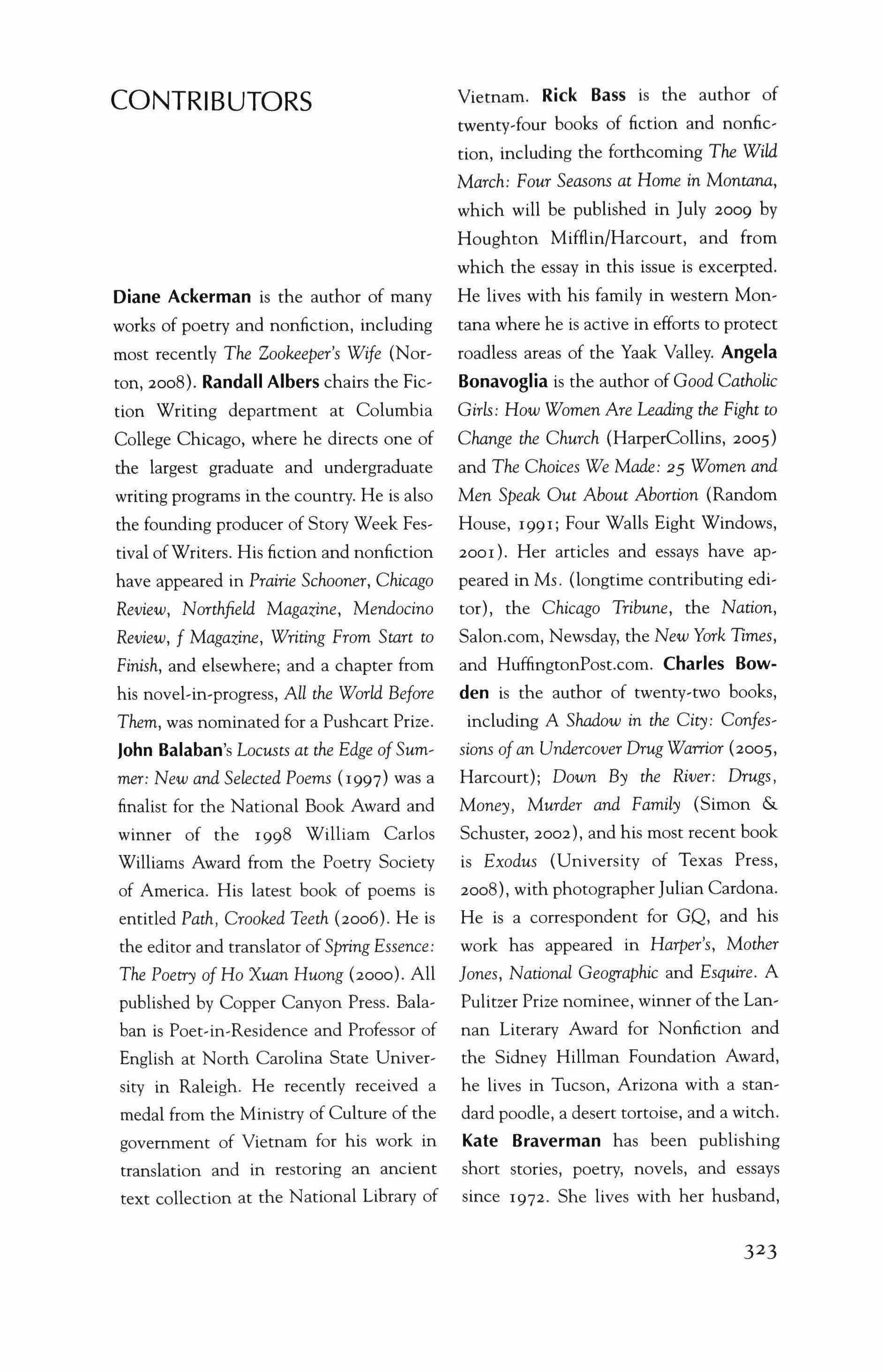
Diane Ackerman is the author of many works of poetry and nonfiction, including most recently The Zookeeper's Wife (Norton, 2008). Randall Albers chairs the Fiction Writing department at Columbia College Chicago, where he directs one of the largest graduate and undergraduate writing programs in the country. He is also the founding producer of Story Week Festival of Writers. His fiction and nonfiction have appeared in Prairie Schooner, Chicago Review, Northfield Magazine, Mendocino Review, f Magazine, Writing From Start to Finish, and elsewhere; and a chapter from his novel-in-progress, All the World Before Them, was nominated for a Pushcart Prize. John Balaban's Locusts at the Edge of Summer: New and Selected Poems (1997) was a finalist for the National Book Award and winner of the 1998 William Carlos Williams Award from the Poetry Society of America. His latest book of poems is entitled Path, Crooked Teeth (2006). He is the editor and translator of Spring Essence: The Poetry of Ho Xuan Huong (2000). All published by Copper Canyon Press. Balaban is Poet-in-Residence and Professor of English at North Carolina State University in Raleigh. He recently received a medal from the Ministry of Culture of the government of Vietnam for his work in translation and in restoring an ancient text collection at the National Library of
Vietnam. Rick Bass is the author of twenty-four books of fiction and nonfiction, including the forthcoming The Wild March: Four Seasons at Home in Montana, which will be published in July 2009 by Houghton Mifflin/Harcourt, and from which the essay in this issue is excerpted. He lives with his family in western Montana where he is active in efforts to protect roadless areas of the Yaak Valley. Angela Bonavoglia is the author of Good Catholic Girls: How Women Are Leading the Fight to Change the Church (HarperCollins, 2005) and The Choices We Made: 25 Women and Men Speak Out About Abortion (Random House, 1991; Four Walls Eight Windows, 200 I). Her articles and essays have appeared in Ms. (longtime contributing editor), the Chicago Tribune, the Nation, Salon.com, Newsday, the New York TImes, and HuffingtonPost.com. Charles Bowden is the author of twenty-two books, including A Shadow in the City: Confessions of an Undercover Drug Warrior (2005, Harcourt); Down By the River: Drugs, Money, Murder and Family (Simon & Schuster, 2002), and his most recent book is Exodus (University of Texas Press, 2008), with photographerJulian Cardona. He is a correspondent for GQ, and his work has appeared in Harper's, Mother Jones, National Geographic and Esquire. A Pulitzer Prize nominee, winner of the Lannan Literary Award for Nonfiction and the Sidney Hillman Foundation Award, he lives in Tucson, Arizona with a standard poodle, a desert tortoise, and a witch. Kate Braverman has been publishing short stories, poetry, novels, and essays since 1972. She lives with her husband,
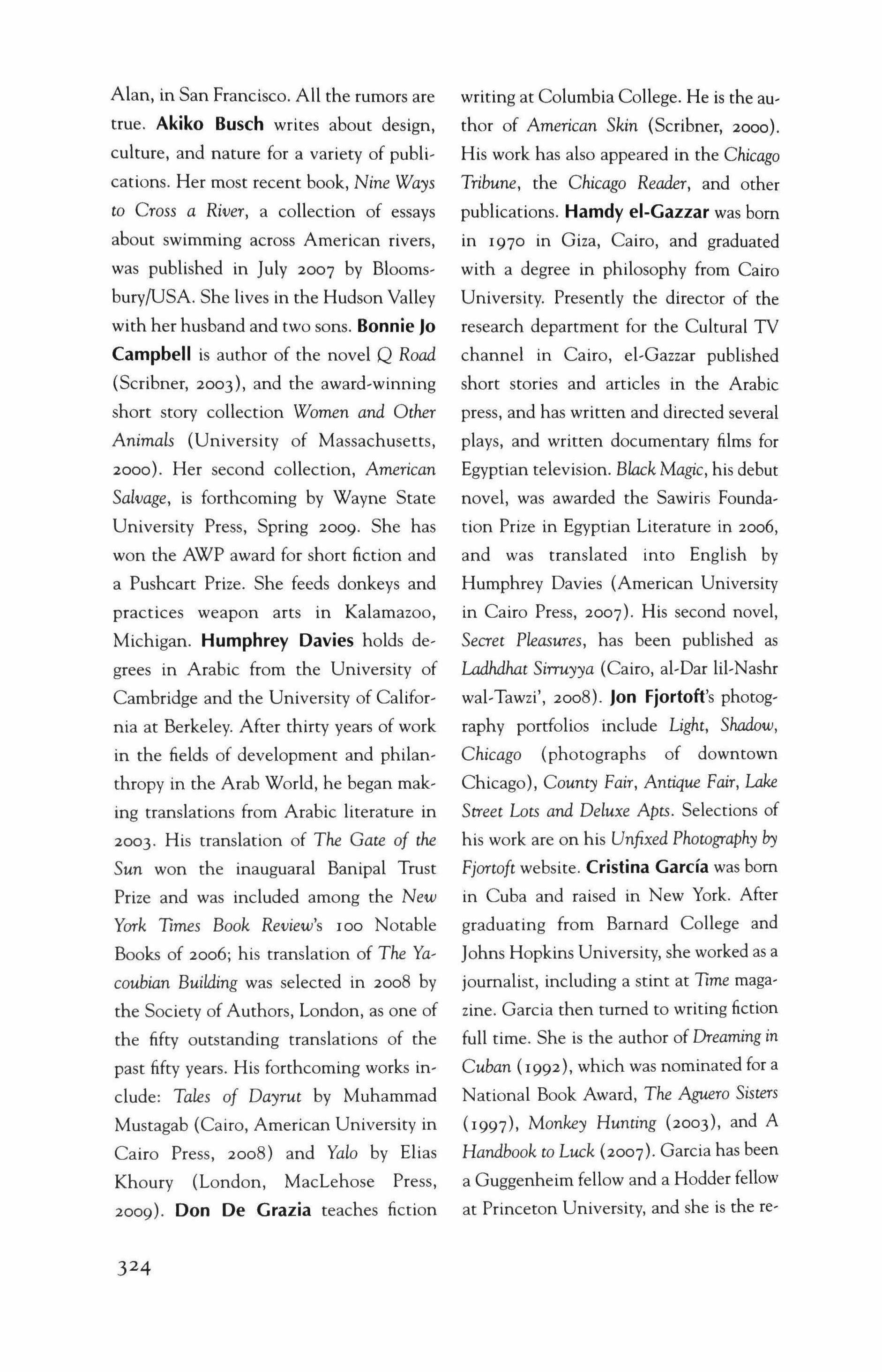
Alan, in San Francisco. All the rumors are true. Akiko Busch writes about design, culture, and nature for a variety of publications. Her most recent book, Nine Ways to Cross a River, a collection of essays about swimming across American rivers, was published in July 2007 by BloomsburyjUSA. She lives in the Hudson Valley with her husband and two sons. Bonnie lo Campbell is author of the novel Q Road (Scribner, 2003), and the award-winning short story collection Women and Other Animals (University of Massachusetts, 2000). Her second collection, American Salvage, is forthcoming by Wayne State University Press, Spring 2009. She has won the AWP award for short fiction and a Pushcart Prize. She feeds donkeys and practices weapon arts in Kalamazoo, Michigan. Humphrey Davies holds degrees in Arabic from the University of Cambridge and the University of California at Berkeley. After thirty years of work in the fields of development and philanthropy in the Arab World, he began making translations from Arabic literature in 2003. His translation of The Gate of the Sun won the inauguaral Banipal Trust Prize and was included among the New York Times Book Review's 100 Notable Books of 2006; his translation of The Yacoubian Building was selected in 2008 by the Society of Authors, London, as one of the fifty outstanding translations of the past fifty years. His forthcoming works include: Tales of Dayrut by Muhammad Mustagab (Cairo, American University in Cairo Press, 2008) and Yalo by Elias Khoury (London, MacLehose Press, 2009). Don De Grazia teaches fiction
writing at Columbia College. He is the author of American Skin (Scribner, 2000). His work has also appeared in the Chicago Tribune, the Chicago Reader, and other publications. Hamdy el-Gazzar was born in 1970 in Giza, Cairo, and graduated with a degree in philosophy from Cairo University. Presently the director of the research department for the Cultural TV channel in Cairo, el-Gazzar published short stories and articles in the Arabic press, and has written and directed several plays, and written documentary films for Egyptian television. Black Magic, his debut novel, was awarded the Sawiris Foundation Prize in Egyptian Literature in 2006, and was translated into English by Humphrey Davies (American University in Cairo Press, 2007). His second novel, Secret Pleasures, has been published as Ladhdhat Sirruyya (Cairo, al-Dar lil-Nashr wal-Tawzi', 2008). Jon Fjortoft's photography portfolios include Light, Shadow, Chicago (photographs of downtown Chicago), County Fair, Antique Fair, Lake Street Lots and Deluxe Apts. Selections of his work are on his Unfixed Photography by Fjortoft website. Cristina Garda was born in Cuba and raised in New York. After graduating from Barnard College and Johns Hopkins University, she worked as a journalist, including a stint at Time magazine. Garcia then turned to writing fiction full time. She is the author of Dreaming in Cuban (1992), which was nominated for a National Book Award, The Aguero Sisters (1997), Monkey Hunting (2003), and A Handbook to Luck (2007). Garcia has been a Guggenheim fellow and a Hodder fellow at Princeton University, and she is the re-
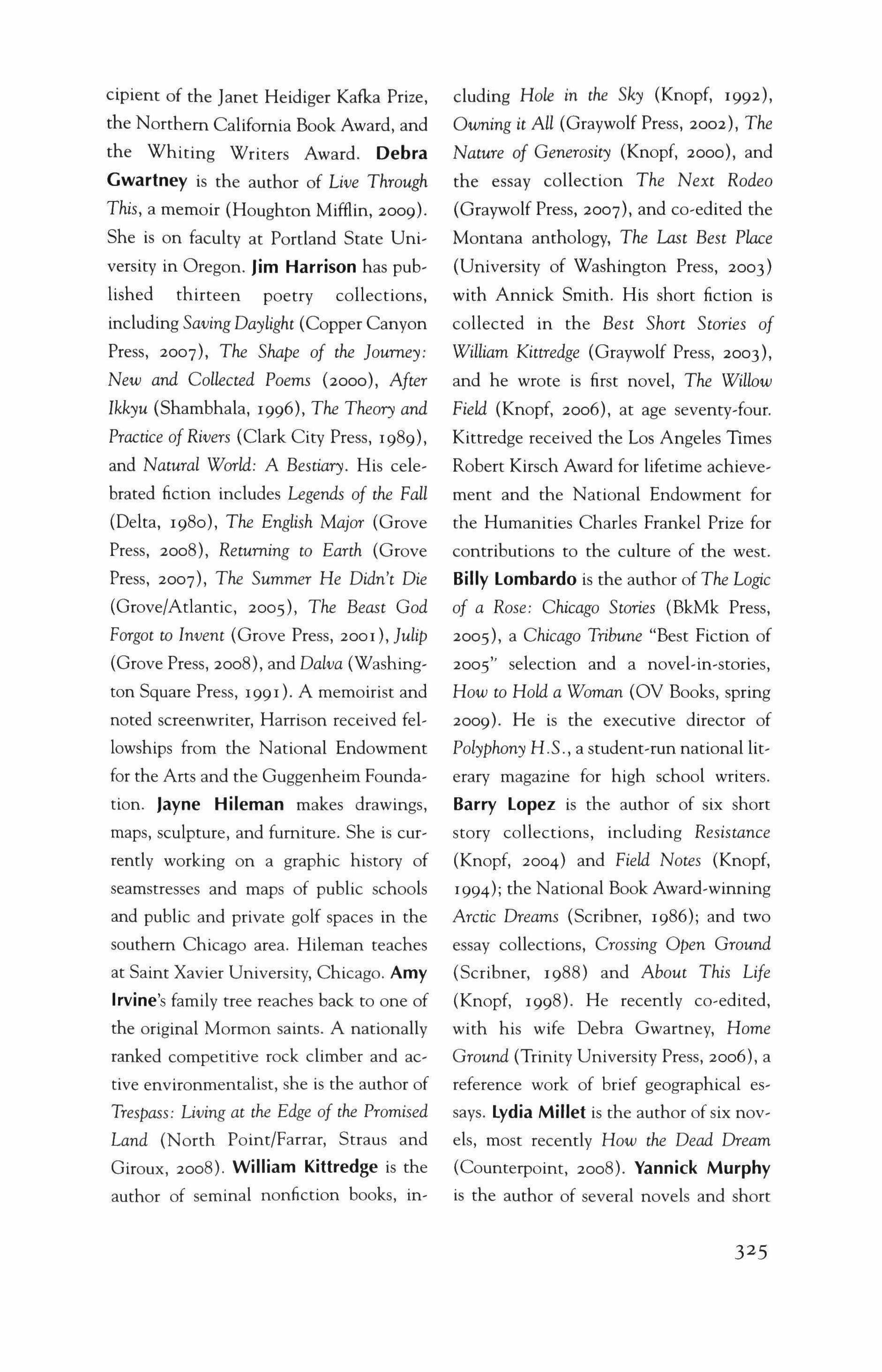
cipient of the Janet Heidiger Kafka Prize, the Northern California Book Award, and the Whiting Writers Award. Debra Gwartney is the author of Live Through This, a memoir (Houghton Mifflin, 2009). She is on faculty at Portland State University in Oregon. Jim Harrison has published thirteen poetry collections, including SavingDaylight (Copper Canyon Press, 2007), The Shape of the Journey: New and Collected Poems (2000), After Ikkyu (Shambhala, 1996), The Theory and Practice of Rivers (Clark City Press, 1989), and Natural World: A Bestiary. His celebrated fiction includes Legends of the Fall (Delta, 1980), The English Major (Grove Press, 2008), Returning to Earth (Grove Press, 2007), The Summer He Didn't Die (Grove/Atlantic, 2005), The Beast God Forgot to Invent (Grove Press, 2001), JuliP (Grove Press, 2008), and Dalva (Washington Square Press, 1991). A memoirist and noted screenwriter, Harrison received fellowships from the National Endowment for the Arts and the Guggenheim Foundation. Jayne Hileman makes drawings, maps, sculpture, and furniture. She is currently working on a graphic history of seamstresses and maps of public schools and public and private golf spaces in the southern Chicago area. Hileman teaches at Saint Xavier University, Chicago. Amy Irvine's family tree reaches back to one of the original Mormon saints. A nationally ranked competitive rock climber and active environmentalist, she is the author of Trespass: Living at the Edge of the Promised Land (North Point/Farrar, Straus and Giroux, 2008). William Kittredge is the author of seminal nonfiction books, in-
eluding Hole in the Sky (Knopf, 1992), Owning it All (Graywolf Press, 2002), The Nature of Generosity (Knopf, 2000), and the essay collection The Next Rodeo (Graywolf Press, 2007), and co-edited the Montana anthology, The Last Best Place (University of Washington Press, 2003) with Annick Smith. His short fiction is collected in the Best Short Stories of William Kittredge (Graywolf Press, 2003), and he wrote is first novel, The Willow Field (Knopf, 2006), at age seventy-four. Kittredge received the Los Angeles Times Robert Kirsch Award for lifetime achievement and the National Endowment for the Humanities Charles Frankel Prize for contributions to the culture of the west.
Billy Lombardo is the author of The Logic of a Rose: Chicago Stories (BkMk Press, 2005), a Chicago Tribune "Best Fiction of 2005" selection and a novel-in-stories, How to Hold a Woman (OY Books, spring 2009). He is the executive director of Polyphony H.S., a student-run national literary magazine for high school writers. Barry Lopez is the author of six short story collections, including Resistance (Knopf, 2004) and Field Notes (Knopf, 1994); the National Book Award-winning Arctic Dreams (Scribner, 1986); and two essay collections, Crossing Open Ground (Scribner, 1988) and About This Life (Knopf, 1998). He recently co-edited, with his wife Debra Gwartney, Home Ground (Trinity University Press, 2006), a reference work of brief geographical essays. Lydia Millet is the author of six novels, most recently How the Dead Dream (Counterpoint, 2008). Yannick Murphy is the author of several novels and short
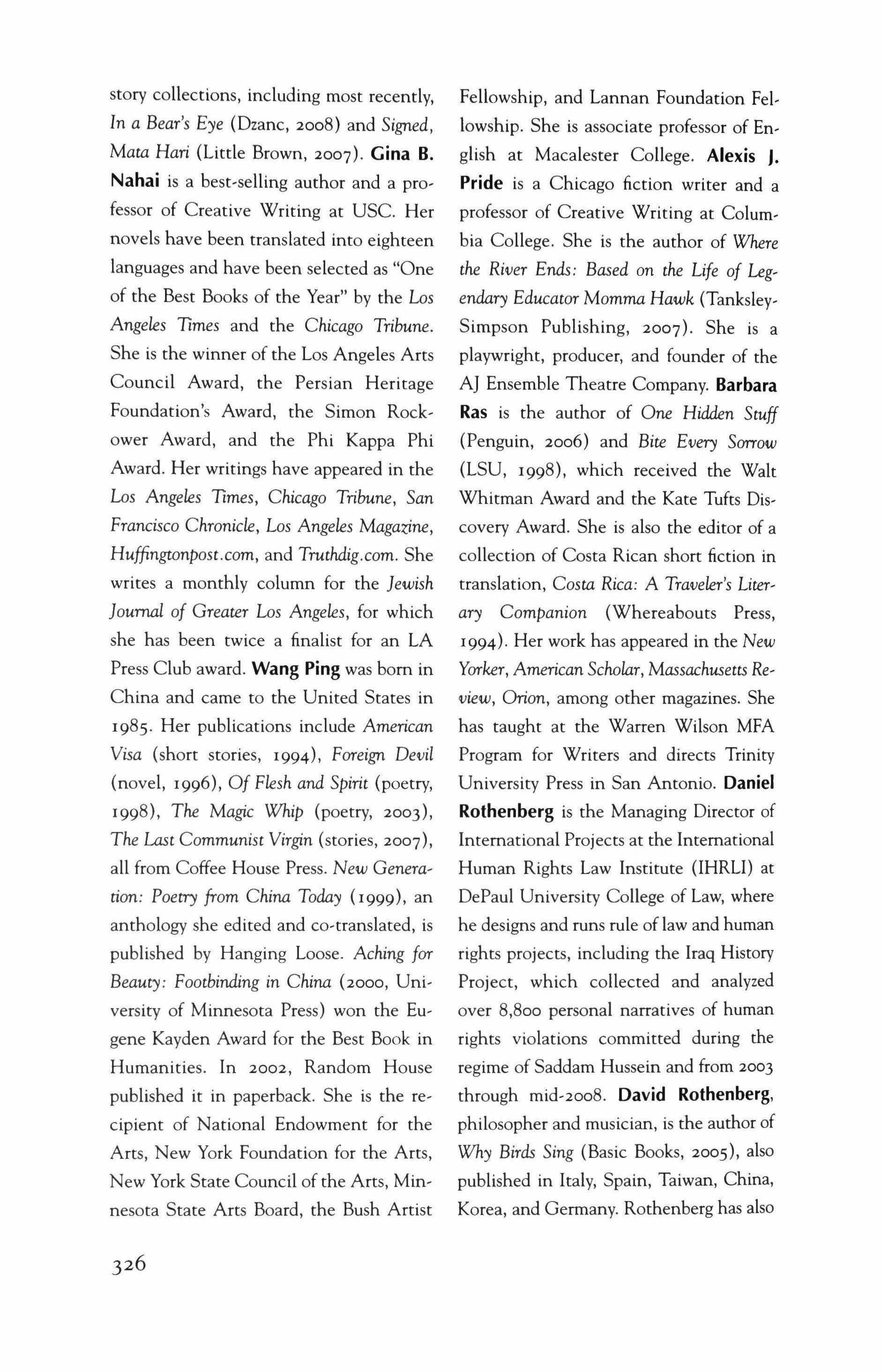
story collections, including most recently, In a Bear's Eye (Dzanc, 2008) and Signed, Mata Hari (Little Brown, 2007). Gina B. Nahai is a best-selling author and a professor of Creative Writing at USc. Her novels have been translated into eighteen languages and have been selected as "One of the Best Books of the Year" by the Los Angeles Times and the Chicago Tribune. She is the winner of the Los Angeles Arts Council Award, the Persian Heritage Foundation's Award, the Simon Rockower Award, and the Phi Kappa Phi Award. Her writings have appeared in the Los Angeles Times, Chicago Tribune, San Francisco Chronicle, Los Angeles Magazine, HuffingwnposLcom, and Truthdig.com. She writes a monthly column for the Jewish Journal of Greater Los Angeles, for which she has been twice a finalist for an LA Press Club award. Wang Ping was born in China and came to the United States in 1985. Her publications include American Visa (short stories, 1994), Foreign Devil (novel, 1996), Of Flesh and Spirit (poetry, 1998), The Magic Whip (poetry, 2003), The Last Communist Virgin (stories, 2007), all from Coffee House Press. New Generation: Poetry from China Today (1999), an anthology she edited and co-translated, is published by Hanging Loose. Aching for Beauty: Footbinding in China (2000, University of Minnesota Press) won the Eugene Kayden Award for the Best Book in Humanities. In 2002, Random House published it in paperback. She is the recipient of National Endowment for the Arts, New York Foundation for the Arts, New York State Council of the Arts, Minnesota State Arts Board, the Bush Artist
Fellowship, and Lannan Foundation Fellowship. She is associate professor of English at Macalester College. Alexis J. Pride is a Chicago fiction writer and a professor of Creative Writing at Columbia College. She is the author of Where the River Ends: Based on the Life of Legendary Educator Momma Hawk (TanksleySimpson Publishing, 2007). She is a playwright, producer, and founder of the AJ Ensemble Theatre Company. Barbara Ras is the author of One Hidden Stuff (Penguin, 2006) and Bite Every Sorrow (LSU, 1998), which received the Walt Whitman Award and the Kate Tufts Discovery Award. She is also the editor of a collection of Costa Rican short fiction in translation, Costa Rica: A Traveler's Literary Companion (Whereabouts Press, 1994). Her work has appeared in the New Yorker, American Scholar, Massachusetts Review, Orion, among other magazines. She has taught at the Warren Wilson MFA Program for Writers and directs Trinity University Press in San Antonio. Daniel Rothenberg is the Managing Director of International Projects at the International Human Rights Law Institute (IHRLI) at DePaul University College of Law, where he designs and runs rule of law and human rights projects, including the Iraq History Project, which collected and analyzed over 8,800 personal narratives of human rights violations committed during the regime of Saddam Hussein and from 2003 through mid-2008. David Rothenberg, philosopher and musician, is the author of Why Birds Sing (Basic Books, 2005), also published in Italy, Spain, Taiwan, China, Korea, and Germany. Rothenberg has also
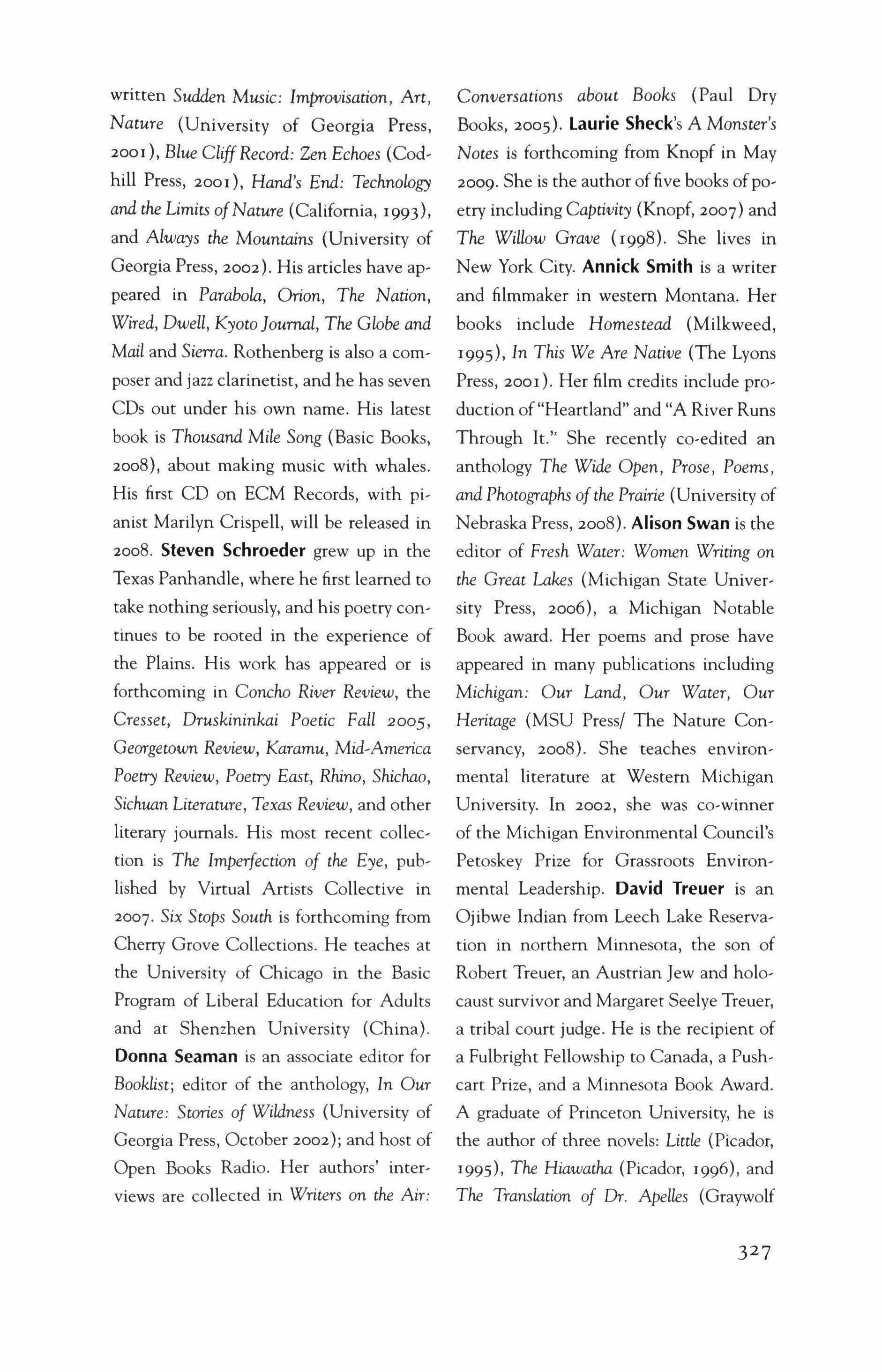
written Sudden Music: Improvisation, Art, Nature (University of Georgia Press, 2001), Blue CliffRecord: Zen Echoes (Codhill Press, 2001), Hand's End: Technology and the Limits ofNature (California, 1993), and Always the Mountains (University of Georgia Press, 2002). His articles have appeared in Parabola, Orion, The Nation, Wired, Dwell, KyotoJournal, The Globe and Mail and Sierra. Rothenberg is also a composer and jazz clarinetist, and he has seven CDs out under his own name. His latest book is Thousand Mile Song (Basic Books, 2008), about making music with whales. His first CD on ECM Records, with pianist Marilyn Crispell, will be released in 2008. Steven Schroeder grew up in the Texas Panhandle, where he first learned to take nothing seriously, and his poetry continues to be rooted in the experience of the Plains. His work has appeared or is forthcoming in Concho River Review, the Cresset, Druskininkai Poetic Fall 2005, Georgetown Review, Karamu, Mid-America Poetry Review, Poetry East, Rhino, Shichao, Sichuan Literature, Texas Review, and other literary journals. His most recent collection is The Imperfection of the Eye, published by Virtual Artists Collective in 2007. Six Stops South is forthcoming from Cherry Grove Collections. He teaches at the University of Chicago in the Basic Program of Liberal Education for Adults and at Shenzhen University (China). Donna Seaman is an associate editor for Booklist; editor of the anthology, In Our Nature: Stories of Wildness (University of Georgia Press, October 2002); and host of Open Books Radio. Her authors' interviews are collected in Writers on the Air:
Conversations about Books (Paul Dry Books, 2005). Laurie Sheck's A Monster's Notes is forthcoming from Knopf in May 2009. She is the author offive books ofpoetry including Captivity (Knopf, 2007) and The Willow Grave (1998). She lives in New York City. Annick Smith is a writer and filmmaker in western Montana. Her books include Homestead (Milkweed, 1995), In This We Are Native (The Lyons Press, 2001). Her film credits include production of"Heartland" and "A River Runs Through It." She recently co-edited an anthology The Wide Open, Prose, Poems, and Photographs of the Prairie (University of Nebraska Press, 2008). Alison Swan is the editor of Fresh Water: Women Writing on the Great Lakes (Michigan State University Press, 2006), a Michigan Notable Book award. Her poems and prose have appeared in many publications including Michigan: Our Land, Our Water, Our Heritage (MSU Press/ The Nature Conservancy, 2008). She teaches environmental literature at Western Michigan University. In 2002, she was co-winner of the Michigan Environmental Council's Petoskey Prize for Grassroots Environmental Leadership. David Treuer is an Ojibwe Indian from Leech Lake Reservation in northern Minnesota, the son of Robert Treuer, an Austrian Jew and holocaust survivor and Margaret Seelye Treuer, a tribal court judge. He is the recipient of a Fulbright Fellowship to Canada, a Pushcart Prize, and a Minnesota Book Award. A graduate of Princeton University, he is the author of three novels: Little (Picador, 1995), The Hiawatha (Picador, 1996), and The Translation of Dr. Apelles (Graywolf

Press, 2006). Treuer is also the author of an essay collection, Native American Fiction (Graywolf, 2006). Eliot Weinberger's most recent books are An Elemental Thing (2007), What Happened Here: Bush Chronicles (2005), and forthcoming, Oranges & Peanuts for Sale, all published by New Directions. Paul West's fifty-one books include: The Place in Flowers Where Pollen
Rests, 1970 (due for reissue this year by Gallimard), and The Shadow Factory, 2008 Lumen Books. Among his many awards are the National Institute of Arts and Letters Award for Fiction, the Lannan Literary Achievement Prize, and the Chevalier of Arts and Letters from the French Academy. He is currently at work on another novel.

Subscriptions
Three issues per year. Individuals: one year $24; two years $44; life $600. Institutions: one year $36; two years $68. Overseas: $5 per year additional. Price of back issues varies. Sample copies $5. Address correspondence and subscriptions to TriQuarterly, Northwestern University, 629 Noyes St., Evanston, IL 60208-4210. Phone (847) 491-7614.
Submissions
The editors invite submissions of fiction, poetry and literary essays, which must be postmarked between October I and February 28; manuscripts postmarked between March I and September 30 will not be read. No manuscripts will be returned unless accompanied by a stamped, self-addressed envelope. All manuscripts accepted for publication become the property of TriQuarterly, unless otherwise indicated.
Reprints
Reprints of issues 1-17 of TriQuarterly are available in full format from Kraus Reprint Company, Route 100, Millwood, NY 10546, and all issues in microfilm from University Microfilms International, 300 North Zeeb Road, Ann Arbor, MI 48106.
Indexing
TriQuarterly is indexed in the Humanities Index (H. W. Wilson Co.), Humanities International Complete (Whitson Publishing Co.), Historical Abstracts, MLA, EBSCO Publishing (Peabody, MA) and Informa-tion Access Co. (Foster City, CA).
Distributors
Our national distributors to retail trade are Ingram Periodicals (La Vergne, TN); B. DeBoer (Nutley, NJ); Ubiquity (Brooklyn, NY); Armadillo (Los Angeles, CA).

Copyright © 2009 by TriQuarterly. No part of this volume may be reproduced in any manner without written permission. The views expressed in this magazine are to be attributed to the writers, not the editors or sponsors. Printed in the United States of America by Sheridan Books. Typeset by TriQuarterly. ISSN 0041-3097.
Publication of TriQuarterly is made possible in part by the donors of gifts and grants to the magazine. For their recent and continuing support, we are very pleased to thank the Illinois Arts Council, the Lannan Foundation, the National Endowment for the Arts, the Sara Lee Foundation, the Wendling Foundation and individual donors.
Steve Almond
Charles Baxter
Mary Clearman Blew
Stephen Dobyns
Denise Duhamel
Stephen Dunn
Terrance Hayes
Jane McCafferty
W.S. Merwin
Sharon Olds
Paul Perry
Sonia Sanchez
Vivian Shipley
Virgil Suarez
Melanie Rae Thon
Robert Vivian
Robert Wrigley
Dean Young

Promoting the diverse literary voices of new and established writers since 1990
Win
We award cash prizes and publication for prose and poetry in our annual spring contest. Past judges include Mark Doty, Rick Moody, Ellen Bryant Voigt, Ehud Havazelet, Scott Russell Sanders, Rebecca McClanahan, and Tony Hoagland.
Submit
Fugue invites submissions of fiction, creative nonfiction, and poetry. Send SASE for guidelines or visit us on the web at http://www.uidaho. edu/fugue.
Subscribe
Individual
1 year/2 issues
$14
2 years/4 issues $25
3 years/6 issues $35
Institutional
1 year/2 issues $22
2 years/4 issues $40
3 years/6 issues $55
Send orders to: Fugue
200 Brink Hall
University of Idaho PO Box 441102 Moscow, 10 83844-1102
Writing Published in Fugue has won the Pushcart Prize
El'"bli,I](',1 b, the 'In l)ro�r"1II at the l niH'p.,ily or Id:dlO
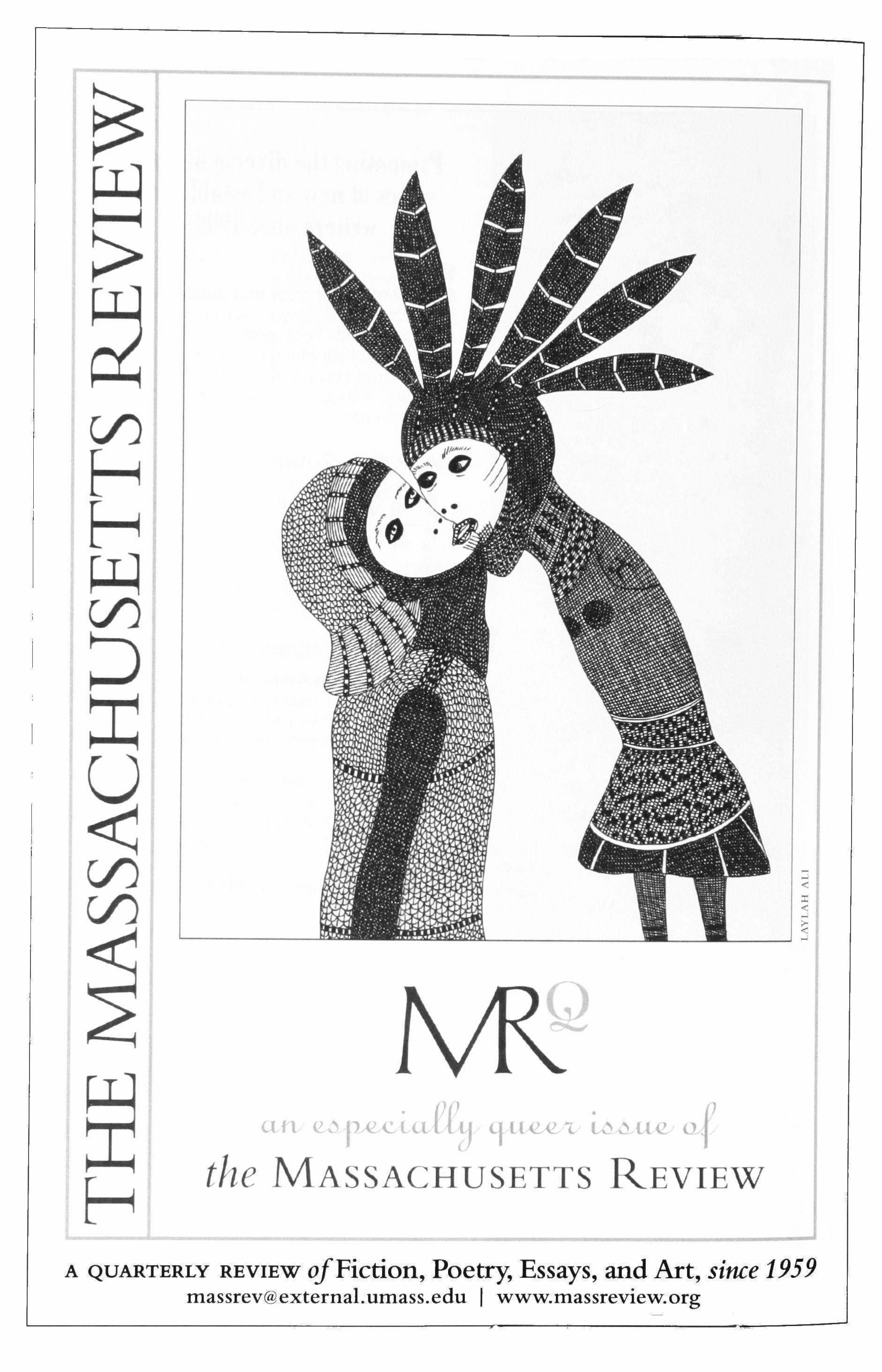
massrev@external.umass.edu I www.massreview.org
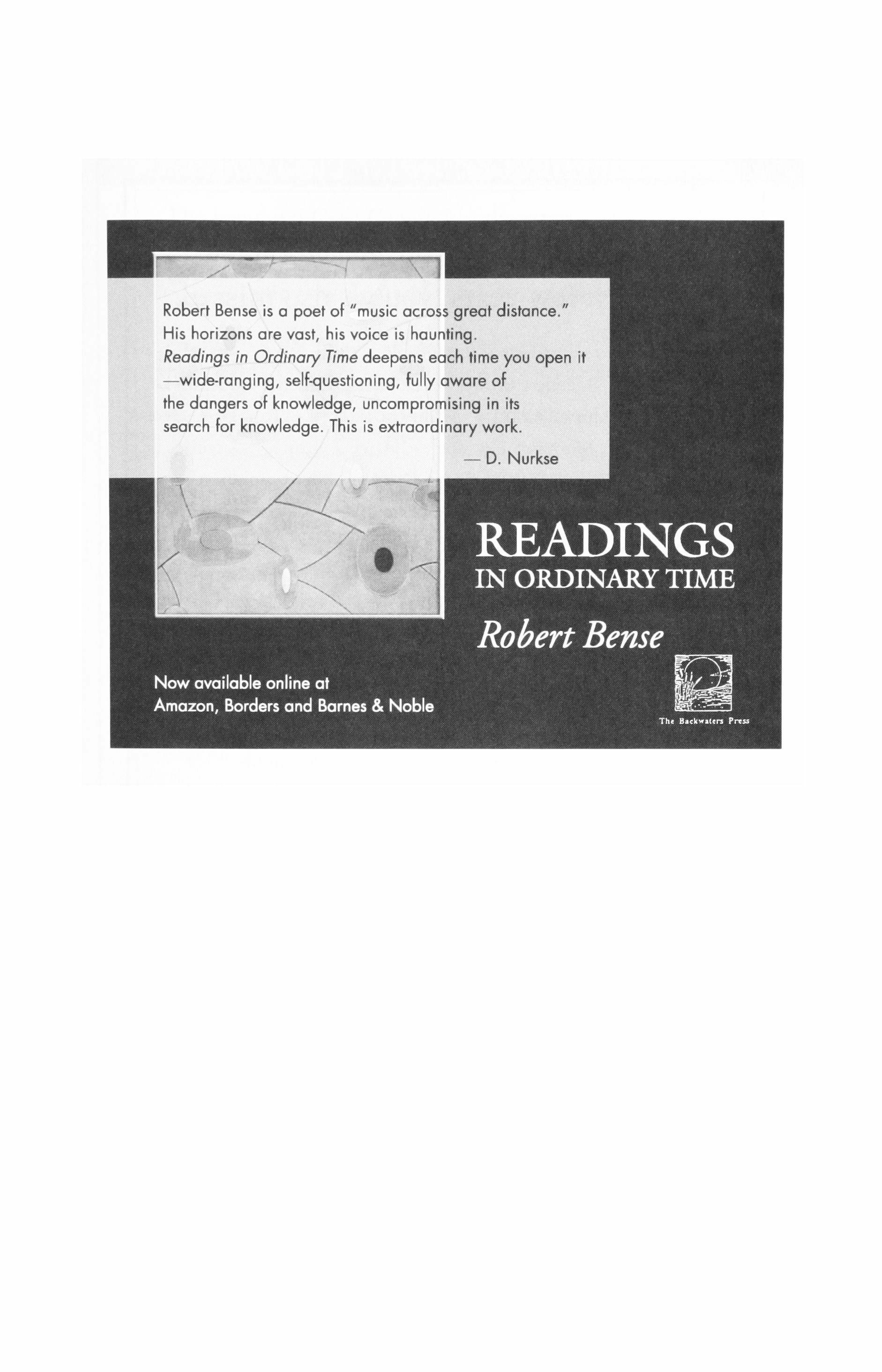
Robert Sense is a poet of "music across great distance." His horizons are vast, his voice is haunting.
Readings in Ordinary Time deepens each time you open it -wide-ranging, self-questioning, fully aware of the dangers of knowledge, uncompromising in its search for knowledge. This is extraordinary work.

If you've missed the Southwest Review in the past few years, you've also missed:
John Ashbery Stanislaw Baranczak John Barth David
Bromwich Rosellen Brown Hortense Calisher Andrei
Codrescu Annie Dillard Millicent Dillon Tom Disch
Rita Dove Margaret Drabble Alice Fulton Angelica
Garnett William Gass Dana Gioia Albert Goldbarth
Debora Greger Eamon Grennan Allan Gurganus
Rachel Hadas Vicki Hearne Shelby Hearon Rolando
Hinojosa· Edward Hirsch > Alice Hoffman. John Hollander·
Michael Holroyd Garrett Kaoru Hongo Galway Kinnell
Mary Kinzie Georgina Kleege Ursula Le Guin
David Leavitt David Lehman Wendy Lesser William
Logan Alison Lurie J. D. McClatchy Alice Mattison
Arthur Miller • Iris Murdoch Joyce Carol Oates Grace
Paley Molly Peacock Robert Pinsky Reynolds Price
Adrienne Rich Mary [o Salter Jim Shepard Charles
Simic Lee Smith Elizabeth Spires Helen Vendler David Wagoner. William Weaver· Edmund White » Charles Wright

The inaugural Cave Canem Northwestern University Press Poetry Prize is a second book award for African American poets. This annual award celebrates and publishes works of lasting cultural value and literary excellence.
Award Winner receives $1,000, publication by Northwestern University Press, 15 copies ofthe book and a featured reading.
Judges: Parneshia Jones, John Keene and Reginald Gibbons. Judges reserve the right not to select a winner.
Eligibility: African American writers who have had one full-length book of poetry published by a professional press. Chapbooks and self-published works do not qualify. Simultaneous submission to other contests should be noted. Immediate notification upon winning another award is required.
Deadline: Reading period begins January 1, 2009. Manuscripts must be postmarked no later than March 15, 2009. To be notified that your manuscript has been received, enclose a stamped, selfaddressed postcard. Winner announced in June 2009.
Entry Fee: 120. Enclose check with submission, made payable to Northwestern University Press. Entry fees are nonrefundable.
Direct packet to: Northwestern University Press Cave Canem Northwestern University Press Poetry Prize 629 Noyes Street Evanston, IL 60208
Media Contacts:
Camille Rankine, Program/Communications Coordinator, Cave Canem Foundation: 212.941.5720; camillerankine@ccpoets.org
Rudy Faust, Publicity Manager, Northwestern University Press: 847.467.0319; r-faust@northwestern.edu
Guidelines:
Send three copies of a Single manuscript. One manuscript per poet allowed.
Enclose a stamped, self-addressed envelope to receive notification of results.
Author's name should not appear on any pages within the manuscript. Copy One must include a title page with the author's brief bio (200 words, maximum) and contact information: author's name, postal address, e-mail address and telephone number.
Copies Two and Three must include a cover sheet with the title only.
Manuscript must be typed single sided with a minimum font size of 11, paginated and 50-75 pages in length. A poem may be multiple pages, but no more than one poem per page is permitted.
Manuscript must include a table of contents and list of acknowledgments of previously published poems.
Manuscript must be unbound. Use a binder clip do not staple or fold. Do not include illustrations or images of any kind. Manuscripts not adhering to submission guidelines will be discarded without notice to sender.
Due to the volume of [" ·'_ submissions, manuscripts �
will not be �eturned. i ! Post-submission i ! revisions or corrections i i are not permitted.


